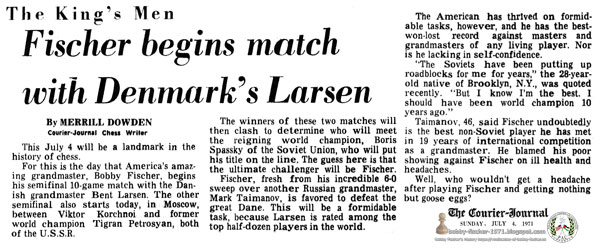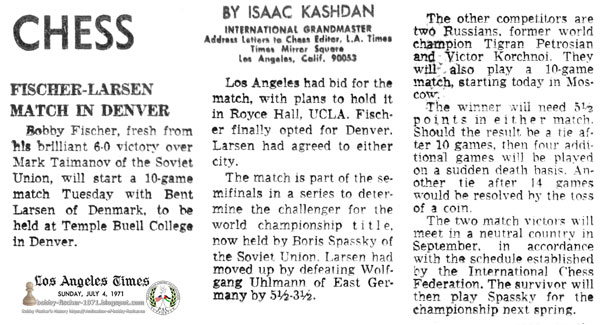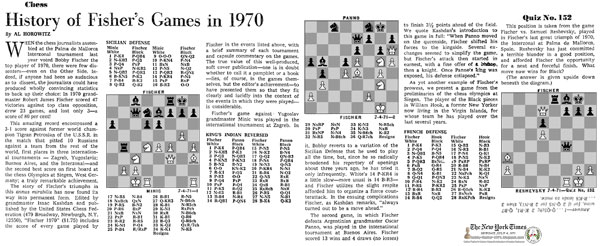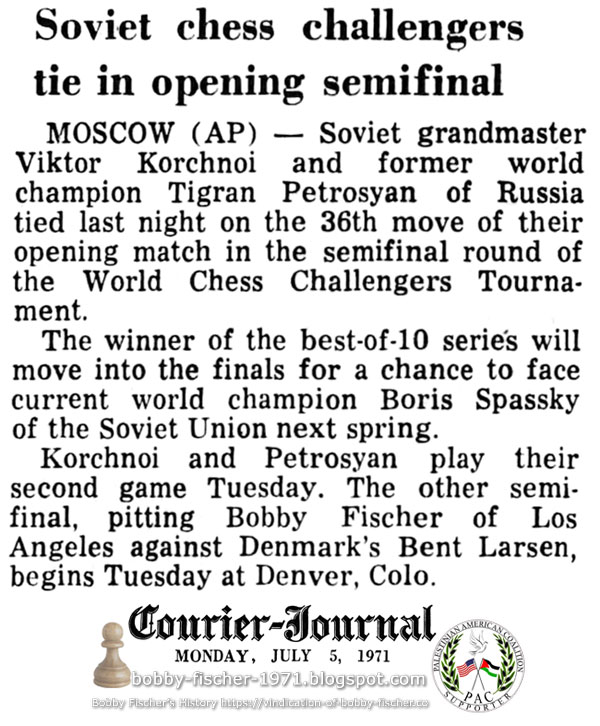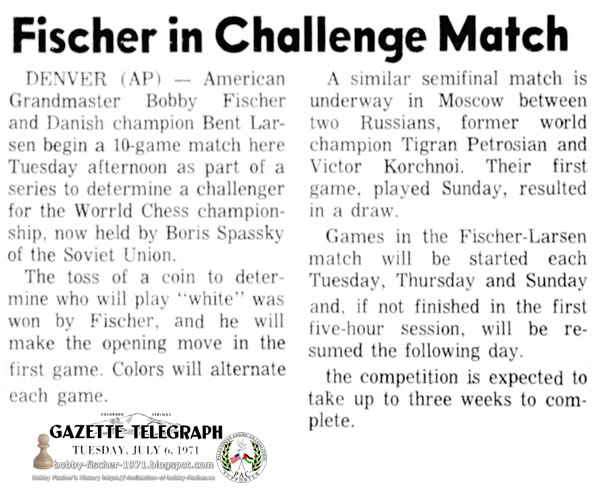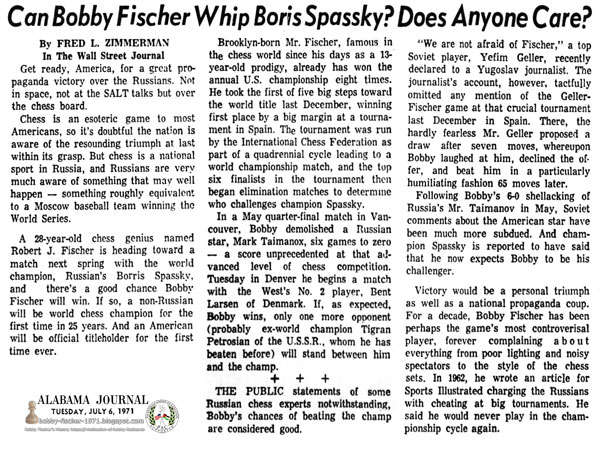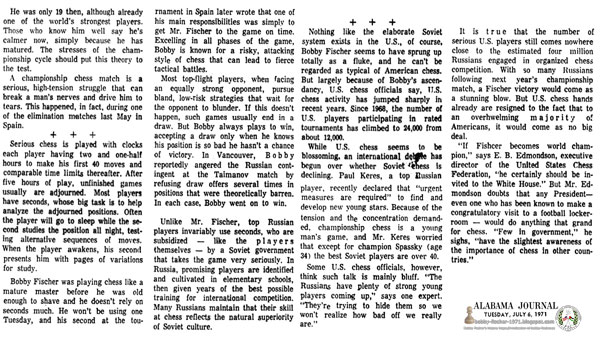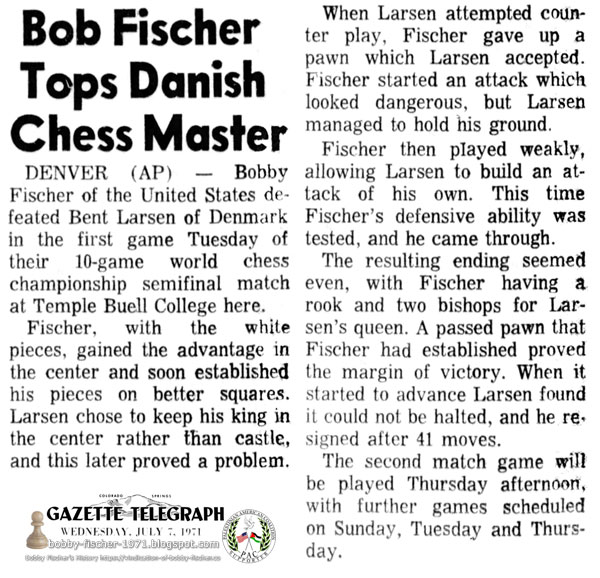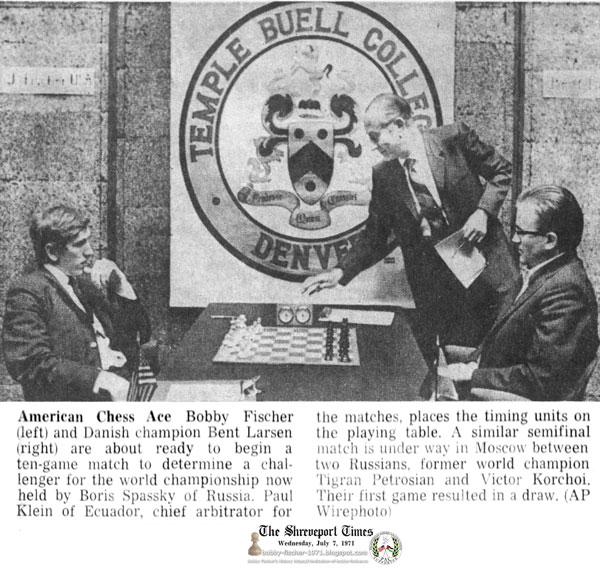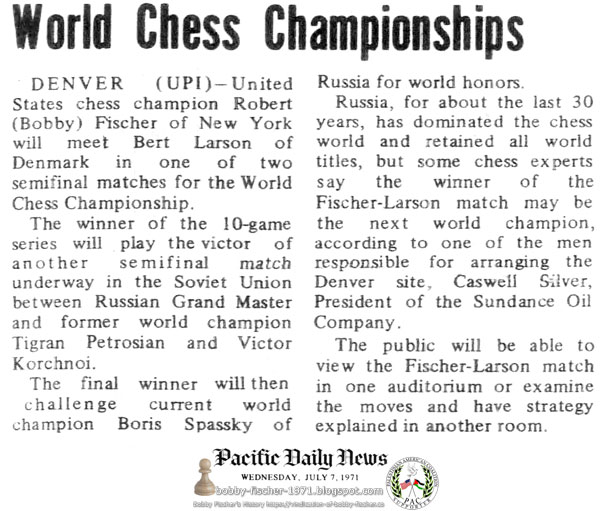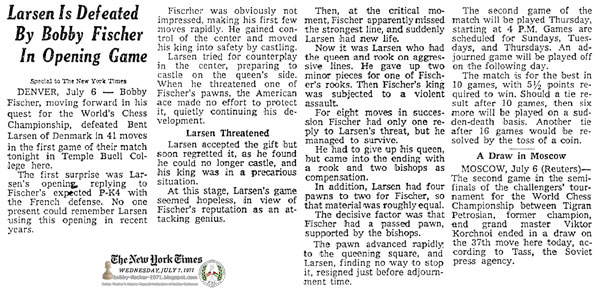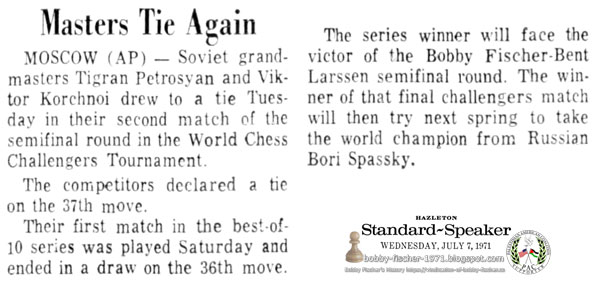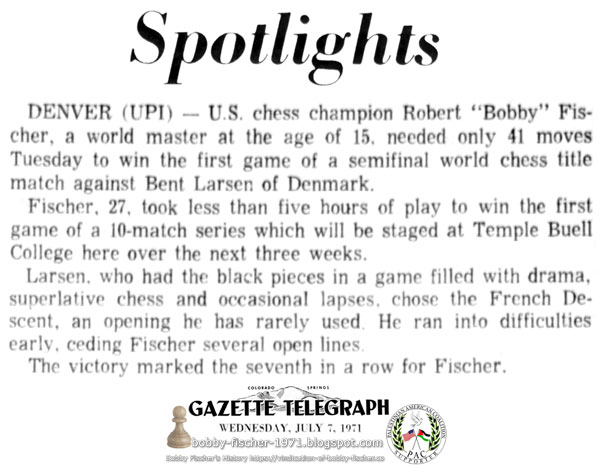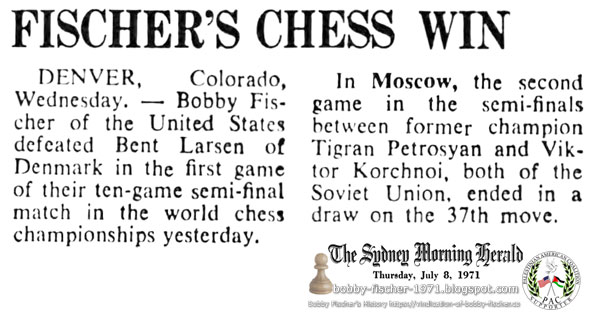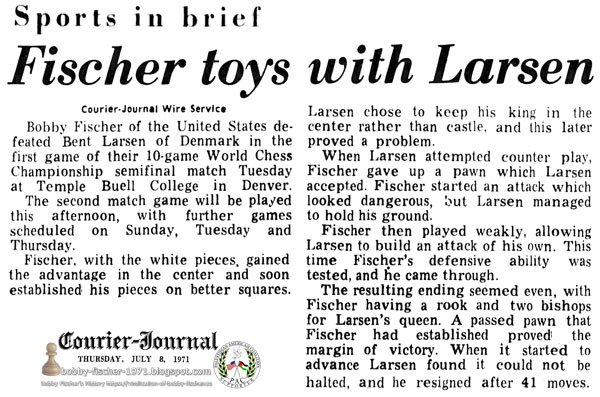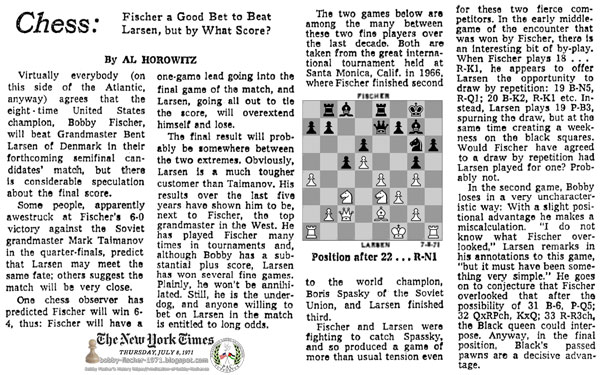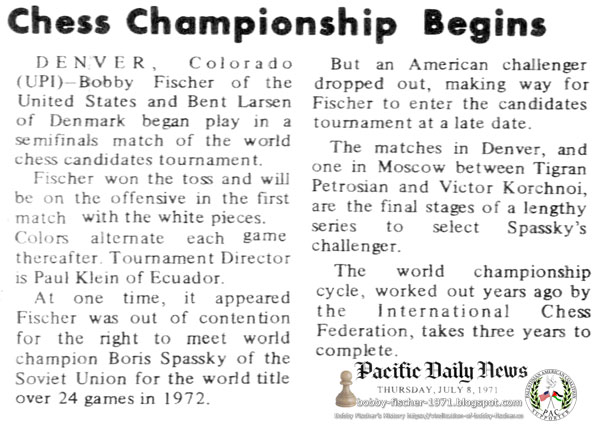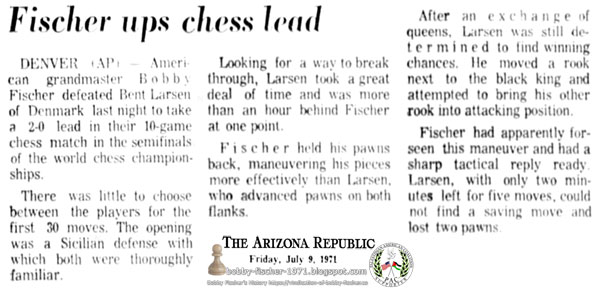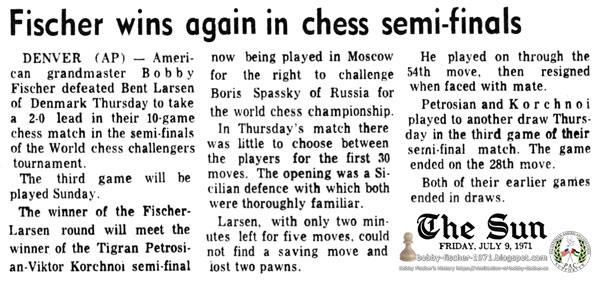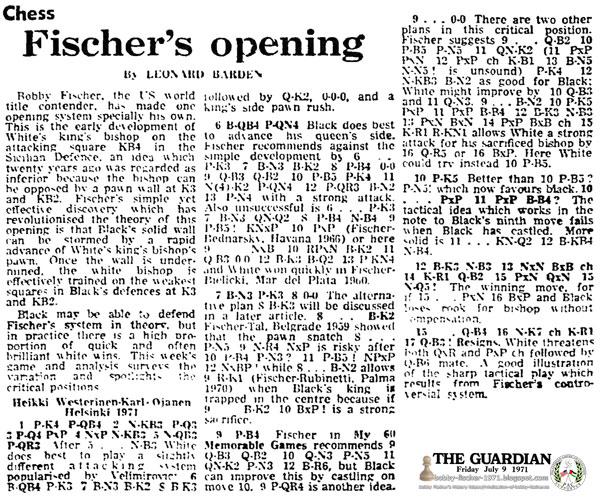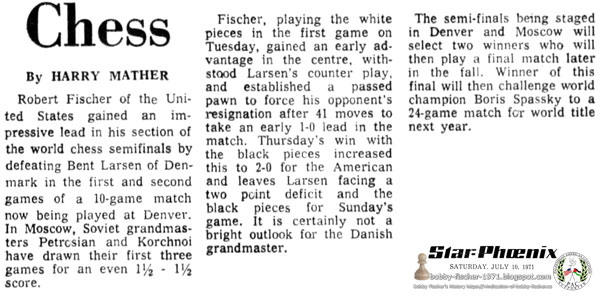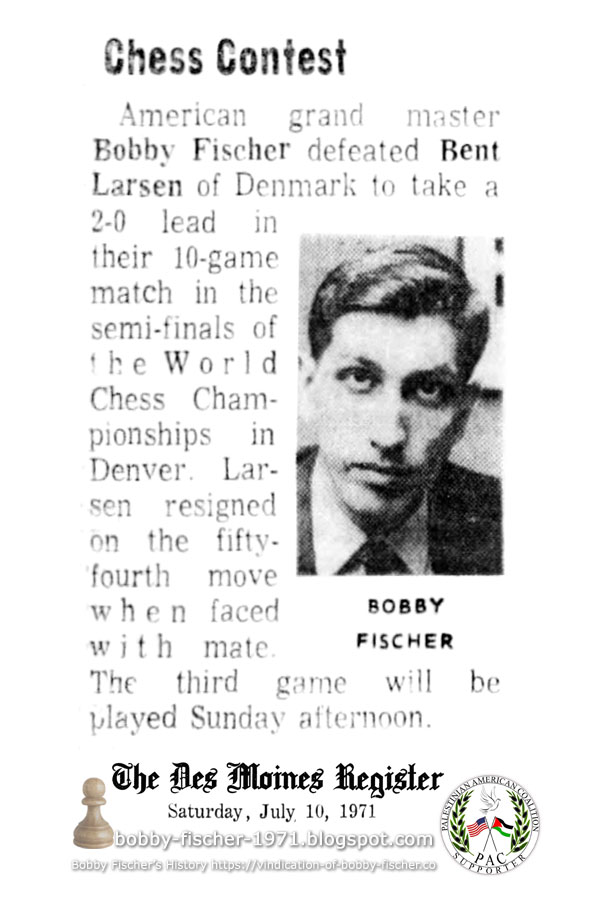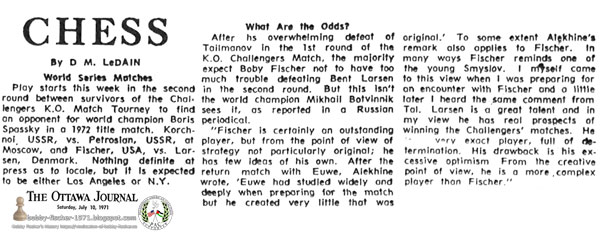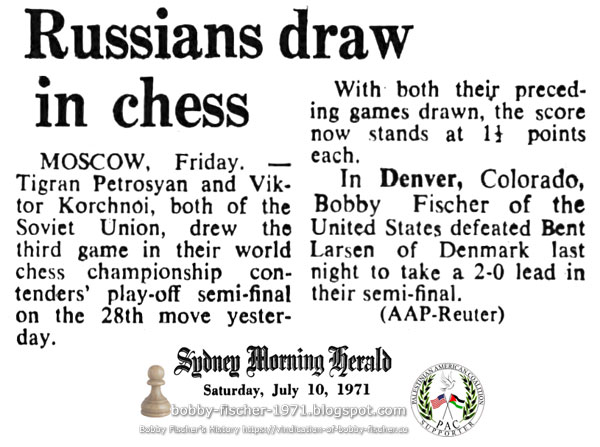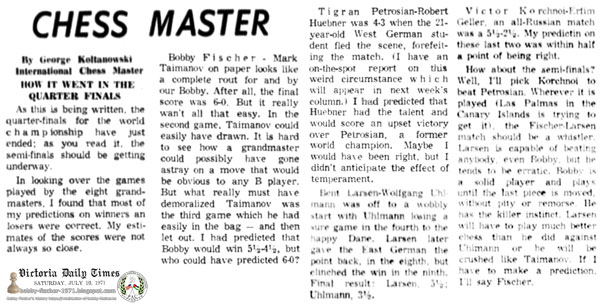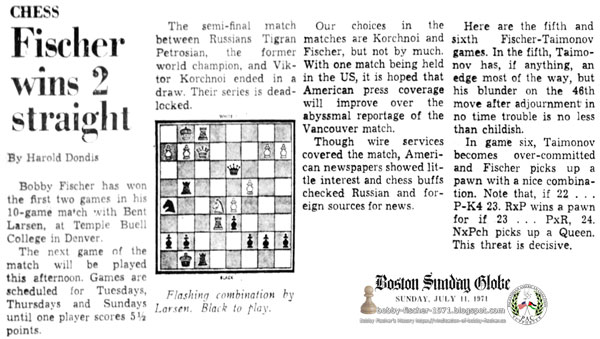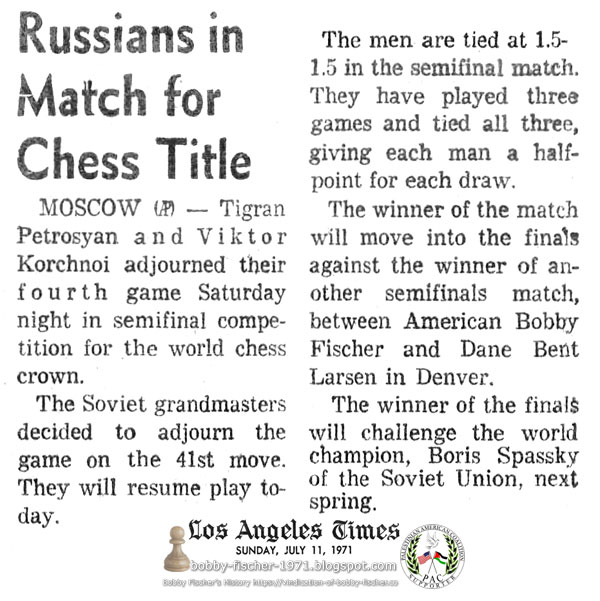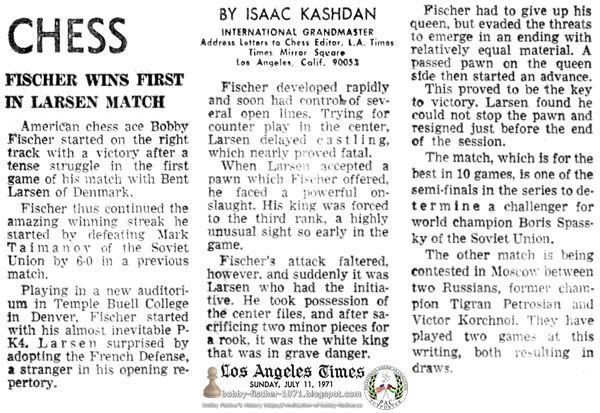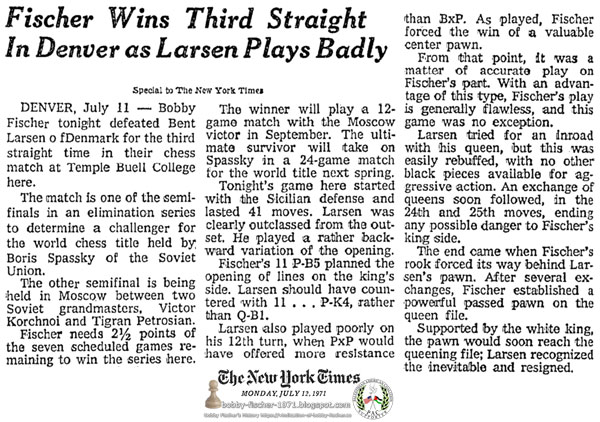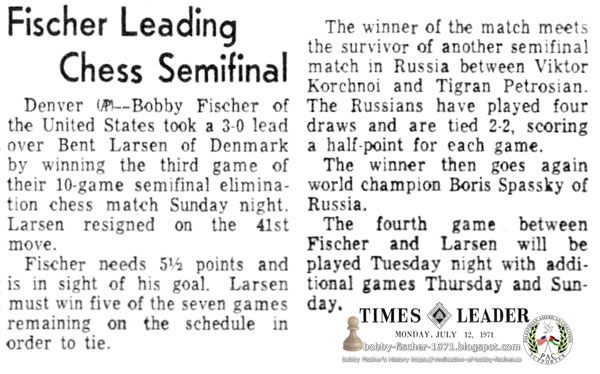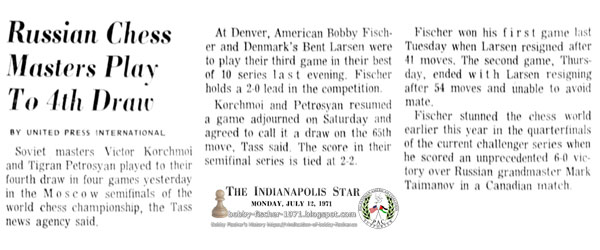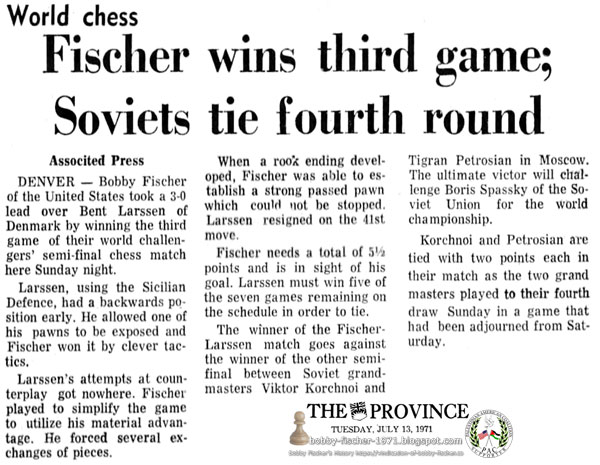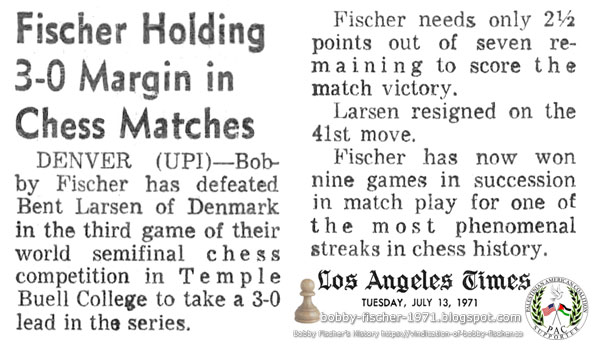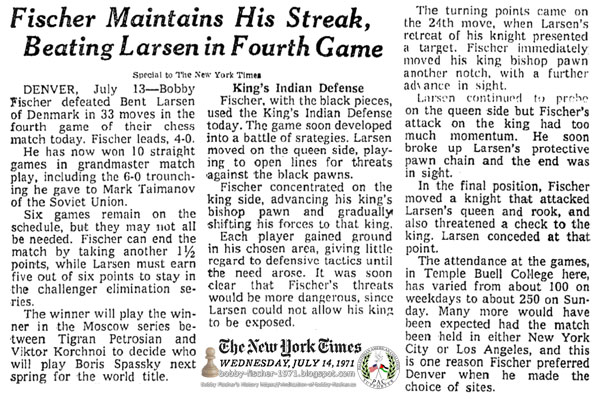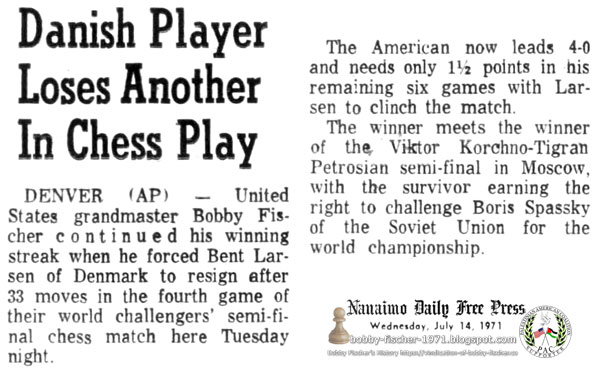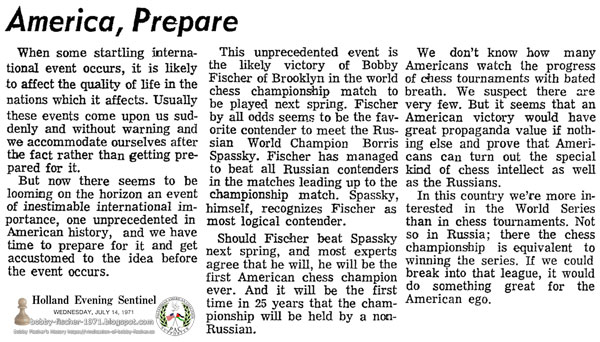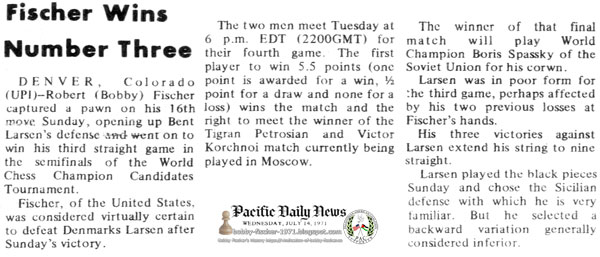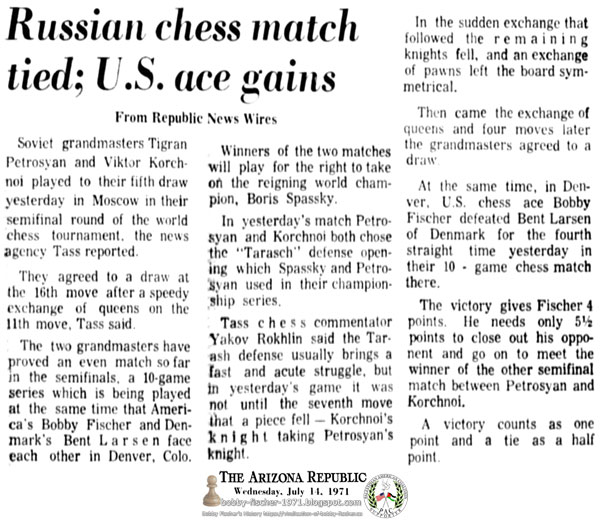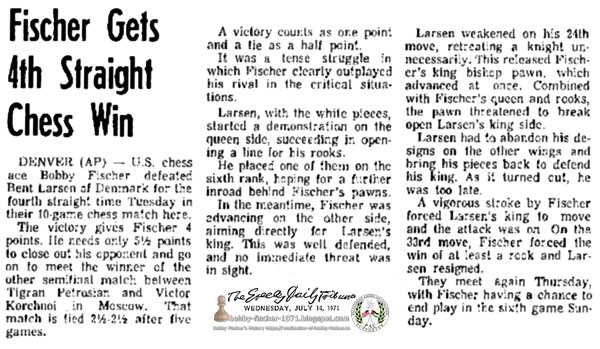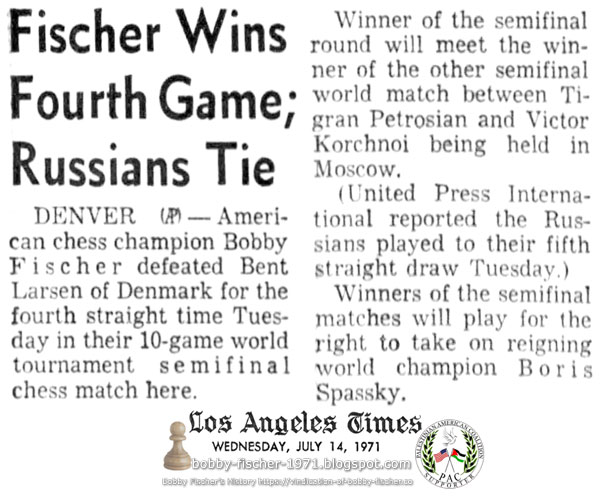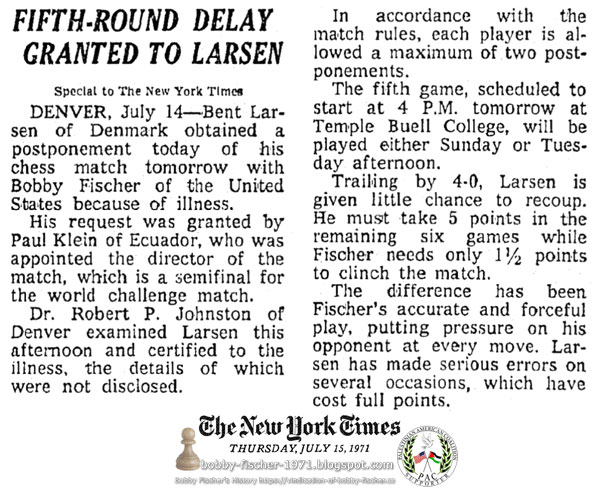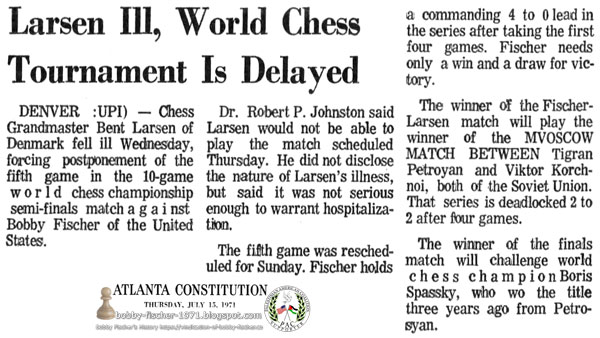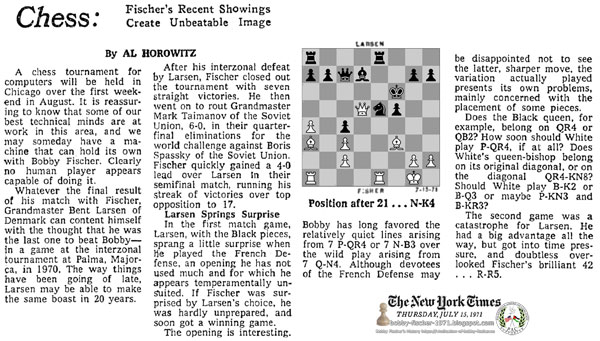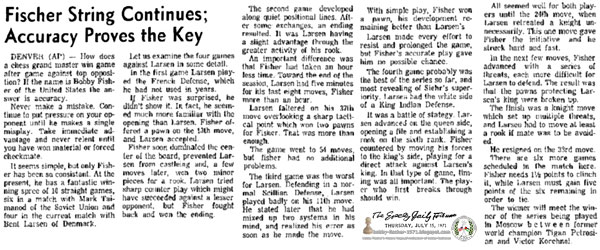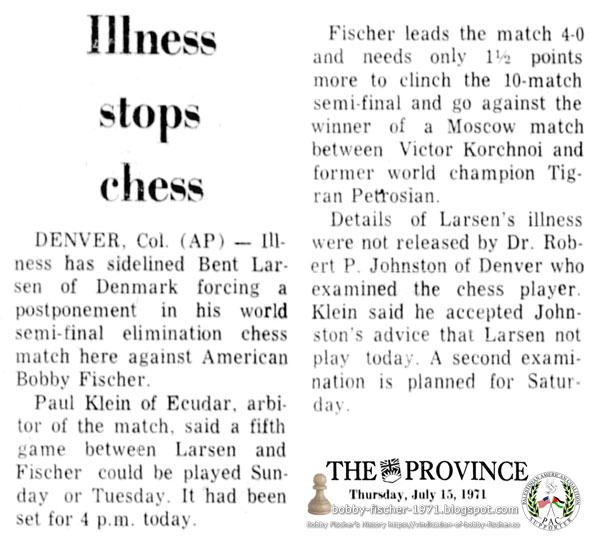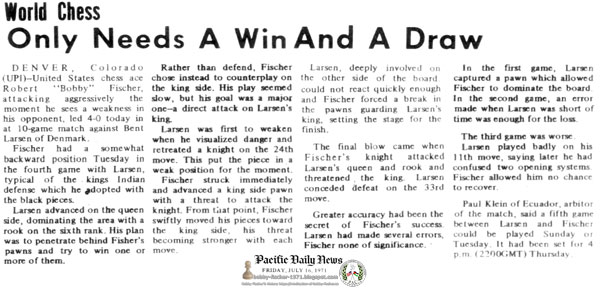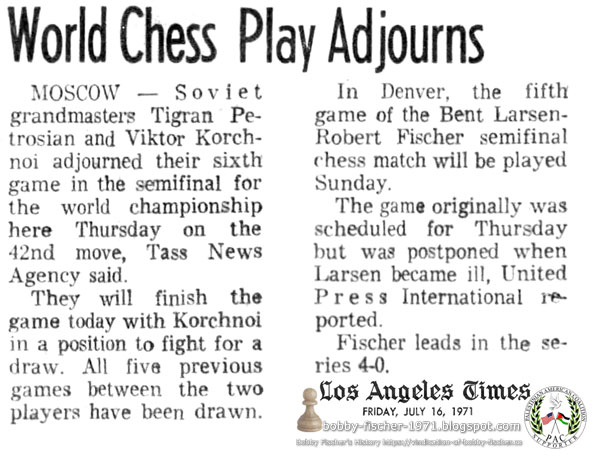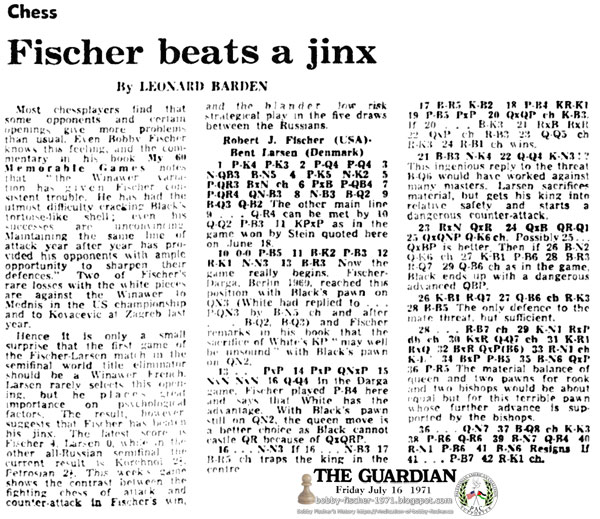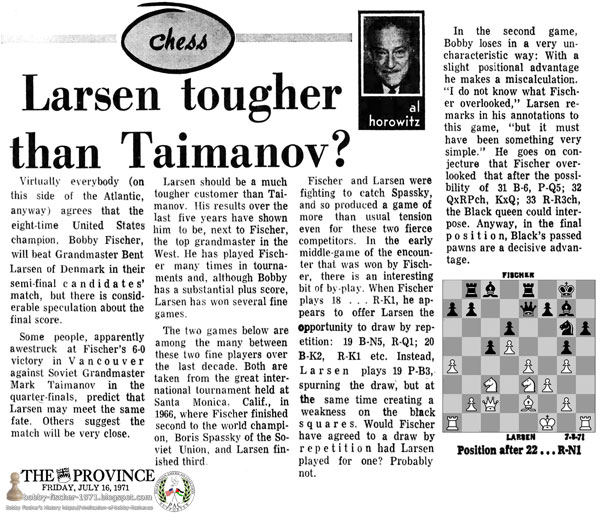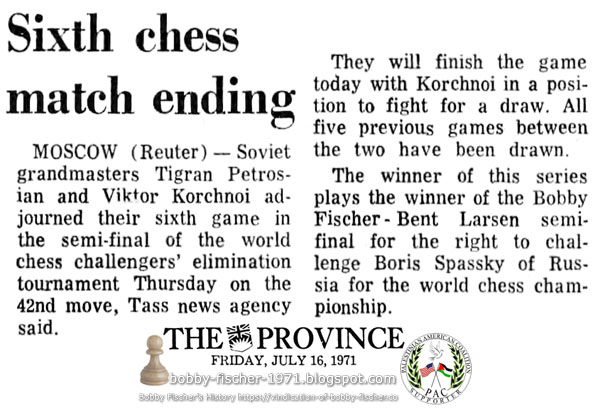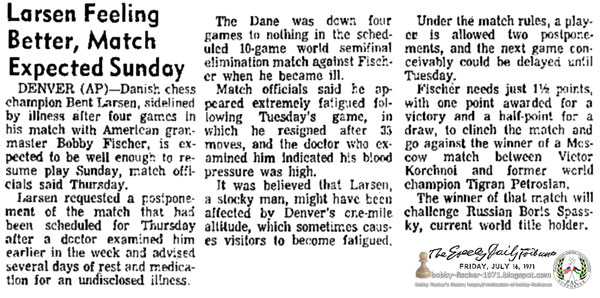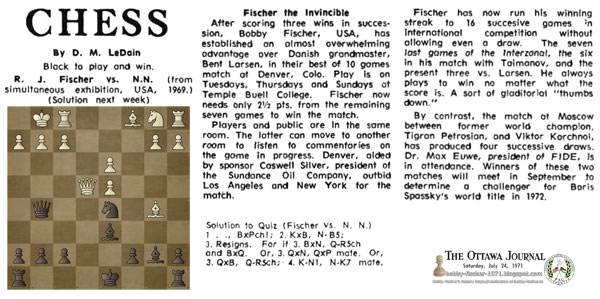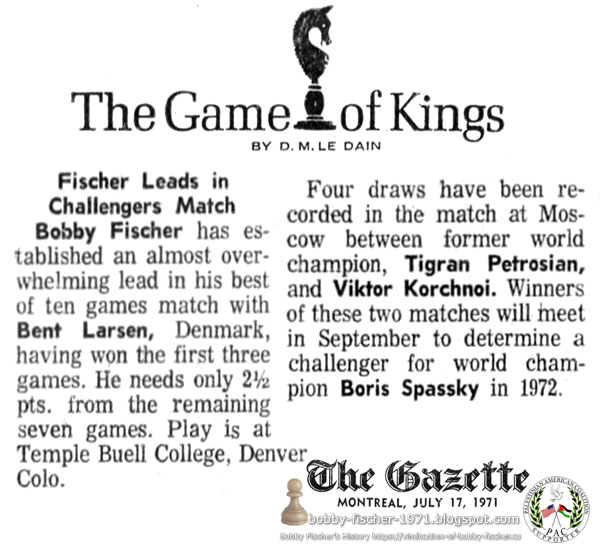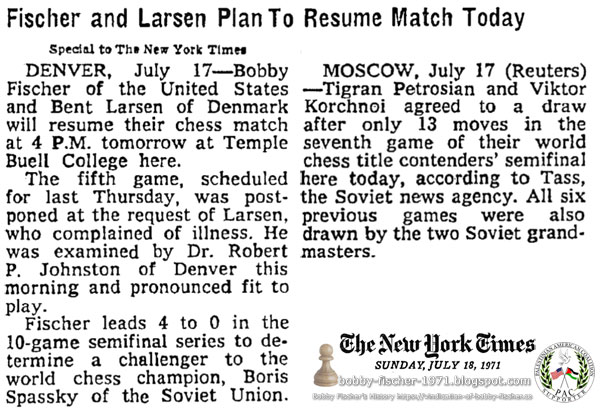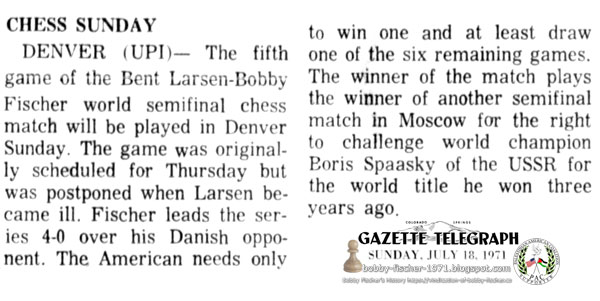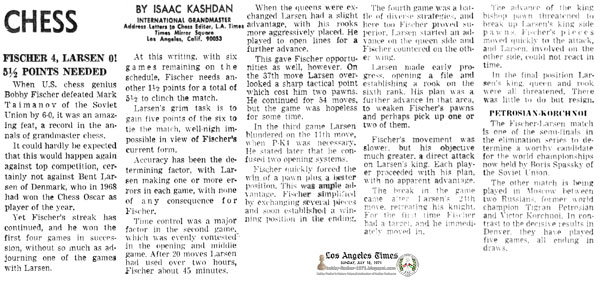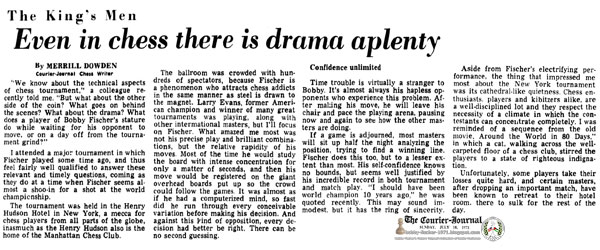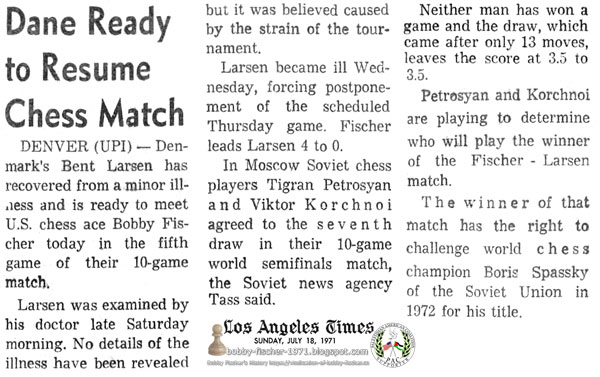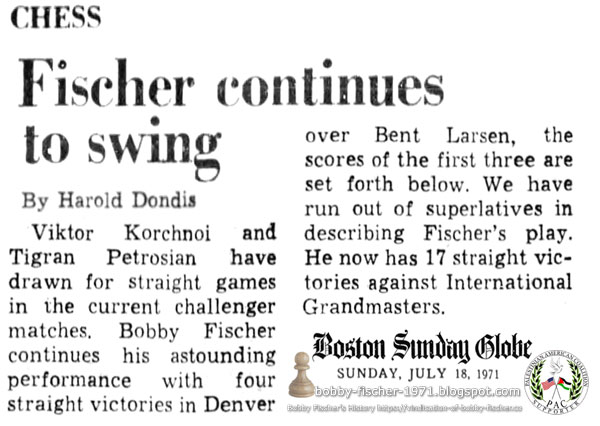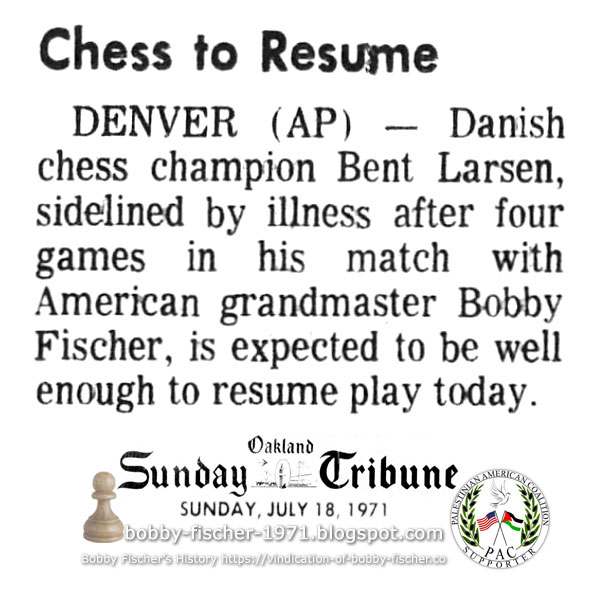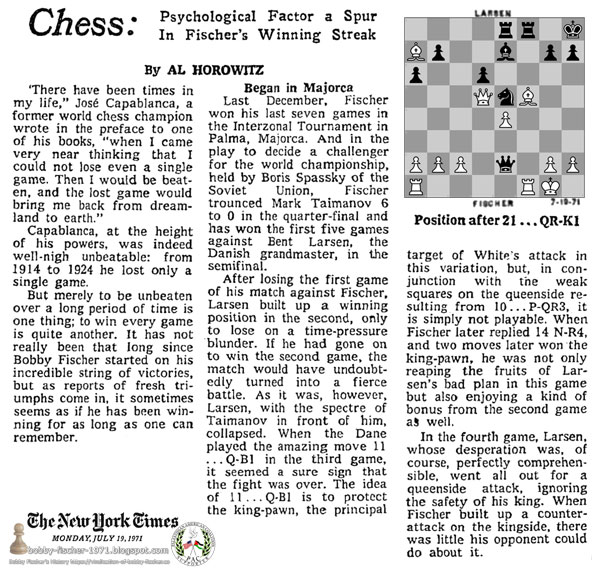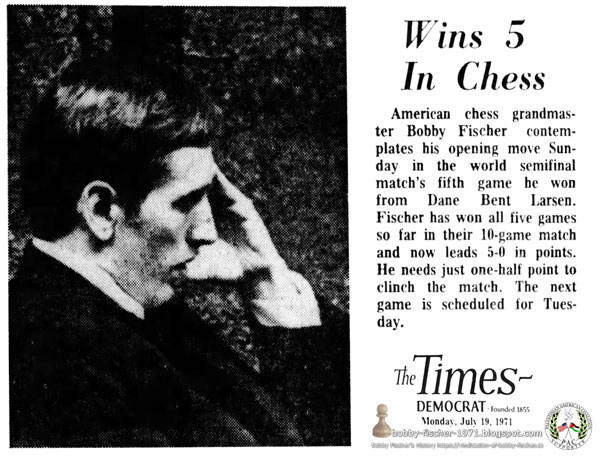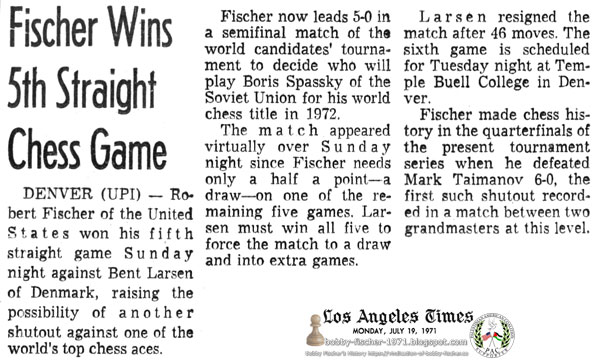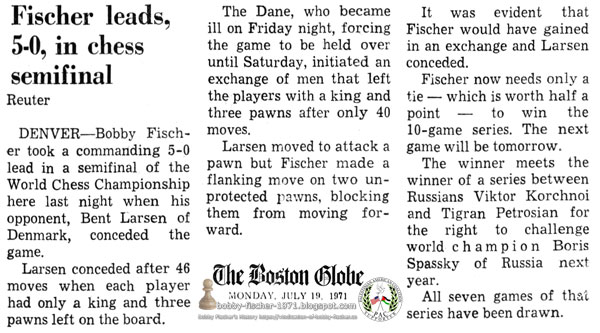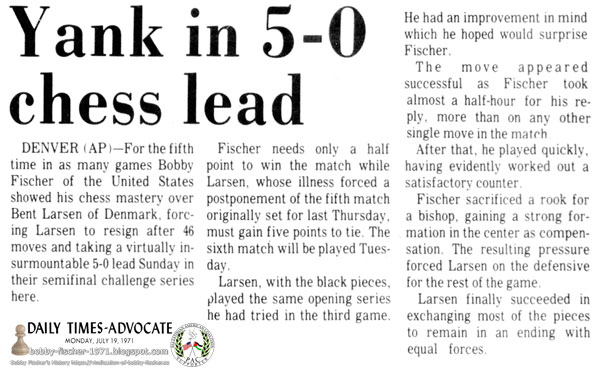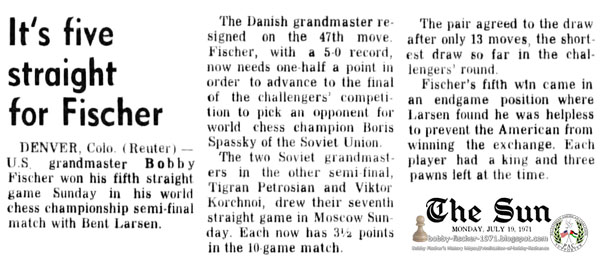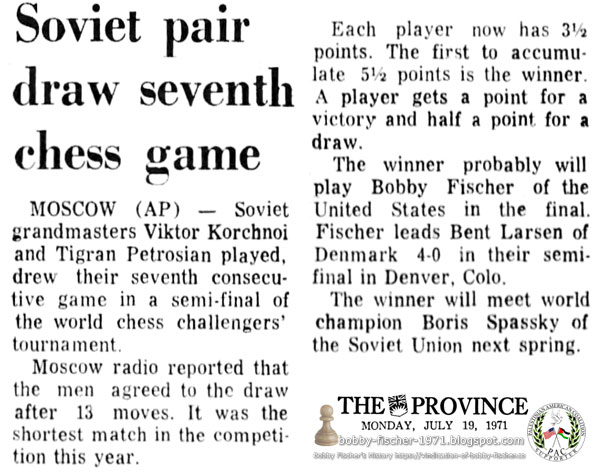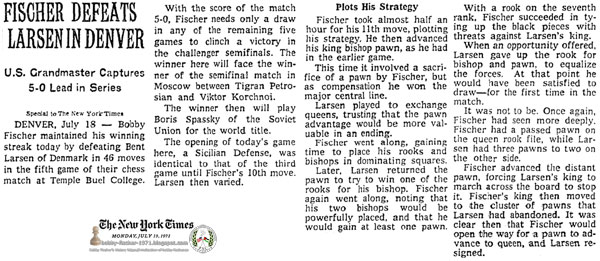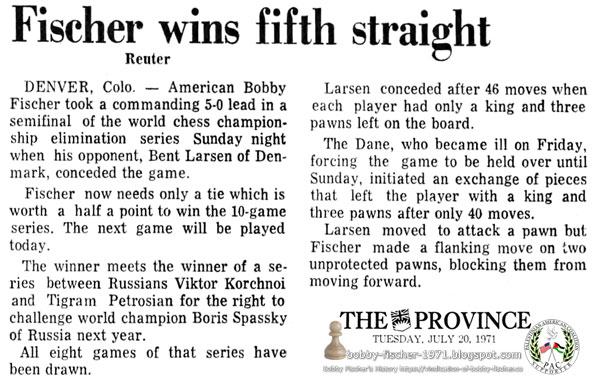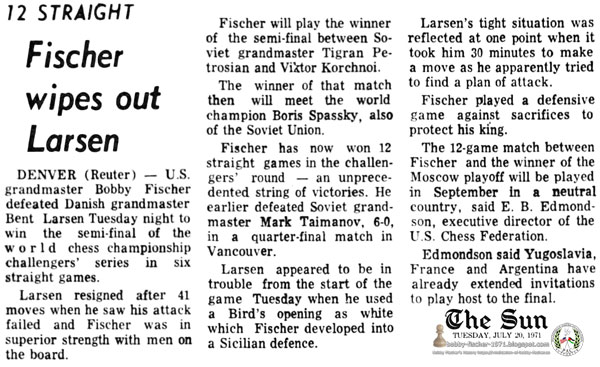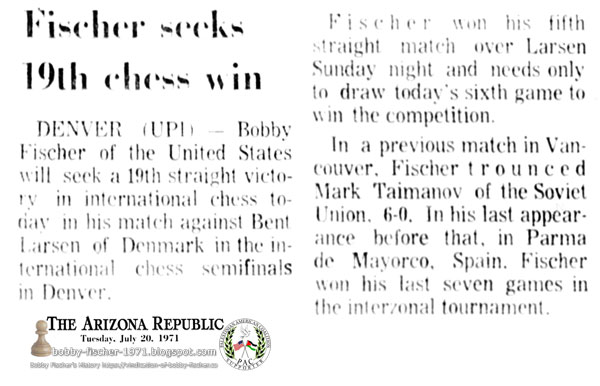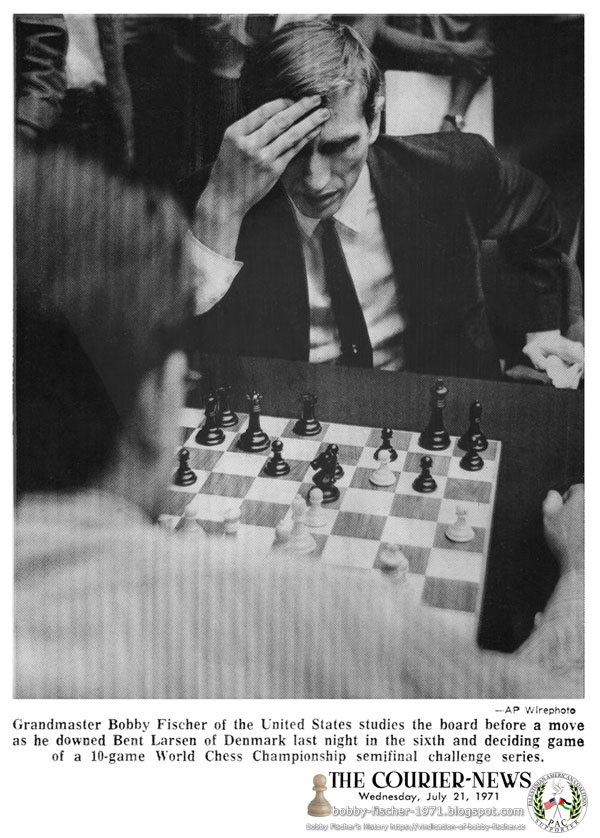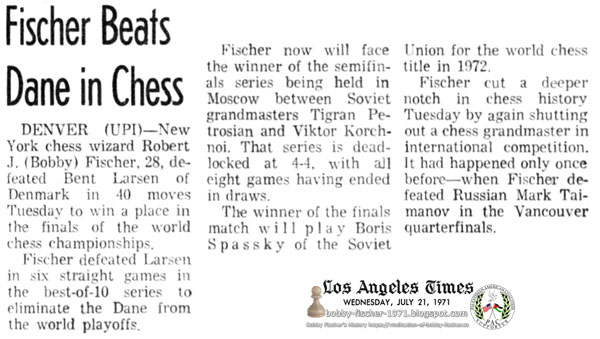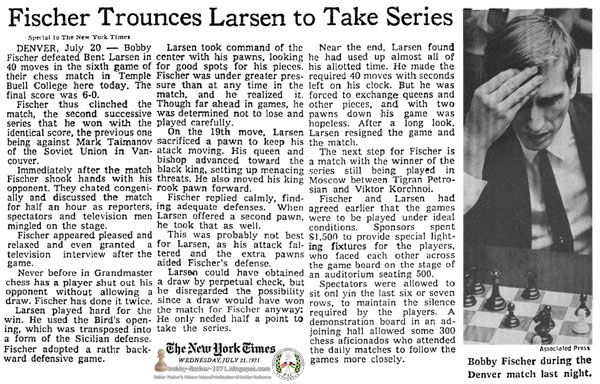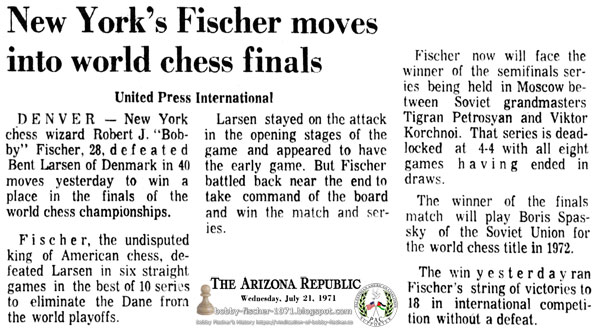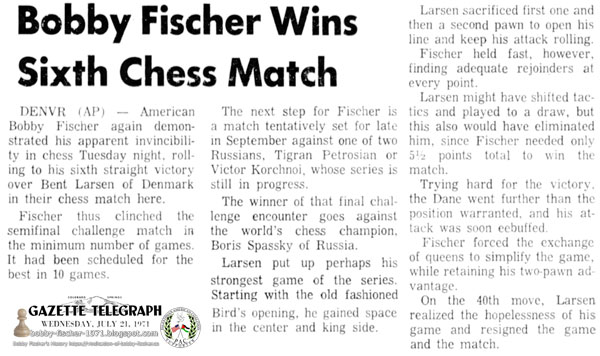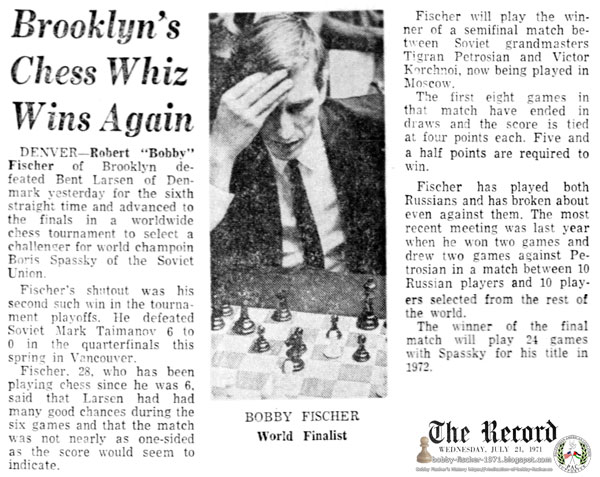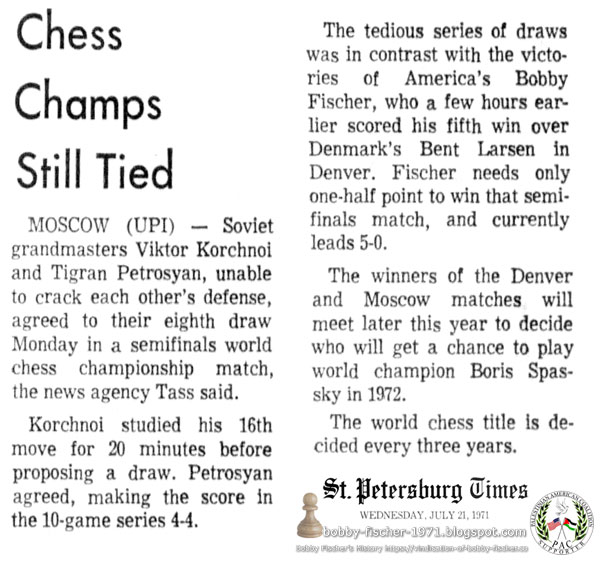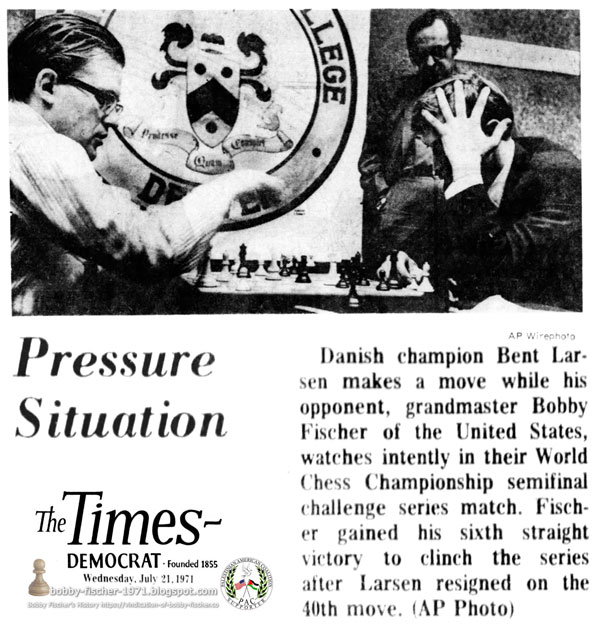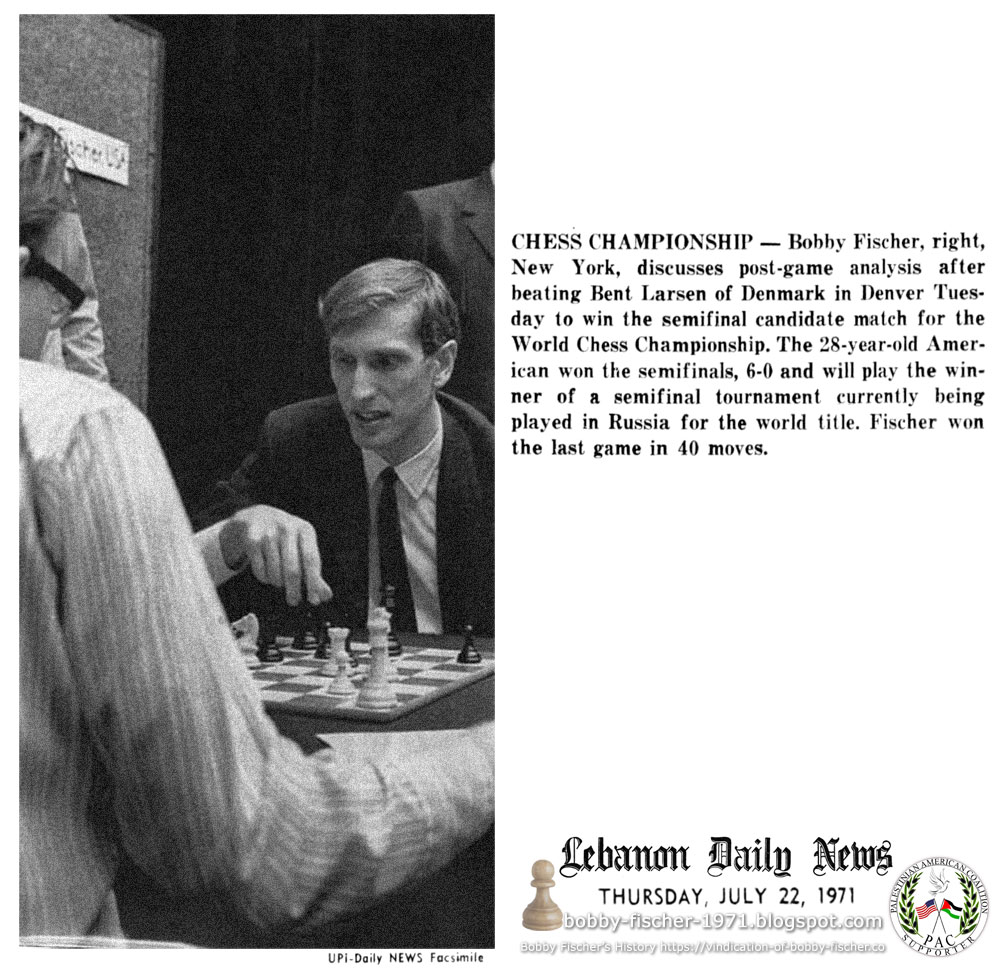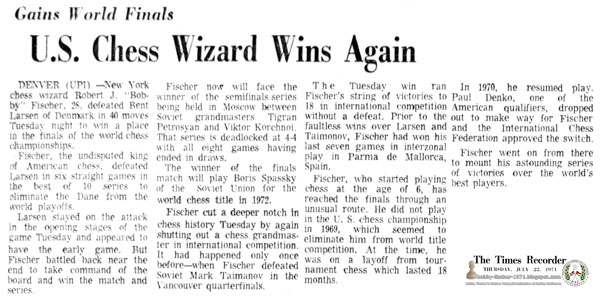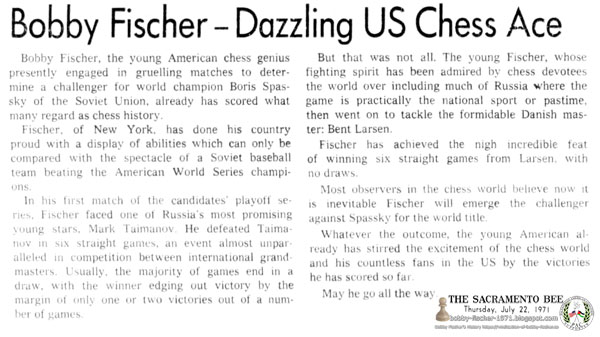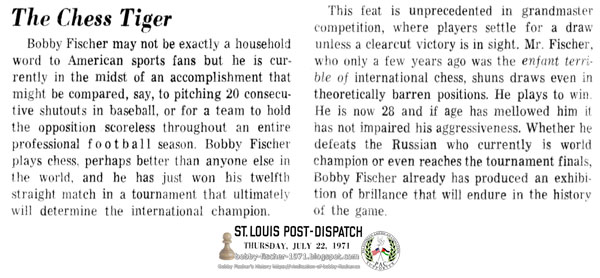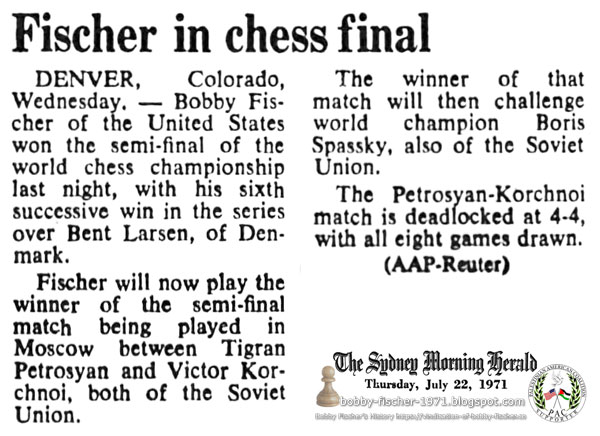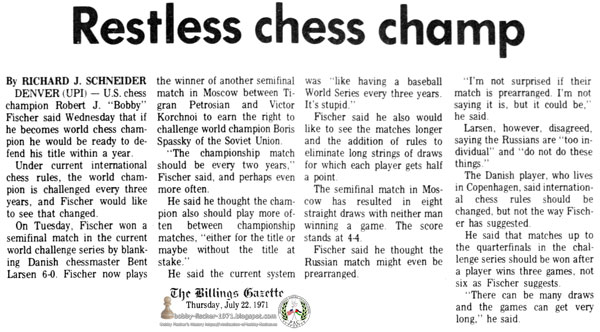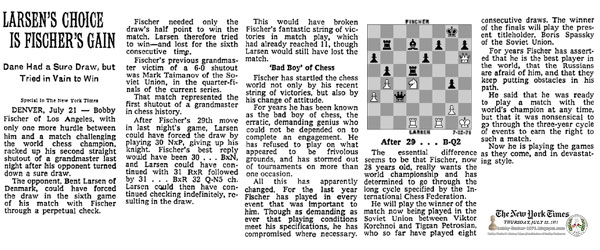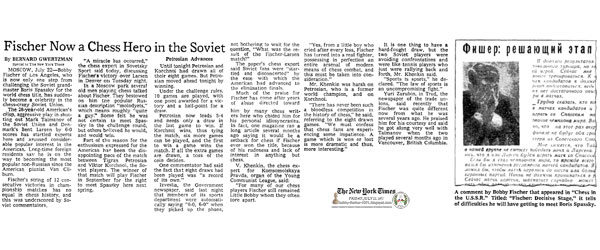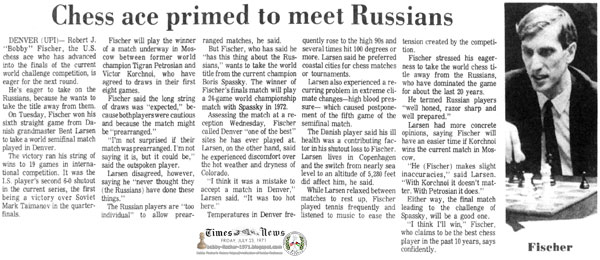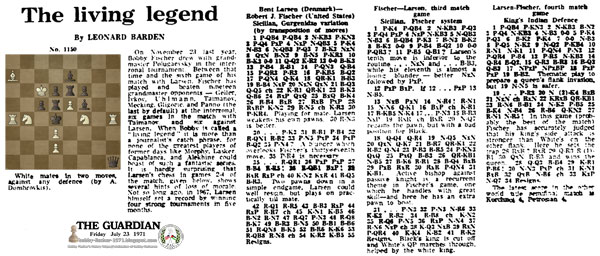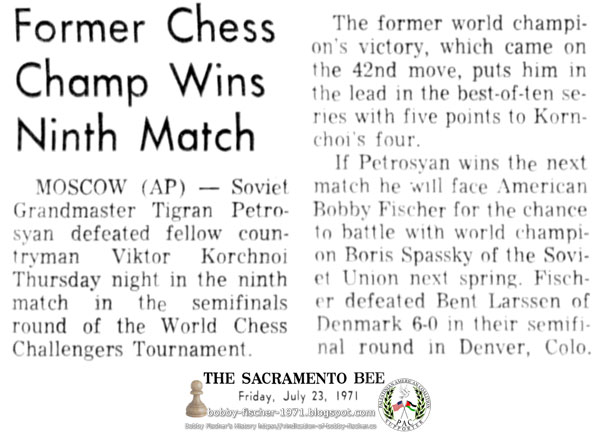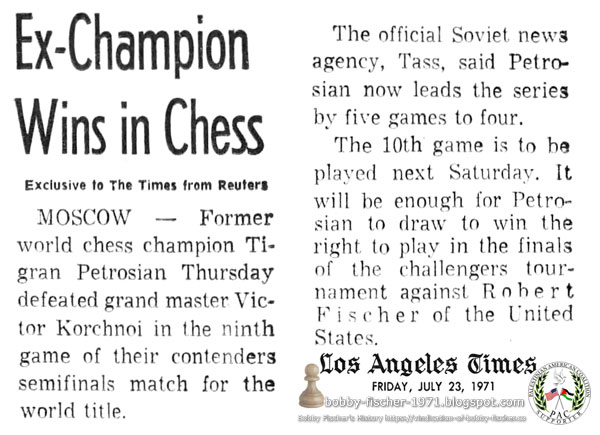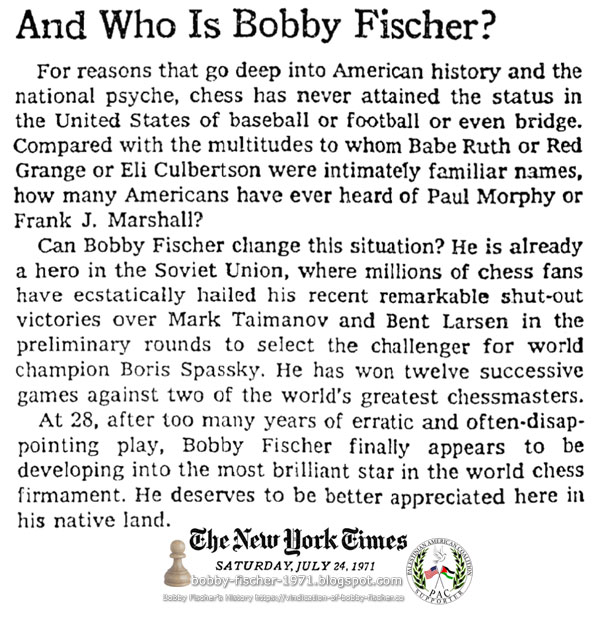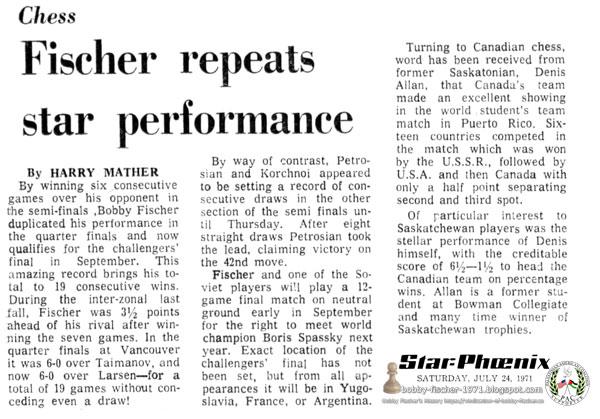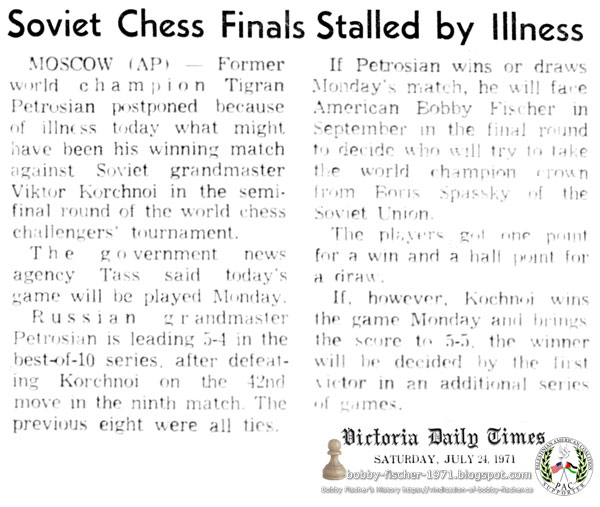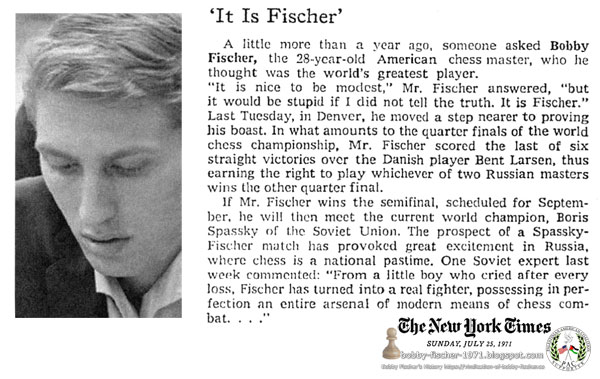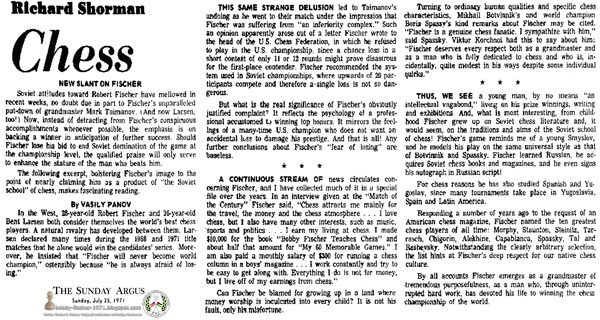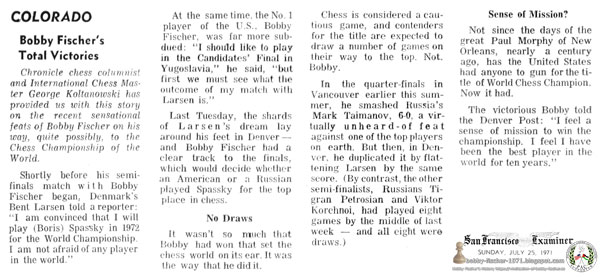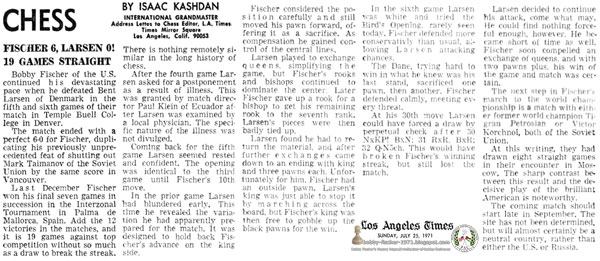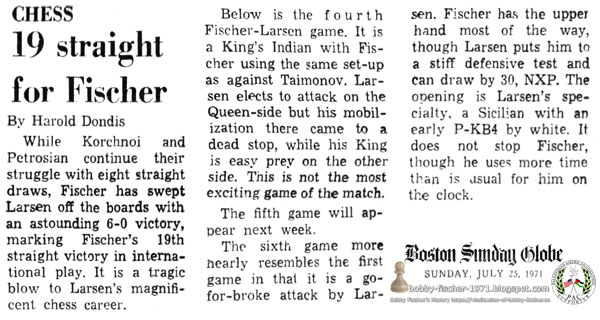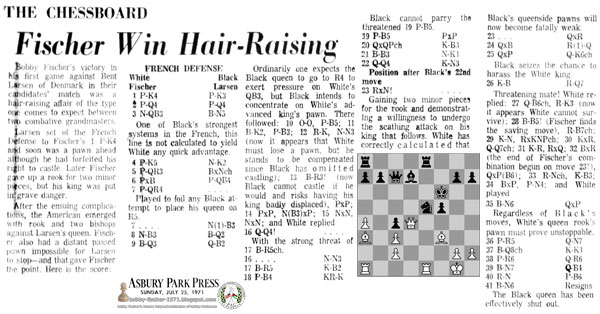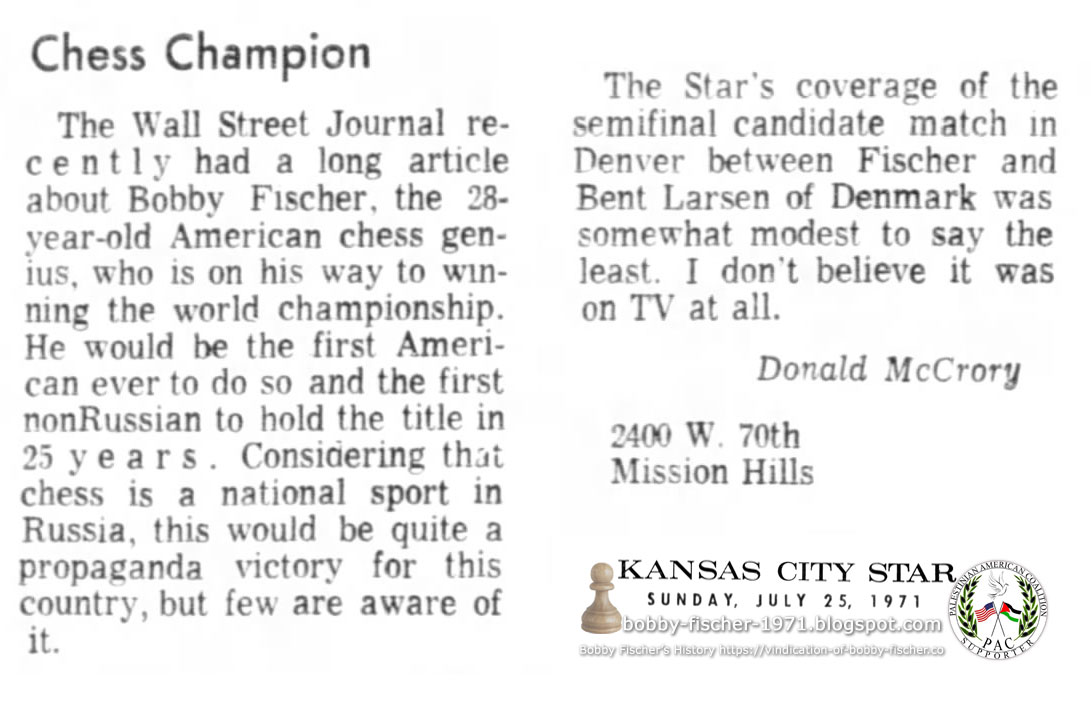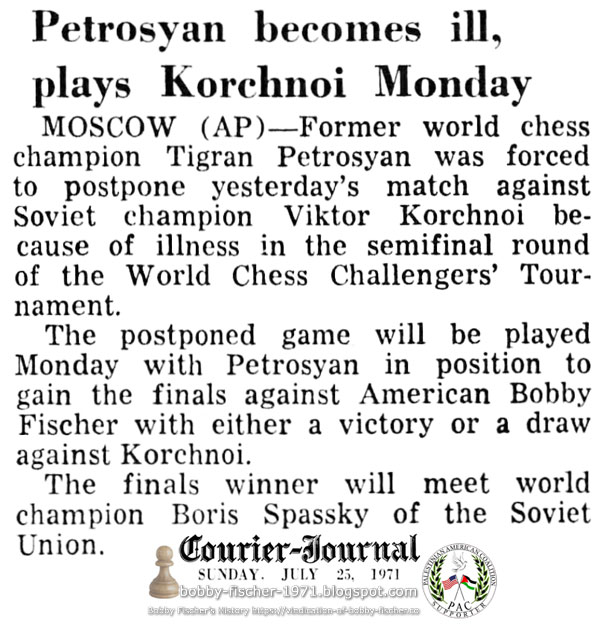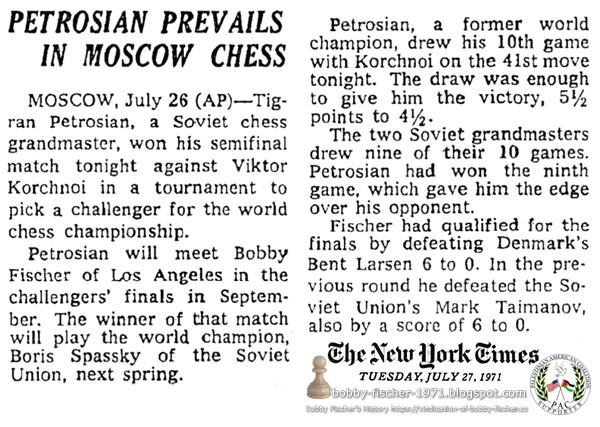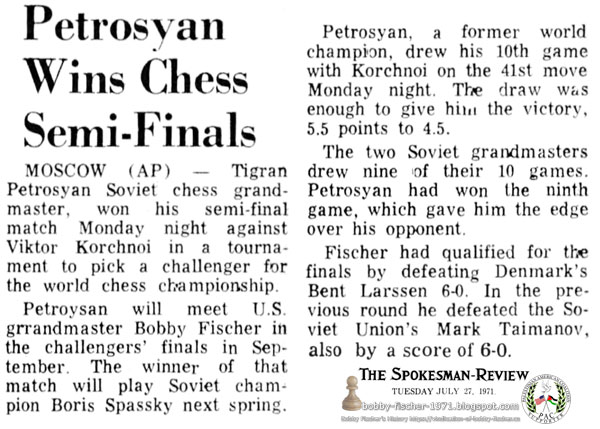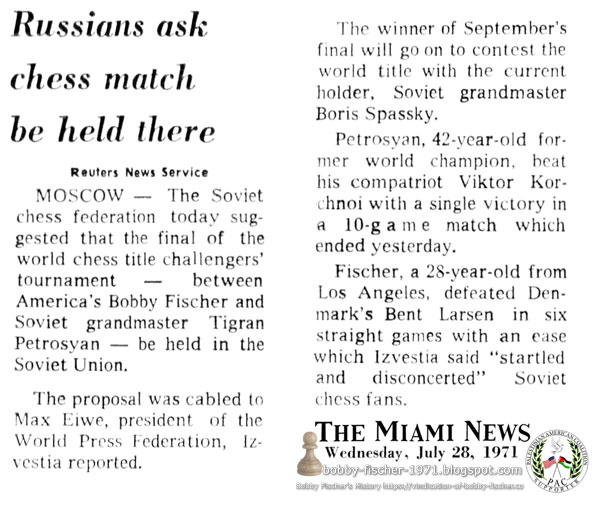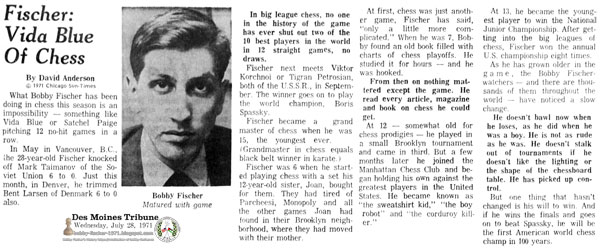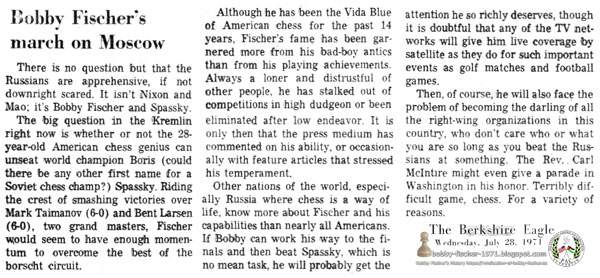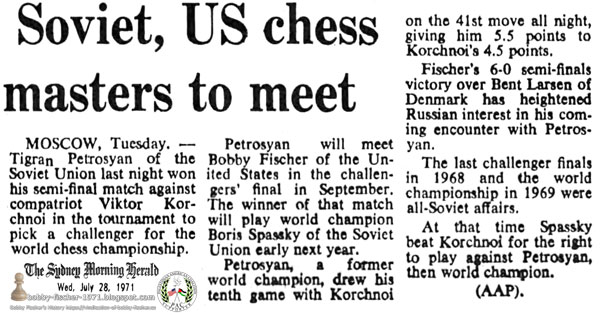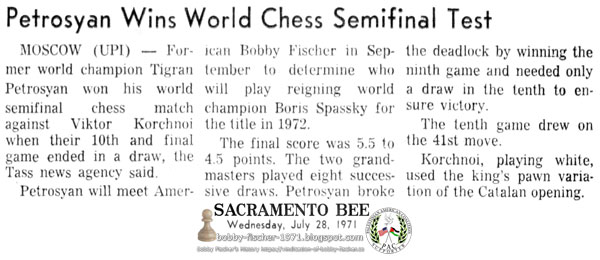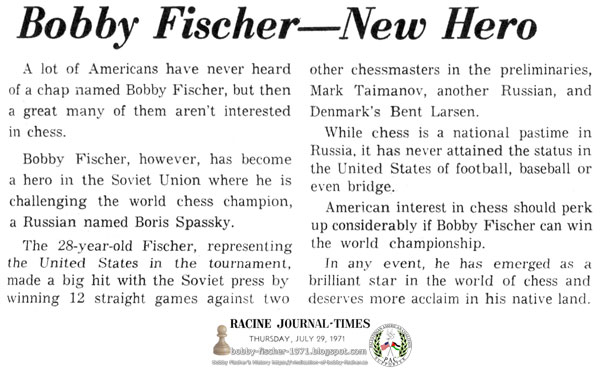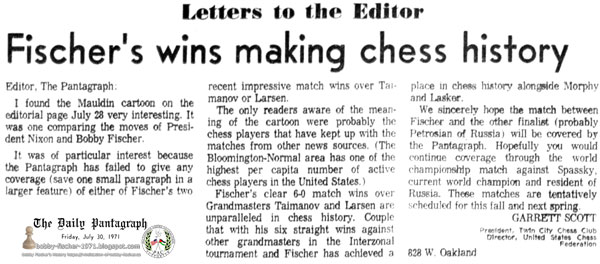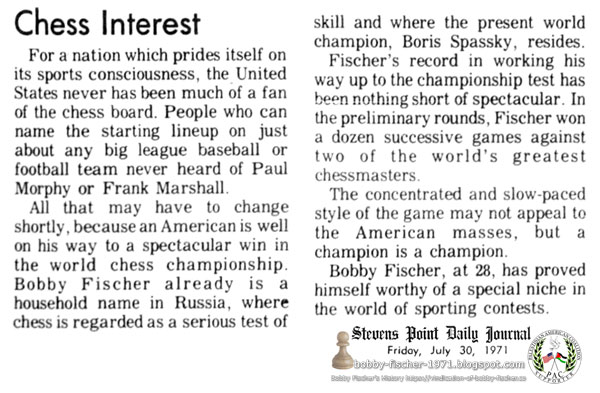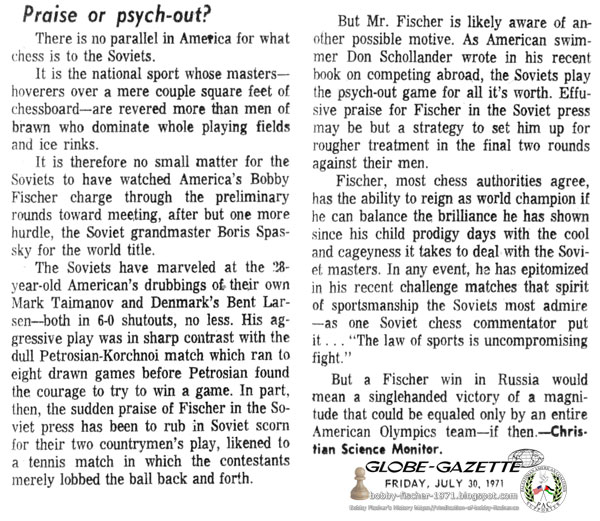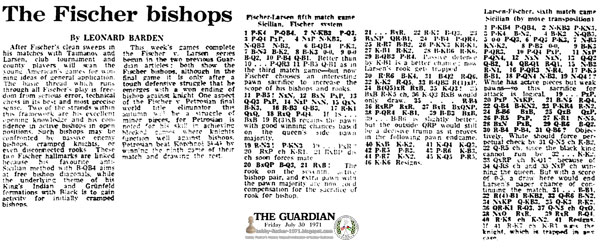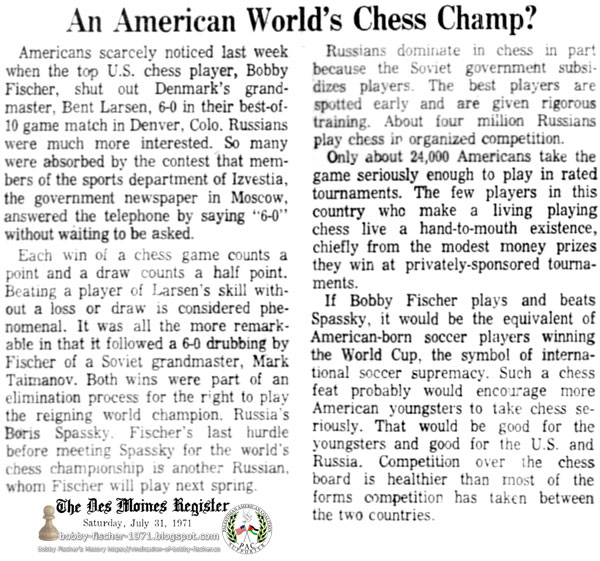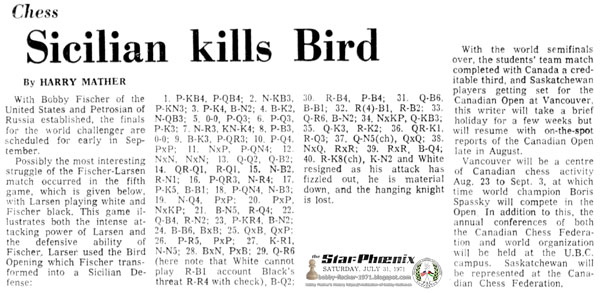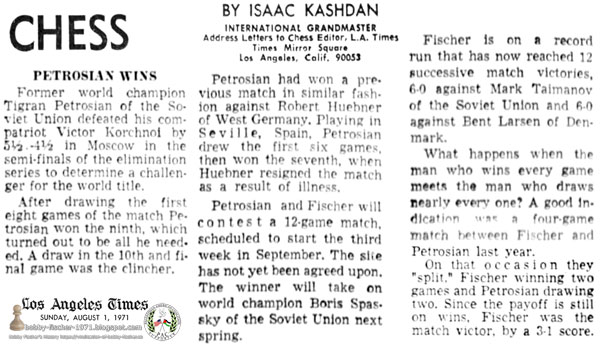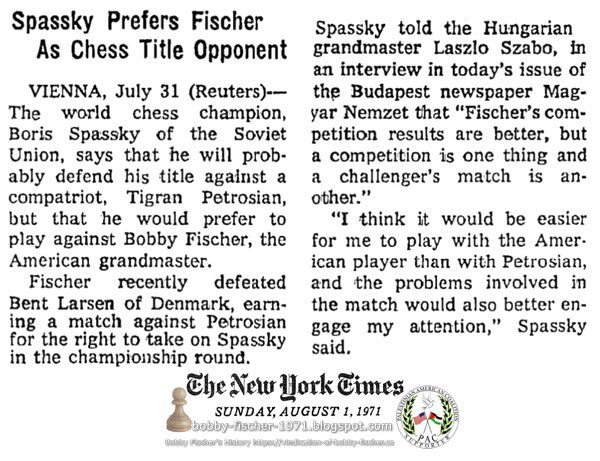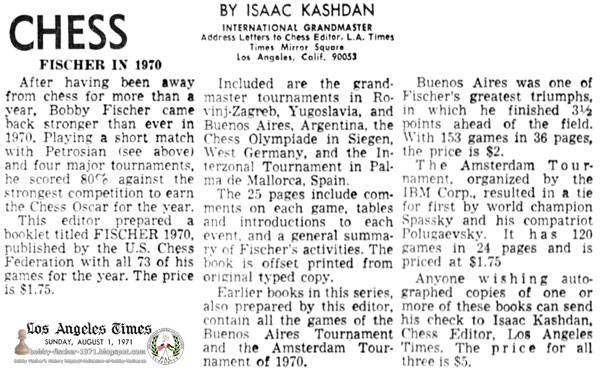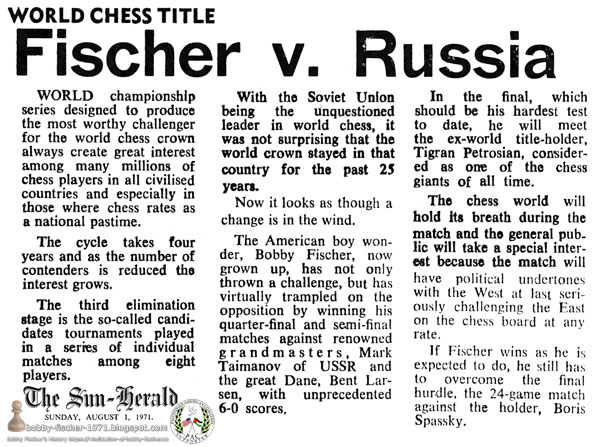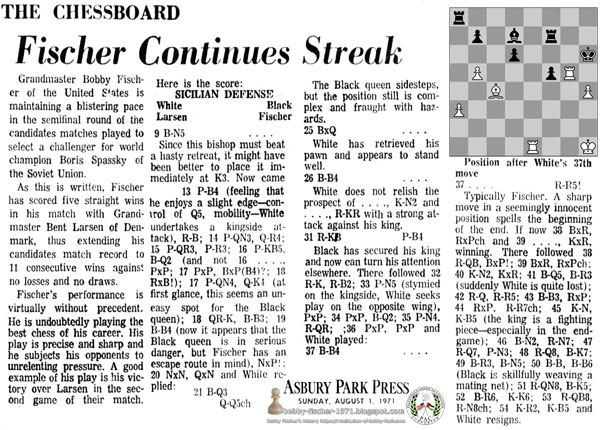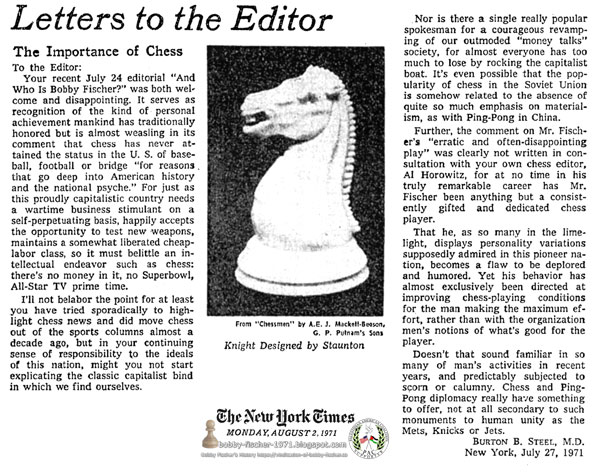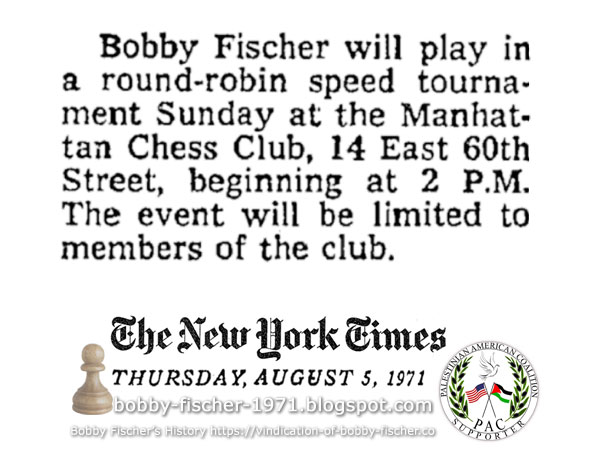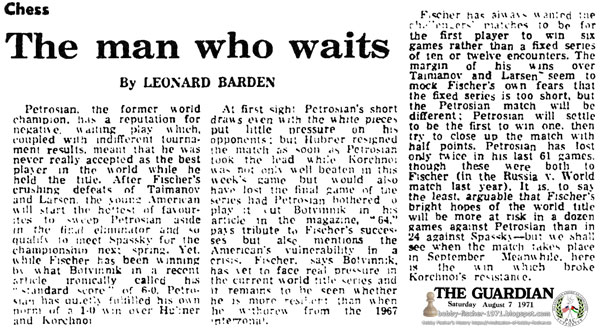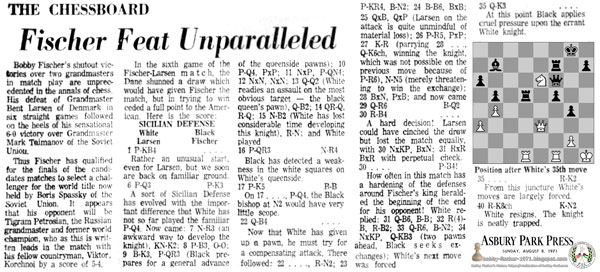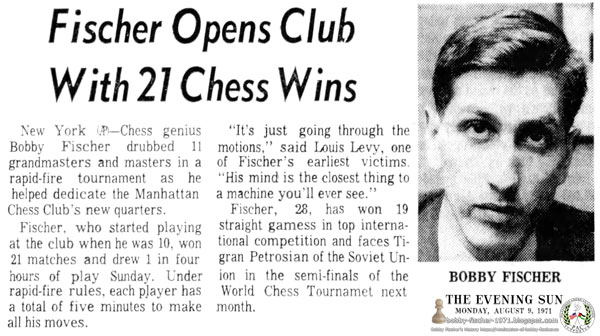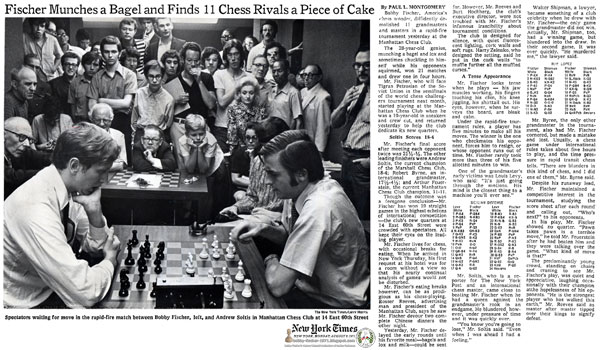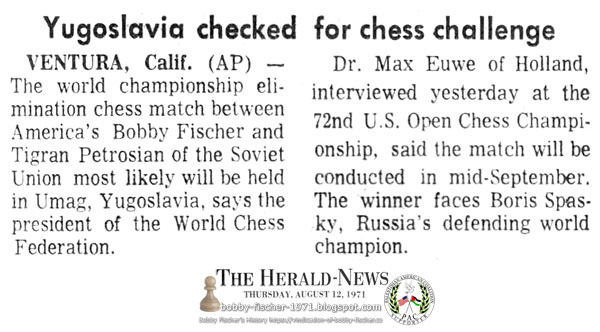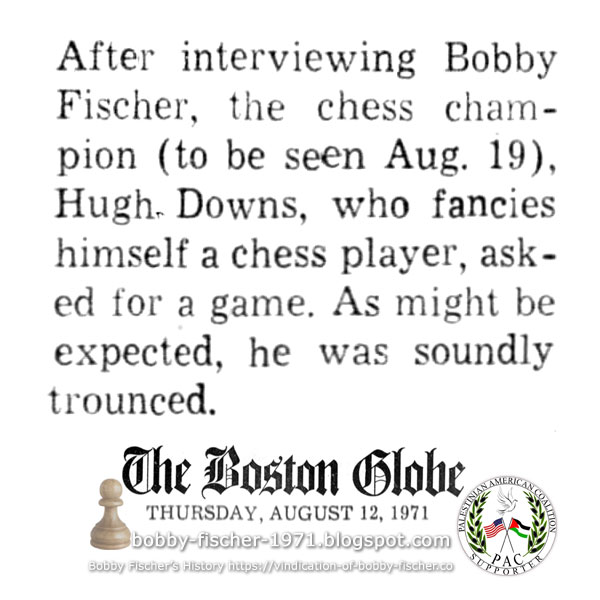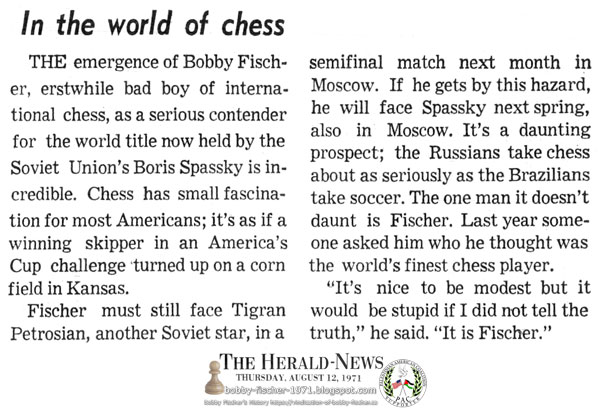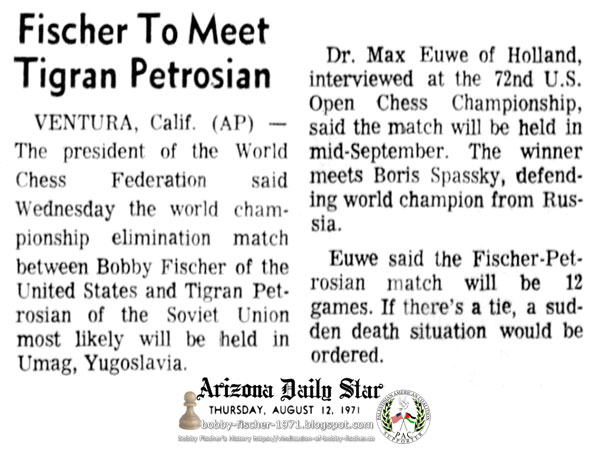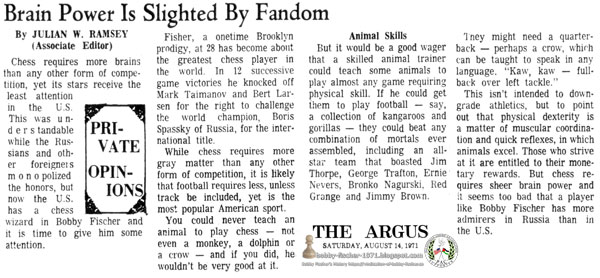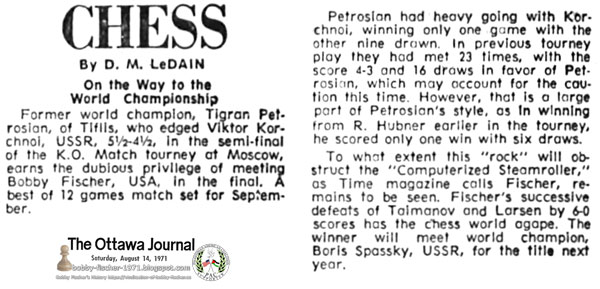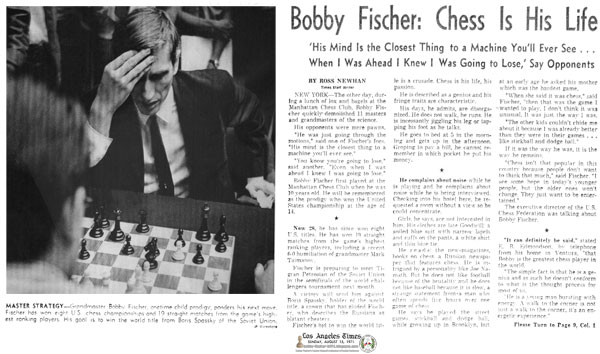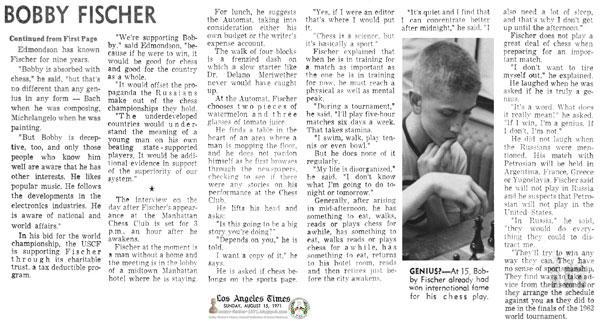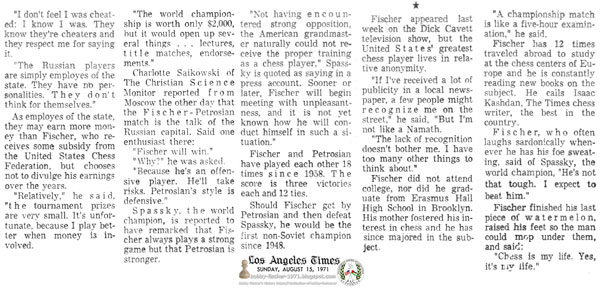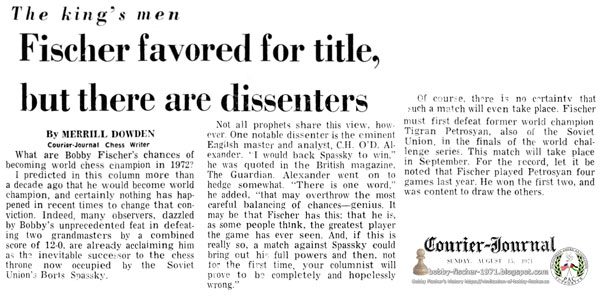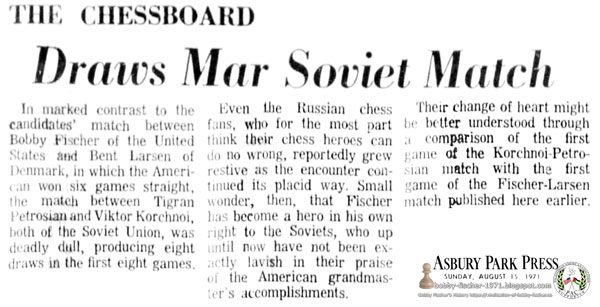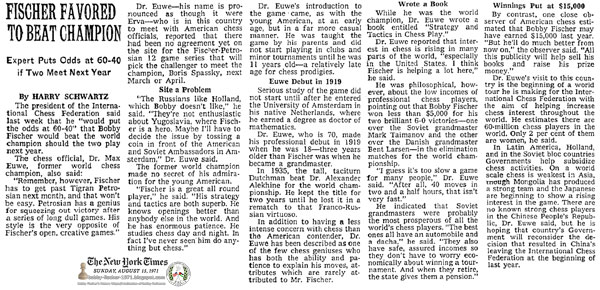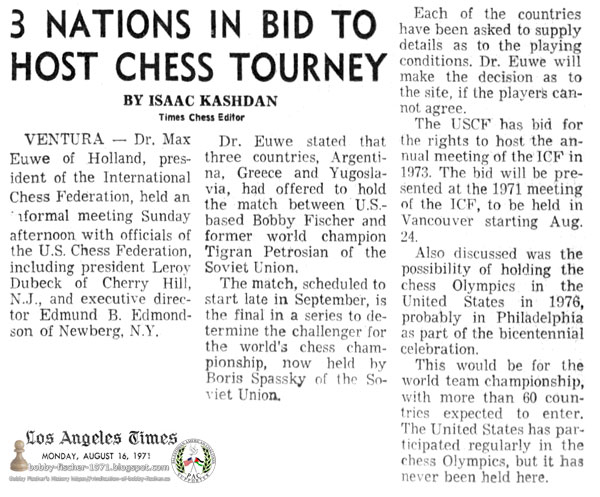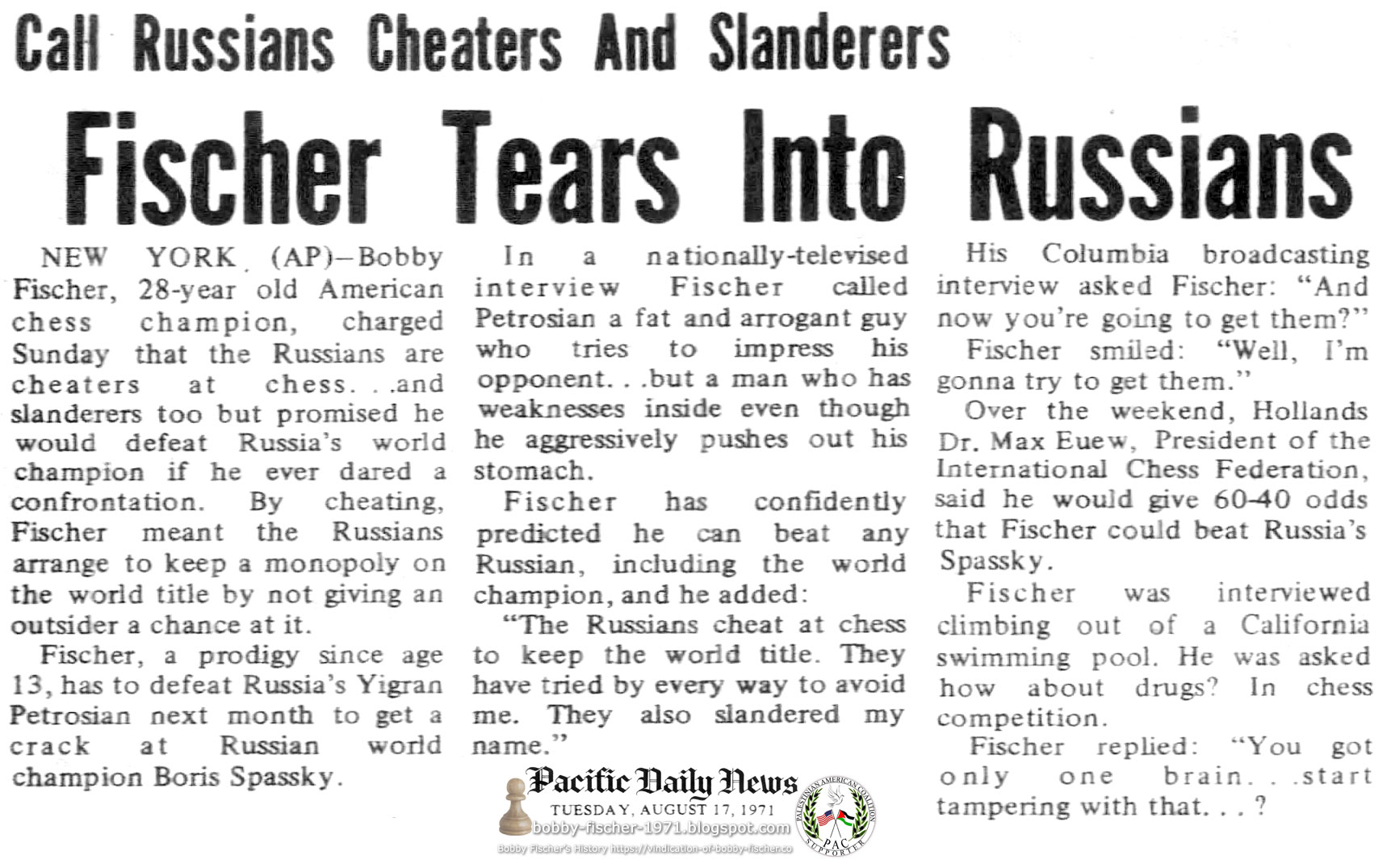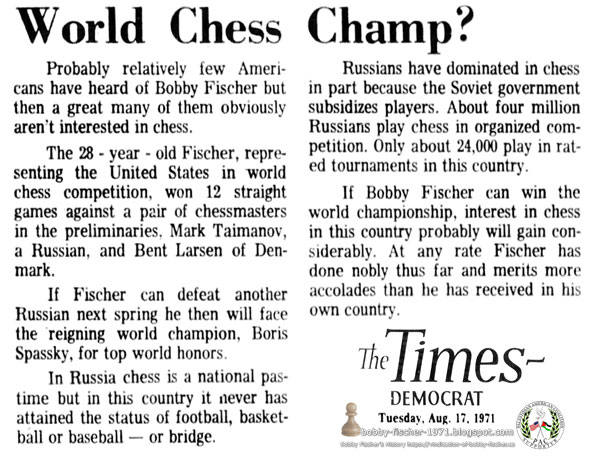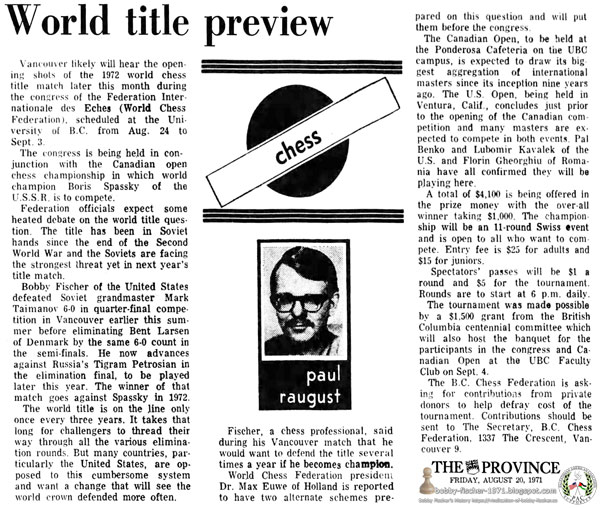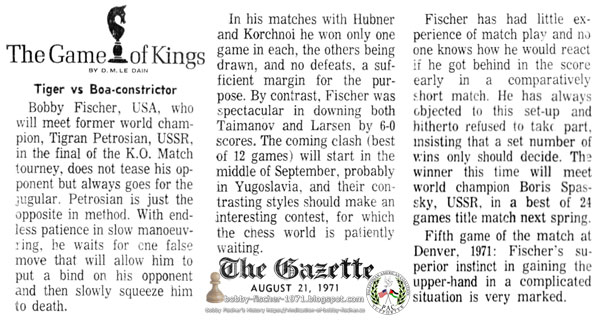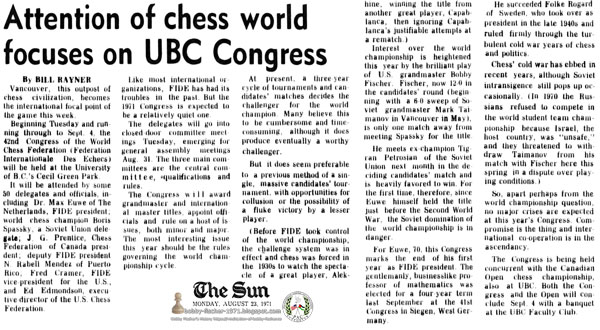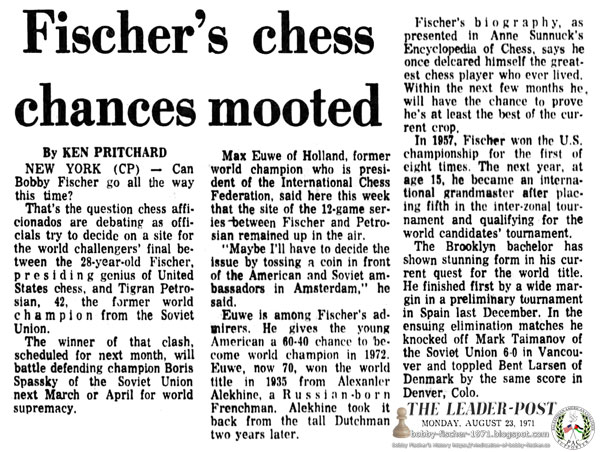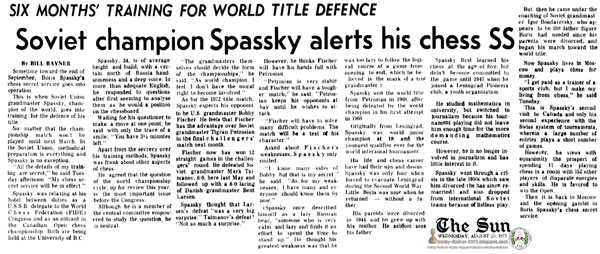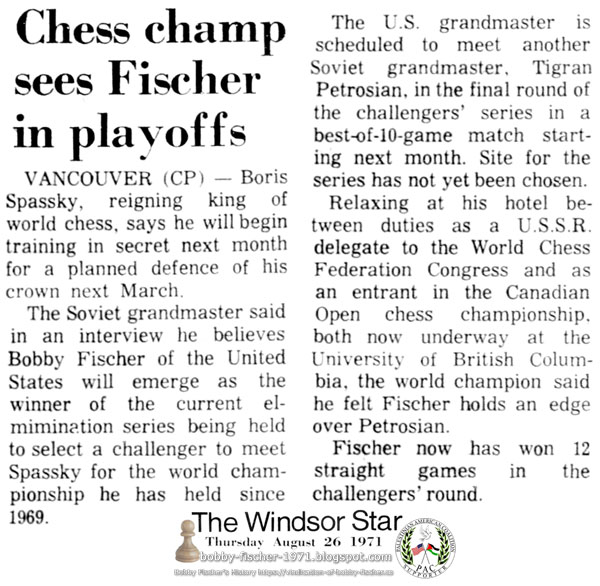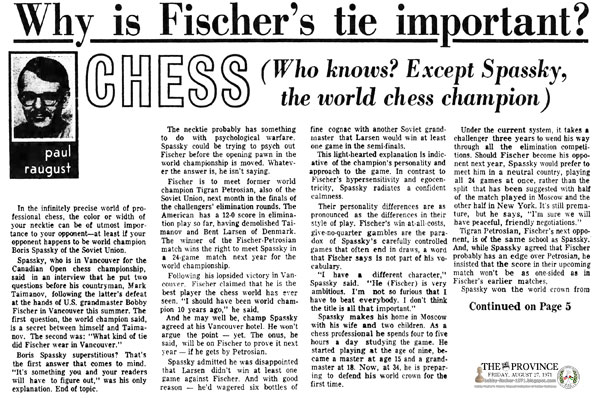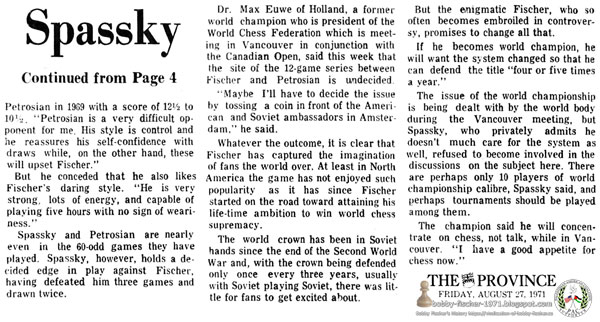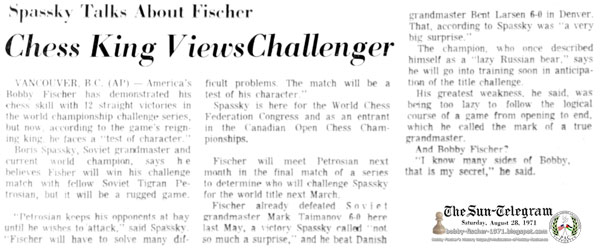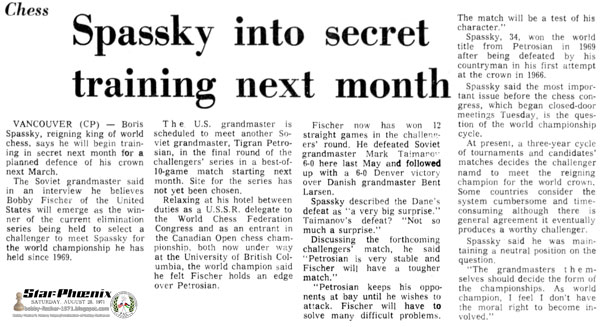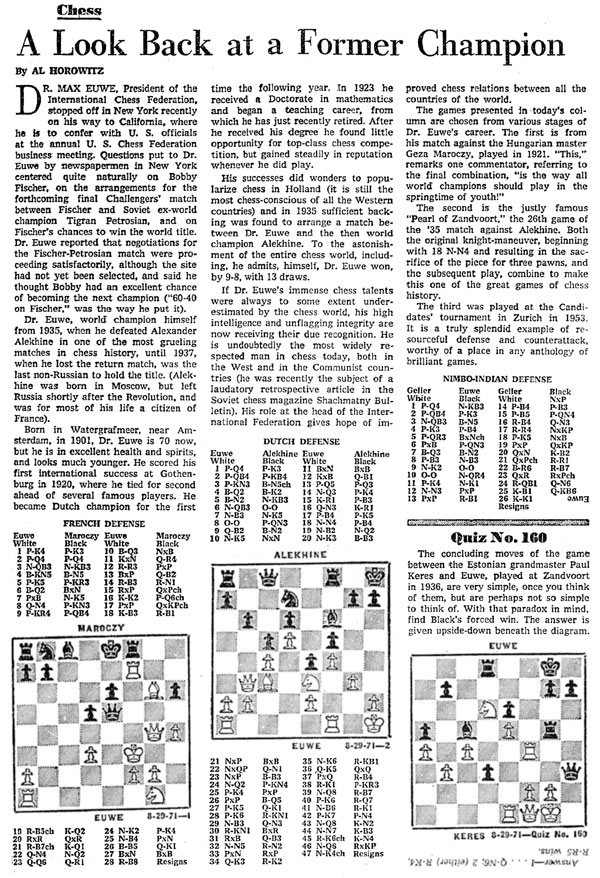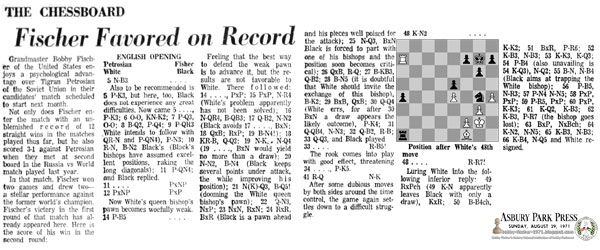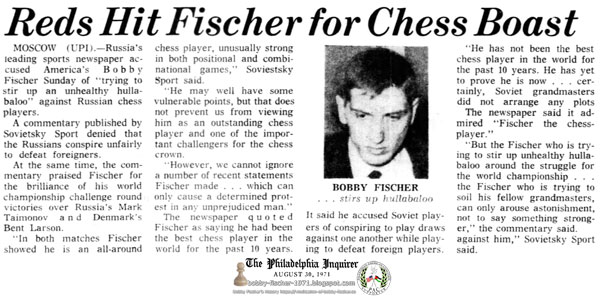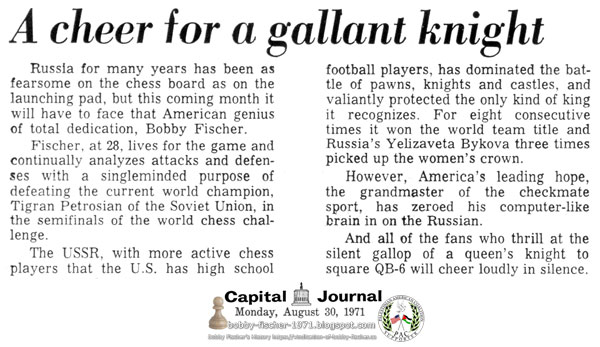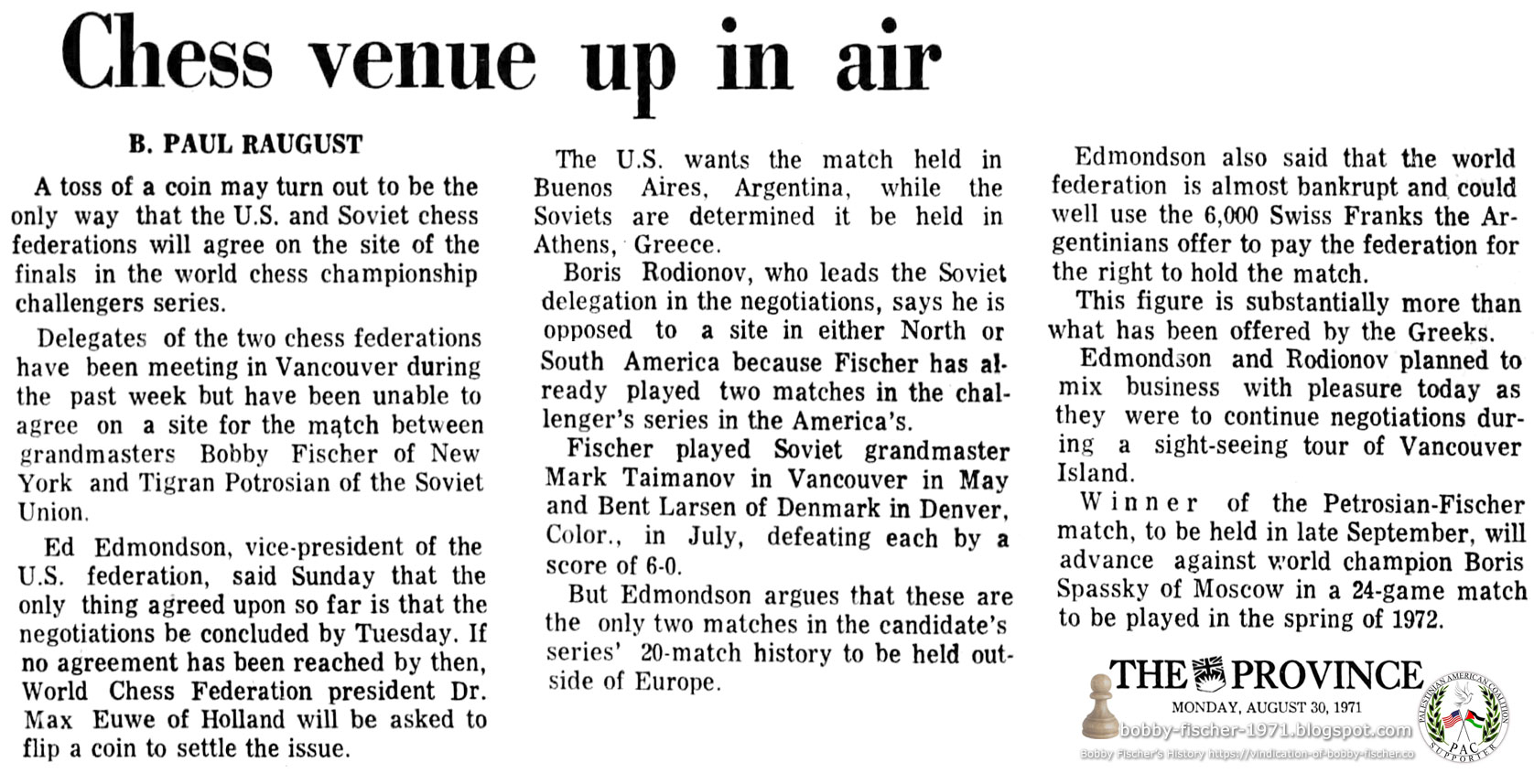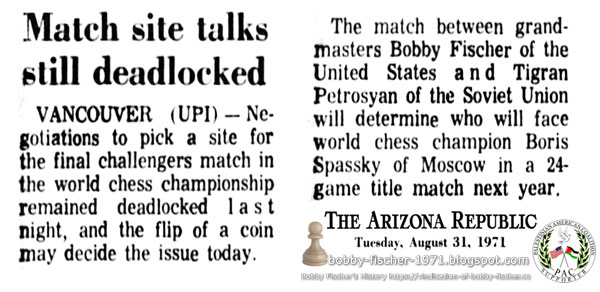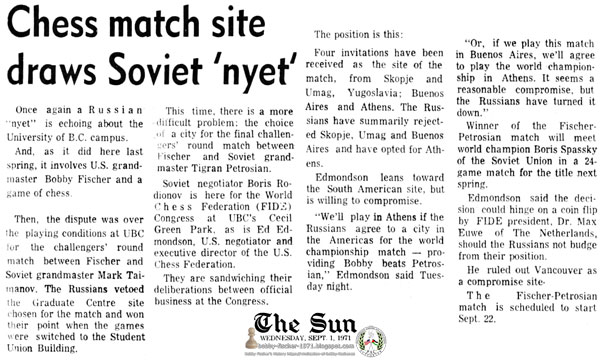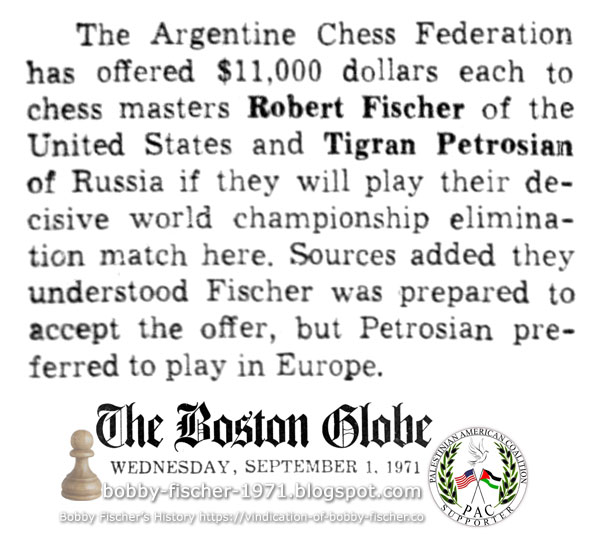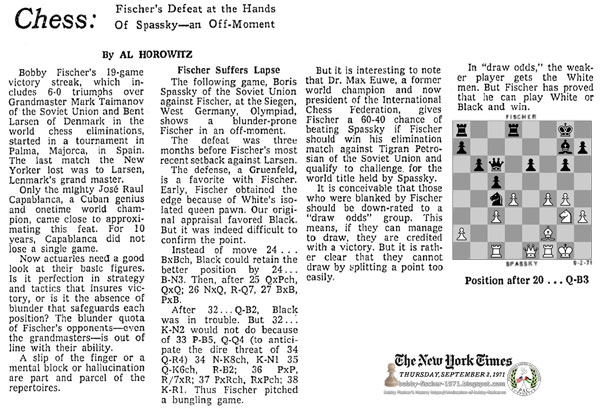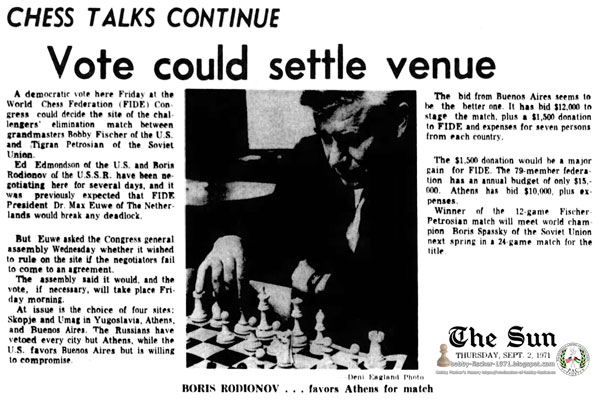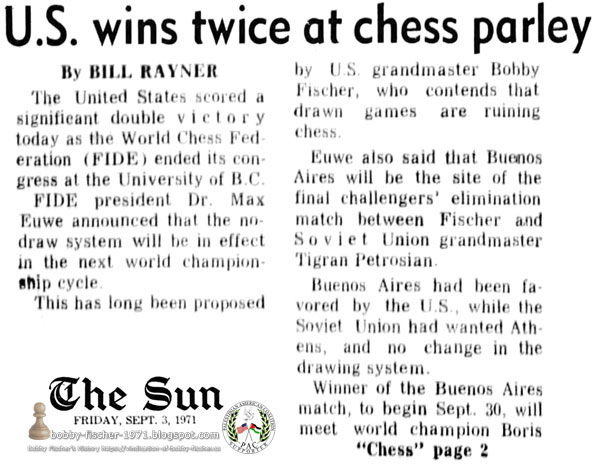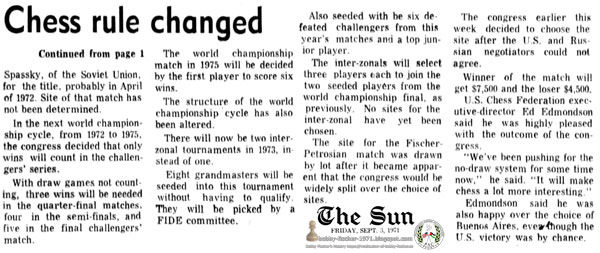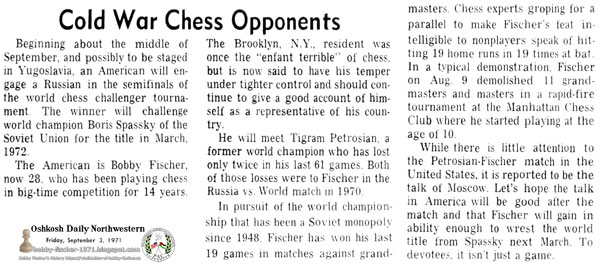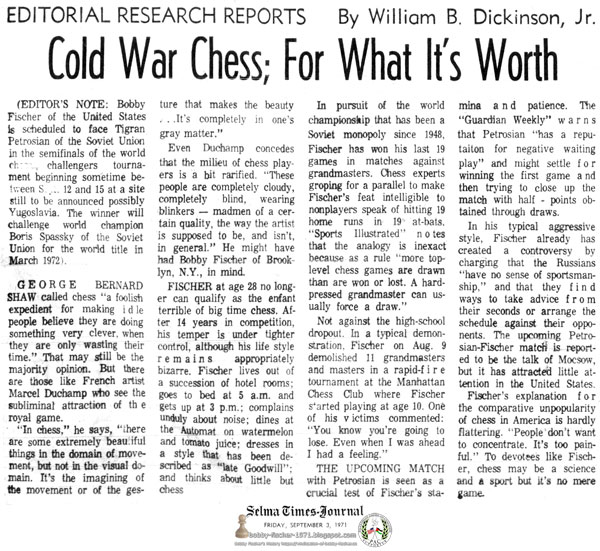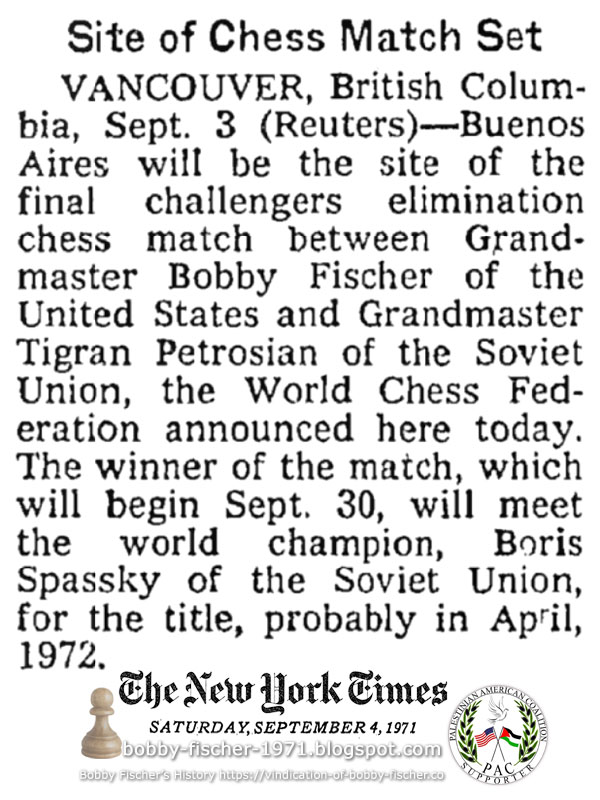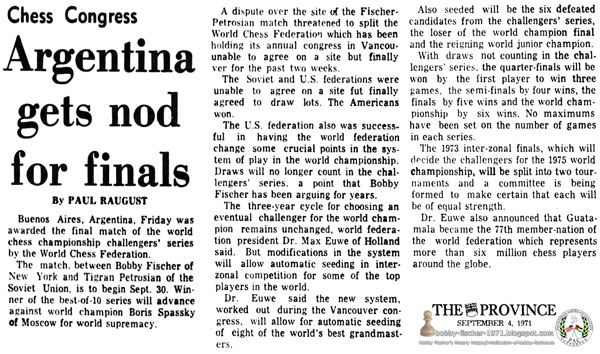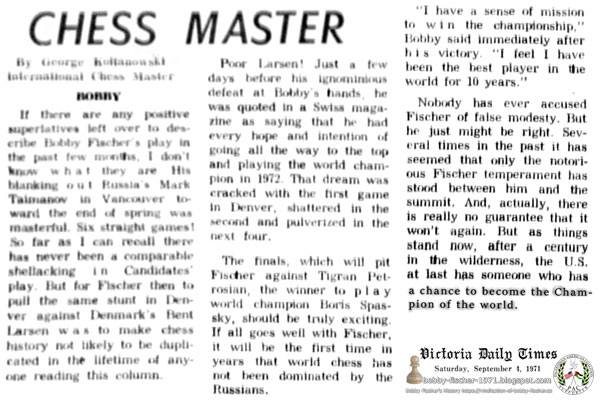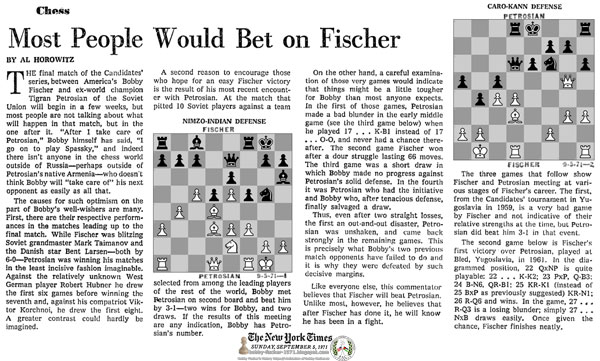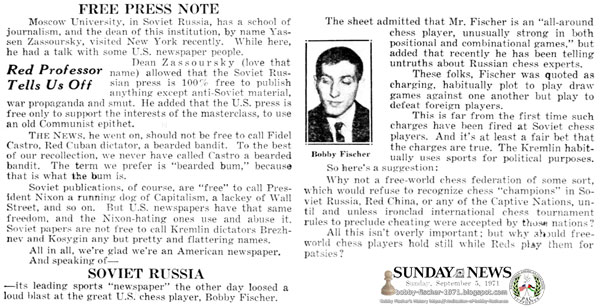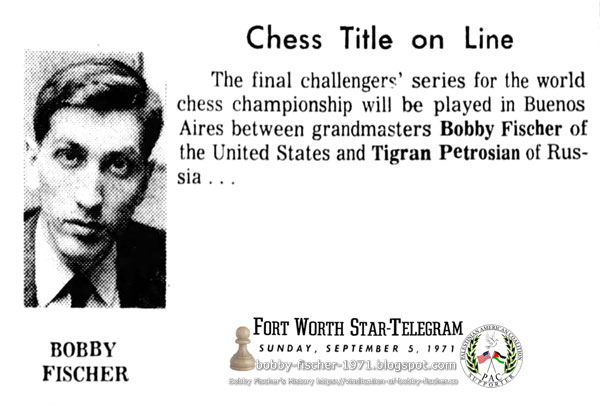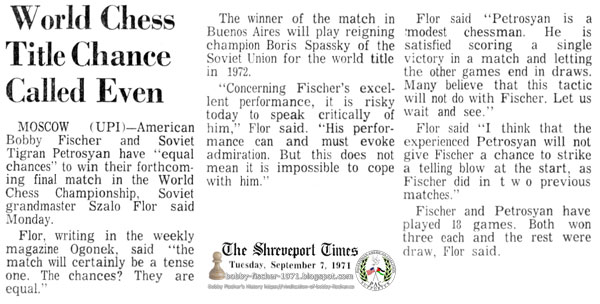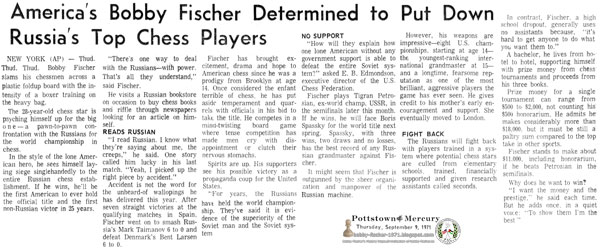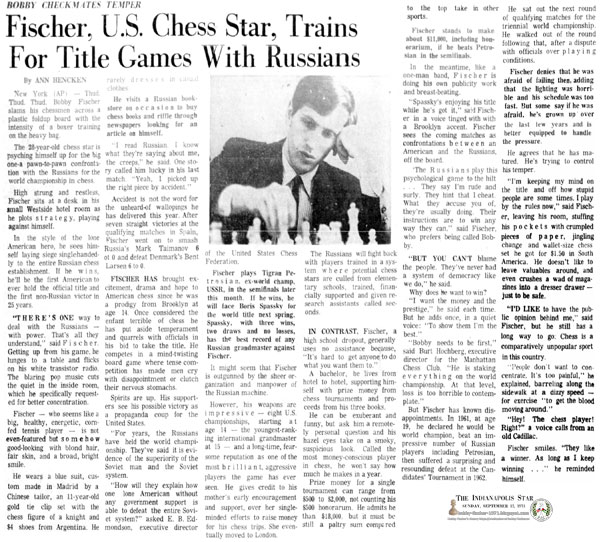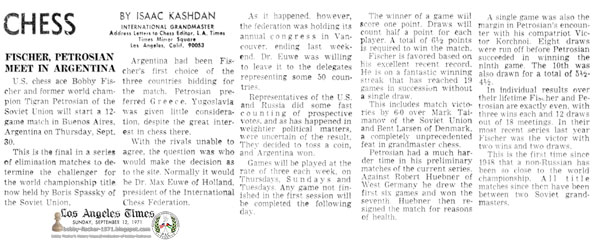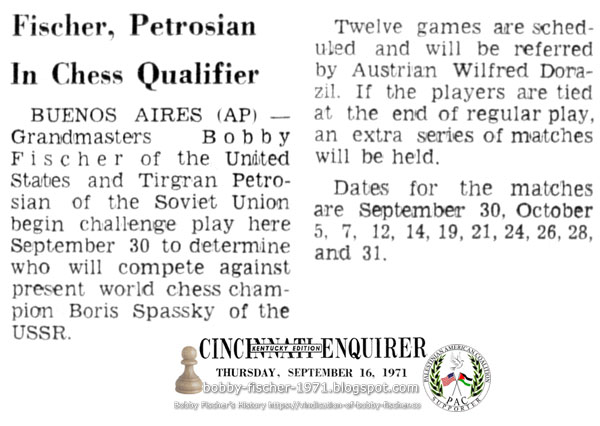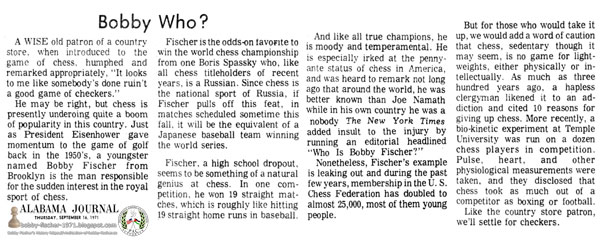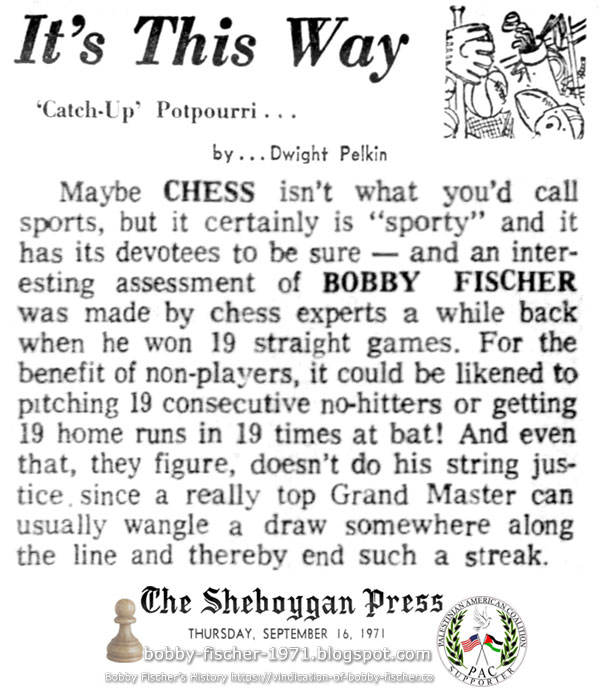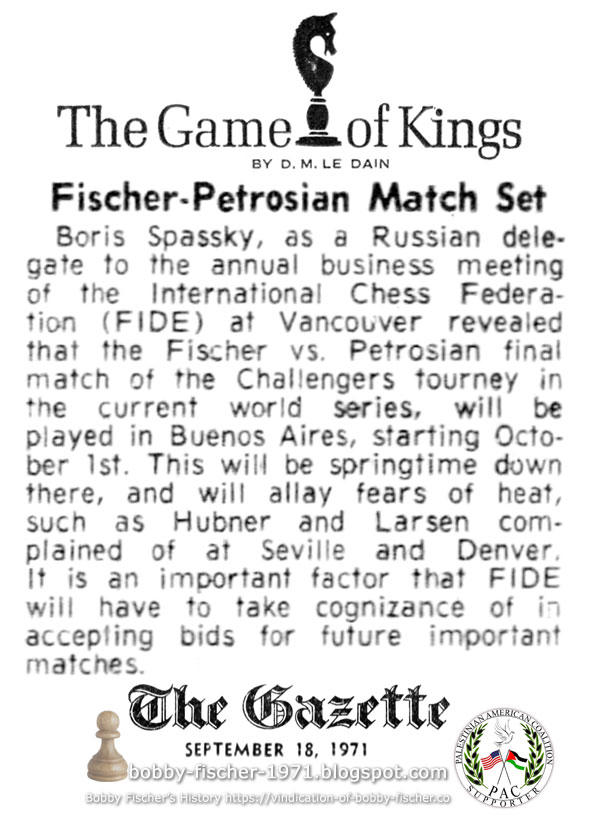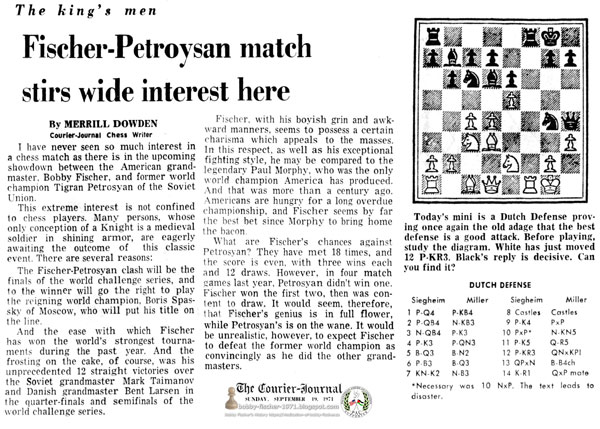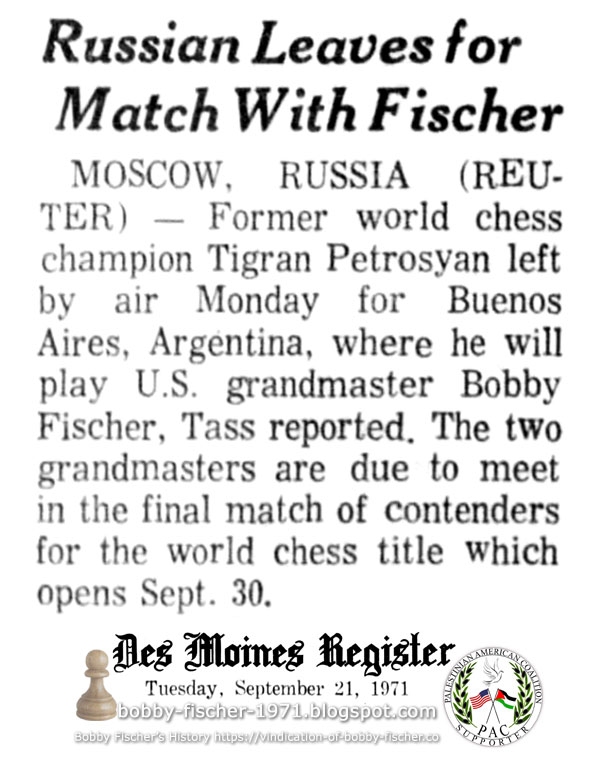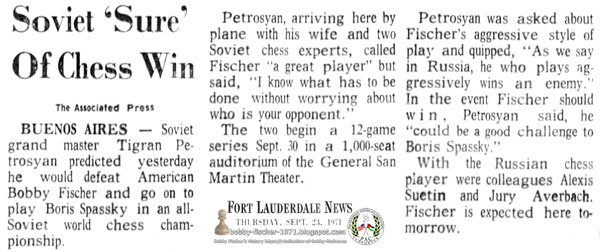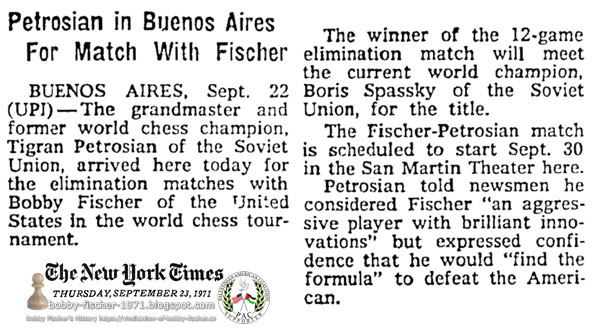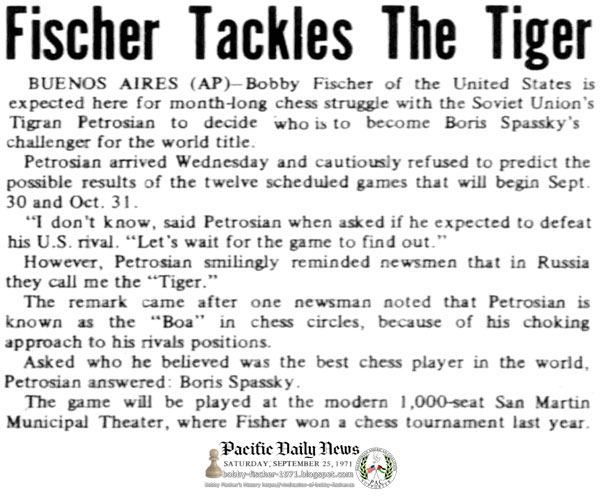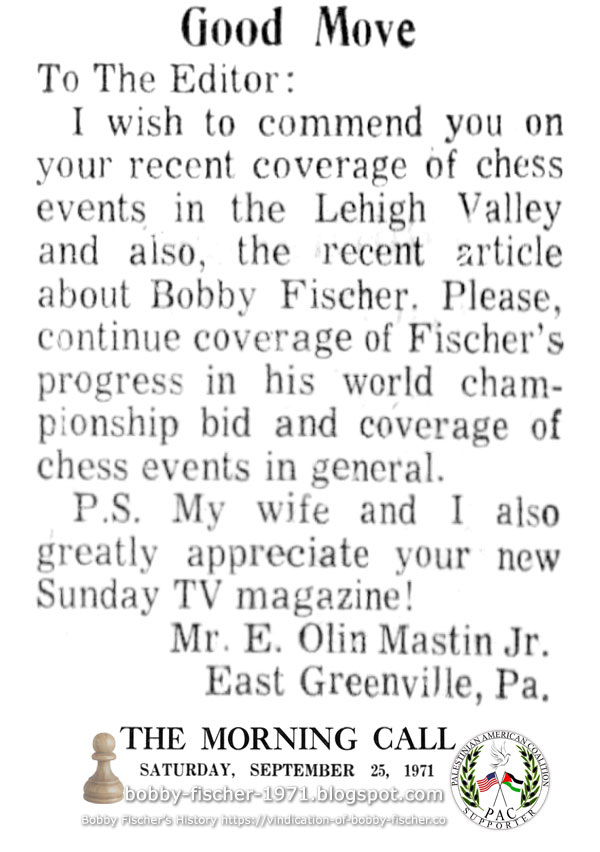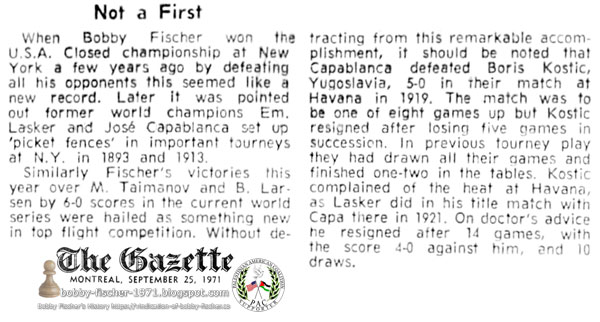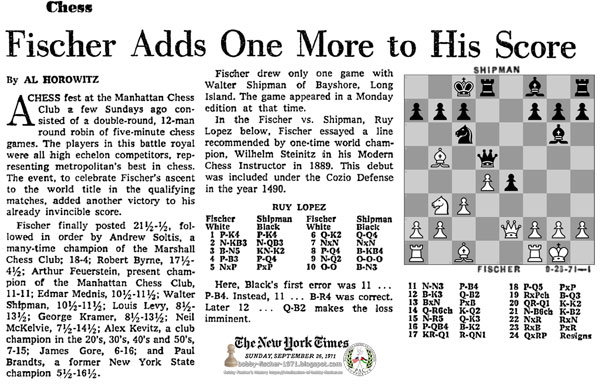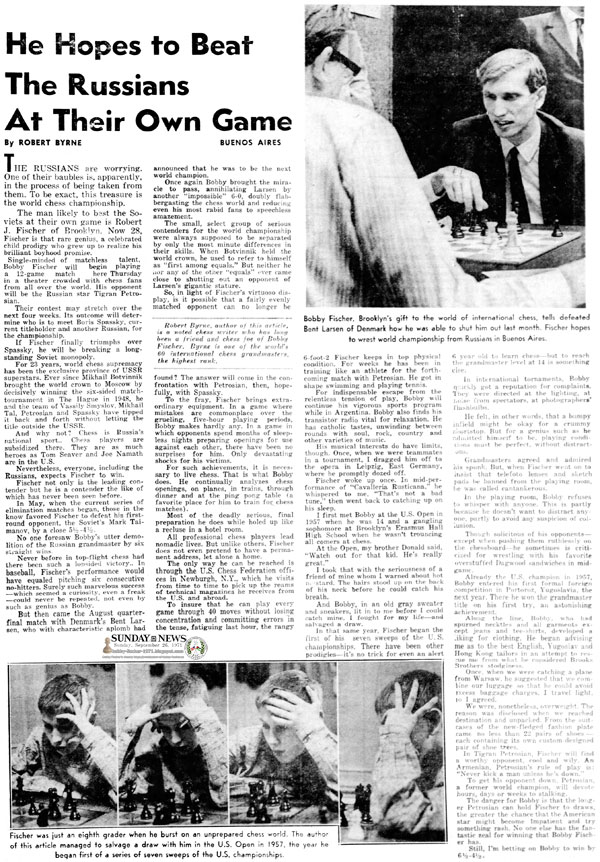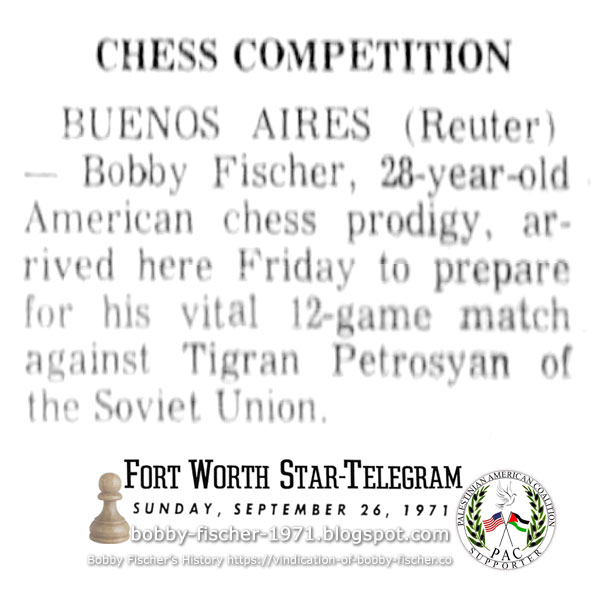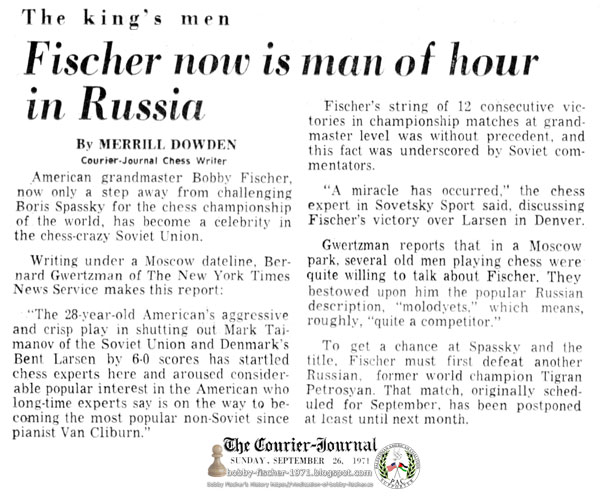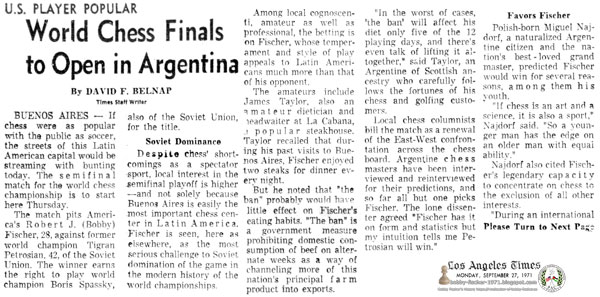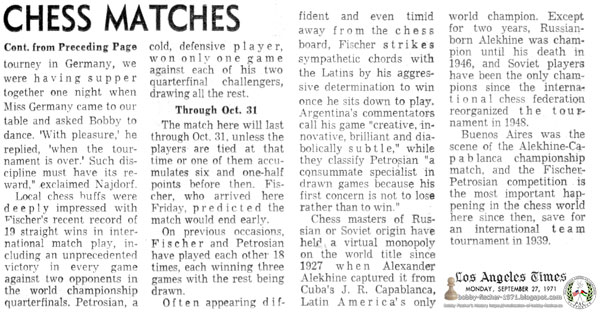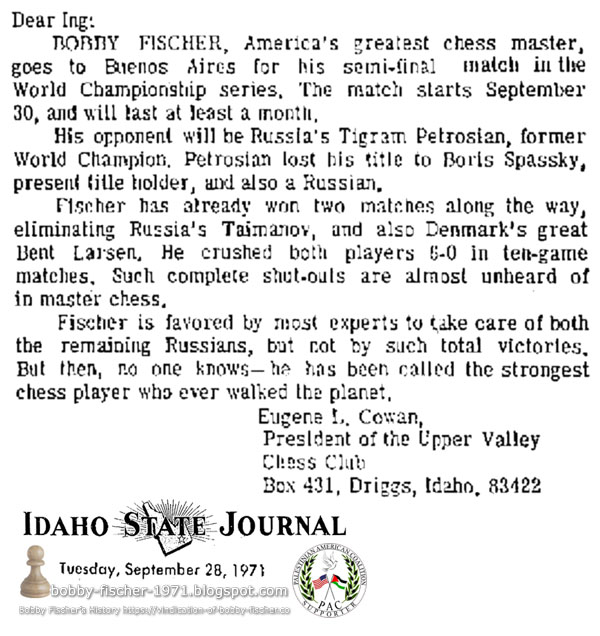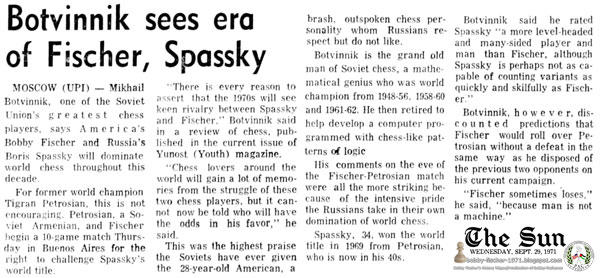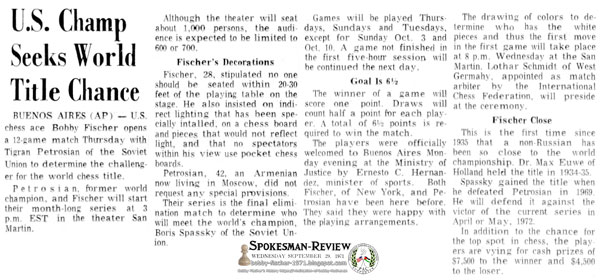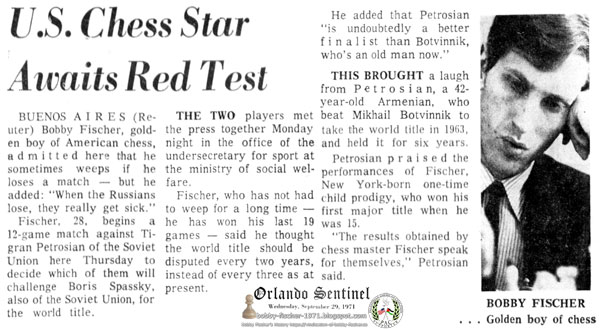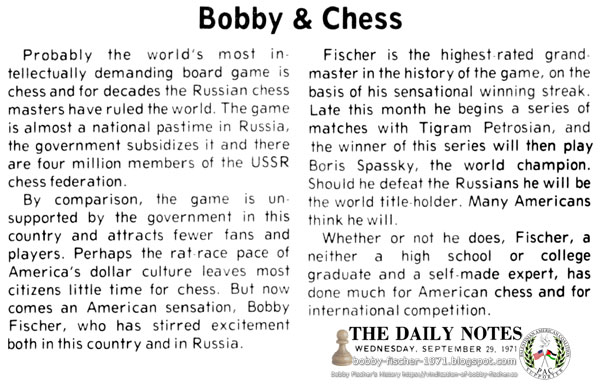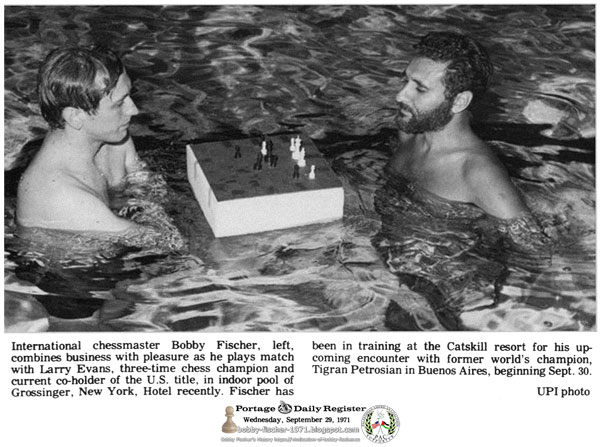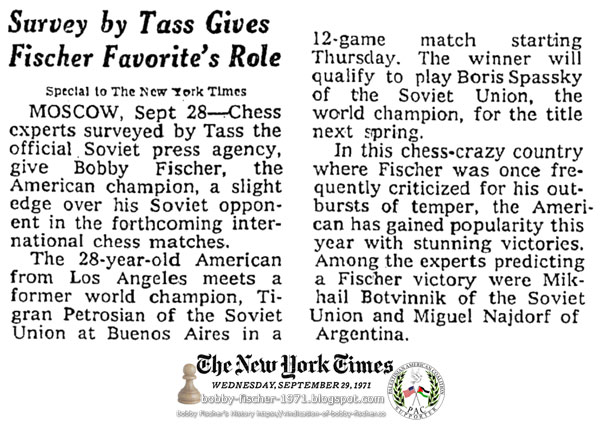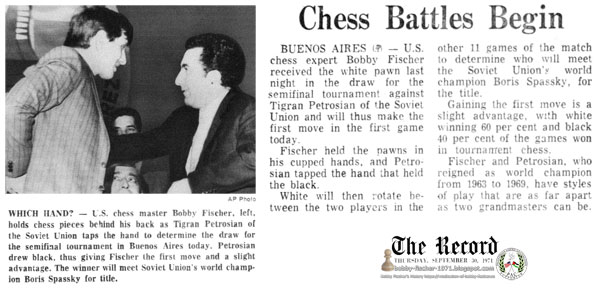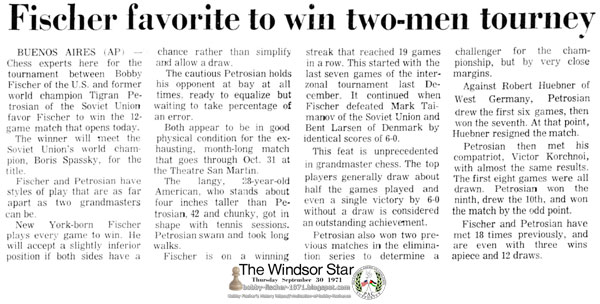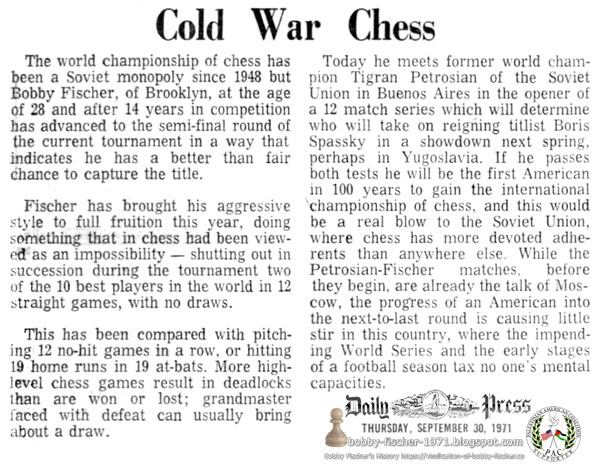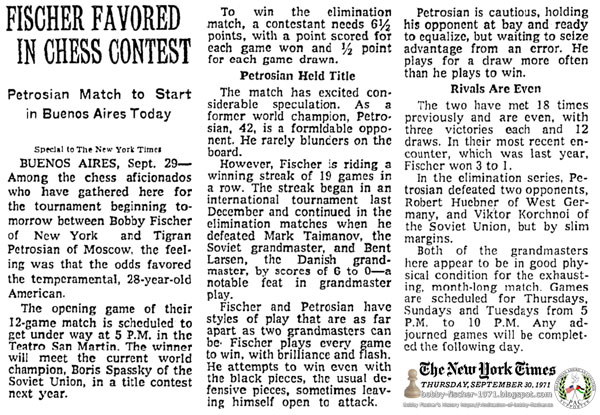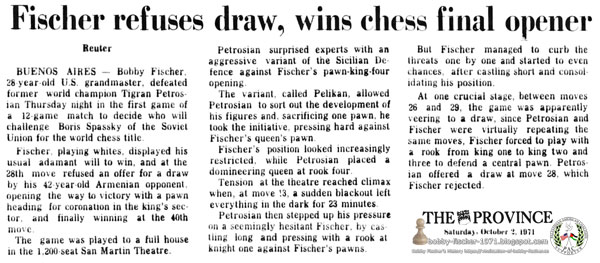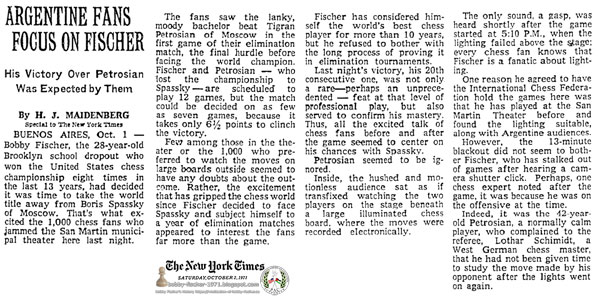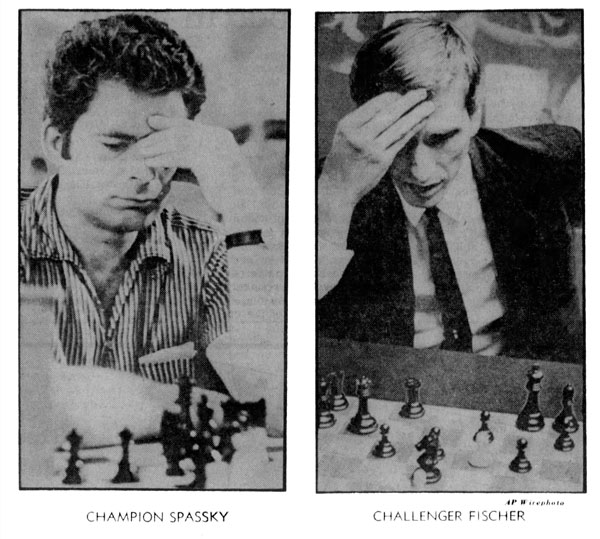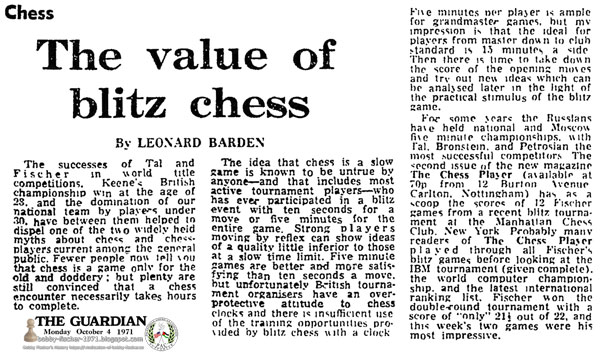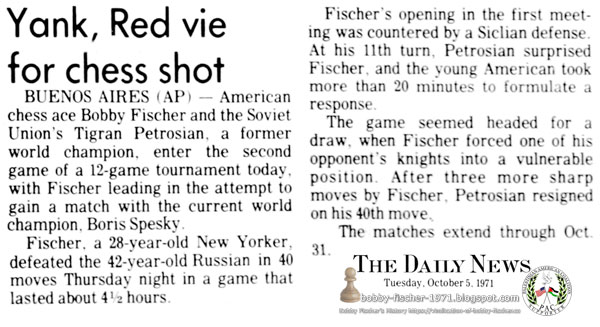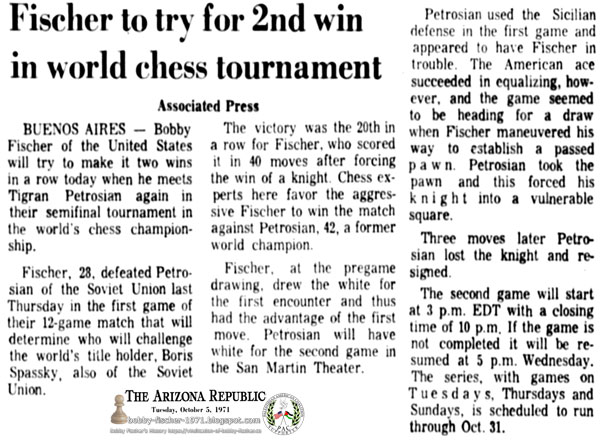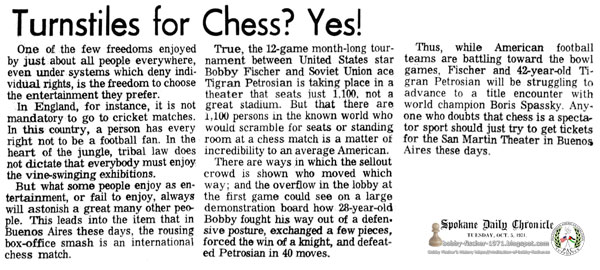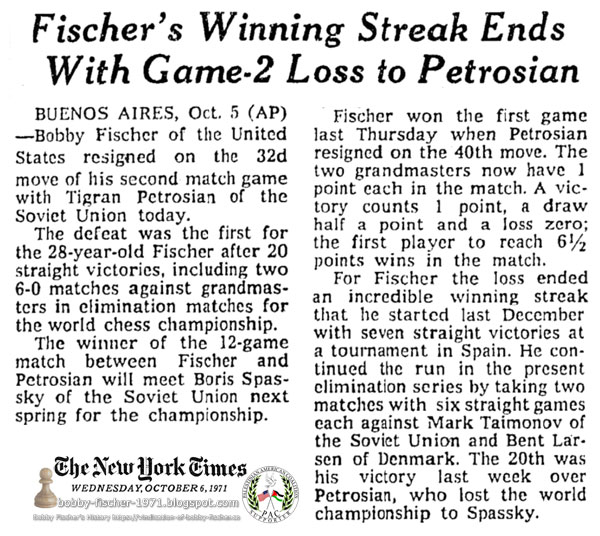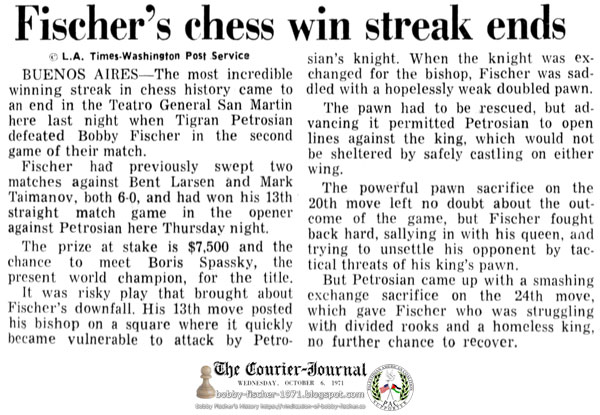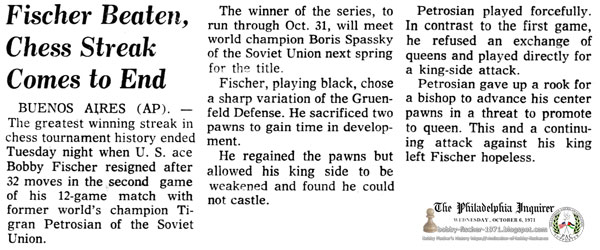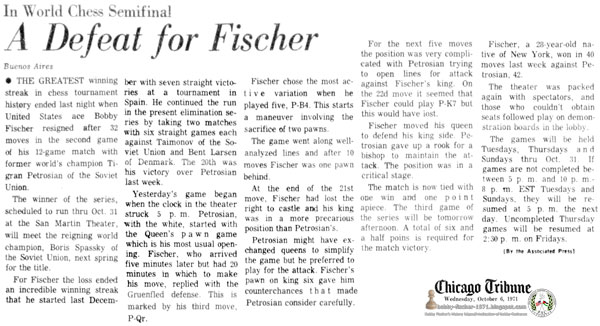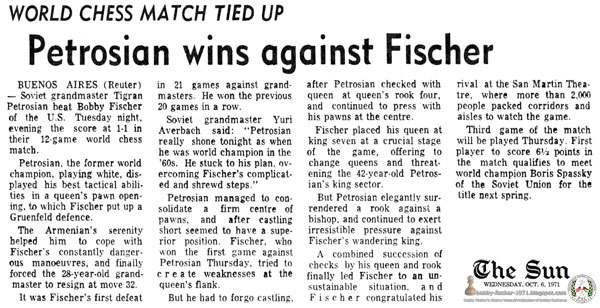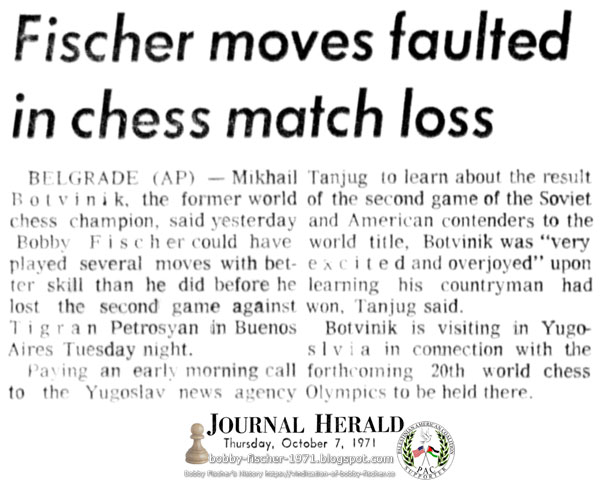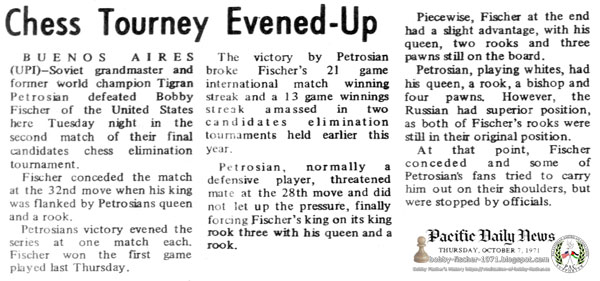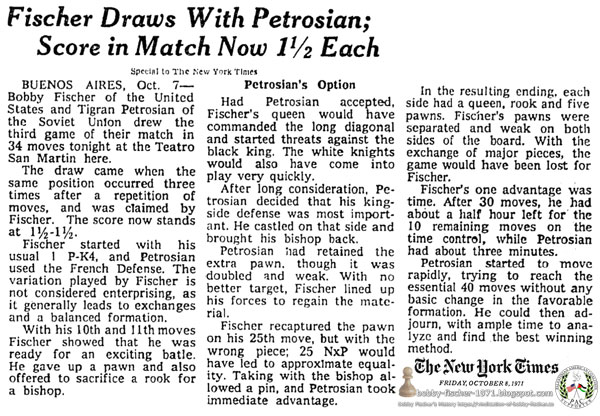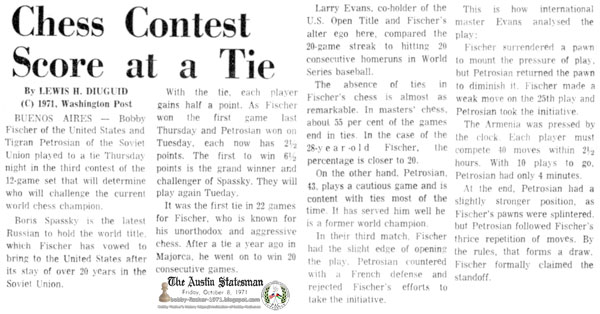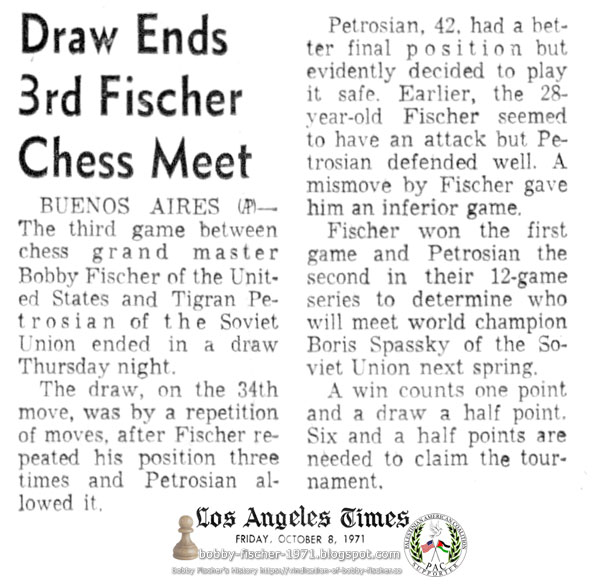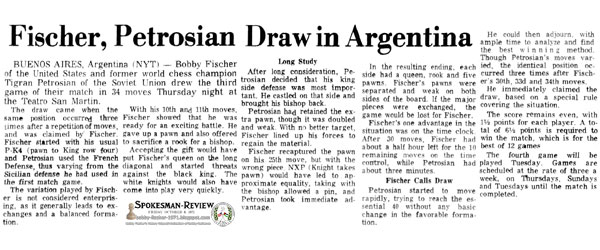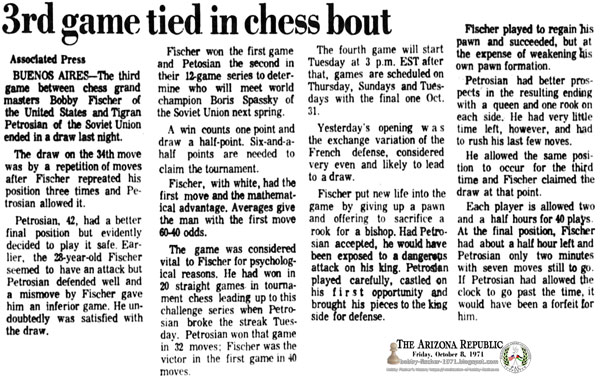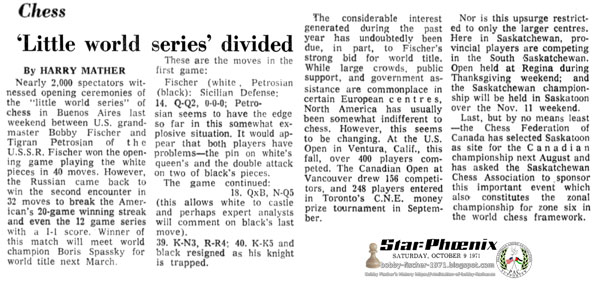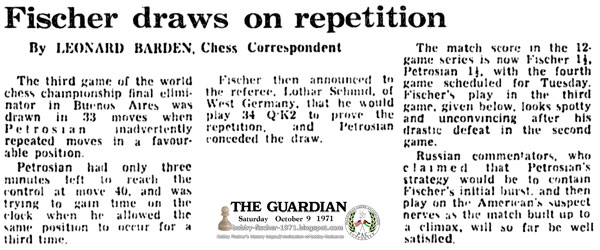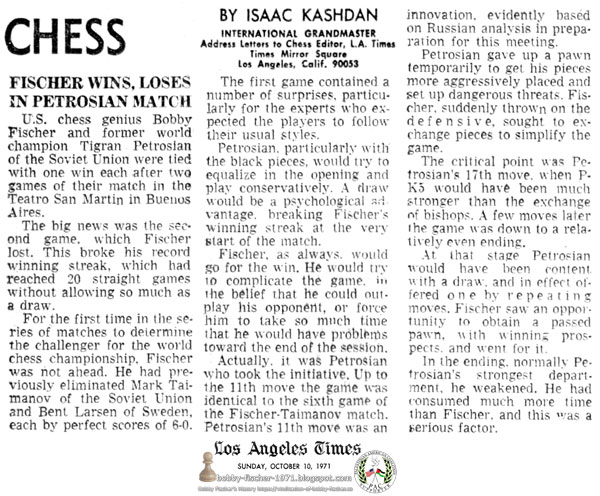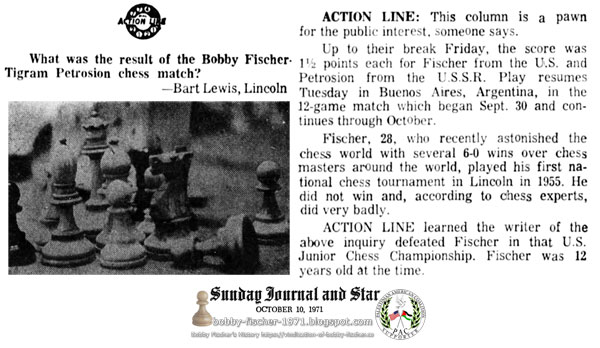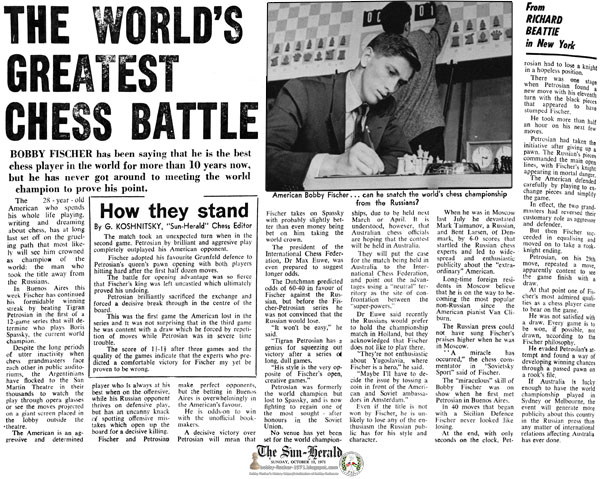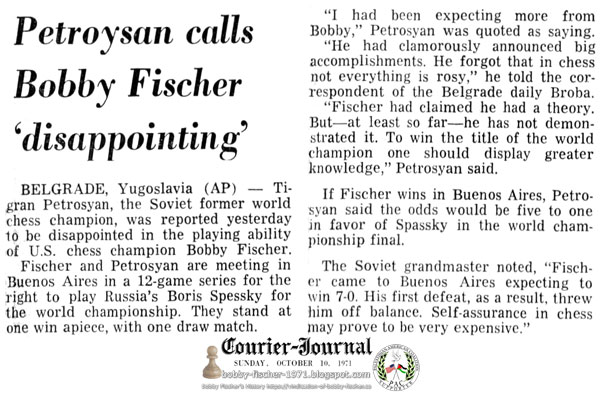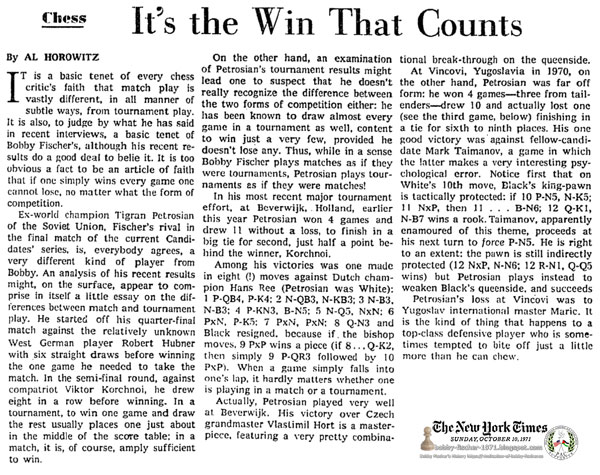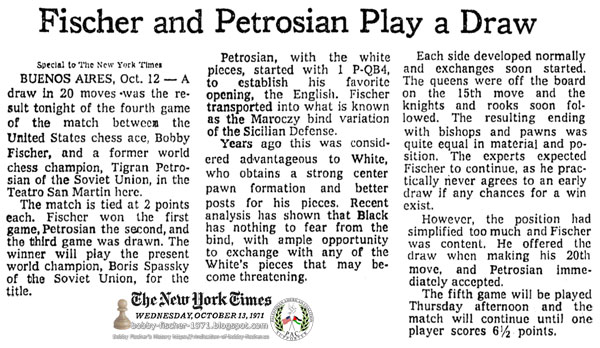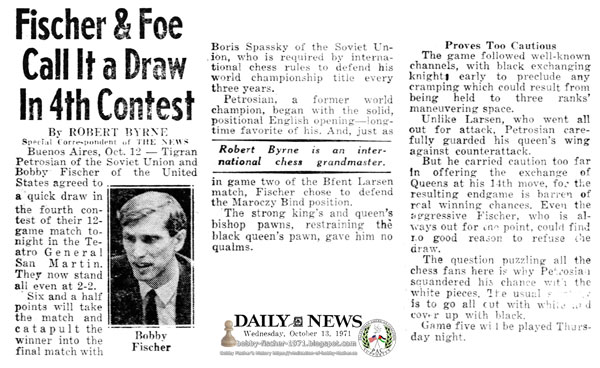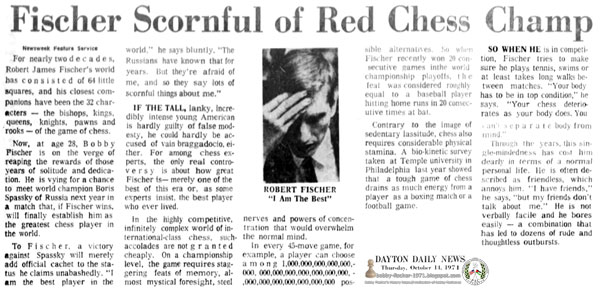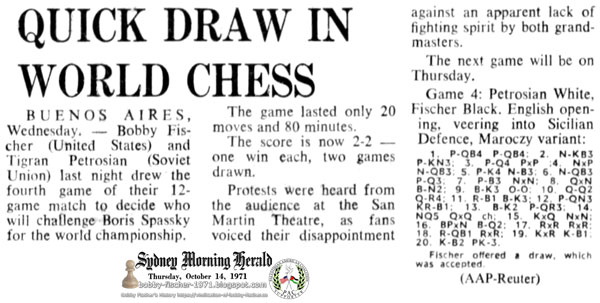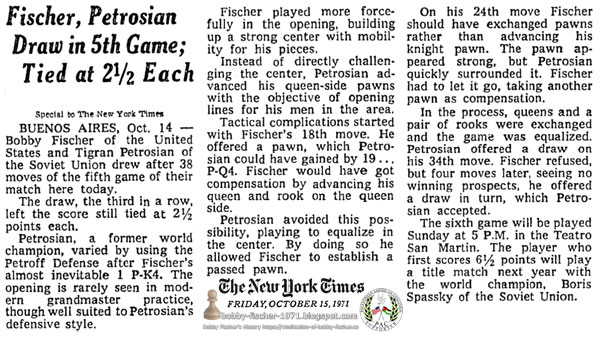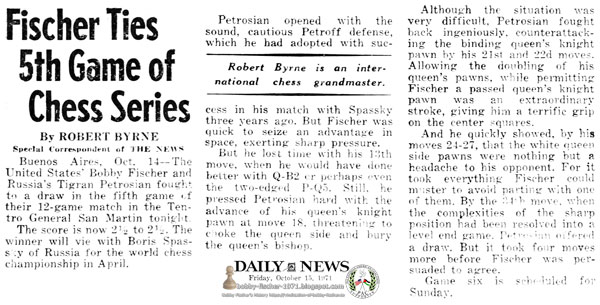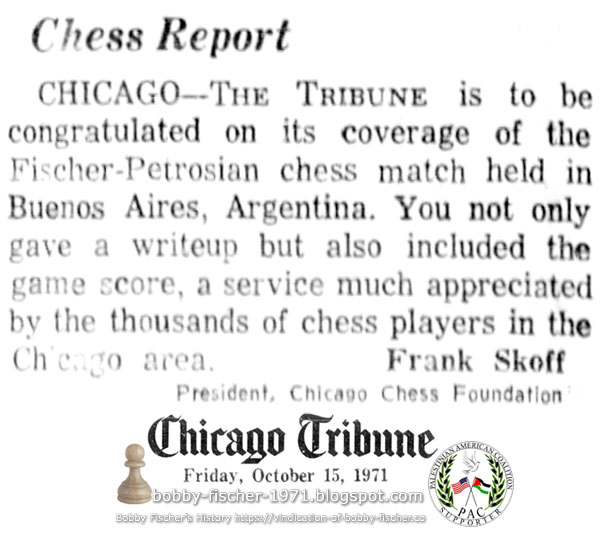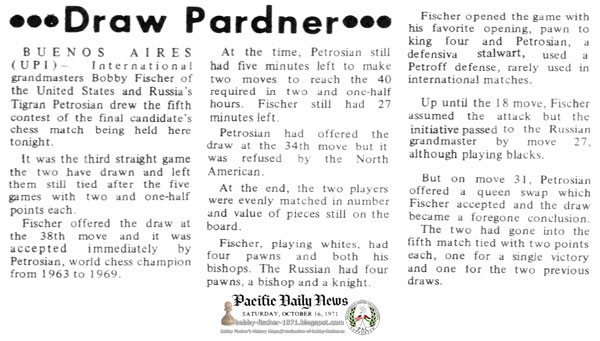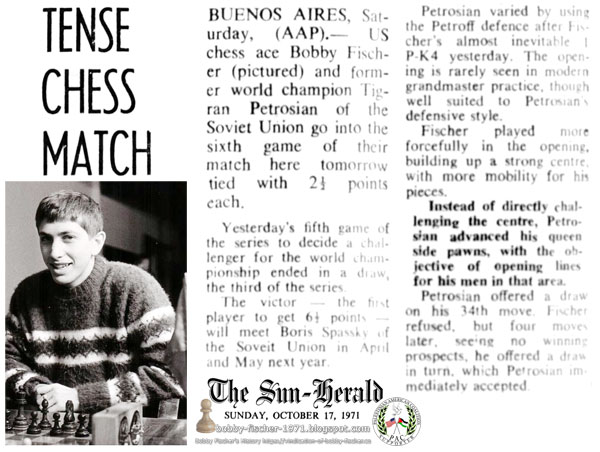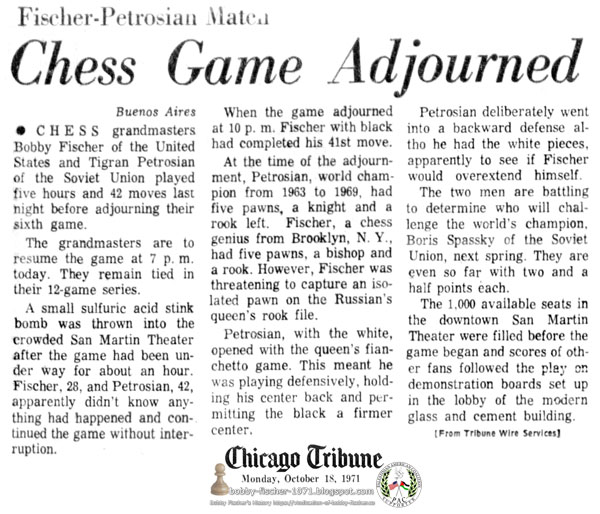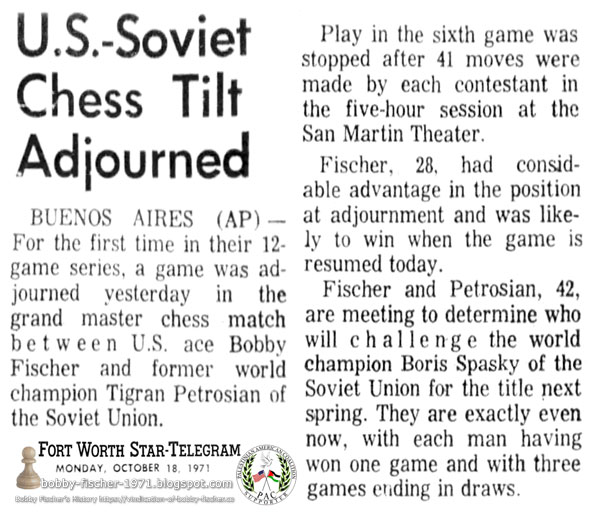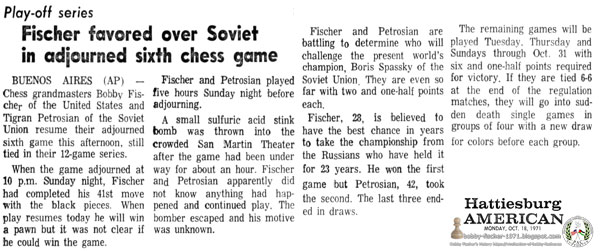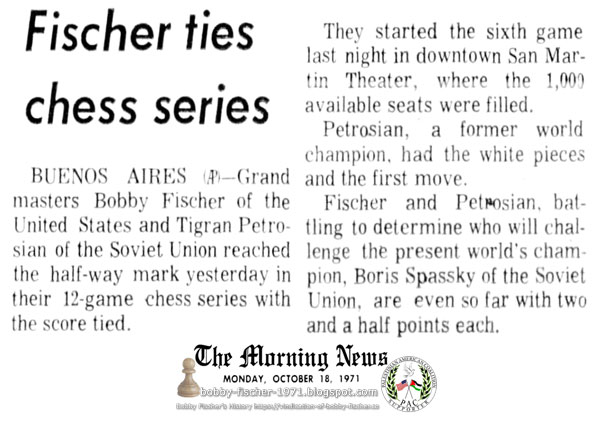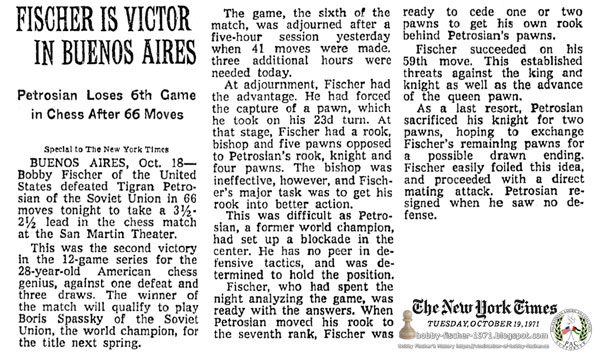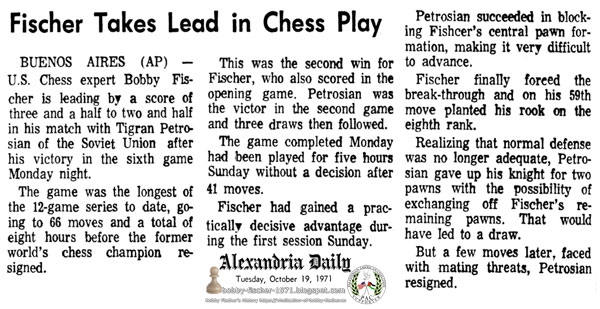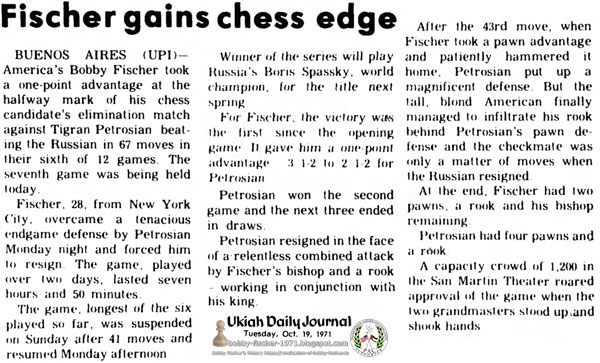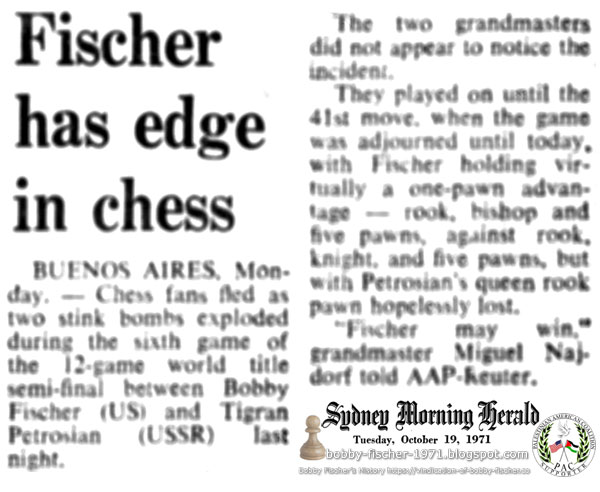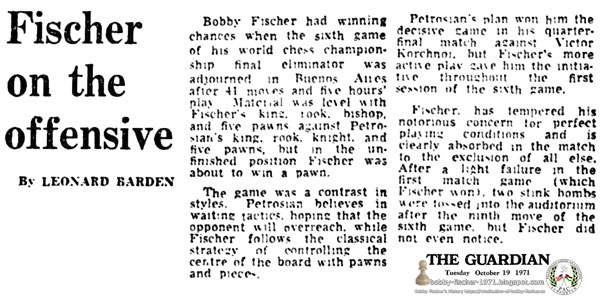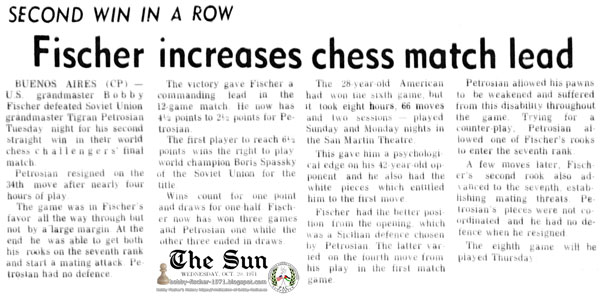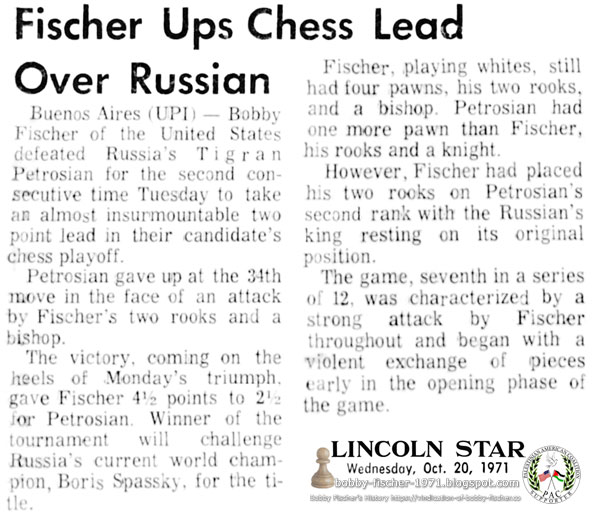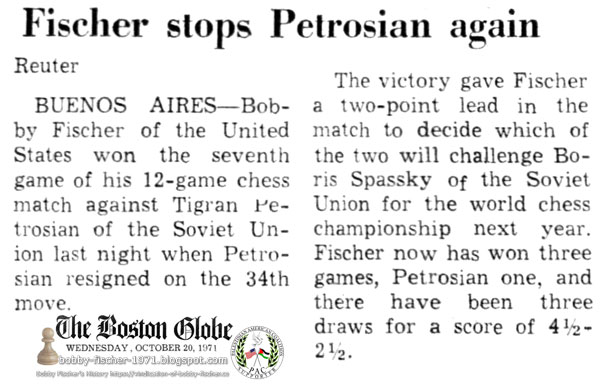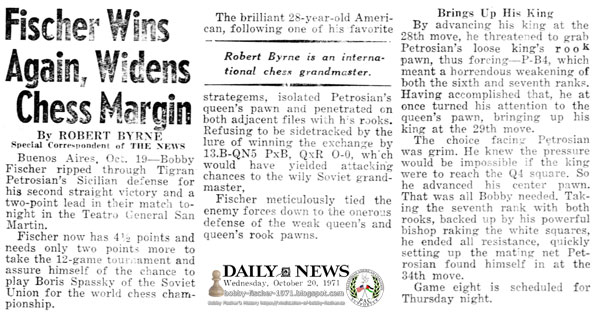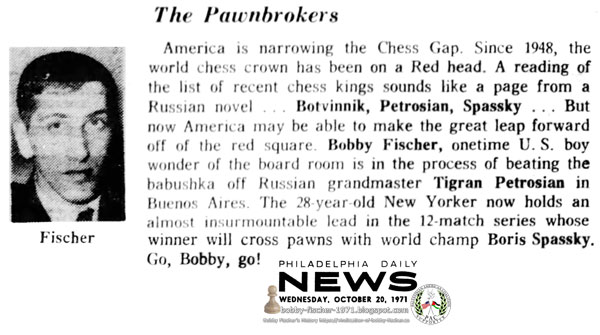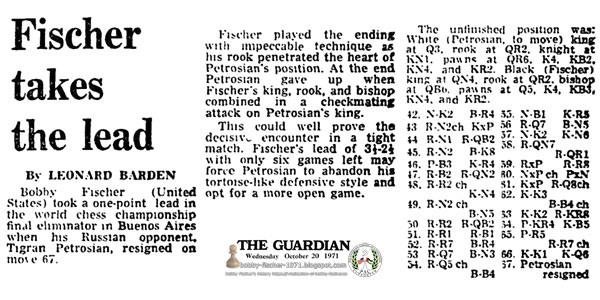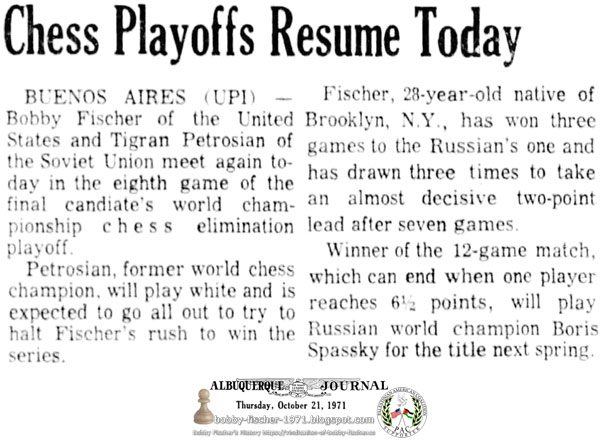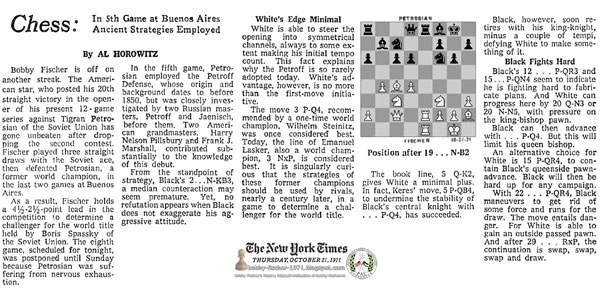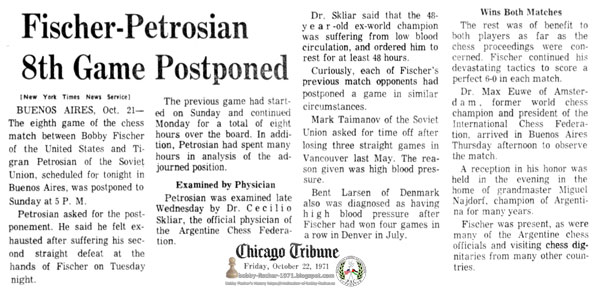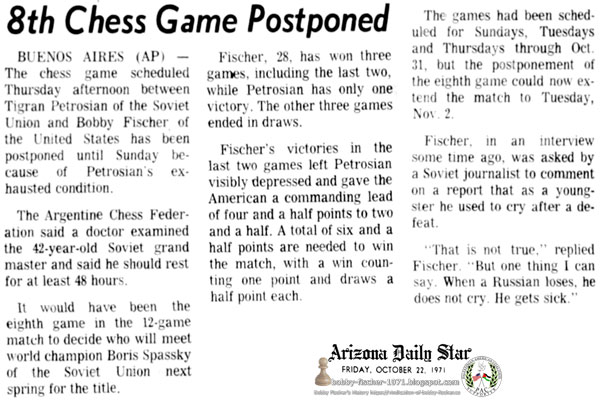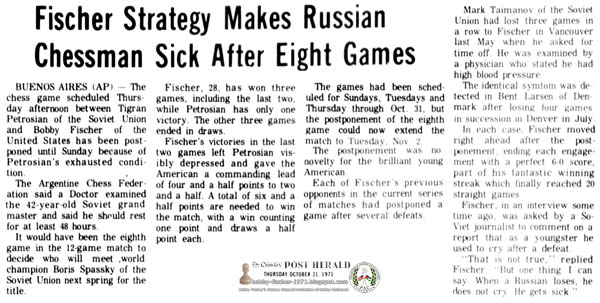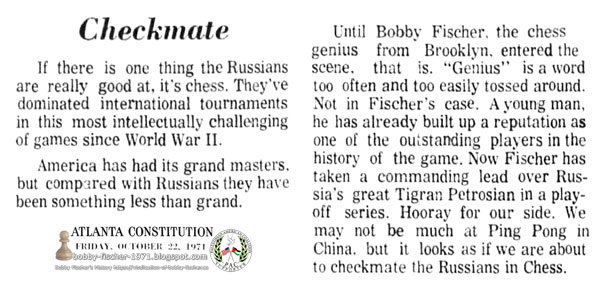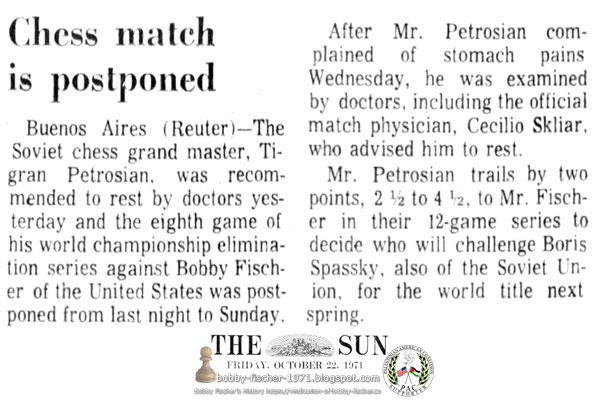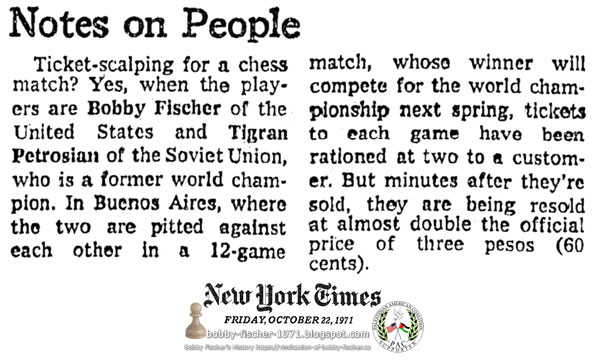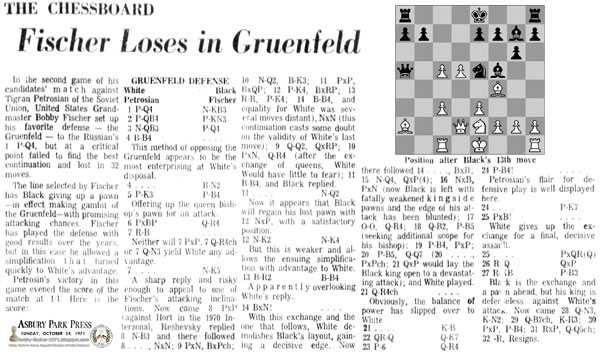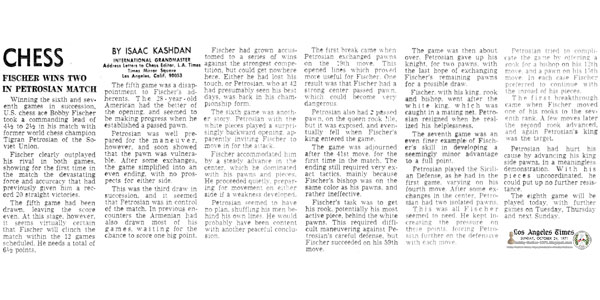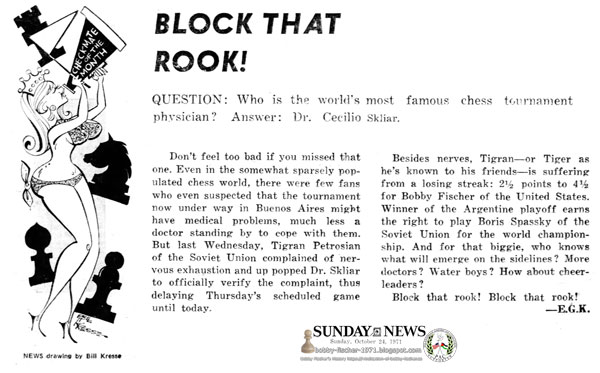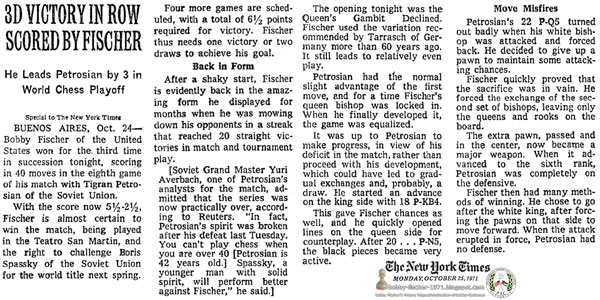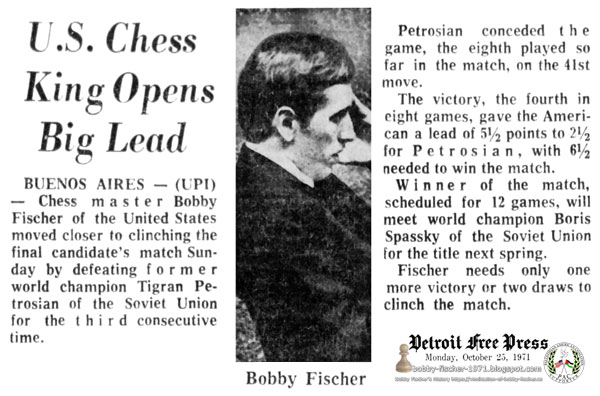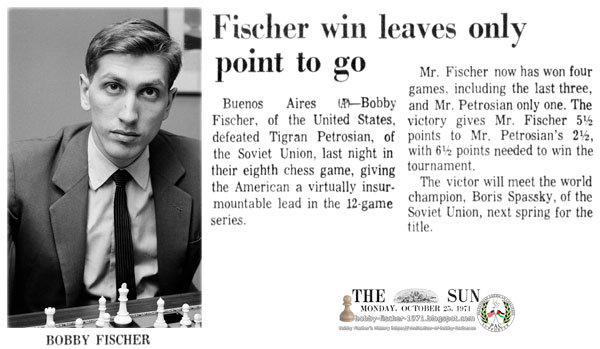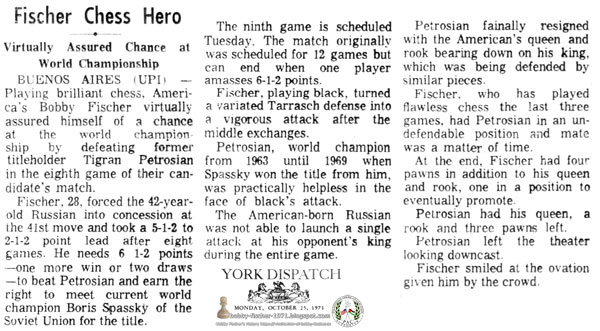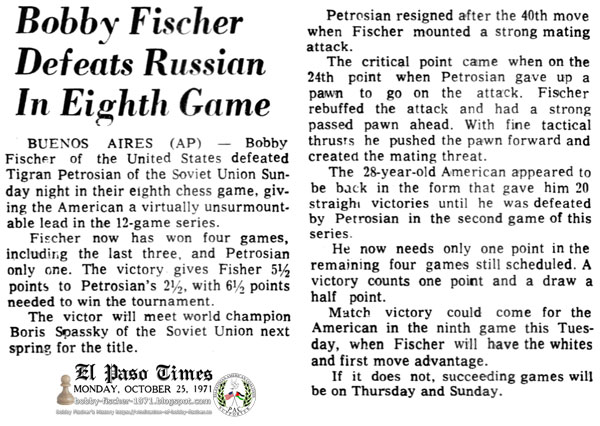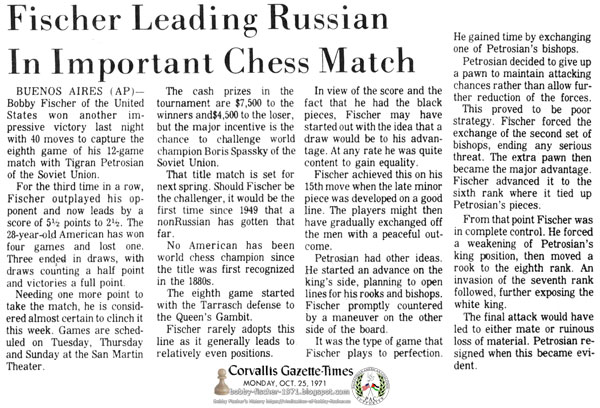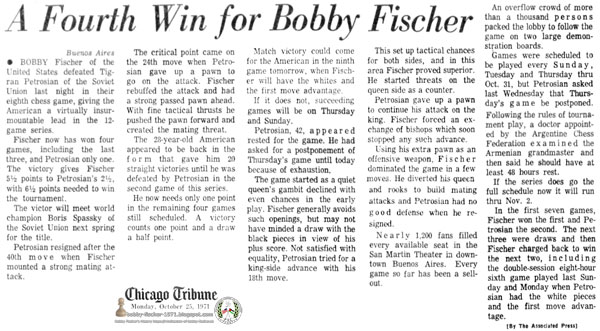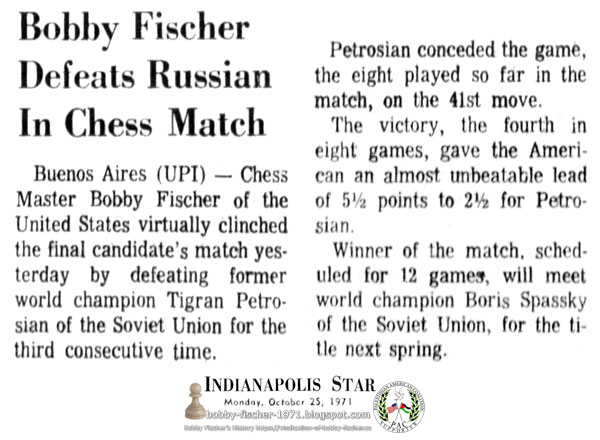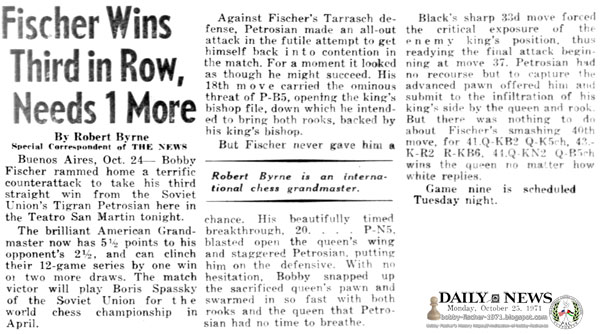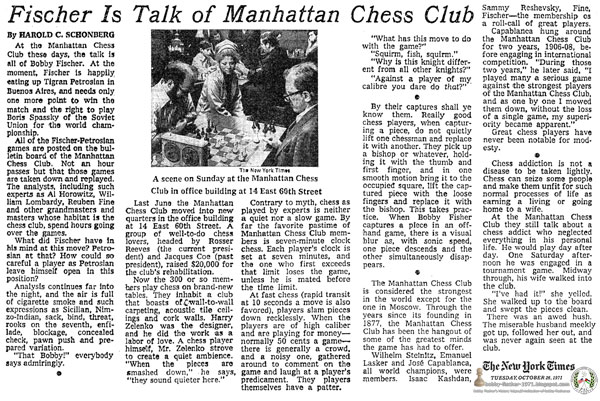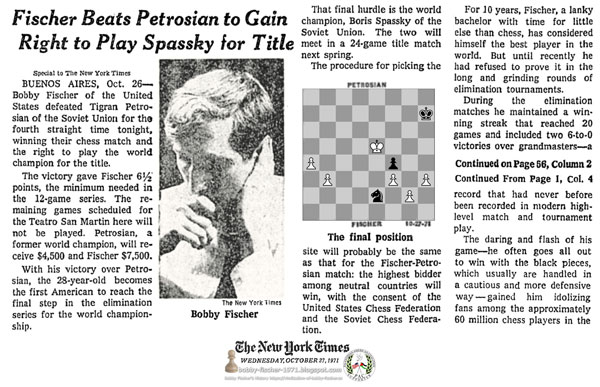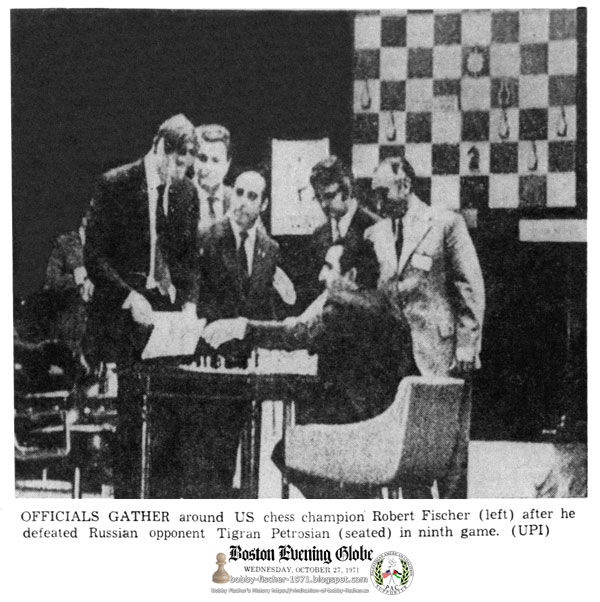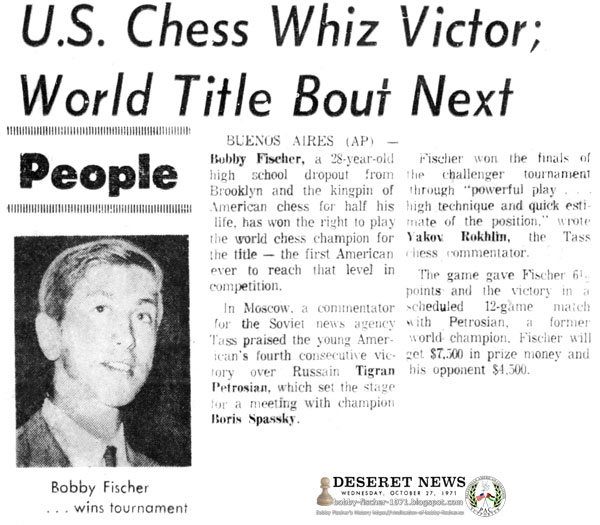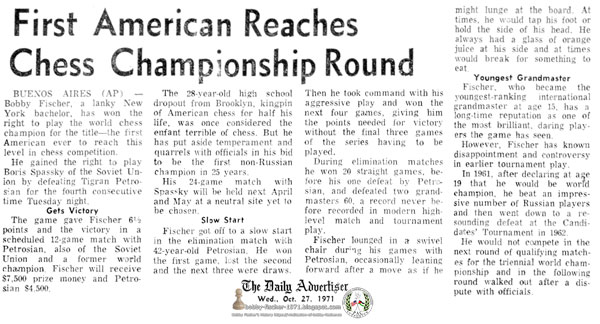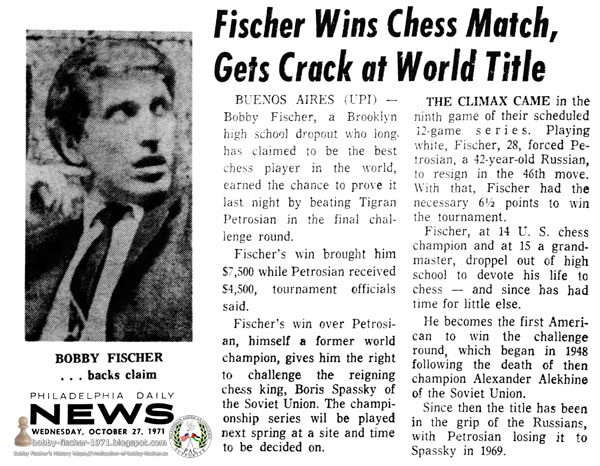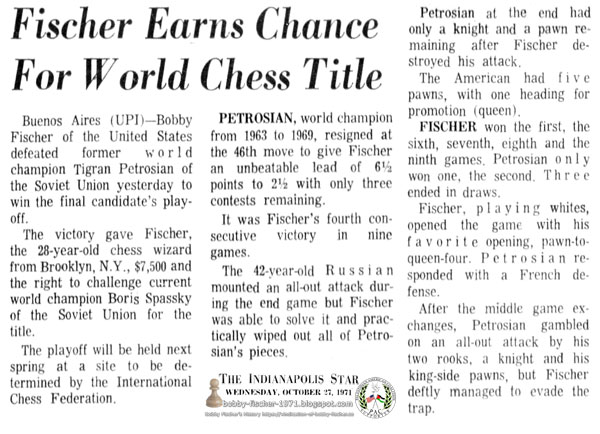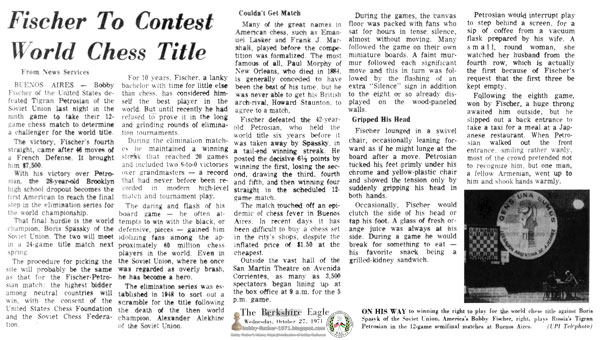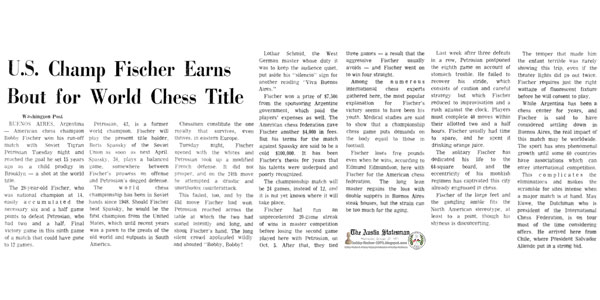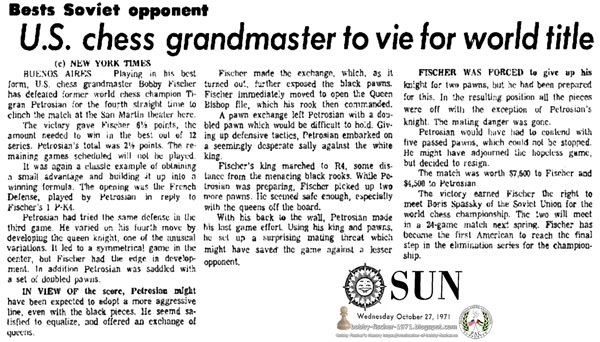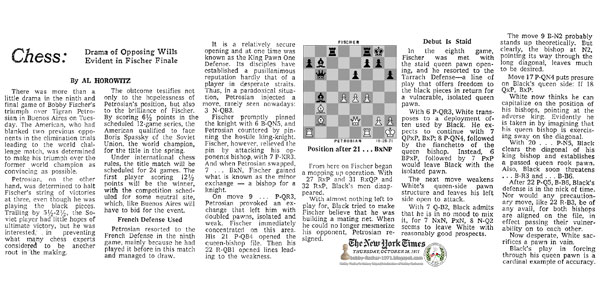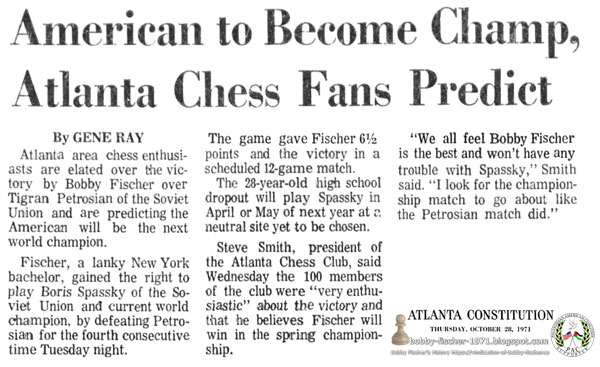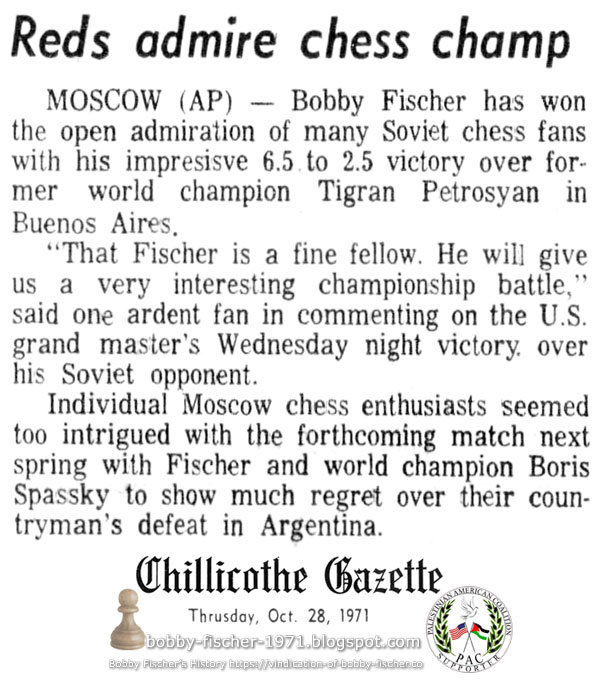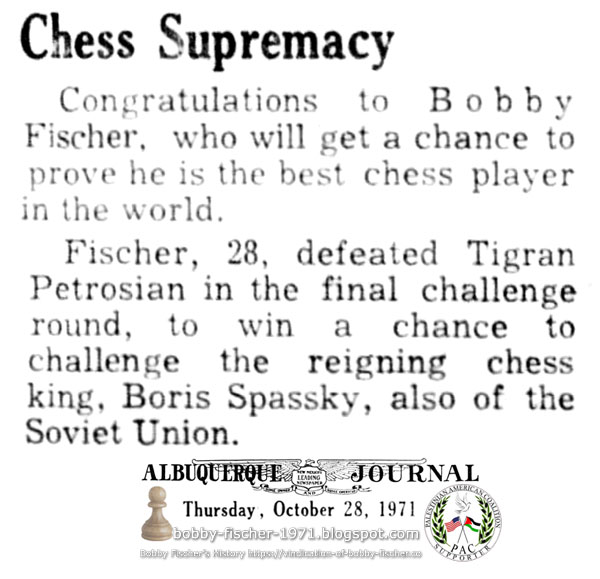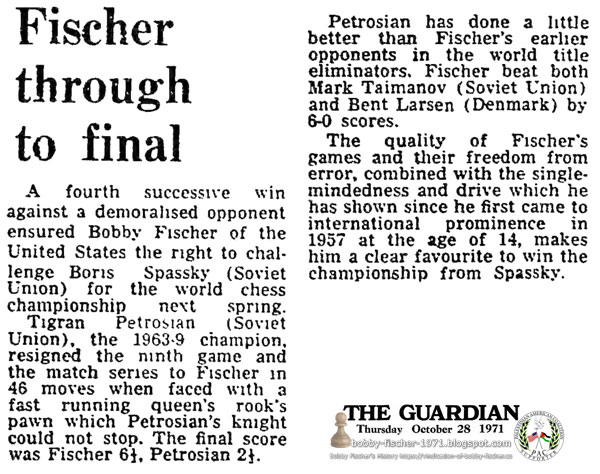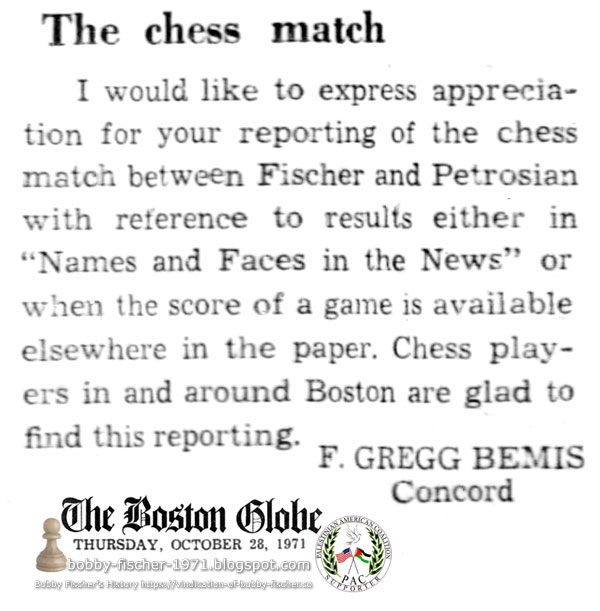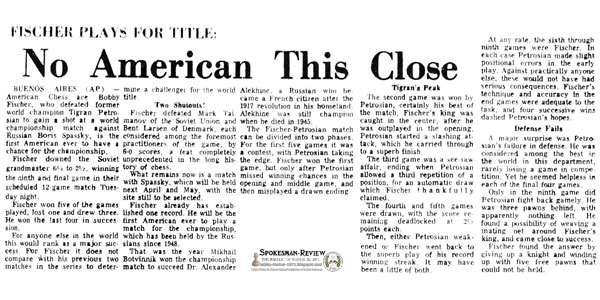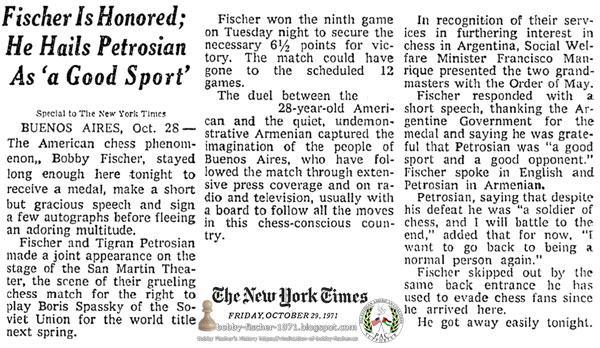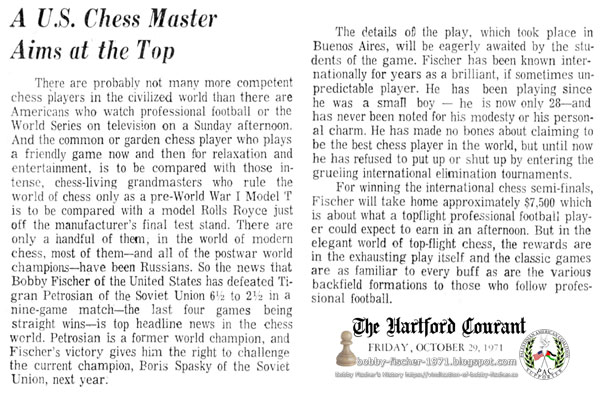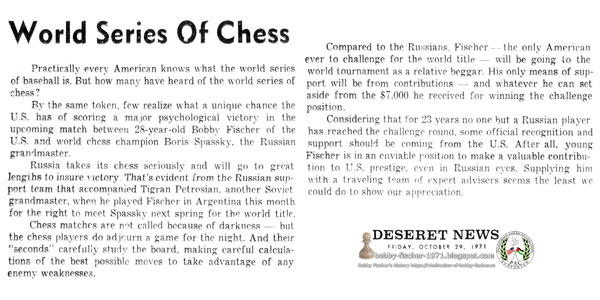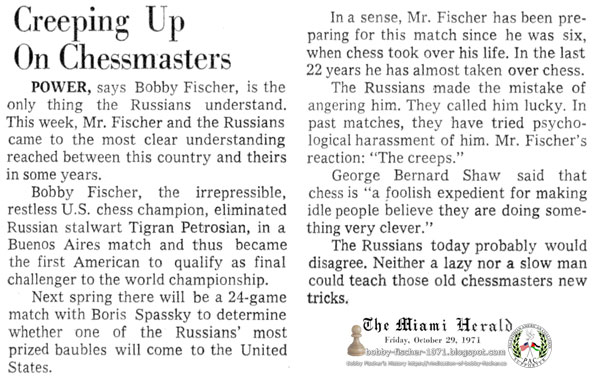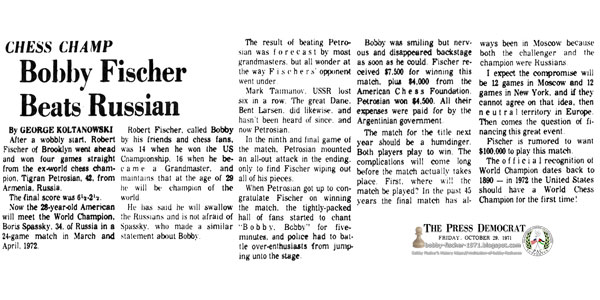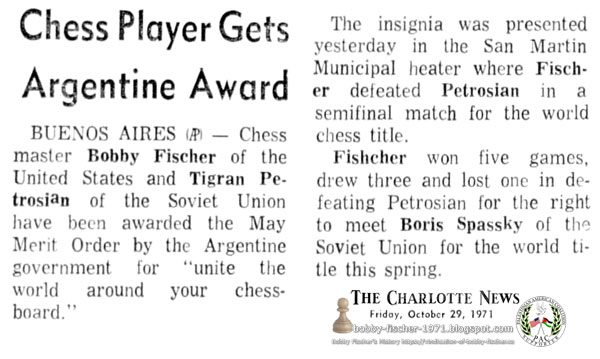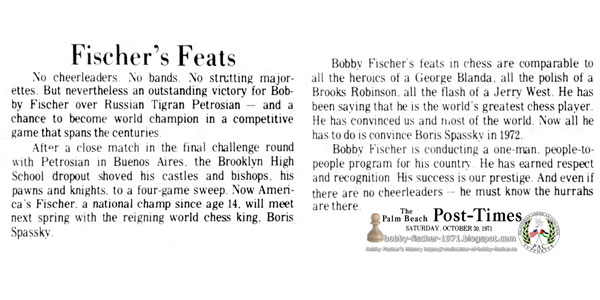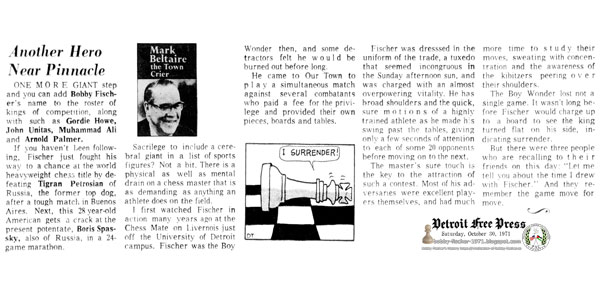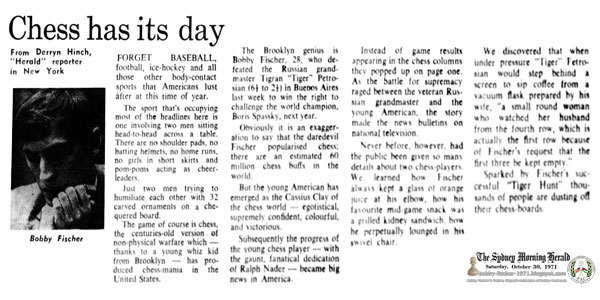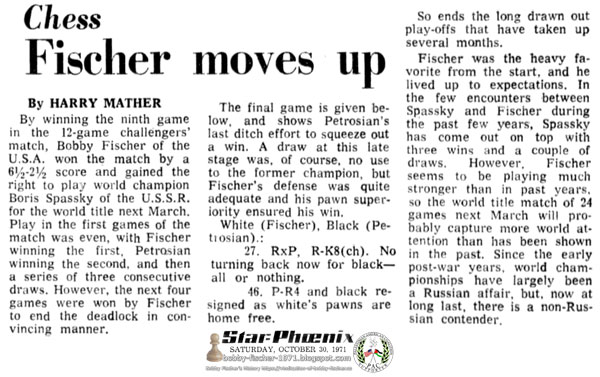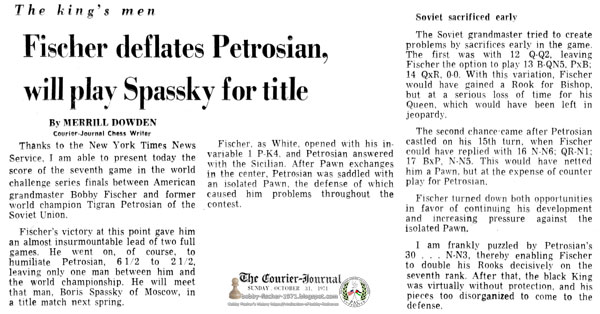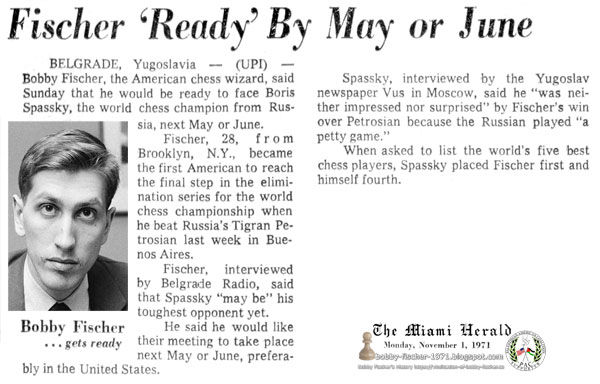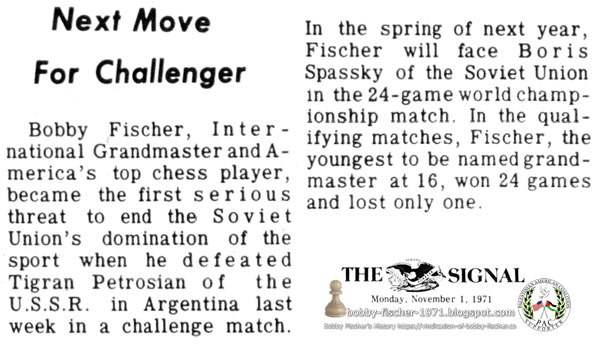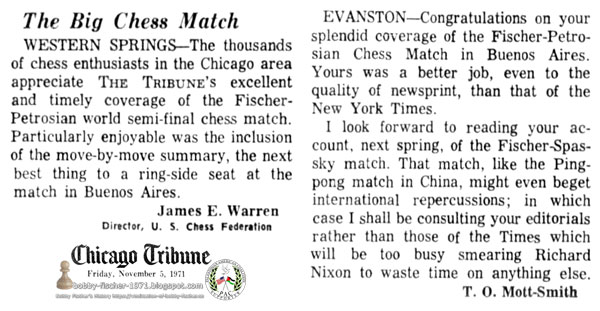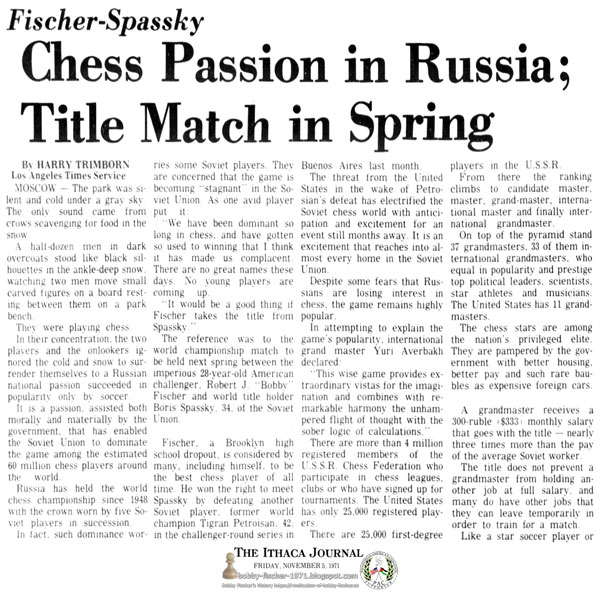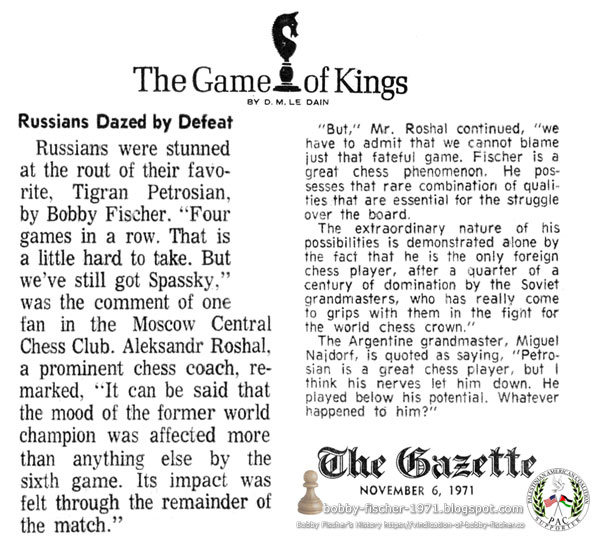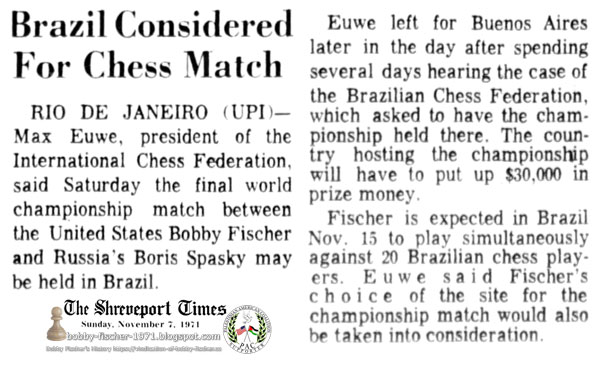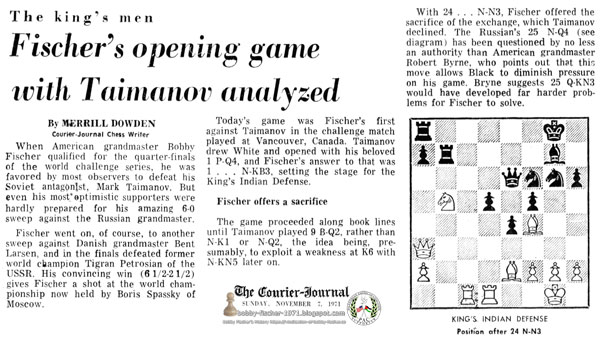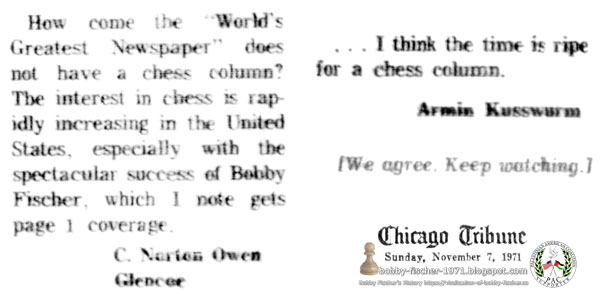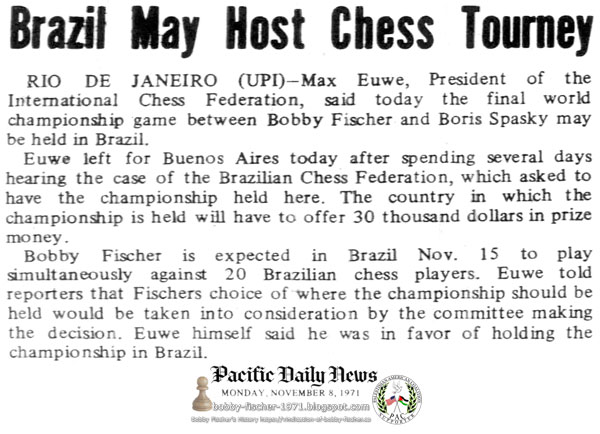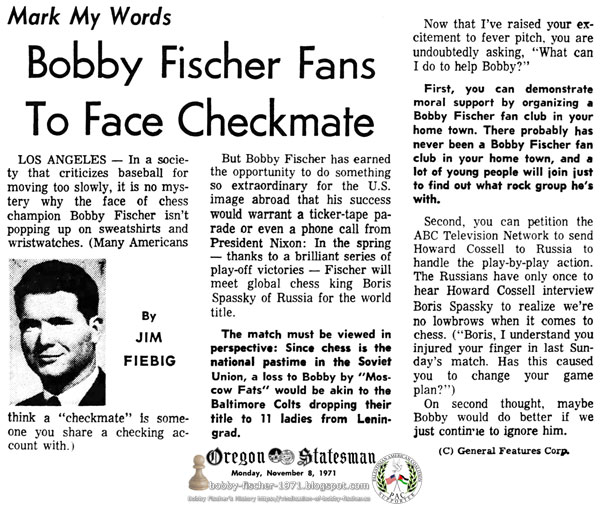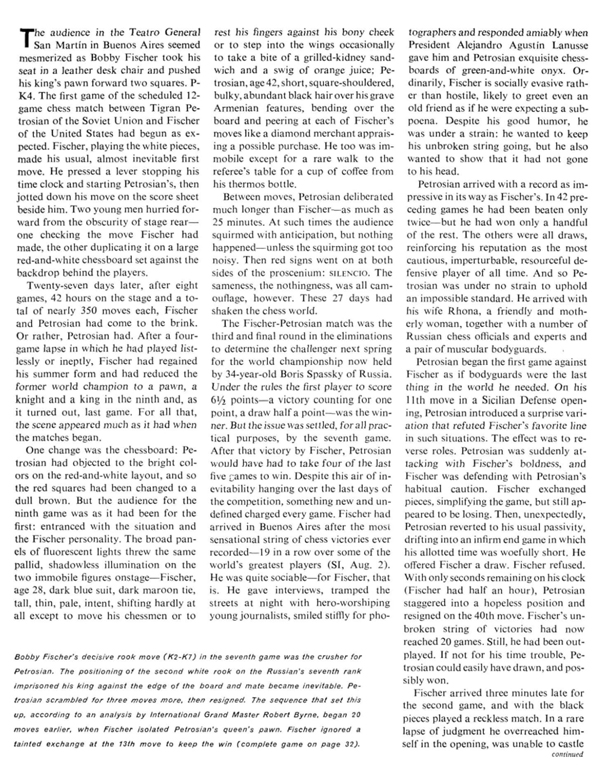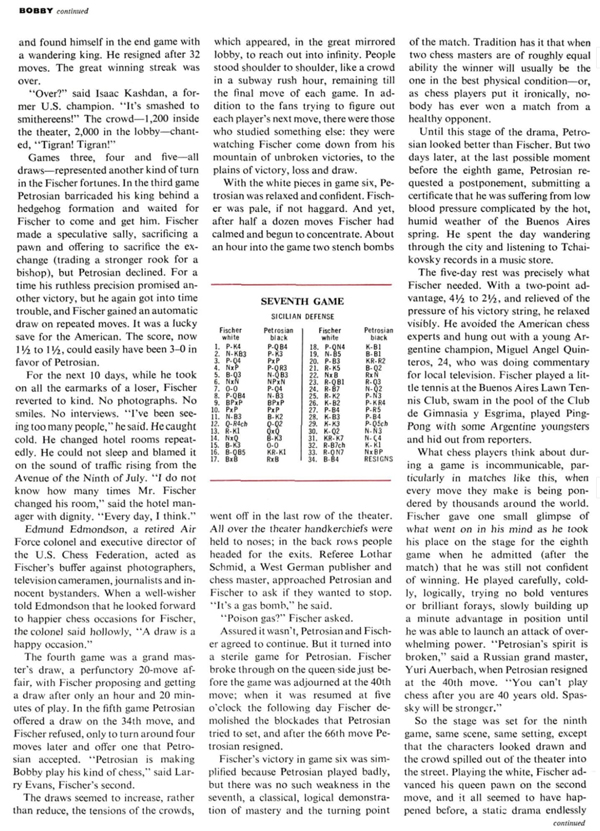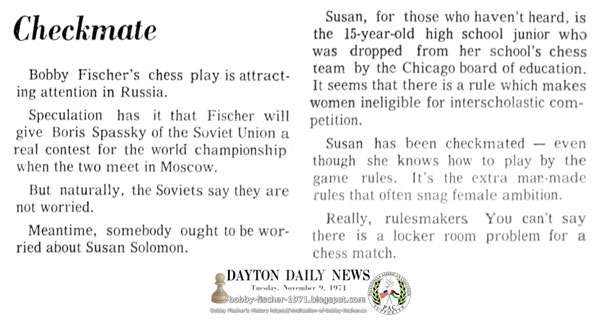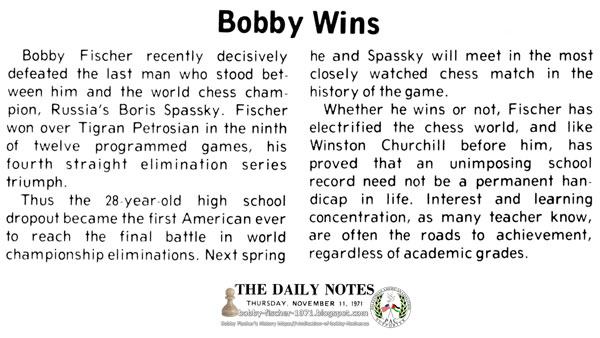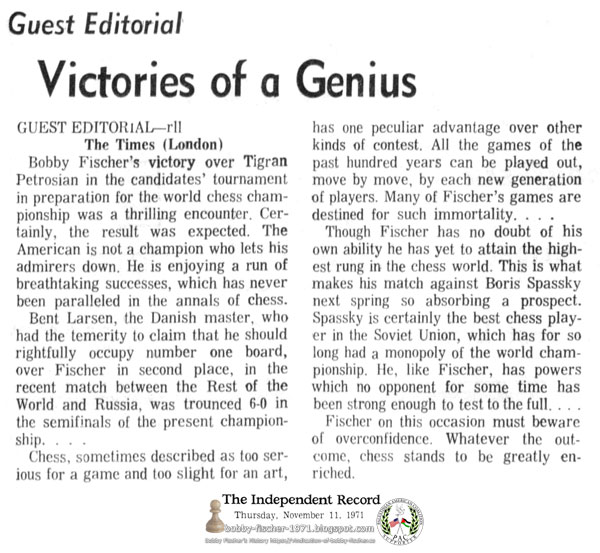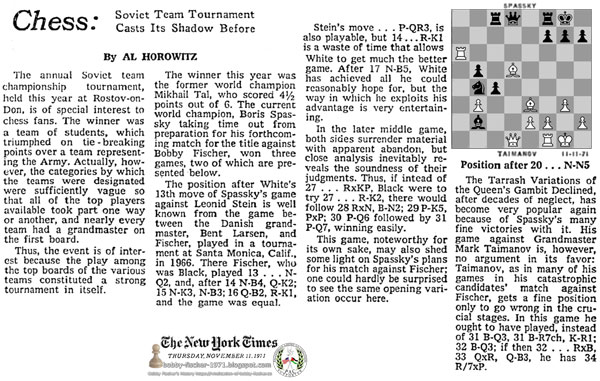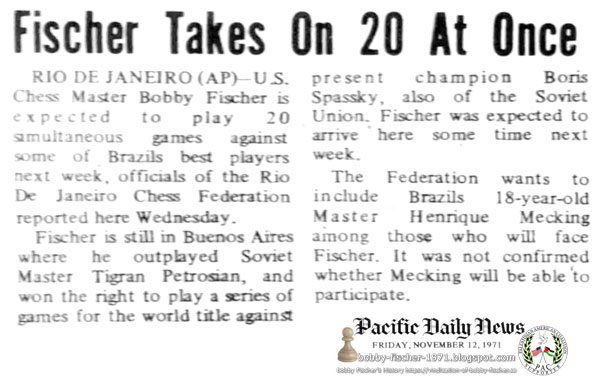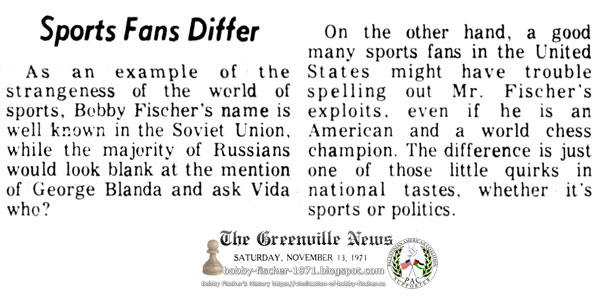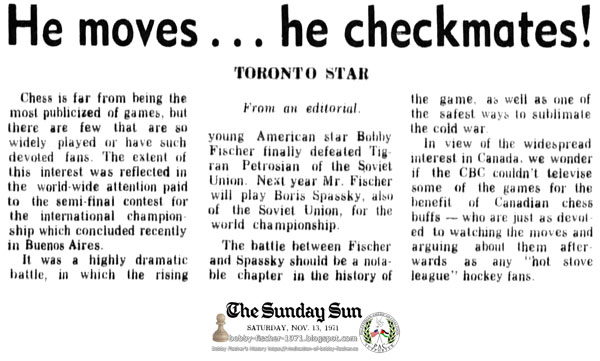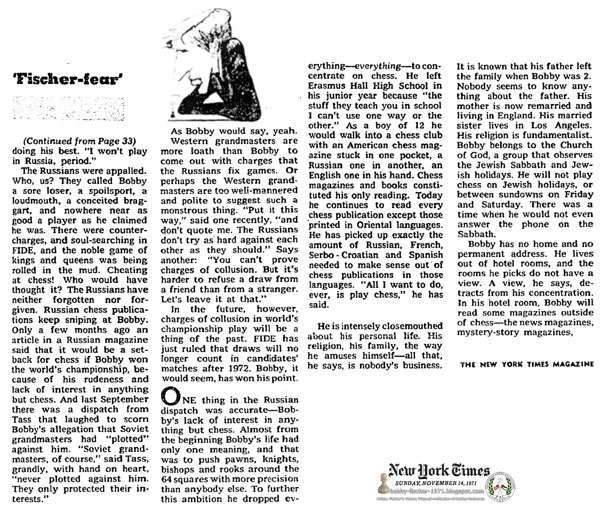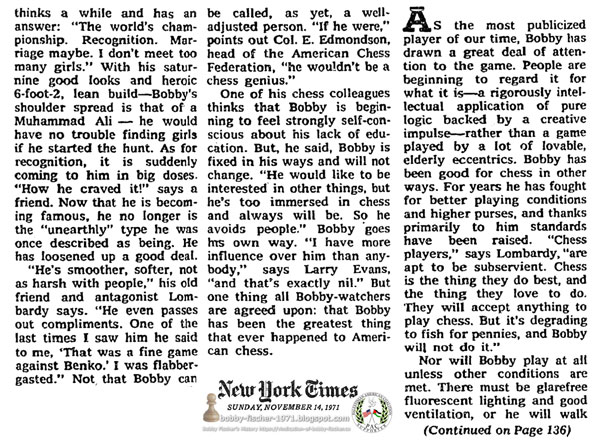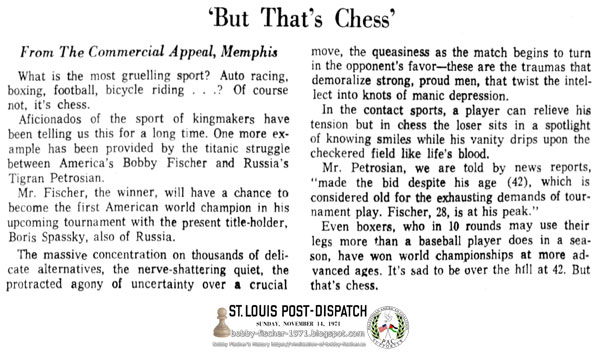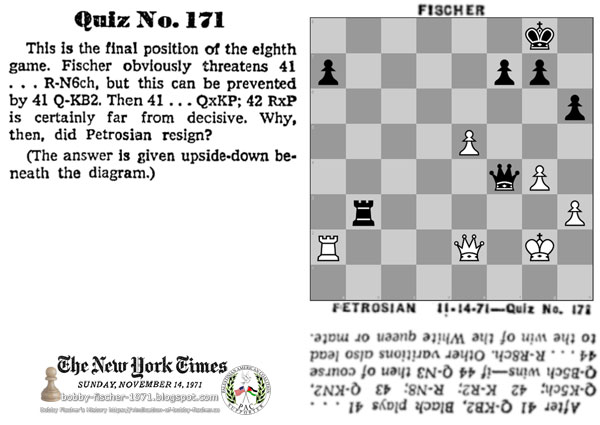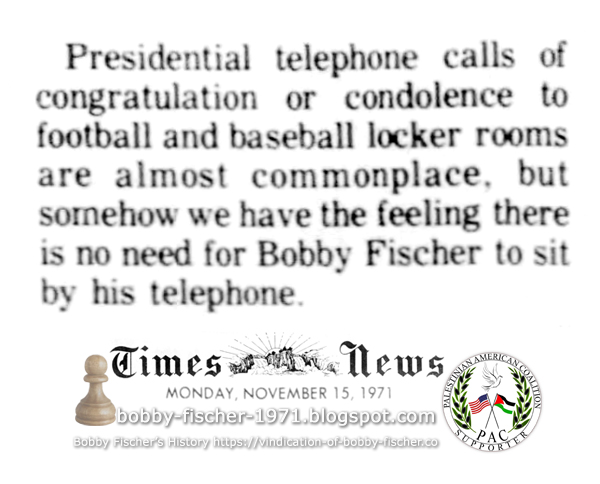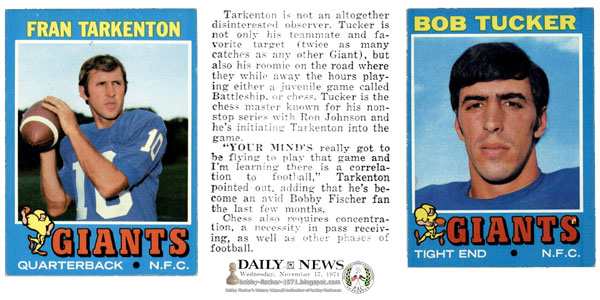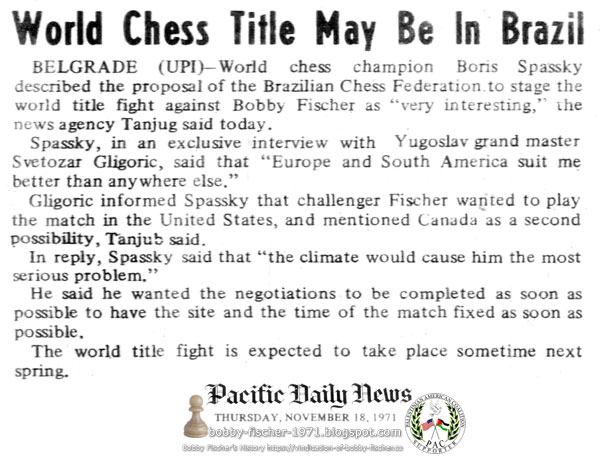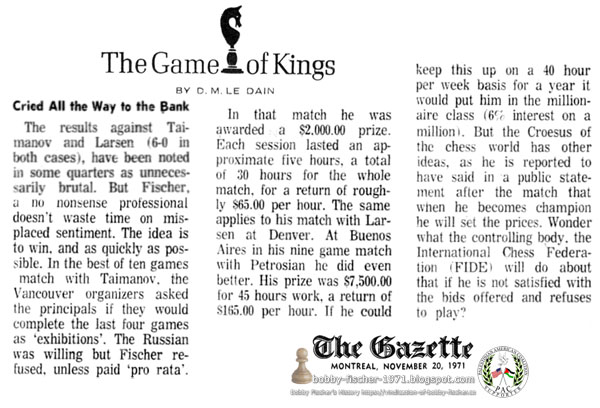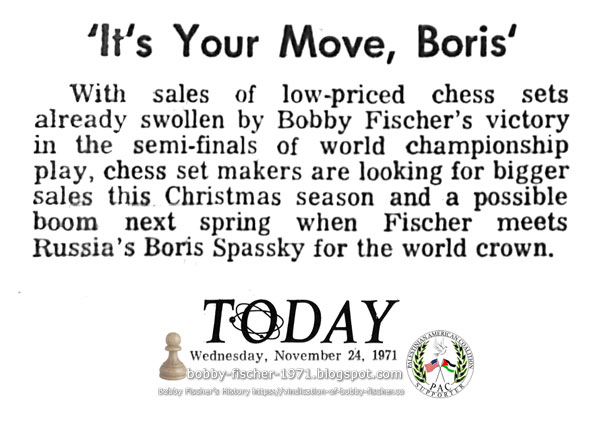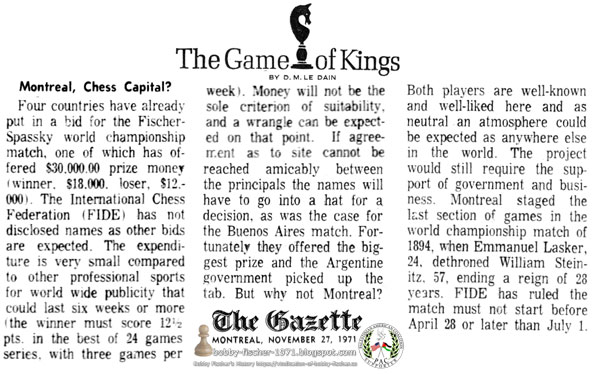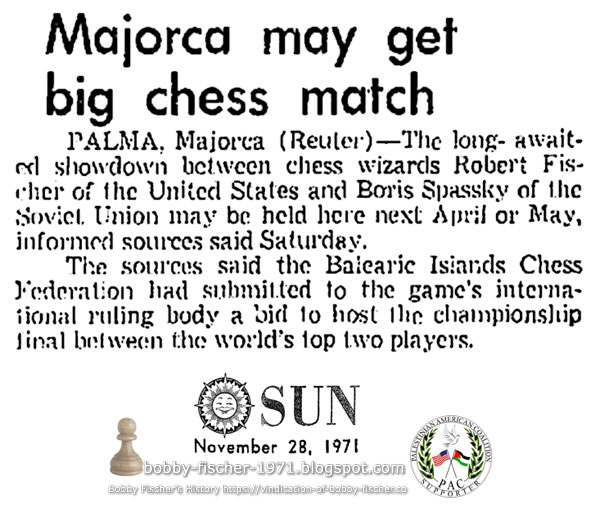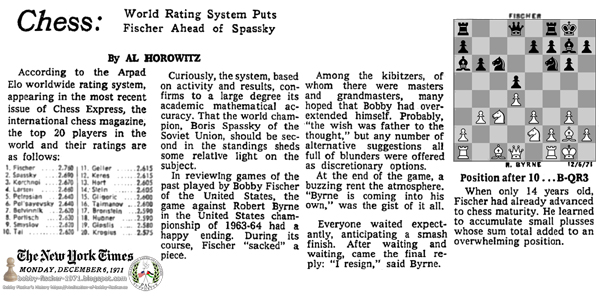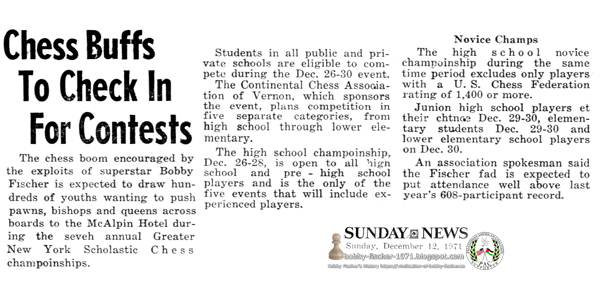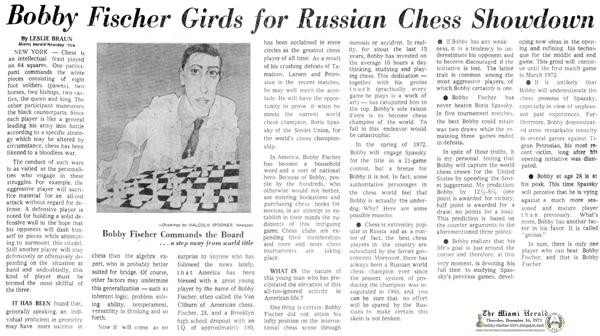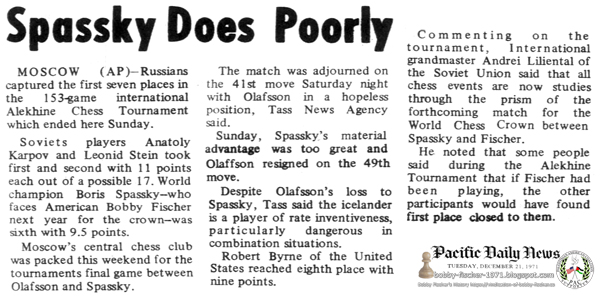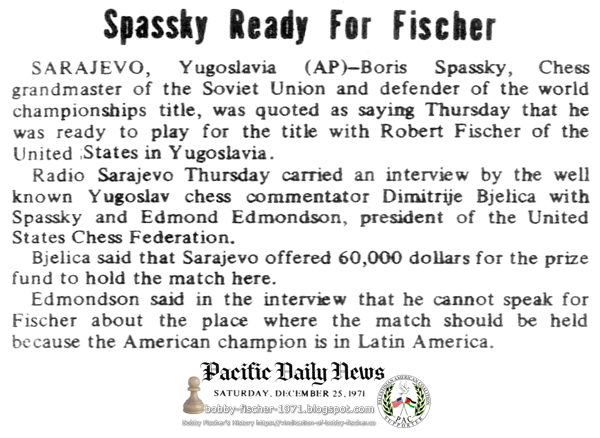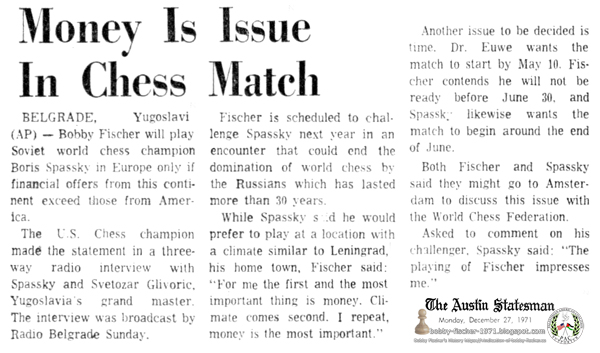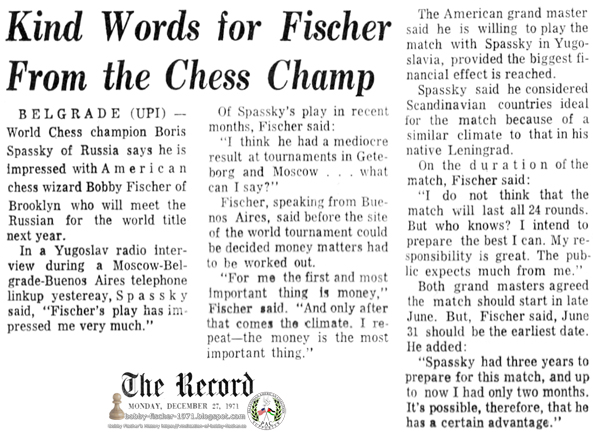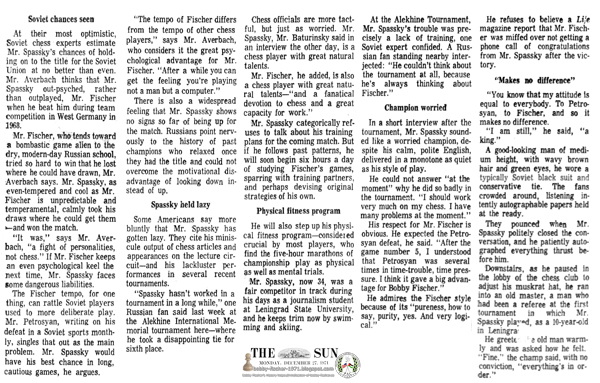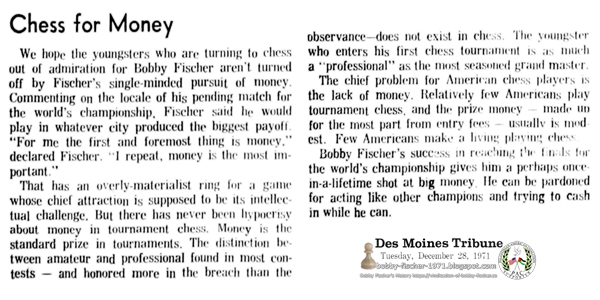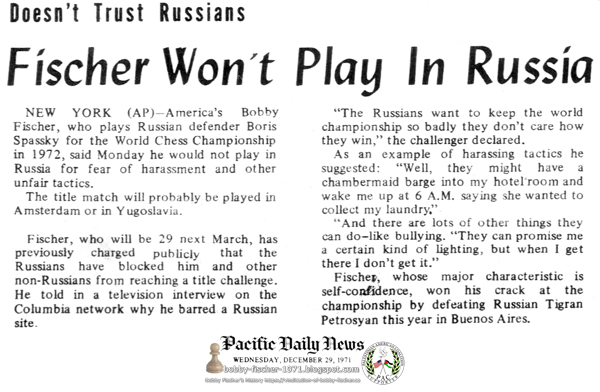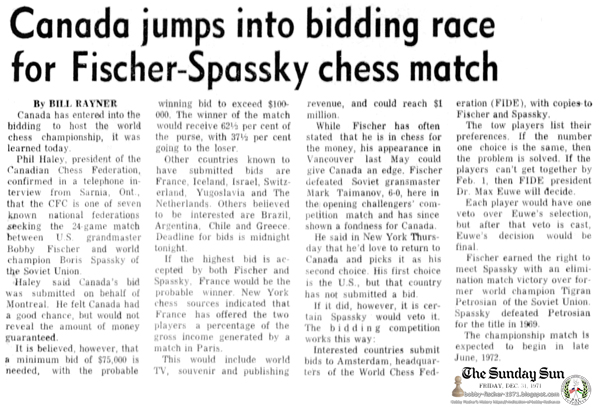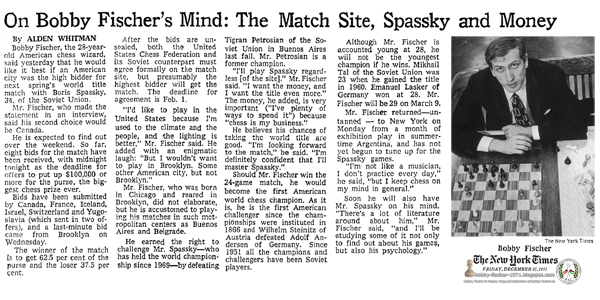The Courier-Journal Louisville, Kentucky Sunday, July 04, 1971 - Page 11
The King's Men -- Fischer Begins Match with Denmark's Larsen by Merrill Dowden
This July 4 will be a landmark in the history of chess.
For this is the day that America's amazing grandmaster, Bobby Fischer, begins his semifinal 10-game match with the Danish grandmaster Bent Larsen. The other semifinal also starts today, in Moscow, between Viktor Korchnoi and former world champion Tigran Petrosyan, both of the USSR.
The winners of these two matches will then clash to determine who will meet the reigning world champion, Boris Spassky of the Soviet Union, who will put his title on the line. The guess here is that the ultimate challenger will be Fischer.
Fischer, fresh from his incredible 6-0 sweep over another Russian grandmaster, Mark Taimanov, is favored to defeat the great Dane. This will be a formidable task, because Larsen is rated among the top half-dozen players in the world.
The American has thrived on formidable tasks, however, and he has the best-won-lost record against masters and grandmasters of any living player. Nor is he lacking in self-confidence.
“The Soviets have been putting up roadblocks for me for years” the 28-year-old native of Brooklyn, N.Y., was quoted recently. “But I know I'm the best. I should have been world champion 10 years ago.”
Taimanov, 46, said Fischer undoubtedly is the best non-Soviet player he has met in 19 years of international competition as a grandmaster. He blamed his poor showing against Fischer on ill health and headaches.
Well, who wouldn't get a headache after playing Fischer and getting nothing but goose eggs?
The Los Angeles Times Los Angeles, California Sunday, July 04, 1971 - Page 26
Fischer-Larsen Match in Denver
Bobby Fischer, fresh from his brilliant 6-0 victory over Mark Taimanov of the Soviet Union, will start a 10-game match Tuesday with Bent Larsen of Denmark, to be held at Temple Buell College in Denver.
Los Angeles had bid for the match, with plans to hold it in Royce Hall, UCLA. Fischer finally opted for Denver. Larsen had agreed to either city.
The match is part of the semifinals in a series to determine the challenger for the world championship title, now held by Boris Spassky of the Soviet Union. Larsen had moved up by defeating Wolfgang Uhlmann of East Germany by 5½-3½.
The other competitors are two Russians, former world champion Tigran Petrosian and Victor Korchnoi. They will also play a 10-game match, starting today in Moscow.
The winner will need 5½ points in either match. Should the result be a tie after 10 games, then four additional games will be played on a sudden death basis. Another tie after 14 games would be resolved by the toss of a coin.
The two match victors will meet in a neutral country in September, in accordance with the schedule established by the International Chess Federation. The survivor will then play Spassky for the championship next spring.
New York Times, New York, New York, Sunday, July 04, 1971 - Page 99
History of Fischer's Games in 1970 by Al Horowitz
When the chess journalists assembled at the Palma de Mallorca Interzonal tournament last year voted Bobby Fischer the top player of 1970, there were few dissenters—even on the Other Side. Indeed, if anyone had been so audacious as to dissent, the journalists could have produced wholly convincing statistics to back up their choice: In 1970 grandmaster Robert James Fischer scored 47 victories against top class opposition, drew 23 games, and lost only 3—a score of 80 per cent!
This amazing record encompassed a 3-1 score against former world champion Tigran Petrosian of the USSR in the match that pitted 10 Russians against a team from the rest of the world, first places in three international tournaments — Zagreb, Yugoslavia; Buenos Aires, and the Interzonal—and the second best score on first board at the chess Olympics at Siegen, West Germany; a truly remarkable achievement.
The story of Fischer's triumphs in the annus mirabilis has now found its way into permanent form. Edited by grandmaster Isaac Kashdan and published by the United States Chess Federation (479 Broadway, Newburgh, N.Y. 12550), “Fischer 1970” ($1.75) includes the score of every game played by Fischer in the events listed above, with a brief summary of each tournament and capsule commentary on the games. The true value of this well-produced, soft-cover publication—one is in doubt whether to call it a pamphlet or a book—lies, of course, in the games themselves, but the editor's achievement—to have presented them so that they fit clearly and lucidly into the context of the events in which they were played—is considerable.
Fischer's game against Yugoslav grandmaster Minic was played in the international tournament at Zagreb. In it, Bobby reverts to a variation of the Sicilian Defense that he used to play all the time, but, since he so radically broadened his repertory of openings about three years ago, he has tried it only infrequently. White's 14. P-KR4 is a little slow—more usual is 14. B-R3—and Fischer utilizes the slight respite afforded him to organize a fierce counterattack. In the ensuing complications Fischer, as Kashdan remarks, “always turned out to be a move ahead.”
The second game, in which Fischer defeats Argentinian grandmaster Oscar Panno, was played in the international tournament at Buenos Aires. Fischer scored 13 wins and 4 draws (no losses) to finish 3½ points ahead of the field. We quote Kashdan's introduction to this game in full: “When Panno moved on the queenside, Fischer shifted his forces to the kingside. Several exchanges seems to simplify the game, but Fischer's attack then started in earnest, with a fine offer of a bishop, then a knight. Once Panno's king was exposed, his defense collapsed.”
As yet another example of Fischer's prowess, we present a game from the preliminaries of the chess olympics at Siegen. The player of the Black pieces is William Hook, a former New Yorker now living in the Virgin Islands, for whose team he has played over the last several years.
The Courier-Journal Louisville, Kentucky Monday, July 05, 1971 - Page 62
Soviet Chess Challengers Tie In Opening Semifinal
Moscow(AP) — Soviet grandmaster Victor Korchnoi and former world champion Tigran Petrosyan of Russia tied last night on the 36th move of their opening match in the semifinal round of the World Chess Challengers Tournament.
The winner of the best-of-10 series will move into the finals for a chance to face current world champion Boris Spassky of the Soviet Union next spring.
Korchnoi and Petrosyan play their second game Tuesday. The other semifinal, pitting Bobby Fischer of Los Angeles against Denmark's Bent Larsen, begins Tuesday at Denver, Colo.
Colorado Springs Gazette-Telegraph Colorado Springs, Colorado Tuesday, July 06, 1971 - Page 25
Fischer in Challenge Match
Denver (AP) — American Grandmaster Bobby Fischer and Danish champion Bent Larsen begin a 10-game match here Tuesday afternoon as part of a series to determine a challenger for the World Chess championship, now held by Boris Spassky of the Soviet Union.
The toss of a coin to determine who will play “white” was won by Fischer, and he will make the opening move in the first game. Colors will alternate each game.
A similar semifinal match is underway in Moscow between two Russians, former world champion Tigran Petrosian and Victor Korchnoi. Their first game, played Sunday, resulted in a draw.
Games in the Fischer-Larsen match will be started each Tuesday, Thursday and Sunday and, if not finished in the first five-hour session, will be resumed the following day. The competition is expected to take up to three weeks to complete.
Alabama Journal Montgomery, Alabama Tuesday, July 06, 1971 - Page 4
Can Bobby Fischer Whip Boris Spassky? Does Anyone Care? By Fred L. Zimmerman, In The Wall Street Journal
Get ready, America, for a great propaganda victory over the Russians. Not in space, not at the SALT talks but over the chess board.
Chess is an esoteric game to most Americans, so its doubtful the nation is aware of the resounding triumph at last within its grasp. But chess is a national sport in Russia, and Russians are very much aware of something that may well happen — something roughly equivalent to a Moscow baseball team winning the World Series.
A 28-year-old chess genius named Robert J. Fischer is heading toward a match next spring with the world champion, Russia's Boris Spassky, and there's a good chance Bobby Fischer will win. If so, a non-Russian will be world chess champion for the first time in 25 years. And an American will be official titleholder for the first time ever.
Brooklyn-born (correction: Chicago-born) Mr. Fischer. famous in the chess world since his days as a 13-year-old prodigy, already has won the annual U.S. championship eight times. He took the first of five big steps toward the world title last December, winning first place by a big margin at a tournament in Spain. The tournament was run by the International Chess Federation as part of a quadrennial cycle leading to a world championship match, and the top six finalists in the tournament then began elimination matches to determine who challenges champion Spassky.
In a May quarter-final match in Vancouver, Bobby demolished a Russian star, Mark Taimanov, six games to zero — a score unprecedented at that advanced level of chess competition. Tuesday in Denver he begins a match with the West's No. 2 player, Bent Larsen of Denmark. If, as expected, Bobby wins, only one more opponent (probably ex-world champion Tigran Petrosian of the USSR, whom he has beaten before) will stand between him and the champ.
THE PUBLIC statements of some Russian chess experts notwithstanding, Bobby's chances of beating the champ are considered good.
“We are not afraid of Fischer,” a top Soviet player, Yefim Geller, recently declared to a Yugoslav journalist. The journalist's account, however, tactfully omitted any mention of the Geller-Fischer game at that crucial tournament last December in Spain. There the hardly fearless Mr. Geller proposed a draw after seven moves, whereupon Bobby laughed at him, declined the offer, and beat him in a particularly humiliating fashion in 65 moves later.
Following Bobby's 6-0 shellacking of Russia's Mr. Taimanov in May, Soviet comments about the American star have been much more subdued. And champion Spassky is reported to have said that he now expects Bobby to be his challenger.
Victory would be a personal triumph as well as a national propaganda coup. For a decade, Bobby Fischer has been perhaps the game's most controversial player, forever complaining about everything from poor lighting and noisy spectators to the style of the chess sets. In 1962, he wrote an article for Sports Illustrated charging the Russians with cheating at big tournaments. He said he would never play in the championship cycle again.
He was only 19 then, although already one of the world's strongest players. Those who know him well say he's calmer now, simply because he has matured. The stresses of the championship cycle should put this theory to the test.
A championship chess match is a serious, high-tension struggle that can break a man's nerves and driven him to tears. This happened, in fact, during one of the elimination matches last May in Spain.
Serious chess is played with clocks each player having two and one-half hours to make his first 40 moves and comparable time limits thereafter. After five hours of play, unfinished games usually are adjourned. Most players have seconds, whose big task is to help analyze the adjourned positions. Often the player will go to sleep while the second studies the position all night, testing alternative sequences of moves. When the player awakens, his second presents him with pages of variations for study.
Bobby Fischer was playing chess like a mature master before he was old enough to shave and he doesn't rely on seconds much. He won't be using one Tuesday, and his second at the tournament in Spain later wrote that one of his main responsibilities was simply to get Mr. Fischer to the game on time. Excelling in all phases of the game, Bobby is known for a risky, attacking style of chess that can lead to fierce tactical battles.
Most top-flight players, when facing an equally strong opponent, pursue bland, low-risk strategies that wait for the opponent to blunder. If this doesn't happen, such games usually end in a draw. But Bobby always plays to win, accepting a draw only when he knows his position is so bad he hasn't a chance of victory. In Vancouver, Bobby reportedly angered the Russian contingent at the Taimanov match by refusing draw offers several times in positions that were theoretically barren. In each case, Bobby went on to win.
Unlike Mr. Fischer, top Russian players invariably use seconds, who are subsidized — like the players themselves — by a Soviet government that takes the game very seriously. In Russia, promising players are identified and cultivated in elementary schools, then given years of the best possible training for international competition. Many Russians maintain that their skill at chess reflects the natural superiority of Soviet culture.
Nothing like the elaborate Soviet system exists in the U.S., of course, Bobby Fischer seems to have sprung up totally as a fluke, and he can't be regarded as typical of American chess. But largely because of Bobby's ascendancy, U.S. chess officials say, U.S. chess activity has jumped sharply in recent years. Since 1968, the number of U.S. players participating in rated tournaments has climbed to 24,000 from about 12,000.
While U.S. chess seems to be blossoming, an international debate has began over whether Soviet chess is declining. Paul Keres, a top Russian player, recently declared that “urgent measures are required” to find and develop new young stars. Because of the tension and the concentration demanded, championship chess is a young man's game, and Mr. Keres worried that except for champion Spassky (age 34) the best Soviet players are over 40.
Some U.S. chess officials, however, think such talk is mainly bluff. “The Russians have plenty of strong young players coming up,” says one expert. “They're trying to hide them so we won't realize how bad off we really are.”
It is true that the number of serious U.S. players still comes nowhere close to the estimated four million Russians engaged in organized chess competition. With so many Russians following next year's championship match, a Fischer victory would come as a stunning blow. But U.S. chess hands already are resigned to the fact that to an overwhelming majority of Americans, it would come as no big deal.
“If Fischer becomes world champion,” says E.B. Edmondson, executive director of the United States Chess Federation, “he certainly should be invited to the White House.” But Mr. Edmondson doubts that any President—even one who has been known to make a congratulatory visit to a football locker-room — would do anything that grand for chess. “Few in government,” he sighs, “have the slightest awareness of the importance of chess in other countries.”
Colorado Springs Gazette-Telegraph Colorado Springs, Colorado Wednesday, July 07, 1971 - Page 49
Bob Fischer Tops Danish Chess Master
Denver (AP) — Bobby Fischer of the United States defeated Bent Larsen of Denmark in the first game Tuesday of their 10-game world chess championship semifinal match at Temple Buell College here.
Fischer, with the white pieces, gained the advantage in the center and soon established his pieces on better squares. Larsen chose to keep his king in the center rather than castle, and this later proved a problem.
When Larsen attempted counter play, Fischer gave up a pawn which Larsen accepted. Fischer started an attack which looked dangerous, but Larsen managed to hold his ground.
Fischer then played weakly, allowing Larsen to build an attack of his own. This time Fischer's defensive ability was tested, and he came through.
The resulting ending seemed even, with Fischer having a rook and two bishops for Larsen's queen. A passed pawn that Fischer had established proved the margin of victory. When it started to advance Larsen found it could not be halted, and he resigned after 41 moves.
The second match game will be played Thursday afternoon, with further games scheduled Sunday, Tuesday and Thursday.
The Times, Shreveport, Louisiana, Wednesday, July 07, 1971 - Page 8
American Chess Ace Bobby Fischer (left) and Danish champion Bent Larsen (right) are about ready to begin a ten-game match to determine a challenger for the world championship now held by Boris Spassky of Russia. Paul Klein of Ecuador, chief arbitrator for the matches, places the timing units on the playing table. A similar semifinal match is under way in Moscow between two Russians, former world champion Tigran Petrosian and Victor Korchnoi. Their first game resulted in a draw. (AP Wirephoto).
Pacific Daily News Agana Heights, Guam Wednesday, July 07, 1971 - Page 17
World Chess Championships
Denver (UPI) — United States chess champion Robert (Bobby) Fischer of New York will meet Bent Larsen of Denmark in one of two semifinal matches for the World Chess Championship.
The winner of the 10-game series will play the victor of another semifinal match underway in the Soviet Union between Russian Grand Master and former world champion Tigran Petrosian and Victor Korchnoi.
The final winner will then challenge current world champion Boris Spassky of Russia for world honors.
Russia, for about the last 30 years, has dominated the chess world and retained all world titles, but some chess experts say the winner of the Fischer-Larsen match may be the next world champion, according to one of the men responsible for arranging the Denver site, Caswell Silver, President of the Sundance Oil Company.
The public will be able to view the Fischer-Larsen match in one auditorium or examine the moves and have strategy explained in another room.
New York Times, New York, New York, Wednesday, July 07, 1971 - Page 13
Larsen Is Defeated By Bobby Fischer In Opening Game
Denver, July 6 — Bobby Fischer, moving forward in his quest for the World's Chess Championship, defeated Bent Larsen of Denmark in 41 moves in the first game of their match tonight in Temple Buell College here.
The first surprise was Larsen's opening, replying to Fischer's expected P-K4 with the French defense. No one present could remember Larsen using this opening in recent years.
Fischer was obviously not impressed, making his first few moves rapidly. He gained control of the center and moved his king into safety by castling.
Larsen tried for counterplay in the center, preparing to castle on the queen's side. When he threatened one of Fischer's pawns, the American ace made no effort to protect it, quietly continuing his development.
Larsen Threatened
Larsen accepted the gift but soon regretted it, as he found he could no longer castle, and his king was in a precarious situation.
At this stage, Larsen's game seemed hopeless, in view of Fischer's reputation as an attacking genius.
Then, at the critical moment, Fischer apparently missed the strongest line, and suddenly Larsen had new life.
Now it was Larsen who had the queen and rook on aggressive lines. He gave up two minor pieces for one of Fischer's rooks. Then Fischer's king was subjected to a violent assault.
For eight moves in succession Fischer had only one reply to Larsen's threat, but he managed to survive.
He had to give up his queen, but came into the ending with a rook and two bishops as compensation.
In addition, Larsen had four pawns to two for Fischer, so that material was roughly equal.
The decisive factor was that Fischer had a passed pawn, supported by the bishops.
The pawn advanced rapidly to the queening square, and Larsen, finding no way to stop it, resigned just before adjournment time.
The second game of the match will be played Thursday, starting at 4 P.M. Games are scheduled for Sundays, Tuesdays, and Thursdays. An adjourned game will be played off on the following day.
The match is for the best in 10 games, with 5½ points required to win. Should a tie result after 10 games, then six more will be played on a sudden-death basis. Another tie after 16 games would be resolved by the toss of a coin.
A Draw in Moscow
Moscow, July 6 (Reuters)— The second game in the semifinals of the challengers' tournament for the World Chess Championship between Tigran Petrosian, former champion, and grand master Viktor Korchnoi ended in a draw on the 37th move here today, according to Tass, the Soviet press agency.
Standard-Speaker Hazleton, Pennsylvania Wednesday, July 07, 1971 - Page 31
Masters Tie Again
Moscow (AP) — Soviet grandmasters Tigran Petrosian and Viktor Korchnoi drew to a tie Tuesday in their second match of the semifinal round in the World Chess Challengers Tournament.
The competitors declared a tie on the 37th move.
Their first match in the best-of-10 series was played Saturday and ended in a draw on 36th move.
The series winner will face the victor of the Bobby Fischer-Bent Larsen semifinal round. The winner of that final challengers match will then try next spring to take the world champion from Russian Boris Spassky.
Colorado Springs Gazette-Telegraph Colorado Springs, Colorado Wednesday, July 07, 1971 - Page 3
Spotlights
Denver (UPI) — U.S. chess champion Robert “Bobby” Fischer, a world master at the age of 15, needed only 41 moves Tuesday to win the first game of a semifinal world chess title match against Bent Larsen of Denmark.
Fischer, 27, took less than five hours of play to win the first game of a 10-match series which will be staged at Temple Buell College here over the next three weeks.
Larsen, who had the black pieces in a game filled with drama, superlative chess and occasional lapses, chose the French Defense, an opening he has rarely used. He ran into difficulties, ceding Fischer several open lines.
The victory marked the seventh in a row for Fischer.
The Sydney Morning Herald Sydney, New South Wales, Australia Thursday, July 08, 1971 - Page 4
Fischer's Chess Win
Denver, Colorado, Wednesday. — Bobby Fischer of the United States defeated Bent Larsen of Denmark in the first game of their ten-game semi-final match in the world chess championships yesterday.
In Moscow, the second game in the semi-finals between former champion Tigran Petrosyan and Viktor Korchnoi both of the Soviet Union, ended in a draw on the 37th move.
The Courier-Journal Louisville, Kentucky Thursday, July 08, 1971 - Page 38
Sports in Brief - Fischer Toys With Larsen
Bobby Fischer of the United States defeated Bent Larsen of Denmark in the first game of their 10-game World Chess Championship semifinal match Tuesday at Temple Buell College in Denver.
The second match game will be played this afternoon, with further games scheduled on Sunday, Tuesday and Thursday.
Fischer, with the white pieces, gained the advantage in the center and soon established his pieces on better squares. Larsen chose to keep his king in the center rather than castle, and this later proved a problem.
When Larsen attempted counter play, Fischer gave up a pawn which Larsen accepted. Fischer started an attack which looked dangerous, but Larsen managed to hold his ground.
Fischer then played weakly, allowing Larsen to build an attack of his own. This time Fischer's defensive ability was tested, and he came through.
The resulting ending seemed even, with Fischer having a rook and two bishops for Larsen's queen. A passed pawn that Fischer had established proved the margin of victory. When it started to advance Larsen found it could not be halted, and he resigned after 41 moves.
New York Times, New York, New York, Thursday, July 08, 1971 - Page 32
Chess: Fischer a Good Bet to Beat Larsen, but by What Score? by Al Horowitz
Virtually everybody (on this side of the Atlantic, anyway) agrees that the eight-time United States champion, Bobby Fischer, will beat Grandmaster Bent Larsen of Denmark in their forthcoming semifinal candidates' match, but there is considerable speculation about the final score.
Some people, apparently awestruck at Fischer's 6-0 victory against the Soviet grandmaster Mark Taimanov in the quarter-finals, predict that Larsen may meet the same fate; others suggest the match will be very close.
One chess observer has predicted Fischer will win 6-4, thus: Fischer will have a one-game lead going into the final game of the match, and Larsen, going all out to tie the score, will overextend himself and lose.
The final result will probably be somewhere between the two extremes. Obviously, Larsen is a much tougher customer than Taimanov. His results over the last five years have shown him to be, next to Fischer, the top grandmaster in the West. He has played Fischer many times in tournaments and, although Bobby has a substantial plus score, Larsen has won several fine games. Plainly, he won't be annihilated. Still, he is the under-dog, and anyone willing to bet on Larsen in the match is entitled to long odds.
The two games below are among the many between these two fine players over the last decade. Both are taken from the great international tournament held at Santa Monica, Calif. in 1966, where Fischer finished second to the world champion, Boris Spassky of the Soviet Union, and Larsen finished third.
Fischer and Larsen were fighting to catch Spassky, and so produced a game of more than usual tension even for these two fierce competitors. In their early middle-game of the encounter that was won by Fischer, there is an interesting bit of by-play. When Fischer plays 18 … R-K1, he appears to offer Larsen the opportunity to draw by repetition: 19. B-N5, R-Q1; 20. B-K2, R-K1 etc. Instead, Larsen plays 19. P-B3, spurning the draw, but at the same time creating a weakness on the black squares. Would Fischer have agreed to a draw by repetition had Larsen played for one? Probably not.
In the second game, Bobby loses in a very uncharacteristic way: With a slight positional advantage he makes a miscalculation. “I do not know what Fischer overlooked,” Larsen remarks in his annotations to this game, “but it must have been something very simple.” He goes on to conjecture that Fischer overlooked that after the possibility of 31. B-6, P-Q5; 32. QxRPch, KxQ; 33. R-R3ch, the Black queen could interpose. Anyway, in the final position, Black's passed pawns are a decisive advantage.
Pacific Daily News Agana Heights, Guam Thursday, July 08, 1971 - Page 16
Chess Championship Begins
Denver, Colorado (UPI)—Bobby Fischer of the United States and Bent Larsen of Denmark began play in a semifinals match of the world chess candidates tournament.
Fischer won the toss and will be on the offensive in the first match with the white pieces.
Colors alternate each game thereafter. Tournament Director is Paul Klein of Ecuador.
At one time, it appeared Fischer was out of contention for the right to meet world champion Boris Spassky of the Soviet Union for the world title over 24 games in 1972.
But an American challenger dropped out, making way for Fischer to enter the candidates tournament at a later date.
The matches in Denver, and one in Moscow between Tigran Petrosian and Viktor Korchnoi, are the final stages of a lengthy series to select Spassky's challenger.
The world championship cycle, worked out years ago by the International Chess Federation, takes three years to complete.
Arizona Republic Phoenix, Arizona Friday, July 09, 1971 - Page 33
Fischer Ups Chess Lead
Denver (AP) — American grandmaster Bobby Fischer defeated Bent Larsen of Denmark last night to take a 2-0 lead in their 10-game chess match in the semifinals of the world chess championships.
There was little to choose between the players for the first 30 moves. The opening was a Sicilian defense with which both were thoroughly familiar.
Looking for a way to break through, Larsen took a great deal of time and was more than an hour behind Fischer at one point.
Fischer held his pawns back, maneuvering his pieces more effectively than Larsen, who advanced pawns on both flanks.
After an exchange of queens, Larsen was still determined to find winning chances. He moved a rook next to the black king and attempted to bring his other rook into attacking position.
Fischer had apparently foreseen this maneuver and had a sharp tactical reply ready. Larsen, with only two minutes left for five moves, could not find a saving move and lost two pawns.
The Vancouver Sun Vancouver, British Columbia, Canada Friday, July 09, 1971 - Page 8
Fischer Wins Again in Chess Semi-Finals
Denver (AP) — American grandmaster Bobby Fischer defeated Bent Larsen of Denmark Thursday to take a 2-0 lead in their 10-game chess match in the semi-finals of the World chess challengers tournament.
The third game will be played Sunday.
The winner of the Fischer-Larsen round will meet the winner of the Tigran Petrosian-Viktor Korchnoi semi-final now being played in Moscow for the right to challenge Boris Spassky of Russia for the world chess championship.
In Thursday's match there was little to choose between the players for the first 30 moves. The opening was a Sicilian defense with which both were thoroughly familiar.
Larsen, with only two minutes left for five moves, could not find a saving move and lost two pawns.
He played on through the 54th move, then resigned when faced with mate.
Petrosian and Korchnoi played to another draw Thursday in the third game of their semi-final match. The game ended on the 28th move.
Both of their earlier games ended in draws.
The Guardian London, Greater London, England Friday, July 09, 1971 - Page 6
Chess - Fischer's Opening by Leonard Barden
Bobby Fischer, the US world title contender, has made one opening system specially his own. This is the early development of White's king's bishop on the attacking square KB4 in the Sicilian Defense, an idea which twenty years ago was regarded as inferior because the bishop can be opposed by a pawn wall at K3 and KB2. Fischer's simple yet effective discovery which has revolutionized the theory of this opening is that Black's solid wall can be stormed by a rapid advance of White's king's bishop's pawn. Once the wall is undermined, the white bishop is effectively trained on the weakest squares in Black's defenses at K3 and KB2.
Black may be able to defend Fischer's system in theory, but in practice there is a high proportion of quick and often brilliant white wins. This week's game and analysis surveys the variation and spotlights the critical positions.
Heikki Westerinen-Kaarle Ojanen, Helsinki 1971
1. P-K4 P-QB4 2. N-KB3 P-Q3 3. P-Q4 PxP 4. NxP N-KB3 5. N-QB3 P-QB3
After 5. … N-B3 White does best to play a slightly different attacking system popularized by Velimirovic 6. B-QB4 P-K3 7. B-N3 B-K2 8. B-K3 followed by Q-K2, O-O-O, king's side pawn rush.
6. B-QB4 P-QN4
Black does best to advance his queen's side. Fischer recommends against the simple development by 6. … P-K3 7. B-N3 B-K2 8. P-B4 O-O 9. Q-B3 Q-B2 10. P-B5 P-K4 11. N(4)-K2 P-QN4 12. P-QR3 B-N2 13. P-N4 with a strong attack. Also unsuccessful is 6. … P-K3 7. B-N3 QN-Q2 8. P-B4 N-B4 9. P-B5! KNxP 10. PxP (Fischer-Bednarski, Havana, 1966) or here 9. … NxB 10. RPxN B-K2 11. Q-B3 O-O 12. B-K3 B-Q2 13. P-KN4 and White won quickly in Fischer-Bielicki, Mar del Plata 1960.
7. B-N3 P-K3 8. O-O
The alternative plan 8. B-K3 will be discussed in a later article.
8. … B-K2
Fischer-Tal, Belgrade 1959 showed that the pawn snatch 8. … P-N5 9. N-R4 NxP is risky after 10. P-B4 P-N3? 11. P-B5! NPxP 12. NxBP while 8. … B-N2 allowed 9. R-K1 (Fischer-Rubinetti, Palma 1970) when Black's king is trapped in the center because if 9. … B-K2 10. BxP! is a strong sacrifice.
9. P-B4
Fischer in My 60 Memorable Games recommends 9. Q-B3 Q-B2 10. Q-N3 P-N5 11. QN-K2 P-N3 12. B-R6, but Black can improve this by castling on move 10. 9 P-QR4 is another idea.
9. … O-O
There are two other plans in this critical position. Fischer suggest 9. … Q-B2 10. P-B5 P-N5 11. QN-K2 (11. PxP PxN 12. PxPch K-B1 13. B-N5 N-N5! is unsound) P-K4 12. N-KB3 B-N2 as good for Black; White might improve by 10. Q-B3 and 11. Q-N3 9. … B-N2 10. P-K5 PxP 11. Q-N3 9. … B-N2 10. P-K5 PxP 11. PxP B-B4 12. B-K3 N-B3 13. PxN BxN 14. PxP BxBch 15. K-R1 R-KN1 allows White a strong attack for his sacrificed bishop by 16. Q-R6 or 16. BxP. Here White could try instead 10. P-B5
10. P-K5
Better than 10. P-B5? P-N5 which now favours black.
10. … PxP 11. PxP B-B4?
The tactical idea which works in the note to Black's ninth move fails when Black has castled. More solid is 11. … KN-Q2 12. B-KB4 N-B4.
12. B-K3 N-B3 13. NxN BxBch 14. K-R1 Q-B2 15. PxN QxN
15. N-Q5! The winning move, for if 15. … PxN 16. BxP and Black loses rook for bishop without compensation. 15. Q-B4
16. N-K7ch K-R1 17. Q-B3! Resigns.
White threatens both QxR and PxPch followed by Q-B6 mate. A good illustration of the sharp tactical play which results from Fischer's controversial system.
Game not found among the games of Kaarle-Sakari Ojanen and Heikki Westerinen.
Star-Phoenix Saskatoon, Saskatchewan, Canada Saturday, July 10, 1971 - Page 13
Chess by Harry Mather
Robert Fischer of the United States gained an impressive lead in his section of the world chess semifinals by defeating Bent Larsen of Denmark in the first and second games of a 10-game match now being played at Denver. In Moscow, Soviet grandmasters Petrosian and Korchnoi have draw their first three games for an even 1½-1½ score.
Fischer, playing the white pieces in the first game on Tuesday, gained an early advantage in the center, withstood Larsen's counter play, and established a passed pawn to force his opponent's resignation after 41 moves to take an early 1-0 lead in the match. Thursday's win with the black pieces increased this to 2-0 for the American and leaves Larsen facing a two point deficit and the black pieces for Sunday's game. It is certainly not a bright outlook for the Danish grandmaster.
The semi-finals being staged in Denver and Moscow will select two winners who will then play a final match later in the fall. Winner of this final will then challenge world champion Boris Spassky to a 24-game match for world title next year.
The Des Moines Register Des Moines, Iowa Saturday, July 10, 1971 - Page 2
Chess Contest
American grand master Bobby Fischer defeated Bent Larsen of Denmark to take a 2-0 lead in their 10-game match in the semi-finals of the World Chess Championships in Denver. Larsen resigned on the fifty-fourth move when faced with mate. The third game will be played Sunday afternoon.
The Ottawa Journal Ottawa, Ontario, Canada Saturday, July 10, 1971 - Page 50
World Series Matches - Play starts this week in the second round between survivors of the Challengers K.O. Match Tourney to find an opponent for world champion Boris Spassky in a 1972 title match. Korchnoi, USSR, vs. Petrosian, USSR, at Moscow and Fischer, USA, vs. Larsen, Denmark. Nothing definite at press as to locale, but it is expected to be either Los Angeles or N.Y.
What Are the Odds? - After his overwhelming defeat of Taimanov in the 1st round of the K.O. Challengers Match, the majority expect Bobby Fischer not to have too much trouble defeating Bent Larsen in the second round. But this isn't the world champion Mikhail Botvinnik sees it, as reported in a Russian periodical.
“Fischer is certainly an outstanding player, but from the point of view of strategy not particularly original; he has few ideas of his own. After the return match with Euwe, Alekhine wrote, ‘Euwe had studied widely and deeply when preparing for the match but he created very little that was original.’ To some extent Alekhine's remark also applies to Fischer. In many ways Fischer reminds one of the young Smyslov. I myself came to this view when I was preparing for an encounter with Fischer and a little later I heard the same comment from Tal. Larsen is a great talent and in my view he has real prospects of winning the Challengers' matches. He is a very exact player, full of determination. His drawback is his excessive optimism. From the creative point of view, he is a more complex player than Fischer.”
The Sydney Morning Herald Sydney, New South Wales, Australia Saturday, July 10, 1971 - Page 4
Russians Draw in Chess
Moscow, Friday — Tigran Petrosian and Viktor Korchnoi, both of the Soviet Union, drew the third game in their world chess championship contenders' play-off semi-final on the 28th move yesterday.
With both their preceding games drawn, the score now stands at 1½ points each.
In Denver, Colorado, Bobby Fischer of the United States defeated Bent Larsen of Denmark last night to take a 2-0 lead in their semi-final.
Times Colonist Victoria, British Columbia, Canada Saturday, July 10, 1971 - Page 22
How It Went In The Quarter Finals
As this is being written, the quarter-finals for the world championship have just ended; as you read it, the semi-finals should be getting underway.
In looking over the games played by the eight grandmasters, I found that most of my predictions on winners and losers were correct. My estimates of the scores were not always so close.
Bobby Fischer-Mark Taimanov on paper looks like a complete rout for and by our Bobby. After all, the final score was 6-0. But it really wasn't all that easy. In the second game, Taimanov could easily have drawn. It is hard to see how a grandmaster could possibly have gone astray on a move that would be obvious to any B player. But what really must have demoralized Taimanov was the third game which he had easily in the bag — and then let out. I had predicted that Bobby would win 5½-4½, but who could have predicted 6-0?
Tigran Petrosian-Robert Huebner was 4-3 when the 21-year-old West German student fled the scene, forfeiting the match. (I have an on-the-spot report on this weird circumstance which will appear in next week's column.) I had predicted that Huebner had the talent and would score an upset victory over Petrosian, a former world champion. Maybe I would have been right, but I didn't anticipate the effect of temperament.
Bent Larsen-Wolfgang Uhlmann was off to a wobbly start with Uhlmann losing a sure game in the fourth to the happy Dane, Larsen later gave the East German the point back, in the eighth, but clinched the win in the ninth. Final result: Larsen, 5½; Uhlmann, 3½.
Victor Korchnoi-Ewfim Geller, an all-Russian match was a 5½-2½. My prediction on these last two was within half a point of being right.
How about the semi-finals? Well, I pick Korchnoi to beat Petrosian. Wherever it is played (Las Palmas in the Canary Islands is trying to get it), the Fischer-Larsen match should be a whistler. Larsen is capable of beating anybody, even Bobby, but he tends to be erratic. Bobby is a solid player and plays until the last piece is moved, without pity or remorse. He has the killer instinct. Larsen will have to play must better chess than he did against Uhlmann or he will be crushed like Taimanov. If I have to make a prediction, I'll say Fischer.
The Boston Globe Boston, Massachusetts Sunday, July 11, 1971 - Page 182
Chess - Fischer Wins 2 Straight by Harold Dondis
Bobby Fischer has won the first two games in his 10-game match with Bent Larsen, at Temple Buell College in Denver.
The next game of the match will be played this afternoon. Games are scheduled for Tuesdays, Thursdays and Sundays until one player scores 5½ points.
The semi-final match between Russians Tigran Petrosian, the former world champion, and Viktor Korchnoi ended in a draw. Their series is deadlocked.
Our choices in the matches are Korchnoi and Fischer, but not by much. With one match being held in the U.S., it is hoped that American press coverage will improve over the abysmal reportage of the Vancouver match.
Though wire services covered the match, American newspapers showed little interest and chess buffs checked Russian and foreign sources for news.
Here are the fifth and sixth Fischer-Taimanov games. In the fifth, Taimanov has, if anything, an edge most of the way, but his blunder on the 46th move after adjournment in no time trouble is no less than childish.
In game six, Taimanov becomes over-committed and Fischer picks up a pawn with a nice combination. Note that, if 22 … P-K4 23. RxP wins a pawn for if 23. … PxR, 24. NxPch picks up a Queen. This threat is decisive.
The Los Angeles Times Los Angeles, California Sunday, July 11, 1971 - Page 39
Russians in Match for Chess Title
Moscow (AP) — Tigran Petrosian and Viktor Korchnoi adjourned their fourth game Saturday night in semifinal competition for the world chess crown.
The Soviet grandmasters decided to adjourn the game on the 41st move. They will resume play today.
The men are tied at 1.5-1.5 in the semifinal match. They have played three games and tied all three, giving each man a half-point for each draw.
The winner of the match will move into the finals against the winner of another semifinals match, between American Bobby Fischer and Dane Bent Larsen in Denver.
The winner of the finals will challenge the world champion, Boris Spassky of the Soviet Union, next spring.
The Los Angeles Times Los Angeles, California Sunday, July 11, 1971 - Page 114
Fischer Wins First In Larsen Match
American chess ace Bobby Fischer started on the right track with a victory after a tense struggle in the first game of his match with Bent Larsen of Denmark.
Fischer thus continued the amazing winning streak he started by defeating Mark Taimanov of the Soviet Union by 6-0 in a previous match.
Playing in a new auditorium in Temple Buell College in Denver, Fischer started with his almost inevitable P-K4. Larsen surprised by adopting the French Defense, a stranger in his opening repertory.
Fischer developed rapidly and soon had control of several open lines. Trying for counter play in the center, Larsen delayed castling, which nearly proved fatal.
When Larsen accepted a pawn which Fischer offered, he faced a powerful onslaught. His king was forced to the third rank, a highly unusual sight so early in the game.
Fischer's attack faltered, however, and suddenly it was Larsen who had the initiative. He took possession of the center files, and after sacrificing two minor pieces for a rook, it was the white king that was in grave danger.
Fischer had to give up his queen, but evaded the threats to emerge in an ending with relatively equal material. A passed pawn on the queen side then started an advance.
This proved to be the key to victory. Larsen found he could not stop the pawn and resigned just before the end of the session.
The match, which is for the best in 10 games, is one of the semi-finals in the series to determine a challenger for world champion Boris Spassky of the Soviet Union.
The other match is being contested in Moscow between two Russians, former champion Tigran Petrosian and Victor Korchnoi. They have played two games at this writing, both resulting in draws.
New York Times, New York, New York, Monday, July 12, 1971 - Page 24
Fischer Wins Third Straight In Denver as Larsen Plays Badly
Denver, July 11 — Bobby Fischer tonight defeated Bent Larsen of Denmark for the third straight time in their chess match at Temple Buell College here.
The match is one of the semifinals in an elimination series to determine a challenger for the world chess title held by Boris Spassky of the Soviet Union.
The other semifinal is being held in Moscow between two Soviet grandmasters, Victor Korchnoi and Tigran Petrosian.
Fischer needs 2½ points of the seven scheduled games remaining to win the series here.
The winner will play a 12-game match with the Moscow victor in September. The ultimate survivor will take on Spassky in a 24-game match for the world title next spring.
Tonight's game here started with the Sicilian defense and lasted 41 moves. Larsen was clearly outclassed from the outset. He played a rather backward variation of the opening. Fischer's 11. P-B5 planned the opening of lines on the king's side. Larsen should have countered with 11. … P-K4, rather than Q-B1.
Larsen also played poorly on his 12th turn, when PxP would have offered more resistance than BxP. As played, Fischer forced the win of a valuable center pawn.
From that point, it was a matter of accurate play on Fischer's part. With an advantage of this type, Fischer's play is generally flawless, and this game was no exception.
Larsen tried for an inroad with his queen, but this was easily rebuffed, with no other black pieces available for aggressive action. An exchange of queens soon followed, in the 24th and 25th moves, ending any possible danger to Fischer's king side.
The end came when Fischer's rook forced its way behind Larsen's pawn. After several exchanges, Fischer established a powerful passed pawn on the queen file.
Supported by the white king, the pawn would soon reach the queening file; Larsen recognized the inevitable and resigned.
Fischer Leading Chess Semifinal
Denver (AP) — Bobby Fischer of the United States took a 3-0 lead over Bent Larsen of Denmark by winning the third game of their 10-game semifinal elimination chess match Sunday night. Larsen resigned on the 41st move.
Fischer needs 5½ points and is in sight of his goal. Larsen must win five of the seven games remaining on the schedule in order to tie.
The winner of the match meets the survivor of another semifinal match in Russia between Viktor Korchnoi and Tigran Petrosian. The Russians have played four draws and are tied 2-2, scoring a half-point for each game.
The winner then goes again world champion Boris Spassky of Russia.
The fourth game between Fischer and Larsen will be played Tuesday night with additional games Thursday and Sunday.
The Indianapolis Star Indianapolis, Indiana Monday, July 12, 1971 - Page 43
Russian Chess Masters Play To 4th Draw
(UPI) Soviet masters Victor Korchnoi and Tigran Petrosian played to their fourth draw in four games yesterday in the Moscow semifinals of the world chess championship, the Tass news agency said.
At Denver, American Bobby Fischer and Denmark's Bent Larsen were to play their third game in their best of 10 series last evening. Fischer holds a 2-0 lead in the competition.
Korchnoi and Petrosian resumed a game adjourned on Saturday and agreed to call it a draw on the 65th move, Tass said. The score in their semifinal series is tied at 2-2.
Fischer won his first game last Tuesday when Larsen resigned after 41 moves. The second game, Thursday, ended with Larsen resigning after 54 moves and unable to avoid mate.
Fischer stunned the chess world earlier this year in the quarterfinals of the current challenger series when he scored an unprecedented 6-0 victory over Russian grandmaster Mark Taimanov in a Canadian match.
The Province Vancouver, British Columbia, Canada Tuesday, July 13, 1971 - Page 19
World Chess - Fischer Wins Third Game; Soviets Tie Fourth Round
(AP) Denver — Bobby Fischer of the United States took a 3-0 lead over Bent Larsen of Denmark by winning the third game of their world challengers' semi-final chess match here Sunday night.
Larsen, using the Sicilian Defense, had a backwards position early. He allowed one of his pawns to be exposed and Fischer won it by clever tactics.
Larsen's attempts at counterplay got nowhere. Fischer played to simplify the game to utilize his material advantage. He forced several exchanges of pieces.
When a rook ending developed, Fischer was able to establish a strong passed pawn which could not be stopped. Larsen resigned on the 41st move.
Fischer needs a total of 5½ points and is in sight of his goal. Larsen must win five of the seven games remaining on the schedule in order to tie.
The winner of the Fischer-Larsen match goes against the winner of the other semi-final between Soviet grandmasters Viktor Korchnoi and Tigran Petrosian in Moscow. The ultimate victor will challenge Boris Spassky of the Soviet Union for the world championship.
Korchnoi and Petrosian are tied with two points each in their match as the two grand masters played to their fourth draw Sunday in a game that had been adjourned from Saturday.
The Los Angeles Times Los Angeles, California Tuesday, July 13, 1971 - Page 22
Fischer Holding 3-0 Margin in Chess Matches
Denver (UPI) — Bobby Fischer has defeated Bent Larsen of Denmark in the third game of their world semifinal chess competition in Temple Buell College to take a 3-0 lead in the series.
Fischer needs only 2½ points out of seven remaining to score the match victory.
Larsen resigned on the 41st move.
Fischer has now won nine games in succession in match play for one of the most phenomenal streaks in chess history.
New York Times, New York, New York, Wednesday, July 14, 1971 - Page 41
Fischer Maintains His Streak, Beating Larsen in Fourth Game
Denver, July 13—Bobby Fischer defeated Bent Larsen of Denmark in 33 moves in the fourth game of their chess match today. Fischer leads, 4-0.
He has now won 10 straight games in grandmaster match play, including the 6-0 trouncing he gave to Mark Taimanov of the Soviet Union.
Six games remain on the schedule, but they may not all be needed. Fischer can end the match by taking another 1½ points, while Larsen must earn five out of six points to stay in the challenger elimination series.
The winner will play the winner in the Moscow series between Tigran Petrosian and Viktor Korchnoi to decide who will play Boris Spassky next spring for the world title.
King's Indian Defense
Fischer, with the black pieces, used the King's Indian Defense today. The game soon developed into a battle of strategies. Larsen moved on the queen side, playing to open lines for threats against the black pawns.
Fischer concentrated on the king side, advancing his king's bishop pawn and gradually shifting his forces to that king.
Each player gained ground in his chosen area, giving little regard to defensive tactics until the need arose. It was soon clear that Fischer's threats would be more dangerous, since Larsen could not allow his king to be exposed.
The turning points came on the 24th move, when Larsen's retreat of his knight presented a target. Fischer immediately moved his king bishop pawn another notch, with a further advance in sight.
Larsen continued to probe on the queen side but Fischer's attack on the king had too much momentum. He soon broke up Larsen's protective pawn chain and the end was in sight.
In the final position, Fischer moved a knight that attacked Larsen's queen and rook, and also threatened a check to the king. Larsen conceded at that point.
The attendance at the games in Temple Buell College here, has varied from about 100 on weekdays to about 250 on Sunday. Many more would have been expected had the match been held in either New York City or Los Angeles, and this is one reason Fischer preferred Denver when he made the choice of sites.
Nanaimo Daily News Nanaimo, British Columbia, Canada Wednesday, July 14, 1971 - Page 10
Danish Player Loses Another In Chess Play
Denver (AP) — United States grandmaster Bobby Fischer continued his winning streak when he forced Bent Larsen of Denmark to resign after 33 moves in the fourth game of their world challengers' semi-final chess match here Tuesday night.
The American now leads 4-0 and needs only 1½ points in his remaining six games with Larsen to clinch the match.
The winner meets the winner of the Viktor Korchnoi-Tigran Petrosian semi-final in Moscow, with the survivor earning the right to challenge Boris Spassky of the Soviet Union for the world championship.
The Holland Evening Sentinel Holland, Michigan Wednesday, July 14, 1971 - Page 23
America, Prepare
When some startling international event occurs, it is likely to affect the quality of life in the nations which it affects. Usually these events come upon us suddenly and without warning and we accommodate ourselves after the fact rather than getting prepared for it.
But now there seems to be looming on the horizon an event of inestimable international importance, one unprecedented in American history, and we have time to prepare for it and get accustomed to the idea before the event occurs.
This unprecedented event is the likely victory of Bobby Fischer of Brooklyn in the world chess championship match to be played next spring. Fischer by all odds seems to be the favorite contender to meet the Russian World Champion Boris Spassky. Fischer has managed to beat all Russian contenders in the matches leading up to the championship match. Spassky, himself, recognizes Fischer as most logical contender.
Should Fischer beat Spassky next spring, and most experts agree that he will, he will be the first American chess champion ever. And it will be the first time in 25 years that the championship will be held by a non-Russian.
We don't know how many Americans watch the progress of chess tournaments with bated breath. We suspect there are very few. But it seems that an American victory would have great propaganda value if nothing else and prove that Americans can turn out the special kind of chess intellect as well as the Russians.
In this country we're more interested in the World Series than in chess tournaments. Not so in Russia; there the chess championship is equivalent to winning the series. If we could break into that league, it would do something great for the American ego.
Pacific Daily News Agana Heights, Guam Wednesday, July 14, 1971 - Page 23
Fischer Wins Number Three
Denver, Colorado (UPI)—Robert (Bobby) Fischer captured a pawn on his 16th move Sunday, opening up Bent Larsen's defense and went on to win his third straight game in the semifinal of the World Chess Champion Candidates Tournament.
Fischer, of the United States, was considered virtually certain to defeat Denmark's Larsen after Sunday's victory.
The two men meet Tuesday at 6 p.m. EDT (2200 GMT) for their fourth game. The first player to win 5.5 points (one point is awarded for a win, ½ point for a draw and none for a loss) wins the match and the right to meet the winner of the Tigran Petrosian and Viktor Korchnoi match currently being played in Moscow.
The winner of that final match will play World Champion Boris Spassky of the Soviet Union for his crown.
Larsen was in poor form for the third game, perhaps affected by his two previous losses at Fischer's hands.
His three victories against Larsen extend his string to nine straight.
Larsen played the black pieces Sunday and chose the Sicilian defense with which he is very familiar. But he selected a backward variation generally considered inferior.
Arizona Republic Phoenix, Arizona Wednesday, July 14, 1971 - Page 94
Russian Chess Match Tied; U.S. Ace Gains
Soviet grandmasters Tigran Petrosian and Viktor Korchnoi played to their fifth draw yesterday in Moscow in their semifinal round of the world chess tournament, the news agency Tass reported.
They agreed to a draw at the 16th move after a speedy exchange of queens on the 11th move, Tass said.
The two grandmasters have proved an even match so far in the semifinals, a 10-game series which is being played at the same time that America's Bobby Fischer and Denmark's Bent Larsen face each other in Denver, Colorado.
Winners of the two matches will play for the right to take on the reigning world champion, Boris Spassky.
In yesterday's match Petrosian and Korchnoi both chosen the “Tarasch” defense opening which Spassky and Petrosian used in their championship series.
Tass chess commentator Yakov Rokhlin said the Tarrasch defense usually brings a fast and acute struggle, but in yesterday's game it was not until the seventh move that a piece fell — Korchnoi's knight taking Petrosian's knight.
In the sudden exchange that followed the remaining knights fell, and an exchange of pawns left the board symmetrical.
Then came the exchange of queens and four moves later the grandmasters agreed to a draw.
At the same time, in Denver, U.S. chess ace Bobby Fischer defeated Bent Larsen of Denmark for the fourth straight time yesterday in their 10-game chess match there.
The victory gives Fischer 4 points. He needs only 5½ points to close out his opponent and go on to meet the winner of the other semifinal match between Petrosian and Korchnoi.
A victory counts as one point and a tie as a half point.
Greeley Daily Tribune Greeley, Colorado Wednesday, July 14, 1971 - Page 29
Fischer Gets 4th Straight Chess Win
Denver (AP) — U.S. chess ace Bobby Fischer defeated Bent Larsen of Denmark for the fourth straight time Tuesday in their 10-game chess match here.
The victory gives Fischer 4 points. He needs only 5½ points to close out his opponent and go on to meet the winner of the other semifinal match between Tigran Petrosian and Victor Korchnoi in Moscow. That match is tied 2½-2½ after five games.
A victory counts as one point and a tie as a half point.
It was a tense struggle in which Fischer clearly outplayed his rival in the critical situations.
Larsen, with the white pieces, started a demonstration on the queen side, succeeding in opening a line for his rooks.
He placed one of them on the sixth rank, helping for a further inroad behind Fischer's pawns.
In the meantime, Fischer was advancing on the other side, aiming directly for Larsen's king. This was well defended, and no immediate threat was in sight.
Larsen weakened on his 24th move, retreating a knight unnecessarily. This released Fischer's king bishop pawn, which advanced at once. Combined with Fischer's queen and rooks, the pawn threatened to break open Larsen's king side.
Larsen had to abandon his designs on the other wings and bring his pieces back to defend his king. As it turned out, he was too late.
A vigorous stroke by Fischer forced Larsen's king to move and the attack was on. On the 33rd move, Fischer forced the win of at least a rook and Larsen resigned.
They meet again Thursday, with Fischer having a chance to end play in the sixth game Sunday.
The Los Angeles Times Los Angeles, California Wednesday, July 14, 1971 - Page 30
Fischer Wins Fourth Game; Russians Tie
Denver (AP) — American chess champion Bobby Fischer defeated Bent Larsen of Denmark for the fourth straight time Tuesday in their 10-game world tournament semifinal chess match here.
Winner of the semifinal round will meet the winner of the other semifinal world match between Tigran Petrosian and Viktor Korchnoi being held in Moscow.
(United Press International reported the Russians played to their fifth straight draw Tuesday).
Winners of the semifinal matches will play for the right to take on reigning world champion Boris Spassky.
New York Times, New York, New York, Thursday, July 15, 1971 - Page 28
Fifth-Round Delay Granted To Larsen
Denver, July 14—Bent Larsen of Denmark obtained a postponement today of his chess match tomorrow with Bobby Fischer of the United States because of illness.
His request was granted by Paul Klein of Ecuador, who was appointed the director of the match, which is a semifinal for the world challenge match.
Dr. Robert P. Johnston of Denver examined Larsen this afternoon and certified to the illness, the details of which were not disclosed.
In accordance with the match rules, each player is allowed a maximum of two postponements.
The fifth game, scheduled to start at 4 P.M. tomorrow at Temple Buell College, will be played either Sunday or Tuesday afternoon.
Trailing by 4-0, Larsen is given little chance to recoup. He must take 5 points in the remaining six games while Fischer needs only 1½ points to clinch the match.
The difference has been Fischer's accurate and forceful play, putting pressure on his opponent at every move. Larsen has made serious errors on several occasions, which have cost full points.
The Atlanta Constitution Atlanta, Georgia Thursday, July 15, 1971 - Page 9
Larsen Ill, World Chess Tournament Is Delayed
Denver (UPI) — Chess Grandmaster Bent Larsen of Denmark fell ill Wednesday, forcing postponement of the fifth game in the 10-game world chess championship semi-finals match against Bobby Fischer of the United States.
Dr. Robert P. Johnston said Larsen would not be able to play the match scheduled Thursday. He did not disclose the nature of Larsen's illness, but said it was not serious enough to warrant hospitalization.
The fifth game was rescheduled for Sunday. Fischer holds a commanding 4 to 0 lead in the series after taking the first four games. Fischer needs only a win and a draw for victory.
The winner of the Fischer-Larsen match will play the winner of the Moscow match between Tigran Petrosian and Viktor Korchnoi, both of the Soviet Union. That series is deadlocked 2 to 2 after four games.
The winner of the finals match will challenge world chess champion Boris Spassky, who won the title three years ago from Petrosian.
New York Times, New York, New York, Thursday, July 15, 1971 - Page 28
Chess: Fischer's Recent Showings Create Unbeatable Image by Al Horowitz
A chess tournament for computers will be held in Chicago over the first weekend in August. It is reassuring to know that some of our best technical minds are at work in this area, and we may someday have a machine that can hold its own with Bobby Fischer. Clearly no human player appears capable of doing it.
Whatever the final result of his match with Fischer, Grandmaster Bent Larsen of Denmark can content himself with the thought that he was the last one to beat Bobby—in a game at the interzonal tournament at Palma, Majorca, in 1970. The way things have been going of late, Larsen may be able to make the same boast in 20 years.
After his interzonal defeat by Larsen, Fischer closed out the tournament with seven straight victories. He then went on to rout Grandmaster Mark Taimanov of the Soviet Union, 6-0, in their quarter-final eliminations for the world challenge against Boris Spassky of the Soviet Union. Fischer quickly gained a 4-0 lead over Larsen in their semifinal match, running his streak of victories over top opposition to 17.
Larsen Springs Surprise — In the first match game, Larsen, with the Black pieces, sprang a little surprise when he played the French Defense, an opening he has not used much and for which he appears temperamentally unsuited. If Fischer was surprised by Larsen's choice, he was hardly unprepared, and soon got a winning game.
The opening is interesting.
Bobby has long favored the relatively quiet lines arising from 7. P-QR4 or 7. N-B3 over the wild play arising from 7. Q-N4. Although devotees of the French Defense may be disappointed not to see the latter, sharper move, the variation actually played presents its own problems, mainly concerned with the placement of some pieces.
Does the Black queen, for example, belong on QR4 or QB2? How soon should White play P-QR4, is at all? Does White's queen-bishop belong on its original diagonal, or on the diagonal QR4-KN8? Should White play B-K2 or B-Q3 or maybe P-KN3 and B-KR3?
The second game was a catastrophe for Larsen. He had a big advantage all the way, but got into time pressure, and doubtless overlooked Fischer's brilliant 42. … R-R5.
Robert James Fischer vs Bent Larsen
Fischer - Larsen Candidates Semifinal (1971), Denver, CO USA, rd 1, Jul-06
French Defense: Winawer. Advance Variation (C19) 1-0
https://www.chessgames.com/perl/chessgame?gid=1044346
move #25 … Ne5
Greeley Daily Tribune Greeley, Colorado Thursday, July 15, 1971 - Page 7
Fischer String Continues; Accuracy Proves the Key
Denver (AP) — How does a chess grand master win game after game against top opposition? If the name is Bobby Fischer of the United States the answer is accuracy.
Never make a mistake. Continue to put pressure on your opponent until he makes a single misplay. Take immediate advantage and never relent until you have won material or forced checkmate.
It seems simple, but only Fischer has been so consistent. At the present, he has a fantastic winning spree of 10 straight games, six in a match with Mark Taimanov of the Soviet Union and four in the current match with Bent Larsen of Denmark.
Let us examine the four games against Larsen in some detail.
In the first game Larsen played the French Defense, which he had not used in years.
If Fischer was surprised, he didn't show it. In fact, he seemed much more familiar with the opening than Larsen. Fischer offered a pawn on the 13th move, and Larsen accepted.
Fischer soon dominated the center of the board, prevented Larsen from castling and, a few moves later, won two minor pieces for a rook. Larsen tried sharp counter play which might have succeeded against a lesser opponent, but Fischer fought back and won the ending.
The second game developed along quiet positional lines. After some exchanges, an ending resulted. It was Larsen having a slight advantage through the greater activity of his rook.
An important difference was that Fischer had taken an hour less time. Toward the end of the session, Larsen had five minutes for his last eight moves, Fischer more than an hour.
Larsen faltered on his 37th move overlooking a sharp tactical point which won two pawns for Fischer. That was more than enough.
The game went to 54 moves, but Fischer had no additional problems.
The third game was the worst for Larsen. Defending in a normal Sicilian Defense, Larsen played badly on his 11th move. He stated later that he had mixed up two systems in his mind, and realized his error as soon as he made the move.
With simple play, Fischer won a pawn, his development remaining better than Larsen's.
Larsen made every effort to resist and prolonged the game, but Fischer's accurate play gave him no possible chance.
The fourth game probably was the best of the series so far, and most revealing of Siehr's superiority. Larsen had the white side of a King's Indian Defense.
It was a battle of strategy. Larsen advanced on the queen side, opening a file and establishing a rook on the sixth rank. Fischer countered by moving his forces to the king's side, playing for a direct attack against Larsen's king. In that type of game, timing was all important. The player who first breaks through should win.
All seemed well for both players until the 24th move, when Larsen retreated a knight unnecessarily. This one move gave Fischer the initiative and he struck hard and fast.
In the next few moves, Fischer advanced with a series of threats, each more difficult for Larsen to defend. The result was that the pawns protecting Larsen's king were broken up.
The finish was a knight move which set up multiple threats, and Larsen had to move at least a rook if mate was the be avoided.
He resigned on the 33rd move. There are six more games scheduled in the match here. Fischer needs 1½ points to clinch it, while Larsen must gain five points of the six remaining in order to tie.
The winner will meet the winner of the series being played in Moscow between former world champion Tigran Petrosian and Viktor Korchnoi.
The Province Vancouver, British Columbia, Canada Thursday, July 15, 1971 - Page 2
Illness Stops Chess
Denver, Col. (AP)— Illness has sidelined Bent Larsen of Denmark forcing a postponement in his world semi-final elimination chess match here against American Bobby Fischer.
Paul Klein of Ecuador, arbiter of the match, said a fifth game between Larsen and Fischer could be played Sunday or Tuesday. It had been set for 4 p.m. today.
Fischer leads the match 4-0 and needs only 1½ points more to clinch the 10-match semi-final and go against the winner of a Moscow match between Victor Korchnoi and former world champion Tigran Petrosian.
Details of Larsen's illness were not released by Dr. Robert P. Johnston of Denver who examined the chess player. Klein said he accepted Johnston's advice that Larsen not play today. A second examination is planned for Saturday.
Pacific Daily News Agana Heights, Guam Friday, July 16, 1971 - Page 37
World Chess - Only Needs A Win And a Draw
Denver, Colorado (UPI)—United States chess ace Robert “Bobby” Fischer, attacking aggressively the moment he sees a weakness in his opponent, led 4-0 today in a 10-game match against Bent Larsen of Denmark.
Fischer had a somewhat backward position Tuesday in the fourth game with Larsen, typical of the King's Indian Defense which he adopted with the black pieces.
Larsen advanced on the queen side, dominating the area with a rook on the sixth rank. His plan was to penetrate behind Fischer's pawns and try to win one or more of them.
Rather than defend, Fischer chose instead to counterplay on the king's side. His play seemed slow, but his goal was a major one-a direct attack on Larsen's king.
Larsen was first to weaken when he he visualized danger and retreated a knight on the 24th move. This put the piece in a weak position for the moment.
Fischer struck immediately and advanced a king side pawn with a threat to attack the knight. From that point, Fischer swiftly moved his pieces toward the king side, his threat becoming stronger with each move.
Larsen, deeply involved on the other side of the board, could not react quickly enough and Fischer forced a break in the pawns guarding Larsen's king, setting the stage for the finish.
The final blow came when Fischer's knight attacked Larsen's queen and rook and threatened the king. Larsen conceded defeat on the 33rd move.
Greater accuracy had been the secret of Fischer's success. Larsen had made several errors, Fischer none of significance.
In the first game, Larsen captured a pawn which allowed Fischer to dominate the board. In the second game, an error made when Larsen was short of time was enough for the loss.
The third game was worse.
Larsen played badly on his 11th move, saying later he had confused two opening systems. Fischer allowed him no chance to recover.
Paul Klein of Ecuador, arbiter of the match, said a fifth game between Larsen and Fischer could be played Sunday or Tuesday. It had been set for 4 p.m. (2200GMT) Thursday.
The Los Angeles Times Los Angeles, California Friday, July 16, 1971 - Page 8
World Chess Play Adjourns
Moscow — Soviet grandmasters Tigran Petrosian and Viktor Korchnoi adjourned their sixth game in the semifinal for the world championship here Thursday on the 42nd move, Tass News Agency said.
They will finish the game today with Korchnoi in a position to fight for a draw. All five previous games between the two players have been drawn.
In Denver, the fifth game of the Bent Larsen-Robert Fischer semifinal chess match will be played Sunday.
The game originally was scheduled for Thursday but was postponed when Larsen became ill, United Press International reported.
Fischer leads in the series 4-0.
The Guardian London, Greater London, England Friday, July 16, 1971 - Page 7
Chess - Fischer Beats a Jinx by Leonard Barden
Most chess players find that some opponents and certain openings give more problems than usual. Even Bobby Fischer knows this feeling, and the commentary in his book My 60 Memorable Games notes that “the Winawer variation has given Fischer consistent trouble. He has had the utmost difficulty cracking Black's tortoise-like shell; even his successes are unconvincing. Maintaining the same line of attack year after year has provided his opponents with ample opportunity to sharpen their defenses.” Two of Fischer's rare losses with the white pieces are against the Winawer to Mednis in the U.S. championship and to Kovacevic at Zagreb last year.
Hence it is only a small surprise that the first game of the Fischer-Larsen match in the semifinal world title eliminator should be a Winawer French. Larsen rarely selects this opening, but he places great importance on psychological factors. The result, however suggests that Fischer has beaten his jinx. The latest score is Fischer 4, Larsen 0, while in the other all-Russian semifinal the current result is Korchnoi 2½, Petrosian 2½. This week's game shows the contrast between the fighting chess of attack and counter-attack in Fischer's win, and the blander low-risk strategical play in the five draws between the Russians.
Robert J. Fischer (USA) vs. Bent Larsen (Denmark)
9. ... Qc7 (The other main line 9. ...Q-R4 can be met by 10 Q-Q2 P-B3; 11. KPxP as in the game won by Stein quoted here on June 18.)
13. Ba3 (Now the game really begins. Fischer-Darga, Berlin 1969, reached this position with Black's pawn on QN3 [White had replied to ... P-QN3 by B-N5ch and after ... B-Q2, B-Q3] and Fischer remarks in his book that the sacrifice of White's KP “may well be unsound” with Black's pawn on QN2.)
16. Qd4 (In the Darga game, Fischer played P-B4 here and says that White has the advantage. With Black's pawn still on Q-N2, the queen move is a better choice as Black cannot castle QR because of QxQRP.)
16. ...Ng6 (If 16. ... N-B3; 17. B-R5 ch traps the king in the centre.)
20. Qxd5+ Kf6 (If 20. ... B-K3; 21. RxB RxR; 22. QxP ch R-B3; 23. Q-Q3ch R-K3; 24. R-B1ch wins.)
22. Qd4 Kg6!? (This ingenious reply to the threat B-Q6 would have worked against many masters. Larsen sacrifices material, but gets his king into relative safety and starts a dangerous counter-attack.)
25. Qxb7 Qe3+ (Possibly 25. ... QxBP is better. Then if 26. B-N2 Q-K6ch; 27. K-B1 P-B6; 28. B-R3 R-Q7; 29. Q-B6ch as in the game, Black ends up with a dangerous advanced QBP.)
28. Bc5 (The only defence to the mate threat, but sufficient.)
36. a5 (The material balance of queen and two pawns for rook and two bishops would be about equal but for this terrible pawn whose further advance is supported by the bishops.)
Robert James Fischer vs Bent Larsen
Fischer - Larsen Candidates Semifinal (1971), Denver, CO USA, rd 1, Jul-06
French Defense: Winawer. Advance Variation (C19) 1-0
https://www.chessgames.com/perl/chessgame?gid=1044346
The Province Vancouver, British Columbia, Canada Friday, July 16, 1971 - Page 47
Larsen Tougher Than Taimanov?
Virtually everybody (on this side of the Atlantic, anyway) agrees that the eight-time United States champion, Bobby Fischer, will beat Grandmaster Bent Larsen of Denmark in their semi-final candidates' match, but there is considerable speculation about the final score.
Some people, apparently awestruck at Fischer's 6-0 victory in Vancouver against Soviet Grandmaster Mark Taimanov in the quarter-finals, predict that Larsen may meet the same fate. Others suggest the match will be very close.
Larsen should be a much tougher customer than Taimanov. His results over the last five years have shown him to be, next to Fischer, the top grandmaster in the West. He has played Fischer many times in tournaments, and, although Bobby has a substantial plus score, Larsen has won several fine games.
The two games below are among the many between two fine players over the last decade. Both are taken from the great international tournament held at Santa Monica, California in 1966, where Fischer finished second to the world champion, Boris Spassky of the Soviet Union, and Larsen finished third.
Fischer and Larsen were fighting to catch Spassky, and so produced a game of more than usual tension eve for these two fierce competitors. In the early middle-game of the encounter that was won by Fischer, there is an interesting bit of by-play. When Fischer plays 18. … R-K1, he appears to offer Larsen the opportunity to draw by repetition: 19. B-N5, R-Q1; 20. B-K2, R-K1 etc. Instead, Larsen plays 19. P-B3, spurning the draw, but at the same time creating a weakness on the black squares. Would Fischer have agreed to a draw by repetition had Larsen played for one? Probably not.
In the second game, Bobby loses in a very uncharacteristic way: With a slight positional advantage he makes a miscalculation. “I do not know what Fischer overlooked,” Larsen remark in his annotations to this game, “but it must have been something very simple.” He goes on conjecture that Fischer overlooked that after the possibility of 31. B-6 P-Q5; 32. QxRPch KxQ; 33. R-R3ch, the Black queen could interpose. Anyway, in the final position, Black's passed pawns are a decisive advantage.
Bent Larsen vs Robert James Fischer
Second Piatigorsky Cup (1966), Santa Monica, CA USA, rd 15, Aug-10
King's Indian Defense: Averbakh. Benoni Defense Advance Variation (E75) 0-1
https://www.chessgames.com/perl/chessgame?gid=1044610
The Province Vancouver, British Columbia, Canada Friday, July 16, 1971 - Page 41
Sixth Chess Match Ending
Moscow (Reuter) — Soviet grandmasters Tigran Petrosian and Viktor Korchnoi adjourned their sixth game in the semi-final of the world chess challengers' elimination tournament Thursday on the 42nd move, Tass news agency said.
They will finish the game today with Korchnoi in a position to fight for a draw. All five previous games between the two have been drawn.
The winner of this series plays the winner of the Bobby Fischer-Bent Larsen semi-final for the right to challenge Boris Spassky of Russia for the world chess championship.
Greeley Daily Tribune Greeley, Colorado Friday, July 16, 1971 - Page 24
Larsen Feeling Better, Match Expected Sunday
Denver (AP)—Danish chess champion Bent Larsen, sidelined by illness after four games in his match with American grandmaster Bobby Fischer, is expected to be well enough to resume play Sunday, match officials said Thursday.
Larsen requested a postponement of the match that had been scheduled for Thursday after a doctor examined him earlier in the week and advised several days of rest and medication for an undisclosed illness.
The Dane was down four games to nothing in the scheduled 10-game world semifinal elimination match against Fischer when he became ill.
Match officials said he appeared extremely fatigued following Tuesday's game, in which he resigned after 33 moves, and the doctor who examined him indicated his blood pressure was high.
It was believed that Larsen, a stocky man, might have been affected by Denver's one-mile altitude, which sometimes causes visitors to become fatigued.
Under the match rules, a player is allowed two postponements, and the next game conceivably could be delayed until Tuesday.
Fischer needs just 1½ points, with one point awarded for a victory and a half-point for a draw, to clinch the match and go against the winner of a Moscow match between Victor Korchnoi and former world champion Tigran Petrosian.
The winner of that match will challenge Russian Boris Spassky, current world title holder.
The Ottawa Journal Ottawa, Ontario, Canada Saturday, July 17, 1971 - Page 21
Chess: Fischer the Invincible
After scoring three wins in succession, Bobby Fischer, USA, has established an almost overwhelming advantage over Danish grandmaster, Bent Larsen, in their best of 10 games match at Denver, Colorado. Play is on Tuesdays, Thursdays and Sundays at Temple Buell College. Fischer now needs only 2½ points from the remaining seven games to win the match.
Players and public are in the same room. The latter can move to another room to listen to commentaries or the game in progress. Denver, aided by sponsor Caswel Silver, president of the Sundance Oil Company, outbid Los Angeles and New for the match.
Fischer has now run his winning streak to 16 successive games in international competition without allowing even a draw. The seven last games of the Interzonal, the six in his match with Taimanov, and the present three vs. Larsen. He always plays to win no matter what the score is. A sort of gladiatorial “thumbs down.”
By contrast, the match at Moscow between former world champion, Tigran Petrosian, and Viktor Korchnoi, has produced four successive draws. Dr. Max Euwe, president of FIDE, is in attendance. Winners of these two matches will meet in September to determine a challenger for Boris Spassky's world title in 1972.
The Gazette Montreal, Quebec, Quebec, Canada Saturday, July 17, 1971 - Page 31
Chess: Fischer Leads In Challengers Match
Bobby Fischer has established an almost overwhelming lead in his best of ten games match with Bent Larsen, Denmark, having won the first three games. He needs only 2½ points from the remaining seven games. Play is at Temple Buell College, Denver, Colorado.
Four draws have been recorded in the match at Moscow between former world champion Tigran Petrosian and Viktor Korchnoi. Winners of these two matches will meet in September to determine a challenger for world champion Boris Spassky in 1972.
New York Times, New York, New York, Sunday, July 18, 1971 - Page 55
Fischer and Larsen Plan To Resume Match Today
Denver, July 17—Bobby Fischer of the United States and Bent Larsen of Denmark will resume their chess match at 4 p.m. tomorrow at Temple Buell College here.
The fifth game, scheduled for last Thursday, was postponed at the request of Larsen who complained of illness. He was examined by Dr. Robert P. Johnston of Denver this morning and pronounced fit to play.
Fischer leads 4 to 0 in the 10-game semifinal series to determine a challenger to the world chess champion, Boris Spassky of the Soviet Union.
Moscow, July 17 (Reuters) — Tigran Petrosian and Viktor Korchnoi agreed to a draw after only 13 moves in the seventh game of their world chess title contenders' semifinal here today, according to Tass, the Soviet news agency. All six previous games were also drawn by the two Soviet grandmasters.
Colorado Springs Gazette-Telegraph Colorado Springs, Colorado Sunday, July 18, 1971 - Page 50
Chess Sunday
Denver (UPI) — The fifth game of the Bent Larsen-Bobby Fischer world semifinal chess match will be played in Denver Sunday. The game was originally scheduled for Thursday but was postponed when Larsen became ill. Fischer leads the series 4-0 over his Danish opponent. The American needs only to win one and at least draw one of the six remaining games. The winner of the match plays the winner of another semifinal match in Moscow for the right to challenge world champion Boris Spassky of the USSR for the world title he won three years ago.
The Los Angeles Times Los Angeles, California Sunday, July 18, 1971 - Page 100
Fischer 4, Larsen 0! 5½ Points Needed
When U.S. chess genius Bobby Fischer defeated Mark Taimanov of the Soviet Union by 6-0, it was an amazing feat, a record in the annals of grandmaster chess.
It could hardly be expected that this would happen again against top competition, certainly not against Bent Larsen of Denmark, who in 1968 had won the Chess Oscar as player of the year.
Yet Fischer's streak has continued, and he won the first four games in succession, without so much as adjourning one of the games with Larsen.
At this writing, with six games remaining on the schedule, Fischer needs another 1½ points for a total of 5½ to clinch the match.
Larsen's grim task is to gain five points of the six to tie the match, well-nigh impossible in view of Fischer's current form.
Accuracy has been the determining factor, with Larsen making one or more errors in each game, with none of any consequence for Fischer.
Time control was a major factor in the second game, which was evenly contested in the opening and middle game. After 20 moves Larsen had used over two hours, Fischer about 45 minutes.
When the queens were exchanged Larsen had a slight advantage, with his rooks more aggressively placed. He played to open lines for a further advance.
This gave Fischer opportunities as well, however. On the 37th move Larsen overlooked a sharp tactical point which cost him two pawns. He continued for 54 moves, but the game was hopeless for some time.
In the third game Larsen blundered on the 11th move, when P-K4 was necessary. He stated later that he confused two opening systems.
Fischer quickly forced the win of a pawn plus a better position. This was ample advantage. Fischer simplified by exchanging several pieces and soon established a winning position in the ending.
The fourth game was a battle of diverse strategies, and here too Fischer proved superior. Larsen started an advance on the queen side and Fischer countered on the other wing.
Larsen made early progress, opening a file and establishing a rook on the sixth rank. His plan was a further advance in that area, to weaken Fischer's pawns and perhaps pick up one or two of them.
Fischer's movement was slower, but his objective much greater, a direct attack on Larsen's king. Each player proceeded with his plan, with no apparent advantage.
The break in the game came after Larsen's 24th move, retreating his knight. For the first time Fischer had a target, and he immediately moved in.
The advance of the king bishop pawn threatened to break up Larsen's king side pawns. Fischer's pieces moved quickly to the attack, and Larsen, involved on the other side, could not react in time.
In the final position Larsen's king, queen and rook were all threatened. There was little to do but resign.
Petrosian-Korchnoi — The Fischer-Larsen match is one of the semi-finals in the elimination series to determine a worthy candidate for the world championships now held by Boris Spassky of the Soviet Union.
The other match is being played in Moscow between two Russians, former world champion Tigran Petrosian and Viktor Korchnoi. In contrast to the decisive results in Denver, they have played five games, all ending in draws.
The Courier-Journal Louisville, Kentucky Sunday, July 18, 1971 - Page 45
The King's Men - Even in Ches There is Drama Aplenty by Merrill Dowden
“We know about the technical aspects of chess tournament,” a colleague recently told me. “But what about the other side of the coin? What goes on behind the scenes? What about the drama? What does a player of Bobby Fischer's stature do while waiting for his opponent to move, or on a day off from the tournament grind?”
I attended a major tournament in which Fischer played some time ago, and thus feel fairly well qualified to answer these relevant and timely questions, coming as they do at a time when Fischer seems almost a shoo-in for a shot at the world championship.
The tournament was held in the Henry Hudson Hotel in New York, a mecca for chess players from all parts of the globe, inasmuch as the Henry Hudson also is the home of the Manhattan Chess Club.
The ballroom was crowded with hundreds of spectators, because Fischer is a phenomenon who attracts chess addicts in the same manner as steel is drawn to the magnet. Larry Evans, former American champion and winner of many great tournaments was playing, along with other international masters, but I'll focus on Fischer. What amazed me most was not his precise play and brilliant combinations, but the relative rapidity of his moves. Most of the time he would study the board with intense concentration for only a matter of seconds, and then his move would be registered on the giant overhead boards put up so the crowd could follow the games. It was almost as if he had a computerized mind, so fast did he run through every conceivable variation before making his decision. Ad against this kind of opposition, every decision had better be right. There can be no second guessing.
Confidence Unlimited
Time trouble is virtually a stranger to Bobby. It's almost always his hapless opponents who experience this problem. After making his move, he will leave his chair and pace the playing arena, pausing now and again to see how the other masters are doing.
If a game is adjourned, most masters will sit up half the night analyzing the position, trying to find a winning line. Fischer does this too, but to a lesser extent than most. His self-confidence knows no bounds, but seems well justified by his incredible record in both tournament and match play. “I should have been world champion 10 years ago,” he was quoted recently. This may sound immodest, but it has the ring of sincerity.
Aside from Fischer's electrifying performance, the thing that impressed me most about the New York tournament was its cathedral-like quietness. Chess enthusiasts, players and kibitzers alike, are a well-disciplined lot and they respect the necessity of a climate in which the contestants can concentrate completely. I was reminded of a sequence from the old movie, “Around the World in 80 Days,” in which a cat, walking across the well-carpeted floor of a chess club, stirred the players to a state of righteous indignation.
Unfortunately, some players take their losses quite hard, and certain masters, after dropping an important match, have been known to retreat to their hotel room, there to sulk for the rest of the day.
The Los Angeles Times Los Angeles, California Sunday, July 18, 1971 - Page 42
Dane Ready to Resume Chess Match
Denver (UPI)— Denmark's Bent Larsen has recovered from a minor illness and is ready to meet U.S. chess ace Bobby Fischer today in the fifth game of their 10-game match.
Larsen was examined by his doctor late Saturday morning. No details of the illness have been revealed but it was believed caused by the strain of the tournament.
Larsen became ill Wednesday, forcing postponement of the scheduled Thursday game. Fischer leads 4 to 0.
In Moscow Soviet chess players Tigran Petrosyan and Viktor Korchnoi to the seventh draw in their 10-game world semifinals match, the Soviet news agency Tass said.
Neither man has won a game and the draw, which came after only 13 moves, leaves the score at 3.5 to 3.5.
Petrosyan and Korchnoi are playing to determine who will play the winner of the Fischer-Larsen match.
The winner of that match has the right to challenge world chess champion Boris Spassky of the Soviet Union in 1972 for his title.
The Boston Globe Boston, Massachusetts Sunday, July 18, 1971 - Page 152
Chess: Fischer Continues to Swing by Harold Dondis
Viktor Korchnoi and Tigran Petrosian have drawn for straight games in the current challenger matches. Bobby Fischer continues his astounding performance with four straight victories in Denver over Bent Larsen, the scores of the first three are set forth below. We have run out of superlatives in describing Fischer's play. He now has 17 straight victories against International Grandmasters.
Oakland Tribune Oakland, California Sunday, July 18, 1971 - Page 29
Chess to Resume
Denver (AP) — Danish chess champion Bent Larsen, sidelined by illness after four games in his match with American grandmaster Bobby Fischer, is expected to be well enough to resume play today.
New York Times, New York, New York, Monday, July 19, 1971 - Page 22
Chess: Psychological Factor a Spur In Fischer's Winning Streak By Al Horowitz
“There have been times in my life,” José Capablanca, a former world chess champion wrote in the preface to one of his books, “when I came very near thinking that I could not lose even a single game. Then I would be beaten, and the lost game would bring me back from dreamland to earth.”
Capablanca, at the height of his powers, was indeed well-nigh unbeatable: from 1914 to 1924 he lost only a single game.
But merely to be unbeaten over a long period of time is one thing; to win every game is quite another. It has not really been that long since Bobby Fischer started on his incredible string of victories, but as reports of fresh triumphs come in, it sometimes seems as if he has been winning for as long as one can remember.
Began in Majorca -- Last December, Fischer won his last seven games in the Interzonal Tournament in Palma, Majorca. And in the play to decide a challenger for the world championship, held by Boris Spassky of the Soviet Union, Fischer trounced Mark Taimanov 6 to 0 in the quarter-final and has own the first five games against Bent Larsen, the Danish grandmaster, in the semifinal.
After losing the first game of his match against Fischer, Larsen build up a winning position in the second, only to lose on a time-pressure blunder. If he had gone on to win the second game, the match would have undoubtedly turned into a fierce battle. As it was, however, Larsen, with the specter of Taimanov in front of him, collapsed. When the Dane played the amazing move 11. ... Q-B1 in the third game, it seemed a sure sign that the fight was over. The idea of 11. ... Q-B1 is to protect the king-pawn, the principal target of White's attack in this variation, but in conjunction with the weak squares on the queen-side resulting from 10. ... P-QR3, it is simply not playable. When Fischer later replied 14. N-R4, and two moves later won the king-pawn, he was not only reaping the fruits of Larsen's bad plan in this game but also enjoying a kind of bonus from the second game as well.
In the fourth game, Larsen, whose desperation was, of course, perfectly comprehensible, went all out for a queen-side attack, ignoring the safety of his king. When Fischer built up a counter-attack on the kingside, there was little his opponent could do about it.
Robert James Fischer vs Bent Larsen
Fischer - Larsen Candidates Semifinal (1971), Denver, CO USA, rd 3, Jul-11
Sicilian Defense: Fischer-Sozin Attack. Leonhardt Variation (B88) 1-0
https://www.chessgames.com/perl/chessgame?gid=1044347
Quad-City Times Davenport, Iowa Monday, July 19, 1971 - Page 21
Wins 5 In Chess
American chess grandmaster Bobby Fischer contemplates his opening move Sunday in the world semifinal match's fifth game he won from Dane Bent Larsen. Fischer has won all five games so far in their 10-game match and now leads 5-0 in points. He needs just one-half point to clinch the match. The next game is scheduled for Tuesday.
The Los Angeles Times Los Angeles, California Monday, July 19, 1971 - Page 19
Fischer Wins 5th Straight Chess Game
Denver (UPI) — Robert Fischer of the United States won his fifth straight game Sunday night against Bent Larsen of Denmark, raising the possibility of another shutout against one of the world's top chess aces.
Fischer now leads 5-0 in a semifinal match of the world candidates' tournament to decide who will play Boris Spassky of the Soviet Union for his world chess title in 1972.
The match appeared virtually over Sunday night since Fischer needs only a half a point—a draw—on one of the remaining five games. Larsen must win all five to force the match to a draw and into extra games.
Larsen resigned the match after 46 moves. The sixth game is scheduled for Tuesday night at Temple Buell College in Denver.
Fischer made chess history in the quarterfinals of the present tournament series when he defeated Mark Taimanov 6-0, the first such shutout recorded in a match between two grandmasters at this level.
The Boston Globe Boston, Massachusetts Monday, July 19, 1971 - Page 27
Fischer Leads, 5-0, in chess semifinal
(Reuter) Denver—Bobby Fischer took a commanding 5-0 lead in a semifinal of the World Chess Championship here last night when his opponent, Bent Larsen of Denmark, conceded the game.
Larsen conceded after 46 moves when each player had only a king and three pawns left on the board.
The Dane, who became ill on Friday night, forcing the game to be held over until Saturday, initiated an exchange of men that left the players with a king and three pawns after only 40 moves.
Larsen moved to attack a pawn but Fischer made a flanking move on two unprotected pawns, blocking them from moving forward.
It was evident that Fischer would have gained in an exchange and Larsen conceded.
Fischer now needs only a tie — which is worth half a point — to win the 10-game series. The next game will be tomorrow.
The winner meets the winner of a series between Russians Viktor Korchnoi and Tigran Petrosian for the right to challenge world champion Boris Spassky of Russia next year.
All seven games of that series have been drawn.
Times-Advocate Escondido, California Monday, July 19, 1971 - Page 3
Yank in 5-0 chess lead
Denver (AP)—For the fifth time in as many games Bobby Fischer of the United States showed his chess mastery over Bent Larsen of Denmark, forcing Larsen to resign after 46 moves and taking a virtually insurmountable 5-0 lead Sunday in their semifinal challenger series here.
Fischer needs only a half point to win the match while Larsen, whose illness forced a postponement of the fifth match originally set for last Thursday, must gain five points to tie. The sixth match will be played Tuesday.
Larsen, with the black pieces, played the same opening series he had tried in the third game.
He had an improvement in mind which he hoped would surprise Fischer.
The move appeared successful as Fischer took almost a half-hour for his reply, more than on any other single move in the match.
After that, he played quickly, having evidently worked out a satisfactory counter.
Fischer sacrificed a rook for a bishop, gaining a strong formation in the center as compensation. The resulting pressure forced Larsen on the defensive for the rest of the game.
Larsen finally succeeded in exchanging most of the pieces to remain in an ending with equal forces.
The Vancouver Sun Vancouver, British Columbia, Canada Monday, July 19, 1971 - Page 11
It's Five Straight For Fischer
Denver, Colorado (Reuter) — U.S. grandmaster Bobby Fischer won his fifth straight game Sunday in his world chess championship semi-final match with Bent Larsen.
The Danish grandmaster resigned on the 47th move. Fischer, with a 5-0 record, now needs one-half a point in order to advance to the final of the challengers' competition to pick an opponent for world chess champion Boris Spassky of the Soviet Union.
The two Soviet grandmasters in the other semi-final, Tigran Petrosian and Viktor Korchnoi, drew their seventh straight game in Moscow Sunday. Each now has 3½ points in the 10-game match.
The pair agreed to the draw after only 13 moves, the shortest draw so far in the challengers' round.
Fischer's fifth win came in an endgame position where Larsen found he was helpless to prevent the American from winning the exchange. Each player had a king and three pawns left at the time.
The Province Vancouver, British Columbia, Canada Monday, July 19, 1971 - Page 19
Soviet Pair Draw Seventh Chess Game
Moscow (AP) — Soviet grandmasters Viktor Korchnoi and Tigran Petrosian played, drew their seventh consecutive game in a semi-final of the world chess challengers' tournament.
Moscow radio reported that the men agreed to the draw after 13 moves. It was the shortest match in the competition this year.
Each player now has 3½ points. The first to accumulate 5½ points is the winner. A player gets a point for a victory and half a point for a draw.
The winner probably will play Bobby Fischer of the United States in the final. Fischer leads Bent Larsen of Denmark 4-0 in their semifinal in Denver, Colorado.
The winner will meet world champion Boris Spassky of the Soviet Union next spring.
New York Times, New York, New York, Monday, July 19, 1971 - Page 22
Fischer Defeats Larsen in Denver — U.S. Grandmaster Captures 5-0 Lead in Series
Denver, July 18 — Bobby Fischer maintained his winning streak today by defeating Bent Larsen of Denmark in 46 moves in the fifth game of their chess match at Temple Buell College.
With the score of the match 5-0, Fischer needs only a draw in any of the remaining five games to clinch a victory in the challenger semifinals. The winner here will face the winner of the semifinal match in Moscow between Tigran Petrosian and Viktor Korchnoi.
The winner then will play Boris Spassky of the Soviet Union for the world title.
The opening of today's game here, a Sicilian Defense, was identical to that of the third game until Fischer's 10th move. Larsen then varied.
Plots His Strategy -- Fischer took almost half an hour for his 11th move, plotting his strategy. He then advanced his king bishop pawn, as he had in the earlier game.
This time it involved a sacrifice of a pawn by Fischer, but as compensation he won the major central line.
Larsen played to exchange queens, trusting that the pawn advantage would be more valuable in an ending.
Fischer went along, gaining time to place his rooks and bishops in dominating squares.
Later, Larsen returned the pawn to try to win one of the rooks for his bishop. Fischer again went along, noting that his two bishops would be powerfully placed, and that he would gain at least one pawn.
With a rook on the seventh rank, Fischer succeeded in tying up the black pieces with threats against Larsen's king.
When an opportunity offered, Larsen gave up the rook for bishop and pawn, to equalize the forces. At that point he would have been satisfied to draw —for the first time in the match.
It was not to be. Once again, Fischer had seen more deeply. Fischer had a passed pawn on the queen rook file, while Larsen had three pawns to two on the other side.
Fischer advanced the distant pawn, forcing Larsen's king to march across the board to stop it. Fischer's king then moved to the cluster of pawns that Larsen had abandoned. It was clear then that Fischer would open the way for a pawn to advance to queen, and Larsen resigned.
The Province Vancouver, British Columbia, Canada Tuesday, July 20, 1971 - Page 30
Fischer Wins Fifth Straight
(Reuter) Denver, Colorado — American Bobby Fischer took a commanding 5-0 lead in a semifinal of the world chess championship elimination series Sunday night when his opponent, Bent Larsen of Denmark, conceded the game.
Fischer now needs only a tie which is worth a half a point to win the 10-game series. The next game will be played today.
The winner meets the winner of a series between Russians Viktor Korchnoi and Tigran Petrosian for the right to challenge world champion Boris Spassky of Russia next year.
All eight games of that series have been drawn.
Larsen conceded after 46 movs when each player had only a king and three pawns left on the board.
The Dane, who became ill on Friday, forcing the game to be held over until Sunday, initiated an exchange of pieces that left the player with a king and three pawns after only 40 moves.
Larsen moved to attack a pawn but Fischer made a flanking move on two unprotected pawsn, blocking them from moving forward.
The Vancouver Sun Vancouver, British Columbia, Canada Tuesday, July 20, 1971 - Page 78
12 Straight - Fischer Wipes Out Larsen
Denver (Reuter) — U.S. grandmaster Bobby Fischer defeated Danish grandmaster Bent Larsen Tuesday night to win the semi-final of the world chess championship challengers' series in six straight games.
Larsen resigned after 41 moves when he saw his attack failed and Fischer was in superior strength with men on the board.
Fischer will play the winner of the semi-final between Soviet grandmaster Tigran Petrosian and Viktor Korchnoi.
The winner of that match then will meet the world champion Boris Spassky, also of the Soviet Union.
Fischer has now won 12 straight games in the challengers' round — an unprecedented string of victories. He earlier Soviet grandmaster Mark Taimanov, 6-0, in a quarter-final match in Vancouver.
Larsen appeared to be in trouble form the start of the game Tuesday when he used a Bird's opening as white which Fischer developed into a Sicilian defense.
Larsen's tight situation was reflected at one point when it took him 30 minutes to make a move as he apparently tried to find a plan of attack.
Fischer played a defensive game against sacrifices to protect his king.
The 12-game match between Fischer and the winner of the Moscow playoff will be played in September in a neutral country, said E.B. Edmondson, executive director of the U.S. Chess Federation.
Edmondson said Yugoslavia, France and Argentina have already extended invitations to play host to the final.
The Arizona Republic Phoenix, Arizona Tuesday, July 20, 1971 - Page 28
Fischer Seeks 19th Chess Win
Denver (UPI) — Bobby Fischer of the United States will seek a 19th straight victory in international chess today in his match against Bent Larsen of Denmark in the international chess semifinals in Denver.
Fischer won his fifth straight match over Larsen Sunday night and needs only to draw today's sixth game to win the competition.
In a previous match in Vancouver, Fischer trounced Mark Taimanov of the Soviet Union, 6-0. In his last appearance before that, in Parma de Mallorca, Spain, Fischer won his last seven games in the interzonal tournament.
The Courier-News Bridgewater, New Jersey Wednesday, July 21, 1971 - Page 1
Bobby Fischer Studies the Board Before a Move
Grandmaster Bobby Fischer of the United States studies the board before a move as he downed Bent Larsen of Denmark last night in the sixth and deciding game of a 10-game World Chess Championship semifinal challenger series.
The Los Angeles Times Los Angeles, California Wednesday, July 21, 1971 - Page 6
Fischer Beats Dane in Chess
Denver (UPI) — New York chess wizard Robert J. (Bobby) Fischer, 28, defeated Bent Larsen of Denmark in 40 moves Tuesday to win a place in the finals of the world chess championships.
Fischer defeated Larsen in six straight games in the best-of-10 series to eliminate the Dane from the world playoffs.
Fischer now will face the winner of the semifinals series being held in Moscow between Soviet grandmasters Tigran Petrosian and Viktor Korchnoi. That series is deadlocked at 4-4, with all eight games having ended in draws.
The winner of the finals match will play Boris Spassky of the Soviet Union for the world chess title in 1972.
Fischer cut a deeper notch in chess history Tuesday by again shutting out a chess grandmaster in international competition. It had happened only once before—when Fischer defeated Russian Mark Taimanov in the Vancouver quarterfinals.
New York Times, New York, New York, Wednesday, July 21, 1971 - Page 33
Fischer Trounces Larsen to Take Series
Denver, July 20— Bobby Fischer defeated Bent Larsen in 40 moves in the sixth game of their chess match in Temple Buell College here today. The final score was 6-0.
Fischer thus clinched the match, the second successive series that he won with the identical score, the previous one being against Mark Taimanov of the Soviet Union in Vancouver.
Immediately after the match here, Fischer shook hands with his opponent. They chatted congenially and discussed the match for half an hour as reporters, spectators and television men mingled on the stage.
Fischer appeared pleased and relaxed and even granted a television interview after the game.
Never before in Grandmaster chess has a player shut out his opponent without allowing a draw. Fischer has done it twice.
Larsen played hard for the win. He used the Bird's opening, which was transposed into a form of the Sicilian defense. Fischer adopted a rather backward defensive game.
Larsen took command of the center with his pawns, looking for good spots for his pieces. Fischer was under greater pressure than at any time in the match, and he realized it. Though far ahead in games, he was determined not to lose and played carefully.
On the 19th move, Larsen sacrificed a pawn to keep his attack moving. His queen and bishop advanced toward the black king, setting up menacing threats. He also moved his king rook pawn forward.
Fischer replied calmly, finding adequate defenses. When Larsen offered a second pawn, he took that as well.
This was probably not best for Larsen, as his attack faltered and the extra pawns aided Fischer's defense.
Larsen could have obtained a draw by perpetual check, but he disregarded the possibility since a draw would have won the match for Fischer anyway: He only needed half a point to take the series.
Near the end, Larsen found he had used up almost all of his allotted time. He made the required 40 moves with seconds left on his clock. But he was forced to exchange queens and other pieces, and with two pawns down his game was hopeless. After a long look, Larsen resigned the game and the match.
The next step for Fischer is a match with the winner of the series still being played in Moscow between Tigran Petrosian and Viktor Korchnoi.
Fischer and Larsen had agreed earlier that the games were to be played under ideal conditions. Sponsors spent $1,500 to provide special lighting fixtures for the players, who faced each other across the game board on the stage of an auditorium seating 500.
Spectators were allowed to sit only in the last six or seven rows, to maintain the silence required by the players. A demonstration board in an adjoining hall allowed some 300 chess aficionados who attended the daily matches to follow the games more closely.
The Arizona Republic Phoenix, Arizona Wednesday, July 21, 1971 - Page 12
New York's Fischer Moves Into World Chess Finals
Denver — New York chess wizard Robert J. “Bobby” Fischer, 28, defeated Bent Larsen of Denmark in 40 moves yesterday to win a place in the finals of the world chess championships.
Fischer, the undisputed king of American chess, defeated Larsen in six straight games in the best of 10 series to eliminate the Dane from the world playoffs.
Larsen stayed on the attack in the opening stages of the game and appeared to have the early game. But Fischer battled back near the end to take command of the board and win the match and series.
Fischer now will face the winner of the semifinals series being held in Moscow between Soviet grandmasters Tigran Petrosian and Viktor Korchnoi. That series is deadlocked at 4-4 with all eight games having ended in draws.
The winner of the finals match will play Boris Spassky of the Soviet Union for the world chess title in 1972.
The win yesterday ran Fischer's string of victories to 18 in international competition without a defeat.
Colorado Springs Gazette-Telegraph Colorado Springs, Colorado Wednesday, July 21, 1971 - Page 26
Bobby Fischer Wins Sixth Chess Match
Denver (AP) — American Bobby Fischer again demonstrated his apparent invincibility in chess Tuesday night, rolling to his sixth straight victory over Bent Larsen of Denmark in their chess match here.
Fischer thus clinched the semifinal challenge match in the minimum number of games. It had been scheduled for the best in 10 games.
The next step for Fischer is a match tentatively set for late in September against one of two Russians, Tigran Petrosian or Victor Korchnoi, whose series is still in progress.
The winner of that final challenge encounter goes against the world's chess champion, Boris Spassky of Russia.
Larsen put up perhaps his strongest game of the series. Starting with the old fashioned Bird's opening, he gained space in the center and king side.
Larsen sacrificed first one and then a second pawn to pen his line and keep his attack rolling.
Fischer held fast, however, finding adequate rejoinders at every point.
Larsen might have shifted tactics and played to a draw, but this also would have eliminated him, since Fischer needed only 5½ points total to win the match.
Trying hard for the victory, the Dane went further than the position warranted, and his attack was soon rebuffed.
Fischer forced the exchange of queens to simplify the game, while retaining his two-pawn advantage.
On the 40th move, Larsen realized the hopelessness of his game and resigned the game and the match.
The Record Hackensack, New Jersey Wednesday, July 21, 1971 - Page 22
Brooklyn's Chess Whiz Wins Again
Denver (UPI) — Robert (Bobby) Fischer defeated Bent Larsen of Denmark yesterday for the sixth consecutive game and advanced to the finals of a worldwide chess tournament to select a challenger for world champion Boris Spassky of the Soviet Union.
Fischer's shutout of Larsen was his second such win in the tournament playoffs. He defeated Mark Taimanov of the Soviet Union 6-0 in the quarterfinals last spring in Vancouver.
Fischer, 28, who has been playing chess since he was 6, said that Larsen had had many good chances during the six games and that the match was not nearly as one-sided as the score would seem to indicate.
Fischer will play the winner of a semifinal match between Soviet grandmasters Tigran Petrosian and Victor Korchnoi, now being played in Moscow.
The first eight games in that match have ended in draws and the score is tied at four points each. Five and a half points are required to win.
Fischer has played both Russians and has broken about even against them. The most recent meeting was last year when he won two games and drew two games against Petrosian in a match between 10 Russian players and 10 players selected from the rest of the world.
The winner of the final match will play 24 games with Spassky from his title in 1972.
Tampa Bay Times St. Petersburg, Florida Wednesday, July 21, 1971 - Page 60
Chess Champs Still Tied
Moscow (UPI) — Soviet grandmasters Viktor Korchnoi and Tigran Petrosian, unable to crack each other's defense, agreed to their eighth draw Monday in a semifinals world chess championship match, the news agency Tass said.
Korchnoi studies his 16th move for 20 minutes before proposing a draw. Petrosyan agreed, making the score in the 10-game series 4-4.
The tedious series of draws was in contrast with the victories of America's Bobby Fischer, who a few hours earlier scored his fifth win over Denmark's Bent Larsen in Denver. Fischer needs only one-half point to win that semifinals match, and currently leads 5-0.
The winners of the Denver and Moscow matches will meet later this year to decide who will get a chance to play world champion Boris Spassky in 1972.
The world chess title is decided every three years.
Quad-City Times Davenport, Iowa Wednesday, July 21, 1971 - Page 12
Pressure Situation
Danish champion Bent Larsen makes a move while his opponent, grandmaster Bobby Fischer of the United States, watches intently in their World Chess Championship semifinal challenge series match. Fischer gained his sixth straight victory to clinch the series after Larsen resigned on the 40th move. (AP Photo)
The Daily News Lebanon, Pennsylvania Thursday, July 22, 1971 - Page 22
Chess Championship
Bobby Fischer, right, New York, discusses post-game analysis after beating Bent Larsen of Denmark in Denver Tuesday to win the semifinal candidate match for the World Chess Championship. The 28-year-old American won the semifinals, 6-0 and will play the winner of a semifinal tournament currently being played in Russia for the world title. Fischer won the last game in 40 moves.
The Times Recorder Zanesville, Ohio Thursday, July 22, 1971 - Page 10
Gains World Finals - U.S. Chess Wizard Wins Again
Denver (UPI) — New York chess wizard Robert J. “Bobby” Fischer, 28, defeated Bent Larsen of Denmark in 40 moves Tuesday night to win a place in the finals of the world chess championships.
Fischer, the undisputed king of American chess, defeated Larsen in six straight games in the best of 10 series to eliminate the Dane from the world playoffs.
Larsen stayed on the attack in the opening stages of the game Tuesday and appeared to have the early game. But Fischer battled back near the end to take command of the board and win the match and series.
Fischer now will face the winner of the semifinals series being held in Moscow between Soviet grandmasters Tigran Petrosian and Viktor Korchnoi. That series is deadlocked at 4-4 with all eight games having ended in draws.
The winner of the finals match will play Boris Spassky of the Soviet Union for the world chess title in 1972.
Fischer cut a deeper notch in chess history Tuesday by again shutting out a chess grandmaster in international competition. It had happened only once before—when Fischer defeated Soviet Mark Taimanov in the Vancouver quarterfinals.
The Tuesday win ran Fischer's string of victories to 18 in international competition without a defeat. Prior to the faultless wins over Larsen and Taimanov, Fischer had won his last seven games in interzonal play in Palma de Mallorca, Spain.
Fischer, who started playing chess at the age of 6, has reached the finals through an unusual route. He did not play in the U.S. chess championship in 1969, which seemed to eliminate him from world title competition. At the time, he was on a layoff from tournament chess which lasted 18 months.
In 1970, he resumed play. Paul Benko, one of the American qualifiers, dropped out to make way for Fischer and the International Chess Federation approved the switch.
Fischer went on from there to mount his astounding series of victories over the world's best players.
The Sacramento Bee Sacramento, California Thursday, July 22, 1971 - Page 22
Bobby Fischer — Dazzling U.S. Chess Ace
Bobby Fischer, the young American chess genius presently engaged in grueling matches to determine a challenger for world champion Boris Spassky of the Soviet Union, already has scored what many regard as chess history.
Fischer, of New York, has done his country proud with a display of abilities which can only be compared with the spectacle of a Soviet baseball team beating the American World Series champions.
In his first match of the candidates' playoff series, Fischer faced one of Russia's most promising young stars, Mark Taimanov. He defeated Taimanov in six straight games, an event almost unparalleled in competition between international grandmasters. Usually, the majority of games end in a draw, with the winner edging out victory by the margin of only one or two victories out of a number of games.
But that was not all. They young Fischer, whose fighting spirit has been admired by chess devotees the world over including much of Russia where the game is practically the national sport or pastime, then went on to tackle the formidable Danish master: Bent Larsen.
Fischer has achieved the nigh incredible feat of winning six straight games from Larsen, with no draws.
Most observers in the chess world believe now it is inevitable Fischer will emerge the challenger against Spassky for the world title.
Whatever the outcome, the young American already has stirred the excitement of the chess world and his countless fans in the U.S. by the victories he has scored so far.
May he go all the way.
St. Louis Post-Dispatch St. Louis, Missouri Thursday, July 22, 1971 - Page 50
The Chess Tiger
Bobby Fischer may not be exactly a household word to American sports fans but he is currently in the midst of an accomplishment that might be compared, say, to pitching 20 consecutive shutouts in baseball, or for a team to hold the opposition scoreless throughout an entire professional football season. Bobby Fischer plays chess, perhaps better than anyone else in the world, and he has just won his twelfth straight match in a tournament that ultimately will determine the international champion.
This feat is unprecedented in grandmaster competition, where players settle for a draw unless a clear-cut victory is in sight. Mr. Fischer, who only a few years ago was the enfant terrible of international chess, shuns draws even in theoretically barren positions. He plays to win. He is now 28 and if age has mellowed him it has not impaired his aggressiveness. Whether he defeats the Russian who currently is world champion or even reaches the tournament finals, Bobby Fischer already has produced an exhibition of brilliance that will endure in the history of the game.
The Sydney Morning Herald Sydney, New South Wales, Australia Thursday, July 22, 1971 - Page 5
Fischer in Chess Final
(AAP-Reuter) Denver, Colorado, Wednesday, — Bobby Fischer of the United States won the semi-final of the world chess championship last night, with his sixth successive win in the series over Bent Larsen, of Denmark.
Fischer will now play the winner of the semi-final match being played in Moscow between Tigran Petrosian and Viktor Korchnoi, both of the Soviet Union.
The winner of that match will then challenge world champion Boris Spassky, also of the Soviet Union.
The Petrosian-Korchnoi match is deadlocked at 4-4 with all eight games drawn.
The Billings Gazette Billings, Montana Thursday, July 22, 1971 - Page 17
Restless Chess Champ by Richard J. Schneider
Denver (UPI) — U.S. chess champion Robert J. “Bobby” Fischer said Wednesday that if he becomes world chess champion he would be read to defend his title within a year.
Under current international chess rules, the world champion is challenged every three years, and Fischer would like to see that changed.
On Tuesday, Fischer won a semifinal match in the current world challenge series by blanking Danish chess master Bent Larsen 6-0. Fischer now plays the winner of another semifinal match in Moscow between Tigran Petrosian and Victor Korchnoi to earn the right to challenge world champion Boris Spassky of the Soviet Union.
“The championship match should be every two years,” Fischer said, and perhaps even more often.
He said he thought the champion also should play more often between championship matches, “either for the title or maybe without the title at stake.”
He said the current system was “like having a baseball World Series every three years. It's stupid.”
Fischer said he also would like to see the matches longer and the addition of rules to eliminate long strings of draws for which each player gets half a point.
The semifinal match in Moscow has resulted in eight straight draws neither man winning a game. The score stands at 4-4.
Fischer said he thought the Russian match might even be prearranged.
“I'm not surprised if their match is prearranged. I'm not saying it is, but it could be,” he said.
Larsen, however, disagreed, saying the Russians are “too individual” and “do not do these things.”
The Danish player, who lives in Copenhagen, said international chess rules should be changed, but not the way Fischer has suggested.
He said that matches up to the quarterfinals in the challenge series should be won after a player wins three games, not six as Fischer suggests.
“There can be many draws and the games can get very long,” he said.
New York Times, New York, New York, Thursday, July 22, 1971 - Page 30
Larsen's Choice Is Fischer's Gain — Dane Had a Sure Draw, But Tried in Vain to Win
Denver, July 21 — Bobby Fischer (correction: of New York residency), with only one more hurdle between him and a match challenging the world chess champion, racked up his second straight shutout of a grandmaster last night after his opponent turned down a sure draw.
The opponent, Bent Larsen of Denmark, could have forced the draw in the sixth game of his match with Fischer through a perpetual check.
Fischer needed only the draw's half point to win the match. Larsen therefore tried to win—and lost for the sixth consecutive time.
Fischer's previous grandmaster victim of a 6-0 shutout was Mark Taimanov of the Soviet Union, in the quarter-finals of the current series.
That match represented the first shutout of a grandmaster in chess history.
After Fischer's 29th move in last night's game, Larsen could have forced the draw by playing 30. NxP, giving up his knight. Fischer's best reply would have been 30. ... BxN, and Larsen could have continued with 31. ... RxR followed by 31. ... BxR; 32. Q-N5ch. Larsen could then have continued checking indefinitely, resulting in the draw.
This would have broken Fischer's fantastic string of victories in match play, which had already reached 11, though Larsen would still have lost the match.
'Bad Boy' of Chess -- Fischer has startled the chess world not only by his recent string of victories, but also by his change of attitude.
For years he has been known as the bad boy of chess, the erratic, demanding genius who could not be depended on to complete an engagement. He has refused to play on what appeared to be frivolous grounds, and has stormed out of tournaments on more than one occasion.
All this has apparently changed. For the last year Fischer has played in every event that was important to him. Though as demanding as ever that playing conditions meet his specifications, he has compromised where necessary.
The essential difference seems to be that Fischer, now 28 years old, really wants the world championship and has determined to go through the long cycle specified by the International Chess Federation.
He will play the winner of the match now being played in the Soviet Union between Viktor Korchnoi and Tigran Petrosian, who so far have played eight consecutive draws. The winner of the finals will play the present titleholder, Boris Spassky of the Soviet Union.
For years Fischer has asserted that he is the best player in the world, that the Russians are afraid of him, and that they keep putting obstacles in his path.
He said that he was ready to play a match with the world's champion at any time, but that it was nonsensical to go through the three year cycle of events to earn the right to such a match.
Now he is playing the games as they come, and in devastating style.
Bent Larsen vs Robert James Fischer
Fischer - Larsen Candidates Semifinal (1971), Denver, CO USA, rd 6, Jul-20
Bird Opening: Sicilian Bird (A02) 0-1
https://www.chessgames.com/perl/chessgame?gid=1044712
move #29 ... bd7
New York Times, New York, New York, Friday, July 23, 1971 - Page 35
Fischer Now a Chess Hero in the Soviet by Bernard Gwertzman
Moscow, July 22 — Bobby Fischer of Los Angeles, who is now only one step from challenging the Soviet grandmaster Boris Spassky for the world chess title, has suddenly become a celebrity in the chess-crazy Soviet Union.
The 28-year-old American's crisp, aggressive play in shutting out Mark Taimanov of the Soviet Union and Denmark's Bent Larsen by 6-0 scores has startled experts here and aroused considerable popular interest in the American. Long-time foreign residents say he is on the way to becoming the most popular non-Russian since the American pianist Van Cliburn.
Fischer's string of 12 consecutive victories in championship matches has no equal in chess history, and this was underscored by Soviet commentators.
“A miracle has occurred,” the chess expert in Sovetsky Sport said today, discussing Fischer's victory over Larsen in Denver on Tuesday night.
In a Moscow park several old men playing chess talked about Fischer. They bestowed on him the popular Russian description “molodyets,” which means roughly “quite a guy.” Some felt he was not certain to meet Spassky in the challenger round, but others believed he would, and would win.
Part of the reason for the enthusiasm expressed for the American has been the disappointing pace of the match between Tigran Petrosian and Viktor Korchnoi, the Soviet players. The winner of that match will play Fischer in September for the right to meet Spassky here next spring.
Petrosian Advances -- Until tonight Petrosian and Korchnoi had drawn all of their eight games. But Petrosian moved ahead tonight by winning.
Under the challenge rules, 10 games are played, with one point awarded for a victory and a half-point for a draw.
Petrosian now leads 5-4 and needs only a draw in the last game to win. If Korchnoi wins, thus tying the match, six more games can be played, and the first to win a game wins the match. If all the extra games are drawn, a toss of the coin decides.
One commentator had said the fact that eight draws had been played was “a record of its own.”
Izvestia, the Government newspaper, said last night that members of its sports department were automatically saying “6-0, 6-0” when they picked up the phone, not bothering to wait for the question, “What was the result of the Fischer-Larsen match?”
The paper's chess expert said Soviet fans were “startled and disconcerted” by the ease with which the American had advanced to the elimination finals.
Much of the praise for Fischer has come after years of abuse directed toward him by many chess writers here who chided him for his personal idiosyncrasies. In fact, one magazine ran a long article several months ago saying it would be a setback for chess if Fischer ever won the title, because of his rudeness and lack of interest in anything but chess.
V. Khenkin, the chess expert for Komomolskaya Pravda, organ of the Young Communist League, said:
“For many of our chess players Fischer still remained Little Bobby whom they often tore apart.
“Yes, from a little boy who cried after every loss, Fischer has turned into a real fighter, possessing in perfection an entire arsenal of modern means of chess combat, and this must be taken into consideration.”
Mr. Khenkin was harsh on Petrosian, who is a former world champion, and on Korchnoi.
“There has never been such a bloodless competition in the history of chess,” he said, referring to the eight drawn games. “We must confess that chess fans are experiencing some impatience. A game which is won or lost is more dramatic and thus, more interesting.”
It is one thing to have a hard fought draw, but the two Soviet players were avoiding confrontations and were like tennis players who just were rallying back and forth, Mr. Khenkin said.
“Sports is sports,” he declared. “The law of sports is an uncompromising fight.”
Yuri Zarubin, in Trud, the newspaper of the trade unions, said recently that Fischer was quite different now from what he was several years ago. He praises him for his courtesy and said he got along very well with Taimanov when the two played several months ago in Vancouver, British Columbia.
The Times-News Twin Falls, Idaho Friday, July 23, 1971 - Page 6
Chess Ace Primed to Meet Russians
Denver (UPI) — Robert J. “Bobby” Fischer, the U.S. chess ace who has advanced into the finals of the current world challenge competition, is eager for the next round.
He's eager to take on the Russians, because he wants to take the title away from them.
On Tuesday, Fischer won his sixth straight game from Danish grandmaster Bent Larsen to take a world semifinal match played in Denver.
The victory ran his string of wins to 19 games in international competition. It was the I.S. player's second 6-0 shutout in the current series, the first being a victory over Soviet Mark Taimanov in the quarter-finals.
Fischer will play the winner of a match underway in Moscow between former world champion Tigran Petrosian and Victor Korchnoi, who have agreed to draws in their first eight games.
Fischer said the long string of draws was “expected,” because both players were cautious and because the match might be “prearranged.”
“I'm not surprised if their match was prearranged. I'm not saying it is, but it could be,” said the outspoken player.
Larsen disagreed, however, saying “he never thought they (the Russians) have done these things.”
The Russians players are “too individual” to allow prearranged matches, he said.
But Fischer, who has said he “has this thing about the Russians,” wants to take the world title from the current champion Boris Spassky. The winner of Fischer's finals match will play a 24-game world championship match with Spassky in 1972.
Assessing the match at a reception Wednesday, Fischer called Denver “one of the best” sites he has ever played at. Larsen, on the other hand, said he experienced discomfort over the hot weather and dryness of Colorado.
“I think it was a mistake to accept a match in Denver,” Larsen said. “It was too hot here.”
Temperatures in Denver frequently rose to the high 90's and several times hit 100 degrees or more. Larsen said he preferred coastal cities for chess matches or tournaments.
Larsen also experienced a recurring problem in extreme climate changes—high blood pressure—which caused postponement of the fifth game of the semifinal match.
The Danish player said his ill health was a contributing factor in his shutout loss to Fischer. Larsen lives in Copenhagen and the switch from nearly sea level to an altitude of 5,280 feet did affect him, he said.
While Larsen relaxed between matches to rest up, Fischer played tennis frequently and listened to music to ease the tension created by the competition.
Fischer stressed his eagerness to take the world chess title away from the Russians, who have dominated the game for about the last 20 years.
He termed Russian players “well honed, razor sharp and well prepared.”
Larsen had more concrete opinions, saying Fischer will have an easier time if Korchnoi wins the current match in Moscow.
“He (Fischer) makes slight inaccuracies,” said Larsen.
“With Korchnoi it doesn't matter. With Petrosian it does.”
Either way, the final match leading to the challenge of Spassky, will be a good one.
“I think I'll win,” Fischer who claims to be the best chess player in the past 10 years, says confidently.
The Guardian London, Greater London, England Friday, July 23, 1971 - Page 6
Chess - The Living Legend by Leonard Barden
No. 1150. White mates in two moves, against any defense, by A. Dombrovkis.
FEN 8/B3b3/2Kprp2/2prPb2/RN1k1N1R/3P4/3P4/7q w - - 0 1
On November 23 last year, Bobby Fischer drew with grandmaster Polugaevsky in the interzonal tournament. Between that time and the sixth game of his match with Larsen, Fischer has played and beaten nineteen grandmaster opponents -- Geller, Ivkov, Uhlmann, Taimanov, Mecking, Gligoric, and Panno (the last by default) at the interzonal, six games in the match with Taimanov and six against Larsen. When Bobby is called a “living legend” it is more than a journalist's catch phrase, for none of the greatest players of former days like Morphy, Lasker, Capablanca, and Alekhine could boast of such a fantastic series. It is hardly surprising that Larsen's chess in games 2-4 of the match, given below, shows several hints of loss of morale. Not so long ago, in 1967, Larsen himself set a record by winning four strong tournaments in five months.
Bent Larsen vs Robert James Fischer Fischer - Larsen Candidates Semifinal (1971), Denver, CO USA, rd 2, Jul-08 English Opening: Symmetrical Variation. General (A30) 0-1 https://www.chessgames.com/perl/chessgame?gid=1044710
30. h4 (Playing for mate. Larsen weakens his own pawns. 30 R-N3 is better.)
35. g4? (A blunder which overlooks Fischer's thirty-seventh move. 35. P-R4 is necessary.)
38. Rc1 Bxb5!
41. Bd5 Ba6 (Two pawns down in a simple endgame, Larsen could well resign, but plays on practically till mate.)
Robert James Fischer vs Bent Larsen Fischer - Larsen Candidates Semifinal (1971), Denver, CO USA, rd 3, Jul-11 Sicilian Defense: Fischer-Sozin Attack. Leonhardt Variation (B88) 1-0 https://www.chessgames.com/perl/chessgame?gid=1044347
11. f5 Qc8? (Larsen's tenth move is inferior to the routine . . . NxN and . . . B-B3 while his eleventh is almost a losing blunder -- better NxN followed by PxP.)
12. fxe6 Bxe6 (If 12. ... PxP 13. N-B5.)
17. Bf5 Ne5 (17. ... P-N3; 18. B-R3 NxP; 19. RxRch BxR; 20. N-Q7 regains the pawn, but with a bad position for Black.)
31. Kf1 (Active bishop against passive knight is a recurrent theme in Fischer's game, one which he handles with great skill--and here he has an extra pawn to boot.)
41. Re2 1-0 (Black's king is cut off and White's QP marches through helped by the white king.)
Bent Larsen vs Robert James Fischer Fischer - Larsen Candidates Semifinal (1971), Denver, CO USA, rd 4, Jul-13 King's Indian Defense: Orthodox Variation. Modern System (E97) 0-1 https://www.chessgames.com/perl/chessgame?gid=1044711
19. Bc2 (Thematic play to prepare a queen's flank invasion, but 19. N-N5 is safer.
27. Rb1 Nh4! (In this game [probably the best of the match] Fischer has accurately judged that his king's side attack is stronger than White's on the other flank. Here he sets the trap 28.. RxB? RxR; 29. Q-R3 R(1)-B1; 30. QxN R-R3 and wins the queen.)
33. Kxg2 Nd2 0-1 (The latest score in the other world title semifinal match is Korchnoi 4, Petrosian 4.
The Sacramento Bee Sacramento, California Friday, July 23, 1971 - Page 10
Former Chess Champ Wins Ninth Match
Moscow (AP) — Soviet Grandmaster Tigran Petrosian defeated fellow countryman Viktor Korchnoi Thursday night in the ninth match in the semifinal round of the World Chess Challengers Tournament.
The former world champion's victory, which came on the 42nd move, puts him in the lead in the best-of-ten series with five points to Korchnoi's four.
If Petrosian wins the next match he will face American Bobby Fischer for the chance to battle with world champion Boris Spassky of the Soviet Union next spring. Fischer defeated Bent Larsen of Denmark 6-0 in their semifinal round in Denver, Colorado.
The Los Angeles Times Los Angeles, California Friday, July 23, 1971 - Page 34
Ex-Champion Wins In Chess
(Reuters) Moscow — Former world chess champion Tigran Petrosian Thursday defeated grand master Victor Korchnoi in the ninth game of their contenders semifinals match for the world title.
The official Soviet news agency, Tass, said Petrosian now leads the series by five games to four.
The 10th game is to be played next Saturday. It will be enough for Petrosian to draw to win the right to play in the finals of the challengers tournament against Robert Fischer of the United States.
New York Times, New York, New York, Saturday, July 24, 1971 - Page 24
And Who Is Bobby Fischer?
For reasons that go deep into American history and the national psyche, chess has never attained the status in the United States of baseball or football or even bridge. Compared with the multitudes to whom Babe Ruth or Red Grange or Eli Culbertson were intimately familiar names, how many Americans have ever heard of Paul Morphy or Frank J. Marshall?
Can Bobby Fischer change this situation? He is already a hero in the Soviet Union, where millions of chess fans have ecstatically hailed his recent remarkable shut-out victories over Mark Taimanov and Bent Larsen in the preliminary rounds to select the challenger for the world champion Boris Spassky. He has won twelve successive games against two of the world's greatest chessmasters.
At 28, after too many years of erratic and often-disappointing play, Bobby Fischer finally appears to be developing into the most brilliant star in the world chess firmament. He deserves to be better appreciated here in his native land.
Star-Phoenix Saskatoon, Saskatchewan, Canada Saturday, July 24, 1971 - Page 16
Chess - Fischer Repeats Star Performance by Harry Mather
By winning six consecutive games over his opponent in the semi-finals, Bobby Fischer duplicated his performance in the quarter finals and now qualifies for the challengers' final in September. This amazing record brings his total to 19 consecutive wins. During the inter-zonal last fall, Fischer was 3½ points ahead of his rival after winning the seven games. In the quarter finals at Vancouver it was 6-0 over Taimanov, and now 6-0 over Larsen — for a total of 19 games without conceding even a draw!
By way of contrast, Petrosian and Korchnoi appeared to be setting a record of consecutive draws in the other section of the semi finals until Thursday. After eight straight draws Petrosian took the lead, claiming victory on the 42nd move.
Fischer and one of the Soviet players will play a 12-game final match on neutral ground early in September for the right to meet world champion Boris Spassky next year. Exact location of the challengers' final has not been set, but from all appearances it will be in Yugoslavia, France, or Argentina.
Times Colonist Victoria, British Columbia, Canada Saturday, July 24, 1971 - Page 18
Soviet Chess Finals Stalled by Illness
Moscow (AP) — Former world champion Tigran Petrosian postponed because of illness today what might have been his winning match against Soviet grandmaster Viktor Korchnoi in the semi-final round of the world chess challengers' tournament.
The government news agency Tass said today's game will be played Monday.
Russian grandmaster Petrosian is leading 5-4 in the best-of-10 series, after defeating Korchnoi on the 42nd move in the ninth match. The previous eight were all ties.
If Petrosian wins or draws Monday's match, he will face American Bobby Fischer in September in the final round to decide who will try to take the world champion crown from Boris Spassky of the Soviet Union.
The players got one point for a win and a half point for a draw.
If, however, Korchnoi wins the game Monday and brings the score to 5-5, the winner will be decided by the first victor in an additional series of games.
New York Times, New York, New York, Sunday, July 25, 1971 - Page 150
‘It Is Fischer’
A little more than a year ago, someone asked Bobby Fischer, the 28-year-old American chess master, who he thought was the world's greatest player.
“It is nice to be modest,” Mr. Fischer answered, “but it would be stupid if I did not tell the truth. It is Fischer.”
Last Tuesday, in Denver, he moved a step nearer to proving his boast. In what amounts to the quarter finals of the world chess championship, Mr. Fischer scored the last of six straight victories over the Danish player Bent Larsen, thus earning the right to play whichever of two Russian masters wins the other quarter final.
If Mr. Fischer wins the semifinal, scheduled for September, he will then meet the current world champion, Boris Spassky of the Soviet Union. The prospect of a Spassky-Fischer match has provoked great excitement in Russia, where chess is a national pastime. One Soviet expert last week commented: “From a little boy who cried after every loss, Fischer has turned into a real fighter, possessing in perfection an entire arsenal of modern means of chess combat. . . .”
The Argus Fremont, California Sunday, July 25, 1971 - Page 7
Chess: New Slant On Fischer by Richard Shorman
Soviet attitudes toward Robert Fischer have mellowed in recent weeks, no doubt due in part to Fischer's unparalleled put-down of grandmaster Mark Taimanov. (And now Larsen, too!) Now, instead of detracting from Fischer's conspicuous accomplishments whenever possible, the emphasis is on backing a winner in anticipation of further success. Should Fischer lose his bid to end Soviet domination of the game at the championship level, the qualified praise will only serve to enhance the stature of the man who beats him.
The following excerpt, bolstering Fischer's image to the point of nearly claiming him as a product of “the Soviet school” of chess, makes fascinating reading.
By Vasily Panov
In the West, 28-year-old Robert Fischer and 36-year-old Bent Larsen both consider themselves the world's best chess players. A natural rivalry has developed between them. Larsen declared many times during the 1968 and 1971 title matches that he alone would win the candidates' series. Moreover, he insisted that “Fischer will never become world champion,” ostensibly because “he is always afraid of losing.”
THIS SAME STRANGE DELUSION led to Taimanov's undoing as he went to their match under the impression that Fischer was suffering from “an inferiority complex.” Such an opinion apparently arose out of a letter Fischer wrote to the head of the U.S. championship, since a chance loss in a short contest of only 11 or 12 rounds might prove disastrous for the first-place contender. Fischer recommended the system used in Soviet championships, where upwards of 20 participants compete and therefore a single loss is not so dangerous.
But what is the real significance of Fischer's obviously justified complaint? It reflects the psychology of a professional accustomed to winning top honors. It mirrors the feelings of a many-time U.S. champion who does not want an accidental loss to damage his pretige. And that is all! Any further conclusions about Fischer's “fear of losing” are baseless.
A CONTINUOUS STREAM OF news circulates concerning Fischer, and I have collected much of it in a special file over the years. In an interview given at the “Match of the Century” Fischer said, “Chess attracted me mainly for the travel, the money and the chess atmosphere . . . I love chess, but I also have many other interests, such as music, sports and politics . . . I earn my living at chess. I made $10,000 for the book “Bobby Fischer Teaches Chess” and about half that amount for “My 60 Memorable Games.” I am also paid a monthly salary of $300 for running a chess column in a boys' magazine . . . I work constantly and try to be easy to get along with. Everything I do is not for money, but I live off of my earnings from chess.”
Can Fischer be blamed for growing up in a land where money worship is inculcated into every child? It is not his fault, only his misfortune.
Turning to ordinary human qualities and specific chess characteristics, Mikhail Botvinnik's and world champion Boris Spassky's kind remarks about Fischer may be cited. “Fischer is a genuine chess fanatic. I sympathize with him,” said Spassky. Viktor Korchnoi had this to say about him: “Fischer deserves every respect both as a grandmaster and as a man who is fully dedicated to chess and who is, incidentally, quite modest in his ways despite some individual quirks.
THUS, WE SEE a young man, by no means “an intellectual vagabond,” living on his prize winnings, writing and exhibitions. And, what is most interesting, from childhood Fischer grew up on Soviet chess literature and, it would seem, on the traditions and aims of the Soviet school of chess! Fischer's game reminds me of a young Smyslov, and he models his play on the same universal style as that of Botvinnik and Spassky. Fischer learned Russian, he acquires Soviet chess books and magazines, and he even signs his autograph in Russian script!
For chess reasons he has also studied Spanish and Yugoslav, since many tournaments take place in Yugoslavia, Spain and Latin America.
Responding a number of years ago to the request of an American chess magazine, Fischer named the ten greatest chess players of all time: Morphy, Staunton, Steinitz, Tarrasch, Chigorin, Alekhine, Capablanca, Spassky, Tal and Reshevsky. Notwithstanding the clearly arbitrary selection, the list hints at Fischer's deep respect for our native chess culture.
By all accounts Fischer emerges as a grandmaster of tremendous purposefulness, as a man who, through uninterrupted hard work, has devoted his life to winning the chess championship of the world.
The San Francisco Examiner San Francisco, California Sunday, July 25, 1971 - Page 131
Bobby Fischer's Total Victories
Chronicle chess columnist and International Chess Master George Koltanowski has provided us with this story on the recent sensational feats of Bobby Fischer on his way, quite possibly, to the Chess Championship of the World.
Shortly before his semifinals match with Bobby Fischer began, Denmark's Bent Larsen told a reporter: “I am convinced that I will play (Boris) Spassky in 1972 for the World Championship. I am not afraid of any player in the world.”
At the same time, the No. 1 player of the U.S., Bobby Fischer, was far more subdued: “I should like to play in the Candidates' Final in Yugoslavia,” he said, “but first we must see what the outcome of my match with Larsen is.”
Last Tuesday, the shards of Larsen's dream lay around his feet in Denver—and Bobby Fischer had a clear track to the finals,” which would decide whether an American or a Russian played Spassky for the top place in chess.
No Draws
It wasn't so much that Bobby had won that set the chess world on its ear. It was the way that he did it.
Chess is considered a cautious game, and contenders for the title are expected to draw a number of games on their way to the top. Not. Bobby.
In the quarter-finals in Vancouver earlier this summer, he smashed Russia's Mark Taimanov, 6-0, a virtually unheard-of feat against one of the top players on earth. But then, in Denver, he duplicated it by flattening Larsen by the same score. (By contrast, the other semi-finalists, Russians Tigran Petrosian and Viktor Korchnoi, had played eight games by the middle of last week — and all eight were draws).
Sense of Mission?
Not since the days of the great Paul Morphy of New Orleans, nearly a century ago, has the United States had anyone to gun for the title of World Chess Champion. Now it had.
The victorious Bobby told the Denver Post: “I feel a sense of mission to win the championship. I feel I have been the best player in the world for ten years.”
The Los Angeles Times Los Angeles, California Sunday, July 25, 1971 - Page 100
Fischer 6, Larsen 0! 19 Games Straight
Bobby Fischer of the U.S. continued his devastating pace when he defeated Bent Larsen of Denmark in the fifth and sixth games of their match in Temple Buell College in Denver.
The match ended with a perfect 6-0 for Fischer, duplicating his previously unprecedented feat of shutting out Mark Taimanov of the Soviet Union by the same score in Vancouver.
Last December Fischer won his final seven games in succession in the Interzonal Tournament in Palma de Mallorca, Spain. Add the 12 victories in the matches, and it is 19 games against top competition without so much as a draw to break the streak. There is nothing remotely similar in the long history of chess.
After the fourth game Larsen asked for a postponement as a result of illness. This was granted by match director Paul Klein of Ecuador after Larsen was examined by a local physician. The specific nature of the illness was not divulged.
Coming back for the fifth game Larsen seemed rested and confident. The opening was identical to the third game until Fischer's 10th move.
In the prior game Larsen had blundered early. This time he revealed the variation he had apparently prepared for the match. It was designed to hold back Fischer's advance on the king side.
Fischer considered the position carefully and still moved his pawn forward, offering it as a sacrifice. As compensation he gained control of the central lines.
Larsen played to exchange queens, simplifying the game but Fischer's rooks and bishops continued to dominate the center. Later Fischer gave up a rook for a bishop to get his remaining rook to the seventh rank. Larsen's pieces were then badly tied up.
Larsen found he had to return the material, and after further exchanges came down to an ending with king and three pawns each. Unfortunately for him, Fischer had an outside pawn. Larsen's king was just able to stop it by marching across the board, but Fischer's king was then free to gobble up the black pawns for the win.
In the sixth game Larsen was white and tried the Bird's Opening, rarely seen today. Fischer defended more conservatively than usual, allowing Larsen attacking chances.
The Dane, trying hard to win in what he knew was his last stand, sacrificed one pawn, then another. Fischer defended calmly, meeting every threat.
At his 30th move Larsen could have forced a draw by perpetual check after 30. NxKP! BxN; 31. RxR BxR; 32. Q-N5ch. This would have broken Fischer's winning strak, but still lost the match.
Larsen decided to continue his attack, come what may. He could find nothing forceful enough, however. He became short of time as well. Fischer soon compelled an exchange of queens, and with two pawns plus, his win of the game and match was certain.
The next step in Fischer's march to the world championship is a match with either former world champion Tigran Petrosian or Victor Korchnoi, both of the Soviet Union.
At this writing, they had drawn eight straight games in their encounter in Moscow. The sharp contrast between this result and the decisive play of the brilliant American is noteworthy.
The coming match should start late in September. The site has not been determined, but will almost certainly be a neutral country, rather than either the U.S. or Russia.
The Boston Globe Boston, Massachusetts Sunday, July 25, 1971 - Page 115
Chess - 19 Straight for Fischer by Harold Dondis
While Korchnoi and Petrosian continue their struggle with eight straight draws, Fischer has swept Larsen off the boards with an astounding 6-0 victory, marking Fischer's 19th straight victory in international play. It is a tragic blow to Larsen's magnificent chess career.
Below is the fourth Fischer-Larsen game. It is a King's Indian with Fischer using the same set-up as against Taimanov. Larsen elects to attack on the Queen-side but his mobilization there came to a dead stop, while his King is easy prey on the other side. This is not the most exciting game of the match.
The fifth game will appear next week.
The sixth game more nearly resembles the first game in that it is a go-for-broke attack by Larsen. Fischer has the upper hand most of the way, though Larsen puts him to a stiff defensive test and can draw by 30. NxP. The opening is Larsen's specialty, a Sicilian with an early P-KB4 by white. It does not stop Fischer, though he uses more time than is usual for him on the clock.
Asbury Park Press Asbury Park, New Jersey Sunday, July 25, 1971 - Page 41
The Chessboard - Fischer Win Hair-Raising
Bobby Fischer's victory in his first game against Bent Larsen of Denmark in their candidates' match was a hair-raising affair of the type one comes to expect between two combative grandmasters.
Larsen set of the French Defense to Fischer's 1. P-K4 and soon was a pawn ahead although he had forfeited his right to castle. Later Fischer gave up a rook for two minor pieces, but his king was put in grave danger.
After the ensuing complications, the American emerged with rook and two bishops against Larsen's queen. Fischer also had a distant passed pawn impossible for Larsen to stop—and that gave Fischer the point. Here is the score:
FRENCH DEFENSE
3. Nc3 Bb4 (One of Black's strongest systems in the French, this line is not calculated to yield White any quick advantage.)
7. a4 (Played to foil any Black attempt to place his queen on R5.)
9. Bd3 Qc7 (Ordinarily one expects the Black queen to go to R4 to exert pressure on White's QB3, but Black intends to concentrate on White's advanced king's pawn.) There followed:
10. O-O c4 11. Be2 f6 12. Re1 Ng6 (now it appears that White must lose a pawn, but he stands to be compensated since Black has omitted castling); 13. Ba3! (now Black cannot castle if he would and risks having his king badly displaced), fxe5 14. dxe5 Ncxe5 15. Nxe5 Nxe5; and White replied 16. Qd4 (With the strong threat of 17. B-R5ch)
18. f4 Rhe8 (Black cannot parry the threatened 19. P-B5.)
Position after Black's 22nd move; 23. Rxe5 (Gaining two minor pieces for the rook and demonstrating a willingness to undergo the scathing attack on his king that follows. White has correctly calculated that Black's queen-side pawns will now become fatally weak.)
25. Qxb7 Qe3+ (Black seizes the chance to harass the White king.)
26. Kf1 Rd2 (Threatening mate!) White replied:
27. Qc6+ Re6 (now it appears White cannot survive); 28. Bc5! (Fischer finds the saving move), Rf2+ 29. Kg1 Rxg2+ 30. Kxg2 Qd2+ 31. Kh1 Rxc6 32. Bxc6 (the end of Fischer's combination begun on move 23!), Qxc3 33. Rg1+ Kf6 34. Bxa7 g5; and White played 35. Bb6 Qxc2 (Regardless of Black's moves, White's queen rook's pawn must prove unstoppable.)
41. Bb6 Resigns; 1-0 (The Black queen has been effectively shut out.)
Robert James Fischer vs Bent Larsen
Fischer - Larsen Candidates Semifinal (1971), Denver, CO USA, rd 1, Jul-06
French Defense: Winawer. Advance Variation (C19) 1-0
https://www.chessgames.com/perl/chessgame?gid=1044346
move 22. Qd4
The Kansas City Star Kansas City, Missouri Sunday, July 25, 1971 - Page 60
Chess Champion
The Wall Street Journal recently had a long article about Bobby Fischer, the 28-year-old American chess genius, who is on his way to winning the world championship. He would be the first American ever to do so and the first non-Russian to hold the title in 25 years. Considering that chess is a national sport in Russia, this would be quite a propaganda victory for this country, but few are aware of it.
The Star's coverage of the semifinal candidate match in Denver between Fischer and Bent Larsen of Denmark was somewhat modest to say the least. I don't believe it was on TV at all.
Donald McCrory, 2400 W. 70th Mission Hills
The Courier-Journal Louisville, Kentucky Sunday, July 25, 1971 - Page 13
Petrosyan Becomes Ill, Plays Korchnoi Monday
Moscow (AP) — Former world chess champion Tigran Petrosyan was forced to postpone yesterday's match against Soviet champion Viktor Korchnoi because of illness in the semifinal round of the World Chess Challengers' Tournament.
The postponed game will be played Monday with Petrosyan in position to gain the finals against American Bobby Fischer with either a victory or a draw against Korchnoi.
The finals winner will meet world champion Boris Spassky of the Soviet Union.
New York Times, New York, New York, Tuesday, July 27, 1971 - Page 31
Petrosian Prevails In Moscow Chess
Moscow, July 26 (AP)—Tigran Petrosian, a Soviet chess grandmaster, won his semifinal match tonight against Viktor Korchnoi in a tournament to pick a challenger for the world chess championship.
Petrosian will meet Bobby Fischer of (Correction, “New York” not “Los Angeles”) in the challengers' finals in September. The winner of that match will play the world champion, Boris Spassky of the Soviet Union, next spring.
Petrosian, a former world champion, drew his 10th game with Korchnoi on the 41st move tonight. The draw was enough to give him the victory, 5½ points to 4½.
The two Soviet grandmasters drew nine of their 10 games. Petrosian had won the ninth game, which gave him the edge over his opponent.
Fischer had qualified for the finals by defeating Denmark's Bent Larsen 6 to 0. In the previous round he defeated the Soviet Union's Mark Taimanov, also by a score of 6 to 0.
The Spokesman-Review Spokane, Washington Tuesday, July 27, 1971 - Page 7
Petrosian Wins Chess Semi-Finals
Moscow (AP) — Tigran Petrosian Soviet chess grandmaster, won his semi-final match Monday night against Viktor Korchnoi in a tournament to pick a challenger for the world chess championship.
Petrosian will meet U.S. grandmaster Bobby Fischer in the challengers' finals in September. The winner of that match will play Soviet champion Boris Spassky next spring.
Petrosian, a former world champion, drew his 10th game with Korchnoi on the 41st move Monday night. The draw was enough to give him the victory, 5.5 points to 4.5.
The two Soviet grandmasters drew nine of their 10 games. Petrosian had won the ninth game, which gave him the edge over his opponent.
Fischer had qualified for the finals by defeating Denmark's Bent Larsen 6-0. In the previous round he defeated the Soviet Union's Mark Taimanov, also by a score of 6-0.
The Miami News Miami, Florida Wednesday, July 28, 1971 - Page 20
Russians Ask Chess Match Be Held There
Moscow (Reuters) — The Soviet chess federation today suggested that the final of the world chess title challengers' tournament — between America's Bobby Fischer and Soviet grandmaster Tigran Petrosyan — be held in the Soviet Union.
The proposal was cabled to Max Euwe, president of the World Press Federation, Izvestia reported.
The winner of September's final will go on to contest the world title with the current holder, Soviet grandmaster Boris Spassky.
Petrosyan, 42-year-old former world champion, beat his compatriot Viktor Korchnoi with a single victory in a 10-game match which ended yesterday.
Fischer, a 28-year-old (Correction: Resident of New York), defeated Denmark's Bent Larsen in six straight games with an ease which Izvestia said “startled and disconcerted” Soviet chess fans.
Des Moines Tribune Des Moines, Iowa Wednesday, July 28, 1971 - Page 43
Fischer: Vida Blue of Chess by David Anderson
(Chicago Sun-Times) What Bobby Fischer has been doing in chess this season is an impossibility — something like Vida Blue or Satchel Paige pitching 12 no-hit games in a row.
In May in Vancouver, B.C., the 28-year-old Fischer knocked off Mark Taimanov of the Soviet Union 6 to 0. Just this month, in Denver, he trimmed Bent Larsen of Denmark 6 to 0 also.
In big league chess, no one in the history of the game has ever shut out two of the 10 best players in the world in 12 straight games, no draws.
Fischer next meets Viktor Korchnoi or Tigran Petrosian, both of the U.S.S.R., in September. The winner goes on to play the world champion, Boris Spassky.
Fischer became a grand master of chess when he was 15, the youngest ever.
(Grandmaster in chess equals black belt winner in karate.)
Fischer was 6 when he started playing chess with a set his 12-year-old sister, Joan, bought for them. They had tired of Parcheesi, Monopoly and all the other games Joan had found in their Brooklyn neighborhood, where they had moved with their mother.
At first, chess was just another game, Fischer has said, “only a little more complicated.” When he was 7, Bobby found an old book filled with charts of chess playoffs. He studied it for hours — and he was hooked.
From then on nothing mattered except the game. He read every article, magazine and book on chess he could get.
At 12 — somewhat old for chess prodigies — he played in a small Brooklyn tournament and came in third. But a few months later he joined the Manhattan Chess Club and began holding his own against the greatest players in the United States. He became known as “the sweatshirt kid,” “the boy robot” and “the corduroy killer.”
At 13, he became the youngest player to win the National Junior Championship. After getting into the big leagues of chess, Fischer won the annual U.S. championship eight times.
As he has grown older in the game, the Bobby Fischer-watchers — and there are thousands of them throughout the world — have noticed a slow change.
He doesn't bawl now when he loses, as he did when he was a boy. He is not as rude as he was. He doesn't stalk out of tournaments if he doesn't like the lighting or the shape of the chessboard table. He has picked up control.
But one thing that hasn't changed is his will to win. And if he wins the finals and goes on to beat Spassky, he will be the first American world chess champ in 100 years.
The Berkshire Eagle Pittsfield, Massachusetts Wednesday, July 28, 1971 - Page 22
Bobby Fischer March on Moscow
There is no question but that the Russians are apprehensive, if not downright scared. It isn't Nixon and Mao; it's Bobby Fischer and Spassky.
The big question in the Kremlin right now is whether or not the 28-year-old American chess genius can unseat world champion Boris (could there be any other first name for a Soviet chess champ?) Spassky. Riding the crest of smashing victories over Mark Taimanov (6-0) and Bent Larsen (6-0), seem to have enough momentum to overcome the best of the borscht circuit.
Although he has been the Vida Blue of American chess for the past 14 years, Fischer's fame has been garnered more from his bad-boy antics than from his playing achievements. Always a loner and distrustful of other people, he has stalked out of competitions in high dudgeon or been eliminated after low endeavor. It is only then that the press medium has commented on his ability, or occasionally with feature articles that stressed his temperament.
Other nations of the world, especially Russia where chess is a way of life, know more about Fischer and his capabilities than nearly all Americans. If Bobby can work his way to the finals and then beat Spassky, which is no mean task, he will probably get the attention he so richly deserves, though it is doubtful that any of the TV networks will give him live coverage by satellite as they do for such important events as golf matches and football games.
Then, of course, he will also face the problem of becoming the darling of all (??? The USSR had more akin with Fascist/Rightwing regimes; i.e., mega-death tolls, slave labor, oppressive invasion of privacy, censorship, prioritizing military profits over the lives of individuals or citizens than the genuine Social Democratic left) the right-wing organizations in this country, who don't care who or what you are so long as you beat the Soviet Union at something. The Rev. Carl McIntyre might even give a parade in Washington in his honor. Terribly difficult game, chess. For a variety of reasons.
The Sydney Morning Herald Sydney, New South Wales, Australia Wednesday, July 28, 1971 - Page 4
Soviet, U.S. Chess Masters to Meet
Moscow, Tuesday. — Tigran Petrosian of the Soviet Union last night won his semifinal match against compatriot Viktor Korchnoi in the tournament to pick a challenger for the world chess championship.
Petrosian will meet Bobby Fischer of the United States in the challengers' final in September. The winner of that match will play world champion Boris Spassky of the Soviet Union early next year.
Petrosian, a former world champion, drew his tenth game with Korchnoi on the 41st move all night giving him 5.5 points to Korchnoi's 4.5 points.
Fischer's 6-0 semi-finals victory over Bent Larsen on Denmark has heightened Russian interest in his comping encounter with Petrosian.
The last challenger finals in 1968 and the world championship in 1969 were all-Soviet affairs.
At that time Spassky beat Korchnoi for the right to play against Petrosian then world champion.
The Sacramento Bee Sacramento, California Wednesday, July 28, 1971 - Page 17
Petrosian Wins World Chess Semifinal Test
Moscow (UPI)— Former world champion Tigran Petrosian won his world semifinal chess match against Viktor Korchnoi when their 10th and final game ended in a draw, the Tass news agency said.
Petrosian will meet American Bobby Fischer in September to determine who will play reigning world champion Boris Spassky for the title in 1972.
The final score was 5.5 to 4.5 points. The two grandmasters played eight successive draws. Petrosian broke the deadlock by winning the ninth game and needed only a draw in the tenth to ensure victory.
The tenth game drew on the 41st move.
Korchnoi, playing white, used the king's pawn variation of the Catalan opening.
The Journal Times Racine, Wisconsin Thursday, July 29, 1971 - Page 10
Bobby Fischer - New Hero
A lot of Americans have never heard of a chap named Bobby Fischer, but then a great many of them aren't interested in chess.
Bobby Fischer, however, has become a hero in the Soviet Union where he is challenging the world chess champion, a Russian named Boris Spassky.
The 28-year-old Fischer, representing the United States in the tournament, made a big hit with the Soviet press by winning 12 straight games against two other chess masters in the preliminaries Mark Taimanov, another Russian, and Denmark's Bent Larsen.
While chess is a national pastime in Russia, it has never attained the status in the United States of football, baseball or even bridge.
American interest in chess should perk up considerably if Bobby Fischer can win the world championship.
In any event, he has emerged as a brilliant star in the world of chess and deserves more acclaim in his native land.
The Pantagraph Bloomington, Illinois Friday, July 30, 1971 - Page 4
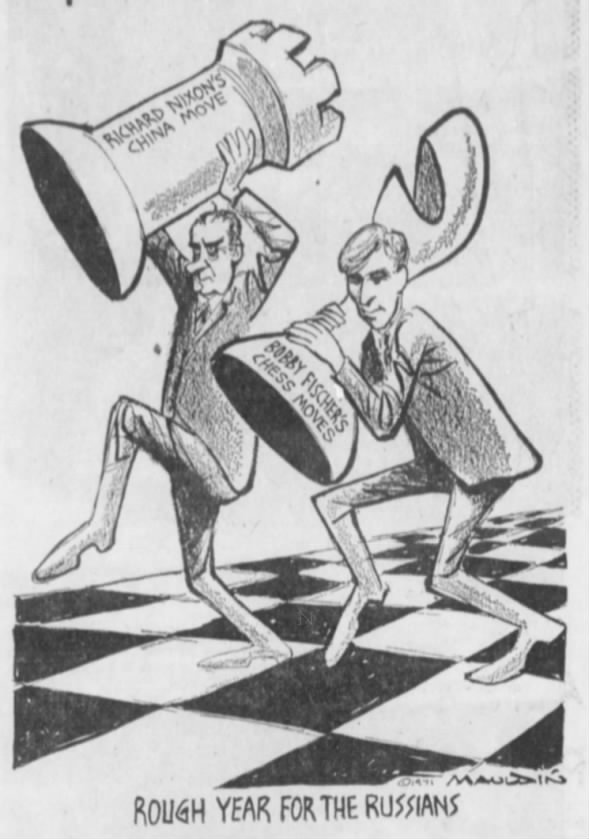 Rough Year For The Russians Wed, Jul 28, 1971 – Page 4 · The Pantagraph (Bloomington, Illinois) · Newspapers.com
Rough Year For The Russians Wed, Jul 28, 1971 – Page 4 · The Pantagraph (Bloomington, Illinois) · Newspapers.com
Fischer's Wins Making Chess History
Editor, The Pantagraph:
I found the Mauldin cartoon on the editorial page July 28 very interesting. It was one comparing the moves of President Nixon and Bobby Fischer.
It was of particular interest because the Pantagraph has failed to give any coverage (save one small paragraph in a larger feature) of either of Fischer's two recent impressive match wins over Taimanov or Larsen.
The only readers aware of the meaning of the cartoon were probably the chess players that have kept up with the matches from other news sources. (The Bloomington-Normal area has one of the highest per capita number of active chess players in the United States.)
Fischer's clear 6-0 match wins over Grandmasters Taimanov and Larsen are unparalleled in chess history. Couple that with his six straight wins against other grandmasters in the Interzonal tournament and Fischer has achieved a place in chess history alongside Morphy and Lasker.
We sincerely hope the match between Fischer and the other finalist (probably Petrosian of Russia) will be covered by the Pantagraph. Hopefully you would continue coverage through the world championship match against Spassky, current world champion and resident of Russia. These matches are tentatively scheduled for this fall and next spring.
Garrett Scott, President, Twin City Chess Club, Director, United States Chess Federation 828 W. Oakland.
Stevens Point Journal Stevens Point, Wisconsin Friday, July 30, 1971 - Page 4
Chess Interest
For a nation which prides itself on its sports conscientiousness, the United States never has been much of a fan of the chess board. People who can name the starting lineup on just about any big league baseball or football team never heard of Paul Morphy or Frank Marshall.
All that may have to change shortly, because an American is well on his way to a spectacular win in the world chess championship. Bobby Fischer already is a household name in Russia, where chess is regarded as a serious test of skill and where the present world champion, Boris Spassky, resides.
Fischer's record in working his way up to the championship test has been nothing short of spectacular. In the preliminary rounds, Fischer won a dozen successive games against two of the world's greatest chessmasters.
The concentrated and slow-paced style of the game may not appeal to the American masses, but a champion is a champion.
Bobby Fischer, at 28, has proved himself worthy of a special niche in the world of sporting contests.
Globe-Gazette Mason City, Iowa Friday, July 30, 1971 - Page 3
Praise or Psyche-Out?
There is no parallel in America for what chess is to the Soviets.
It is the national sport whose masters—hoverers over a mere couple square feet of chessboard—are revered more than men of brawn who dominate whole playing fields and ice rinks.
It is therefore no small matter for the Soviets to have watched America's Bobby Fischer charge through the preliminary rounds toward meeting, after but one more hurdle, the Soviet grandmaster Boris Spassky for the world title.
The Soviets have marveled at the 28-year-old American's drubbings of their own Mark Taimanov and Denmark's Bent Larsen—both in 6-0 shutouts, no less. His aggressive play was in sharp contrast with the dull Petrosian-Korchnoi match which ran to eight drawn games before Petrosian found the courage to try to win a game. In part, then, the sudden praise of Fischer in the Soviet press has been to rub in Soviet scorn for their two countrymen's play, likened to a tennis match in which the contestants merely lobbed the ball back and forth.
But Mr. Fischer is likely aware of another possible motive. As American swimmer Don Schollander wrote in his recent book on competing abroad, the Soviets play the psych-out game for all its worth. Effusive praise for Fischer in the Soviet press may be but a strategy to set him up for rougher treatment in the final two rounds against their men.
Fischer, most chess authorities agree, has the ability to reign as world champion if he can balance the brilliance he has shown since his child prodigy days with the cool and caginess it takes to deal with the Soviet masters. In any event, he has epitomized in his recent challenge matches that spirit of sportsmanship the Soviets most admire—as one Soviet chess commentator put it … “The law of sports is uncompromising fight.”
But a Fischer win in Russia would mean a single-handed victory of a magnitude that could be equaled only by an entire American Olympics team—if then.—Christian Science Monitor
The Guardian London, Greater London, England Friday, July 30, 1971 - Page 6
Chess: The Fischer Bishops by Leonard Barden
After Fischer's clean sweeps in his matches with Taimanov and Larsen, club tournament and county players will scan the young American's games for winning ideas of general application. The basic thread which runs through all Fischer's play is freedom from serious error, technical chess in its best and most precise sense. Two of the strands within this framework are his excellent opening knowledge and his confidence in active bishops in open positions. Such bishops may be confronted by passive enemy bishops, cramped knights, or even disconnected rooks. These two Fischer hallmarks are linked because his favorite anti-Sicilian method with B-QB4 aims at free bishop diagonals, while the underlying theme of his King's Indian and Grunfeld formations with Black is to gain activity for initially cramped bishops.
This weeks games complete the Fischer v. Larsen series begun in the two previous Guardian articles: both show the Fischer bishops, although in the final game it is only after a tough defensive struggle that he emerges with a won ending of bishop against knight. One aspect of the Fischer v Petrosian final world title eliminator this autumn will be a struggle of minor pieces, for Petrosian is noted for his skill in achieving blocked games where knights function well against bishops. Petrosian beat Korchnoi 5½-4½ by winning the ninth game of their match and drawing the rest.
Robert James Fischer vs Bent Larsen
Fischer - Larsen Candidates Semifinal (1971), Denver, CO USA, rd 5, Jul-18
10. f4 Qc8 (Better than 10. … P-QR3 11. P-B5 Q-B1 as in the third match game—but now Fischer chooses an interesting pawn sacrifice to increase the scope of his bishops and rooks.)
18. Rxe4 d5 (If 18. … BxB 19. R(3)xB regains the pawn with good winning chances based on the queen's side pawn majority.)
19. Rg3 g6 (19. … PxR? 20. RxPch K-R1; 21. RxBP dismissed check soon forces mate.)
21. Rxe6 (The rook on the seventh active bishop pair, and extra pawn with the pawn majority are now good compensation for the sacrifice of rook for bishop.)
29. Bc3 h5 (Passive defense by K-B1 is a better chance: now Larsen's rook gets trapped).
35. Kd3! (35. BxB R-K5ch, 36. K-Q3 RxB would only draw.)
39. Bc3 Bxc3 (39. … B-R6 is slightly better, but the outside QRP would still be a defensive trump as it proves in the following pawn endgame.
Bent Larsen vs Robert James Fischer
Fischer - Larsen Candidates Semifinal (1971), Denver, CO USA, rd 6, Jul-20
19. Nd4!? (White has active pieces but weak pawns—so this sacrifice for attack is logical.)
31. Qf6? (Objectively, White should force perpetual check by 31. Q-N5ch K-B2; 32. Q-R5ch since the black king cannot run by 32. … K-K2; 33. QxRPch K-Q1? because of 34. Q-R8ch and 35. NxPch winning the queen. But with a score of 0-5, a draw here would end Larsen's paper chance of continuing the match.)
40. Re8+ Kg7 0-1 (If 41. R-K7ch K-B3 wins the knight, which is trapped in any case.)
The Des Moines Register Des Moines, Iowa Saturday, July 31, 1971 - Page 6
An American World's Chess Champ?
Americans scarcely noticed last week when the top U.S. chess player, Bobby Fischer, shut out Denmark's grandmaster, Bent Larsen, 6-0 in their best-of-10 game match in Denver, Colo. Russians were much more interested. So many were absorbed by the contest that members of the sports department of Izvestia, the government newspaper in Moscow, answered the telephone by saying “6-0” without waiting to be asked.
Each win of a chess game counts a point and a draw counts a half point. Beating a player of Larsen's skill without a loss or draw is considered phenomenal. It was all the more remarkable in that it followed a 6-0 drubbing by Fischer of a Soviet grandmaster, Mark Taimanov. Both wins were part of an elimination process for the right to play the reigning world champion, Russia's Boris Spassky. Fischer's last hurdle before meeting Spassky for the world's chess championship is another Russian, whom Fischer will play next spring.
Russians dominate in chess in part because the Soviet government subsidizes players. The best players are spotted early and are given rigorous training. About four million Russians play chess in organized competition.
Only about 24,000 Americans take the game seriously enough to play in rated tournaments. The few players in this country who make a living playing chess live a hand-to-mouth existence, chiefly from the modest money prizes they win at privately-sponsored tournaments.
If Bobby Fischer plays and beats Spassky, it would be the equivalent of American-born soccer players winning the World Cup, the symbol of international soccer supremacy. Such a chess feat probably would encourage more American youngsters to take chess seriously. That would be good for the youngsters and good for the U.S. and Russia. Competition over the chess board is healthier than most of the forms competition has taken between two countries.
Star-Phoenix Saskatoon, Saskatchewan, Canada Saturday, July 31, 1971 - Page 22
Chess: Sicilian Kills Bird by Harry Mather
With Bobby Fischer of the United States and Petrosian of Russia established, the finals for the world challengers are scheduled for early in September.
Possibly the most interesting struggle of the Fischer-Larsen match occurred in the sixth game, which is given below, with Larsen playing white and Fischer black. This game illustrates both the intense attacking power of Larsen and the defensive ability of Fischer. Larsen used the Bird Opening which Fischer transformed into a Sicilian Defense:
Bent Larsen vs Robert James Fischer
Fischer - Larsen Candidates Semifinal (1971), Denver, CO USA, rd 6, Jul-20
40. Re8+ Kg7 0-1 (and White resigned as his attack has fizzled out, he is material down, and the hanging knight is lost.)
Vancouver will be a centre of Canadian chess activity Aug. 23 to Sept. 3, at which time world champion Boris Spassky will compete in the Open. In addition to this the annual conferences of both the Canadian Chess Federation and world organization will be held at the U.B.C. campus. Saskatchewan will be represented at the Canadian Chess Federation.
The Los Angeles Times Los Angeles, California Sunday, August 01, 1971 - Page 108
Petrosian Wins
Former world champion Tigran Petrosian of the Soviet Union defeated his compatriot Victor Korchnoi by 5½-4½ in Moscow in the semi-finals of the elimination series to determine a challenger for the world title.
After drawing the first eight games of the match Petrosian won the ninth, which turned out to be all he needed. A draw in the 10th and final game was the clincher.
Petrosian had won a previous match in similar fashion against Robert Huebner of West Germany. Playing in Seville, Spain, Petrosian drew the first six games, then won the seventh, when Huebner resigned the match as a result of illness.
Petrosian and Fischer will contest a 12-game match, scheduled to start the third week in September. The site has not yet been agreed upon. The winner will take on world champion Boris Spassky of the Soviet Union next spring.
Fischer is on a record run that has now reached 12 successive match victories, 6-0 against Mark Taimanov of the Soviet Union and 6-0 against Bent Larsen of Denmark.
What happens when the man who wins every game meets the man who draws nearly every one? A good indication was a four-game match between Fischer and Petrosian last year.
On that occasion they “split.” Fischer winning two games and Petrosian drawing two. Since the payoff is still on wins, Fischer was the match victor, by a 3-1 score.
New York Times, New York, New York, Sunday, August 01, 1971 - Page 44
Spassky Prefers Fischer As Chess Title Opponent
Vienna, July 31 (Reuters)— The world chess champion, Boris Spassky of the Soviet Union, says that he will probably defend his title against a compatriot, Tigran Petrosian, but that he would prefer to play against Bobby Fischer, the American grandmasters.
Fischer recently defeated Bent Larsen of Denmark, earning a match against Petrosian for the right to take on Spassky in the championship round.
Spassky told the Hungarian grandmaster Laszlo Szabo, in an interview in today's issue of the Budapest newspaper Magyar Nemzet that “Fischer's competition results are better, but a competition is one thing and a challenger's match is another.”
“I think it would be easier for me to play with the American player than with Petrosian, and the problems involved in the the match would also better engage my attention,” Spassky said.
The Los Angeles Times Los Angeles, California Sunday, August 01, 1971 - Page 108
Fischer In 1970
After having been away from chess for more than a year, Bobby Fischer came back stronger than ever in 1970. Playing a short match with Petrosian (see above) and four major tournaments, he scored 80% against the strongest competition to earn the Chess Oscar for the year.
This editor prepared a booklet titled FISCHER 1970, published by the U.S. Chess Federation with all 73 of his games for the year. The prices is $1.75.
Included are the grandmaster tournaments in Rovinj-Zagreb, Yugoslavia, and Buenos Aires, Argentina, the Chess Olympiad in Siegen, West Germany, and the Interzonal Tournament in Palma de Mallorca, Spain.
The 25 pages include comments on each game, tables and introductions to each event, and a general summary of Fischer's activities. The book is offset printed from original typed copy.
Earlier books in this series, also prepared by this editor, contain all the games of the Buenos Aires Tournament and the Amsterdam Tournament of 1970.
Buenos Aires was one of Fischer's greatest triumphs, in which he finished 3½ points ahead of the field. With 153 games in 36 pages, the price is $2.
The Amsterdam Tournament, organized by the IBM Corp., resulted in a tie for first by world champion Spassky and his compatriot Polugaevsky. It has 120 games in 24 pages and is priced at $1.75.
Anyone wishing autographed copies of one or more of these books can send his check to Isaac Kashdan, Chess Editor, Los Angeles Times. The price for all three is $5.
The Sydney Morning Herald Sydney, New South Wales, Australia Sunday, August 01, 1971 - Page 93
World Chess Title - Fischer V. Russia
WORLD championship series designed to produce the most worthy challenger for the world chess crown always create great interest among many millions of chess players in all civilized countries and especially in those where chess rates as a national pastime.
The cycle takes four years and as the number of contenders is reduced the interest grows.
The third elimination stage is the so-called candidates tournaments played in a series of individual matches among eight players.
With the Soviet Union being the unquestioned leader in world chess, it was not surprising that the world crown stayed in that country for the past 25 years.
Now it looks as though a change is in the wind.
The American boy wonder, Bobby Fischer, now grown up, has not only thrown a challenge, but has virtually trampled on the opposition by winning his quarter-final and semi-final matches against renowned grandmasters, Mark Taimanov of USSR and the great Dane, Bent Larsen, with unprecedented 6-0 scores.
In the final, which should be his hardest test to date, he will meet the ex-world title-holder, Tigran Petrosian, considered as one of the chess giants of all time.
The chess world will hold its breath during the match and the general public will take a special interest because the match will have position undertones with the West at last seriously challenging the East on the chess board at any rate.
If Fischer wins as he is expected to do, he still has to overcome the final hurdle, the 24-game match against the holder, Boris Spassky.
Asbury Park Press Asbury Park, New Jersey Sunday, August 01, 1971 - Page 85
The Chessboard - Fischer Continues Streak
Grandmaster Bobby Fischer of the United States is maintaining a blistering pace in the semifinal round of the candidates matches played to select a challenger for world champion Boris Spassky of the Soviet Union.
As this is written, Fischer has scored five straight wins in his match with Grandmaster Bent Larsen of Denmark, thus extending his candidates match record to 11 consecutive wins against no losses and no draws.
Fischer's performance is virtually without precedent. He is undoubtedly playing the best chess of his career. His play is precise and sharp and he subjects his opponents to unrelenting pressure. A good example of his play is his victory over Larsen in the second game of their match.
9. Bg5 (Since this bishop must beat a hasty retreat, it might have been better to place it immediately at K3. Now came 13. f4 (feeling that he enjoys a slight edge—control of Q5, mobility—White undertakes a kingside attack) 16. f5 Bd7 (and not 16. … PxP; 17. PxP BxP(B4?); 18. RxB!) 17. b4 Qe5 (at fist glance, this seems an uneasy spot for the Black queen); 19. Bf4 (now it appears that the Black queen is in serious danger, but Fischer has an escape route in mind), 20. Nxe4 Qxe4 (and White replied): 21. Bd3 Qd4+ (The Black queen sidesteps, but the position still is complex and fraught with hazards.) 25. Bxd2 (White has retrieved his pawn and appears to stand well.) 26. Bf4 (White does not relish the prospect of … K-N2 and …, R-KR with a strong attack against his king.) 31. Rf1 f5 (Black has secured his king and now can turn his attention elsewhere. There followed 32. Re1 Rf7 33. b5 (stymied on the kingside, White seeks play on the opposite wing), 37. … Ra4 (Typically Fischer. A sharp move in a seemingly innocent position spells the beginning of the end. If now 38. BxR, RxPch; and 39. … KxR, winning. There followed 38. Rc1 Bxb5 39. Bxf7 Rxh4+ 40. Kg2 Kxg5 41. Bd5 Ba6 (suddenly White is quite lost); 45. Kg1 Kf4 (the king is a fighting piece—especially in the endgame); 50. Bf1 Bf3 (Black is skillfully weaving a mating net); 51. Rb8 Be4 52. Ba6 Ke3 53. Rc8 Rb1+ 54. Kh2 Kf4 and White resigns.
Bent Larsen vs Robert James Fischer
Fischer - Larsen Candidates Semifinal (1971), Denver, CO USA, rd 2, Jul-08
English Opening: Symmetrical Variation. General (A30) 0-1
https://www.chessgames.com/perl/chessgame?gid=1044710
34. cxb5
New York Times, New York, New York, Monday, August 02, 1971 - Page 22
Letters to the Editor - The Importance of Chess
To the Editor:
Your recent July 24 editorial “And Who Is Bobby Fischer?” was both welcome and disappointing. It serves as recognition of the king of personal achievement mankind has traditionally honored but is almost weaseling in its comment that chess has never attained the status in the U.S. of baseball, football or bridge “for reasons that go deep into American history and the national psyche.” For just as this proudly capitalistic country needs a wartime business stimulant on a self-perpetuating basis, happily accepts the opportunity to test new weapons, maintains a somewhat liberated cheap-labor class, so it must belittle an intellectual endeavor such as chess: there's no money in it, no Superbowl, All-Star TV prime time.
I'll not belabor the point for at least you have tried sporadically to highlight chess news and did move chess out of the sports columns almost a decade ago, but in your continuing sense of responsibility to the ideals of this nation, might you not start explicating the classic capitalist bind in which we find ourselves.
Nor is there a single really popular spokesman for a courageous revamping of our outmoded “money talks” society, for almost everyone has too much to lose by rocking the capitalist boat. It's even possible that the popularity of chess in the Soviet Union is somehow related to the absence of quite so much emphasis on materialism, as with Ping-Pong in China.
Further, the comment on Mr. Fischer's “erratic and often-disappointing play” was clearly not written in consultation with your own chess editor, Al Horowitz, for at no time in his truly remarkable career has Mr. Fischer been anything but a consistently gifted and dedicated chess player.
That he, as so many in the limelight, displays personality variations supposedly admired in this pioneer nation, becomes a flaw to be deplored and humored. Yet his behavior has almost exclusively been directed at improving chess-playing conditions for the man making the maximum effort, rather than with the organization men's notions of what's good for the player.
Doesn't that sound familiar in so many of man's activities in recent years, and predictably subjected to scorn or calumny. Chess and Ping-Pong diplomacy really have something to offer, not at all secondary to such monuments to human unity as the Mets, Knicks or Jets.
Burton B. Steel, M.D. New York, July 27, 1971
New York Times, New York, New York, Thursday, August 05, 1971 - Page 30
Bobby Fischer will play in a round-robin speed tournament Sunday at the Manhattan Chess Club, 14 East 60th Street, beginning at 2 P.M. The event will be limited to members of the club.
The Guardian London, Greater London, England Saturday, August 07, 1971 - Page 14
Chess: The Man Who Waits by Leonard Barden
Petrosian, the former world champion, has a reputation for negative, waiting play which, coupled with indifferent touranment results, meant that he was never really accepted as the best player in the world while he held the title. After Fischer's crushing defeats of Taimanov and Larsen, the young American will start the hottest of favourites to sweep Petrosian aside in the final eliminator and so qualify to meet Spassky for the championship next spring. Yet, while Fischer has been winning by what Botvinnik in a recent article ironically called his “standard score” of 6-0. Petrosian has quietly fulfilled his own norm of a 1-0 win over Huebner and Korchnoi.
At first sight Petrosian's draws even with the white pieces put little pressure on his opponents: but Huebner resigned the match as soon as Petrosian took the lead while Korchnoi was not only well beaten in this week's game but would also have lost the final game of the series had Petrosian bothered to play it but Botvinnik in his article in the magazine “64,” pays tribute to Fischer's successes but also mentions the American's vulnerability in a crisis. Fischer, says Botvinnik, has yet to face real pressure in the current world title series and it remains to be seen whether he is more resilient than when he withdrew from the 1967 interzonal.
Fischer has always wanted the challengers' matches to be for the first player to win six games rather than a fixed series of ten or twelve encounters. The margin of his wins over Taimanov and Larsen seem to mock Fischer's own fears that the fixed series is too short, but the Petrosian match will be different: Petrosian will settle to be the first to win one, then try to close up the match with half points. Petrosian has lost only twice in his last 61 games, though these were both to Fischer (in the Russia v. World match last year). It is to say the least, arguable that Fischer's bright hopes of the world title will be more at risk in a dozen games against Petrosian than in 24 against Spassky—but we shall see when the match takes place in September. Meanwhile, here is the win which broke Korchnoi's resistance.
Asbury Park Press Asbury Park, New Jersey Sunday, August 08, 1971 - Page 55
The Chessboard - Fischer Feat Unparalleled
Bobby Fischer's shutout victories over two grandmasters in match play are unprecedented in the annals of chess. His defeat of Grandmaster Bent Larsen of Denmark in six straight games followed on the heels of his sensational 6-0 victory over Grandmaster Mark Taimanov of the Soviet Union.
Thus Fischer has qualified for the finals of the candidates matches to select a challenger for the world title now held by Boris Spassky of the Soviet Union. It appears that his opponent will be Tigran Petrosian, the Russian grandmaster and former world champion, who as this is written leads in the match with his fellow country man, Viktor Korchnoi by a score of 5-4.
In the sixth game of the Fischer-Larsen match, the Dane shunned a draw which would have given Fischer the match, but in trying to win ceded a full point to the American. Here is the score:
Bent Larsen vs Robert James Fischer
Fischer - Larsen Candidates Semifinal (1971), Denver, CO USA, rd 6, Jul-20
Bird Opening: Sicilian Bird (A02) 0-1
https://www.chessgames.com/perl/chessgame?gid=1044712
1. f4 (Rather an unusual start, even for Larsen, but we soon are back on familiar ground.)
6. d3 e6 (A sort of Sicilian Defense has evolved with the important difference that What has not so far played the familiar P-Q4. Now came 7. Na3 (an awkward way to develop the knight).
9. Be3 a6 (Black prepares for a general advance of the queen-side pawns)
13. Qd2 (White readies an assault on the most obvious target — the black queen's pawn)
15. Nc2 (White has lost considerable time developing this knight) Rb8; and White played 16. a3 Na5 (Black has detected a weakness in the white squares on White's queen-side.)
17. e5 Bf8 (On 17. … P-Q4, the Black bishop at N2 would have very little scope.)
22. Qf4 (Now that White has given up a pawn, he must try for a compensating attack.)
25. Qxf6 Qxc3 (Larsen on the attack is quite unmindful of material loss).
27. Kh1 (parrying 28. … Q-K6ch, winning the knight, which was not possible on the previous move because of P-R6), Ng4 (merely threatening to win the exchange).
30. Rf4 (A hard decision! Larsen could have cinched the draw but lost the match equally with 30. NxKP, BxN; 31. RxR BxR with perpetual check), f5 (How often in this match has a hardening of the defenses around Fischer's king heralded the beginning of the end for his opponent!)
34. Nxe6 Qf6 (two pawns ahead, Black seeks exchanges; Whites next move was forced).
35. Qe3 (At this point Black applies cruel pressure upon the errant White knight.) Re7 (From this juncture White's moves are largely forced).
40. Re8+ Kg7 0-1 (White resigns. The knight is neatly trapped.)
The Evening Sun Baltimore, Maryland Monday, August 09, 1971 - Page 4
Fischer Opens Club With 21 Chess Wins
New York (AP) — Chess genius Bobby Fischer drubbed 11 grandmasters and masters in a rapid-fire tournament as he helped dedicate the Manhattan Chess Club's new quarters.
Fischer, who started playing at the club when he was 10, won 21 matches and drew 1 in four hours of play Sunday. Under rapid-fire rules, each player has a total of five minutes to make all his moves.
“It's just going through the motions,” said Louis Levy, one of Fischer's earliest victims. “His mind is the closest thing to a machine you'll ever see.”
Fischer, 28, has won 19 straight games in top international competition and faces Tigran Petrosian of the Soviet Union in the semi-finals of the World Chess Tournament next month.
New York Times, New York, New York, Monday, August 09, 1971 - Page 31
Fischer Munches a Bagel and Finds 11 Chess Rivals a Piece of Cake By Paul L. Montgomery
Bobby Fischer, America's chess wonder, diffidently demolished 11 grand masters and masters in a rapid-fire tournament yesterday at the Manhattan Chess Club.
The 28-year-old genius, munching a bagel and lox and sometimes chuckling to himself while his opponents squirmed, won 21 matches and drew one in four hours.
Mr. Fischer, who will face Tigran Petrosian of the Soviet Union in the semifinals of the world chess challengers tournament next month, started playing at the Manhattan Chess Club when he was a 10-year-old in sneakers and crew cut, and returned yesterday to help the club dedicate its new quarters.
Soltis Scores 18-4 Mr. Fischer's final score after meeting each opponent twice was 21½-½. The other leading finishers were Andrew Soltis, the current champion of the Marshall Chess Club, 18-4; Robert Byrne, an international grandmaster, 17½-4½; and Arthur Feuerstein, the current Manhattan Chess Club champion, 11-11.
Though the outcome was a foregone conclusion—Mr. Fischer has won 19 straight games in the highest echelons of international competition — the club's new quarters at 14 East 60th Street were crowded with spectators. All kept their eyes on the leading player.
Mr. Fischer lives for chess, with occasional breaks for eating. When he arrived in New York Thursday, his first request at his hotel was for a room without a view so that his nearly continual analysis of games would not be disturbed.
Mr. Fischer's eating breaks however, can be as prodigious as his chess-playing. Rosser Reeves, advertising man and president of the Manhattan Club, says he saw Mr. Fischer devour two complete Chinese dinners the other night.
Yesterday, Mr. Fischer delayed the early rounds until his favorite meal—bagels and lox and milk—could be sent for. However, Mr. Reeves and Burt Hochberg, the club's executive director, were not troubled with Mr. Fischer's infamous irascibility about tournament conditions.
The club is designed for silence, with quiet fluorescent lighting, cork walls and soft rugs. Harry Zelenko, who designed the setting, said he put in the cork walls “to muffle further all the muffled curses.”
A Tense Appearance Mr. Fischer looks tense when he plays — his jaw muscles working, his fingers touching his chin, his knee jiggling, his shirttail out. His eyes, however, when he surveys the board, are bleak and calm.
Under the rapid-fire tournament rules, a player has five minutes to make all his moves. The winner is the one who checkmates his opponent, forces him to resign, or whose opponent runs out of time. Mr. Fischer rarely took more than three of his five allotted minutes to win.
One of the grand master's early victims was Louis Levy, who said: “It's just going through the motions. His mind is the closest thing to a machine you'll ever see.”
Mr. Soltis, who is a reporter for The New York Post and an international chess master, came close to beating Mr. Fischer when he had a queen against the grand master's rook in an endgame. He blundered, however, under pressure of time and it was quickly over.
“You know you're going to lose,” Mr. Soltis said. “Even when I was ahead I had a feeling.”
Walter Shipman, a lawyer, became something of a club celebrity when he drew with Mr. Fischer—the only game the grandmaster did not win. Actually, Mr. Shipman, too, had a winning game, but blundered into the draw. In their second game, it was over quickly. “He murdered me,” the lawyer said.
Mr. Byrne, the only other grandmaster in the tournament, also had Mr. Fischer cornered, but made a mistake and lost. Usually, a chess game under international rules takes about five hours to play, and the time pressure in rapid transit chess tells. “There are blunders in this kind of chess, and I did one of them,” Mr. Byrne said.
Despite his runaway lead, Mr. Fischer maintained a competitive interest in the tournament, studying the score sheet after each round and calling out, “Who's next?” to his opponents.
In his play, Mr. Fischer showed no quarter. “Pawn takes pawn is a terrible move,” he told Mr. Feuerstein after he had beaten him and they were talking over the game. “What kind of move is that?”
The predominantly young crowd, standing on chairs and craning to see Mr. Fischer's play, was quiet and appreciative, laughing occasionally with their champion at the hopelessness of his opponents. “He is the strongest player who has walked this earth,” Mr. Reeves said as master after master tipped over their kings to signify defeat.
The Herald-News Passaic, New Jersey Thursday, August 12, 1971 - Page 6
Yugoslavia Checked for Chess Challenge
Ventura, Calif. (AP) — The world championship elimination chess match between America's Bobby Fischer and Tigran Petrosian of the Soviet Union most likely will be held in Umag, Yugoslavia, says the president of the World Chess Federation.
Dr. Max Euwe of Holland, interviewed yesterday at the 72nd U.S. Open Chess Championship, said the match will be conducted in mid-September. The winner faces Boris Spassky, Russia's defending world champion.
The Boston Globe Boston, Massachusetts Thursday, August 12, 1971 - Page 50
Hugh Downs Interviews Bobby Fischer
After interviewing Bobby Fischer, the chess champion (to be seen Aug. 19), Hugh Downs, who fancies himself a chess player, asked for a game. As might be expected, he was soundly trounced.
Hugh Downs interviews Bobby Fischer 12:45-16 audio mark
The Herald-News Passaic, New Jersey Thursday, August 12, 1971 - Page 14
In The World of Chess
THE emergence of Bobby Fischer, erstwhile bad boy of international chess, as a serious contender for the world title now held by the Soviet Union's Boris Spassky is incredible. Chess has a small fascination for most Americans; it's as if a winning skipper in an America's Cup challenge turned up on a corn field in Kansas.
Fischer must still face Tigran Petrosian, another Soviet star, in a semifinal match next month in Moscow. If he gets by this hazard, he will face Spassky next spring, also in Moscow. It's a daunting prospect; the Russians take chess about as seriously as the Brazilians take soccer. The one man it doesn't daunt is Fischer. Last year someone asked him who he thought was the world's finest chess player.
“It's nice to be modest but it would be stupid if I did not tell the truth,” he said. “It is Fischer.”
Arizona Daily Star Tucson, Arizona Thursday, August 12, 1971 - Page 2
Fischer To Meet Tigran Petrosian
Ventura, Calif. (AP) — The president of the World Chess Federation said Wednesday the world championship elimination match between Bobby Fischer of the United States and Tigran Petrosian of the Soviet Union most likely will be held in Umag, Yugoslavia.
Dr. Max Euwe of Holland interviewed at the 72nd U.S. Open Chess Championship, said the match will be held in mid-September. The winner meets Boris Spassky, defending world champion from Russia.
Euwe said the Fischer-Petrosian match will be 12 games. If there's a tie, a sudden death situation would be ordered.
The Argus Rock Island, Illinois Saturday, August 14, 1971 - Page 4
Brain Power Is Slighted By Fandom by Julian W. Ramsey
Chess requires more brains than any other form of competition, yet its stars receive the least attention in the U.S. This was understandable while the Russians and other foreigners monopolized the honors, but now the U.S. has a chess wizard in Bobby Fischer and it is time to give him some attention.
Fischer, a one-time Brooklyn prodigy, at 28 has become about the greatest chess player in the world. In 12 successive game victories he knocked off Mark Taimanov and Bent Larsen for the right to challenge the world champion, Boris Spassky of Russia, for the international title.
While chess requires more gray matter than any other form of competition, it is likely that football requires less, unless track be included, yet is the most popular American sport.
You could never teach an animal to play chess — not even a monkey, a dolphin or a crow — and if you did, he wouldn't be very good at it. […] This isn't intended to downgrade athletics, but to point out that physical dexterity is a matter of muscular coordination and quick reflexes, in which animals excel. Those who strive at it are entitled to their monetary rewards. But chess requires sheer brain power and it seems too bad that a player like Bobby Fischer has more admirers in Russia than in the U.S.
The Ottawa Journal Ottawa, Ontario, Canada Saturday, August 14, 1971 - Page 46
On the Way to the World Championship
Former world champion, Tigran Petrosian, of Tiflis, who edged Viktor Korchnoi, USSR, 5½-4½, in the semi-final of the K.O. Match tourney at Moscow, earns the dubious privilege of meeting Bobby Fischer, USA, in the final. A best of 12 games match set for September.
Petrosian had heavy going with Korchnoi, winning only one game with the other nine drawn. In previous tourney play they had met 23 times, with the score 4-3 and 16 draws in favor of Petrosian, which may account for the caution this time. However, that is a large part of Petrosian's style, as in winning from R. Huebner earlier in the tourney, he scored only one win with six draws.
To what extent this “rock” will obstruct the “Computerized Steamroller,” as Time magazine calls Fischer, remains to be seen. Fischer's successive defeats of Taimanov and Larsen by 6-0 scores has the chess world agape. The winner will meet world champion, Boris Spassky, USSR, for the title next year.
The Los Angeles Times Los Angeles, California Sunday, August 15, 1971 - Page 43
Bobby Fischer: Chess Is His Life
'His Mind Is the Closest Thing to a Machine You'll Ever See . . . When I Was Ahead I Knew I Was Going to Lose,' Say Opponents. By Ross Newhan, Times Staff Writer
New York—The other day, during a lunch of lox and bagels at the Manhattan Chess Club, Bobby Fischer quickly demolished 11 masters and grandmasters of the science.
His opponents were mere pawns.
“He was just going through the motions,” said one of Fischer's foes. “His mind is the closest thing to a machine you'll ever see.”
“You know you're going to lose,”
Bobby Fischer first played at the Manhattan Chess Club when he was 10 years old. He will be remembered as the prodigy who won the United States championship at the age of 14.
Now 28, he has since won eight U.S. titles. He has won 19 straight matches from the game's highest ranking players, including a recent 6-0 humiliation of grandmaster Mark Taimanov.
Fischer is preparing to meet Tigran Petrosian of the Soviet Union in the semifinals of the world challengers tournament next month.
A victory will send him against Boris Spassky, holder of the world title, a crown that has eluded Fischer, who describes the Russians as blatant cheaters.
Fischer's bid to win the world title is a crusade. Chess is his life, his passion.
He is described as a genius and his fringe traits are characteristic.
His days, he admits, are disorganized. He does not walk, he runs. He is incessantly jiggling his leg or tapping his foot as he talks.
He goes to bed at 5 in the morning and gets up in the afternoon. Groping to pay a bill, he cannot remember in which pocket he put his money.
He complains about noise while he is playing and he complains about noise while he is being interviewed. Checking into his hotel here, he requested a room without a view so he could concentrate.
Girls, he says, are not interested in him. His clothes are late Goodwill: a soiled blue suit with narrow lapels and cuffs on the pants, a white shirt and thin blue tie.
He reads: the newsmagazines, books on chess, a Russian newspaper that features chess. He is intrigued by a personality like Joe Namath. But he does not like football because of the brutality and he does not like baseball because it is slow, a strange statement from a man who often spends five hours over one game of chess.
He says he played the street games, stickball and dodge ball, while growing up in Brooklyn, but at an early age he asked his mother which was the hardest game.
“When she said it was chess,” said Fischer, ”then that was the game I wanted to play I don't think it was unusual. It was just the way I was.
“The other kids couldn't chide me about it because I was already better than they were in their games . . . like stickball and dodge ball.”
If it was the way he was, it is the way he remains.
“Chess isn't that popular in this country because people don't want to think that much,” said Fischer. “I see some hope in today's youngest people, but the older ones won't change. They just want to be entertained.”
The executive director of the U.S. Chess Federation was talking about Bobby Fischer.
“It can definitely be said,” stated E.B. Edmondson, by telephoned from his home in Ventura, “that Bobby is the greatest chess player in the world.
“The simple fact is that he is a genius and as such he doesn't conform to what is the thought process for most of us.
“He is a young man bursting with energy. A walk to the corner is not just a walk to the corner, it's an energetic experience.”
Please Turn to Page 9, Column 1.
Caption: Master Strategy—Grandmaster Bobby Fischer, onetime child prodigy, ponders his next move. Fischer has won eight U.S. chess championships and 19 straight matches from the game's highest ranking players. His goal is to win the world title from Boris Spassky of the Soviet Union.
The Los Angeles Times Los Angeles, California Sunday, August 15, 1971 - Page 51
Continued from First Page
Edmondson has known Fischer for nine years.
“Bobby is absorbed with chess,” he said, “but that's no different than any genius in any form — Bach when he was composing, Michealangelo when he was painting.
“But Bobby is deceptive, too, and only those people who know him well are aware that he has other interests. He likes popular music. He follows the developments in the electronics industries. He is aware of national and world affairs.”
In his bid for the world championship, the USCF is supporting Fischer through its charitable trust, a tax deductible program.
“We're supporting Bobby,” said Edmondson, “because if he were to win, it would be good for chess and good for the country as a whole.
“It would offset the propaganda the Russians make out of the chess championships they hold.
“The underdeveloped countries would understand the meaning of a young man on his own beating state-supported players. It would be additional evidence in support of the superiority of our system.”
The interview on the day after Fischer's appearance at the Manhattan Chess Club is set for 3 p.m., an hour after he awakens.
Fischer at the moment is a man without a home and the meeting is in the lobby of a midtown Manhattan hotel where he is staying.
For lunch, he suggests the Automat, taking into consideration either his own budget or the writer's expense account.
The walk of four blocks is a frenzied dash on which a slow starter like Dr. Delano Meriweather never would have caught up.
At the Automat, Fischer chooses two pieces of watermelon and three glasses of tomato juice.
He finds a table in the heart of an area where a man is mopping the floor, and he does not pardon himself as he first browses through the newspapers, checking to see if there were any stories on his performance at the Chess Club.
He lifts his head and asks:
“Is this going to be a big story you're doing?”
“Depends on you,” he is told.
“I want a copy of it,” he says.
He is asked if chess belongs on the sports page.
“Yes, if I were an editor that's where I would put it.
“Chess is a science, but it's basically a sport.”
Fischer explained that when he is in training for a match as important as the one he is in training for now, he must reach a physical as well as mental peak.
“During a tournament,” he said, “I'll play five-hour matches six days a week. That takes stamina.
“I swim, walk, play tennis or even bowl.”
But he does none of it regularly.
“My life is disorganized,” he said. “I don't know what I'm going to do tonight or tomorrow.”
Generally, after arising in mid-afternoon, he has something to eat, walks, reads or plays chess for awhile, has something to eat, walks, reads or play chess for awhile, has something to eat, returns to his hotel room, reads and then retires just before the city awakens.
“It's quiet and I find that I can concentrate better after midnight,” he said. “I also need a lot of sleep, and that's why I don't get up until the afternoon.”
Fischer does not play a great deal of chess when preparing for an important match.
“I don't want to tire myself out,” he explained.
He laughed when he was asked if he is truly a genius.
“It's a word. What does it really mean?” he asked. “If I win, I'm a genius. If I don't, I'm not.”
He did not laugh when the Russians were mentioned. His match with Petrosian will be held in Argentian, France, Greece or Yugoslavia. Fischer said he will not play in Russia and suspects that Petrosian will not play in the United States.
&dquo;In Russia,” he said, “they would do everything they could to distract me.
“They'll try to win any way they can. They have no sense of sportsmanship. They find ways to take advice from their seconds or they arrange the schedule against you as they did to me in the finals of the 1962 world tournament.
“The Russian players are simply employees of the state. They have no personalities. They don't think for themselves.”
As employees of the state, they may earn more money than Fischer, who receives some subsidy from the United States Chess Federation, but chooses not to divulge his earnings over the years.
“Relatively,” he said, “the tournament prizes are very small. It's unfortunate, because I play better when money is involved.
“The world championship is worth only $2,000, but it would open up several things . . . lectures, title matches, endorsements.”
Charlotte Saikowski of the Christian Science Monitor reported from Moscow the other day that the Fischer-Petrosian match is the talk of the Russian capital. Said one enthusiast there:
&ldquo:Fischer will win.”
“Why?” he was asked.
“Because he's an offensive player. He'll take risks. Petrosian's style is defensive.”
Spassky, the world champion, is reported to have remarked that Fischer always plays a strong game but that Petrosian is stronger.
“Not having encountered strong opposition, the American grandmaster naturally could not receive the proper training as a chess player,” Spassky is quoted as saying in a press account. Sooner or later, Fischer will begin meeting with unpleasantness, and it is not yet known how he will conduct himself in such a situation.”
Fischer and Petrosian have played each other 18 times since 1958. The score is three victories each and 12 ties.
Should Fischer get by Petrosian and then defeat Spassky, he would be the first non-Soviet champion since 1948.
Fischer appeared last week on the Dick Cavett television show, but the United States' greatest chess player lives in relative anonymity.
“If I've received a lot of publicity in a local newspaper, a few people might recognize me on the street,” he said, “But I'm not like a Namath.
“The lack of recognition doesn't bother me. I have too many other things to think about.”
Fischer did not attend college, nor did he graduate from Erasmus Hall High School in Brooklyn. His mother fostered his interest in chess and he has since majored in the subject.
“A championship match is like a five-hour examination,” he said.
Fischer has 12 times traveled abroad to study at the chess centers of Europe and he is constantly reading new books on the subject. He calls Isaac Kashdan, The Times chess writer, the best in the country.
Fischer, who often laughs sardonically whenever he has his foe sweating, said of Spassky, the world champion, “He's not that tough. I expect to beat him.”
Fischer finished his last piece of watermelon, raised his feet so the man could mop under them, and said:
“Chess is my life. Yes, it's my life.”
The Courier-Journal Louisville, Kentucky Sunday, August 15, 1971 - Page 13
The King's Men: Fischer Favored For Title, But There Are Dissenters by Merrill Dowden
What are Bobby Fischer's chances of becoming world chess champion in 1972?
I predicted in this column more than a decade ago that he would become world champion, and certainly nothing has happened in recent times to change that conviction. Indeed, many observers, dazzled by Bobby's unprecedented feat in defeating two grandmasters by a combined score of 12-0, are already accaliming him as the inevitable successor to the chess throne now occupied by the Soviet Union's Boris Spassky.
Not all prophets share this view, however. One notable dissenter is the eminent English master and analyst, C.H. O'D. Alexander. ‘I would back Spassky to win,’ he was quoted in the British magazine, The Guardian. Alexander went on to hedge somewhat. “There is one word,” he added, “that may overthrow the most careful balancing of chances—genius. It may be that Fischer has this; that he is, as some people think, the greatest player the game has ever seen. And, if this is really so, a match against Spassky could bring out his full powers and then, not for the first time, your columnist will prove to be completely and hopelessly wrong.”
Of course, there is no certainly that such a match will even take place. Fischer must first defeat former world champion Tigran Petrosyan, also of the Soviet Union, in the finals of the world challenge series. This match will take place in September. For the record, let it be noted that Fischer played Petrosyan four games last year. He won the first two, and was content to draw the others.
Asbury Park Press Asbury Park, New Jersey Sunday, August 15, 1971 - Page 57
Draws Mar Soviet Match
In marked contrast to the candidates' match between Bobby Fischer of the United States and Bent Larsen of Denmark, in which the American won six games straight, the match between Tigran Petrosian and Viktor Korchnoi, both of the Soviet Union, was deadly dull, producing eight draws in the first eight games.
Even the Russian chess fans, who for the most part think their chess heroes can do no wrong, reportedly grew restive as the encounter continued its placid way. Small wonder, then, that Fischer has become a hero in his own right to the Soviets, who up until now have no been exactly lavish in their praise of the American grandmaster's accomplishments.
Their change of heart might be better understood through a comparison of the first game of the Korchnoi-Petrosian match with the first game of the Fischer-Larsen match published here earlier.
New York Times, New York, New York, Sunday, August 15, 1971 - Page 92
Fischer Favored To Beat Champion: Expert Puts Odds at 60-40 by Harry Schwartz
The president of the International Chess Federation said last week that he “would put the odds at 60-40” that Bobby Fischer would beat the world champion should the two play next year.
The chess official, Dr. Max Euwe, former world chess champion, also said:
“Remember, however, Fischer has to get past Tigran Petrosian next month, and that won't be easy. Petrosian has a genius for squeezing out victory after a series of long dull games. His style is the very opposite of Fischer's open, creative games.”
Dr. Euwe—his name is pronounced as though it were Erva—who is in this country to meet with American chess officials, reported that there had been no agreement yet on the site for the Fischer-Petrosian 12 game series that will pick the challenger to meet the champion, Boris Spassky, next March or April.
Site a Problem -- “The Russians like Holland, which Bobby doesn't like,” he said. “They're not enthusiastic about Yugoslavia, where Fischer is a hero. Maybe I'll hae to decide the issue by tossing a coin in front of the American and Soviet Ambassadors in Amsterdam,” Dr. Euwe said.
The former world champion made no secret of his admiration for the young American.
“Fischer is a great all round player,” he said. “His strategy and tactics are both superb. He knows openings better than anybody else in the world. And he has enormous patience. He studies chess day and night. In fact I've never seen him do anything but chess.”
Dr. Euwe's introduction to the game came, as with with the young American, at an early age, but in a far more casual manner. He was taught the game by his parents and did not start playing in clubs and minor tournaments until he was 11 years old—a relatively late age for chess prodigies.
Euwe Debut in 1919 -- Seriously study of the game did not start until after he entered the University of Amsterdam in his native Netherlands, where he earned a degree as doctor of mathematics.
Dr. Euwe, who is 70, made his professional debut in 1919 when he was 18—three years older than Fischer was when he became a grandmasters.
In 1935, the tall, taciturn Dutchman beat Dr. Alexander Alkehine for the world championship. He kept the title for two years until he lost it in a rematch to that Franco-Russian virtuoso.
In addition to having a less intense concern with chess than the American contender, Dr. Euwe has been described as one of the few chess geniuses who has both the ability and patience to explain his moves, attributes which are rarely attributed to Mr. Fischer.
Wrote a Book -- While he was the world champion, Dr. Euwe wrote a book entitled “Strategy and Tactics in Chess Play.”
Dr. Euwe reported that interest in chess is rising in many parts of the world, “especially in the United States. I think Fischer is helping a lot here,” he said.
He was philosophical, however, about the low incomes of professional chess players, pointing out that Bobby Fischer won less than $5,000 for his two brilliant 6-0 victories—one over the Soviet grandmaster Mark Taimanov and the other over the Danish grandmaster Bent Larsen—in the elimination matches for the world championship.
“I guess it's too slow a game for many people,” Dr. Euwe said. “After all, 40 moves in two and a half hours, that isn't very fast.”
He indicated that Soviet grandmasters were probably the most prosperous of all the world's chess players. “The best ones all have an automobile and a dacha,” he said. “They also have safe, assured incomes so they don't have to worry economically about winning a tournament. And when they retire, the state gives them a pension.”
Winnings Put at $15,000 -- By contrast, one close observer of American chess estimated that Bobby Fischer may have earned $15,000 last year. “But he'll do much better from now on.” the observer said. “All this publicity will help sell his books and raise his prize money.”
Dr. Euwe's visit to this country is the beginning of a world tour he is making for the International Chess Federation with the aim of helping increase chess interest throughout the world. He estimates there are 60-million chess players in the world. Only 2 per cent of them are women, he said.
In Latin America, Holland, and in the Soviet bloc countries Governments held subsidize chess activities. On a world scale chess is weakest in Asia, though Mongolia has produced a strong team and the Japanese are beginning to show a rising interest in the game. There are no known strong chess players in the Chinese People's Republic, Dr. Euwe said, but he is hoping that country's Government will reconsider the decision that resulted in China's leaving the International Chess Federation at the beginning of last year.
The Los Angeles Times Los Angeles, California Monday, August 16, 1971 - Page 31
3 Nations In Bid To Host Chess Tourney by Isaac Kashdan
Ventura — Dr. Max Euwe of Holland, president of the International Chess Federation, held an informal meeting Sunday afternoon with officials of the U.S. Chess Federation, including president Leroy Dubeck of Cherry Hill, N.J., and executive director Edmund B. Edmondson of Newberg, N.Y.
Dr. Euwe stated that three countries, Argentina, Greece and Yugoslavia, had offered to hold the match between U.S.-based Bobby Fischer and former world champion Tigran Petrosian of the Soviet Union.
The match, scheduled to start late in September, is the final in a series to determine the challenger for the world's chess championship, now held by Boris Spassky of the Soviet Union.
Each of the countries have been asked to supply details as to the playing conditions. Dr. Euwe will make the decision as to the site, if the players cannot agree.
The USCF has bid for the rights to host the annual meeting of the ICF in 1973. The bid will be presented at the 1971 meeting of the ICF, to be held in Vancouver starting August 24.
Also discussed was the possibility of holding the chess Olympics in the United States in 1976, probably in Philadelphia as part of the bicentennial celebration.
This would be for the world team championship, with more than 60 countries expected to enter. The United States has participated regularly in the chess Olympics, but it has never been held here.
Pacific Daily News Agana Heights, Guam Tuesday, August 17, 1971 - Page 16
Call Russians Cheaters And Slanderers - Fischer Tears Into Russians
New York (AP)—Bobby Fischer, 28-year old American chess champion, charged Sunday that the Russians are cheaters at chess … and slanderers too but promised he would defeat Russia's world champion if he ever dared a confrontation. By cheating, Fischer meant the Russians arrange to keep a monopoly on the world title by not giving an outsider a chance at it.
Fischer, a prodigy since age 13, has to defeat Russia's Tigran Petrosian next month to get a crack at Russian world champion Boris Spassky.
In a nationally-televised interview Fischer called Petrosian a fat and arrogant guy who tries to impress his opponent …but a man who has weaknesses inside even though he aggressively pushes out his stomach.
Fischer has confidently predicted he can beat any Russian, including the world champion, and he added:
“The Russians cheat at chess to keep the world title. They have tried by every way to avoid me. They also slandered my name.”
His Columbia broadcasting interview asked Fischer: “And now you're going to get them?”
Fischer smiled: “Well, I'm gonna try to get them.”
Over the weekend, Hollands Dr. Max Euwe, President of the International Chess Federation, said he would give 60-40 odds that Fischer could beat Russia's Spassky.
Fischer was interviewed climbing out of a California swimming pool. He was asked how about drugs? In chess competition.
Fischer replied: “You got only one brain … start tampering with that …?
Quad-City Times Davenport, Iowa Tuesday, August 17, 1971 - Page 17
World Chess Champ?
Probably relatively few Americans have heard of Bobby Fischer but then a great many of them obviously aren't interested in chess.
The 28-year-old Fischer, representing the United States in world chess competition, won 12 straight games against a pair of chess-masters in the preliminaries, Mark Taimanov, a Russian and Bent Larsen of Denmark.
If Fischer can defeat another Russian next month he then will face the reigning world champion, Boris Spassky, for top world honors.
In Russia chess is a national pastime but in this country it never has attained the status of football, basketball or baseball — or bridge.
Russians have dominated in chess in part because the Soviet government subsidizes players. About four million Russians play chess in organized competition. Only about 24,000 play in rated tournaments in this country.
If Bobby Fischer can win the world championship, interest in chess in this country probably will gain considerably. At any rate Fischer has done nobly thus far and merits more accolades than he has received in his own country.
The Province Vancouver, British Columbia, Canada Friday, August 20, 1971 - Page 45
World Title Preview
Vancouver likely will hear the opening shots of the 1972 world chess title match later this month during the congress of the Federation Internationale des Eches (World Chess Federation), scheduled at the University of B.C. from August 24 to September 3.
The congress is being held in conjunction with the Canadian open chess championship in which world champion Boris Spassky of the U.S.S.R. is to compete.
Federation officials expect some heated debate on the world title question. The title has been in Soviet hands since the end of the Second World War and the Soviets are facing the strongest threat yet in next year's title match.
Bobby Fischer of the United States defeated Soviet grandmaster Mark Taimanov 6-0 in quarter-final competition in Vancouver earlier this summer before eliminating Bent Larsen of Denmark by the same 6-0 count in the semi-finals. He now advances against Russia's Tigran Petrosian in the elimination final, to be played later this year. The winner of that match goes against Spassky in 1972.
The world title is on the line only once every three years. It takes that long for challengers to thread their way through all the various elimination rounds. But many countries, particularly the United States, are opposed to this cumbersome system and want a change that will see the world crown defended more often.
Fischer, a chess professional, said during his Vancouver match that he would want to defend the title several times a year if he becomes champion.
World Chess Federation president Dr. Max Euwe of Holland is reported to have two alternate schemes prepared on this question and will put them before the congress.
The Canadian Open, to be held at the Ponderosa Cafeteria on the UBC campus, is expected to draw its biggest aggregation of international masters since its inception nine years ago. The U.S. Open, being held in Ventura, Calif., concludes just prior to the opening of the Canadian competition and many masters are expected to compete in both events, Pal Benko and Lubomir Kavalek of the U.S. and Florin Gheorghiu of Romania have all confirmed they will be playing here.
A total of $4,100 is being offered in the prize money with the over-all winner taking $1,000. The championship will be an 11-round Swiss event and is open to all who want to compete. Entry fee is $25 for adults and $15 for juniors.
Spectators' passes will be $1 a round and $5 for the tournament. Rounds are to start at 6 p.m. daily.
The tournament was made possible by a $1,500 grant from the British Columbia centennial committee which will also host the banquet for the participants in the congress and Canadian Open at the UBC Faculty Club on Sept. 4.
The B.C. Chess Federation is asking for contributions from private donors to help defray cost of the tournament. Contributions should be sent to The Secretary, B.C. Chess Federation, 1337 The Crescent, Vancouver 9.
The Gazette Montreal, Quebec, Quebec, Canada Saturday, August 21, 1971 - Page 41
Tiger vs. Boa-constrictor
Bobby Fischer, USA, who will meet former world champion, Tigran Petrosian, USSR in the final of the K.O. Match tourney, does not teach his opponent but always goes for the jugular. Petrosian is just the opposite in method. With endless patience in slow maneuvering, he waits for one false move that will allow him to put a bind on his opponent and then slowly squeeze him to death.
In his matches with Hubner and Korchnoi he won only one game in each, the others being drawn and no defeats, a sufficient margin for the purpose. By contrast, Fischer was spectacular in downing both Taimamnov and Larsen by 6-0 scores. The coming clash (best of 12 games) will start in the middle of September, probably in Yugoslavia, and their contrasting styles should make an interesting contest, for which the chess world is patiently waiting.
Fischer has had little experience of match play and no one knows how he would react if he got behind in the score early in a comparatively short match. He has always objected to this set-up and hitherto refused to take part, insisting that a set number of wins only should decide. The winner this time will meet world champion Boris Spassky, USSR, in a best of 24 games title match next spring.
… Fischer's superior instinct in gaining the upper-hand in a complicated situation is very marked.
The Vancouver Sun Vancouver, British Columbia, Canada Monday, August 23, 1971 - Page 25
Attention of Chess World Focuses on UBC Congress by Bill Rayner
Vancouver, this outpost of chess civilization becomes the international focal point of the game this week.
Beginning Tuesday and running through to Sept. 4, the 42nd Congress of the World Chess Federation (Federation Internationale Des Echecs) will be held at the University of B.C.'s Cecil Green Park.)
It will be attended by some 50 delegates and officials, including Dr. Max Euwe of The Netherlands, FIDE president; world chess champion Boris Spassky, a Soviet Union delegate; J.G. Prentice, Chess Federation of Canada president; deputy FIDE president N. Rabell Mendez of Puerto Rico; Fred Cramer, FIDE vice president for the U.S., and Ed Edmondson, executive-direction of the U.S. Chess Federation.
Like most international organizations, FIDE has had its troubles in the past. But the 1971 Congress is expected to be a relatively quiet one.
The delegates will go into closed-door committee meetings Tuesday, emerging for general assembly meetings August 31. The three main committees are the central committee, qualifications and rules.
The Congress will award grandmaster and international master titles, appoint officials and rule on a host of issues, both minor and major. The most interesting issue this year should be the rules governing the world championship cycle.
At present, a three-year cycle of tournament and candidates' matches decides the challenger for the world champion. Many believe this to be a cumbersome and time-consuming, although it does produce eventually a worthy challenger.
But it does seem preferable to a previous method of a single, massive candidates' tournament, with opportunities for collusion or the possibility of a fluke victory by a lesser player.
(Before FIDE took control of the world championship, the challenge system was in effect and chess was forced in the 1930s to watch the spectacle of a great player, Alekhine, winning the title from another great player, Capablanca, then ignoring Capablanca's justifiable attempts at a rematch.)
Interest over the world championship is heightened this year by the brilliant play of U.S. grandmaster Bobby Fischer. Fischer, now 12-0 in the candidates' round (beginning with a 6-0 sweep of Soviet grandmaster Mark Taimanov in Vancouver in May), is only one match away from meeting Spassky for the title.
He meets ex-champion Tigran Petrosian of the Soviet Union next month in the deciding candidates' match and is heavily favored to win. For the first time, therefore, since Euwe himself held the title just before the Second World War, the Soviet domination of the world championship is in danger.
For Euwe, 70, this Congress marks the end of his first year as FIDE president. The gentlemanly, businesslike professor of mathematics was elected for a four-year term last September at the 41st Congress in Siegen, West Germany.
He succeeded Folke Rogard of Sweden, who took over as president in the late 1940s and ruled firmly through the turbulent cold war years of chess and politics.
Chess' cold war has ebbed in recent years, although Soviet intransigence still pops up occasionally. (In 1970 the Russians refused to compete in the world student team championship because Israel, the host country, was “unsafe,” and they threatened to withdraw Taimanov from his match with Fischer here this spring in a dispute over playing conditions.)
So apart perhaps from the world championship question, no major crises are expected at this year's Congress. Compromise is the thing and international co-operation is in the ascendancy.
The Congress is being held concurrent with the Canadian Open chess championship, also at UBC. Both the Congress and the Open will conclude Sept. 4 with a banquet at the UBC Faculty Club.
The Leader-Post Regina, Saskatchewan, Canada Monday, August 23, 1971 - Page 7
Fischer's Chess Chances Mooted by Ken Pritchard
New York (CP) — Can Bobby Fischer go all the way this time?
That's the question chess aficionados are debating as officials try to decide on a site for the world challengers' final between the 28-year-old Fischer, presiding genius of United States chess, and Tigran Petrosian, 42, the former world champion from the Soviet Union.
The winner of that clash, scheduled for next month, will battle defending champion Boris Spassky of the Soviet Union next March or April for world supremacy.
Max Euwe of Holland, former world champion who is president of the International Chess Federation, said here this week that the site of the 12-game series between Fischer and Petrosian remained up in the air.
“Maybe I'll have to decide the issue by tossing a coin in front of the American and Soviet ambassadors in Amsterdam,” he said.
Euwe is among Fischer admirers. He gives the young American a 60-40 chance to become world champion in 1972. Euwe, now 70, won the world title in 1935 from Alexander Alekhine, a Russian-born Frenchman. Alekhine took it back from the tall Dutchman two years later.
Fischer's biography, as presented in Anne Sunnuck's Encyclopedia of Chess, says he once declared himself the greatest chess player who ever lived. Within the next few months he will have the chance to prove he's at least the best of the current crop.
In 1957, Fischer won the U.S. championship for the first of eight times. The next year, at age 15, he became an international grandmaster after placing fifth in the inter-zonal tournament and qualifying for the world candidates' tournament.
The Brooklyn bachelor has shown stunning form in his current quest for the world title. He finished first by a wide margin in a preliminary tournament in Spain last December. In the ensuing elimination matches he knocked off Mark Taimanov of the Soviet Union 6-0 in Vancouver and toppled Bent Larsen of Denmark by the same score in Denver, Colorado.
The Vancouver Sun Vancouver, British Columbia, Canada Wednesday, August 25, 1971 - Page 30
Six Months' Training For World Title Defense - Soviet Champion Spassky Alerts His Chess SS by Bill Rayner
Sometimes toward the end of September, Boris Spassky's chess secret service goes into operation.
This is when Soviet Union grandmaster Spassky, champion of the world, goes into training for the defense of his title.
No matter that the championship match won't be played until next March. In the Soviet Union, methodical preparation is everything and Spassky is no exception.
“All the details of my training are secret,” he said Tuesday afternoon. “My chess secret service will be in effect.”
Spassky was relaxing at his hotel between duties as a U.S.S.R. delegate to the World Chess Federation (FIDE) Congress and as an entrant in the Canadian Open chess championship. Both are being held at the University of B.C.
Spassky, 34, is of average height and build, with a certain north of Russia handsomeness and a deep voice. In more than adequate English, he responded to questions after first seeming to analyze them as he would a position on the chessboard.
Waiting for his questioner to make a move at one point, he said with only the trace of a smile: “You have 3½ minutes left.”
Apart from the secrecy over his training methods, Spassky was frank about other aspects of chess.
He agreed that the question of the world championship cycle, up for review this year, is the most important issue before the Congress.
Although he is a member of the central committee empowered to study the question, he is neutral.
“The grandmasters themselves should decide the form of the championships,” he said. “As world champion, I feel I don't have the moral right to become involved.”
As for the 1972 title match, Spassky expects his opponent to be U.S. grandmaster Bobby Fischer. He feels that Fischer has the advantage over Soviet grandmaster Tigran Petrosian in the final challengers' match next month.
Fischer now has won 12 straight games in the challengers' round. He defeated Soviet grandmaster Mark Taimanov, 6-0, here last May and followed up with 6-0 lacing of Danish grandmaster Bent Larsen.
Spassky thought that Larsen's defeat “was a very big surprise.” Taimanov's defeat? “Not so much a surprise.”
However, he thinks Fischer will have his hands full with Petrosian.
“Petrosian is very stable and Fischer will have a tougher match,” he said. “Petrosian keeps his opponents at bay until he wishes to attack.
“Fischer will have to solve many difficult problems. The match will be a test of his character.”
Asked about Fischer's weaknesses, Spassky only smiled.
“I know many sides of Bobby but that is my secret,” he said. “As for my weaknesses, I have many and everyone should know them by now.”
(Spassky once described himself as a lazy Russian bear, ”someone who is very calm and lazy and finds it an effort to spend the time to stand up.” He thought his greatest weakness was that he was too lazy to follow the logical course of a game from opening to end, which he believed is the mark of a true grandmaster.)
Spassky won the world title from Petrosian in 1969, after being defeated by the world champion in his first attempt in 1966.
Originally from Leningrad, Spassky was world junior champion at 18 and the youngest qualifier ever for the world interzonal tournament.
His life and chess career have had their ups and downs. Spassky was only four when forced to evacuate Leningrad during the Second World War. Little Boris was nine when he returned — without a father.
His parents were divorced in 1944 and he grew up with his mother. He seldom sees his father.
Spassky first learned his chess at the age of five, but didn't become committed to the game until 1947 when he joined a Leningrad Pioneers club, a youth organization.
He studied mathematics in university, but switched to journalism because his tournament playing did not leave him enough time for the more demanding mathematics course.
However, he is no longer involved in journalism and has little interest in it.
Spassky went through a crisis in late 1950s which saw him divorced (he has since remarried) and also dropped from international Soviet teams because of listless play.
But then he came under the coaching of Soviet grandmaster Igor Bondarevsky, who appears to be the father figure Boris had needed since his parents were divorced, and began his march toward the world title.
Now Spassky lives in Moscow and plays chess for money.
“I get paid as a trainer of a sports club, but I make my living from chess,” he said Tuesday.
This is Spassky's second visit to Canada and only his second experience with the Swiss system of tournaments, wherein a large number of entries plays a short number of games.
However, he views with equanimity the prospect of spending 11 days playing chess in a room with 152 other players of disparate energies and skills. He is favored to win the Open.
Then it is back to Moscow and the opening gambit in Boris Spassky's chess secret service.
The Windsor Star Windsor, Ontario, Canada Thursday, August 26, 1971 - Page 4
Chess Champ Sees Fischer in Playoffs
Vancouver (CP) — Boris Spassky, reigning king of world chess, says he will begin training in secret next month for a planned defense of his crown next March.
The Soviet grandmaster said in an interview he believes Bobby Fischer of the United States will emerge as the winner of the current elimination series being held to select a challenger to meet Spassky for the world championship he has held since 1969.
The U.S. grandmaster is scheduled to meet another Soviet grandmaster, Tigran Petrosian, in the final round of the challengers' series in a best-of-10-game match starting next month. Site for the series has not yet been chosen.
Relaxing at his hotel between duties as a U.S.S.R. delegate to the World Chess Federation Congress and as an entrant in the Canadian Open chess championship, both now underway at the University of British Columbia, the world champion said he felt Fischer holds an edge over Petrosian.
Fischer now has won 12 straight games in the challengers' round.
The Province Vancouver, British Columbia, Canada Friday, August 27, 1971 - Page 46
Why is Fischer's Tie Important? (Who knows? Except Spassky, the world chess champion) by Paul Raugust
In the infinitely precise world of professional chess, the color or width of your necktie can be of utmost importance to your opponent—at least if your opponent happens to be world champion Boris Spassky of the Soviet Union.
Spassky, who is in Vancouver for the Canadian Open chess championship, said in an interview that he put two questions before his countryman, Mark Taimanov, following the latter's defeat at the hands of U.S. grandmaster Bobby Fischer in Vancouver this summer. The first question, the world champion said, is a secret between himself and Taimanov. The second was: “What kind of tie did Fischer wear in Vancouver?”
Boris Spassky superstitious? That's the first answer that comes to mind. “It's something you and your readers will have to figure out,” was his only explanation. End of topic.
The necktie probably has something to do with psychological warfare. Spassky could be trying to psyche out Fischer before the opening pawn in the world championship is moved. Whatever the answer is, he isn't saying.
Fischer is to meet former world champion Tigran Petrosian, also of the Soviet Union, next month in the finals of the challengers' elimination rounds. The American has a 12-0 score in elimination play so far, having demolished Taimanov and Bent Larsen of Denmark. The winner of the Fischer-Petrosian match wins the right to meet Spassky in a 24-game match next year for the world championship.
Following his lopsided victory in Vancouver, Fischer claimed that he is the best player the chess world has ever seen. “I should have been world champion 10 years ago,” he said.
And he may well be, champ Spassky agreed at his Vancouver hotel. He won't argue the point — yet. The onus, he said, will be on Fischer to prove it next year — if he gets by Petrosian.
Spassky admitted he was disappointed that Larsen didn't win at least one game against Fischer. And with good reason — he'd wagered six bottles of fine cognac with another Soviet grandmaster than Larsen would win at least one game in the semi-finals.
This light-hearted explanation is indicative of the champion's personality and approach to the game. In contrast to Fischer's hypersensitivity and egocentricity, Spassky radiates a confident calmness.
Their personality differences are as pronounced as the differences in their style of play. Fischer's win at all costs, give no quarter gambles are the paradox of Spassky's carefully controlled games that often end in draws, a word that Fischer says is not part of his vocabulary.
“I have a different character,” Spassky said. “He (Fischer) is very ambitious. I'm not so furious that I have to beat everybody. I don't think the title is all that important.”
Spassky makes his home in Moscow with his wife and two children. As a chess professional he spends four to five hours a day studying the game. He started playing at the age of nine, became a master at age 15 and a grandmaster at 18. Now, at 34, he is preparing to defend his world crown for the first time.
Under the current system, it takes a challenger three years to wend his way through all the elimination competitions. Should Fischer become his opponent next year, Spassky would prefer to meet him in a neutral country, playing all 24 games at once, rather than the split that has been suggested with half of the match played in Moscow and the other half in New York. It's still premature, but he says, “I'm sure we will have peaceful, friendly negotiations.”
Tigran Petrosian, Fischer's next opponent, is of the same school as Spassky. And, while Spassky agreed that Fischer probably has an edge over Petrosian, he insisted that the score in their upcoming match won't be as one-sided as in Fischer's earlier matches.
Spassky won the world crown from
Continued on Page 5
Spassky Continued from Page 4
Petrosian in 1969 with a score of 12½ to 10½. “Petrosian is a very difficult opponent for me. His style is control and he reassures his self-confidence with draws while, on the other hand, there will upset Fischer.”
But he conceded that he also likes Fischer's daring style. “He is very strong, lots of energy, and capable of playing five hours with no sign of weariness.”
Spassky and Petrosian are nearly even in the 60-odd games they have played. Spassky, however, holds a decided edge in play against Fischer, having defeated him three games and drawn twice.
Dr. Max Euwe of Holland, a former world champion who is president of the World Chess Federation which is meeting in Vancouver in conjunction with the Canadian Open, said this week that the site of the 12-game series between Fischer and Petrosian is undecided.
“Maybe I'll have to decide the issue by tossing a coin in front of the American and Soviet ambassadors in Amsterdam,” he said.
Whatever the outcome, it is clear that Fischer has captured the imagination of fans the world over. At least in North America the game has not enjoyed such popularity as it has since Fischer started on the road toward attaining his life-time ambition to win world chess supremacy.
The world crown has been in Soviet hands since the end of the Second World War and, with the crown being defended only once every three years, usually with Soviet playing Soviet, there was little for fans to get excited about.
But the enigmatic Fischer, who so often becomes embroiled in controversy, promises to change all that.
If he becomes world champion, he will want the system changed so that he can defend the title “four or five times a year.”
The issue of the world championship is being dealt with by the world body during the Vancouver meeting, but Spassky, who privately admits he doesn't much care for the system as well, refused to become involved in the discussions on the subject here. There are perhaps only 10 players of world championship caliber, Spassky said and perhaps tournaments should be played among them.
The champion said he will concentrate on chess, not talk, while in Vancouver. “I have a good appetite for chess now.”
Star-Phoenix Saskatoon, Saskatchewan, Canada Saturday, August 28, 1971 - Page 5
Spassky Talks About Fischer: Chess King Views Challenger
Vancouver, B.C. (AP) — America's Bobby Fischer has demonstrated his chess skill with 12 straight victories in the world championship challenge series, but now, according to the game's reigning king, he faces a “test of character.”
Boris Spassky, Soviet grandmaster and current world champion, says he believes Fischer will win his challenge match with fellow Soviet Tigran Petrosian, but it will be a rugged game.
“Petrosian keeps his opponents at bay until he wishes to attack,” said Spassky. “Fischer will have to solve many difficult problems. The match will test will be a test of his character.”
Spassky is here for the World Chess Federation Congress and as an entrant in the Canadian Open Chess Championships.
Fischer will meet Petrosian next month in the final match of a series to determine who will challenge Spassky for the world title next March.
Fischer already defeated Soviet grandmaster Mark Taimanov 6-0 here last May, a victory Spassky called “not so much a surprise,” and he beat Danish grandmaster Bent Larsen 6-0 in Denver. That, according to Spassky was “a very big surprise.”
The champion, who once described himself as a “lazy Russian bear,” says he will go into training soon in anticipation of the title challenge.
His greatest weakness, he said, was being too lazy to follow the logical course of a game from opening to end, which he called the mark of a true grandmaster.
And Bobby Fischer?
“I know many sides of Bobby, that is my secret,” he said.
Star-Phoenix Saskatoon, Saskatchewan, Canada Saturday, August 28, 1971 - Page 5
Chess - Spassky Into Secret Training Next Month
Vancouver (CP) — Boris Spassky, reigning king of world chess, says he will begin training in secret next month for a planned defense of his crown next March.
The Soviet grandmaster said in an interview he believes Bobby Fischer of the United States will emerge as the winner of the current elimination series being held to select a challenger to meet Spassky for the world championship he has held since 1969.
The U.S. grandmaster is scheduled to meet another Soviet grandmaster, Tigran Petrosian, in the final round of the challengers' series in a best of 10 game match starting next month. Site for the series has not yet been chosen.
Relaxing at his hotel between duties as a U.S.S.R. delegate to the World Chess Federation Congress and as an entrant in the Canadian Open chess championship, both now under way at the University of British Columbia, the world champion said he felt Fischer holds an edge over Petrosian.
Fischer now has won 12 straight games in the challengers' round. He defeated Soviet grandmaster Mark Taimanov 6-0 here last May and followed up with a 6-0 Denver victory over Danish grandmaster Bent Larsen.
Spassky described the Dane's defeat as “a very big surprise.” Taimanov's defeat? “ Not so much a surprise.”
Discussing the forthcoming challengers' match, he said “Petrosian is very stable and Fischer will have a tougher match.”
“Petrosian keeps his opponents at bay until he wishes to attack. Fischer will have to solve many difficult problems.
The match will be a test of his character.”
Spassky, 34, won the world title from Petrosian in 1969 after being defeated by his countryman in his first attempt at the crown in 1966.
Spassky said the most important issue before the chess congress, which began closed-door meetings Tuesday, is the question of the world championship cycle.
At present, a three-year cycle of tournaments and candidates' matches decides the challenger named to meet the reigning champion for the world crown. Some countries consider the system cumbersome and time-consuming although there is general agreement it eventually produces a worthy challenger.
Spassky said he was maintaining a neutral position on the question.
“The grandmasters themselves should decide the form of the championships. As world champion, I feel I don't have the moral right to become involved.”
New York Times, New York, New York, Sunday, August 29, 1971 - Page 149
Chess: A Look Back At A Former Champion by Al Horowitz
Dr. Max Euwe, President of the International Chess Federation, stopped off in New York recently on his way to California, where he is to confer with U.S. officials at the annual U.S. Chess Federation business meeting. Questions put to Dr. Euwe by newspapermen in New York centered quite naturally on Bobby Fischer, on the arrangements for the forthcoming final Challengers' match between Fischer and Soviet ex-world champion Tigran Petrosian, and on Fischer's chances to win the world title. Dr. Euwe reported that negotiations for the Fischer-Petrosian match were proceeding satisfactorily, although the site had not yet been selected, and said he thought Bobby had an excellent chance of becoming he next champion (“60-40 on Fischer,” was the way he put it).
Dr. Euwe, world champion himself from 1935, when he defeated Alexander Alekhine in one of the most grueling matches in chess history, until 1937, when he lost the return match, was the last non-Russia to hold the title. (Alekhine was born in Moscow, but left Russia shortly after the Revolution, and was for most of his life a citizen of France.)
Born in Watergrafmeer, near Amsterdam, in 1901, Dr. Euwe is 70 now, but he is in excellent health and spirits, and looks much younger. He scored his international success at Gothenburg in 1920, where he tied for second ahead of several famous players. He became Dutch champion for the first time the following year.
In 1923 he received a Doctorate in mathematics and began a teaching career, from which he has just recently retired. After he received his degree he found little opportunity for top-class chess competition, but gained steadily in reputation whenever he did play.
His successes did wonders to popularize chess in Holland (it is still the most chess-conscious of all the Western countries) and in 1935 sufficient backing was found to arrange a match between Dr. Euwe and the then world champion Alekhine. To the astonishment of the entire chess world, including, he admits, himself, Dr. Euwe won, by 9-8, with 13 draws.
Asbury Park Press Asbury Park, New Jersey Sunday, August 29, 1971 - Page 96
The Chessboard: Fischer Favored on Record
Grandmaster Bobby Fischer of the United States enjoys a psychological advantage over Tigran Petrosian of the Soviet Union in their candidates' match scheduled to start next month.
Not only does Fischer enter the match with an unblemished record of 12 straight wins in the matches played thus far, but he also scored 3-1 against Petrosian when they met at second board in the Russia vs. World match played last year.
In that match, Fischer won two games and drew two-a stellar performance against the former world's champion. Fischer's victory in the first round of that match has already appeared here. Here is the score of his win in the second round
ENGLISH OPENING
Petrosian (White) vs Fischer (Black)
5. Nf3 (Also to be recommended is 5. P-K3, but here, too Black does not experience any great difficulties. Now came 5. … e6)
9. a3 (White intends to follow with QR-N and P-QN4), … b6
10. … Bb7 (Black's bishops have assumed excellent position, raking the long diagonals)
12. … dxc4 (Now White's queen bishop's pawn becomes woefully weak).
14. c5 (Feeling that the best way to defend the weak pawn is to advance it, but the results are not favorable to White.)
15. Na5 (White's problem apparently has not be solved);
17. Qc2 Nb7 (Black avoids 17. … BxN; 18. QxB RxP; 19. B-N4!)
19. Nd5 (19. … BxN would yield no more than a draw);
20. Nb2 Bb5 (Black keeps several points under attack, the while improving his position)
21. … Bd4 (dooming the White queen bishop's pawn)
24. … Bxc5 (Black is a pawn ahead and his pieces well poised for the attack).
25. … Bxd3 (Black is forced to part with one of his bishops and the position soon becomes critical)
28. Bg5 (it is doubtful that White should invite the exchange of this bishop) Be7
30. Qd4 (White errs, for after 30 BxN a draw appears the likely outcome) e5
33. … Rc4! (The rook comes into play with good effect, threatening 34. … R-B5!)
41. … Ne8 (After some dubious moves by both sides around the time control, the game again settles down to a difficult struggle).
48. … Ra2 (Luring White into the following inferior reply): 49. Rxf7+ (49 K-N apparently leaves Black with only a draw), Kxf7
54. f4 (also unavailing is 54. K-Q3), Nd7
55. … Nc5 (Black aims at trapping the White bishop);
62. … a2 (the bishop goes lost);
66. … Nd4 (and White resigned.)
Tigran Vartanovich Petrosian vs Robert James Fischer
USSR vs. Rest of the World (1970), Belgrade SRB, rd 2, Mar-31
English Opening: Symmetrical Variation. Two Knights Line (A37) 0-1
https://www.chessgames.com/perl/chessgame?gid=1044685
The Philadelphia Inquirer Philadelphia, Pennsylvania Monday, August 30, 1971 - Page 3
Reds Hit Fischer for Chess Boast
Moscow (UPI).—Russia's leading sports newspaper accused America's Bobby Fischer Sunday of “trying to stir up an unhealthy hullabaloo” against Russian chess players.
A commentary published by Sovietsky Sport denied that the Russians conspire unfairly to defeat foreigners.
At the same time, the commentary praised Fischer for the brilliance of his world championship challenge round victories over Russia's Mark Taimanov and Denmark's Bent Larsen.
“In both matches Fischer showed he is an all-around chess player, unusually strong in both positional and combinational games,” Sovietsky Sport said.
“He may well have some vulnerable points, but that does not prevent us from viewing him as an outstanding chess player and one of the important challengers from the chess crown.
“However, we cannot ignore a number of recent statements Fischer mad … which can only cause a determined protest in any unprejudiced man.”
The newspaper quoted Fischer as saying he had been the best chess player in the world for the past 10 years. It said he accused Soviet players of conspiring to play draws against one another while playing to defeat foreign players.
“He has not been the best chess player in the world for the past 10 years. He has yet to prove he is now … certainly, Soviet grandmasters did not arrange any plots.”
The newspaper said it admired “Fischer the chess player.”
“But the Fischer who is trying to stir up unhealthy hullabaloo around the struggle for the world championship . . . the Fischer who is trying to soil his fellow grandmasters, can only arouse astonishment, not to say something stronger against him,” the commentary by Sovietsky Sport said.
The Capital Journal Salem, Oregon Monday, August 30, 1971 - Page 4
A Cheer For A Gallant Knight
Russia for many years has been as fearsome on the chess board as on the launching pad, but this coming month it will have to face that American genius of total dedication, Bobby Fischer.
Fischer, as 28, lives for the game and continually analyzes attacks and defenses with a single-minded purpose of defeating the former world champion, Tigran Petrosian of the Soviet Union, in the semifinals of the world chess challenge.
The USSR, with more active chess players than the U.S. has high school football players, has dominated the battle of pawns, knights and castles, and valiantly protected the only kind of king it recognizes. For eight consecutive times it won the world team title and Russia's Elisaveta Bykova three times picked up the women's crown.
However, America's leading hope, the grandmaster of the checkmate sport, has zeroed his computer-like brain in on the Russian.
And all of the fans who thrill at the silent gallop of a queen's knight to square QB-6 will cheer loudly in silence.
The Province Vancouver, British Columbia, Canada Monday, August 30, 1971 - Page 25
Chess Venue Up In Air by Paul Raugust
A toss of a coin may turn out to be the only way that the U.S. and Soviet chess federations will agree on the site of the finals in the world chess championship challengers series.
Delegates of the two chess federations have been meeting in Vancouver during the past week but have been unable to agree on a site for the match between grandmasters Bobby Fischer of New York and Tigran Petrosian of the Soviet Union.
Ed Edmondson, vice-president of the U.S. Federation, said Sunday that the only thing agreed upon so far is that the negotiations be concluded by Tuesday. If no agreement has been reached by then, World Chess Federation president Dr. Max Euwe of Holland will be asked to flip a coin to settle the issue.
The U.S. wants the match held in Buenos Aires, Argentina, while the Soviets are determined it be held in Athens, Greece.
Boris Rodionov, who leads the Soviet delegation in the negotiations, says he is opposed to a site in either North or South America because Fischer has already played two matches in the challenger's series in the America's.
Fischer played Soviet grandmaster Mark Taimanov in Vancouver in May and Bent Larsen of Denmark in Denver, Colorado in July, defeating each by a score of 6-0.
But Edmondson argues that these are the only two matches in the candidates' series' 20-match history to be held outside of Europe.
Edmondson also said that the world federation is almost bankrupt and could well use the 6,000 Swiss Franks the Argentinians offer to pay the federation for the right to hold the match.
This figure is substantially more than what has been offered by the Greeks.
Edmondson and Rodionov planned to mix business with pleasure today as they were to continue negotiations during a sight-seeing tour of Vancouver Island.
Winner of the Petrosian-Fischer match, to be held in late September, will advance against world champion Boris Spassky of Moscow in a 24-game match to be played in the spring of 1972.
The Arizona Republic Phoenix, Arizona Tuesday, August 31, 1971 - Page 12
Match Site Talks Still Deadlocked
Vancouver (UPI) — Negotiations to pick a site for the final challengers match in the world chess championship remained deadlocked last night, and the flip of a coin may decide the issue today.
The match between grandmasters Bobby Fischer of the United States and Tigran Petrosian of the Soviet Union will determine who will face world chess champion Boris Spassky of Moscow in a 24-game title match next year.
The Vancouver Sun Vancouver, British Columbia, Canada Wednesday, September 01, 1971 - Page 6
Chess Match Site Draws Soviet 'nyet'
Once again a Russian “nyet” is echoing about the University of B.C.
And, as it did here last spring, it involves U.S. grandmaster Bobby Fischer and a game of chess.
Then, the dispute was over the playing conditions at UBC for the challengers' round match between Fischer and Soviet grandmaster Mark Taimanov. The Russians vetoed the Graduate Centre site chosen for the match and won their point when the games were switched to the Student Union Building.
This time, there is a more difficult problem: the choice of a city for the final challengers' round match between Fischer and Soviet grandmaster Tigran Petrosian.
Soviet negotiator Boris Rodionov is here for the World Ches Federation (FIDE) Congress at UBC's Cecil Green Park, as is Ed Edmondson, U.S. negotiator and executive director of the U.S. Chess Federation.
They are sandwiching their deliberations between official business at the Congress.
The position is this:
Four invitation has been received as the site of the match, from Skopje and Umag, Yugoslavia; Buenos Aires and Athens. The Russians have summarily rejected Skopje, Umag and Buenos Aires and have opted for Athens.
Edmondson leans toward the South American site, but is willing to compromise.
“We'll play in Athens if the Russians agree to a city in the America's for the world championship match — providing Bobby beats Petrosian,” Edmondson said Tuesday night.
“Or, if we play this match in Buenos Aires, we'll agree to play the world championship in Athens. It seems a reasonable compromise, but the Russians have turned it down.”
Winner of the Fischer-Petrosian match will meet world champion Boris Spassky of the Soviet Union in a 24-game match for the title next spring.
Edmondson said the decision could hinge on a coin flip by FIDE president, Dr. Max Euwe of The Netherlands, should the Russians not budge from their position.
He ruled out Vancouver as a compromise site.
The Fischer-Petrosian match is scheduled to start Sept. 22.
The Boston Globe Boston, Massachusetts Wednesday, September 01, 1971 - Page 2
Argentine Chess Federation Offer
The Argentine Chess Federation has offered $11,000 dollars each to chess masters Robert Fischer of the United States and Tigran Petrosian of Russia if they will play their decisive world championship elimination match here. Sources added they understood Fischer was prepared to accept the offer, but Petrosian preferred to play in Europe.
New York Times, New York, New York, Thursday, September 02, 1971 - Page 30
Chess: Fischer's Defeat at the Hands of Spassky—an Off-Moment
Bobby Fischer's 19-game victory streak, which includes 6-0 triumphs over Grandmaster Mark Taimanov of the Soviet Union and Bent Larsen of Denmark in the world chess eliminations, started in a tournament in Palma, Majorca, in Spain. Te last match the New Yorker lost was to Larsen, Denmark's grand master.
Only the mighty José Raul Capablanca, a Cuban genius and one-time world champion, came close to approximating this feat. For 10 years, Capablanca did not lose a single game.
Now actuaries need a good look at their basic figures. Is it perfection in strategy and tactics that insures victory, or is it the absence of blunder that safeguards each position? The blunder quota of Fischer's opponents—even the grandmasters—is out of line with their ability.
A slip of the finger or a mental block or hallucination are part and parcel of the repertoires.
Fischer Suffers Lapse -- The following game, Boris Spassky of the Soviet Union against Fischer, at the Siegen, West Germany, Olympiad, shows a blunder-prone Fischer in an off-moment.
The defeat was three months before Fischer's most recent setback against Larsen.
The defense, a Gruenfeld, is a favorite with Fischer. Early, Fischer obtained the edge because of White's isolated queen pawn. Out original appraisal favored Black. But it was indeed difficult to confirm the point.
Instead of move 24. … BxBch, Black could retain the better position by 24. … B-N3. Then after 25. QxPch, QxQ; 26. NxQ R-Q7; 27. BxB PxB.
After 32. … Q-B2, Black was in trouble. But 32. … K-N2 would not do because of 33. P-B5 Q-Q4 (to anticipate the dire threat of 34. Q-R4) 34. N-K8ch K-N1; 35. Q-K6ch R-B2; 36. PxP R/7xR; 37. PxRch, RxPch; 38. K-R1. Thus Fischer pitched a bungling game.
But is is interesting to note that Dr. Max Euwe, a former world champion and now president of the International Chess Federation, gives Fischer a 60-40 chance of beating Spassky if Fischer should win his elimination match against Tigran Petrosian of the Soviet Union and qualify to challenger for the world title held by Spassky.
It is conceivable that those who were blanked by Fischer should be down-rated to a “draw odds” group. This means, if they can manage to draw, they are credited with a victory. But it is rather clear that they cannot draw by splitting a point too easily.
In “draw odds,” the weaker player gets the White men. But Fischer has proved that he can play White or Black and win.
Boris Spassky vs Robert James Fischer
Siegen ol (Men) fin-A (1970), Siegen FRG, rd 6, Sep-20
Gruenfeld Defense: Exchange. Classical Variation (D86) 1-0
https://www.chessgames.com/perl/chessgame?gid=1044698
The Vancouver Sun Vancouver, British Columbia, Canada Thursday, September 02, 1971 - Page 6
Chess Talks Continue - Vote Could Settle Venue
A democratic vote here Friday at the World Chess Federation (FIDE) Congress could decide the site of the challengers' elimination match between grandmasters Bobby Fischer of the U.S. and Tigran Petrosian of the Soviet Union.
Ed Edmondson of the U.S. and Boris Rodionov of the U.S.S.R have been negotiating here for several days, and it was previously expected that FIDE President Dr. Max Euwe of The Netherlands would break any deadlock.
But Euwe asked the Congress general assembly Wednesday whether it wished to rule on the site if the negotiators fail to come to an agreement.
The assembly said it would, and the vote, if necessary, will take place Friday morning.
At issue is the choice of four sites: Skopje and Umag in Yugoslavia, Athens, and Buenos Aires. The Russians have vetoed every city but Athens, while the U.S. favors Buenos Aires but is willing to compromise.
The bid from Buenos Aires seems to be the better one. It has bid $12,000 to stage the match, plus a $1,500 donation to FIDE and expenses for seven persons from each country.
The $1,500 donation would be a major gain for FIDE. The 70-member federation has an annual budget of only $15,000. Athens has bid $10,000, plus expenses.
Winner of the 12-game Fischer-Petrosian match will meet world champion Boris Spassky of the Soviet Union next spring in a 24-game match for the title.
The Vancouver Sun Vancouver, British Columbia, Canada Friday, September 03, 1971 - Page 1
U.S. Wins Twice at Chess Parley by Bill Rayner
The United States scored a significant double victory today as the World Chess Federation (FIDE) ended its congress at the University of B.C.
FIDE president Dr. Max Euwe announced that the nodraw system will be in effect in the next world championship cycle.
This has long been proposed by U.S. grandmaster Bobby Fischer, who contends that drawn games are ruining chess.
Euwe also said that Buenos Aires will be the site of the final challengers' elimination match between Fischer and Soviet Union grandmaster Tigran Petrosian.
Buenos Aires had been favored by the U.S., while the Soviet Union had wanted Athens, and no change in the drawing system.
Winner of the Buenos Aires match, to begin Sept. 30, will meet world champion Boris Spassky, of the Soviet Union, for the title, probably in April of 1972. Site of that match has not been determined.
In the next world championship cycle, from 1972 to 1975, the congress decided that only wins will count in the challengers' series.
With draw games not counting, three wins will be needed in the quarter-final matches, four in the semi-finals, and five in the final challengers' match.
The world championship match in 1975 will be decided by the first player to score six wins.
The structure of the world championship cycle has also been altered.
There will now be two interzonal tournaments in 1973, instead of one.
Eight grandmasters will be seeded into this tournament without having to qualify. They will be picked by a FIDE committee.
Also seeded will be six defeated challengers from this year's matches and a top junior player.
The inter-zonals will select three players each to join the two seeded players from the world championship final, as previously. No sites for the inter-zonal have yet been chosen.
The site for the Fischer-Petrosian match was drawn by lot after it became apparent that the congress would be widely split over the choice of sites.
The congress earlier this week decided to choose the site after the U.S. and Russian negotiators could not agree.
Winner of the match will get $7,500 and the loser $4,500.
U.S. Chess Federation executive-director Ed Edmondson said he was highly pleased with the outcome of the congress.
“We've been pushing for the no-draw system for some time now,” he said. “It will make chess a lot more interesting.”
Edmondson said he was also happy over the choice of Buenos Aires, even though the U.S. victory was by chance.
The Oshkosh Northwestern Oshkosh, Wisconsin Friday, September 03, 1971 - Page 6
Cold War Chess Opponents
Beginning about the middle of September, and possibly to be staged in Yugoslavia, an American will engage a Russian in the seminfinals of the world chess challenger tournament. The winner will challenge world champion Boris Spassky of the Soviet Union for the title in March, 1972.
The American is Bobby Fischer, now 28, who has been playing chess in big-time competition for 14 years.
The Brooklyn, N.Y., resident was once the “enfant terrible” of chess, but is now said to have his temper under tighter control and should continue to give a good account of himself as a representative of his country.
He will meet Tigran Petrosian, a former world champion who has lost only twice in his last 61 games. Both of those losses were to Fischer in the Russia vs. World match in 1970.
In pursuit of the world championship that has been a Soviet monopoly since 1948. Fischer has won his last 19 games in matches against grandmasters. Chess experts groping for a parellel to make Fischer's feat intelligible to nonplayers speak of hitting 19 home runs in 19 times at bat. In a typical demonstration, Fischer on Aug. 9 demolished 11 grandmasters and masters in a rapid-fire tournament at the Manhattan Chess Club where he started playing at the age of 10.
While there is little attention to the Petrosian-Fischer match in the United States, it is reported to be the talk of Moscow. Let's hope the talk in America will be good after the match and that Fischer will gain in ability enough to wrest the world title from Spassky next March. To devotees, it isn't just a game.
The Selma Times-Journal Selma, Alabama Friday, September 03, 1971 - Page 4
Editorial Research Reports - Cold War Chess; For What It's Worth
(Editor's Note: Bobby Fischer of the United States is scheduled to face Tigran Petrosian of the Soviet Union in the semifinals of the world chess challengers tournament beginning sometime between Sept. 12 and 15 at a site still to be announced possibly Yugoslavia. The winner will challenger world champion Boris Spassky of the Soviet Union for the world title in March 1972).
George Bernard Shaw called chess “a foolish expedient for making idle people believe they are doing something very clever, when they are only wasting their time.” That may still be the majority opinion. But there are those like French artist Marcel Duchamp who see the subliminal attraction of the the royal game.
“In chess,” he says “there are some extremely beautiful things in the domain of movement, but not in the visual domain. It's the imagining of the movement or of the gesture that makes the beauty … It's completely in one's gray matter.”
Even Duchamp concedes that the milieu of chess players is a bit rarefied. “These people are completely cloudy, completely blind, wearing blinkers — madmen of a certain quality, the way the artist is suppose to be, and isn't, in general.” He might have had Bobby Fischer of Brooklyn, N.Y., in mind.
FISCHER at age 28 no longer can qualify as the enfant terrible of big time chess. After 14 years in competition, his temper is under tighter control, although his life style remains appropriately bizarre. Fischer lives out of a succession of hotel rooms; goes to bed at 5 a.m. and gets up at 3 p.m.; complains unduly about noise; dines at the Automat on watermelon and tomato juice; dresses in a style that has been described as “late Goodwill”; and think about little but chess.
In pursuit of the world championship that has been a Soviet monopoly since 1948, Fischer has won his last 19 games in matches against grandmasters. Chess experts groping for a parallel to make Fischer's feat intelligible to non-players speak of hitting 19 home runs in 19 at-bats. “Sports Illustrated” notes that the analogy is inexact because as a rule “more top-level chess games are drawn than are won or lost. A hard-pressed grandmaster can usually force a draw.”
Not against the high-school dropout. In a typical demonstration, Fischer on Aug. 9 demolished 11 grandmasters and masters in a rapid-fire tournament at the Manhattan Chess Club where Fischer started playing at age 10. One of his victims commented: “You know you're going to lose. Even when I was ahead I had a feeling.”
THE UPCOMING MATCH with Petrosian is seen as a crucial test of Fischer's stamina and patience. The “Guardian Weekly” warns that Petrosian “has a reputation for negative waiting play” and might settle for winning the first game and then trying to close up the match with half-points obtained through draws.
In his typical aggressive style, Fischer already has created a controversy by charging that the Russians “have no sense of sportsmanship,” and that they find ways to take advice from their seconds or arrange the schedule against their opponents. The upcoming Petrosian-Fischer match is reported to be the talk of Moscow, but it has attracted little attention in the United States.
Fischer's explanation for the comparative unpopularity of chess in America is hardly flattering. “People don't want to concentrate. It's too painful.” To devotees like Fischer, chess may be a science and a sport but it's no mere game.
Fitchburg Sentinel Fitchburg, Massachusetts Friday, September 03, 1971 - Page 6
Wachusett Chess Club To Begin Season Sept. 7
The executive board of the Wachusett Chess Club has announced that it will commence its 1971-72 season on Tuesday, Sept. 7, starting at 7:30 p.m. at the Fitchburg YMCA on Wallace Avenue.
The board encourages all chess players in the area, despite their level of play, to attend the first session and partake in the activities. The first meeting will feature a detailed report on the progress of U.S. grandmaster Bobby Fischer, who has been clobbering the opposition on his way to the world championship chess title.
After having soundly defeated Russian grandmaster Mark Taimanov 6-0 and Danish grandmaster Bent Larsen by an identical score, the 28-year-old Fischer has one more obstacle to surmount before he can play world champion Boris Spassky of the Soviet Union for the coveted title. That one obstacle is the Armenian grandmaster and former world champion Tigran Petrosian.
Petrosian and Fischer have clashed over the board 18 times in the past 13 years, with the score presently standing at 3 wins apiece and 12 draws. The tie, however, will be broken by the end of their 12-game match, which is scheduled to begin in the third week of September, presumably in Yugoslavia. The 42-year-old Petrosian should be somewhat pessimistic about his chances, since his last win against Fischer was back in 1962 when the American superstar was 19 years old and still on his way up.
Last year in Belgrade, Yugoslavia, the phenomenal Fischer trounced the overcautious Petrosian twice in a four game match and effortlessly drew the remaining two games.
New York Times, New York, New York, Saturday, September 04, 1971 - Page 18
Site of Chess Match Set
Vancouver, British Columbia, Sept. 3 (Reuters)--Buenos Aires will be the site of the final challengers elimination chess match between Grandmaster Bobby Fischer of the United States and Grandmaster Tigran Petrosian of the Soviet Union, the World Chess Federation announced here today. The winner of the match, which will begin Sept. 30, will meet the world champion, Boris Spassky of the Soviet Union, for the title, probably in April 1972.
The Province Vancouver, British Columbia, Canada Saturday, September 04, 1971 - Page 45
Chess Congress - Argentina Gets Nod For Finals by Paul Raugust
Buenos Aires, Argentina, Friday was awarded the final match of the world chess championship challengers' series by the World Chess Federation.
The match, between Bobby Fischer of New York and Tigran Petrosian of the Soviet Union, is to begin Sept. 30. Winner of the best-of-10 series will advance against world champion Boris Spassky of Moscow for world supremacy.
A dispute over the site of the Fischer-Petrosian match threatened to split the World Chess Federation which has been unable to agree on a site but finally holding its annual congress in Vancouver for the past two weeks.
The Soviet and U.S. federations were unable to agree on a site but finally agreed to draw lots. The Americans won.
The U.S. federation also was successful in having the world federation change some crucial points in the system of play in the world championship. Draws will no longer count in the challengers' series, a point that Bobby Fischer has been arguing for years.
The three-year cycle for choosing an eventual challenger for the world champion remains unchanged, world federation president Dr. Max Euwe of Holland said. But modifications in the system will allow automatic seeding in interzonal competition for some of the top players in the world.
Dr. Euwe said the new system, worked out during the Vancouver congress, will allow for automatic seeding of eight of the world's best grandmasters.
Also seeded will be the six defeated candidates from the challengers' series, the loser of the world champion final and the reigning world junior champion.
With draws not counting in the challengers' series, the quarter-finals will be won by the first player to win three games, the semi-finals by four wins, the finals by five wins and the world championship by six wins. No maximums have been set on the number of games in each series.
The 1973 interzonal finals, which will decide the challengers for the 1975 world championship, will be split in to two tournaments and a committee is being formed to make certain that each will be of equal strength.
Dr. Euwe also announced that Guatemala became the 77th member-nation of the world federation which represents more than six million chess players around the globe.
Times Colonist Victoria, British Columbia, Canada Saturday, September 04, 1971 - Page 16
Bobby
If there are any positive superlatives left over to describe Bobby Fischer's play in the past few months, I don't know what they are. His blanking out Russia's Mark Taimanov in Vancouver toward the end of spring was masterful. Six straight games! So far as I can recall there has never been a comparable shellacking in Candidates' play. But for Fischer then to pull the same stunt in Denver against Denmark's Bent Larsen was to make chess history not likely to be duplicated in this lifetime of anyone reading this column.
Poor Larsen! Just a few days before his ignonominious defeat at Bobby's hands, he was quoted in a Swiss magazine as saying that he had every hope and intention of going all the way to the top and playing the world champion in 1972. That dream was cracked with the first game in Denver, shattered in the second and pulverized in the next four.
The finals, which will pit Fischer against Tigran Petrosian, the winner to play world champion Boris Spassky, should be truly exciting. If all goes well with Fischer, it will be the first time in years that world chess has not been dominated by the Russians.
“I have a sense of mission to win the championship,” Bobby said immediately after his victory. “I feel I have been the best player in the world for 10 years.”
Nobody has ever accused Fischer of false modesty. But he just might be right. Several times in the past it has seemed that only the notorious Fischer temperament has stood between him and the summit. And, actually, there is really no guarantee that it won't again. But as things stand now, after a century in the wilderness, the U.S. at last has someone who has a chance to become the Champion of the world.
New York Times, New York, New York, Sunday, September 05, 1971 - Page 106
Chess: Most People Would Bet on Fischer by Al Horowitz
The final match of the Candidates' series, between America's Bobby Fischer and ex-world champion Tigran Petrosian of the Soviet Union will begin in a few weeks, but most people are not talking about what will happen in that match, but in the one after it. “After I take care of Petrosian,” Bobby himself has said, “I go on to play Spassky,” and indeed there isn't anyone in the chess world outside of Russia—perhaps outside of Petrosian's native Armenia—who doesn't think Bobby will “take care of” his next opponent as easily as all that.
The causes for such optimism on the part of Bobby's well-wishers are many. Fischer, there are their respective performances in the matches leading up to the final match. While Fischer was blitzing Soviet grandmaster Mark Taimanov and the Danish star Bent Larsen—both by 6-0—Petrosian was winning his matches in the least incisive fashion imaginable. Against the relatively unknown West German player Robert Hubner he drew the first six games before winning the seventh and, against his compatriot Viktor Korchnoi, he drew the first eight. A greater contrast could hardly be imagined.
A second reason to encourage those who hope for an easy Fischer victory is the result of his most recent encounter with Petrosian. At the match that pitted 10 Soviet players against a team selected from among the leading players of the rest of the world, Bobby met Petrosian on second board and beat him by 3-1—two wins for Bobby, and two draws. If the results of this meeting are any indication, Bobby has Petrosian's number.
On the other hand, a careful examination of those very games would indicate that things might be a little tougher for Bobby than most anyone expects. In the first of those games, Petrosian made a bad blunder in the early middle game (see the third game below) when he played 17 ... K-B1 instead of 17 ... O-O, and never had a chance thereafter. The second game Fischer won after a dour struggle lasting 66 moves. The third game was a short draw in which Bobby made no progress against Petrosian's solid defense. In the fourth it was Petrosian who had the initiative and Bobby who, after tenacious defense, finally salvaged a draw.
Thus, even after two straight losses, the first an out-and-out disaster, Petrosian was unshaken, and came back strongly in the remaining games. This is precisely what Bobby's two previous match opponents have failed to do and it is why they were defeated by such decisive margins.
Like everyone else, this commentator believes that Fischer will beat Petrosian. Unlike most, however, he believes that after Fischer has done it, he will know he has been in a fight.
The three games that follow show Fischer and Petrosian meeting at various stages of Fischer career. THe first from the Candidates' tournament in Yugoslavia in 1959, is a very bad game by Fischer and not indicative of their relative strengths at the time, but Petrosian did beat him 3-1 in that event.
The second game below is Fischer's first victory over Petrosian, played at Bled, Yugoslavia, in 1961. In the diagrammed position, 22. QxNP is quite playable: 22. … K-K2; 23. PxP Q-B3; 24. B-N6 QR-B1; 25. KR-K1 (instead of 25. BxP as previously suggested) KR-N1; 26. R-Q6 and wins. In the game, 27. … R-Q3 is a losing blunder; simply 27. … NxB draws easily. Once given the chance, Fischer finishes neatly.
Daily News New York, New York Sunday, September 05, 1971 - Page 22
Free Press Note : Soviet Russia
it's leading sports “newspaper” the other day loosed a loud blast at the great U.S. chess player, Bobby Fischer.
The sheet admitted that Mr. Fischer is an “all around chess player, unusually strong in both positional and combinational games,” but added that recently he has been telling untruths about Russian chess experts.
These folks, Fischer was quoted as charging, habitually plot to play draw games against one another but play to defeat foreign players.
This is far from the first time such charges have been fired at Soviet chess plaers. And it's at least a fair bet that the charges are true. The Kremlin habitually uses sports for political purposes.
So here's a suggestion:
Why not a free-world chess federation of some sort, which would refuse to recognize chess “champions” in Soviet Russia, Red China, or any of the Captive Nations, until and unless ironclad international chess tournament rules to preclude cheating were accepted by those nations?
All this isn't overly important; but why should free-world chess players hold still while Reds play them for patsies?
Fort Worth Star-Telegram Fort Worth, Texas Sunday, September 05, 1971 - Page 3
Chess Title on Line
The final challengers' series for the world chess championship will be played in Buenos Aires between grandmasters Bobby Fischer of the United States and Tigran Petrosian of Russia …
The Times Shreveport, Louisiana Tuesday, September 07, 1971 - Page 15
World Chess Title Chance Called Even
Moscow (UPI)—American Bobby Fischer and Soviet Tigran Petrosyan have “equal chances” to win their forthcoming final match in the World Chess Championship, Soviet grandmaster Szalo Flor said Monday.
Flor, writing in the weekly magazine Ogonek, said “the match will certainly be a tense one. The chances? They are equal.”
The winner of the match in Buenos Aires will play reigning champion Boris Spassky of the Soviet Union for the world title in 1972.
“Concerning Fischer's excellent performance, it is risky today to speak critically of him,” Flor said. “His performance can and must evoke admiration. But this does not mean it is impossible to cope with him.”
Flor said “Petrosian is a modest chessman. He is satisfied scoring a single victory in a match and letting the other games end in draws. Many believe that this tactic will not do with Fischer. Let us wait and see.”
Flor said “I think that the experienced Petrosyan will not give Fischer a chance to strike a telling blow at the start, as Fischer did in two previous matches.”
Fischer and Petrosyan have played 18 games. Both won three each and the rest were draw, Flor said.
The Mercury Pottstown, Pennsylvania Thursday, September 09, 1971 - Page 25
America's Bobby Fischer Determined to Put Down Russia's Top Chess Players
New York (AP)—Thud. Thud. Thud. Thud. Bobby Fischer slams his chessmen across a plastic foldup board with the intensity of a boxer training on the heavy bag.
The 28-year-old chess star is psyching himself up for the big one — a pawn-to-pawn confrontation with the Russians for the world championship in chess.
In the style of the lone American hero, he sees himself laying siege singlehandedly to the entire Russian chess establishment. If he wins, he'll be the first American to ever hold the official title and the first non-Russian victor in 25 years.
“There's one way to deal with the Russians—with power. That's all they understand,” said Fischer.
He visits a Russian bookstore on occasion to buy chess books and riffle through newspapers looking for an article on himself.
READS RUSSIAN
“I read Russian. I know what they're saying about me, the creeps,” he said. One story called him lucky in his last match. “Yeah, I picked up the right piece by accident.”
Accident is not the word for the unheard-of wallopings he has delivered this year. After seven straight victories at the qualifying matches in Spain, Fischer went on to smash Russia's Mark Taimanov 6 to 0 and defeat Denmark's Bent Larsen 6 to 0.
Fischer has brought excitement, drama and hope to American chess since he was a prodigy from Brooklyn at age 14. Once considered the enfant terrible of chess, he has put aside temperament and quarrels with officials in his bid to take the title. He competes in a mind-twisting board game where tense competition has made men cry with disappointment or clutch their nervous stomachs.
Spirits are up. His supporters see his possible victory as a propaganda coup for the United States.
“For years, the Russians have held the world championship. They've said it is evidence of the superiority of the Soviet man and the Soviet system.
NO SUPPORT
“How will they explain how one lone American without any government support is able to defeat the entire Soviet system?” asked E.B. Edmondson, executive director of the U.S. Chess Federation.
Fischer plays Tigran Petrosian, ex-world champ, USSR, in the semifinals later this month. If he wins, he will face Boris Spassky for the world title next spring. Spassky, with three wins, two draws and no losses, has the best record of any Russian grandmaster against Fischer.
It might seem that Fischer is outgunned by the sheer organization and manpower of the Russian machine.
However, his weapons are impressive—eight U.S. championships, starting at age 14—the youngest-ranking international grandmaster at 15—and a longtime, fearsome reputation as one of the most brilliant, aggressive players the game has ever seen. He gives credit to his mother's early encouragement and support. She eventually moved to London.
FIGHT BACK
The Russians will fight back with players trained in a system where potential chess stars are culled from elementary schools, trained, financially supported and given research assistants called seconds.
In contrast, Fischer, a high school dropout, generally uses no assistant because, “it's hard to get anyone to do what you want them to.”
A bachelor, he lives from hotel to hotel, supporting himself with prize money from chess tournaments and proceeds from his three books.
Prize money for a single tournament can range from $500 to $2,000, not counting his $500 honorarium. He admits he makes considerably more than $18,000, but it must be still a paltry sum compared to the top take in other sports.
Fischer stands to make about $11,000, including honorarium, if he beats Petrosian in the semifinals.
Why does he want to win?
“I want the money and the prestige,” he said each time. But he adds once, in a quiet voice: “To show them I'm the best.”
The Indianapolis Star Indianapolis, Indiana Sunday, September 12, 1971 - Page 105
Fischer, U.S. Chess Star, Trains For Title Games With Russians by Ann Hencken
New York (AP) — Thud. Thud. Thud. Bobby Fischer slams his chessmen across a plastic fold-up board with the intensity of a boxer training on the heavy bag.
The 28-year-old chess star is psyching himself up for the big one-a pawn-to-pawn confrontation with the Russians for the world championship in chess.
High strung and restless, Fischer sits at a desk in his small Westside hotel room as he plots strategy, playing against himself.
In the style of the lone American hero, he sees himself laying siege single-handedly to the entire Russian chess establishment. If he wins, he'll be the first American to ever hold the official title and the first non-Russian victor in 25 years.
“THERE'S ONE way to deal with the Russians — with power. That's all they understand,” said Fischer. Getting up from his game, he lunges to a table and flicks on his white transistor radio. The blaring pop music cuts the quiet in the inside room, which he specifically requested for better concentration.
Fischer — who seems like a big, healthy, energetic, corn-fed tennis player — is not even-featured but somehow good looking with blond hair, fair skin, and a broad, bright smile.
He wears a blue suit, custom made in Madrid by a Chinese tailor, an 11-year-old gold tie clip set with the chess figure of a knight and $4 shoes from Argentina. He rarely dresses in casual clothes.
He visits a Russian bookstore on occasion to buy chess books and riffle through newspapers looking for an article on himself.
“I read Russian. I know what they're saying about me, the creeps,” he said. One story called him lucky in his last match. “Yeah, I picked up the right piece by accident.”
Accident is not the world for the unheard-of wallopings he has delivered this year. After seven straight victories at the qualifying matches in Spain, Fischer went on to smash Russia's Mark Taimanov 6 to 0 and defeat Denmark's Bent Larsen 6 to 0.
FISCHER HAS brought excitement, drama and hope to American chess since he was a prodigy from Brooklyn at age 14. Once considered the enfant terrible of chess be has put aside temperament and quarrels with officials in his bid to take the title. He competes in a mind-twisting board game where tense competition has made men cry with disappointment or clutch their nervous stomachs.
Spirits are up. His supporters see his possible victory as a propaganda coup for the United States.
“For years, the Russians have held the world championship. They've said it is evidence of the superiority of the Soviet man and the Soviet system.
“How will they explain how one lone American without any government support is able to defeat the entire Soviet system?” asked E.B. Edmondson, executive director of the United States Chess Federation.
Fischer plays Tigran Petrosian, ex-world champ, USSR, in the semifinals later this month. If he wins, he will face Boris Spassky for the world title next spring. Spassky, with three wins, two draws and no losses, has the best record of any Russian grandmaster against Fischer.
It might seem that Fischer is outgunned by the sheer organization and manpower of the Russian machine.
However, his weapons are impressive — eight U.S. championships, starting at age 14 — the youngest-ranking international grandmaster at 15 — and a long-time, fearsome reputation as one of the most brilliant, aggressive players the game has ever seen. He gives credit to his mother's early encouragement and support, over her single-minded efforts to raise money for his chess trips. She eventually moved to London.
The Russians will fight back with players trained in a system where potential chess stars are culled from elementary schools, trained, financially supported and given research assistants called seconds.
IN CONTRAST, Fischer, a high school dropout, generally uses no assistance because, “It's hard to get anyone to do what you want them to.”
A bachelor, he lives from hotel to hotel, supporting himself with prize money from chess tournaments and proceeds from his three books.
He can be exuberant and funny, but ask him a remotely personal question and his hazel eyes take on a smoky, suspicious look. Called the most money-conscious player in chess, he won't say how much he makes in a year.
Prize money for a single tournament can range from $500 to $2,000, not counting his $500 honorarium. He admits he makes considerably more than $18,000, but it must be still a paltry sum compared to the top take in other sports.
Fischer stands to make about $11,000 including honorarium, if he beats Petrosian in the semifinals.
In the meantime, like a one-man band, Fischer is doing his own publicity work and breast-beating.
“Spassky's enjoying his title while he's got it,” said Fischer in a voice tinged with a Brooklyn accent. Fischer sees the coming matches as confrontations between an American and the Russians, off the board.
“The Russians play this psychological game to the hilt … They say I'm rude and surly. They hint that I cheat. What they accuse you of, they're usually doing. Their instructions are to win any way they can,” said Fischer, who prefers being called Bobby.
&ldquo:BUT YOU CAN'T blame the people. They've never had a system of democracy like we do,” he said.
Why does he want to win?
“I want the money and the prestige,” he said each time. But he adds once, in a quiet voice: “To show them I'm the best.”
“Bobby needs to be first,” said Burt Hochberg, executive director for the Manhattan Chess Club. “He is staking everything on the world championship. At that level, loss is too horrible to contemplate.”
But Fischer has known disappointments. In 1961, at age 19, he declared he would be world champion, beat an impressive number of Russian players including Petrosian, then suffered a surprising and resounding defeat at the Candidates' Tournament in 1962.
He sat out the next round of qualifying matches for the triennial world championship. He walked out of the round following that, after dispute with officials over playing conditions.
Fischer denies that he was afraid of failing then, adding that the lighting was horrible and his schedule was too fast. But some say if he was afraid, he's grown up over the last few years and is better equipped to handle the pressure.
He agrees that he has matured. He's trying to control his temper.
“I'm keeping my mind on the title and off how stupid people are some times. I play by the rules now,” said Fischer, leaving his room, stuffing his pockets with crumpled pieces of paper, jingling change and wallet-size chess set he got for $1.50 in South America. He doesn't like to leave valuables around, and even crushes a wad of magazines into a dresser drawer — just to be safe.
“I'D LIKE to have the public opinion behind me,” said Fischer, but he still has a long way to go. Chess is a comparatively unpopular sport in this country.
“People don't want to concentrate. It's too painful,” he explained, barrelling along the sidewalk at a dizzy speed — for exercise “to get the blood moving around.”
“Hey! The chess player! Right?” a voice calls from an old Cadillac.
Fischer smiles. “They like a winner. As long as I keep winning …” he reminded himself.
The Los Angeles Times Los Angeles, California Sunday, September 12, 1971 - Page 90
Fischer, Petrosian Meet In Argentina
U.S. chess ace Bobby Fischer and former world champion Tigran Petrosian of the Soviet Union will start a 12-game-match in Buenos Aires, Argentina on Thursday, Sept. 30.
This is the final in a series of elimination matches to determine the challenger for the world championship title now held by Boris Spassky of the Soviet Union.
Argentina had been Fischer's first choice of the three countries bidding for the match. Petrosian preferred Greece. Yugoslavia was given little consideration, despite the great interest in chess there.
With the rivals unable to agree, the question was who would make the decision as to the site. Normally it would be Dr. Max Euwe of Holland, president of the International Chess Federation.
As it happened, however, the federation was holding its annual congress in Vancouver, ending last weekend. Dr. Euwe was willing to leave it to the delegates representing some 50 countries.
Representatives of the U.S. and Russia did some fast counting of prospective votes, and as has happened in weightier political matters, were uncertain of the result. They decided to toss a coin, and Argentina won.
Games will be played at the rate of three each week, on Thursdays, Sundays and Tuesdays. Any game not finished in the first session will be competed the following day.
The winner of a game will score one point. Draws will count half a point for each player. A total of 6½ points is required to win the match.
Fischer is favored based on his excellent recent record. He is on a fantastic winning streak that has reached 19 games in succession without a single draw.
This includes match victories by 6-0 over Mark Taimanov of the Soviet Union and Bent Larsen of Denmark, a completely unprecedented feat in grandmaster chess.
Petrosian had a much harder time in his preliminary matches of the current series. Against Robert Huebner of West Germany he drew the first six games and won the seventh. Huebner then resigned the match for reasons of health.
A single game was also the margin in Petrosian's encounter with his compatriot Victor Korchnoi. Eight draws were run off before Petrosian succeeded in winning the ninth game. The 10th was also drawn for a total of 5½-4½.
In individual results over their lifetime Fischer and Petrosian are exactly even, with three wins each and 12 draws out of 18 meetings. In their most recent series last year Fischer was the victor with two wins and two draws.
This is the first time since 1948 that a non-Russian has been so close to the world championship. All title matches since then have been between two Soviet grandmasters.
The Cincinnati Enquirer Cincinnati, Ohio Thursday, September 16, 1971 - Page 9
Fischer, Petrosian In Chess Qualifier
Buenos Aires (AP) — Grandmasters Bobby Fischer of the United States and Tigran Petrosian of the Soviet Union begin challenge play here September 30 to determine who will compete against present world chess champion Boris Spassky of the USSR.
Twelve games are scheduled and will be referred by Austrian Wilfred Dorazil. If the players are tied at the end of regular play, an extra series of matches will be held.
Dates for the matches are September 30, October 5, 7, 12, 14, 19, 21, 24, 26, 28, and 31.
Alabama Journal Montgomery, Alabama Thursday, September 16, 1971 - Page 4
Bobby Who?
A WISE old patron of a country store, when introduced to the game of chess, humphed and remarked appropriately, “It looks to me like somebody's done ruin't a good game of checkers.”
He may be right, but chess is presently undergoing quite a boom of popularity in this country. Just as President Eisenhower gave momentum to the game of golf back in the 1950's, a youngster named Bobby Fischer from Brooklyn is the man responsible for the sudden interest in the royal sport of chess.
Fischer is the odds-on favorite to win the world chess championship from one Boris Spassky who, like all chess titleholders of recent years, is a Russian. Since chess is the national sport of Russia, if Fischer pulls off this feat, in matches scheduled sometime this fall, it will be the equivalent of a Japanese baseball team winning the world series.
Fischer, a high school dropout, seems to be something of a natural genius at chess. In one competition, he won 19 straight matches, which is roughly like hitting 19 straight home runs in baseball.
And like all true champions, he is moody and temperamental. He is especially irked at the penny-ante status of chess in America, and was heard to remark not long ago that around the world, he was better known than Joe Namath while in his own country he was a nobody The New York Times added insult to injury by running an editorial headlined “Who Is Bobby Fischer?”
Nonetheless, Fischer's example is leaking out and during the past few years, membership in the U.S. Chess Federation has doubled to almost 25,000, most of them young people.
But for those who would take it up, we would add a word of caution that chess, sedentary though it may seem, is no game for lightweights, either physically or intellectually. As much as three hundred years ago, a hapless clergy likened it to an addiction and cited 10 reasons for giving up chess. More recently, a bio-kinetic experiment at Temple University was run on a dozen chess players in competition. Pulse, heart, and other physiological measurements were taken, and they disclosed that chess took as much out of a competitor as boxing or football.
Like the country store patron, we'll settle for checkers.
The Sheboygan Press Sheboygan, Wisconsin Thursday, September 16, 1971 - Page 26
19 Consecutive Home-Runs
Maybe CHESS isn't what you'd call sports, but it certainly is “sporty” and it has its devotees to be sure — and an interesting assessment of Bobby Fischer was made by chess experts a while back when he won 19 straight games. For the benefit of non-players, it could be likened to pitching 19 consecutive no-hitters or getting 19 home runs in 19 times at bat! And even that, they figure, doesn't do his string justice since a really top Grand Master can usually wrangle a draw somewhere along the line and thereby end such a streak.
The Gazette Montreal, Quebec, Quebec, Canada Saturday, September 18, 1971 - Page 15
Fischer-Petrosian Match Set
Boris Spassky, as a Russian delegate to the annual business meeting of the International Chess Federation (FIDE) at Vancouver revealed that the Fischer vs. Petrosian final match of the Challengers tourney in the current world series, will be played in Buenos Aires, starting October 1st. This will be springtime down there, and will allay fears of heat, such as Hubner and Larsen complained of at Seville and Denver. It is an important factor that FIDE will have to take cognizance of in accepting bids for future important matches.
The Courier-Journal Louisville, Kentucky Sunday, September 19, 1971 - Page 56
The King's Men: Fischer-Petrosyan Match Stirs Wide Interest Here by Merrill Dowden
I have never seen so much interest in a chess match as there is in the upcoming showdown between the American grandmaster, Bobby Fischer, and former world champion Tigran Petrosian of the Soviet Union.
This extreme interest is not confined to chess players. Many persons, whose only conception of a Knight is a medieval soldier in shining armor, are eagerly awaiting the outcome of this classic event. There are several reasons:
The Fischer-Petrosian clash will be the finals of the world challenge series, and to the winner will go the right to play the reigning world champion, Boris Spassky of Moscow, who will put his title on the line.
And the ease with which Fischer has won the world's strongest tournaments during the past year. And the frosting on the cake, of course, was his unprecedented 12 straight victories over the Soviet grandmaster Mark Taimanov and Danish grandmaster Bent Larsen in the quarter-finals and semifinals of the world challenger series.
Fischer, with his boyish grin and awkward manners, seems to possess a certain charisma which appeals to the masses. In this respect, as well as his exceptional fighting style, he may be compared to the legendary Paul Morphy, who was the only world champion America has produced. And that was more than a century ago. Americans are hungry for a long overdue championship, and Fischer seems by far the best bet since Morphy to bring home the bacon.
What are Fischer's chances against Petrosian? They have met 18 times, and the score is even, with three wins each and 12 draws. However, in four match games last years, Petrosian didn't win one. Fischer won the first two, then was content to draw. It would seem, therefore, that Fischer's genius is in full flower, while Petrosian's is on the wane. It would be unrealistic, however, to expect Fischer to defeat the former world champion as convincingly as he did the other grandmasters.
The Des Moines Register Des Moines, Iowa Tuesday, September 21, 1971 - Page 9
Russian Leaves for Match With Fischer
Moscow, Russia (Reuter) — Former world chess champion Tigran Petrosyan left by air Monday for Buenos Aires, Argentina, where he will play U.S. grandmaster Bobby Fischer, Tass reported. The two grandmasters are due to meet in the final match of contenders for the world chess title which opens Sept. 30.
Fort Lauderdale News Fort Lauderdale, Florida Thursday, September 23, 1971 - Page 8
Soviet 'Sure' Of Chess Win
(AP) Buenos Aires — Soviet grand master Tigran Petrosian predicted yesterday he would defeat American Bobby Fischer and go on to play Boris Spassky in an all-Soviet world chess championship.
Petrosian, arriving here by plane with his wife and two Soviet chess experts, called Fischer “a great player” but said, “I know what has to be done without worrying about who is your opponent.”
The two begin a 12-game series Sept. 30 in a 1,000-seat auditorium of the General San Martin Theatre.
Petrosyan was asked about Fischer's aggressive style of play and quipped, “As we say in Russia, he who plays aggressively wins an enemy.” In the event Fischer should win, Petrosian said, he “could be a good challenge to Boris Spassky.”
With the Russian chess player were colleagues Alexis Suetin and Jury Averbach. Fischer is expected here tomorrow.
New York Times, New York, New York, Thursday, September 23, 1971 - Page 5
Petrosian in Buenos Aires For Match With Fischer
Buenos Aires, Sept. 22 (UPI)—The grandmaster and former world chess champion, Tigran Petrosian of the Soviet Union, arrived here today for the elimination matches with Bobby Fischer of the United States in the world chess tournament.
The winner of the 12-game elimination match will meet the current world champion, Boris Spassky of the Soviet Union, for the title.
The Fischer-Petrosian match is scheduled to start Sept. 30 in the San Martin Theater here.
Petrosian told newsmen he considered Fischer “an aggressive player with brilliant innovations” but expressed confidence that he would “find the formula” to defeat the American.
Pacific Daily News Agana Heights, Guam Saturday, September 25, 1971 - Page 29
Fischer Tackles The Tiger
Buenos Aires (AP)—Bobby Fischer of the United States is expected here for month-long chess struggle with the Soviet Union's Tigran Petrosian to decide who is to become Boris Spassky's challenger for the world title.
Petrosian arrived Wednesday and cautiously refused to predict the possible results of the twelve scheduled games that will begin Sept. 30 and [thru] Oct. 31.
“I don't know, said Petrosian when asked if he expected to defeat his U.S. rival. “Let's wait for the game to find out.”
However, Petrosian smilingly reminded newsmen that in Russia they call me the “Tiger.”
The remark came after one newsman noted that Petrosian is known as the “Boa” in chess circles, because of his choking approach to his rivals positions.
Asked who he believed was the best chess player in the world, Petrosian answered: Boris Spassky.
The game will be played at the modern 1,000-seat San Martin Municipal Theater, where Fischer won a chess tournament last year.
Daily News New York, New York Saturday, September 25, 1971 - Page 101
Bobby Fischer - Miracle Man of Chess
Brooklyn [raised] Robert Fischer doesn't beat his chess opponents … he destroys them. And now the American grand master is about to begin a tournament that could strip Russia of one of her most cherished treasures, the world championship of chess. For an incisive study of Bobby Fischer, the goals he has set for himself and the way he expects to reach them, read chess grand master and author Robert Byrne's special report tomorrow in the …
The Morning Call Allentown, Pennsylvania Saturday, September 25, 1971 - Page 6
Good Move
To The Editor: I wish to commend you on your recent coverage of chess events in the Lehigh Valley and also, the recent article about Bobby FIscher. Please, continue coverage of Fischer's progress in his world championship bid and coverage of chess events in general.
P.S. My wife and i also greatly appreciate your new Sunday TV magazine!
Mr. E. Olin Mastin Jr., East Greenville, Pa.
The Gazette Montreal, Quebec, Quebec, Canada Saturday, September 25, 1971 - Page 49
Not a First
When Bobby Fischer won the U.S.A. closed championship at New York a few years ago by defeating all his opponents this seemed like a new record. Later it was pointed out former world champions Emmanuel Lasker and José Capablanca set up 'picket fences' in important tourneys at N.Y. in 1893 and 1913.
Similarly Fischer's victories this year over M. Taimanov and B. Larsen by 6-0 scores in the current world series were hailed as something new in top flight competition. Without detracting from this remarkable accomplishment, it should be noted that Capablanca defeated Boris Kostic, Yugoslavia, 5-0 in their match at Havana in 1919. The match was to be one of eight games up but Kostic resigned after losing five games in succession. In previous tourney play they had drawn all their games and finished one-two in the tables. Kostic complained of the heat at Havana, as Lasker did in his title match with Capa there in 1921. On doctor's advice he resigned after 14 games, with the score 4-0 against him, and 10 draws.
New York Times, New York, New York, Sunday, September 26, 1971 - Page 228
Chess: Fischer Adds One More to His Score by Al Horowitz
A CHESS fest at the Manhattan Chess Club a few Sundays ago consisted of a double-round, 12-man round robin of five-minute chess games. The players in this battle royal were all high echelon competitors, representing metropolitan's best in chess. The event, to celebrate Fischer's ascent to the world title in the qualifying matches, added another victory to his already invincible score.
Fischer finally posted 21½-½, followed in order by Andrew Soltis, a many-time champion of the Marshall Chess Club; 18-4; Robert Byrne, 17½-4½; Arthur Feuerstein, present champion of the Manhattan Chess Club, 11-11; Edmar Mednis, 10½-11½; Walter Shipman, 10½-11½; Louis Levy, 8½-13½; George Kramer, 8½-13½; Neil McKelvie, 7½-14½; Alex Kevitz, a club champion in the 20's, 30's, 40's and 50's, 7-15; James Gore, 6-16; and Paul Brandts, a former New York State champion 5½-16½.
Fischer drew only one game with Walter Shipman of Bayshore, Long Island. The game appeared in a Monday edition at that time.
In the Fischer vs. Shipman, Ruy Lopez below, Fischer essayed a line recommended by one-time world champion, Wilhelm Steinitz in his Modern Chess Instructor in 1889. This debut was included under the Cozio Defense in the year 1490.
Here, Black's first error was 11. … P-B4. Instead 11. … B-R4 was correct. Later 12. … Q-B2 makes the loss imminent.
Daily News New York, New York Sunday, September 26, 1971 - Page 82
He Hopes to Beat The Russians At Their Own Game by Robert Byrne Buenos Aires
Robert Byrne, author of this article, is a noted chess writer who has long been a friend and chess foe of Bobby Fischer. Byrne is one of the world's 60 international chess grandmasters, the highest rank.
The Russians are worrying. One of their baubles is, apparently, in the process of being taken from them. To be exact, this treasure is the world chess championship.
The man likely to best the Soviets at their own game is Robert J. Fischer of Brooklyn. Now 28, Fischer is that rare genius, a celebrated child prodigy who grew up to realize his brilliant boyhood promise.
Single-minded of matchless talent, Bobby Fischer will begin playing a 12-game match here Thursday in a theater crowded with chess fans from all over the world. His opponent will be the Russian star Tigran Petrosian.
Their contest may stretch over the next four weeks. Its outcome will determine who is to meet Boris Spassky, current titleholder and another Russian, for the championship.
If Fischer finally triumphs over Spassky, he will be breaking a long-standing Soviet monopoly.
For 23 years, world chess supremacy has been the exclusive province of USSR superstars. Ever since Mikhail Botvinnik brought the world crown to Moscow by decisively winning the six-sided match-tournament in The Hague in 1948, he and the team of Vassily Smyslov, Mikhail Tal, Petrosian and Spassky have tipped it back and forth without letting the title outside the USSR.
And why not? Chess is Russia's national sport.. Chess players are subsidized there. They are as much heroes as Tom Seaver and Joe Namath are in the U.S.
Nevertheless, everyone, including the Russians, expects Fischer to win.
Fischer not only is the leading contender but he is a contender the like of which has never been seen before.
In May, when the current series of elimination matches began, those in the know favored Fischer to defeat his first-round opponent, the Soviet's Mark Taimanov, by a close 5½-4½.
No one foresaw Bobby's utter demolition of the Russian grandmaster by six straight wins.
Never before in top-flight chess had there been such a lop-sided victory.. In baseball, Fischer's performance would have equaled pitching six consecutive no-hitters. Surely such marvelous success — which seemed a curiosity, even a freak — could never be repeated, not even by such a genius as Bobby.
But then came the August quarter-final match with Denmark's Bent Larsen, who with characteristic aplomb had announced that he was to be the next world champion.
Once again Bobby brought the miracle to pass, annihilating Larsen by another “impossible” 6-0, doubly flabbergasting the chess world and reducing even his most rabid fans to speechless amazement.
The small, select group of serious contenders for the world championship were always supposed to be separated by only the most minute differences in their skills. When Botvinnik held the world crown, he used to refer to himself as “first among equals.” But neither he nor any of the other “equals” ever came close to shutting out an opponent of Larsen's gigantic stature.
So, in light of Fischer's virtuoso display, is it possible that a fairly evenly matched opponent can no longer be found? The answer will come in the confrontation with Petrosian, then, hopefully, with Spassky.
To the fray, Fischer brings extraordinary equipment. In a game where mistakes are commonplace over the grueling, five-hour playing periods, Bobby makes hardly any. In a game in which opponents spend months of sleepless nights preparing openings for use against each other, there have been no surprises for him. Only devastating shocks for his victims.
For such achievements, it is necessary to live chess. That is what Bobby does. He continually analyzes chess openings, on planes, in trains, through dinner and at the ping pong table (a favorite place for him to train for chess matches).
Most of the deadly serious, final preparation he does while holed up like a recluse in a hotel room.
All professional chess players lead nomadic lives. But unlike others, Fischer does not even pretend to have a permanent address, let alone a home.
The only way he can be reached is through the U.S. Chess Federation offices in Newburgh, N.Y., which he visits from time to time to pick up the reams of technical magazines he receives from the U.S. and abroad.
To insure that he can play every game through 40 moves without losing concentration and committing errors in the tense, fatiguing last hour, the rangy 6-foot-2 Fischer keeps in top physical condition. For weeks he has been in training like an athlete for the forth-coming match with Petrosian. He got in shape swimming and playing tennis.
For indispensable escape from the relentless tension of play, Bobby will continue his vigorous sports program while in Argentina. Bobby also finds his transistor radio vital for relaxation. He has catholic tastes, unwinding between rounds with soul, rock, country and other varieties of music.
His musical interests do have limits, though. Once, when we were teammates in a tournament, I dragged him off to the opera in Leipzig, East Germany, where he promptly dozed off.
Fischer woke up once. In mid-performance of “Cavalleria Rusticana,” he whispered to me, “That's not a bad tune,” then went back to catching up on his sleep.
I first met Bobby at the U.S. Open in 1957 when he was 14 and a gangling sophomore at Brooklyn's Erasmus Hall High School when he wasn't trouncing all comers at chess.
At the Open, my brother Donald said, “Watch out for that kid. He's really great.”
I took that with the seriousness of a friend of mine whom I warned about hot mustard. The hairs stood up on the back of his neck before he could catch his breath.
And Bobby, in an old gray sweater and sneakers, lit in to me before I could catch mine. I fought for my life—and salvaged a draw.
In that same year, Fischer began the first of his seven sweeps of the U.S. championships. There have been other prodigies—it's no trick for even an alert 6 year old to learn chess—but to reach the grandmaster level at 14 is something else.
In international tournaments, Bobby quickly got a reputation for complaints. They were directed at the lighting, at noise from spectators, at photographers' flashbulbs.
He felt, in other words, that a bumpy infield might be okay for a crummy shortstop. But for a genius such as he admitted himself to be, playing conditions must be perfect, without distractions.
Grandmasters agreed and admired his spunk. But, when Fischer went on to insist that telefoto lenses and sketch pads be banned from the playing room, he was called cantankerous.
In the playing room, Bobby refuses to whisper with anyone. This is partly because he doesn't want to distract anyone, partly to avoid any suspicion of collusion.
Though solicitous of his opponents—except when pushing them ruthlessly on the chessboard—he sometimes is criticized for wrestling with his favorite overstuffed Dagwood sandwiches in mid-game.
Already the U.S. champion in 1957, Bobby entered his first formal foreign competition in Portoroz, Yugoslavia, the next year. There he won the grandmaster title on his first try, an astonishing achievement.
Along the line, Bobby, who had spurned neckties and all garments except jeans and tee shirts, developed liking for clothing. He began advising me as to the best English, Yugoslav and Hong Kong tailors in an attempt to rescue me from what he considered Brooks Brothers stodginess.
Once, when we were catching a plane from Warsaw, he suggested that we combine our luggage so that he could avoid excess baggage charges. I travel light, so I agreed.
We were, nonetheless, overweight. The reason was disclosed when we reached destination and unpacked. From the suitcases of the new-fledged fashion plate came no less than 22 pairs of shoes — each containing its own custom-designed pair of shoe trees.
In Tigran Petrosian, Fischer will find a worthy opponent, cool and wily. An Armenian, Petrosian's rule of play is: “Never kick a man unless he's down.”
To get his opponent down, Petrosian, a former world champion, will devote hours, days or weekends to stalking.
The danger for Bobby is that the longer Petrosian can hold Fischer to draws, the greater the chance that the American star might become impatient and try something rash. No one else has the fantastic zeal for winning that Bobby Fischer has.
Still, I'm betting on Bobby to win by 6½-4½.
Caption:Bobby Fischer, Brooklyn's gift to the world of international chess, tells defeated Bent Larsen of Denmark how he was able to shut him out last month. Fischer hopes to wrest world championship from Russians in Buenos Aires.
Fischer was just an eighth grader when he burst on an unprepared chess world. The author of this article managed to salvage a draw with him in the U.S. Open in 1957, the year he began first of a series of seven sweeps of the U.S. championships.
Fort Worth Star-Telegram Fort Worth, Texas Sunday, September 26, 1971 - Page 77
Chess Competition
Buenos Aires (Reuter) — Bobby Fischer, 28-year-old American chess prodigy, arrived here Friday to prepare for his vital 12-game match against Tigran Petrosian of the Soviet Union.
The Courier-Journal Louisville, Kentucky Sunday, September 26, 1971 - Page 51
The King's Men - Fischer Now Is Man of Hour in Russia by Merrill Dowden American grandmaster Bobby Fischer, now only a step away from challenging Boris Spassky for the chess championship of the world, has become a celebrity in the chess-crazy Soviet Union.Writing under a Moscow dateline, Bernard Gwertzman of The New York Times News Service makes this report:
“The 28-year-old American's aggressive and crisp play in shutting out Mark Taimanov of the Soviet Union and Denmark's Bent Larsen by 6-0 scores has startled chess experts here and aroused considerable popular interest in the American who long-time experts say is on the way to becoming the most popular non-Soviet since pianist Van Cliburn.”
Fischer's string of 12 consecutive victories in championship matches at grandmaster level was without precedent, and this face was underscored by Soviet commentators.
“A miracle has occurred,” the chess expert in Sovetsky Sport said, discussing Fischer's victory over Larsen in Denver.
Gwertzman reports that in a Moscow park, several old men playing chess were quite willing to talk about Fischer. They bestowed upon him the popular Russian description, “molodyets,” which means, roughly, “quite a competitor.”
To get a chance at Spassky and the title, Fischer must first defeat another Russian, former world champion Tigran Petrosyan. That match, originally scheduled for September, has been postponed at least until next month.
The Los Angeles Times Los Angeles, California Monday, September 27, 1971 - Page 16 ★
U.S. Player Popular: World Chess Finals to Open in Argentina by David F. Belnap
Buenos Aires — If chess were as popular with the public as soccer, the streets of this Latin American capital would be streaming with bunting today. The semifinal match for the world chess championship is to start here Thursday.
The match pits America's Robert J. (Bobby) Fischer, 28, against former world champion Tigran Petrosian, 42, of the Soviet Union. The winner earns the right to play world champion Boris Spassky, also of the Soviet Union, for the title.
Soviet Dominance — Despite chess' shortcomings as a spectator sport, local interest in the semifinal playoff is higher -- and not solely because Buenos Aires is easily the most important chess center in Latin America. Fischer is seen, here as elsewhere, as the most serious challenge to Soviet domination of the game in the modern history of the world championships.
Among local cognoscenti, amateur as well as professional, the betting is on Fischer, whose temperament and style of play appeals to Latin Americans much more than that of his opponent.
The amateurs include James Taylor, also an amateur dietician and headwaiter at La Cabana, a popular steakhouse. Taylor recalled that during his past visits to Buenos Aires, Fischer enjoyed two steaks for dinner every night.
But he noted that “the ban” probably would have little effect on Fischer's eating habits. “The ban” is a government measure prohibiting domestic consumption of beef on alternate weeks as a way of channeling more of this nation's principal farm product into exports.
“In the worst of cases, ‘the ban’ will affect his diet only five of the 12 playing days, and there's even talk of lifting it altogether,” said Taylor, an Argentina of Scottish ancestry who carefully follows the fortunes of his chess and golfing customers.
Local chess columnists bill the match as a renewal of the East-West confrontation across the chess board. Argentine chess masters have been interviews and re-interviewed for their predictions, and so far all but one picks Fischer. The lone dissenter agreed “Fischer has it on form and statistics but my intuition tells me Petrosian will win.”
Favors Fischer — Polish-born Miguel Najdorf, a naturalized Argentine citizen and the nation's best-loved grandmaster, predicted Fischer would win for several reasons, among them his youth.
“If chess is an art and a science, it is also a sport,” Najdorf said. “So a younger man has the edge on an older man with equal ability.”
Najdorf also cited Fischer's legendary capacity to concentrate on chess to the exclusion of all other interests.
“During an international tourney in Germany, we were having supper together one night when Miss Germany came to our table and asked Bobby to dance. ‘With pleasure,’ he replied, ‘when the tournament is over.’ Such discipline must have its reward,” exclaimed Najdorf.
Local chess buffs were deeply impressed with Fischer's recent record of 19 straight wins in international match play, including an unprecedented victory in every game against two opponents in the world championship quarterfinals. Petrosian, a cold, defensive player, won only one game against each of his two quarterfinal challengers, drawing all the rest.
Through Oct. 31 — The match here will last through Oct. 31, unless the players are tied at that time or one of them accumulates six and one-half points before then. Fischer, who arrived here Friday, predicted the match would end early.
On previous occasions, Fischer and Petrosian have played each other 18 times, each winning three games with the rest being drawn.
Often appearing diffident and even timid away from the chess board, Fischer strikes sympathetic chords with the Latins by his aggressive determination to win once he sits down to play. Argentina's commentators call his game “creative, innovative, brilliant and diabolically subtle,” while they classify Petrosian “a consummate specialist in drawn games because his first concern is not to lose rather than to win.”
Chess masters of Russian or Soviet origina have held a virtual monopoly on the world title since 1927 when Alexander Alekhine captured it from Cuba's J.R. Capablanca, Latin America's only world champion. Except for two years, Russian-born Alekhine was champion until his death in 1946, and Soviet players have been the only champions since the international chess federation reorganized the tournament in 1948.
Buenos Aires was the scene of the Alekhine-Capablanca championship match, and the Fischer-Petrosian competition is the most important happening in the chess world here since then, save for an international team tournament in 1939.
Idaho State Journal Pocatello, Idaho Tuesday, September 28, 1971 - Page 4
Dear Ing:
Bobby Fischer, America's greatest chess master, goes to Buenos Aires for his semi-final match in the World Championship series. The match starts September 30, and will last at least a month.
His opponent will be Russia's Tigran Petrosian, former World Champion, Petrosian lost his title to Boris Spassky, present title holder, and also a Russia.
Fischer has already won two matches along the way, eliminating Russia's Taimanov, and also Denmark's great Bent Larsen. He crushed both players 6-0 in ten-game matches. Such complete shut-outs are almost unheard of in master chess.
Fischer is favored by most experts to take care of both the remaining Russians, but not by such total victories. But then, no one knows—he has been called the strongest chess player who ever walked the planet.
Eugene L. Cowan, President of the Upper Valley Chess Club, Box 431, Driggs, Idaho, 83422
The Vancouver Sun Vancouver, British Columbia, Canada Wednesday, September 29, 1971 - Page 66
Botvinnik Sees Era of Fischer, Spassky
Moscow (UPI) — Mikhail Botvinnik, one of the Soviet Union's greatest chess players, says America's Bobby Fischer and Russia's Boris Spassky will dominate world chess throughout this decade.
For former world champion Tigran Petrosian, this is not encouraging. Petrosian, a Soviet Armenian, and Fischer begin a 10-game match Thursday in Buenos Aires for the right to challenge Spassky's world title.
“There is every reason to assert that the 1970s will see keen rivalry between Spassky and Fischer,” Botvinnik said in a review of chess, published in the current issue of Yunost (Youth) magazine.
“Chess lovers around the world will gain a lot of memories from the struggle of these two chess players, but it cannot now be told who will have the odds in his favor,” he said.
This was the highest praise the Soviets have ever given the 28-year-old American, a brash, outspoken chess personality whom Russians respect but do not like.
Botvinnik is the grand old man of Soviet chess, a mathematical genius who was world champion from 1948-56, 1958-60 and 1961-62. He then retired to help develop a computer programmed with chess-like patterns of logic.
His comments on the even of the Fischer-Petrosian match were all the more striking because of the intensive pride the Russians take in their own domination of world chess.
Spassky, 34, won the world title in 1969 from Petrosian, who is now in his 40s.
Botvinnik said he rated Spassky “a more level-headed and many-sided player and man than Fischer, although Spassky is perhaps not as capable of counting variants as quickly and skillfully as Fischer.”
Botvinnik, however, discounted predictions that Fischer would roll over Petrosian without a defeat in the same way as he disposed of the previous two opponents on his current campaign.
“Fischer sometimes loses,” he said “because man is not a machine.”
The Spokesman-Review Spokane, Washington Wednesday, September 29, 1971 - Page 12
U.S. Champ Seeks World Title Chance
Buenos Aires (AP) U.S. chess ace Bobby Fischer opens a 12-game match Thursday with Tigran Petrosian of the Soviet Union to determine the challenger for the world chess title.
Petrosian, former world champion, and Fischer will start their month-long series at 3 p.m. EST in the theater San Martin.
Although the theater will set about 1,000 persons, the audience is expected to be limited to 600 or 700.
Fischer's Decorations — Fischer, 28, stipulated no one should be seated within 20-30 feet of the playing table on the stage. He also insisted on indirect lighting that has been specially installed, on a chess board and pieces that would not reflect light, and that no spectators within his view use pocket chess boards.
Petrosian, 42, an Armenian now living in Moscow, did not request any special provisions.
Their series is the final elimination match to determine who will meet the world's champion, Boris Spassky of the Soviet Union.
Games will be played Thursdays, Sundays and Tuesdays, except for Sunday Oct. 3 and Oct. 10. A game not finished in the first five-hour session will be continued the next day.
Goal Is 6½ — The winner of a game will score one point. Draws will count half a point for each player. A total of 6½ points is required to win the match.
The players were officially welcomed to Buenos Aires Monday evening at the Ministry of Justice by Ernesto C. Hernandez, minister of sports. Both Fischer, of New York, and Petrosian have been here before. They said they were happy with the playing arrangements.
The drawing of colors to determine who has the white pieces and thus the first move in the first game will take place at 8 p.m. Wednesday at the San Martin. Lothar Schmidt of West Germany, appointed as match arbiter by the International Chess Federation, will preside at the ceremony.
Fischer Close — This is the first time since 1935 that a non-Russian has been so close to the world championship. Dr. Max Euwe of Holland held the title in 1934-35.
Spassky gained the title when he defeated Petrosian in 1969. He will defend it against the victor of the current series in April or May, 1972.
In addition to the chance for the top spot in chess, the players are vying for cash prizes of $7,500 to the winner and $4,500 to the loser.
The Orlando Sentinel Orlando, Florida Wednesday, September 29, 1971 - Page 4
U.S. Chess Star Awaits Red Test
Buenos Aires (Reuter) Bobby Fischer, golden boy of American chess, admitted here that he sometimes weeps if he loses a match — but he added: “When the Russians lose, they really get sick.”
Fischer, 28, begins a 12-game match against Tigran Petrosian of the Soviet Union here Thursday to decide which of them will challenge Boris Spassky, also of the Soviet Union, for the world title.
THE TWO players met the press together Monday night in the office of the undersecretary for sport at the ministry of social welfare.
Fischer, who has not had to weep for a long time — he has won his last 19 games — said he thought the world title should be disputed every two years, instead of every three as at present.
He added that Petrosian “is undoubtedly a better finalist than Botvinnik, who's an old man now.”
THIS BROUGHT a laugh from Petrosian, a 42-year-old Armenian, who beat Mikhail Botvinnik to take the world title in 1963, and held it for six years.
Petrosian praised the performances of Fischer, New York-born one-time child prodigy, who won his first major title when he was 15.
“The results obtained by chess master Fischer speak for themselves,” Petrosian said.
The Daily Notes Canonsburg, Pennsylvania Wednesday, September 29, 1971 - Page 4
Bobby & Chess
Probably the world's most intellectually demanding board game is chess and for decades the Russian chess masters have ruled the world. The game is almost a national pastime in Russia, the government subsidizes it and there are four million members of the USSR chess federation.
By comparison, the game is unsupported by the government in this country and attracts fewer fans and players. Perhaps the rat-race pace of America's dollar culture leaves most citizens little time for chess. But now comes an American sensation, Bobby Fischer, who has stirred excitement both in this country and in Russia.
Fischer is the highest-rated grandmaster in the history of the game, on the basis of his sensational winning streak. Late this month he begins a series of matches with Tigran Petrosian, and the winner of this series will then play Boris Spassky, the world champion. Should he defeat the Russians he will be the world title holder. Many Americans think he will.
Whether or not he does, Fischer, neither a high school or college graduate and a self-made expert, has done much for American chess and for international competition.
Portage Daily Register Portage, Wisconsin Wednesday, September 29, 1971 - Page 3
Bobby Fischer at Grossinger
International chessmaster Bobby Fischer, left, combines business with pleasure as he plays match with Larry Evans, three-time chess champion and current co-holder of the U.S. title, in indoor pool of Grossinger, New York, Hotel recently. Fischer has been in training at the Catskill resort for his upcoming encounter with former world's champion, Tigran Petrosian in Buenos Aires, beginning Sept. 30. - UPI Photo
New York Times, New York, New York, Wednesday, September 29, 1971 - Page 30
Survey by Tass Gives Fischer Favorite's Role
Moscow, Sept. 28—Chess experts surveyed by Tass the official Soviet press agency, give Bobby Fischer, the American champion, a slight edge over his Soviet opponent in the forthcoming international chess matches.
The 28-year-old American from New York meets a former world champion, Tigran Petrosian of the Soviet Union at Buenos Aires in a 12-game match starting Thursday. The winner will qualify to play Boris Spassky of the Soviet Union, the world champion, for the title next spring.
In this chess-crazy country where Fischer was once frequently criticized for his outbursts of temper, the American has gained popularity this year with stunning victories. Among the experts predicting a Fischer victory were Mikhail Botvinnik of the Soviet Union and Miguel Najdorf of Argentina.
The Record Hackensack, New Jersey Thursday, September 30, 1971 - Page 14
Chess Battles Begin
Buenos Aires (AP) — U.S. chess expert Bobby Fischer received the white pawn last night in the draw for the semifinal tournament against Tigran Petrosian of the Soviet Union and will thus make the first move in the first game today.
Fischer held the pawns in his cupped hands, and Petrosian tapped the hand that held the black.
White will then rotate between the two players in the other 11 games of the match to determine who will meet the Soviet Union's world champion Boris Spassky,for the title.
Gaining the first move is a slight advantage, with white winning 60 per cent and black 40 per center of the games won in tournament chess.
Fischer and Petrosian, who reigned as world champion from 1963 to 1969, have styles of play that are as far apart as two grandmasters can be.
CAPTION: WHICH HAND?—U.S. chess master Bobby Fischer, left, holds the chess pieces behind his back as Tigran Petrosian of the Soviet Union taps the hand to determine the draw for the semifinal tournament in Buenos Aires Wednesday. Petrosian drew black, thus giving Fischer the first move and a slight advantage. The winner will meet the Soviet Union's world champion Boris Spassky for the title.
The Windsor Star Windsor, Ontario, Canada Thursday, September 30, 1971 - Page 16
Fischer Favorite to Win Two-Men Tourney
Buenos Aires (AP) — Chess experts here for the tournament between Bobby Fischer of the U.S. and former world champion Tigran Petrosian of the Soviet Union favor Fischer to win the 12-game match that opens today.
The winner will meet the Soviet Union's world champion, Boris Spassky, for the title.
Fischer and Petrosian have styles of play that are as far apart as two grandmasters can be.
New York-born Fischer players ever game to win. He will accept a slightly inferior position if both sides have a chance rather than simplify and allow a draw.
The cautious Petrosian holds his opponent at bay at all times, ready to equalize but waiting to take percentage of an error.
Both appear to be in good physical condition for the exhausting, month-long match that goes through Oct. 31 at the Theatre San Martin.
The lanky, 28-year-old American, who stands about four inches taller than Petrosian, 42 and chunky, got in shape with tennis sessions. Petrosian swam and took long walks.
Fischer is on a winning streak that reached 19 games in a row. This started with the last seven games of the interzonal tournament last December. It continued when Fischer defeated Mark Taimanov of the Soviet Union and Bent Larsen of Denmark by identical scores of 6-0.
This feat is unprecedented in grandmaster chess. The top players generally draw about half the games played and even a single victory by 6-0 without a draw is considered an outstanding achievement.
Petrosian also won two previous matches in the elimination series to determine a challenger for the championship, but by very close margins.
Against Robert Huebner of West Germany, Petrosian drew the first six games, then won the seventh. At that point, Huebner resigned the match.
Petrosian then met his compatriot, Victor Korchnoi, with almost the same results. The first eight games were all drawn. Petrosian won the ninth, drew the 10th, and won the match by the odd point.
Fischer and Petrosian have met 18 times previously, and are even with three wins apiece and 12 draws.
Daily Press Newport News, Virginia Thursday, September 30, 1971 - Page 4
Cold War Chess
The world championship of chess has been a Soviet monopoly since 1948 but Bobby Fischer, of Brooklyn, at the age of 28 and after 14 years in competition has advanced to the semi-final round of the current tournament in a way that indicates he has a better than fair chance to capture the title.
Fischer has brought his aggressive style to full fruition this year, doing something that in chess had been viewed as an impossibility — shutting out in succession during the tournament two of the 10 best players in the world in 12 straight games, with no draws.
This has been compared with pitching 12 no-hit games in a row, or hitting 19 home runs in 19 at-bats. More high-level chess games result in deadlocks than are won or lost; grandmaster faced with defeat can usually bring about a draw.
Today he meets former world champion Tigran Petrosian of the Soviet Union in Buenos Aires in the opener of a 12 match series which will determine who will take on reigning titlist Boris Spassky in a showdown next spring, perhaps in Yugoslavia. If he passes both tests he will be the first American in 100 years to gain the international championship of chess, and this would be a real blow to the Soviet Union, where chess has more devoted adherents than anywhere else. While the Petrosian-Fischer matches, before they begin, are already the talk of Moscow, the progress of an American into the next-to-last round is causing little stir in this country, where impending World Series and the early stages of a football season tax no one's mental capacities.
The Independent-Record Helena, Montana Thursday, September 30, 1971 - Page 4
America's Unsung Hero
The majority of Americans probably don't know the difference between a knight and a rook or a Sicilian defense and a queen's gambit in the intricate game of chess.
But a young New Yorker who quite possibly knows more about the game than anyone else in the world is deserving of some long overdue notice by his countrymen.
Bobby Fischer is now single-handed storming the Kremlin where Russian chess masters have built an almost impenetrable wall around their coveted world dominance of the game.
The Russians have held the world championship in chess since 1937. It is their national sport. Everyone either plays — on park benches, in trains, during lunch hours—or avidly follows the progress of his favorite player.
They are good. But on top of that, the Russians have protected their title with a series of elimination matches and downright refusals to play that have made it nearly impossible for anyone to get a shot at their top man, World Chess Champion Boris Spassky.
Now Fischer, after spectacular victories over several international grandmasters in elimination matches, is in Buenos Aires to play her [Russia's] number two man, ex-world champ Tigran Petrosian, in a semifinal match. If Fischer wins he will face Spassky next spring and possibly gain a real coup for the U.S.
It isn't the world title, itself, however, that deserves special notice now. It is the 28-year-old's quiet rise to preeminence in a country that lavishes undue praise and fantastic wealth on the “superstars” of her gridirons and courts and ball parks.
Fischer is a high school dropout who taught himself to read Russian in order to study Russian chess books. Since winning his first U.S. championship at 14 and becoming the youngest international grandmaster at 15, he has supported himself by winning tournaments, giving demonstration matches and writing books about chess.
There were no lucrative college scholarships, multi-million dollar contracts or plump endorsements.
He has lived a life of lonely hotel rooms, strange towns and restaurant food. He is seldom recognized outside his own small circle of friends and today is better known and respected in Russia that in his own country.
He possesses an awesome ability in a game that demands unbelievable concentration, memory, skill and ability to withstand pressure.
For all that, he is poorly rewarded and internationally known and respected.
And he still remains America's unsung hero.
New York Times, New York, New York, Thursday, September 30, 1971 - Page 30
U.S. Chess Player Favored by Experts — Petrosian Match to Start in Buenos Aires Today — Buenos Aires, Sept. 29—Among the chess aficionados who have gather here for the tournament beginning tomorrow between Bobby Fischer of New York and Tigran Petrosian of Moscow, the feeling was that the odds favored the temperamental, 28-year-old American.
The opening game of their 12-game match is scheduled to get under way at 5 p.m. in the Teatro San Martin. The winner will meet the current world champion, Boris Spassky of the Soviet Union, in a title contest next year.
To win the elimination match, a contestant needs 6½ points, with a point scored for each game won and ½ point for each game drawn.
Petrosian Held Title — The match has excited considerable speculation. As a former world champion, Petrosian, 42, is a formidable opponent. He rarely blunders on the board.
However, Fisher is riding a winning streak of 19 games in a row. The streak began in an international tournament last December and continued in the elimination matches when he defeated Mark Taimanov, the Soviet grandmaster, and Bent Larsen, the Danish grandmaster, by scores of 6 to 0—a notable feat in grandmaster play.
Fischer and Petrosian have styles of play that are as far apart as two grandmasters can be. Fischer plays every game to win, with brilliance and flash. He attempts to win even with the black pieces, the usual defensive pieces, sometimes leaving himself open to attack.
Petrosian is cautious, holding his opponent at bay and ready to equalize, but waiting to seize advantage from an error. He plays for a draw more often than he plays to win.
Rivals Are Even — The two have met 18 times previously and are even, with three victories and 12 draws. In their most recent encounter, which was last year, Fischer won 3 to 1.
In the elimination series, Petrosian defeated two opponents, Robert Huebner of West Germany, and Viktor Korchnoi of the Soviet Union, but by slim margins.
Both of the grandmasters here appear to be in good physical condition for the exhausting, month-long match. Games are scheduled for Thursdays, Sundays and Tuesdays from 5 P.M. to 10 P.M. Any adjourned games will be completed the following day.
New York Times, New York, New York, Friday, October 01, 1971 - Page 38
Petrosian Defeated by Fischer in First Game of Match
Buenos Aires, Sept. 30—International Grandmaster Bobby Fischer of the United States defeated Tigran Petrosian of the Soviet Union, a former world champion, in 40 moves tonight in the first game of the final candidates elimination tournament. At the end, with only seconds left on his clock, Petrosian had to lose a knight in a hopeless position.
The opening was a Sicilian Defense, with Petrosian handling the black pieces. This opening is rarely played by Petrosian. He found a new move on his 11th turn that led Fischer to take more than half an hour on his next few moves.
Petrosian had the initiative after giving up a pawn. His pieces commanded the main open lines, and Fischer's king seemed in danger.
Fischer defended carefully, playing to exchange pieces and simplify the game. The players had, in effect, changed their normal styles of play, as Fischer is generally aggressive and Petrosian is at his best on the defensive.
Fischer succeeded in equalizing, leading to a rook-an-knight ending. One difference between the two was that Petrosian began to get short of time, whereas Fischer had no problems in that area.
On his 29th move, Petrosian repeated moves, apparently satisfied with a draw. Fischer evaded this attempt, finding a method of developing winning chances through a passed pawn on the king's rook file.
Petrosian tried for counter play, which proved inadequate. A well-calculated 38th move—R-K 41—was the winning one.
Fischer continued his fantastic winning streak that has now reached 20 games in a row without allowing as much as a draw to any of his opponents.
A total of 12 games are scheduled, with 6½ points required for victory.
The winner will meet the world champion, Boris Spassky of the Soviet Union, in a 24-game match for the title next spring.
Shortly after play began at the San Martin Theatre here, the lighting above the playing table, which had been specially installed at Fischer's request, failed.
The blackout lasted 13 minutes, during which time the game was suspended by Lothar Schmidt of West Germany, the match arbiter.
The theatre was completely filled with spectators, except the first three rows, which were kept empty at Fischer's request. Over 1,000 people could not purchase tickets, but could watch the game on special demonstration boards that were set up in the lobby.
The Vancouver Sun Vancouver, British Columbia, Canada Friday, October 01, 1971 - Page 28
Fischer Wins In Chess Opener
Buenos Aires (UPI) — U.S. grandmaster Bobby Fischer took a 1-0 lead over Tigran Petrosian of Soviet Union in their candidate's chess match when the former world champion resigned on the 40th move of their opening game Thursday night.
Fischer overcame a difficult moment during the middle game and the irritation of a faulty lighting system to come back and win the first of the 12 scheduled games.
The second game will be played Oct. 5. Winner of the match will play Boris Spassky, the Soviet Union's world champion, for the title.
Petrosian, 42, world champion from 1963 until he lost the title to Spassky in 1969, gave in when Fischer, 28, threatened to queen a pawn.
The Russian grandmaster still had two pawns, a rook and a knight left but was not able to stop the only pawn Fischer had left from promotion.
Fischer, U.S. champion at 14 and the youngest-ever grandmaster at 15, had a rook and a knight in addition to the pawn.
Petrosian, playing black and using a Sicilian defense, appeared to have control of the match through the 15th move when he had superior position. But Fischer offered a bishop trade and castled to relieve the pressure.
For Fischer, it was his 13th consecutive candidates' tournament victory. Earlier this year, he overwhelmed Denmark's Bent Larsen and the Soviet Union's Mark Taimanov by identical 6-0 scores.
Fischer, a stickler about lighting arrangements, suffered through 11 minutes of near-darkness when several neon lights on the stage went out 18 minutes into the match.
Daily News New York, New York Friday, October 01, 1971 - Page 67
American Wiz Beats Russian In Chess Duel by Robert Byrne
Buenos Aires, Sept. 30—Bobby Fischer took the opening game of his 12-game match with Tigran Petrosian here in the Teatro General San Martin tonight. The winner of the series goes on to a championship bout with Boris Spassky. The fantastic Fischer has now won 13 games in a row since qualifications began in May.
Outmaneuvering the ex-world titleholder by delicate positional play, he forced resignation by setting up an unstoppable passed pawn.
Unfazed by the Soviet star's surprise sacrifice of his queen's pawn, Fischer deftly organized his position around the end game possibility of getting to the weak pawns on the king's bishop file.
Route to Victory — Cunningly preventing 16. — RxNP by 17. B-Q3 BxP; 18. NxB RxN; 19. QxQ RxQ; 20. RxKRP, getting a winning passed rook's pawn, he dragged Petrosian into the fatal finish.
Bobby coolly shrugged off the attempt to invade his position via the queen's bishop file, merely converting it into an opportunity for simplifying and clarifying his pressure on the half-open line.
Petrosian's desperate pawn advance at the 25th move was based on the white rook's inability to maintain the pawn captured, but he did not reckon with Fischer's invasion on the king's rook file.
Forces Concession — Once the passed pawn was off and running, Bobby could afford to ignore the trifling attack on his knight's pawn. He immediately revenged its capture by trapping the intruding knight, and, when his own knight cut off the enemy rook from returning to stop the pawn, Petrosian had to concede.
Nanaimo Daily News Nanaimo, British Columbia, Canada Friday, October 01, 1971 - Page 2
Fischer Takes Chess Lead
Buenos Aires (Reuter)—Bobby Fischer, 28-year-old U.S. grandmaster, defeated former world champion Tigran Petrosian Thursday night in the first game of a 12-game match to decide who will challenge Boris Spassky of the Soviet Union for the world chess title.
Fischer, playing whites, displayed his usual adamant will to win, and at the 28th move refused an offer for a draw by his 42-year-old Armenian opponent opening the way to victory with a pawn heading for coronation in the king's sector, and finally winning at the 40th move.
The game was played to a full house in the 1,200-seat San Martin Theatre.
Petrosian surprised experts with a very aggressive variant of the Sicilian defense against Fischer's pawn-king-four opening.
The Morning News Wilmington, Delaware Friday, October 01, 1971 - Page 3
Fischer Wins Chess Game
Buenos Aires (AP)— U.S. ace Bobby Fischer won the first game of his semifinal chess tournament with Tigran Petrosian of the Soviet Union last night, scoring the victory in 40 moves.
The opening was a Sicilian defense, which Petrosian played in black.
In the end game, Fischer outplayed Petrosian and forced the win of a knight. Petrosian resigned at that stage.
Fischer, 28, from New York, and the 42-year-old Petrosian thus ended in about four and a half hours the first game of their 12-game tournament to determine who will meet world champion Boris Spassky for the title.
The Arizona Republic Phoenix, Arizona Friday, October 01, 1971 - Page 15
Chess Semifinal Begins
Buenos Aires (AP)—Tigran Petrosian of the Soviet Union and American Bobby Fischer opened their 12-game chess match yesterday afternoon to determine who will be the challenger for the world's championship.
Fischer, with the white, and the first move. Petrosian, 42, then initiated the Sicilian defense, seeking to disorient this 28-year-old opponent.
The winner of the month-long series will meet world champion Boris Spassky of the Soviet Union.
Games are being played at the San Martin Theatre in downtown Buenos Aires.
Earlier yesterday, Fischer and Petrosian visited President Alejandro A. Janusse, who made them a present of two onyx chessboards.
Fischer later described the chessboards as “really fantastic.”
The Russian player said he didn't consider himself unlucky for having to play the opening game with the black pieces.
“I'm not a racist,” he said. “Black or white are all alike for me.”
When asked if he expected to play all the scheduled 12 games, Petrosian said: “I might win before that.”
Pacific Daily News Agana Heights, Guam Friday, October 01, 1971 - Page 31
Fischer Picked To Win
Buenos Aires (UPI)—U.S. grandmaster Bobby Fischer was picked by several Argentine chess experts to win the Candidates Tournament over former world champion Tigran Petrosian of the Soviet Union today one day before the event starts.
Final details for the opening match, including drawing of the white pieces, were scheduled to be completed at a ceremony later tonight.
The matches will be held in the Martin Coronado Hall of the San Martin Theater which has space for 1,200 spectators. Games will begin at 5 p.m. (20:00 GMT)
Twelve matches have been scheduled over a period of 30 days but the tournament could end sooner if either player accumulates six and one-half points.
(Points are scored—one for each game won, one-half for draws, no points for games lost).
Winner of the tournament will gain the right to meet Russia's current world champion, Boris Spassky, for the title at a date and site to be determined.
Miguel Najdorf, Argentina's best-known international grandmaster, picked the 28-year-old Fischer to win the tournament on the strength of his age and his current winning streak.
However, Najdorf cautioned that Petrosian, 42, also could win.
“Nothing is impossible, Petrosian is an extraordinary defensive player. A wall, that's the hard test Fischer will face and we'll see in what shape he's in to break walls,” Najdorf said.
The Province Vancouver, British Columbia, Canada Saturday, October 02, 1971 - Page 2 ★
Fischer Refuses Draw, Wins Chess Final Opener
(Reuter) Buenos Aires—Bobby Fischer, 28-year-old U.S. grandmaster, defeated former world champion Tigran Petrosian Thursday night in the first game of a 12-game match to decide who will challenge Boris Spassky of the Soviet Union for the world chess title.
Fischer, playing whites, displayed his usual adamant will to win, and at the 28th move refused an offer for a draw by his 42-year-old Armenian opponent, opening the way to victory with a pawn heading for coronation in the king's sector, and finally winning at the 40th move.
The game was played to a full house in the 1,200-seat San Martin Theater.
Petrosian surprised experts with an aggressive variant of the Sicilian Defense against Fischer's pawn-king-four opening.
The variant, called Pelikan, allowed Petrosian to sort out the development of his figures and, sacrificing one pawn, he took the initiative, pressing hard against Fischer's queen pawn.
Fischer's position looked increasingly restricted, while Petrosian placed a domineering queen at rook four.
Tension at the theater reached climax when, at move 13, a sudden blackout left everything in the dark for 23 minutes.
Petrosian then stepped up his pressure on a seemingly hesitant Fischer, by castling long and pressing with a rook at knight one against Fischer's pawns.
But Fischer managed to curb the threats one by one and started to even chances, after castling short and consolidating his position.
At one crucial stage, between moves 26 and 29, the game was apparently veering to a draw, since Petrosian and Fischer were virtually repeating the same moves, Fischer forced to play with a rook from king one to king two and three to defend a central pawn. Petrosian offered a draw at move 28, which Fischer rejected.
New York Times, New York, New York, Saturday, October 02, 1971 - Page 28
Argentine Fans Focus On Fischer
His Victory Over Petrosian Was Expected by Them
by H.J. Maidenberg
Buenos Aires, Oct. 1 — Bobby Fischer, the 28-year-old Brooklyn school dropout who won the United States chess championship eight times in the last 13 years, had decided it was time to take the world title away from Boris Spassky of Moscow. That's what excited the 1,000 chess fans who jammed the San Martin municipal theatre here last night.
The fans saw the lanky moody bachelor beat Tigran Petrosian of Moscow in the first game of their elimination match, the final hurdle before facing the world champion. Fischer and Petrosian — who lost the championship to Spassky — are scheduled to play 12 games, but the match could be decided on as few as seven games, because it takes only 6½ points to clinch the victory.
Few among those in the theatre or the 1,000 who preferred to watch the moves on large boards outside seemed to have any doubts about the outcome. Rather, the excitement that has gripped the chess world since Fischer decided to face Spassky and subject himself to a year of elimination matches appeared to interest the fans far more than the game.
Fischer has considered himself the world's best chess player for more than 10 years, but he refused to bother with the long process of proving it in elimination tournaments.
Last night's victory, his 20th consecutive one, was not only a rare—perhaps an unprecedented — feat at that level of professional play, but also served to confirm his mastery. Thus, all the excited talk of chess fans before and after the game seemed to center on his chances with Spassky.
Petrosian seemed to be ignored.
Inside, the hushed and motionless audience sat as if transfixed watching the two players on the stage beneath a large illuminated chess board, where the moves were recorded electronically.
The only sound, a gasp, was heard shortly after the game started at 5:10 p.m., when the lighting failed above the stage; every chess fan knows that Fischer is a fanatic about lighting.
One reason he agreed to have the International Chess Federation hold the games here was that he has played at the San Martin Theatre before and found the lighting suitable, along with Argentine audiences.
However, the 13-minute blackout did not seem to bother Fischer, who has stalked out of games after hearing a camera shutter click. Perhaps, one chess expert noted after the game, it was because he was on the offensive at the time.
Indeed, it was the 42-year-old Petrosian, a normally calm player, who complained to the referee, Lothar Schmidt, a West German chess master, that he had not been given time to study the move made by his opponent after the lights went on again.
The San Francisco Examiner San Francisco, California Sunday, October 03, 1971 - Page 160
Will an American Win the World Chess Crown? by George Koltanowski
Uneasy lies the head that wears the crown. In the realm of chess, this particular head is that of Russia's Boris Spassky, Chess Champion of the World. For hardly had he been crowned three years ago than claimants to the throne began clamoring at its foot. By last week, as the finals of the Candidates' matches got underway in Buenos Aires, virtually all the claimants had been pushed aside and the field of challengers had been whittled down to two. One was Tigran Petrosian, another Russian and another World Champion (from 1963 to 1969). The other was Robert Fischer, the brilliant New Yorker. Five times in the past, Fischer has started the long trek to the top. Four times he has either been beaten or has found reasons to abandon the fight.
This year Bobby has every chance to go all the way. His performance in the quarter finals and semi-finals of the Candidates matches is absolutely unprecedented. First, in Vancouver, he shellacked Russia's Mark Taimanov, one of the world's best players, 6-0. Then in Denver, he came up against Bent Larsen, the cheerful and optimistic Dane who, in Mallorca in 1970, beat Fischer and told me confidently: “I will be the one who will play Spassky for the title.” What happened? The incredible Bobby smashed Larsen, again in six straight games, causing a Copenhagen chess wrote to observe: “It has been a sad, sad spring for Denmark.”
‘Six To Nothing’ — What made for sadness in Denmark — and elation in the U.S. — made for pronounced nervousness in Russia, where the World Champion's crown has been located, on one head or another, for the past quarter century. There was graphic evidence of this in the Moscow offices of Izvestia. Immediately after the Fischer-Larsen match ended but before the results had been published or broadcast in Russia, the telephones at Izvestia began jumping. “Six to nothing,” the telephone girls kept saying without waiting for the question, “six to nothing,” “six to nothing.”
Spassky's later performance at the Canadian Open in Vancouver (Fischer did not play there) did little to reassure his countryman. He won — but barely.
A survey of Western masters last week indicated a nearly unanimous opinion that Fischer would win in Buenos Aires and go on to beat Spassky. The sole dissenter was, of all people, the now melancholy Dane, Bent Larsen.
Bobby Fischer is, indeed, unique. He became U.S. champion at the age of 14 back in 1957, and won that title thereafter every time he tried to, eight in all.
He has something akin to a fixation about lighting. In Denver, he tried six different kinds of light fixtures before he found one that satisfied his demanding eyes. He also insists on cathedral-like silence. Spectators have to sit back at least six rows from the playing area. If someone makes a noise or, worse, takes a picture of him during play, he will erupt, buttonhole an official and insist that the offender be ousted from the hall.
Signals of Doom — When the lighting is to his fancy and the spectators are behaving themselves, Fischer is glued to his chair. Most of the time he hunches over the board, his head in his hands, a picture of quiet thinking power. If you know him, you can tell when he is winning. His eyes now glance from the board to his opponent or to the wall board where the game is being duplicated for the public. When that happens, his opponent is doomed.
What of Petrosian, the Armenian who is the sole roadblock (except possibly Fischer's own temperament) to a Fischer-Spassky World Championship match? He is 42, and an extremely cool and gentlemanly player. Perhaps because he is partially deaf, he seems impervious to spectator distraction. He and Fischer have played against each other before, each having won three games from the other, but two of Fischer's wins occurred in 1970, the last time they met, in a four-game match, the other two games being draws.
In Buenos Aires, the winner will have to score 6½ points (one point for a win, one half point for a draw). If the contestants are tied after 12 games, four more will be played, and if the score is still tied, the match will be decided by the flip of a coin.
A Changed Attitude — As the ringing telephones in Izvestia indicated, Russian chess now takes Bobby Fischer seriously. A recently printed article in Komsomolskaja Pravda reported; “ For many of our players, Fischer has remained a small boy whom they have beaten so often. But the small boy, who used to cry after every defeat, has turned into a real fighter, who commands an arsenal of modern chess weapons which nobody can ignore.”
That arsenal is now being brought into play half a world away from Russia, the besieged stronghold of chess.
The Guardian London, Greater London, England Monday, October 04, 1971 - Page 17
The Value of Blitz Chess by Leonard Barden
The successes of Tal and Fischer in world title competitions, Keene's British championship win at the age of 28, and the domination of our national team by players under 30, have between them helped to dispel one of the two widely held myths about chess and chess players current among the general public. Fewer people now tell you that chess is a game only for the old and doddery; but plenty are still convinced that a chess encounter necessarily takes hours to complete.
The idea that chess is a slow game is known to be untrue by anyone—and that includes most active tournament players—who has ever participated in a blitz event with ten seconds for a move or five minutes for the entire game. Strong players moving by reflex can show ideas of a quality little inferior to those at a slow time limit. Five minute games are better and more satisfying than ten seconds a move, but unfortunately British tournament organizers have an overprotective attitude to chess clocks and there is insufficient use of the training opportunities provided by blitz chess with a clock. Five minutes per player is ample for grandmaster games, but my impression is that the ideal for players from master down to club standard is 15 minutes a side. Then there is time to take down the score of the opening moves and try out new ideas which can be analyzed later in the light of the practical stimulus of the blitz game.
For some years the Russians have held national and Moscow five minute championships, with Tal, Bronstein, and Petrosian the most successful competitors. The second issue of the new magazine The Chess Player (available at 70p from 12 Burton Avenue Carlton, Nottingham) has as a scoop the scores of 12 Fischer games from a recent blitz tournament at the Manhattan Chess Club, New York. Probably many readers of The Chess Player played through all Fischer's blitz games before looking at the IBM tournament (given complete), the world computer championship, and the latest international ranking list. Fischer won the double-round tournament with a score of “only” 21½ out of 22, and this week's two games were his most impressive.
New York Times, New York, New York, Tuesday, October 05, 1971 - Page 38
Fischer Plays Petrosian In 2d Chess Game Today
Buenos Aires, Oct. 4—The second game of the 12-game final qualifying chess match between Bobby Fischer of the United States and Tigran Petrosian of the Soviet Union will begin here tomorrow.
Fischer defeated Petrosian Thursday in the first game. The winner will challenge the world titleholder, Boris Spassky of the Soviet Union. Six and a half points are necessary to win the match, with draws counting half a point for each player.
Longview Daily News Longview, Washington Tuesday, October 05, 1971 - Page 14
Yank, Red Vie For Chess Shot
Buenos Aires (AP) — American chess ace Bobby Fischer and the Soviet Union's Tigran Petrosian, a former world champion, enter the second game of a 12-game tournament today, with Fischer leading in the attempt to gain a match with the current world champion, Boris Spassky.
Fischer, a 28-year-old New Yorker, defeated the 42-year-old Russian in 40 moves Thursday night in a game that lasted about 4½ hours.
Fischer's opening in the first meeting was countered by a Sicilian defense. At his 11th turn, Petrosian surprised Fischer, and the young American took more than 20 minutes to formulate a response.
The game seemed headed for a draw, when Fischer forced one of his opponent's knights into a vulnerable position. After three more sharp moves by Fischer, Petrosian resigned on his 40th move.
The matches extend through Oct. 31.
The Arizona Republic Phoenix, Arizona Tuesday, October 05, 1971 - Page 6
Fischer to Try For 2nd Win In World Chess Tournament
(AP) Buenos Aires — Bobby Fischer of the United States will try to make it two wins in a row today when he meets Tigran Petrosian again in their semifinal tournament in the world's chess championship.
Fischer, 28, defeated Petrosian of the Soviet Union last Thursday in the first game of their 12-game match that will determine who will challenge the world's title holder, Boris Spassky, also of the Soviet Union.
The victory was the 20th in a row for Fischer, who scored it in 40 moves after forcing the win of a knight. Chess experts here favor the aggressive Fischer to win the match against Petrosian, 42, a former world champion.
Fischer, at the pregame drawing, drew the white for the first encounter and thus had the advantage of the first move. Petrosian will have white for the second game in the San Martin Theater.
Petrosian used the Sicilian defense in the first game and appeared to have Fischer in trouble. The American ace succeeded in equalizing, however, and the game seemed to be heading for a draw when Fischer maneuvered his way to establish a passed pawn. Petrosian took the pawn and this forced his knight into a vulnerable square.
Three moves later Petrosian lost the knight and resigned.
The second game will start at 3 p.m. EDT with a closing time of 10 p.m. If the game is not complete it will be resumed at 5 p.m. Wednesday. The series, with games on Tuesdays, Thursdays and Sundays, is scheduled to run through Oct. 31.
Spokane Daily Chronicle Spokane, Washington Tuesday, October 05, 1971 - Page 4
Turnstiles for Chess? Yes!
One of the few freedoms enjoyed by just about all people everywhere, even under systems which deny individual rights, is the freedom to choose the entertainment they prefer.
In England, for instance, it is not mandatory to go to cricket matches. In this country, a person has every right not to be a football fan. In the heart of the jungle, tribal law does not dictate that everybody must enjoy the vine-swinging exhibitions.
But what some people enjoy as entertainment, or fail to enjoy, always will astonish a great many other people. This leads into the item that in Buenos Aires these days, the rousing box-office smash is an international chess match.
True, the 12-game month-long tournament between United States star Bobby Fischer and Soviet Union ace Tigran Petrosian is taking place in a theatre that seats just 1,100, not a great stadium. But that there are 1,100 persons in the known world who would scramble for seats or standing room at a chess match is a matter of incredibility to an average American.
There are ways in which the sellout crowd is shown who moved which way; and the overflow in the lobby at the first game could see on a large demonstration board how 28-year-old Bobby fought his way out of a defensive posture, exchanged a few pieces, forced the win of a knight, and defeated Petrosian in 40 moves.
Thus, while American football teams are battling toward the bowl games, Fischer and 42-year-old Tigran Petrosian will be struggling to advance to a title encounter with world champion Boris Spassky. Anyone who doubts that chess is a spectator sport should just try to get tickets for the San Martin Theatre in Buenos Aires these days.
New York Times, New York, New York, Wednesday, October 06, 1971 - Page 44
Fischer's Winning Streak Ends With Game 2 Loss to Petrosian
Buenos Aires, Oct. 5 (AP) —Bobby Fischer of the United States resigned on the 32d move of his second match game with Tigran Petrosian of the Soviet Union today.
The defeat was the first for the 28-year-old Fischer after 20 straight victories, including two 6-0 matches against grandmasters in elimination matches for the world chess championship.
The winner of the 12-game match between Fischer and Petrosian will meet Boris Spassky of the Soviet Union next spring for the championship.
Fischer won the first game last Thursday when Petrosian resigned on the 40th move. The two grandmasters now have 1 point each in the match. A victory counts 1 point, a draw half a point and a loss zero; the first player to reach 6½ points wins in the match.
For Fischer the loss ended an incredible winning streak that he started last December with seven straight victories at a tournament in Spain. He continued to run in the present elimination series by taking two matches with six straight games each against Mark Taimanov of the Soviet Union and Bent Larsen of Denmark. The 20th was his victory last week over Petrosian, who lost the world championship to Spassky.
The Courier-Journal Louisville, Kentucky Wednesday, October 06, 1971 - Page 26
Fischer's Chess Win Streak Ends
Buenos Aires—The most incredible winning streak in chess history came to an end in the Teatro General San Martin here last night when Tigran Petrosian defeated Bobby Fischer in the second game of their match.
Fischer had previously swept two matches against Bent Larsen and Mark Taimanov, both 6-0, and had won his 13th straight match game in the opener against Petrosian here Thursday night.
The prize at stake is $7,500 and the chance to meet Boris Spassky, the present world champion, for the title.
It was risky play that brought about Fischer's downfall. His 13th move posted his bishop on a square where it quickly became vulnerable to attack by Petrosian's knight. When the knight was exchanged for the bishop, Fischer was saddled with a hopelessly weak doubled pawn.
The pawn had to be rescued, but advancing it permitted Petrosian to open lines against the king, which would not be sheltered by safely castling on either wing.
The powerful pawn sacrifice on the 20th move left no doubt about the outcome of the game, but Fischer fought back hard, sallying in with his queen, and trying to unsettle his opponent by tactical threats of his king's pawn.
But Petrosian came up with a smashing exchange sacrifice on the 24th move, which gave Fischer who was struggling with divided rooks and a homeless king, no further chance to recover.
Journal and Courier Lafayette, Indiana Wednesday, October 06, 1971 - Page 32
International Chess
American chess ace Bobby Fischer (right) studies board during match with Tigran Petrosian of the Soviet Union. Fischer lost the contest, the second game of his 12-game match with Petrosian. The over-all score in the match now stands at 1-1. The match winner will gain the right to play Russia's Boris Spassky next spring for the world chess championship. (AP Wirephoto)
Star-Phoenix Saskatoon, Saskatchewan, Canada Wednesday, October 06, 1971 - Page 2
Fischer Beaten at Chess
Buenos Aires (Reuter) — Soviet grandmaster Tigran Petrosian beat Bobby Fischer of the U.S. Tuesday night, evening the score at 1-1 in their 12-game world chess title semi-finals match.
The Armenian's serenity helped him to cope with Fischer's constantly dangerous manoevres, and finally forced the 28-year-old American grandmaster to resign at move 32.
It was Fischer's first defeat in 21 games against international grandmasters. He won the previous 20 games in a row.
The Philadelphia Inquirer Philadelphia, Pennsylvania Wednesday, October 06, 1971 - Page 3
Fischer Beaten, Chess Streak Comes to End
Buenos Aires (AP). — The greatest winning streak in chess tournament history ended Tuesday night when U.S. ace Bobby Fischer resigned after 32 moves in the second game of his 12-game match with former world's champion Tigran Petrosian of the Soviet Union.
The winner of the series, to run through Oct. 31, will meet world champion Boris Spassky of the Soviet Union next spring for the title.
Fischer, playing black, chose a sharp variation of the Gruenfeld Defense. He sacrificed two pawns to gain time in development.
He regained the pawns but allowed his king side to be weakened and found he could not castle.
Petrosian played forcefully. In contrast to the first game, he refused an exchange of queens and played directly for a king-side attack.
Petrosian gave up a rook for a bishop to advance his center pawns in a threat to promote to queen. This and a continuing attack against his king left Fischer hopeless.
Progress Bulletin Pomona, California Wednesday, October 06, 1971 - Page 4
Russian Chessman Defeats American
Buenos Aires (UPI)—Former world chess champion Tigran Petrosian of the Soviet Union defeated Bobby Fischer of the United States Tuesday night to even their candidate's tournament series at one game each.
Petrosian, playing methodical chess, forced the former U.S. champion to concede at the 32nd move by flanking Fischer's king with a queen and a rook.
The loss was the first for Fischer in 21 international matches and in 13 candidate's tournament games.
Fischer won the opening game Thursday after 42 moves. The third match will be held Thursday.
Winner of the 12-match tournament will play world champion Boris Spassky of the Soviet Union for the title.
Petrosian, playing whites, opened the game playing alone with pawn to queen four.
Fischer, who sat down opposite the Russian eight minutes late after officials shooed photographers away, countered with a Grunfeld defense, opening with knight to king's bishop three.
Fischer, famous for his aggressive and inventive style, began an all-out attack with his queen very early, on the sixth move.
After an exchange of knights and pawns, the Russian offered a possible queen exchange at the 10th move but Fischer declined, having virtually wiped out Petrosian's left flank.
At the 14th move, Petrosian, still playing defense in the fact of Fischer's attack, evaded a potentially dangerous situation by trading a bishop for a knight.
Fischer had combined the knight with a bishop to threaten Petrosian's king and queen.
On the 20th move, the 28-year-old Brooklyn-born Fischer offered a queen trade but Petrosian deftly avoided it and checked his opponent's king, preventing Fischer from castling.
What appeared to be a turning point in the match came on the 25th move when Fischer captured one of Petrosian's rooks with a pawn, which queened.
The Russian, world champion from 1963 to 1969, eliminated the promoted pawn with his other rook, however, and by the 28th move, had Fischer in serious trouble.
Petrosian combined his remaining rook with his queen to flank Fischer's king on his king's rook three and Fischer conceded.
The match, played in the downtown San Martin Theater before a capacity crowd of 1,200, lasted 4½ hours.
Chicago Tribune Chicago, Illinois Wednesday, October 06, 1971 - Page 56
In World Chess Semifinal: A Defeat for Fischer
(AP) Buenos Aires—THE GREATEST winning streak in chess tournament history ended last night when United States ace Bobby Fischer resigned after 32 moves in the second game of his 12-game match with former world's champion Tigran Petrosian of the Soviet Union.
The winner of the series, scheduled to run thru Oct. 31 at the San Martin Theatre, will meet the reigning world champion, Boris Spassky of the Soviet Un ion, next spring for the title.
For Fischer the loss ended an incredible winning streak that he started last December with seven straight victories at a tournament in Spain. He continued the run in the present elimination series by taking two matches with six straight games each against Taimanov of the Soviet Union and Bent Larsen of Denmark. The 20th was his victory over Petrosian last week.
Yesterday's game began when the clock in the theatre struck 5 p.m. Petrosian, with the white, started with the Queen's pawn game which is his most usual opening. Fischer, who arrived five minutes later but had 20 minutes in which to make his move, replied with the Gruenfeld defense. This is marked by his third move, P-QR.
Fischer chose the most active variation when he played five, P-B4. This starts a maneuver involving the sacrifice of two pawns.
The game went along well-analyzed lines and after 10 moves Fischer was one pawn behind.
At the end of the 21st move, Fischer had lost the right to castle and his king was in a more precarious position than Petrosian's.
Petrosian might have exchanged queens to simplify the game but he preferred to play for the attack. Fischer's pawn on king six gave hm counter-chances that made Petrosian consider carefully.
For the next five moves the position was very complicated with Petrosian trying to open lines for attack against Fischer's king. On the 22d move it seemed that Fischer could play P-K7 but this would have lost.
Fischer moved his queen to defend his king side. Petrosian gave up a rook for a bishop to maintain the attack. The position was in a critical stage.
The match is now tied with one win and one point apiece. The third game of the series will be tomorrow afternoon. A total of six and a half points is required for the match victory.
Fischer, a 28-year-old native of New York, won in 40 moves last week against Petrosian, 42.
The theatre was packed again with spectators, and those who couldn't obtain seats followed play on demonstration boards in the lobby.
The games will be held Tuesdays, Thursdays and Sundays thru Oct. 31. If games are not completed between 5 p.m. and 10 p.m.- 8 p.m. EST Tuesdays and Sundays, they will be resumed at 5 p.m. the next day. Uncompleted Thursday games will be resumed at 2:30 p.m. on Fridays.
The Vancouver Sun Vancouver, British Columbia, Canada Wednesday, October 06, 1971 - Page 40
Petrosian Wins Against Fischer
Buenos Aires (Reuter) — Soviet grandmaster Tigran Petrosian beat Bobby Fischer of the U.S. Tuesday night, evening the score at 1-1 in their 12-game world chess match.
Petrosian, the former world champion, playing white, displayed his best tactical abilities in a queen's pawn opening, to which Fischer put up a Gruenfeld defense.
The Armenian's serenity helped him to cope with Fischer's constantly dangerous maneuvers, and finally forced the 28-year-old grandmaster to resign at move 32.
It was Fischer's first defeat in 21 games against grandmasters. He won the previous 20 games in a row.
Soviet grandmaster Yuri Averbach said: “Petrosian really shone tonight as when he was world champion in the '60s. He stuck to his plan, overcoming Fischer's complicated and shrewd steps.”
Petrosian managed to consolidate a firm center of pawns, and after castling short seemed to have a superior position. Fischer, who won the first game against Petrosian Thursday, tried to create weaknesses at the queen's flank.
But he had to forgo castling, after Petrosian checked with queen at queen's rook four and continued to press with his pawns at the center.
Fischer placed his queen at king seven at a crucial stage of the game, offering to change queens and threatening the 42-year-old Petrosian's king sector.
But Petrosian elegantly surrendered a rook against a bishop, and continued to exert irresistible pressure against Fischer's wandering king.
A combined succession of checks by his queen and rook finally led Fischer to an unsustainable situation, and Fischer congratulated his rival at the San Martin Theatre, where more than 2,000 people packed corridors and aisles to watch the game.
Third game of the match will be played Thursday. First player to score 6½ points in the match qualifies to meet world champion Boris Spassky of the Soviet Union for the title next spring.
Daily News New York, New York Wednesday, October 06, 1971 - Page 306
U.S. Chess Wiz Trips On Crucial 13th Move by Robert Byrne, Special Correspondent of THE NEWS
Buenos Aires, Oct. 5—The most incredible winning streak in chess history came to an end in the Teatro General San Martin tonight when Tigran Petrosian defeated Bobby Fischer in the second game of their match.
Fischer, riding the crest of seven final wins in the championship tourney, had swept two matches against Bent Larsen and Mark Taimanov, both by 6-0, and had won his 20th straight game in the opener against the Soviet Union's Petrosian, an Armenian, here last Thursday night.
The prize at stake is $7,500 and the chance to meet world champion Boris Spassky of the Soviet Union for the world title. Consolation money to the loser here is $4,500. To win the match, a player needs 6½ points, with each victory counting for a point and a draw for a half-point.
It was risky play that brought about Fischer's downfall. His 13th move posted his bishop on a square where it quickly became vulnerable to attack by Petrosian's knight. When the knight was exchanged for the bishop, Fischer was saddled with a hopelessly weak double pawn. Correct would have been the prudent 13—QxP (B4).
The pawn had to be rescued, but advancing it permitted Petrosian to open lines against the king, which could not be sheltered by safely castling on either wing.
The powerful pawn sacrifice on the 20th move left no doubt about the outcome of the game, but Fischer fought back hard, sallying in with his queen, and trying to unsettle his opponent by tactical threats of his king's pawn.
But white's attack was not to be parried. Petrosian came up with a smashing exchange sacrifice on the 24th move, which gave black, who was struggling with divided rooks, and a homeless king, no further chance to recover.
New York Times, New York, New York, Thursday, October 07, 1971 - Page 44
Chess: Ample Drama Is Provided In Petrosian-Fischer Play by Al Horowitz
The 12-game qualifying match between Bobby Fischer of New York and Tigran Petrosian of the Soviet Union, a former world champion, for the right to challenge the world champion, Boris Spassky of the Soviet Union, for the title had plenty of drama in the first two games, which resulted in one victory a piece.
Game number one took on the deployment of the Sicilian Defense, a pattern that has been the subject of acclaim since its introduction by Polerio in 1594. Rich in complications, the Sicilian gives rise to involved positions without much chance for early simplifications. Hence, it is popular with an adventurous group.
Quickly, Black steered the line to where White was forced to play 11. N-R3. The setting was similar to one that could have occurred in one of the games between Fischer and Mark Taimanov in an earlier match.
Petrosian Changes Roles — Undoubtedly Petrosian had studied the position, and was satisfied with its potential after 11. … P-Q4. But the move was aggressive and compelled the Soviet player to change his usual role, from defense to attack.
After that, no grand plan could serve as a guide, mainly because precedent was lacking. And the position took on a motley of tactical stratagems in various parts of the board.
With 16. … B-B4, it seems Petrosian missed some refinements. The move 16. … B-N5 appeared more accurate. Had White then advanced his king-bishop pawn on the bishop, he would have weakened a diagonal leading to his king. And this would later have cost him some tempi.
The innocent-looking 20. K-R1, curiously, avoided the loss of a piece. For at that moment, Black was threatening, it appeared, 20. … QxN. For 21. QxQ could have been met by 21. … N-K7ch, forking king and queen.
This bit of analysis purposely omits an important detail. Had Black played 20. … QxN. White could have recaptured the queen with check and Black might just as well have gone home.
Eventually, Petrosian walked into a deadly ending. He forgot to reckon on a White passed pawn—a pawn that was unimpeded in its advance by a hostile pawn.
That White trapped the opposing knight was generally unimportant. What mattered was the pawn that was marching on to queen.
The Gruenfeld Defense was playing by Fischer in the second game of the match. After playing it a number of times against top-echelon players and winning the majority of games, it is understandable that it is in his repertoire as a dangerous weapon.
The singular idea of the defense, Black's 3 … P-Q4, was an attempt to bolster Black's counter-play in the regular King's Indian. The early thrust exposes the enemy queen pawn to direct pressure on the queen file. It is particularly effective in conjunction with the challenging … P-QB4 (5. … P-B4).
Play Sharp and Precise — The ensuing play is sharp and precise. Up to now, experience credits the defense for an interesting and even scintillating middle game.
Fischer's attitude accounts generally for his defeat in this game. After winning 20 games in a row, he undoubtedly believed, and not without reasons, that even the greatest of grandmasters have their quota of blunders. Had he been playing for the draw, as Black generally does, he would have experienced little trouble. But he ventured and failed.
Instead of 12. … N-K4, Black could have reached an excellent deployment with 12. … Nx. Then, eventually … O-O, the development of the black queen-bishop file would have granted the second player excellent prospects.
Fischer clearly neglected to take into his calculations 14. BxN and 16. NxB. This left him with vulnerable pawns.
Then, the rapid opening of lines gave White access to an onslaught against the enemy king.
The Philadelphia Inquirer Philadelphia, Pennsylvania Thursday, October 07, 1971 - Page 6
The Best Chess: Slowly, Slowly
We have mixed feelings about the setback—hopefully only temporary—suffered by Bobby Fischer in international chess tournament play at Buenos Aires. We're rooting for him to win the world championship for the United States but would like to see him start playing not quite so fast and a little less frantically.
Fischer, the acknowledged ace of American chess, was stopped in 32 moves by Tigran Petrosian of the Soviet Union, which subsidizes chess players no less fervently than pole-vaulters and other comrades in all manner of competition that supposedly demonstrates Communist superiority over decadent capitalists.
But losing one battle does not end the war in tournament chess. Fischer, who has been winning tourneys in this country since he was knee high to a chess table, is still very much alive in Buenos Aires play. The upset may slow him down some—which, in turn, could make him an even more formidable opponent.
Bobby Fischer often has demolished opponents in a dozen games simultaneously without working up a sweat in his thought processes. He has popularized the slam-bang style that offends traditionalists who believe chess should be savored, not devoured—preferably under a shade tree or in front of the fire, depending upon the season.
There is much to be said for the traditionalist point of view. We know one chess veteran who insists that the ideal match should last at least through three beers, a couple of long cigars and a large dish of salted nuts. It is important, by the way, that the nuts be dry roasted—so the chess pieces won't get slippery from handling by greasy fingers. Once the piece has been released, accidentally or otherwise, the move stands official.
Leisurely chess is more than a pleasant pastime and a stimulating battle of wits. It is a game that, when played in the proper spirit and at a sensible pace, enables two people to get to know one another in a way that the hurry-hurry tempo of modern living rarely permits. That, sometimes, can be more rewarding than checkmate.
The Journal Herald Dayton, Ohio Thursday, October 07, 1971 - Page 42
Fischer Moves Faulted in Chess Match Loss
Belgrade (AP) — Mikhail Botvinnik, the former world chess champion, said yesterday Bobby Fischer could have played several moves with better skill than he did before he lost the second game against Tigran Petrosyan in Buenos Aires Tuesday night.
Paying an early morning call to the Yugoslav news agency Tanjug to learn about the result of the second game of the Soviet and American contenders to the world title, Botvinnik was “very excited and overjoyed” upon learning his countryman had won, Tanjug said.
Botvinnik is visiting in Yugoslavia in connection with the forthcoming 20th world chess Olympics to be held there.
Daily News New York, New York Thursday, October 07, 1971 - Page 359
Chess Tourney Evened-Up
Buenos Aires (UPI)—Soviet grandmaster and former world champion Tigran Petrosian defeated Bobby Fischer of the United States here Tuesday night in the second match of their final candidates chess elimination tournament.
Fischer conceded the match at the 32nd move when his king was flanked by Petrosian's queen and rook.
Petrosian's victory evened the series at one match each. Fischer won the first game played last Thursday.
The victory by Petrosian broke Fischer's 21 game international match winning streak and a 13 game winnings streak amassed in two candidates elimination tournaments held earlier this year.
Petrosian, normally a defensive player, threatened mate at the 28th move and did not let up the pressure, finally forcing Fischer's king on its king rook three with his queen and a rook.
Piecewise, Fischer at the end had a slight advantage, with his queen, two rooks and three pawns still on the board.
Petrosian, playing whites, had his queen, a rook, a bishop and four pawns. However, the Russian had superior position, as both of Fischer's rooks were still in their original position.
At that point, Fischer conceded and some of Petrosian's fans tried to carry him out on their shoulders, but were stopped by officials.
The Guardian London, Greater London, England Thursday, October 07, 1971 - Page 7
Fischer's Victory Run Ends by Leonard Barden
Bobby Fischer's record series of victories in international chess ended on Tuesday night when he lost the second game of his world title final eliminator against Tigran Petrosian of the Soviet Union in 32 moves. Before this game, Fischer had won 13 games in succession in the world candidates matches and 21 in a row against international opponents.
Petrosian beat his American opponent by world champion Spassky's recommended formula of aiming for obscure complications unsuited to Fischer's classical style. The Russian gambitted a queen's side pawn in a sharply played Grunfeld Defense, but in return secured a powerful center which left Fischer's king stranded in mid-board and his rooks disunited.
Fischer counter-attacked and queened a passed-pawn to win a rook, but then the Russian's final thrust drove Fischer's king into the open board where he could only avoid checkmate by heavy material loss.
The score in the 12-game series is now 1-1, and the third game is scheduled for tonight.
Fischer won the first game of the match by clever end game play. Petrosian sprung a prepared opening improvement on move 11 over a game in the Fischer v. Taimanov quarterfinal match.
Fischer took over 20 minutes before taking the pawn, but a few moves later Petrosian apparently chickened out of sharp tactical play based on 16. … RxP Fischer refused a draw on move 27 and, with Petrosian acutely short of time, scored with an outside passed pawn. At the end Petrosian resigned because of Fischer's double threat to queen passed pawn or capture of the black knight.
Times Colonist Victoria, British Columbia, Canada Thursday, October 07, 1971 - Page 4
A Game for All
RECENT CORRESPONDENCE on the subject of chess has urged that Canadians be taught the game at an early age. There is a lot of merit in the suggestion. While the highest levels of chess demand great intelligence, a photographic memory, infinite patience and a natural aptitude, there are many other levels at which it can be enjoyed. Once having mastered the relatively simple moves of the chessmen, every beginner can play at his own level — and improve with each encounter.
Russians and some eastern Europeans have long been known for their proficiency at the game and have dominated international competition. But other nations produce occasional champions who can show the European masters a few things. Bobby Fischer, the grandmaster from New York, is now in Buenos Aires in a one-all tie with Russia's Tigran Petrosian in the semi-finals for the world championship. As many as 2,000 enthusiasts crowd to watch the matches and when Petrosian won last Tuesday his supporters tried to carry him away on their shoulders. Thousands gather for championship events in the Soviet Union, and even stand in the freezing street to hear relayed reports of each move.
Many Victoria parents enjoy games with their children — until the children become proficient enough to win with regularity — and there are numerous chess clubs in high schools and other institutions. So beneficial and stimulating a game deserves support. Official school leagues might give it still wider popularity among youth in this community.
New York Times, New York, New York, Friday, October 08, 1971 - Page 41
Fischer Draws With Petrosian; Score in Match Now 1½ Each
Buenos Aires, Oct. 7—Bobby Fischer of the United States and Tigran Petrosian of the Soviet Union drew the third game of their match in 34 moves tonight at the Teatro San Martin here.
The draw came when the same position occurred three times after a repetition of moves, and was claimed by Fischer. The score now stands at 1½-1½.
Fischer started with his usual 1. P-K4, and Petrosian used the French Defense. The variation played by Fischer is not considered enterprising, as it generally leads to exchanges and a balanced formation.
With his 10th and 11th moves Fischer showed that he was ready for an exciting battle. He gave up a pawn and also offered to sacrifice a rook for a bishop.
Petrosian's Option — Had Petrosian accepted, Fischer's queen would have commanded the long diagonal and started threats against the black king. The white knights would also have come into play very quickly.
After long consideration, Petrosian decided that his kingside defense was most important. He castled on that side and brought his bishop back.
Petrosian had retained the extra pawn, though it was doubled and weak. With no better target, Fischer lined up his forces to regain the material.
Fischer recaptured the pawn on his 25th move, but with the wrong piece; 25. NxP would have led to approximate equality. Taking with the bishop allowed a pin, and Petrosian took immediate advantage.
In the resulting ending, each side had a queen, rook and five pawns. Fischer's pawns were separated and weak on both sides of the board. With the exchange of major pieces, the game would have been lost for Fischer.
Fischer's one advantage was time. After 30 moves, he had about a half hour left for the 10 remaining moves on the time control, while Petrosian had about three minutes.
Petrosian started to move rapidly, trying to reach the essential 40 moves without any basic change in the favorable formation. He could then adjourn , with ample time to analyze and find the best winning method.
Austin American-Statesman Austin, Texas Friday, October 08, 1971 - Page 7
Chess Contest Score at a Tie by Lewis H. Diuguid, Washington Post
Buenos Aires — Bobby Fischer of the United States and Tigran Petrosian of the Soviet Union played to a tie Thursday night in the third contest of the 12-game set that will determine who will challenge the current world chess champion.
Boris Spassky is the latest Russian to hold the world title, which Fischer has vowed to bring to the United States after its stay of over 20 years in the Soviet Union.
With the tie, each player gains half a point. As Fischer won the first game last Thursday and Petrosian won on Tuesday, each now has 1½ points. The first to win 6½ points is the grand winner and challenger of Spassky. The will play again Tuesday.
It was the first tie in 22 games for Fischer, who is known for his unorthodox and aggressive chess. After a tie a year ago in Majorca, he went on to win 20 consecutive games.
Larry Evans, co-holder of the U.S. Open Title and Fischer's alter ego here, compared the 20-game streak to hitting 20 consecutive home-runs in World Series baseball.
The absence of ties in Fischer's chess is almost as remarkable. In masters' chess, about 55 per cent of the games end in ties. In the case of the 28-year-old Fischer, the percentage is closer to 20.
On the other hand, Petrosian, 43, plays a cautious game and is content with ties most of the time. It has served him well. He is a former world champion.
In their third match, Fischer had the slight edge of opening the play. Petrosian countered with a French defense and rejected Fischer's efforts to take the initiative.
This is how international master Evans analyzed the play:
Fischer surrendered a pawn to mount the pressure of play, but Petrosian returned the pawn to diminish it. Fischer made a weak move on the 25th play and Petrosian took the initiative.
The Armenia was pressed by the clock. Each player must compete 40 moves within 2½ hours. With 10 plays to go, Petrosian had only 4 minutes.
At the end, Petrosian had a slightly stronger position, as Fischer's pawns were splintered, but Petrosian followed Fischer's thrice repetition of moves. By the rules, that forms a draw. Fischer formally claimed the standoff.
The Los Angeles Times Los Angeles, California Friday, October 08, 1971 - Page 44
Draw Ends 3rd Fischer Chess Meet
Buenos Aires (AP)—The third game between chess grand master Bobby Fischer of the United States and Tigran Petrosian of the Soviet Union ended in a draw Thursday night.
The draw, on the 34th move, was by a repetition of moves, after Fischer repeated his position three times and Petrosian allowed it.
Petrosian, 42, had a better final position but evidently decided to play it safe. Earlier, the 28-year-old Fischer seemed to have an attack but Petrosian defended well. A mismove by Fischer gave him an inferior game.
Fischer won the first game and Petrosian the second in their 12-game series to determine who will meet world champion Boris Spassky of the Soviet Union next spring.
A win counts one point and a draw a half point. Six an a half points are needed to claim the tournament.
Chicago Tribune Chicago, Illinois Friday, October 08, 1971 - Page 53
Third Game a Draw in Chess Semifinal
Buenos Aires, Oct. 7 (AP) — The third game between chess grand champions Bobby Fischer of the United States and Tigran Petrosian of the Soviet Union ended in a draw last night.
The draw, on the 34th move, was declared because of a repetition of moves, after Fischer repeated his position three times and Petrosian allowed it.
Petrosian, 42, had a better final position but evidently decided to play it safe. Earlier, the 28-year-old Fischer seemed to have an attack but Petrosian defended very well and a mismove by Fischer gave him an inferior game. He undoubtedly was satisfied with the draw.
Won First Game
Fischer won the first game and Petrosian the second in their 12-game series to determine who will meet world champion Boris Spassky of the Soviet Union next spring.
A win counts one point and a draw a half point. Six and a half points are needed to claim the tournament.
This game was considered vital to Fischer for psychological reasons. He had won an incredible 20 straight games in tournament chess leading up to this challenge series when Petrosian broke the streak last Tuesday. Petrosian won that game in 32 moves; Fischer was the victor last Thursday in 40 moves.
No Comment
Fischer refused to comment on his losing game when he was approached by newsmen as he was entering the posh San Martin Theatre in downtown Buenos Aires. Police guarded the entrance to keep enthusiastic chess fans from Fischer and Petrosian.
The theatre was jammed again and more than 500 persons who arrived too late to buy tickets milled around the lobby, following the play on big demonstration boards.
The first moves were an exchange variation of the French defense, with the black's intention to simplify, leading to a draw.
An Unexpected Move
On the 11th move, Fischer was expected to play PxP. Instead, he gave up a pawn and planned to sacrifice a rook for a bishop. Had Petrosian accepted, Fischer would have had a very dangerous attack, but Petrosian castled to play a safer line and the game entered the interesting stage.
For several moves Petrosian had the opportunity to take Fischer's rook for his bishop. This would have given Fischer attacking chances and Petrosian was playing defensively.
Petrosian avoided Fischer's attacking threat. The Soviet grand master was a pawn ahead but it was weak and the game was about even.
Later Fischer regained the pawn and materially was exactly even.
The Spokesman-Review Spokane, Washington Friday, October 08, 1971 - Page 24
Fischer, Petrosian Draw in Argentina
Buenos Aires, Argentina (NYT) — Bobby Fischer of the United States and former world chess champion Tigran Petrosian of the Soviet Union drew the third game of their match in 34 moves Thursday night at the Teatro San Martin.
The draw came when the same position occurred three times after a repetition of moves, and was claimed by Fischer. Fischer started with his usual P-K4 (Pawn to King row four) and Petrosian used the French Defense, thus varying from the Sicilian defense he had used in the first match game.
The variation played by Fischer is not considered enterprising, as it generally leads to exchanges and a balanced formation.
With his 10th and 11th moves, Fischer showed that he was ready for an exciting battle. He game up a pawn and also offered to sacrifice a rook for a bishop.
Accepting the gift would have put Fischer's queen on the long diagonal and started threats against the black king. The white knights would also have come into play very quickly.
Long Study
After long consideration, Petrosian decided that his king side defense was most important. He castled on that side and brought his bishop back.
Petrosian had retained the extra pawn, though it was doubled and weak. With no better target, Fischer lined up his forces to regain the material.
Fischer recaptured the pawn on his 25th move, but with the wrong piece, NxP (Knight takes pawn) would have led to approximate equality, taking with the bishop allowed a pin, and Petrosian took immediate advantage.
In the resulting ending, each side had a queen, rook and five pawns. Fischer's pawns were separated and weak on both sides of the board. If the major pieces were exchanged, the game would be lost for Fischer.
Fischer's one advantage in the situation was on the time clock. After 30 moves, Fischer had about a half hour left for the 10 remaining moves on the time control, while Petrosian had about three minutes.
Fischer Calls Draw
Petrosian started to move rapidly, trying to reach the essential 40 without any basic change in the favorable formation.
He could then adjourn, with ample time to analyze and find the best winning method. Though Petrosian's moves varied, the identical position occurred three times after Fischer's 30th, 33d and 34th moves.
He immediately claimed the draw, based on a special rule covering the situation.
The score remains even, with 1½ points for each player. A total of 6½ points is required to win the match, which is for the best of 12 games.
The fourth game will be played Tuesday. Games are scheduled at the rate of three a week, on Thursdays, Sundays and Tuesday until the match is completed.
Dayton Daily News Dayton, Ohio Friday, October 08, 1971 - Page 45
Fischer, Petrosian Draw, Tie Chess Series
Buenos Aires —(UPI)—Former world chess champion Tigran Petrosian of the Soviet Union accepted a draw with America's Bobby Fischer Thursday to keep their Candidates' tournament series even after three matches.
Each now has one victory and the draw, giving them one and one-half points. Fischer won the first match last week and Petrosian the second three days ago. Their next match is Tuesday.
Winner of the 12-game tournament will challenge world champion Boris Spassky of the Soviet Union for the title.
PETROSIAN, 42, world champion from 1963 to 1969, and Fischer drew after 33 moves because of a three-time repetition of moves. Petrosian was dangerously close to running out of time—he had only three minutes left to make seven moves—and made quick defensive moves in an effort to reach the 40 required in the two and one-half hours.
Both had the same number of pieces remaining, a queen, a rook and five pawns.
By that time, Fischer's offensive had practically vanished and Petrosian had achieved a slight positional advantage with a better pawn formation on queen side promising favorable possibilities for the ending.
Fischer, playing white, opened the game with the king's pawn and employed a Rubinstein attack. Petrosian countered with a French defense.
THE FIRST crucial decision came at the 13th move, when Petrosian retreated a bishop, preferring to control diagonally than trade for one of Fischer's rooks.
With the 14th move Fischer went on the offense, with Petrosian building a wall around his castled king.
The clearing point came on the 23rd move when Petrosian opted for a rook exchange, which Fischer accepted.
In the next four moves, Fischer captured the Russian's rook, a pawn, a knight and a bishop. Petrosian took Fischer's rook, a bishop and a knight.
AFTER THE 29th move, both began jockeying for position with only a rook, five pawns, and their queens left on the board.
At that point, Petrosian accepted Fischer's offer to draw and they shook hands while a capacity crowd of 1,200 gave them a standing ovation.
Kingsport Times Kingsport, Tennessee Friday, October 08, 1971 - Page 2 ★
World's Chess Masters Tied At 1½ Games Each
Buenos Aires (UPI)—Former world chess champion Tigran Petrosian of the Soviet Union accepted a draw with America's Bobby Fischer Thursday to keep their candidates tournament series even after three matches.
Each now has one victory and the draw, giving them one and one-half points. Fischer won the first match last week and Petrosian the second three days ago. Their next match is Tuesday.
Winner of the tournament, scheduled for 12 games, will challenge world champion Boris Spassky of the Soviet Union for the the title.
The 42-year-old Russian, world champion from 1963 to 1969, and Fischer drew after 33 moves because of a three-time repetition of moves. Petrosian was dangerously close to running out of time—he had only three minutes left to make seven moves—and made quick defensive moves in an effort to reach the 40 required in the two and one-half hours.
Both had the same number of pieces remaining, a queen, a rook and five pawns.
By that time, Fischer's offensive had practically vanished and Petrosian had achieved a slight positional advantage with a better pawn formation on queen side promising favorable possibilities for the ending.
Fischer, playing white, opened the game with the king's pawn and employed a Rubinstein attack. Petrosian countered with a French defense.
The first crucial decision came at the 13th move, when Petrosian retreated a bishop, preferring to control diagonally rather than trade for one of Fischer's rooks.
With the 14th move Fischer went on the offense, with Petrosian building a wall around his castled king.
The clearing point came on the 23rd move when Petrosian opted for a rook exchange, which Fischer accepted.
In the next four moves, Fischer captured the Russian's rook, a pawn, a knight and a bishop. Petrosian took Fischer's rook, a bishop and a knight.
After the 29th move, both began jockeying for position with only a rook, five pawns, and their queens left on the board.
At that point, Petrosian and Fischer reached a draw and a repetition of moves and they shook hands while a capacity crowd of 1,200 gave them a standing ovation.
Caption: Heavyweight Match—Bobby Fischer (right) of the United States, and former world chess champion Tigran Petrosian of the Soviet Union contemplate strategy in the second of their semifinal games for the world championship. The winner of the 12-game series will play the current world champion. (UPI Photo)
The Arizona Republic Phoenix, Arizona Friday, October 08, 1971 - Page 78
3rd Game Tied in Chess Bout
Buenos Aires (AP)—The third game between chess grand masters Bobby Fischer of the United States and Tigran Petrosian of the Soviet Union ended in a draw last night.
The draw on the 34th move was by a repetition of moves after Fischer repeated his position three times and Petrosian allowed it.
Petrosian, 42, had a better final position but evidently decided to play it safe. Earlier, the 28-year-old Fischer seemed to have an attack but Petrosian defended well and a mismove by Fischer gave him an inferior game. He undoubtedly was satisfied with the draw.
Fischer won the first game and Petrosian the second in their 12-game series to determine who will meet world champion Boris Spassky of the Soviet Union next spring.
A win counts one point and draw a half-point. Six-and-a-half points are needed to claim the tournament.
Fischer, with white, had the first move and the mathematical advantage. Averages give the man with the first move 60-40 odds.
The game was considered vital to Fischer for psychological reasons. He had won in 20 straight games in tournament chess leading up to this challenge series when Petrosian broke the streak Tuesday. Petrosian won that game in 32 moves; Fischer was the victor in the first game in 40 moves.
The fourth game will start Tuesday at 3 p.m. EST after that, games are scheduled on Thursday, Sundays and Tuesdays with the final one Oct. 31.
Yesterday's opening was the exchange variation of the French defense, considered very even and likely to lead to a draw.
Fischer put new life into the game by giving up a pawn and offering to sacrifice a rook for a bishop. Had Petrosian accepted, he would have been exposed to a dangerous attack on his king. Petrosian played carefully, castled on his first opportunity and brought his pieces to the king side for defense.
Fischer played to regain his pawn and succeeded, but at the expense of weakening his own pawn formation.
Petrosian had better prospects in the resulting ending with a queen and one rook on each side. He had very little time left, however, and had to rush his last few moves.
He allowed the same position to occur for the third time and Fischer claimed the draw at that point.
Each player is allowed two and a half hours for 40 plays. At the final position, Fischer had about a half hour left and Petrosian only two minutes with seven moves still to go. If Petrosian had allowed the clock to go past the time, it would have been a forfeit for him.
Nanaimo Daily News Nanaimo, British Columbia, Canada Friday, October 08, 1971 - Page 5
No Decision In Chess Play
Buenos Aires (Reuter) — Soviet grandmaster Tigran Petrosian and Bobby Fischer of Brooklyn, N.Y., drew the third game of their 12-game semi-final world chess championship series Thursday night when Petrosian, a former world champion, was poised to win.
Petrosian and Fischer now have 1½ points each in the match to determine who will challenge reigning world champion Boris Spassky of the Soviet Union for the world title.
Petrosian, playing blacks, was all set for a win, chess experts said, when he inadvertently repeated moves when hard-pressed by time. Referee Lothar Schmidt of West Germany declared the game a draw at the 33rd move after Fischer objected.
The fourth game of their match will be played Tuesday.
★
Daily News New York, New York Friday, October 08, 1971 - Page 18
Fischer & Foe Play to Draw In Third Game by Robert Byrne
Buenos Aires, Oct. 7 — Bobby Fischer and Tigran Petrosian fought the third game of their 12-game match to a draw before a capacity crowd in the Teatro General San Martin tonight. The winner will challenge Boris Spassky for the world chess championship.
Fischer's unusual 7th move virtually committed him to the speculative pawn's sacrifice, beginning at the 10th move.
This in turn led to the even riskier exchange sacrifice of the 12th move, which was declined, however, by the former world champion even though he might have been able to defend successfully after 13.— BxR; 14. QxB P-B3; 15. KN-B4 N-K4; 16. N-R5 P-B3; 17. QNxPch RxN; 18. QxN R-B2.
Couldn't Make Headway
Fischer was not able to make real headway with his king-side attack, but still managed to tie his opponent's pieces down to the defense of the weak king's bishop pawn, thus gaining time to control the queen's file. By giving up one of his two bishops at the 22nd move, Petrosian deflected one of the rooks and established one of his own on the queen's file.
Instead of the rook exchange at the 24th move, Fischer probably should have kept up the pressure by R-QN 1. But it was his faulty capture at the 25th move that got him into trouble. 25. NxP would have given him a slight advantage and avoided the difficulties he had to face from Petrosian's strong rook pawn.
Although his more solid pawn formation gave him a clear advantage, Petrosian could find no way to avoid the draw by repetition which Fischer claimed at move 34.
Star-Phoenix Saskatoon, Saskatchewan, Canada Saturday, October 09, 1971 - Page 6
Chess 'Little World Series' Divided by Harry Mather
Nearly 2,000 spectators witnessed opening ceremonies of the “little world series” of chess in Buenos Aires last weekend between U.S. grandmaster Bobby Fischer and Tigran Petrosian of the U.S.S.R. Fischer won the opening game playing the white pieces in 40 moves. However, the Russian came back to win the second encounter in 32 moves to break the American's 20-game winning streak and even the 12 game series with a 1-1 score. Winner of this match will meet world champion Boris Spassky for world title next March.
These are the moves in the first game: Fischer (white), Petrosian (black): Sicilian Defense: 14.Q-Q2 O-O-O; Petrosian seems to have the edge so far in this somewhat explosive situation. It would appear that both players have problems—the pin on white's queen's and the double attack on two of black's pieces.
The game continued: 18. QxB N-Q5 (this allows white to castle and perhaps expert analysts will comment on black's last move).
40. K-K5 and black resigned as his knight is trapped.
The considerable interest generated during the past year has undoubtedly been due, in part, to Fischer's strong bid for the world title. While large crowds, public support, and government assistance are commonplace in certain European centers, North America has usually been somewhat indifferent to chess. However this seems to be changing. At the U.S. Open in Ventura, Calif., this fall, over 400 players competed. The Canadian Open at Vancouver drew 156 competitors, and 248 players entered in Toronto's C.N.E. money prize tournament in September.
Nor is this upsurge restricted to only the larger centers. Here is Saskatchewan, provincial players are competing in the South Saskatchewan. Open held at Regina during Thanksgiving weekend; and the Saskatchewan championship will be held in Saskatoon over the Nov. 11 weekend.
Last, but by no means least—the Chess Federation of Canada has selected Saskatoon as site for the Canadian championship next August and has asked the Saskatchewan Chess Association to sponsor this important event which also constitutes the zonal championship for zone six in the world chess framework.
The Guardian London, Greater London, England Saturday, October 09, 1971 - Page 5
Fischer Draws on Repetition
The third game of the world chess championship final eliminator in Buenos Aires was drawn in 33 moves when Petrosian inadvertently repeated moves in a favorable position.
Petrosian had only three minutes left to reach the control at move 40, and was trying to gain time on the clock when he allowed the same position to occur for a third time.
Fischer then announced to the referee, Lothar Schmid, of West Germany, that he would play 34. Q-K2 to prove the repetition, and Petrosian conceded the draw.
The match score in the 12-game series is now Fischer 1½, Petrosian 1½, with the fourth game scheduled for Tuesday. Fischer's play in the third game, given below, looks spotty and unconvincing after his drastic defeat in the second game.
Russian commentators, who claimed that Petrosian's strategy would be to contain Fischer's initial burst, and then play on the American's suspect nerves as the match built up to a climax, will so far be well satisfied.
The Gazette Montreal, Quebec, Quebec, Canada Saturday, October 09, 1971 - Page 39
World Series Match
The final match in the Challengers Knock-out tourney between Bobby Fischer, USA, and former world champion, Tigran Petrosian, USSR, is even after the first two games. Fischer won the first in 40 moves with the white pieces, and Petrosian, the second, in 32. The site, San Martin Theatre, Buenos Aires, holds 1,200 and was completely sold out. Play is on Tuesdays, Thursdays and Sundays from 5 p.m. to 10:00 p.m. If the best of 12 games match goes the full route it will end on Oct. 31. The winner receives $7,500.00 and the loser $4,500. World champion Boris Spassky, USSR, will defend his title against the winner next spring.
Times Colonist Victoria, British Columbia, Canada Saturday, October 09, 1971 - Page 18
Comment on Semi-Finals
The Grand Old Man of Danish Chess, S. Jensen of Vojens, writes; “It has been a silent and sad 1971 for us chess fans in Denmark. Our hope, our pride, our best card, our Bent Larsen, was knocked out! Of course, Bobby Fischer is a better man, but beating Bent six times running … it's unbearable. We are in national mourning here.”
The Ottawa Journal Ottawa, Ontario, Canada Saturday, October 09, 1971 - Page 31
Fog Lifted At Buenos Aires
A considerable contention arose at the annual business meeting of the International Chess Federation (FIDE) at Vancouver, regarding selection of the site for the Fischer, U.S.A., vs. Petrosian, USSR, match in the world Series Challengers event. Offers to stage it had come from Yugoslavia, Greece and Argentina. Fischer opted for Yugoslavia, and Petrosian for Greece. It was first decided that Congress as a whole would decide, and not the President alone. One day before the deciding vote, Dorazil of Austria, as main speaker, pressed for a decision by lot to prevent a further deepening of the rift in the FIDE, which had already become apparent at the Siegen meeting last year. It turned out that Buenos Aires was the winner. The Argentine Federation had already offered more than anyone else, financially, $7,500 for the winner and $4,500 for the loser plus $1,500 added to the FIDE treasury. Petrosian will be accompanied by his seconds, grandmasters Yuri Auerbakh and Alexandre Suetin.
The Los Angeles Times Los Angeles, California Sunday, October 10, 1971 - Page 108
Fischer Wins, Loses In Petrosian Match
U.S. chess genius Bobby Fischer and former world champion Tigran Petrosian of the Soviet Union were tied with one win each after two games of their match in the Teatro San Martin in Buenos Aires.
The big news was the second game, which Fischer lost. This broke his record winning streak, which had reached 20 straight games without allowing so much as a draw.
For the first time in the series of matches to determine the challenger for the world chess championship, Fischer was not ahead. He had previously eliminated Mark Taimanov of the Soviet Union and Bent Larsen of Sweden, each by perfect scores of 6-0.
The first game contained a number of surprises, particularly for the experts who expected the players to follow their usual styles.
Petrosian, particularly with the black pieces, would try to equalize in the opening and play conservatively. A draw would be a psychological advantage, breaking Fischer's winning streak at the very start of the match.
Fischer, as always, would go for the win. He would try to complicate the game, in the belief that he could outplay his opponent, or force him to take so much time that he would have problems toward the end of the session.
Actually, it was Petrosian who took the initiative. Up to the 11th move the game was identical to the sixth game of the Fischer-Taimanov match. Petrosian's 11th move was an innovation, evidently based on Russian analysis in preparation for this meeting.
Petrosian gave up a pawn temporarily to get his pieces more aggressively placed and set up dangerous threats. Fischer, suddenly thrown on the defensive, sought to exchange pieces to simplify the game.
The critical point was Petrosian's 17th move, when P-K5 would have been much stronger than the exchange of bishops. A few moves later the game was down to a relatively even ending.
At that stage Petrosian would have been content with a draw, and in effect offered one by repeating moves. Fischer saw an opportunity to obtain a passed pawn, with winning prospects, and went for it.
In the ending, normally Petrosian's strongest department, he weakened. He had consumed much more time than Fischer, and this was a serious factor.
Instead of trying to block the passed pawn, Petrosian tried for counter play, which proved too late. A last desperate attempt to give up his knight for Fischer's last pawn also failed.
In the second game Fischer played a complicated variation in which he gave up two pawns to get his king side pieces developed quickly.
Both players seemed familiar with the plan, and little time was consumed for the first 10 moves. Fischer could regain his pawns, but with no net gain.
Fischer delayed too long in recapturing the second pawn. He should have played either 12. … NxP or 13. … QxP(4). As the game went, Petrosian exchanged minor pieces in a manner which weakened Fischer's king side pawns, and prevented him from castling.
Fischer tried to simplify into an ending, a strategy which was successful in the first game.
Petrosian correctly playing for the attack, however. He sacrificed a pawn and then a rook for a bishop, to open the lines for his pieces. Once the black king was exposed, the end was near.
Fischer might have given up his queen by 22. … P-K7 & 23. RxQ RxPch, but, the resulting position would have been similar to that in the game. With Petrosian dominating.
With the black rooks unable to coordinate, and the white center pawns advancing, along with the mating threats, Fischer's difficulties increased. He could find no adequate defense in the final position.
A total of 12 games are scheduled on Tuesdays, Thursdays and Sundays. Today is an off day, however. The match will go to the first player to get 6½ points.
The victor will take on world champion Boris Spassky of the Soviet Union in a 24-game match next April and May. If Fischer is the challenger, he will be the first non-Russian in a title match since 1948.
Interest in chess is enormous in Buenos Aires. The playing auditorium seats 1200, and is filled long before the session begins, except for the first three rows, which are kept clear at Fischer's request.
Those who cannot get in gather in the large lobby of the theatre, where they can follow the game on special demonstration boards. One of the Argentine masters discusses the game while in progress.
The moves are also called in as played to a press room, equipped with telephones and typewriters. The moves are transmitted to the Argentine radio stations regularly, and go on the tickers of the news services, including AP and UPI, every few minutes.
During the first game several American and Russian grandmasters were asked to move to the balcony rather than the VIP seats first assigned to them.
The Americans included Larry Evans, acting as second for Fischer, Robert Byrne, and this editor. The Russians were Petrosian's second, Yuri Averbach, and Alexei Suetin.
No reason was given for the move by match arbiter Lothar Schmidt of West Germany. We were back to our original seats for the second game.
The Lincoln Star Lincoln, Nebraska Sunday, October 10, 1971 - Page 13
Result of the Fischer-Petrosian Chess Match
What was the result of the Bobby Fischer-Tigran Petrosian chess match? - Bart Lewis, Lincoln.
ACTION LINE: This column is a pawn for the public interest, someone says.
Up to their break Friday, the score was 1½ points each for Fischer from the U.S. and Petrosian from the U.S.S.R. Play resumes Tuesday in Buenos Aires, Argentina, in the 12-game match which began Sept. 30 and continues through October.
Fischer, 28, who recently astonished the chess world with several 6-0 wins over chess masters around the world, played his first national chess tournament in Lincoln in 1955. He did not win and, according to chess experts, did very badly.
ACTION LINE learned the writer of the above inquiry defeated Fischer in that U.S. Junior Chess Championship. Fischer was 12 years old at the time.
The Sydney Morning Herald Sydney, New South Wales, Australia Sunday, October 10, 1971 - Page 103
How they stand By G. Koshnitsky, “Sun-Herald” Chess Editor
The match took an unexpected turn when in the second game. Petrosian by brilliant and aggressive play completely outplayed his American opponent.
Fischer adopted his favorite Grunfeld defense to Petrosian's queen's pawn opening with both players hitting hard after the first half dozen moves.
The battle for opening advantage was so fierce that Fischer's king was left uncastled which ultimately proved his undoing.
Petrosian brilliantly sacrificed the exchange and forced a decisive break through in the center of the board.
This was the first game the American lost in the series and it was not surprising that in the third game he was content with a draw which he forced by repetition of moves while Petrosian was in severe time trouble.
The score of 1½-1½ after three games and the quality of the games indicate that the experts who predicted a comfortable victory for Fischer may yet be proven to be wrong.
The World's Greatest Chess Battle from Richard Beattie in New York
Bobby Fischer has been saying that he is the best chess player in the world for more than 10 years now, but he has never got around to meeting the world champion to prove his point.
The 28-year-old American who spends his whole life playing, writing and dreaming about chess, has at long last set off on the grueling path that most likely will see him crowned as champion of the world: the many who took the title away from the Russians.
In Buenos Aires this week Fischer has continued his formidable winning streak by beating Tigran Petrosian in the first of a 12-game series that will determine who plays Boris Spassky, the current world champion.
Despite the long periods of utter inactivity when chess grandmasters face each other in public auditoriums, the Argentinians have flocked to the San Martin Theatre in their thousands to watch the play through opera glasses or see the moves projected on a giant screen placed in the lobby outside the theatre.
The American is an aggressive and determined player who is always at his best when on the offensive, while his Russian opponent thrives on defensive play, but has an uncanny knack of spotting offensive mistakes which open up the board for a decisive killing.
Fischer and Petrosian make perfect opponents, but the betting in Buenos Aires is overwhelmingly in the American's favor.
He is odds-on to win with the unofficial bookmakers.
A decisive victory over Petrosian will mean that Fischer takes on Spassky with probably slightly better than even money being bet on him taking the world crown.
The president of the International Chess Federation, Dr. Max Euwe, was even prepared to suggest longer odds.
The Dutchman predicted odds of 60-40 in favor of Fischer against the Russian, but before the Fischer-Petrosian series he was not convinced that the Russian would lose.
“It won't be easy,” he said.
“Tigran Petrosian has a genius for squeezing out victory after a series of long, dull games.
“His style is the very opposite of Fischer's open, creative games.”
Petrosian was formerly the world champion but lost to Spassky, and is now fighting to regain one of the most sought-after honors in the Soviet Union.
No venue has yet been set for the world championships, due to be held next March or April. It is understood, however, that Australian chess officials are hoping that the contest will be held in Australia.
They will put the case for the match being held in Australia to the International Chess Federation, and point out the advantages using a “neutral” territory as the site of confrontation between the “super-powers.”
Dr. Euwe said recently the Russians would prefer to hold the championship match in Holland, but they acknowledged that Fischer does not like to play there.
“They're not enthusiastic about Yugoslavia, where Fischer is a hero,” he said.
“Maybe I'll have to decide the issue by tossing a coin in front of the American and Soviet ambassadors in Amsterdam.”
Even if the title is not won by Fischer, he is unlikely to lose any of the enthusiasm the Russian public has for his style and character.
When he was in Canada last July he devastated Mark Taimanov, a Russian, and Bent Larsen, of Denmark, by 6-0 scores that startled the Russian chess experts and led to widespread and enthusiastic publicity about the “extraordinary” American.
Long-time foreign residents in Moscow believe that he is on the way to becoming the most popular non-Russian since the American pianist Van Cliburn.
The Russian press could not have sung Fischer's praises higher when he was in Vancouver.
“A miracle has occurred,” the chess commentator in “Sovietsky Sport” said of Fischer.
The “miraculous” skill of Bobby Fischer was on show when he first met Petrosian in Buenos Aires.
In 40 moves that began with a Sicilian Defense Fischer never looked like losing.
At the end, with only seconds on the clock, Petrosian had to lose a knight in a hopeless position.
There was one stage when Petrosian found a new move with his eleventh turn with the black pieces that appeared to have stumped Fischer.
He took more than half an hour on his next few moves.
Petrosian had taken the initiative after giving up a pawn. The Russian's pieces commanded the main open lines, with Fischer's knight appearing in mortal danger.
The American defended carefully by playing to exchange pieces and simplify the game.
In effect, the two grandmasters had reversed their customary role as aggressor and defender.
But then Fischer succeeded in equalizing and moved on to take a rook-knight ending.
Petrosian, on his 29th move, repeated a move, apparently content to see the game finish with a draw.
At that point one of Fischer's most admired qualities as a chess player came to bear on the game.
He was not satisfied with a draw. Every game is to be won, if possible, not drawn, according to the Fischer philosophy.
He evaded Petrosian's attempt and found a way of developing winning chances through a passed pawn on a rook's file.
If Australia is lucky enough to have the world championship played in Sydney or Melbourne, the event will generate more publicity about this country in the Russian press than any matter of international relations affecting Australia has ever done.
The Courier-Journal Louisville, Kentucky Sunday, October 10, 1971 - Page 53
Petrosian Calls Bobby Fischer 'Disappointing'
Belgrade, Yugoslavia (AP) — Tigran Petrosian, the Soviet former world chess champion, was reported yesterday to be disappointed in the playing ability of U.S. chess champion Bobby Fischer.
Fischer and Petrosian are meeting in Buenos Aires in a 12-game series for the right to play Russia's Boris Spassky for the world championship. They stand at one win apiece, with one draw match.
“I had been expecting more from Bobby,” Petrosian was quoted as saying.
“He had clamorously announced big accomplishments. He forgot that in chess not everything is rosy,” he told the correspondent of the Belgrade daily Broba.
“Fischer had claimed he had a theory. But—at least so far—he has not demonstrated it. To win the title of the world champion one should display greater knowledge,” Petrosian said.
If Fischer wins in Buenos Airs, Petrosian said the odds would be five to one in favor of Spassky in the world championship final.
The Soviet grandmaster noted, “Fischer came to Buenos Aires expecting to win 7-0. His first defeat, as a result, threw him off balance. Self-assurance in chess may prove to be very expensive.”
New York Times, New York, New York, Sunday, October 10, 1971 - Page 34
Chess: It's the Win That Counts by Al Horowitz
It is a basic tenet of every chess critic's faith that match play is vastly different, in all manner of subtle ways, from tournament play. It is also to judge by what he has said in recent interviews, a basic tenet of Bobby Fischer's, although his recent results do a good deal to belie it. It is too obvious a fact to be an article of faith that if one simply wins every game one cannot lose, no matter what the form of competition.
Ex-world champion Tigran Petrosian of the Soviet Union, Fischer's rival in the final match of the current Candidate's series, is, everybody agrees, a very different kind of play from Bobby. An analysis of his recent results might, on the surface, appear to comprise in itself a little essay on the differences between match and tournament play. He started off his quarter-final match against the relatively unknown West German player Robert Hubner with six straight draws before winning the one game he needed to take the match. In the semi-final round, against compatriot Viktor Korchnoi, he drew eight in a row before winning. In a tournament, to win one game and draw the rest usually places one just about in the middle of the score table; in a match, it is, of course, amply sufficient to win.
On the other hand, an examination of Petrosian's tournament results might lead one to suspect that he doesn't really recognize the difference between the two forms of competition either; he has been known to draw almost every game in a tournament as well, content to win just a very few, provided he doesn't lose any. Thus, while in a sense Bobby Fischer plays matches as if they were tournaments, Petrosian plays tournaments as if they were matches!
In his most recent major tournament effort, at Beverwijk, Holland, earlier this year Petrosian won 4 games and drew 11 without a loss, to finish in a big tie for second, just half a point behind the winner, Korchnoi.
Among his victories was one made in eight (!) moves against Dutch champion Hans Ree (Petrosian was White):
Tigran Vartanovich Petrosian vs Hans Ree Hoogovens (1971), Wijk aan Zee NED, rd 12, Jan-26 English Opening: King's English. Four Knights Variation Fianchetto Lines (A29) 1-0 https://www.chessgames.com/perl/chessgame?gid=1106935
and Black resigned, because if the bishop moves, 9. Pxp wins a piece (if 8. ... Q-K2, then simply 9. P-QR3 followed by 10. PxP). When a game simply falls into one's lap, it hardly matters whether one is playing in a match or a tournament.
Actually, Petrosian played very well at Beverwijk. His victory over Czech grandmaster Vlastimil Hort is a masterpiece, featuring a very pretty combinational breakthrough on the queenside.
At Vincovi, Yugoslavia in 1970, on the other hand, Petrosian was far off form: he won 4 games—three from tail-enders—drew 10 and actually lost one (see the game, below) finish in a tie for sixth to ninth places. His one good victory was against fellow-candidate Mark Taimanov, a game in which the latter makes a very interesting psychological error. Notice first that on White's 10th move, Black's king-pawn is tactically protected: if 10. P-N5, N-K5; 11. NxP, then 11. . . . B-N6; 12. Q-K1, N-B7 wins a rook. Taimanov, apparently enamored of this theme, proceeds at his next turn to force P-N5. He is right to an extent; the pawn is still indirectly protected (12. NxP N-N6; 12. R-N1 Q-Q5 wins) but Petrosian plays instead to weaken Black's queenside, and succeeds.
Petrosian's loss at Vincovi was to Yugoslav international master Maric. It is the king of thing that happens to a top-class defensive player who is sometimes tempted to bite off just a little more than he can chew.
Tigran Vartanovich Petrosian vs Vlastimil Hort Hoogovens (1971), Wijk aan Zee NED, rd 8, Jan-21 Indian Game: Anti-Grünfeld. Advance Variation (E60) 1-0 https://www.chessgames.com/perl/chessgame?gid=1057555
Tigran Vartanovich Petrosian vs Mark Taimanov Vinkovci (1970), Vinkovci CRO, rd 12, Oct-18 English Opening: King's English. Four Knights Variation Fianchetto Lines (A29) 1-0 https://www.chessgames.com/perl/chessgame?gid=1106877
Rudolf Maric vs Tigran Vartanovich Petrosian Vinkovci (1970), Vinkovci CRO, rd 15, Oct-22 Pirc Defense: Classical Variation. Quiet System Czech Defense (B08) 1-0 https://www.chessgames.com/perl/chessgame?gid=1106872
New York Times, New York, New York, Monday, October 11, 1971 - Page 32
Chess: French Defense Is Not Timid, as Petrosian Shows Fischer by Al Horowitz
The third game of the Bobby Fischer-Tigran Petrosian qualifying match was a French Defense—an opening that derives its name from the London-Paris correspondence match of 1834, when it was adopted by the French players. It was also mentioned by Lucena in 1497 and at one time was called the King Pawn One opening.
Its disciples have been called pusillanimous, a breed of players who indicate they want to play chess but who contain themselves in the very first move with a diffident 1. … P-K3. But Petrosian's 6. … PxB was anything but cowardly; his acceptance of doubled pawns on the kingside took courage.
With 10. P-Q5, however, White expressed contempt for Black's pawn contour, and after 11. NxP, Black's pawn skeleton—with the doubled, isolated king bishop pawn—was vulnerable.
White's 12. B-N2, defying Black to capture the rook, had elements of poke bluffing, though the attempt to draw Petrosian into a speculation was based on comparatively good judgment. Not unexpectedly, Petrosian did not oblige.
The move 12. R-QN1, followed by 12. … B-K4; 13. B-N2 and then 14. 0-0, 15. R-K1—and possibly KN-B4-R5—would have established a powerful attack. Moreover, Black's queen bishop would have been pinned down to the defense of his queen knight pawn.
R5 Is Preempted
White's 15. Q-R5 preempted the square R5 from the knight. Had he played 15. Q-K2, the sequence 16. QR-Q1, 17. KR-K1, N-K3, and N-R5 could have followed, leading to an attack on the forward doubled pawn. The game could then have virtually played itself.
Fischer's 18. K-R1 was understandable in view of, say, 18. B-R3, NxN; 19. PxN Q-N3ch, and the exchange of queens. But here again, 18. Q-B3, abandoning K-R5 to the knight, would have been in order.
With a pawn plus, Black tried to bring about exchanges and win by attrition.
Fischer's 25. BxP invited an annoying pin, and 25. NxP would have been better.
Petrosian was pressed for time. He should have tired to win, but how to do it was not clear. Perhaps 34. … Q-N4, attacking the rook and king bishop pawn and threatening an incursion, possibly by … R-QN8ch, might eventually have been the way. Even then, though there would have been many chances for a perpetual check.
If we say Petrosian's judgment and play were bad, in that he permitted Fischer to obtain a good game, we must balance this by admitting that Fischer failed to obtain a decisive edge.
That third game left the players with 1½points each. The first to reach 6½ points wins the match —being played in Buenos Aires — and the right to play Boris Spassky of the Soviet Union next year for the world championship.
Another French Defense, this one between Fischer and Jeff Rubens, editor of Bridge World, in a simultaneous display some time ago, showed the antagonists in a wild, woolly mood.
The line 3. … B-N5 was popularized by a former world champion, Mikhail Botvinnik of the Soviet Union.
Here White followed the reflexes developed by his early training; he took everything that wasn't nailed down. Then, again, he accepted a rook when Black played 17. … RxPch. (The sacrifice was a violation of a guiding general principle: Always sacrifice the opponent's piece.)
At the end, with all the ballast gone, Black resigned.
New York Times, New York, New York, Wednesday, October 13, 1971 - Page 52
Fischer and Petrosian Play a Draw
Buenos Aires, Oct. 12 — A draw in 20 moves was the result tonight of the fourth game of the match between the United States chess ace, Bobby Fischer, and a former world chess champion, Tigran Petrosian of the Soviet Union, in the Teatro San Martin here.
The match is tied at 2 points each. Fischer won the first game, Petrosian the second, and the third game was draw. The winner will play the present world champion, Boris Spassky of the Soviet Union, for the title.
Petrosian, with the white pieces, started with 1. P-QB4, to establish his favorite opening, the English. Fischer transported into what is known as the Maroczy bind variation of the Sicilian Defense.
Years ago this was considered advantageous to White, who obtains a strong center pawn formation and better posts for his pieces. Recent analysis has shown that Black has nothing to fear from the bind, with ample opportunity to exchange with any of the White's pieces that may become threatening.
Each side developed normally and exchanges soon started. The queens were off the board on the 15th move and the knights and rooks soon followed. The resulting ending with bishops and pawns was quite equal in material and position. The experts expected Fischer to continue, as he practically never agrees to an early draw if any chances for a win exist.
However, the position had simplified too much and Fischer was content. He offered the draw when making his 20th move, and Petrosian immediately accepted.
The fifth game will be played Thursday afternoon and the match will continue until one player scores 6½ points.
The San Francisco Examiner San Francisco, California Wednesday, October 13, 1971 - Page 52
Fischer Is Tied In Chess Match
Buenos Aires — (UPI) — Chess grandmasters Bobby Fischer of the United States and Tigran Petrosian of the Soviet Union drew for the second game in a row last night to remain tied in their candidate's elimination tournament.
The match, the fourth, was the shortest played so far. It lasted only 20 moves made in 61 minutes.
The draw gave Petrosian and Fischer a total of two points each, one for a match won and one for the two draws.
Fischer won the opening game Sept. 30, Petrosian the second Oct. 5 and the third match Thursday finished in a draw.
Winner of the tournament, scheduled for 12 matches, will challenge world champion Boris Spassky of the Soviet Union for the title.
The next game will be held Thursday.
Referee Lothar Schmid of West Germany declared last night's match a draw after both players reached a mutual accord. Each only had their Bishops and seven pawns left on the board.
Daily News New York, New York Wednesday, October 13, 1971 - Page 289
Fischer & Foe Call It a Draw In 4th Contest by Robert Byrne
Buenos Aires, Oct. 12 — Tigran Petrosian of the Soviet Union and Bobby Fischer of the United States agreed to a quick draw in the fourth contest of their 12-game match tonight in the Teatro General San Martin. They now stand all even at 2-2.
Six and a half points will take the match and catapult the winner into the final match with Boris Spassky of the Soviet Union, who is required by international chess rules to defend his world championship title every three years.
Petrosian, a former world champion, began with the solid, positional English opening—long-time favorite of his. And, just as in game two of the Bent Larsen match, Fischer chose to defend the Maroczy Bind position.
The strong king's and queen's bishop pawns, restraining the black queen's pawn, gave him no qualms.
Proves Too Cautious
The game followed well-known channels, with black exchanging knights early to preclude any cramping which could result from being held to three ranks' maneuvering space.
Unlike Larsen, who went all out for attack, Petrosian carefully guarded his queen's wing against counterattack.
But he carried caution too far in offering the exchange of Queens at his 14th move, for the resulting endgame is barren of real winning chances. Even the aggressive Fischer, who is always out for one point, could find no good reason to refuse the draw.
The question puzzling all the chess fans here is why Petrosian squandered his chance with the white pieces. The usual strategy is to go all out with white and cover up with black.
Game five will be played Thursday night.
The Los Angeles Times Los Angeles, California Wednesday, October 13, 1971 - Page 10
Fischer And Russian Tied In Chess Match
Buenos Aires (AP) — The fourth game between chess grand masters Bobby Fischer of the United States and Tigran Petrosian of the Soviet Union ended Tuesday in a draw with the players absolutely even and both apparently satisfied.
The game went down to an ending with two bishops and pawns on each side. For Fischer it was a minor victory, having completely equalized the game with the black pieces. This was the first time in the match that a relatively simple game developed so quickly.
Both players now have won one game and there have been two draws in the 12-game match. A total of 6½ points is needed to win the series, with a win counting one point and a draw a half point. The victor will meet Boris Spassky of the Soviet Union for the world's championship.
The Vancouver Sun Vancouver, British Columbia, Canada Wednesday, October 13, 1971 - Page 36
Fischer, Petrosian Come to Quick Draw
Buenos Aires (UPI) — Grandmasters Bobby Fischer of the United States and Tigran Petrosian of the Soviet Union drew for the second game in a row Tuesday to remain tied in their candidate's elimination match.
The game, the fourth, was the shortest played so far. It lasted only 20 moves and 61 minutes. The draw gave Petrosian and Fischer a total of two points each.
Fischer won the opening game Sept. 30, Petrosian the second Oct. 5 and the third match Thursday finished in a draw. Winner of the 12-game matches will challenge world chess champion Boris Spassky of the Soviet Union for the title.
The next game will be held Thursday.
Referee Lothar Schmid of West Germany declared Tuesday night's match a draw after both players reached a mutual accord. Each only had their bishops and seven pawns left on the board.
Petrosian, playing white, used an English opening, one of his favorites. The 28-year-old Fischer countered with the Dragon variation of the Sicilian defense.
During the next 13 moves Fischer could not find a gap to break through white's solid position. At the same time, Petrosian was not able to launch an attack of his own.
First indication the 42-year-old Petrosian was looking for a draw, even though playing white, was on move 14, which led to a queen exchange.
The next five moves saw simplification, with the exchange of rooks and the remaining knights.
The Record Hackensack, New Jersey Wednesday, October 13, 1971 - Page 4
Fischer, Petrosian Tied After Second Deadlock
Buenos Aires (UPI) — Chess grandmasters Bobby Fischer of the United States and Tigran Petrosian of the Soviet Union drew for the second game in a row last night to remain tied in their candidate's elimination tournament.
The match, the fourth, was the shortest played so far. Its 20 moves were made in 61 minutes.
Fischer won the opening game Sept. 30, Petrosian the second Oct. 5, and the third match last Thursday finished in a draw—giving each man two points.
Whoever reaches 6½ points in the match, scheduled for 12 games, will challenge world champion Boris Spassky of the Soviet Union.
The next game will be tomorrow in the same site, the downtown San Martin Theatre.
Referee Lothar Schmid of West Germany declared last night's a draw after both players agreed. Each had only their bishop and seven pawns left.
Petrosian, playing white, used an English opening, one of his favorites, with pawn to queen bishop four.
The 28-year-old Fischer, from New York City, countered with a Sicilian defense—pawn to queen bishop four. His second move, pawn to king knight three, paved the way for a Dragon variant—a fianchettoed bishop.
During the next 13 moves Fischer could not find a gap to break through white's solid position. At the same time, the cautious Petrosian was not able to launch an attack of his own.
First indication the 42-year old Petrosian was looking for a draw, even though playing white, was on move 14, white knight to queen five which led to an exchange of queens.
The next five moves were simplification, with the exchange of rooks and knights.
Both Fischer and Petrosian, world champion from 1963 to 1969 when he lost the title to Spassky, stood up, shook hands, and left the theatre rapidly.
Chicago Tribune Chicago, Illinois Wednesday, October 13, 1971 - Page 44
Another Draw for Bobby
Buenos Aires (AP) — The fourth game of the 12-game chess match between Bobby Fischer of the United States and former world champion Tigran Petrosian of the Soviet Union ended yesterday in a draw after 20 moves and slightly over one hour of play.
The final position was exactly even in material after a series of exchanges.
Petrosian, leading with white, tried for an English opening, but at the fifth move the game veered into the Maroczy variation of the Sicilian defense by a transposition of moves. White has an advantage in space in this variation, but the opening has been thoroughly analyzed and chances for both sides are considered equal.
As played, the queens were exchanged early and a few moves later on the rooks and knights also disappeared. Based on Fischer's past record of playing every game to a finish if there is any chance of victory, the American expected to continue. But he offered a draw and Petrosian immediately accepted.
But chess experts were generally satisfied at the brief display of technique by the two contenders for the world title.
“We saw today a good fight, along with profound chess concentration, the game came to a draw according to chess theory, and both grandmasters realized it,” international grandmaster Marcos Luckis said.
They will play the fifth game tomorrow afternoon here in the San Martin Theatre.
The game leaves the players with two points apiece in the tournament that will determine who will challenge Boris Spassky of the Soviet Union for world championship next spring.
Both players have won one game apiece and there have been two draws. A win counts one point and a draw a half point, with a total of 6½ points needed to win the match.
Lothar Schmidt, referee of yesterday's match, said that if at the end of their 12-game match the score stands even, they will play additional games until one of them emerges winner, up to a 20th game. If the score is then still even, the result will be drawn by lot.
For Fischer, yesterday's draw was a minor victory, having completely equalized the game with the black pieces. This was the first time in the match that a relatively simple game developed so quickly.
Dayton Daily News Dayton, Ohio Thursday, October 14, 1971 - Page 11
Fischer Scornful of Red Chess Champ
Newsweek Feature Service — For nearly two decades, Robert James Fischer's world has consisted of 64 little squares, and his closest companions have been the 32 characters — the bishops, kings, queens, knights, pawns and rooks — of the game of chess.
Now, at age 28, Bobby Fischer is on the verge of reaping the rewards of those years of solitude and dedication. He is vying for a chance to meet world champion Boris Spassky of Russia next year in a match that, if Fischer wins, will finally establish him as the greatest chess player in the world.
To Fischer, a victory against Spassky will merely add official cachet to the status he claims unabashedly. “I am the best player in the world,” he says bluntly. “The Russians have known that for years. But they're afraid of me, and so they say lots of scornful things about me.”
IF THE TALL, lanky incredibly intense young American is hardly guilty of false modesty, he could hardly be accused of vain braggadocio, either. For among chess experts, the only real controversy is about how great Fischer is—merely one of the best of this era or, as some experts insist, the best player who ever lived.
In this highly competitive, infinitely complex world of international-class chess, such accolades are not granted cheaply. On a championship level, the game requires staggering feats of memory, almost mystical foresight, steel nerves and powers of concentration that would overwhelm the normal mind.
In every 45-move game, for example, a player can choose among 1,000,000,000,000,000,000,000,000,000,000,000,000,000,000,000,000,000,000,000,000 possible alternatives. So when Fischer recently won 20 consecutive games in the world championship playoffs, the feat was considered roughly equal to a baseball player hitting home runs in 20 consecutive times at bat.
Contrary to the image of sedentary lassitude, chess also requires considerable physical stamina. A bio-kinetic survey taken at Temple university in Philadelphia last year showed that a tough game of chess drains as much energy from a player as a boxing match or a football game.
SO WHEN HE is in competition, Fischer tries to make sure he plays tennis, swims or at least takes long walks between matches. “Your body has to be in top condition,” he says. “Your chess deteriorates as your body does. You can't separate body from mind.”
Through the years, this single-mindedness has cost him dearly in terms of a normal personal life. He is often described as friendless, which annoys him. “I have friends,” he says, “but my friends don't talk about me.” He is not verbally facile and he bores easily — a combination that has led to dozens of rude and thoughtless outbursts.
The Philadelphia Inquirer Philadelphia, Pennsylvania Thursday, October 14, 1971 - Page 21
Fischer Draws in 4th Match
Buenos Aires (AP) — Chess grand masters Bobby Fischer of the United States and Tigran Petrosian of the Soviet Union battled to a draw Tuesday night in their fourth and briefest encounter of a 12-game tournament match.
The game in the jam-packed San Martin Theatre ended in 20 moves after little more than an hour. There was no advantage for either player at any time.
Fischer, 28-year-old New Yorker, and his 43-year-old opponent now have two points each in the series scheduled to end Oct. 31. They have won one game apiece and struck two draws in the match that will determine who will challenge world champion Boris Spassky of the Soviet Union.
A total of 6½ points is required to win, with a victory counting one point and a draw a half-point.
For this game Petrosian had the white pieces and used the English opening.
The Sydney Morning Herald Sydney, New South Wales, Australia Thursday, October 14, 1971 - Page 5
Quick Draw In World Chess
Buenos Aires, Wednesday. — Bobby Fischer (United States) and Tigran Petrosian (Soviet Union) last night drew the fourth game of their 12-game match to decide who will challenge Boris Spassky for the world championship.
The game lasted only 20 moves and 80 minutes.
The score is now 2-2 — one win each, two games drawn.
Protests were heard from the audience at the San Martin Theatre, as fans voiced their disappointment against an apparent lack of fighting spirit by both grandmasters.
The next game will be on Thursday. AAP-Reuter
The Orlando Sentinel Orlando, Florida Thursday, October 14, 1971 - Page 9
Score Tied In Fifth
Buenos Aires (AP) — Pressure mounts Thursday night for 28-year-old American Bobby Fischer and 43-year-old Russian Tigran Petrosian as they start their fifth chess match in a 12-game series.
The winner of the first six and a half point will play World Champion Boris Spassky next spring in the Soviet Union. It is the first time an American has moved so close to the world title.
The score is 2-2, with Fischer winning the first game, Petrosian the second and the last two being drawn. A 20-game draw Tuesday night did not gain favor with the packed audience but was called technically correct by analysts.
Fischer, normally aggressive, had the black pieces and elected to play conservatively, apparently saving himself for the white side Thursday night.
The Guardian London, Greater London, England Thursday, October 14, 1971 - Page 4
Fischer's Barren Tactic by Leonard Barden
Petrosian and Fischer took a breather in the fourth game of their world chess championship final eliminator in Buenos Aires. Their draw in 20 moves, the shortest game of the match, followed a well known variation which opening experts have abandoned as sterile for some years.
Petrosian began with the English Opening—P-QR4—but Fischer's defensive formation switched into a variation of the Sicilian Defense. Petrosian's fourteenth move set in train wholesale piece exchanges and when the position simplified into an ending of kings, two bishops, and seven pawns each of the players stopped the clocks and shook hands.
The game, concluded in just more than one hour's play compared with a normal session of five hours, leaves the score in the 12-game series deadlocked at 2-2. The next game is scheduled for tonight.
New York Times, New York, New York, Friday, October 15, 1971 - Page 71
Fischer, Petrosian Draw in 5th Game; Tied at 2½ Each
Buenos Aires, Oct. 14 — Bobby Fischer of the United States and Tigran Petrosian of the Soviet Union drew after 38 moves of the fifth game of their match here today.
The draw, the third in a row, left the score still tied at 2½ points each.
Petrosian, a former world champion, varied by using the Petroff Defense after Fischer's almost inevitable 1. P-K4. The opening is rarely seen in modern grandmaster practice, though well suited to Petrosian's defensive style.
Fischer played more forcefully in the opening, building up a strong center with mobility for his pieces.
Instead of directly challenging the center, Petrosian advanced his queen-side pawns with the objective of opening lines for his men in the area.
Tactical complications started with Fischer's 18th move. He offered a pawn, which Petrosian could have gained by 19. … P-Q4. Fischer would have got compensation by advancing his queen and rook on the queen side.
Petrosian avoided this possibility, playing to equalize in the center. By doing so he allowed Fischer to establish a passed pawn.
On his 24th move Fischer should have exchanged pawns rather than advancing his knight pawn. The pawn appeared strong, but Petrosian quickly surrounded it. Fischer had to let it go, taking another pawn as compensation.
In the process, queens and a pair of rooks were exchanged and the game was equalized. Petrosian offered a draw on his 34th move. Fischer refused, but four moves later, seeing no winning prospects, he offered a draw in turn, which Petrosian accepted.
The sixth game will be played Sunday at 5 p.m. in the Teatro San Martin. The player who first scores 6½ points will play a title match next year with the world champion, Boris Spassky of the Soviet Union.
Daily News New York, New York Friday, October 15, 1971 - Page 279
Fischer Ties 5th Game of Chess Series by Robert Byrne
Buenos Aires, Oct. 14—The United States' Bobby Fischer and Russia's Tigran Petrosian fought to a draw in the fifth game of their 12-game match in the Teatro General San Martin tonight.
The score is now 2½ to 2½. The winner will vie with Boris Spassky of Russia for the world chess championship in April.
Petrosian opened with the sound, cautious Petroff defense, which he had adopted with success in his match with Spassky three years ago. But Fischer was quick to seize an advantage in space, exerting sharp pressure.
But he lost time with his 13th move, when he would have done better with Q-B2 or perhaps even the two-edged P-Q5. Still, he pressed Petrosian hard with the advance of his queen's knight pawn at move 18, threatening to chose the queen side and bury the queen's bishop.
Although the situation was very difficult, Petrosian fought back ingeniously, counterattacking the binding queen's knight pawn by his 21st and 22d moves. Allowing the doubling of his queen's pawns, while permitting Fischer a passed queen's knight pawn was an extraordinary stroke, giving him a terrific grip on the center squares.
And he quickly showed, by his moves 24-27, that the white queen side pawns were nothing but a headache to his opponent. For it took everything Fischer could muster to avoid parting with one of them. By the 34th move, when the complexities of the sharp position had been resolved into a level end game, Petrosian offered a draw. But it took four moves more before Fischer was persuaded to agree.
Game six is scheduled for Sunday.
The Los Angeles Times Los Angeles, California Friday, October 15, 1971 - Page 49
Fischer, Russian Tie
Buenos Aires (AP) — Bobby Fischer of the United States and Tigran Petrosian of Russia agreed Thursday night to a draw of the fifth chess match in their 12-game grand masters series.
The draw gave each man 2½ points.
The winner of the series at Buenos Aires' 1,000-seat San Martin Municipal Theatre will meet Russia's Boris Spassky next spring for the world chess championship which the Russians have held since 1948.
Petrosian, playing well, came from behind to equalize the game in the final moves. The 42-year-old Russian offered Fischer a draw on the 34th move, but Fischer refused until the 38th move.
Fischer, who is considered the best bet in years to take the world title away from the Russians, won the first game in this series, but lost the second. The third and fourth were draws.
The sixth game will be played Sunday afternoon.
Chicago Tribune Chicago, Illinois Friday, October 15, 1971 - Page 67
Fischer, Petrosian Fifth Game a Draw
Buenos Aires, Oct. 14 (AP)—Bobby Fischer of the United States and Tigran Petrosian of Russia agreed tonight to a draw of the fifth chess match in their 12-game grand master series.
The draw gave each man two and one half points.
The winner of the series at Buenos Aires' 1,000-seat San Martin Municipal Theatre will meet Russia's Boris Spassky next spring for the world chess championship which the Russians have held since 1948.
Comes From Behind
Petrosian, playing well, came from behind to equalize the game in the final moves. The 42-yar-old Russian offered Fischer a draw on the 34th move, but Fischer refused until the 38th move.
Petrosian used the Petroff defense with the black pieces, an old defense system rarely seen in modern grand master chess. The 28-year-old Fischer established a center position and had his pieces more favorably posted.
However, he could find no weaknesses in Petrosian's defense.
Offers a Pawn
A critical situation developed after Fischer's 18th move. He offered a pawn to try to break thru on the Queen side. Petrosian did not take the pawn, but allowed Fischer to establish what looked like a dangerous passed pawn. Petrosian evidently had seen far ahead and attacked the pawn with all his forces. Fischer gained another pawn in return, but the major pieces were exchanged and the game was completely equalized.
Fischer, who is considered the best bet in years to take the world title away from the Russians, won the first game in this series, but lost the second. The third and fourth were draws.
The sixth game will be played Sunday afternoon.
Chicago Tribune Chicago, Illinois Friday, October 15, 1971 - Page 22
Chess Report
Chicago—THE TRIBUNE is to be congratulated on its coverage of the Fischer-Petrosian chess match held in Buenos Aires, Argentina. You not only gave a write up but also included the game score, a service much appreciated by the thousands of chess players in the Chicago area. Frank Skoff, President, Chicago Chess Foundation.
The York Dispatch York, Pennsylvania Friday, October 15, 1971 - Page 1
Chess Stalemate: Fischer, Petrosian Battle to 3rd Straight Tie
Buenos Aires (UPI) — Bobby Fischer of the United States failed again to crack former world champion Tigran Petrosian's defensive game. The two drew the fifth contest of their candidate's elimination match here.
The game ended in a draw at the 38th move when the Russian grandmaster accepted Fischer's offer. They now are tied at 2½ points apiece after five games.
Fischer won the opening game, Petrosian the second, and the next three ended in draws. The next confrontation is Sunday.
Winner of the 12-game series will play Russian world champion Boris Spassky for the crown next spring.
Fischer, playing white, launched his customary attack but Petrosian, world champion from 1963 to 1969, answered with a rarely-used Petroff defense—which seemed to stymie the American.
Fischer was not able to break through and by the 27th move the initiative had passed to the Russian.
However, four moves later, Petrosian offered a queen swap, taken by Fischer and the match headed for a draw, although the 42-year-old Russian had a pawn advantage.
On the 34th move, the Russian offered the draw but the 28-year-old Fischer, from New York City, refused.
However, Fischer reversed himself and offered the draw four moves later. The Armenian-born Russian immediately accepted.
By this time, they had exchanged every piece on the board except for their bishops and four pawns.
Petrosian at the end had only five minutes showing on his clock to reach the 40 moves required in 2½ hours.
Daily News New York, New York Friday, October 15, 1971 - Page 188
Bobby Fischer Ties 5th Game
Buenos Aires, Oct. 14 (Reuter) — Bobby Fischer of the United States and Tigran Petrosian of the Soviet Union tonight drew the fifth of their 12-game world chess semifinals here. With tonight's game, which ended at move 38, each grandmaster has 2½ points of the 6½ points needed to win the contest to find a player to meet world champion Boris Spassky of the Soviet Union.
Pacific Daily News Agana Heights, Guam Saturday, October 16, 1971 - Page 28
Draw Partner
Buenos Aires (UPI) — International grandmasters Bobby Fischer of the United States and Russia's Tigran Petrosian drew the fifth contest of the final candidate's chess match being held here tonight.
It was the third straight game the two have drawn and left them still tied after the five games with two and one-half points each.
Fischer offered the draw at the 38th move and it was accepted immediately by Petrosian, world chess champion from 1963 to 1969.
At the time, Petrosian still had five minutes left to make two moves to reach the 40 required in two and one-half hours. Fischer still had 27 minutes left.
Petrosian had offered the draw at the 34th move but it was refused by the North American.
At the end, the two players were evenly matched in number and value of pieces still on the board.
Fischer, playing whites, had four pawns and both his bishops. The Russian had four pawns, a bishop and a knight.
Fischer opened the game with his favorite opening, pawn to king four and Petrosian, a defensive stalwart, used a Petroff defense, rarely used in international matches.
Up until the 18 move, Fischer assumed the attack but the initiative passed to the Russian grandmaster by move 27, although playing blacks.
But on move 31, Petrosian offered a queen swap which Fischer accepted and the draw became a foregone conclusion.
The two had gone into the fifth match tied with two points each, one for a single victory and one for the two previous draws.
Hattiesburg American Hattiesburg, Mississippi Saturday, October 16, 1971 - Page 13
Fifth Game: Fischer, Soviet Grandmaster Stalemate with Second Draw
Buenos Aires, Argentina (AP) — Neither Bobby Fischer of the United States nor Tigran Petrosian of the Soviet Union could make any headway Thursday night in the fifth game of their chess match in the Teatro San Martin.
The result was a draw in 38 moves and nearly five hours of play. The players remain tied, with 2½ points each in the best-in-12 series of games.
Fischer had white and was clearly trying to win after having drawn the previous two games. He started with his usual king pawn opening.
Petrosian countered with the Petroff defense, which was popular earlier in the century, but rarely is played today in grandmaster chess.
It is considered a safe opening for black, and quite suitable for Petrosian's generally defensive style. The pawn formation remains balanced although white often obtains a lasting initiative.
Fischer advanced his center pawns, with more space at his command. His pieces had more activity than those of Petrosian.
The 42-year-old Petrosian, who had held the world title for six years, seemed more relaxed than his 28-year-old rival. He did not try to equalize matters in the center, but advanced on the queen side, to open lines on that side.
Fischer started an interesting maneuver with his 18th move, putting a pawn in jeopardy. If Petrosian had taken the bait, Fischer would have advanced his queen and rook deep into black's territory.
Instead, Petrosian played to exchange pieces and simplify the game. Fischer saw an opportunity to establish a passed pawn, which appeared advantageous.
Petrosian allowed the maneuver to go through, but shortly began an attack on the advanced pawn, which as it turned out, could not be adequately defended.
Fischer was able to pick up another pawn in return so that the two sides remained equal. In the process he was forced to exchange queens and other pieces.
As a result, the game was reduced to an ending with almost no chance to win for either side. Petrosian offered a draw on the 34th move. Fischer declined, but four moves later, with no progress made, it was Fischer who offered the draw, and Petrosian immediately accepted.
The previous game had been drawn in 20 moves with practically no battle. Fischer's strategy evidently was to draw with the black pieces and try to win with the advantage of the first move when he had white.
Failing to do so in this game was something of a setback for the man who had won two previous elimination matches by perfect scores of 6-0. The winner of this series meets Boris Spassky of Russia for the world chess title.
At this stage, the first player to win a game will have a sizable advantage, with fewer games to play. It will be Petrosian's turn for the white pieces in the sixth game, starting at 5 p.m. Sunday.
Additional games are scheduled next Tuesday and Thursday.
Chess Stars Again Share Honours by Leonard Barden
Another draw, the third in a row, left Fischer and Petrosian deadlocked at 2½ points each after five of the 12 games in their world chess championship final eliminator in Buenos Aires.
Petrosian chose the Petroff Defence, which he had used twice in his 1969 title match with Spassky when aiming for a draw with the black pieces. So far, Petrosian's technique of building up the tension before trying to win one of the later games in the match is having marked success.
Although Fischer secured a space advantage on the queen's side of the board his pressure was easily contained by the Russian, and Petrosian simplified into a level endgame of bishops and pawns.
The Los Angeles Times Los Angeles, California Sunday, October 17, 1971 - Page 123
Fischer In 2-2 Tie With Petrosian
The score was tied at two points each after the first four games of the match in Buenos Aires between Bobby Fischer of the U.S. and former world champion Tigran Petrosian of the Soviet Union.
It was a far cry from the drubbings Fischer had administered to Mark Taimanov of the Soviet Union and Bent Larsen of Denmark, who had succumbed by 6-0 scores to the relentless drive of the 28-year-old American chess genius.
It was clear from the first game that Petrosian had thoroughly prepared for the match and that Fischer was in for a rough battle.
Fischer won the first game although he had the worst of it in the early part. In the second game Petrosian played perhaps his finest chess in years, gaining a victory that broke Fischer's record streak after 20 straight wins.
In the third game Fischer had the white pieces and started with his usual 1. P-K4. Petrosian used the French defense, varying from the Sicilian defense of the first game.
With his 10th and 11th moves Fischer showed that he was ready for an enterprising fight. He gave up a pawn and also offered a rook for a bishop.
Petrosian decided not to accept the sacrifice, which would put Fischer's queen on a powerful diagonal and started threats against the black king. The white knights would also have come into play very quickly.
Instead, Petrosian castled on the king side and brought his bishop back. He had retained the extra pawn, which was doubled and weak, but could become an asset. Having no better target, Fischer lined up his forces to regain the pawn. He succeeded, but when he finally captured the pawn on the 25th move, it was with the wrong piece.
Taking with the knight would have led to approximate equality. As played, Fischer's king side pawns were badly weakened. Petrosian had excellent winning chances in the resulting ending.
Fischer's one advantage in the situation was on the time clock. After 30 moves Fischer had about half an hour left for the 10 remaining moves on the time control, while Petrosian had about three minutes.
Petrosian started to move rapidly, trying to reach the 40th move without changing his favorable formation. He could then adjourn the game, with ample time to analyze and find the best winning method.
Though his moves varied, Petrosian missed the fact that the identical position occurred three times after Fischer's 30th, 32nd and 34th moves.
A special rule allows a draw to be claimed in such a situation. And Fischer, who had been alert to the possibility, immediately took advantage, gaining a rather fortunate half-point.
Though the first three games were hardly perfect chess, they were tense and exciting throughout. The same cannot be side for the fourth game, which resulted in a draw in 20 moves and just over an hour of play.
The opening turned into what is known as the Maroczy bind variation of the Sicilian Defense. White has an advantage in space, but the opening has been thoroughly analyzed, and chances are considered equal for both sides.
The queens were exchanged early, and in another few moves the rooks and knights also had disappeared. The resulting ending with bishops and pawns was quite equal in material and position. Fischer offered a draw when making his 20th move. Petrosian was agreeable and accepted, thus ending the game. The large audience was clearly disappointed at the early finish.
Petrosian is accustomed to peaceful draws of this character, but they are a rarity for Fischer. He probably decided it was a good strategy to draw with the black pieces, and go for a win when he has the slight advantage of the first move.
The Boston Globe Boston, Massachusetts Sunday, October 17, 1971 - Page 205
Chess: Petrosian Giving Fischer Hard Fight by Harold Dondis
Present score of the Petrosian-Fischer match: 2½-2½
Early news of each game has been appearing in the Globe on the Sports page or under “Names in the News.”
The match is hard fought. Petrosian, the underdog, abandoned his passive style and has produced fighting games.
Fischer won the first only after weathering a tough position from a prepared variation by Petrosian. The second game snapped Fischer's winning streak at 20 and showed signs of overconfidence on Fischer's part. But Petrosian did not flinch in pressing a counterattack.
In the third game, Petrosian gained the upper hand after Fischer faltered in a strong attack, but Petrosian, in time trouble, repeated the position three times in error.
The match was located in Argentina by the flip of a coin, American politicking had favored Argentina, but Petrosian wanted Greece, and for a while it looked as if the dispute might split F.I.D.E.
To mollify the iron-curtain countries, the Americans agreed to decide by lot and Fischer won.
It is a shame that the rivalry is so fierce that both Russians and Americans are denied the sight of these great players in contention.
Fischer won another victory when F.I.D.E. voted that draws won't count in future world's championship matches.
Meanwhile, Spassky awaiting his challenger, has been playing in Canada, showing mediocre form, coming in first on tie-break and third in two tournaments there.
The Sydney Morning Herald Sydney, New South Wales, Australia Sunday, October 17, 1971 - Page 26
Tense Chess Match
Buenos Aires, Saturday, (AAP).— U.S. chess ace Bobby Fischer (pictured) and former world champion Tigran Petrosian of the Soviet Union go into the sixth game of their match here tomorrow tied with 2½ points each.
Yesterday's fifth game of the series to decide a challenger for the world championship ended in a draw, the third of the series.
The victor — the first player to get 6½ points — will meet Boris Spassky of the Soviet Union in April and May next year.
Petrosian varied by using the Petroff defense after Fischer's almost inevitable 1. P-K4 yesterday. The opening is rare seen in modern grandmaster practice, though well suited to Petrosian's defensive style.
Fischer played more forcefully in the opening, building up a strong center, with more mobility for his pieces.
Instead of directly challenging the center, Petrosian advanced his queen side pawns, with the objective of opening lines for his men in that area.
Petrosian offered a draw on his 34th move. Fischer refused, but four moves later, seeing no winning prospects, he offered a draw in turn, which Petrosian immediately accepted.
The Palm Beach Post West Palm Beach, Florida Monday, October 18, 1971 - Page 44
Chess Amid Smoke
Buenos Aires (UPI) — International chess grandmasters Bobby Fischer of the United States and Tigran Petrosian of the Soviet Union began the sixth game of their candidates' elimination playoff here yesterday.
They played amidst the odor of a stink bomb hurled from the balcony audience at the downtown San Martin Theatre where the match is being held. The two men ignored the smell.
Winner of the 12-game series will challenge Russia's Boris Spassky for the title next spring.
Thus far, Fischer, 28, from Brooklyn, N.Y., and Petrosian, 42, world chess champion from 1963 to 1969, are tied after five contests with two and one-half points each.
Each has won one game and three have ended in a draw.
Chicago Tribune Chicago, Illinois Monday, October 18, 1971 - Page 55
Fischer-Petrosian Match: Chess Game Adjourned
Buenos Aires • Chess grandmasters Bobby Fischer of the United States and Tigran Petrosian of the Soviet Union played five hours and 42 moves last night before adjourning their sixth game.
The grandmasters are to resume the game at 7 p.m. today. They remain tied in their 12-game series.
A small sulfuric acid stink bomb was thrown into the crowded San Martin Theater after the game had been under way for about an hour. Fischer, 28, and Petrosian, 42, apparently didn't know anything had happened and continued the game without interruption.
When the game adjourned at 10 p.m. Fischer with black had completed his 41st move.
At the time of the adjournment, Petrosian, world champion from 1963 to 1969, had five pawns, a knight and a rook left. Fischer, a chess genius from Brooklyn, N.Y., had five pawns, a bishop and a rook. However, Fischer was threatening to capture an isolated pawn on the Russian's queen's rook file.
Petrosian, with the white, opened with the queen's fianchetto game. This meant he was playing defensively, holding his center back and permitting the black a firmer center.
Petrosian deliberately went into a backward defense although he had the white pieces, apparently to see if Fischer would overextend himself.
The two men are battling to determine who will challenge the world's champion, Boris Spassky of the Soviet Union, next spring. They are even so far with two and a half points each.
The 1,000 available seats in the downtown San Martin Theater were filled before the game began and scores of other fans followed the play on demonstration boards set up in the lobby of the modern glass and cement building.
The Boston Globe Boston, Massachusetts Monday, October 18, 1971 - Page 19
Fischer's 6th Chess Game Is Adjourned
Buenos Aires—Bobby Fischer of the United States and Russia's Tigran Petrosian adjourned their sixth game in the candidate's chess playoff last night after 41 moves. The game continues today, with Fischer holding what appeared to be a slight advantage.
Referee Lothar Schmidt of West Germany suspended the contest after 41 moves, with Petrosian's next move already in a sealed envelope.
Each player seeking the right to play world title-holder Boris Spassky of the Soviet Union—has accumulated two and one-half points in the first five matches.
Each has one game won and three draws. The tournament is scheduled to last 12 games and the first to accumulate 6½ points will meet Spassky for the crown next spring.
The sixth game was the first to be adjourned since the match began.
Fort Worth Star-Telegram Fort Worth, Texas Monday, October 18, 1971 - Page 7
U.S. - Soviet Chess Tilt Adjourned Buenos Aires (AP)— For the first time in their 12-game series, a game was adjourned yesterday in the grand master chess match between U.S. ace Bobby Fischer and former world champion Tigran Petrosian of the Soviet Union.Play in the sixth game was stopped after 41 moves were made by each contestant in the five-hour session at the San Martin Theatre.
Fischer, 28, had considerable advantage in the position at adjournment and was likely to win when the game is resumed today.
Fischer and Petrosian, 42, are meeting to determine who will challenge the world champion Boris Spassky of the Soviet Union for the title next spring. They are exactly even now, with each man having won one game and with three games ending in draws.
Albuquerque Journal Albuquerque, New Mexico Monday, October 18, 1971 - Page 12
Chess Giants Adjourn Sixth Game in Playoffs
Buenos Aires (UPI) — The sixth game of the final candidate's chess playoffs between Bobby Fischer of the United States and Tigran Petrosian of the Soviet Union was adjourned here Sunday night after 41 moves.
The game will be resumed this afternoon. Petrosian left his 42nd move in a sealed envelope with referee Lothar Schmid of West Germany.
The two chess masters played amidst the odor of a stink bomb hurled from the balcony audience at the downtown San Martin Theatre where the match was held.
The two men ignored the smell.
At the time of the adjournment. Petrosian, former world champion from 1963 to 1969, had five pawns, a knight and a rook left.
Fischer, 28-year-old chess genius from Brooklyn, N.Y., had five pawns, a bishop and a rook. However, Fischer was threatening to capture an isolated pawn on the Russian's queen's rook file.
Winner of the 12-game series will challenge Russia's current reigning world champion, Boris Spassky, for the title next spring.
The match marked the first time a game had been adjourned. No victories have been notched by either player since the second game.
Petrosian won the second contest after Fischer took the opening game. The next three games ended in draws, giving each player two and one-half points.
Petrosian started the game with a Nimzovich opening and was countered by Fischer's choice of a system similar to the Steinitz.
During the opening game, Fischer, although playing blacks, went on the offensive with his pawns forming a pyramid in the center with Petrosian lying in wait to ensnare his opponent.
The first wholesale exchange of pieces occurred on the 24th move, sparked by Petrosian.
Both castled king side on the ninth move.
Hattiesburg American Hattiesburg, Mississippi Monday, October 18, 1971 - Page 19
Play-off Series: Fischer Favored Over Soviet in Adjourned Sixth Chess Game
Buenos Aires (AP) — Chess grandmasters Bobby Fischer of the United States and Tigran Petrosian of the Soviet Union resume their adjourned sixth game this afternoon, still tied in their 12-game series.
When the game adjourned at 10 p.m. Sunday night, Fischer had completed his 41st move with the black pieces. When play resumes today he will win a pawn but it was not clear if he could win the game.
Fischer and Petrosian played five hours Sunday night before adjourning.
A small sulfuric acid stink bomb was thrown into the crowded San Martin Theater after the game had been underway for about an hour. Fischer and Petrosian apparently did not know anything had happend and continued to play. The bomber escaped and his motive was unknown.
Fischer and Petrosian are battling to determine who will challenge the present world's champion, Boris Spassky of the Soviet Union. They are even so far with two and one-half points each.
Fischer, 28, is believed to have the best chance in years to take the championship from the Russians who have held it for 23 years. He won the first game but Petrosian, 42, took the second. The last three ended in draws.
The remaining games will be played Tuesday, Thursday and Sundays through Oct. 31 with six and one-half points required for victory. If they are tied 6-6 at the end of the regulation matches, they will go into sudden death single games in groups of four with a new draw for colors before each group.
Calgary Herald Calgary, Alberta, Canada Monday, October 18, 1971 - Page 6
Chess Match Sixth Game Adjourned
Buenos Aires (CP) — The sixth chess match in the 12-game world semi-final series between Bobby Fischer of the United States and Tigran Petrosian of the Soviet Union was suspended Sunday night after 41 moves.
The two grandmasters will resume play at 7 p.m. tonight.
They drew the fifth game in the series three days ago and now have 2½ points each.
The winner of the series will play world champion Boris Spassky of the Soviet Union in Moscow next spring.
When the game adjourned at 10 p.m. Fischer with the blacks had completed his 41st move. When play resumes he will win a pawn but it was not clear whether he could go ahead and win the game.
Petrosian, with the white, opened the queen's fianchetto game. This meant he was playing defensively, holding his center back and permitting the black a firmer center.
Petrosian deliberately went into a backward defence although he had the white pieces, apparently to see if Fischer would overextend himself.
Fischer won the first game and Petrosian the second. The last three ended in draws.
Remaining games will be played Tuesday, Thursday and Sundays through October 31, with 6½ points required for victory.
The Morning News Wilmington, Delaware Monday, October 18, 1971 - Page 31
Fischer Ties Chess Series
Buenos Aires (AP)—Grand masters Bobby Fischer of the United States and Tigran Petrosian of the Soviet Union reached the half-way mark yesterday in their 12-game chess series with the score tied.
They started the sixth game last night in downtown San Martin Theater, where the 1,000 available seats were filled.
Petrosian, a former world champion, had the white pieces and the first move.
Fischer and Petrosian, battling to determine who will challenge the present world's champion, Boris Spassky of the Soviet Union, are even so far with two and a half points each.
New York Times, New York, New York, Tuesday, October 19, 1971 - Page 50
Fischer Is Victor In Buenos Aires: Petrosian Loses 6th Game in Chess After 66 Moves
Buenos Aires, Oct. 18—Bobby Fischer of the United States defeated Tigran Petrosian of the Soviet Union in 66 moves tonight to take a 3½-2½ lead in the chess match at the San Martin Theater.
This was the second victory in the 12-game series for the 28-year-old American chess genius, against one defeat and three draws. The winner of the match will qualify to play Boris Spassky of the Soviet Union, the world champion, for the title next spring.
The game, the sixth of the match, was adjourned after a five-hour session yesterday when 41 moves were made, three additional hours were needed today.
At adjournment, Fischer had the advantage. He had forced the capture of a pawn, which he took on his 23d turn. At that stage, Fischer had a rook, bishop and five pawns opposed to Petrosian's rook, knight and four pawns. The bishop was ineffective, however, and Fischer's major task was to get his rook into better action.
This was difficult as Petrosian, a former world champion, had set up a blockade in the center. He has no peer in defensive tactics, and was determined to hold the position.
Fischer, who had spent the night analyzing the game, was ready with the answers. When Petrosian moved his rook to the seventh rank, Fischer was ready to cede one or two pawns to get his own rook behind Petrosian's pawns.
Fischer succeeded on his 59th move. This established threats against the king and knight as well as the advance of the queen pawn.
As a last resort, Petrosian sacrificed his knight for two pawns, hoping to exchange Fischer's remaining pawns for a possible drawn ending. Fischer easily foiled this idea, and proceeded with a direct mating attack. Petrosian resigned when he saw no defense.
The Vancouver Sun Vancouver, British Columbia, Canada Tuesday, October 19, 1971 - Page 33
Fischer Takes Chess Lead
Buenos Aires (AP) — Bobby Fischer of the United States won the sixth game of his challengers' chess match with Tigran Petrosian of the Soviet Union Monday night.
Fischer gained his victory after 66 moves and eight hours of play that saw Petrosian, former world champion, put up tremendous resistance.
The victory gave Fischer a one-point lead in the 12-game series that will decide who will meet world champion Boris Spassky of the Soviet Union next year for the title.
Fischer now has 3½ points and Petrosian 2½ points. Three games ended in draws that gave each player a half point. A total of 6½ points is needed to win the match.
Petrosian and Fischer opened play in their session, which was adjourned Sunday night after five hours of play and 41 moves, with Fischer, as expected, capturing one of his opponent's five remaining pawns.
Petrosian was on the defense to try to prevent Fischer's black pieces from forcing through his extra pawn.
At the point of adjournment Sunday, Fischer was attacking but from a relatively weak position with his bishop on the same color as his pawns.
Petrosian, with the whites and first move, started with the queen's Fianchetto game but did not advance in the center of the board.
Fischer dominated the central squares and attacked on both sides.
Daily News New York, New York Tuesday, October 19, 1971 - Page 42
Fischer Wins and Takes Lead In Chess Duel by Robert Byrne
Buenos Aires, Oct. 18—America's Bobby Fischer defeated the Soviet Union's Tigran Petrosian here in the Teatro General San Martin tonight to take the lead in their match by 3½ to 2½ points. The winner of the 12-game series will be recognized as official challenger for Russian Boris Spassky's world title.
Against Petrosian's careful Nimzovitch opening, Fischer shot his center pawns forward ambitiously, cramping the white queen's bishop.
While he held the enemy minor pieces to inactivity, he got in the beginning of an outflanking maneuver on the queen's side with his 11th move.
Then, still keeping Petrosian off balance, his 18.—P-KN3 envisaged a king-side attack by means of the advance of the king's bishop pawn.
In response to this threat, Petrosian panicked, exchanging pawns on the following move, thus mobilizing black's queen side pawns for attack. Fischer did not keep him waiting, either, breaking into queen's flank territory by the positionally decisive 25. — P-B5. The series of exchanges, which unavoidably followed, gave Petrosian no relief, only revealing the power of Fischer's protected passed queen's pawn and the weakness of the white isolated rook pawn.
There was still some speculation that Petrosian, an ex-world champion, might be able to set up a defensive knight blockade of his position when the game was adjourned last night at the 42d move. But Fischer returned tonight to play brilliantly in the second session, worming in with his king to stage a sharp finish. Petrosian's capture of the rook pawn on the 59th move was sheer desperation, but the seemingly plausible defense, 59. N-B1ch K-N7; 60. N-K2 would have been wiped out by — R-R6ch, 61. K-B4 P-Q6; 62. RxBch K-B7 when nothing can stop the pawn from queening.
Game seven will be played tomorrow night.
The Town Talk Alexandria, Louisiana Tuesday, October 19, 1971 - Page 20
Fischer Takes Lead in Chess Play
Buenos Aires (AP)—U.S. Chess expert Bobby Fischer is leading by a score of three and a half to two and half in his match with Tigran Petrosian of the Soviet Union after his victory in the sixth game Monday night.
The game was the longest of the 12-game series to date, going to 66 moves and a total of eight hours before the former world's chess champion resigned.
This was the second win for Fischer, who also scored in the opening game. Petrosian was the victor in the second game and three draws then followed.
The game completed Monday had been played for five hours Sunday without a decision after 41 moves.
Fischer had gained a practically decisive advantage during the first session Sunday.
Petrosian succeeded in blocking Fischer's central pawn formation, making it very difficult to advance.
Fischer finally forced the break-through and on his 59th move planted his rook on the eighth rank.
Realizing that normal defense was no longer adequate, Petrosian gave up his knight for two pawns with the possibility of exchanging off Fischer's remaining pawns. That would have led to a draw.
But a few moves later, faced with mating threats, Petrosian resigned.
Ukiah Daily Journal Ukiah, California Tuesday, October 19, 1971 - Page 6
Fischer Gains Chess Edge
Buenos Aires (UPI)—America's Bobby Fischer took a one-point advantage at the halfway mark of his chess candidate's elimination match against Tigran Petrosian beating the Russian in 67 moves in their sixth of 12 games. The seventh game was being held today.
Fischer, 28, from New York City, overcame a tenacious endgame defense by Petrosian Monday night and forced him to resign. The game, played over two days, lasted seven hours and 50 minutes.
The game, longest of the six played so far, was suspended on Sunday after 41 moves and resumed Monday afternoon.
Winner of the series will play Russia's Boris Spassky, world champion, for the title next spring.
For Fischer, the victory was the first since the opening game. It gave him a one-point advantage 3½ to 2½ for Petrosian.
Petrosian won the second game and the next three ended in draws.
Petrosian resigned in the face of a relentless combined attack by Fischer's bishop and a rook — working in conjunction with his king.
After the 43rd move, when Fischer took a pawn advantage and patiently hammered it home, Petrosian put up a magnificent defense. But the tall, blond American finally managed to infiltrate his rook behind Petrosian's pawn defense and the checkmate was only a matter of moves when the Russian resigned.
At the end, Fischer had two pawns, a rook and his bishop remaining.
Petrosian had four pawns and a rook.
A capacity crowd of 1,200 in the San Martin Theatre roared approval of the game when the two grandmasters stood up and shook hands.
The Sydney Morning Herald Sydney, New South Wales, Australia Tuesday, October 19, 1971 - Page 4
Fischer Has Edge In Chess
Buenos Aires, Monday. — Chess fans fled as two stink bombs exploded during the sixth game of the 12-game world title semi-final between Bobby Fischer (US) and Tigran Petrosian (USSR) last night.
The two grandmasters did not appear to notice the incident.
They played on until the 41st move, when the game was adjourned until today, with Fischer holding virtually a one-pawn advantage — rook, bishop and five pawns, against rook, knight and five pawns, but with Petrosian's queen rook pawn hopelessly lost.
“Fischer may win,” grandmaster Miguel Najdorf told AAP-Reuter.
Asbury Park Press Asbury Park, New Jersey Tuesday, October 19, 1971 - Page 19
Fischer Takes 6th in Chess Contest
Buenos Aires (AP)—Bobby Fischer of the United States won the sixth game of his 12-game chess series with Tigran Petrosian of the Soviet Union last night.
Petrosian and Fischer opened play in their session, which was adjourned Sunday night after five hours of play and 41 moves, with Fischer capturing one of his opponent's five remaining pawns as expected.
The game had adjourned with the 28-year-old American and the 42-year-old Russian nearly even in material. Fischer had a rook, bishop and five pawns and Petrosian a rook, knight and five pawns.
Fischer attacked an exposed pawn and seized it on the 43rd move.
Petrosian was on the defense to try and prevent Fischer's black pieces from forcing through the extra pawn.
The winner of the series will meet world's champion Boris Spassky next spring in a battle for the title. Fischer now has two wins to Petrosian's one. Both have three draws.
Wins count one point and draws a half point, with 6½ points needed for victory. If neither player can score a win within the 12-game match sudden-death single games will be played.
At the point of adjournment Sunday, Fischer was attacking but from a relatively weak position with his bishop on the same color as his pawns. Petrosian, with the whites and first move, started with the queen's Fianchetto game but did not advance in the center of the board.
Fischer dominated the central squares and attacked on both sides.
In the 27th move, Fischer had a well-supported passed pawn in the center and Petrosian had a passed pawn also on the queen-rook file but it was exposed.
Additional police were on duty at the San Martin theater to guard against further incidents like the stink bomb Sunday. A prankster tossed a sulfuric acid bomb into the rear of the crowded theater, forcing some spectators to leave for a few minutes. Fischer and Petrosian were unaware of the incident and continued to play.
The Miami Herald Miami, Florida Tuesday, October 19, 1971 - Page 26
Fischer Has Edge In Delayed Match
Buenos Aires — (UPI) — Bobby Fischer of the United States and Russia's Tigran Petrosian adjourned their sixth game in the Candidate's chess play-off after 41 moves.
Referee Lothar Schmid of West Germany suspended the contest after 41 moves, with Petrosian's next move already in a sealed envelope.
Each player — seeking the right to play world titleholder Boris Spassky of the Soviet Union — has accumulated 2½ points in the first five matches.
Each has one game won and three draws. The tournament is scheduled to last 12 games and the first to accumulate 6½ points will meet Spassky for the crown next spring.
The sixth game Sunday was the first to be adjourned since the match began.
Fischer, of New York City, appeared to have a slight advantage over Petrosian, 42, the world champion from 1963 to 1969, with his pawns linked defensively and his king supporting the attack.
The players were even on pieces when the match was called. Petrosian, playing white, had a rook, a knight, and five pawns. Fischer, 28, had a rook, a bishop and five pawns.
Fischer appeared to be in a position to capture an isolated white pawn without Petrosian being able to prevent the loss.
As Sunday's match started, some stink bombs were thrown in the downtown theater where they are being held. Both players ignored the smell and went ahead with play.
The Guardian London, Greater London, England Tuesday, October 19, 1971 - Page 1
Fischer On The Offensive by Leonard Barden
Bobby Fischer had winning chances when the sixth game of his world chess championship final eliminator was adjourned in Buenos Aires after 41 moves and five hours' play. Material was level with Fischer's king, rook, bishop, and five pawns against Petrosian's king, rook, knight and five pawns, but in the unfinished position Fischer was about to win a pawn.
The game was a contrast in styles. Petrosian believes in waiting tactics, hoping that the opponent will overreach, while Fischer follows the classical strategy of controlling the center of the board with pawns and pieces.
Petrosian's plan won him the decisive game in his quarter-final match against Victor Korchnoi, but Fischer's more active play gave him the initiative throughout the first session of the sixth game.
Fischer has tempered his notorious concern for perfect playing conditions and is clearly absorbed in the match to the exclusion of all else. After a light failure in the first match game (which Fischer won), two stink bombs were tossed into the auditorium after the ninth move of the sixth game, but Fischer did not even notice.
The San Francisco Examiner San Francisco, California Wednesday, October 20, 1971 - Page 37
Championing Chess
Bob Considine, a hearty old athletics supporter, passed a couple of sarcastic remarks the other day about our hero, Bobby Fischer, the chess virtuoso. Robert let it be known he was less than thrilled that Bobby had sacrificed a rook for a bishop in order to launch a furious attack on Petrosian's king's side. “Ho hum,” he said. Or words to that effect.
He did have the grace to admit he didn't know what he was talking about, however, so I have desisted from cancelling my subscription to the paper. Considine is on probation. It is the earnest hop of all of us coffee house chess players that in the meantime he will learn the rudiments of the game.
It is a curiosity, especially to old jockos, that chess is physically demanding, as well as requiring unique mental attributes, when you are competing at Fischer's level. At long last Fischer is going for World Champeen, as they say in Considine's circles. He'll never make it unless he maintains the physique of a top tennis star, the nerves of a race driver, and of course a fully functional set of brains.
Bobby is not an endearing type. He considers himself absolutely the best chess player in the world, and possibly the greatest chess player of all time. This is not sports page boasting, either. Fischer really believes.
Ever since his child prodigy days he has been having hell's own time getting at the Soviets, who have held the World Championship in chess for so long that it has come to be considered Soviet property.
For a time, when he was in his early 20's, our man Fischer openly charged the Soviets with rigging the elaborate championship machinery so that only a Soviet could emerge, in the immortal word of the fights announcer, trumpant.
The idea was, according to Fischer, that the Soviet players would award each other easy “draw” points while fighting all others to the finish. This theory didn't seem to stand up under mathematical analysis, and the Soviets themselves indignantly denied they were throwing games. [Modern Day 21st Century Note: FACTUALLY, former Soviet players went on record, since, providing sufficient testimony of not only cheating, but ordered by the Soviet Government itself, to cheat and win at any cost due to arrogance, poor sportsmanship and lack of morals.] But in the end Fischer did succeed in getting the pre-tournament rules changed — and now look. Bobby's whomping Tigran “Tiger” Petrosian, and after he gets past Petrosian he'll have a crack at Boris Spassky and the world crown.
Fischer is a chess professional, which in the United States is a starvelling trade. The Russians are also professionals, but Soviet style, like super civil servants, subsidized by the state. So long as they stay in the top rank they live well.
Pro Soviet chess players rank somewhere between pro Soviet javelin throwers and pro Soviet folk dancers, I think. The best ones get automobiles and country houses and everything, and are idolized by the masses, who genuinely love chess.
By contrast, our man Fischer lives in hotel rooms and schlepps about from tournament to tournament literally living on his wits and the patronage of a few lovers of the game who happy to have kopeks to spare.
Nevertheless, even if chess makes a pretty miserable profession, it is still the most popular board game in America, and millions of us coffee house types — wood pushers, the professionals call us — enjoy it keenly.
Chess is a crazy game, not all that intellectually demanding, at least on the coffee house level. Although intellectuals sometimes take it up to make up for deficiencies in other areas, I sometimes suspect. Everybody's got to have something he can win at, right?
Anybody can learn the basic moves in a matter of minutes. In a short time anybody can compete in the coffee house game with the greatest of ease and a lot of pleasure. That is a king of plateau in the game, easily reached. Considine could make it.
Getting beyond the rudiments, into tournament play and top level competition requires a specific talent, like any other talent something uniquely directed to the task at hand.
Fischer is a chess genius, which is a step above talent, but the emphasis ought to be on “chess” and not on “genius,” because Fischer's narrowly defined genius does not by any means make him on of the world's great thinkers or philosophers. [Modern 21st Century Note: Agreed. The same applies to misogynists Botvinnik and Garry Kasparov and the latter's love of Neocons and their war criminality for profits with impunity... and peddling the deception in the name of “Human Rights”.]
The Californian Salinas, California Wednesday, October 20, 1971 - Page 31
Fischer Increases Chess Lead
Buenos Aires (UPI)—America's Bobby Fischer appeared well on the way today to challenging the stranglehold Russian grandmasters have held in the world chess championship for nearly a quarter century.
The 28-year-old New Yorker won for the second day in a row Tuesday, forcing former world champion Tigran Petrosian of the Soviet Union to resign on the 34th move. It was the seventh of a scheduled 12-match series, with Fischer now well in the lead with 4-1-2 points to Petrosian's 2-1-2.
With 6-1-2 points needed to win, Fischer's lead was considered to be almost insurmountable.
The winner of the series earns the right to challenge world champion Boris Spassky of the Soviet Union for the title.
The world crown has been in Russian hands since 1948 when it was won by Mikhail Botvinnik. Petrosian held the title from 1963 to 1969, when he lost to Spassky.
Fischer, U.S. champion at 14 and the youngest international grandmaster at 15, now has won three games.
Petrosian, 42, has one victory. Three of the matches ended in draws.
The Vancouver Sun Vancouver, British Columbia, Canada Wednesday, October 20, 1971 - Page 42
Fischer Increases Chess Match Lead
Buenos Aires (CP)— U.S. grandmaster Bobby Fischer defeated Soviet Union grandmaster Tigran Petrosian Tuesday night for his second straight win in their world chess challengers' final match.
Petrosian resigned on the 34th move after nearly four hours of play.
The game was in Fischer's favor all the way through but not by a large margin. At the end he was able to get both his rooks on the seventh rank and start a mating attack. Petrosian had no defence.
The victory gave Fischer a commanding lead in the 12-game match. He now has 4½ points to 2½ points for Petrosian.
The first player to reach 6½ points wins the right to play world champion Boris Spassky of the Soviet Union for the title.
Wins counts for one point and draws one-half. Fischer now has won three games and Petrosian one while the other three ended in draws.
The 28-year-old American had won the sixth game, but it took eight hours, 66 moves and two sessions — played Sunday and Monday nights in the San Martin Theatre.
This gave him a psychological edge on his 42-year-old opponent and he also had the white pieces which entitled him to the first move.
Fischer had the better position from the opening, which was a Sicilian defense chosen by Petrosian. The latter varied on the fourth move from his play in the first match game.
Petrosian allowed his pawns to be weakened and suffered from this disability throughout the game. Trying for a counter-play, Petrosian allowed one of Fischer's rooks to enter the seventh rank.
A few moves later, Fischer's second rook also advanced to the seventh, establishing mating threats. Petrosian's pieces were not coordinated and he had no defense when he resigned.
The eighth game will be played Thursday.
New York Times, New York, New York, Wednesday, October 20, 1971 - Page 39
Fischer Is Victor 2d Straight Time
Buenos Aires, Oct. 19—Bobby Fischer of the United States scored his second victory in succession today when he outplayed Tigran Petrosian of the Soviet Union in the seventh game of their match in the San Martin Theater.
Fischer leads, 4½-2½, and is heavily favored to win the match. The first player to reach 6½ points—a point is scored for a victory and half a point for a draw—wins the match and the right to play Boris Spassky of the Soviet Union, the world champion, in a title match next year.
Petrosian used the Sicilian Defense, as he had in the first game. He varied on the fourth move, leading into a variation that Fischer has favored with the white pieces.
After two pawns were exchanged, Petrosian had isolated pawns that caused problems for him throughout the game. Fischer's continuing threats against these pawns were the dominant feature of the middle game and ending.
Petrosian tried to create complications by sacrifices at two early points. The first was with 12. … Q-Q2; had Fischer played 13. B-QN5, the moves 13. … PxB; 14. QxR, O-O might have followed.
Fischer would have gained a rook for a bishop, but at a serious loss of time with his queen, which would have been in danger of being trapped.
The second chance was after 15. … O-O. Here the reply 16. N-N6 could have led to 16. … QR-N1, 17. BxP N-N5. This would have netted a pawn for Fischer, but with ample counter play for Petrosian.
On both occasions Fischer turned down the offers in favor of continuing his development and increasing the pressure on the weak points. The patient and accurate play paid off. Fischer increased his advantage when he exchanged his knight for the black bishop.
On his 24th move, Fischer established a rook on the seventh rank. Realizing his growing problems, Petrosian tried to play on the king side, but his led nowhere.
When Fischer planted his second rook on the seventh, the game was about over. Petrosian recognized the hopelessness of his situation and resigned on the 34th move.
The eighth game will be played on Thursday, and following games will be on Sunday and Tuesday.
The Lincoln Star Lincoln, Nebraska Wednesday, October 20, 1971 - Page 24
Fischer Ups Chess Lead Over Russian
Buenos Aires (UPI) — Bobby Fischer of the United States defeated Russia's Tigran Petrosian for the second consecutive time Tuesday to take an almost insurmountable two point lead in their candidate's chess playoff.
Petrosian gave up at the 34th move in the face of an attack by Fischer's two rooks and a bishop.
The victory, coming on the heels of Monday's triumph, gave Fischer 4½ points to 2½ for Petrosian. Winner of the tournament will challenge Russia's current world champion, Boris Spassky, for the title.
Fischer, playing whites, still had four pawns, his two rooks, and a bishop. Petrosian had one more pawn than Fischer, his rooks and a knight.
However, Fischer had placed his two rooks on Petrosian's second rank wit the Russian's king resting on its original position.
The game, seventh in a series of 12, was characterized by a strong attack by Fischer throughout and began with a violent exchange of pieces early in the opening phase of the game.
Daily World Opelousas, Louisiana Wednesday, October 20, 1971 - Page 22
Fischer Leads World Championship Match
Buenos Aires (AP) — Bobby Fischer of the United States outplayed former world chess champion Tigran Petrosian of the Soviet Union Tuesday night to win the seventh game of their match in 34 moves at the San Martin theater.
It was Fischer's second win in succession and his third in the 12-game match against one defeat. Three of the games resulted in draws.
Leading now by 4½ points to 2½, Fischer was strongly favored to clinch the match. He needs a total of 6½ points, with victories counting one point and draws a half point.
The game was a classic example of how a chess grandmaster, after attaining a seeming minor advantage, can gradually extend it, gain additional space or material, and finally score the full point.
The opening was a Sicilian defense, played by Petrosian with the black pieces. He varied on his fourth move from his play in the first game.
The variation actually chosen has been played by Fischer on previous occasions, which Petrosian must have known. It has generally favored the whites player.
If Petrosian had something new in mind, he did not show it. After several center pawns were exchanged he left two isolated pawns which needed constant protection.
Fischer, meanwhile, gradually improved the position of his pieces while Petrosian's men had to remain on the defensive.
The first break-through came when Fischer moved one of his rooks to the seventh rank, hampering Petrosian's forces.
Trying for a demonstration on the king's side, Petrosian advanced the pawns in front of his king but this only hastened the end.
When Fischer later moved his second rook to the seventh, in coordination with its mate, the black king was in danger for the first time.
Petrosian had relied on his knight for defense, but smart tactics by Fischer forced a quick finish. The Knight took a pawn, but could not return safely, nor could Petrosian find any other resource and he resigned.
The eighth game will start Thursday afternoon and others following on Sunday and Tuesday.
Daily News New York, New York Wednesday, October 20, 1971 - Page 219
Fischer Wins Again, Widens Chess Margin
Buenos Aires, Oct. 19 (AP)— U.S. Grand Master Bobby Fischer scored his second victory in a row tonight, winning the seventh game in a 12-game chess tournament against former world's champion Tigran Petrosian of the Soviet Union.
Petrosian resigned on the 34th move after nearly four hours of play.
The game was in Fischer's favor all the way but not by a large margin. At the end he was able to get both his rooks on the seventh rank and start a mating attack. Petrosian had no defense.
Fischer now has won three games and Petrosian one. The other three ended in draws.
With a win counting one point and a draw ½ point, Fischer now has 4½ points to Petrosian's 2½. To win the tournament, 6½ points are needed. The winner will play world champion Boris Spassky of Russia next spring for the title.
The Sydney Morning Herald Sydney, New South Wales, Australia Wednesday, October 20, 1971 - Page 5
Fischer Takes Lead in Chess
Buenos Aires, Tuesday. — Bobby Fischer (US) recaptured the lead in the 12-game world chess semi-final when he beat Tigran Petrosian (USSR) last night in their resumed sixth game.
The American Grand master's victory put him ahead 3½-2½ — two wins to one, with three draws.
The game had adjourned on Sunday with Fischer, the 28-year-old New Yorker, about to win a pawn in a tricky end-game.
After the resumption, Petrosian, 42, a former world champion, sacrificed a knight at move 60 for two pawns, but resigned six moves later when faced with checkmate or further loss of material.
The seventh game of the match will be played today.
The Boston Globe Boston, Massachusetts Wednesday, October 20, 1971 - Page 14
Fischer Stops Petrosian Again
Reuter —Buenos Aires—Bobby Fischer of the United States won the seventh game of his 12-game chess match against Tigran Petrosian of the Soviet Union last night when Petrosian resigned on the 34th move.
The victory gave Fischer a two-point lead in the match to decide which of the two will challenge Boris Spassky of the Soviet Union for the world chess championship next year. Fischer now has won three games, Petrosian one, and there have been three draws for a score of 4½-2½.
Daily News New York, New York Wednesday, October 20, 1971 - Page 282
Fischer Wins Again, Widens Chess Margin by Robert Byrne
Buenos Aires, Oct. 19—Bobby Fischer ripped through Tigran Petrosian's Sicilian defense for his second straight victory and a two-point lead in their match tonight in the Teatro General San Martin.
Fischer now has 4½ points and needs only two points more to take the 12-game tournament and assure himself of the chance to play Boris Spassky of the Soviet Union for the world chess championship.
The brilliant 28-year-old American, following one of his favorite stratagems, isolated Petrosian's queen's pawn and penetrated on both adjacent files with his rooks. Refusing to be sidetracked by the lure of winning the exchange by 13. B-QN5 PxB, QxR O-O, which would have yielded attacking chances to the wily Soviet grandmaster.
Fischer meticulously tied the enemy forces down to the onerous defense of the weak queen's and queen's rook pawns.
Brings Up His King
By advancing his king at the 28th move, he threatened to grab Petrosian's loose king's rook pawn, thus forcing—P-B4, which meant a horrendous weakening of both the sixth and seventh ranks. Having accomplished that, he at once turned his attention to the queen's pawn, bringing up his king at the 29th move.
The choice facing Petrosian was grim. He knew the pressure would be impossible if the king were to reach the Q4 square. So he advanced his center pawn. That was all Bobby needed. Taking the seventh rank with both rooks, backed up by his powerful bishop raking the white squares, he ended all resistance, quickly setting up the mating net Petrosian found himself in at the 34th move.
Game eight is scheduled for Thursday night.
Philadelphia Daily News Philadelphia, Pennsylvania Wednesday, October 20, 1971 - Page 2
The Pawnbrokers
America is narrowing the Chess Gap. Since 1948, the world chess crown has been on a Red head. A reading of the list of recent chess kings sounds like a page from a Russian novel . . . Botvinnik, Petrosian, Spassky . . . But now America may be able to make the great leap forward off of the red square. Bobby Fischer, onetime U.S. boy wonder of the board room is in the process of beating the babushka off Russian grandmaster Tigran Petrosian in Buenos Aires. The 28-year-old New Yorker now holds an almost insurmountable lead in the 12-match series whose winner will cross pawns with world champ Boris Spassky. Go, Bobby, go!
Times Colonist Victoria, British Columbia, Canada Wednesday, October 20, 1971 - Page 37
Now Fischer Can Coast
Buenos Aires — With two wins in a row Bobby Fischer is within two points of victory in his tussle with Tigran Petrosian for the right to meet world chess champion Boris Spassky next spring. Fischer won his match against Petrosian Tuesday night in convincing style. He can now coast to victory in the tournament by playing for draws in the remaining games to get him the required 6½ points. Fischer now has 4½ points to Petrosian's 2½. A win scores a point, a draw half a point. Of course there is no indication he will take this safe course.
The Guardian London, Greater London, England Wednesday, October 20, 1971 - Page 2
Fischer Takes The Lead by Leonard Barden
Bobby Fischer (United States) took a one-point lead in the world chess championship final eliminator in Buenos Aires when his Russian opponent, Tigran Petrosian, resigned on move 67.
Fischer played the ending with impeccable technique as his rook penetrated the heart of Petrosian's position. At the end Petrosian gave up when Fischer's king, rook, and bishop combined in a checkmating attack on Petrosian's king.
This could well prove the decisive encounter in a tight match. Fischer's lead of 3½-2½ with only six games left may force Petrosian to abandon his tortoise-like defensive style and opt for a more open game.
The unfinished position was: White (Petrosian, to move) king at Q3, rook at QR2, knight at KN1, pawns at QR6, K4, KB2, KN4 and KR2, bishop at QB6, pawns at Q5, K4, KB3, KN4 and KR2.
The Sacramento Bee Sacramento, California Thursday, October 21, 1971 - Page 23
World Title Chess Playoff Is Postponed Until Sunday
Buenos Aires (UPI)— The eighth game of the Candidate's World Championship chess playoff between America's Bobby Fischer and Tigran Petrosian of the Soviet Union, scheduled for today, was postponed until Sunday because Petrosian was suffering from a stomach ache.
Fischer holds a solid two-point lead in the 12-game tournament, with the winner to meet world champion Boris Spassky of the Soviet Union next spring.
Dr. Cecilio Skliar, official physician of the tournament said Petrosian “needed some rest.” He said the Russian was suffering from “stomach pains.”
Fischer, a 28-year-old New Yorker, has won three games, while Petrosian has won one. The other three have been tied.
The Crowley Post Herald Crowley, Louisiana Thursday, October 21, 1971 - Page 10
Russian Chess Master Suffers Frayed Nerves
Buenos Aires (AP) — The eighth game of the final chess match between grand masters Bobby Fischer of the United States and Tigran Petrosian of the Soviet Union has been postponed until Sunday.
Officials of the Argentine Chess Federation said they made the decision on the basis of medical advice that Petrosian was suffering from nervous exhaustion and was in no condition to play Thursday.
Petrosian, who has lost the last two games, was examined by Dr. Cecilio Skliar, the chess federation's physician.
The conditions of the match state that each contestant can request up to three postponements for reasons of health.
Fischer leads in the match 4½ points to 2½. The winner gains the right to play the world champion, Boris Spassky of the Soviet Union, for the title.
Albuquerque Journal Albuquerque, New Mexico Thursday, October 21, 1971 - Page 2
Chess Playoffs Resume Today
Buenos Aires (UPI) — Bobby Fischer of the United States and Tigran Petrosian of the Soviet Union meet again today in the eighth game of the final candidate's world championship chess elimination playoff.
Petrosian, former world chess champion, will play white and is expected to go all out to try to halt Fischer's rush to win the series.
Fischer, 28-year-old native of Brooklyn, N.Y., has won three games to the Russian's one and has drawn three times to take an almost decisive two-point lead after seven games.
Winner of the 12-game match, which can end when one player reaches 6½ points, will play Russian world champion Boris Spassky for the title next spring.
New York Times, New York, New York, Thursday, October 21, 1971 - Page 44
Chess: In 5th Game at Buenos Aires Ancient Strategies Employed by Al Horowitz
Bobby Fischer is off on another streak. The American star, who posted his 20th straight victory in the opener of his present 12-game series against Tigran Petrosian of the Soviet Union has gone unbeaten after dropping the second contest. Fischer played three straight draws with the Soviet ace, then defeated Petrosian, a former world champion, in the last two games at Buenos Aires.
As a result, Fischer holds a 4½-2½-point lead in the competition to determine a challenger for the world title held by Boris Spassky of the Soviet Union. The eighth game, scheduled for tonight, was postponed until Sunday because Petrosian was suffering from nervous exhaustion.
In the fifth game, Petrosian employed the Petroff Defense, whose origin and background dates to before 1850, but was closely investigated by two Russian masters, Petroff and Jaenisch, before them. Two American grandmasters, Harry Nelson Pillsbury and Frank J. Marshall, contributed substantially to the knowledge of this debut.
From the standpoint of strategy, Black's 2. ... N-KB3, a median counteraction may seem premature. Yet, no refutation appears when Black does not exaggerate his aggressive attitude.
White's Edge Minimal
White is able to steer the opening into symmetrical channels, always to some extent making his initial tempo count. This fact explains why the Petroff is so rarely adopted today. White's advantage, however, is no more than the first-move initiative.
The move 3. P-Q4, recommended by a one-time world champion, Wilhelm Steinitz, was once considered best. Today, the line of Emanuel Lasker, also a world champion, 3. NxP, is considered best. It is singularly curious that the strategies of these former champions should be used by rivals, nearly a century later, in a game to determine a challenger for the world title.
The book line, 5. Q-K2, gives White a minimal plus. In fact, Keres' move, 5. P-QB4, to undermine the stability of Black's central knight with . . . P-Q4, has succeeded.
Black, however, soon retires with his king-knight, minus a couple of tempi, defying White to make something of it.
Black Fights Hard
Black's 12. … P-QR3 and 15. … P-QN4 seem to indicate he is fighting hard to fabricate plans. And White can progress here by 20. Q-N3 or 20. N-N5, with pressure on the king-bishop pawn.
Black can then advance with … P-Q4. But this will limit his queen bishop.
An alternative choice for White is 15. P-QR4, to contain Black's queen-side pawn-advance. Black will then be hard up for any campaign.
With 22. … P-QR4, Black maneuvers to get rid of some force and runs for the draw. The move entails danger. For White is able to gain an outside passed pawn. And after 29. … RxP, the continuation is swap, swap, swap and draw.
Robert James Fischer vs Tigran Vartanovich Petrosian Fischer - Petrosian Candidates Final (1971), Buenos Aires ARG, rd 5, Oct-14 Russian Game: Classical Attack. Closed Variation (C42) 1/2-1/2 https://www.chessgames.com/perl/chessgame?gid=1106927 19. … Nc7
The Province Vancouver, British Columbia, Canada Friday, October 22, 1971 - Page 45
Fischer Overcomes Stubborn Defense
Although former world champion Tigran Petrosian's defensive prowess was generally recognized before the start of his current battle against U.S. grandmaster Bobby Fischer, few chess followers expected him to trip up the adventuresome Fischer.
Fischer entered the world championship elimination final with an historic 20-0 record, having dumped grandmaster after grandmaster in elimination play. Petrosian, on the other hand, had barely made it into the Buenos Aires, Argentina, final by defeating fellow Soviet grandmaster Viktor Korchnoi 5½ to ?½. The two had drawn their first nine games in a row and it was only the last game that Petrosian won.
This unaggressive showing coupled with Petrosian's age disadvantage (42 to 28) against the American, had convinced many that Fischer would handily win the Argentina match and thus advance against world champion Boris Spassky next year.
Fischer won the opening game playing white, but Petrosian came right back to even the score in the second game. The victory seemed to have given Petrosian added confidence as he successfully stumped Fischer's foraging attacks in the next three games, forcing the American master to accept draws in all three. The draws undoubtedly affected Fischer unfavorably as he has often expressed his dislike of the system that counts draws as points in world competition.
It wasn't until the sixth game of the 12-game match that Fischer got back on the winning trail. He picked up his third victory Tuesday night and the 4½ to 2½ score seemed to have given him an insurmountable lead. He needed only two more points to win it all.
Games four and five, both of which were drawn, had both players playing along familiar lines with Petrosian drawing into a defensive shell which Fischer was unable to crack.
The turning point came in game six in which Petrosian, playing white, played defense from the opening pawn allowing Fischer to gain control of the center of the board and hoping to capitalize on some distant move. However, the opportunity never presented itself as Fischer gained ground steadily, never allowing his opponent an offensive opportunity.
Fischer used the same P-K4 opening in the seventh game that he had in the three previous times of playing the white pieces. After two pawns were exchanged Petrosian had isolated pawns which caused problems for him throughout the game. Fischer's continuing threats against pawns were the dominant feature of the game from the midway point to the end.
The match will likely end next week.
Chicago Tribune Chicago, Illinois Friday, October 22, 1971 - Page 54
Fischer-Petrosian 8th Game Postponed
NY Times News Service — Buenos Aires, Oct. 21—The eighth game of the chess match between Bobby Fischer of the United States and Tigran Petrosian of the Soviet Union, scheduled for tonight in Buenos Aires, was postponed to Sunday at 5 p.m.
Petrosian asked for the postponement. He said he felt exhausted after suffering his second straight defeat at the hands of Fischer on Tuesday night.
The previous game had started on Sunday and continued Monday for a total of eight hours over the board. In addition, Petrosian had spent many hours in analysis of the adjourned position.
Examined By Physician
Petrosian was examined late Wednesday by Dr. Cecilio Skliar, the official physician of the Argentine Chess Federation.
Dr. Skliar said that the 48-year-old ex-world champion was suffering from low blood circulation, and ordered him to rest for at least 48 hours.
Curiously, each of Fischer's previous match opponents had postponed a game in similar circumstances.
Mark Taimanov of the Soviet Union asked for time off after losing three straight games in Vancouver last May. The reason given was high blood pressure.
Bent Larsen of Denmark also was diagnosed as having high blood pressure after Fischer had won four games in a row in Denver in July.
Wins Both Matches
The rest was of benefit to both players as far as the chess proceedings were concerned. Fischer continued his devastating tactics to score a perfect 6-0 in each match.
Dr. Max Euwe of Amsterdam, former world chess champion and president of the International Chess Federation, arrived in Buenos Aires Thursday afternoon to observe the match.
A reception in his honor was held in the evening in the home of grandmaster Miguel Najdorf, champion of Argentina for many years.
Fischer was present, as were many of the Argentine chess officials and visiting chess dignitaries from many other countries.
Arizona Daily Star Tucson, Arizona Friday, October 22, 1971 - Page 60
8th Chess Game Postponed
Buenos Aires (AP) — The chess game scheduled Thursday afternoon between Tigran Petrosian of the Soviet Union and Bobby Fischer of the United States has been postponed until Sunday because of Petrosian's exhausted condition.
The Argentine Chess Federation said a doctor examined the 42-year-old Soviet grandmaster and said he should rest for at least 48 hours.
It would have been the eighth game in the 12-game match to decide who will meet world champion Boris Spassky of the Soviet Union next spring for the title.
Fischer, 28, has won three games, including the last two, while Petrosian has only one victory. The other three games ended in draws.
Fischer's victories in the last two games left Petrosian visibly depressed and gave the American a commanding lead of four and a half points to two and a half. A total of six and a half points are needed to win the match, with a win counting one point and draws a half point each.
The games had been scheduled for Sundays, Tuesdays and Thursdays through Oct. 31, but the postponement of the eighth game could now extend the match to Tuesday, Nov. 2.
Fischer, in an interview some time ago, was asked by a Soviet Journalist to comment on a report that as a youngster he used to cry after a defeat.
“That is not true,” replied Fischer. “But one thing I can say. When a Russian loses, he does not cry. He gets sick.”
The Crowley Post Herald Crowley, Louisiana Friday, October 22, 1971 - Page 8
Fischer Strategy Makes Russian Chessmen Sick After Eight Games
Buenos Aires (AP)—The chess game scheduled Thursday afternoon between Tigran Petrosian of the Soviet Union and Bobby Fischer of the United States has been postponed until Sunday because of Petrosian's exhausted condition.
The Argentine Chess Federation said a Doctor examined the 42-year-old Soviet grand master and said he should rest for at least 48 hours.
It would have been the eighth game in the 12-game match to decide who will meet world champion Boris Spassky of the Soviet Union next spring for the title.
Fischer, 28, has won three games, including the last two, while Petrosian has only one victory. The other three games ended in draws.
Fischer's victories in the last two games left Petrosian visibly depressed and gave the American a commanding lead of four and a half. A total of six and a half points are needed to win the match, with a win counting one point and draws a half point each.
The games had been scheduled for Sundays, Tuesdays and Thursday through Oct. 31, but the postponement of the eighth game could now extend the match to Tuesday, Nov. 2.
The postponement was no novelty for the brilliant young American.
Each of Fischer's previous opponents in the current series of matches had postponed a game after several defeats.
Mark Taimanov of the Soviet Union had lost three games in a row to Fischer in Vancouver lat May when he asked for time off. He was examined by a physician who stated he had high blood pressure.
The identical symptom was detected in Bent Larsen of Denmark after losing four games in succession in Denver in July.
In each case, Fischer moved right ahead after the postponement, ending each engagement with a perfect 6-0 score, part of his fantastic winning streak which finally reached 20 straight games.
Fischer, in an interview some time ago, was asked by a Soviet journalist to comment on a report that as a youngster he used to cry after a defeat.
“That is not true,” replied Fischer. “But one thing I can say. When a Russian loses, he does not cry. He gets sick.”
The Atlanta Constitution Atlanta, Georgia Friday, October 22, 1971 - Page 4
Checkmate
If there is one thing the Russians are really good at, it's chess. They've dominated international tournaments in this most intellectually challenging of games since World War II.
American has had its grand masters, but compared with Russians they have been something less than grand.
Until Bobby Fischer, the chess genius from Brooklyn, entered the scene, that is. “Genius” is a word took often and too easily tossed around. Not in Fischer's case. A young man, he has already built up a reputation as one of the outstanding players in the history of the game. Now Fischer has taken a commanding lead over Russia's great Tigran Petrosian in a play-off series. Hooray for our side. We may not be much at Ping Pong in China, but it looks as if we are about to checkmate the Russians in Chess.
The Baltimore Sun Baltimore, Maryland Friday, October 22, 1971 - Page 2
Chess Match Is Postponed
Buenos Aires (Reuter)—The Soviet chess grand master, Tigran Petrosian, was recommended to rest by doctors yesterday and the eighth game of his world championship elimination series against Bobby Fischer of the United States was postponed from last night to Sunday.
After Mr. Petrosian complained of stomach pains Wednesday, he was examined by doctors, including the official match physician, Cecilio Skliar, who advised him to rest.
Mr. Petrosian trails by two points 2½ to 4½, to Mr. Fischer in their 12-game series to decide who will challenge Boris Spassky, also of the Soviet Union, for the world title next spring.
New York Times, New York, New York, Friday, October 22, 1971 - Page 23
Notes on People
Ticket-scalping for a chess match? Yes, when the players are Bobby Fischer of the United States and Tigran Petrosian of the Soviet Union, who is a former world champion. In Buenos Aires, where the two are pitted against each other in a 12-game match, whose winner will compete for the world championship next spring, tickets to each game have been rationed at two to a customer. But minutes after they're sold, they are being resold at almost double the official price of three pesos (60 cents).
Statesman Journal Salem, Oregon Saturday, October 23, 1971 - Page 4
Fischer Grows Up
For 15 years or more, Bobby Fischer has been the “child prodigy” of chess, a lonely boy huddled over a chess table opposite gray haired men.
Fischer is a Brooklyn-born genius with an ego to match his capabilities. He went through an “adolescent” period for a number of years during which he would abruptly leave in mid-tournament if he felt offended in any way.
But in the last year or so, he has settled down, concentrating his great talent and daring style of play on proving he is the champion he believes himself to be.
Currently, he holds an unassailable lead over Tigran Petrosian in the “semi-finals” of the world championship of chess. A win sends him against World Champion Boris Spassky.
Russia dominates chess. Russians have held the world crown for 25 years. For an American to win the title would be comparable to a Russian baseball team winning the world series. But a determined, lonely American named Bobby Fischer just might do it.
The Central New Jersey Home News New Brunswick, New Jersey Sunday, October 24, 1971 - Page 97
World Chess Duel -- Tensions in the Hush
Buenos Aires (AP) — The battle lines are drawn, lights flood the stage and the hum of the audience dies until the auditorium is in muffled silence.
Two opponents advance, seat themselves at a small table, exchange courtesies, and then attack in a joust once reserved for royalty.
It has the excitement of a Broadway opening and the drama of a duel, but its chess.
Matching skill and concentration are two geniuses — egocentric, aggressive Bobby Fischer of the United States and Tigran Petrosian of the Soviet Union, a conservative contemplative Armenian who held the world's chess championship for seven years. He lost it in 1969 to Boris Spassky, also of the Soviet Union, and wants it back.
Fischer wants the title, too, and that's what this match is all about.
The winner of the 12-game series will have the right to challenge Spassky for the championship in a tournament next spring.
Seven games have been played and this match is at a critical point for the 42-year-old Petrosian. He has won only one game and lost three to his 28-year-old American opponent.
In the all-important point column, he trails two and a half points to four and a half, with wins scoring one point and draws a half point. Six and a half points are needed for victory.
Fischer won the first game but Petrosian charged back and took the second. The next three were draws and then Fischer seized the advantage, taking the double-session sixth game from Petrosian who had the white pieces and thus the first move. He followed with a brilliant victory in the seventh and Petrosian, visibly depressed, asked for a postponement of the eighth game scheduled for last Thursday.
A doctor appointed by the Argentine Chess Federation ruled that Petrosian needed at least 48 hours of rest and the game was rescheduled fro Sunday.
It will open in the San Martin Theatre with lines jamming the ticket counters. Those who arrive too late to get a seat will have to stand in a lobby but so far there has been no ticket scalping. Nor is there betting — which is illegal in Argentina, and which also is considered plebeian by most chess fans.
But both scalping and betting could surface as the tournament draws near an end — with games scheduled on Sundays, Tuesdays and Thursdays.
If you had 78 cents to buy a ticket for Sunday's game, this would be the show:
It is a few minutes before 5 p.m. No one is sitting at the table in the center of the stage. The chess board and men are set up, and the special chess clock is at a standstill position.
The auditorium is full of spectators, some 1,200, except for the first three rows, always empty at Fischer's request.
Sitting at a desk at the right of the stage is the director of the match, Lothar Schmidt of West Germany. Two young men are also on the stage, sitting unobtrusively toward the rear. The chess board is lit by a number of fluorescent fixtures especially installed for the match. There is not other light anywhere in the front of the theatre. There must be no shadow or glare on the board or chessmen. Fischer has become an authority on this kind of lighting, and insists on it.
Petrosian walks in slowly and takes his seat. There is restrained applause. He looks at the board and begins pondering his first move. Schmidt glances at his watch and exactly on the hour moves to the board and starts the clock.
He then motions to the audience to hush. There has been very little noise, but now there is complete silence.
Petrosian makes his move. A minute later Fischer comes in. There is momentary applause.
He quickly gets to his side of the board, shakes hands with Petrosian, and the game is on.
As soon as a move is made, the two young men move up to see what it was. One of them makes the same move on a large board on the stage which is visible from every point in the auditorium.
This is how the audience can see the game in progress. The players are quite visible, but their board and men cannot be distinguished off stage. Two clock faces are attached to the large board, on which the time used by each player is shown.
The number of moves made is also indicated.
The second young man moves to the wing after each move.
His task is to make two telephone calls on open lines. One is to the press room and the other to a balcony overlooking the very large lobby of the theatre where two large boards are set up with over 1,000 spectators cramming every inch of space below. This is the overflow crowd.
The session can last for up to five hours. Most of the time Fischer and Petrosian are at the board, staring at the pieces, concentrating on their plots and counter-plots. Fischer also has a glass in front of him with orange juice or another soft drink.
Petrosian has a thermos of coffee, which will last through the game.
Occasionally one or the other will step off the stage.
Fischer may have ordered a sandwich, which he will consume quickly, out of sight of the audience. The players are very careful not to disturb each other. Schmidt is there to take care of any dispute, which is not likely to occur, and to make certain that there is no disturbance.
When the slight murmur from the audience increases in volume, Schmidt presses a button which lights up a red sign reading “silencio.” If this is not sufficient, he gets up, raises his hands with palms open, and faces the area that seems noisiest. In a moment he can turn off the sign and relax once more.
When the game ends in a victory for either player, the applause is deafening.
All restraints are off.
Asbury Park Press Asbury Park, New Jersey Sunday, October 24, 1971 - Page 86
The Chessboard: Fischer Loses in Gruenfeld
In the second game of his candidates' match against Tigran Petrosian of the Soviet Union, United States Grandmaster Bobby Fischer set up his favorite defense — the Gruenfeld — to the Russian's 1. P-Q4, but at a critical point failed to find the best continuation and lost in 32 moves.
The line selected by Fischer has Black giving up a pawn—in effect making gambit of the Gruenfeld—with promising attacking chances. Fischer has played the defense with good results over the years, but in this case he allowed a simplification that turned quickly to White's advantage.
Petrosian's victory in this game evened the score of the match at 1-1. Here is the score:
GRUENFELD DEFENSE
Petrosian(White) Fischer(Black)
4. Bf4 (… This method of opposing the Gruenfeld appears to be the most enterprising at White's disposal.)
5. … c5 (Offering up the queen bishop's pawn for an attack.)
7. … Ne4 (A sharp reply and risky enough to appeal to one of Fischer's attacking inclinations. Now came 8. PxP against Hort in the 1970 Interzonal, Reshevsky replied 8. N-B3 and there followed 8. … NxN, 9. PxN, BxPch; 10. N-Q2 B-K3; 11. PxP BxQP; 12. P-K4 BxRP; 13. R-R P-K4; 14. B-B4 and equality for White was several moves distant) NxN (this continuation casts some doubt on the validity of White's last move) 9. Q-Q2, QxRP; 10. PxN Q-R4 after the exchange of queens, White would have little to fear. 11. B-B4 and Black replied).
11. … Nd7 (Now it appears that Black will regain his lost pawn with 12. NxP with a satisfactory position).
12. … Ne5 (But this is weaker and allows the ensuing simplification with advantage to White.)
13. … Bf5 (Apparently overlooking White's reply.)
14. Bxe5 (With this exchange and the one that follows, White demolishes Black's layout, gaining a decisive edge. Now there followed 14. … Bxe5 15. Nd4 Qxc5 16. Nxf5 gxf5 (now Black is left with fatally weakened kingside pawns and the edge of his attack has been blunted); 17. O-O Qa5 18. Qc2 f4 (seeking additional scpae for his bishop); 19. c4 fxe3 20. c5 Qd2 (20. … PxPch; 21. QxP would lay the Black king open to a devastating attack); and White played 21. Qa4+ Obviously, the balance of power has slipped over to White.)
24. … (Petrosian's flair for defensive play is well displayed here.)
25. fxe5! (White gives up the exchange for a final, decisive assault.)
27. … f6 (Black is the exchange and a pawn ahead, but his king is defenseless against White's attack. Now came 28. Qb3 Kg7 29. Qf7+ Kh6 30. dxe7 f5 31. Rxf5 Qd4+ 32. Kh1 Resigns
Tigran Vartanovich Petrosian vs Robert James Fischer Fischer - Petrosian Candidates Final (1971), Buenos Aires ARG, rd 2, Oct-05 Gruenfeld Defense: Brinckmann Attack (D82) 1-0 https://www.chessgames.com/perl/chessgame?gid=1044714
The Los Angeles Times Los Angeles, California Sunday, October 24, 1971 - Page 134
Chess: Fischer Wins Two In Petrosian Match
Winning the sixth and seventh games in succession, U.S. chess ace Bobby Fischer took a commanding lead of 4½ to 2½ in his match with former world chess champion Tigran Petrosian of the Soviet Union.
Fischer clearly outplayed his rival in both games, showing for the first time in the match the devastating force and accuracy that had previously given him a record 20 straight victories.
The fifth game had been drawn, leaving the score even. At this stage, however, it seems virtually certain that Fischer will clinch the match within the 12 games scheduled. He needs a total of 6½ points.
The fifth game was a disappointment to Fischer's adherents. The 28-year-old American had the better of the opening, and seemed to be making progress when he established a passed pawn.
Petrosian was well prepared for the maneuver, however, and soon showed that the pawn was vulnerable. After some exchanges, the game simplified into an even ending, with no prospects for either side.
This was the third draw in succession, and it seemed that Petrosian was in control of the match. In previous encounters the Armenian had also drawn most of his games, waiting for the chance to score one big point.
Fischer had grown accustomed to a series of wins against the strongest competition, but could get nowhere here. Either he had lost his touch, or Petrosian, who at 42 had presumably seen his best days, was bad in his championship form.
The sixth game was another story. Petrosian with the white pieces played a surprisingly backward opening apparently inviting Fischer to move in for the attack.
Fischer accommodated him by a steady advance in the center, which he dominated with his pawns and pieces. He proceeded quietly preparing for movement on either side if a weakness developed.
Petrosian seemed to have no plan, shuffling his men behind his own lines. He would probably have been content with another peaceful conclusion.
The first break came when Petrosian exchanged pawns on the 19th move. This opened lines which proved more useful for Fischer. One result was that Fischer had a strong center passed pawn, which could become very dangerous.
Petrosian also had a passed pawn, on the queen rook file, but it was exposed, and eventually feel when Fischer's king entered the game.
The game was adjourned after the 41st move, for the first time in the match. The ending still required very exact tactics, mainly because Fischer's bishop was on the same color as his pawns, and rather ineffective.
Fischer's task was to get his rook, potentially his most active piece, behind the white pawns. This required difficult maneuvering against Petrosian's careful defense, but Fischer succeeded on his 59th move.
The game was then about over. Petrosian gave up his knight, for two pawns, with the last hope of exchanging Fischer's remaining pawns for a possible draw.
Fischer, with his king, rook and bishop, went after the white king, which was caught in a mating net. Petrosian resigned when he realized his helplessness.
The seventh game was an even finer example of Fischer's skill in developing a seemingly minor advantage to a full point.
Petrosian played the Sicilian Defense, as he had in the first game, varying on his fourth move. After some exchanges in the center, Petrosian had two isolated pawns.
This was all Fischer seemed to need. He kept increasing the pressure on these points, forcing Petrosian further on the defensive with each move.
Petrosian tried to complicate the game by offering a rook for a bishop on his 12th move, and a pawn on his 15th move. In each case Fischer preferred to continue with the inroad of his pieces.
The first breakthrough came when Fischer moved one of his rooks to the seventh rank. A few moves later the second rook advanced, and again Petrosian's king was the target.
Petrosian had hurt his cause by advancing his king side pawns, in a meaningless demonstration. With his pieces uncoordinated, he could put up no further resistance.
The eighth game will be played today, with further games on Tuesday, Thursday and next Sunday.
Daily News New York, New York Sunday, October 24, 1971 - Page 203
Block That Rook!
Question: Who is the world's most famous chess tournament physician? Answer: Dr. Cecilio Skliar.
Don't feel too bad if you missed that one. Even in the somewhat sparsely populated chess world, there were few fans who even suspected that the tournament now under way in Buenos Aires might have medical problems, much less a doctor standing by to cope with them. But last Wednesday, Tigran Petrosian of the Soviet Union complained of nervous exhaustion and up popped Dr. Skliar to officially verify the complaint, thus delaying Thursday's scheduled game until today.
Besides nerves, Tigran—or Tiger as he's known to his friends—is suffering from a losing streak: 2½ points to 4½ for Bobby Fischer of the United States. Winner of the Argentine playoff earns the right to play Boris Spassky of the Soviet Union for the world championship. And for that biggie, who knows what will emerge on the sidelines? More doctors? Water boys? How about cheerleaders?
Block that rook! Block that rook!
—E.G.K.
New York Times, New York, New York, Monday, October 25, 1971 - Page 36
3D Victory In Row Scored By Fischer — He Leads Petrosian by 3 in World Chess Playoff
Buenos Aires, Oct. 24—Bobby Fischer of the United States on for the third time in succession tonight, scoring in 40 moves in the eighth game of his match with Tigran Petrosian of the Soviet Union.
With the score now 5½-2½, Fischer is almost certain to win the match, being played in the Teatro San Martin, and the right to challenge Boris Spassky of the Soviet Union for the world title next spring.
Four more games are scheduled, with a total of 6½ points required for victory or two draws to achieve his goal.
Back in Form
After a shaky start, Fischer is evidently back in the amazing form he displayed for months when he was mowing down his opponents in a streak that reached 20 straight victories in match and tournament play.
[Soviet Grand Master Yuri Averbach, one of Petrosian's analysts for the match, admitted that the series was now practically over, according to Reuters. “In fact, Petrosian's spirit was broken after his defeat last Tuesday. You can't play chess when you are over 40 [Petrosian is 42 years old.] Spassky, a younger man with solid spirit, will perform better against Fischer,” he said.]
The opening tonight was the Queen's Gambit Declined. Fischer used the variation recommended by Tarrasch of Germany more than 60 years ago. It still leads to relatively even play.
Petrosian had the normal slight advantage of the first move, and for a time Fischer's queen bishop was locked in. When he finally developed it, the game was equalized.
It was up to Petrosian to make progress, in view of his deficit in the match, rather than proceed with his development, which could have led to gradual exchanges and, probably, a draw. He started an advance on the king side with 18. P-KB4.
This gave Fischer chances as well, and he quickly opened lines on the queen side for counterplay. After 20. … P-N5, the black pieces became very active.
Move Misfires
Petrosian's 22. P-Q5 turned out badly when his white bishop was attacked and forced back. He decided to give up a pawn to maintain some attacking chances.
Fischer quickly proved that the sacrifice was in vain. He forced the exchange of the second set of bishops, leaving only the queens and rooks on the board.
The extra pawn, passed and in the center, now became a major weapon. When it advanced to the sixth rank, Petrosian was completely on the defensive.
Fischer then had many methods of winning. He chose to go after white king, after forcing the pawns on that side to move forward. When the attack erupted in force, Petrosian had no defense.
New York Times, New York, New York, Monday, October 25, 1971 - Page 30
Petrosian's Indisposition Common to Fischer Rivals by Al Horowitz
There is something about Bobby Fischer's winning ways that makes his opponents sick. The “nervous exhaustion” suffered by Tigran Petrosian of the Soviet Union last week that interrupted the original schedule of his match with Fischer for the right to play Boris Spassky of the Soviet Union marked the third straight time that one of the American's rivals in the eliminations had been taken ill.
Dr. Cecilio Skliar, the official physician of the Argentine Chess Federation, disclosed that the 48-year-old Petrosian was suffering from low blood circulation after having dropped his second straight game in the 12-game series to Fischer.
In the opening of the eliminations, Fischer found another Soviet opponent, Mark Taimanov, suffering from similar troubles after losing the first three matches of a 6-0 rout at Vancouver in May. The American's next 6-0 victim, Bent Larsen of Denmark, didn't become exhausted until he had lost four in a row at Denver.
A Dynamic Game
The game that preceded Petrosian's indisposition is appended. Petrosian played on the black side of a Sicilian Defense that proved dynamic, with new patterns of procedure evolving.
Black's fourth move, 4 … P-QR3, was not taxing. The alternative 4. … N-KB3 is more forceful. Against it, White may defend with 5. … N-QB3. But White has no time to develop his king-bishop and set up a new pattern of deployment.
The option 6. … QPxN threatens 7 … P-K4 and a relatively facile game. But 6. … NPxN relegates the line for Black to one that contains isolated and weak pawns.
With 12. … Q-Q2, Black introduces a tricky and trappy move, possibly at the cost of much time.
White, instead, can win the exchange. The move 13. … P-N5 is double-edged. Then, Black is forced into 13. … PxB; 14. … QxR, with an exchange plus.
With many minor men exchanged, White had two-for-one queenside majority, and Black's bishop was pinned. Moreover, White aimed directly at Black's queen-rook-pawn. To boot, Black's queen-pawn was isolated.
With 24. R-B7 begins the final incursion. And there is no good defense.
In the sixth game Petrosian was White in a Queen's Fianchetto Opening, a line often played by Fischer.
When White plays 2. P-QN3, presaging a wing or Fianchetto deployment of his bishop, he invites the occupation of the center. And Black accommodates him with moves 3, 4 and 5.
White's retreat, 14. Q-K2, is a matter of perversity. He reckons on Black's willingness to exchange. Hence, he expresses his unwillingness, on principle. The swap, 14. QxQ, and the chopping down of reserve force can only help Black.
By move 31. QxQch, White has effected the exchange of queens and an inferior ending. Black's passed queen pawn is a boulder.
With P-N4, White takes a choice of evils. Move 33. RxP can be met by 33. … P-Q6, with threats of queening the pawn. With 41. N-N1, the game was adjourned.
Black had no trouble bringing the game home. But a few critics imagined that Black would be compelled to exchange rooks, after which he could make little headway.
The exchange was totally unnecessary, as Black soon showed.
Detroit Free Press Detroit, Michigan Monday, October 25, 1971 - Page 8
U.S. Chess King Opens Big Lead
Buenos Aires — (UPI) — Chess master Bobby Fischer of the United States moved closer to clinching the final candidate's match Sunday by defeating former world champion Tigran Petrosian of the Soviet Union for the third consecutive time.
Petrosian conceded the game, the eighth played so far in the match, on the 41st move.
The victory, the fourth in eighth games, gave the American a lead of 5½ points to 2½ for Petrosian, with 6½ needed to win the match.
Winner of the match, scheduled for 12 games, will meet world champion Boris Spassky of the Soviet Union for the title next spring.
Fischer needs only one more victory or two draws to clinch the match.
The Baltimore Sun Baltimore, Maryland Monday, October 25, 1971 - Page 3
Fischer Win Leaves Only Point To Go
Buenos Aires (AP) — Bobby Fischer, of the United States, defeated Tigran Petrosian, of the Soviet Union, last night in their eighth chess game, giving the American a virtually insurmountable lead in the 12-game series.
Mr. Fischer now has won four games, including the last three, and Mr. Petrosian only one. The victory gives Mr. Fischer 5½ points to Mr. Petrosian's 2½, with 6½ points needed to win the tournament.
The victor will meet the world champion, Boris Spassky, of the Soviet Union, next spring for the title.
The York Dispatch York, Pennsylvania Monday, October 25, 1971 - Page 1
Fischer Chess Hero: Virtually Assured Chance at World Championship
Buenos Aires (UPI) — Playing brilliant chess, America's Bobby Fischer virtually assured himself of a chance at the world championship by defeating former titleholder Tigran Petrosian in the eighth game of their candidate's match.
Fischer, 28, forced the 42-year-old Russian into concession at the 41st move and took a 5-1-2 to 2-1-2 point lead after eight games. He needs 6½ points—one more win or two draws—to beat Petrosian and earn the right to meet current world champion Boris Spassky of the Soviet Union for the title.
The ninth game is scheduled Tuesday. The match originally was scheduled for 12 games but can end when one player amasses 6½ points.
Fischer, playing black, turned a variated Tarrasch defense into a vigorous attack after the middle exchanges.
Petrosian, world champion from 1963 until 1969 when Spassky won the title from him, was practically helpless in the face of black's attack.
The American-born Russian was not able to launch a single attack at his opponent's king during the entire game.
Petrosian finally resigned with the American's queen and rook bearing down on his king, which was being defended by similar pieces.
Fischer, who has played flawless chess the last three games, had Petrosian in an indefensible position and mate was a matter of time.
At the end, Fischer had four pawns in addition to his queen and rook, one in a position to eventually promote.
Petrosian had his queen, a rook and three pawns left.
Petrosian left the theatre looking downcast.
Fischer smiled at the ovation given him by the crowd.
El Paso Times El Paso, Texas Monday, October 25, 1971 - Page 17
Bobby Fischer Defeats Russian In Eighth Game
Buenos Aires (AP) — Bobby Fischer of the United States defeated Tigran Petrosian of the Soviet Union Sunday night in their eighth chess game, giving the American a virtually insurmountable lead in the 12-game series.
Fischer now has won four games, including the last three, and Petrosian only one. The victory gives Fischer 5½ points to Petrosian's 2½, with 6½ points needed to win the tournament.
The victor will meet world champion Boris Spassky of the Soviet Union next spring for the title.
Petrosian resigned after the 40th move when Fischer mounted a strong mating attack.
The critical point came when on the 24th point when Petrosian gave up a pawn to go on the attack. Fischer rebuffed the attack and had a strong passed pawn ahead. With final tactical thrusts he pushed the pawn forward and created the mating threat.
The 28-year-old American appeared to be back in the form that gave him 20 straight victories until he was defeated by Petrosian in the second game of this series.
He now needs only one point in the remaining four games still scheduled. A victory counts one point and a draw a half point.
Match victory could come for the American in the ninth game this Tuesday, when Fischer will have the whites and first move advantage.
If it does not, succeeding games will be on Thursday and Sunday.
Corvallis Gazette-Times Corvallis, Oregon Monday, October 25, 1971 - Page 14
Fischer Leading Russian In Important Chess Match
Buenos Aires (AP)— Bobby Fischer of the United States won another impressive victory last night with 40 moves to capture the eighth game of his 12-game match with Tigran Petrosian of the Soviet Union.
For the third time in a row, Fischer outplayed his opponent and now leads by a score of 5½ points to 2½. The 28-year-old American has won four games and lost one. Three ended in draws, with draws counting a half point and victories a full point.
Needing one more point to take the match, he is considered almost certain to clinch it this week. Games are scheduled on Tuesday, Thursday and Sunday at the San Martin Theatre.
The cash prizes in the tournament are $7,500 to the winners and $4,500 to the loser, but the major incentive is the chance to challenge world champion Boris Spassky of the Soviet Union.
That title match is set for next spring. Should Fischer be the challenger, it would be the first time since 1949 that a non-Russian has gotten that far.
No American has been world chess champion since the title was first recognized in the 1880's.
The eight game started with the Tarrasch defense to the Queen's Gambit.
Fischer rarely adopts this line as it generally leads to relatively even positions.
In view of the score and the fact that he had the black pieces, Fischer may have started out with the idea that a draw would be to his advantage. At any rate he was quite content to gain equality.
Fischer achieved this on his 15th move when the late minor piece was developed on a good line. The players might then have gradually exchanged off the men with a peaceful outcome.
Petrosian had other ideas. He started an advance on the king's side, planning to open lines for his rooks and bishops. Fischer promptly countered by a maneuver on the other side of the board.
It was the type of game that Fischer plays to perfection.
He gained time by exchanging one of Petrosian's bishops.
Petrosian decided to give up a pawn to maintain attacking chances rather than allow further reduction of the forces.
This proved to be poor strategy. Fischer forced the exchange of the second set of bishops, ending any serious threat. The extra pawn then became the major advantage. Fischer advanced it to the sixth rank where it tied up Petrosian's pieces.
From that point Fischer was in complete control. He forced a weakening of Petrosian's king position, then moved a rook to the eighth rank. An invasion of the seventh rank followed, further exposing the white king.
The final attack would have led to either mate or ruinous loss of material. Petrosian resigned when this became evident.
Chicago Tribune Chicago, Illinois Monday, October 25, 1971 - Page 56
A Fourth Win for Bobby Fischer
Buenos Aires —(AP)— Bobby Fischer of the United States defeated Tigran Petrosian of the Soviet Union last night in their eighth chess game, giving the American a virtually insurmountable lead in the 12-game-series.
Fischer now has won four games, including the last three, and Petrosian only one. The victory gives Fischer 5½ points to Petrosian's 2½, with 6½ points needed to win the tournament.
The victor will meet world champion Boris Spassky of the Soviet Union next spring for the title.
Petrosian resigned after the 40th move when Fischer mounted a strong mating attack.
The critical point came on the 24th move when Petrosian gave up a pawn to go on the attack and had a strong passed pawn ahead. With fine tactical thrusts he pushed the pawn forward and created the mating threat.
The 28-year-old American appeared to be back in the form that gave him 20 straight victories until he was defeated by Petrosian in the second game of this series.
He now needs only one point in the remaining four games still scheduled. A victory counts one point and a draw a half point.
Match victory could come for the American in the ninth game tomorrow, when Fischer will have the whites and the first move advantage.
If it does not, succeeding games will be on Thursday and Sunday.
Petrosian, 42, appeared rested for the game. He had asked for a postponement of Thursday's game until today because of exhaustion.
The game started as a quiet queen's gambit declined with even chances in the early play. Fischer generally avoids such openings, but my not have minded a draw with the black pieces in view of his plus score. Not satisfied with equality, Petrosian tried for a king-side advance with his 18th move.
This set up tactical chances for both sides, and in this area Fischer proved superior. He started threats on the queen side as a counter.
Petrosian gave up a pawn to continue his attack on the king. Fischer forced an exchange of bishops which soon stopped any such advance.
Using his extra pawns as an offensive weapon, Fischer dominated the game in a few moves. He diverted his queen and rooks to build mating attacks and Petrosian had no good defense when he resigned.
Nearly 1,200 fans filled every available seat in the San Martin Theater in downtown Buenos Aires. Every game so far has been a sellout.
An overflow crowd of more than a thousand persons packed the lobby to follow the game on two large demonstration boards.
Games were scheduled to be played every Sunday, Tuesday and Thursday thru Oct. 31, but Petrosian asked last Wednesday that Thursday's game be postponed. Following the rules of tournament play, a doctor appointed by the Argentine Chess Federation examined the Armenian grandmaster and then said he should have at least 48 hours rest.
If the series does go to full schedule now it will run thru Nov. 2.
In the first seven games, Fischer won the first and Petrosian the second. The next three were draws and then Fischer charged back to win the next two, including the double-session eight-hour sixth game played last Sunday and Monday when Petrosian had the white pieces and the first move advantage.
The Indianapolis Star Indianapolis, Indiana Monday, October 25, 1971 - Page 33
Bobby Fischer Defeats Russian In Chess Match
Buenos Aires (UPI) — Chess Master Bobby Fischer of the United States virtually clinched the final candidate's match yesterday by defeating former world champion Tigran Petrosian of the Soviet Union for the third consecutive time.
Petrosian conceded the game, the eight played so far in the match, on the 41st move.
The victory, the fourth in eight games, gave the American an almost unbeatable lead of 5½ points to 2½ for Petrosian.
Winner of the match, scheduled for 12 games, will meet world champion Boris Spassky of the Soviet Union, for the title next spring.
Daily News New York, New York Monday, October 25, 1971 - Page 293
Fischer Wins Third in Row, Needs 1 More by Robert Byrne
Buenos Aires, Oct. 24— Bobby Fischer rammed home a terrific counterattack to take his third straight win from the Soviet Union's Tigran Petrosian here in the Teatro San Martin tonight.
The brilliant American Grandmaster now has 5½ points to his opponent's 2½, and can clinch their 12-game series by one win or two more draws. The match victor will play Boris Spassky of the Soviet Union for the world chess championship in April.
Against Fischer's Tarrasch defense, Petrosian made an all-out attack in the futile attempt to get himself back into contention in the match. For a moment it looked as though he might succeed. His 18th move carried the ominous threat of P-B5, opening the king's bishop file, down which he intended to bring both rooks, backed by his king's bishop.
But Fischer never gave him a chance. His beautifully timed breakthrough, 20. … P-N5, blasted open the queen's wing and staggered Petrosian, putting him on the defensive. With no hesitation, Bobby snapped up the sacrificed queen's pawn and swarmed in so fast with both rooks and the queen that Petrosian had no time to breathe.
Black's sharp 33d move forced the critical exposure of the enemy king's position, thus readying the final attack beginning at move 37. Petrosian had no recourse but to capture the advanced pawn offered him and submit to the infiltration of his king's side by the queen and rook. But there was nothing to do about Fischer's smashing 40th move, for 41. Q-KB2 Q-K5ch, 43. K-R2 R-KB6, 44. Q-KN2 Q-B5ch wins the queen no matter how white replies.
Game nine is scheduled Tuesday night.
The Mercury Pottstown, Pennsylvania Tuesday, October 26, 1971 - Page 8
Fischer Has Chance to Win Chess Tournament Tonight
Buenos Aires (AP) — Chess grandmasters Bobby Fischer and Tigran Petrosian meet again Tuesday nigh in the ninth and most crucial game of their elimination tournament.
For Petrosian, 42, of the Soviet Union, it is do-or-die. He must win or at least hold Fischer to a draw or it is all over.
If Fischer wins he will have won the tournament and the right to challenge world champion Boris Spassky of the Soviet Union for the title next spring. It would be the first time since 1949 that a non-Russian has come so close to the international chess crown.
Fischer has won four games—three in a row including his swift victory Sunday night. Petrosian has won only one, with the other three ending in draws. Fischer, 28, and a native of New York City, has five and a half points and needs one more to clinch the victory. Petrosian is far behind with two and a half points.
A win counts one point and a draw a half point.
Shakey Start
Fischer entered the scheduled 12-game tournament as the favorite and after a shaky start dominated play.
Fischer will have the white pieces, and thus the first move and a small advantage, for the ninth game in the San Martin Theatre. However, he has scored two of his victories when Petrosian had the whites.
Yuri Averbach of the Soviet Union, one of Petrosian's analysts, was pessimistic. He told a Buenos Aires newspaper “Petrosian's spirit was broken—you can't play chess when you are over 40. Spassky, a younger man with solid spirit, will perform better against Fischer.”
The game that discouraged Petrosian was the double-session sixth.
It was played a week ago Sunday and Petrosian had the white pieces. Fischer succeeded in equalizing and at the end of the five-hour Sunday session he had gained a slight advantage.
Play was resumed at 5 p.m. Monday and in three hours Fischer forced a win.
The next day, Fischer was very aggressive and won the seventh game in just under four hours with 34 moves.
Petrosian, depressed said he was exhausted. A doctor examined him and reported he needed at least 48 hours rest and Thursday's game was postponed.
Both men used the time to relax. Fischer, who either swims or plays tennis daily, showed up at a reception Thursday night for Dr. Max Euwe of Amsterdam, president of the World Chess Federation.
Studies At Dinner
As is usual, Fischer had tucked under one arm a chess magazine that he studied even at the dinner. Petrosian, an Armenian, was the guest at a party given by the Argentine Armenian community, with several hundred persons attending.
He appeared to be in good spirits for the eighth game but soon was in trouble when he gave up a pawn to try to maintain his attack.
The Guardian London, Greater London, England Tuesday, October 26, 1971 - Page 4
Fischer Poised To Win
Bobby Fischer, of the United States, virtually clinched his final world chess championship eliminator against former champion, Tigran Petrosian, when he won for the third game in a row to establish a 5½-2½ lead in the match. He now requires only the formality of two draws or one win from the last four games to guarantee a title match against Boris Spassky, of Russia, next spring.
Fischer has added yet another page to the chess record books, for Petrosian has built his entire playing career on his ability to avoid defeats while squeezing out the odd win.
Fischer won by launching a late middle game attack with Queen and Rooks, which opened up Petrosian's King. At the end, Petrosian would have had to sacrifice his Queen, and checkmate was only a matter of time. The ninth game will be played today.
Dayton Daily News Dayton, Ohio Tuesday, October 26, 1971 - Page 20
Chess Fine
Congratulations to The Daily News for the excellent coverage of U.S. Grandmaster Robert Fischer's match with former World Chess Champion Tigran Petrosian of the U.S.S.R. being held in Buenos Aires, Argentina.
I'm sure I can speak for the 150 active and inactive members of the Dayton Chess club at present in the Dayton area, as well as the countless casual chess players, noon-time chess players in various industries and commercial establishments in the Miami valley, and others who are becoming interested in the rapidly growing “sport of kings,” when I say we greatly appreciate your accurate and timely coverage of the next-most-important chess event of this decade, topped only by the forthcoming world championship, which we all fully expect to take place between Fischer and Boris Spassky, the present world champion, a citizen of U.S.S.R.
Our local Dayton Chess Club is very active. Average attendance is about 50 to 55 each Friday night at the Dayton & Montgomery County Public Library Third & St. Clair Sts. . . .
David G. Wolford. New Carlisle
New York Times, New York, New York, Tuesday, October 26, 1971 - Page 32
Fischer Is Talk of Manhattan Chess Club By Harold C. Schonberg
At the Manhattan Chess Club these days, the talk is all of Bobby Fischer. At the moment, Fischer is happily beating up Tigran Petrosian in Buenos Aires, and needs only one more point to win the match and the right to play Boris Spassky of the Soviet Union for the world championship.
All of the Fischer-Petrosian games are posted on the bulletin board of the Manhattan Chess Club. Not an hour passes but that those games are taken down and replayed. The analysis, including such experts as Al Horowitz, William Lombardy, Reuben Fine and other grandmasters and masters whose habitat is the chess club spend hours going over the games.
What did Fischer have in his mind at this move? Petrosian at that? How could so careful a player as Petrosian leave himself open in this position?
Analysis continues far into the night, and the air is full of cigarette smoke and such expressions as Sicilian, Nimzo-Indian, sack, bind, threat, rooks on the seventh, enfilade, blockage, concealed check, pawn push and prepared variation.
“That Bobby!” everybody says admiringly.
[…]
By their captures shall ye know them. Really good chess players, when capturing a piece, do not quietly lift one chessman and replace it with another. They pick up a bishop or whatever, holding it with the thumb and first finger, and in one smooth motion bring it to the occupied square, lift the captured piece with the loose fingers and replace it with the bishop. This takes practice. When Bobby Fischer captures a piece in an off-hand game, there is a visual blur as, with sonic speed, one piece descends and the other simultaneously disappears.
The Manhattan Chess Club is considered the strongest in the world except for the one in Moscow. Through the years since its founding in 1877, the Manhattan Chess Club has been the hangout of some of the greatest minds the game has had to offer.
Wilhelm Steinitz, Emanuel Lasker and Jose Capablanca, all world champions, were members. Isaac Kashdan, Sammy Reshevsky, Fine, Fischer—the members as a roll-call of great players.
Capablanca hung around the Manhattan Chess Club for two years, 1906-08, before engaging in international competition. “During those two years,” he later said, “I played many a serious game against the strongest players of the Manhattan Chess Club, and as one by one I mowed them down, without the loss of a single game, my superiority became apparent.”
Great chess players have never been notable for modesty. …
The Kansas City Star Kansas City, Missouri Wednesday, October 27, 1971 - Page 49
Concentration
Bobby Fischer (left), United States chess champion, watched as Tigran Petrosian, of the Soviet Union, contemplated a move yesterday in the ninth game of the series, October 26, 1971, in Buenos Aires. Fischer went on to win the game and the series and will face Boris Spassky next spring. Spassky, also of the Soviet Union, is the world champion.
(Wirephoto by radio from Buenos Aires).
New York Times, New York, New York, Wednesday, October 27, 1971 - Page 01
Fischer Beats Petrosian to Gain Right to Play Spassky for Title
Buenos Aires, Oct. 26—Bobby Fischer of the United States defeated Tigran Petrosian of the Soviet Union for the fourth straight time tonight, winning their chess match and the right to play the world champion for the title.
The victory gave Fischer 6½ points, the minimum needed in the 12-game series. The remaining games scheduled for the Teatro San Martin here will not be played. Petrosian, a former world champion, will receive $4,500 and Fischer $7,500.
With his victory over Petrosian, the 28-year-old becomes the first American to reach the final step in the elimination series for the world championship.
That final hurdle is the world champion, Boris Spassky of the Soviet Union. The two will meet in a 24-game title match next spring.
The procedure for picking the site will probably be the same as that for the Fischer-Petrosian match: the highest bidder among neutral countries will win, with the consent of the United States Chess Federation and the Soviet Chess Federation.
For 10 years, Fischer, a lanky bachelor with time for little else than chess, has considered himself the best player in the world. But until recently he had refused to prove it in the long and grinding rounds of elimination tournaments.
During the elimination matches he maintained a winning streak that reached 20 games and included two 6-to-0 victories over grandmasters—a record that had never before been recorded in modern high-level match and tournament play.
The daring and flash of his game—he often goes all out to win with the black pieces, which usually are handled in a cautious and more defensive way — gained him idolizing fans among the approximately 60 million chess players in the
world. Even in the Soviet Union, where he once was regarded as overly brash, he has become a hero.
The elimination series was established in 1948 to sort out a scramble for the title following the death of the then world champion, Alexander Alekhine of the Soviet Union.
The title competition was won by Mikhail Botvinnik of the Soviet Union and since that time the Soviet players who emerged as leading chess experts in the nineteen-thirties because of powerful state aid, have held every title. The three-year cycle of tournaments is organized by the World Chess Federation.
To challenge for the world championship, a player must survive in an international elimination contest that first produces zonal champions, then interzonal champions and finally a champion among the remaining aspirants.
Many of the great names in American chess, such as Emmanuel Lasker and Frank J. Marshall, played before the competition was formalized. The most famous of all, Paul Morphy of New Orleans, who died in 1884, is generally conceded to have been the best of his time, but he was never able to get his British arch-rival, Howard Staunton, to agree to a match.
Petrosian a Former Champion
Fischer defeated the 42-year-old Petrosian in a tail-end winning streak. He won the first, lost the second, drew the third, fourth and fifth, and then won four straight.
Spassky won the world title in Moscow in 1969, at the age of 32, by beating Petrosian, 12½ to 10½. Petrosian had been champion for six years.
The match touched off an epidemic of chess fever in Buenos Aires. In recent days it has been difficult to buy a chess set in the city's shops, despite the inflated price of $1.50 at the cheapest.
Outside the vast hall of the San Martin Theater, on Avenida Corrientes, as many as 3,500 spectators began lining up at the box office at 9 A.M. for the 5 P.M. game.
Fischer lounged in a swivel chair, occasionally leaning forward as if he might lunge at the board after a move. Petrosian tucked his feet primly under his chrome and yellow-plastic chair and showed the tension only by suddenly gripping his head in both hands.
Occasionally, Fischer would clutch the side of his head or tap his foot. A glass of fresh orange juice was always at his side. During a game he would break for something to eat—his favorite snack being a grilled-kidney sandwich.
Petrosian would interrupt play to step behind a screen, for a sip of coffee from a vacuum flask prepared by his wife. A small, round woman, she watched her husband from the fourth row, which is actually the first because of Fischer's request that the first three be kept empty.
Finale a Classic
The ninth game was a classic example of obtaining a small advantage and building it up to a winning result. The opening was a French Defense, 1. … P-K3, played by Petrosian in reply to Fischer's favorite opening move, 1. P-K4.
Petrosian had tried the same defense in the third game. He varied on his fourth move by developing the queen knight, an unusual variation. It led to a symmetrical game in the center, but Fischer had the edge in development. In addition, Petrosian was saddled with doubled pawns.
In view of the score, Petrosian might have been expected to adopt a more aggressive line, even with the black pieces. He seemed satisfied to equalize, and offered an exchange of queens.
Fischer made the exchange, which, as it turned out, further exposed the black pawns. Fischer immediately moved to open the queen bishop file, which his rook then commanded.
A pawn exchange left Petrosian with a doubled pawn that would be difficult to hold. Giving up defensive tactics, Petrosian embarked on a seemingly desperate sally against the white king.
Fischer's king marched to R4, some distance from the menacing black rooks. While Petrosian was preparing, Fischer picked up two more pawns. He seemed safe enough, especially with the queens off the board.
With his back to the wall, Petrosian made his last game effort. Using his king and pawns, he set up a surprising mating threat that might have saved the game against a lesser opponent.
Fischer was forced to give up his knight for two pawns, but he had been prepared for this. In the resulting position, all the pieces were off with the exception of Petrosian's knight. The mating danger was gone.
Petrosian would have had to contend with five passed pawns, which could not be stopped. He might have adjourned the hopeless game, but decided to resign.
The York Dispatch York, Pennsylvania Wednesday, October 27, 1971 - Page 4
A New Honor
This time of year the cheers are usually for the heroes of the gridiron — Saturday afternoon collegians and their big-brother pros on Sunday.
On a broader scale, another American is making waves with brain rather than brawn. Bobby Fischer is his name, and he's dismantling Russian opposition in quest for the international chess championship.
Fischer needs just one more victory or two draws to win the right to challenge Russian Boris Spassky for the world crown.
A chess game isn't exactly TV fare. It isn't a gigantic spectator sport. But it is significant, both for Fischer and the honor he brings his country in international competition.
The Boston Globe Boston, Massachusetts Wednesday, October 27, 1971 - Page 7
Officials Gather Around U.S. Chess Champion Robert Fischer (left) after he defeated Russian opponent Tigran Petrosian (seated) in ninth game. (UPI)
Deseret News Salt Lake City, Utah Wednesday, October 27, 1971 - Page 9
U.S. Chess Whiz Victor; World Title Bout Next
Buenos Aires (AP) Bobby Fischer, a 28-year-old high school dropout from Brooklyn and the kingpin of American chess for half his life, has won the right to play the world chess champion for the title—the first American ever to reach that level in competition.
In Moscow, a commentator for the Soviet news agency Tass praised the young American's fourth consecutive victory over Russian Tigran Petrosian, which set the stage for a meeting with champion Boris Spassky.
Fischer won the finals of the challenger tournament through “powerful play … high technique and quick estimate of the position.” wrote Yakov Rokhlin, the Tass chess commentator.
The game gave Fischer 6½ points and the victory in a scheduled 12-game match with Petrosian, a former world champion. Fischer will get $7,500 in prize money and his opponent $4,500.
Daily News New York, New York Wednesday, October 27, 1971 - Page 49
Fischer Wins Tourney, Will Face Spassky by Robert Byrne
Buenos Aires, Oct. 26 — The United States' Bobby Fischer took game nine for a smashing 6½ to 2½ match triumph over Russia's Tigran Petrosian in the Teatro General San Martin here tonight. Fischer now becomes the official challenger for the world chess championship and winner of the $7,500 purse.
After getting off to a rocky start in the best-of-12-game series, Bobby caught fire in game six and brilliantly swept the last four in a row. Petrosian, a former world champion, who is used to counting his career losses on his fingers, had never been beaten in such a one-sided manner before.
It's Been a Long Time
No American has ever held the world title and this is the first time in 23 years that anyone except a Soviet grandmaster has even been a challenger. Petrosian, 42, was world champion from 1962 to 1969. Fischer next spring will challenge current world champion Boris Spassky of the Soviet Union for the title.
The playoff site will be determined by the International Chess Federation.
The brilliant, Brooklyn-born Fischer, 28, started off the ninth game in a deceptively quiet way, startling the fans by his exchange of pawns on the fifth move. Was he about to back into the match victory by drawing this and the next game?
Winningest Player
That was all he had to do, but it was not enough for the winningest player in chess history. In short order, he doubled the queen's bishop pawn and grabbed the king's file with both rooks. When Petrosian succeeded in getting rid of the bishops on his 18th move and the queens two moves later, it looked as though he had avoided all difficulty.
But Bobby sprang into action at once, shifting the theater of operations to the queen's bishop file by his sharp moves 21 to 23, which resulted in crippling the black position with doubled, isolated queen's pawns.
Petrosian, despairing of holding such a game together by passive defense, went over to counterattack by bringing his knight to the king's side at his 24th move, sacrificing three pawns in the process.
Although the mating threats from the rooks and knight were dangerous, Fischer coolly repulsed them, ending all hopes for his opponent by the knight sacrifice at move 40, and taking game and match.
The Evening Sun Baltimore, Maryland Wednesday, October 27, 1971 - Page 26
The American Style
The United States, unable to impose its will upon member after fellow-member of the United Nations, is low in international prestige? Not so—Bobby Fischer is from the United States. The Americans, retreating into economic nationalism, are no longer noted for verve, and daring, and the attack-attack-attack instinct? On the contrary, with young Mr. Fischer as its foremost exponent, the American style—in chess, at least—is to destroy the opposition and to win, now.
To the throngs in Buenos Aires, where the latest elimination tournament's finale has now produced the first American ever for the challenge round in chess's world championship, rooks and knights seemed to matter more than armies and missiles. Next spring, when Bobby Fischer and Boris Spassky sit down across a board from each other, it is quite likely that Americans will work up more interest in the thinking person's game than ever happened heretofore in this nation's history. While Mr. Fischer relaxes from the strenuous match play so far, while he plans yet new aggressions and still further audacities, Americans can await the oncoming High Noon with genuine self-esteem.
The Los Angeles Times Los Angeles, California Wednesday, October 27, 1971 - Page 24
Fischer Will Challenge World Chess Champion
Buenos Aires (AP)— U.S. chess genius Bobby Fischer defeated Tigran Petrosian of the Soviet Union in the ninth game of their match Tuesday night, thus winning the tournament, $7,500 and the right to challenge world champion Boris Spassky.
Fischer was triumphant in 46 moves, scoring his fourth victory in a row and his fifth in the match. The demoralized Petrosian, who won only one game and could find no way to block the onrushing American, received $4,500 as the loser. Three games ended in draws.
The biggest prize for Fischer was the opportunity to match his skill against Spassky, also of the Soviet Union, in a tournament next spring for the world's championship.
No American has ever held the world title and this is the first time in 23 years that anyone except a Soviet grand master has even been a challenger.
It was a bitter defeat for the 42-year-old Petrosian, who was world champion from 1962 to 1969. He made the bid despite his age, which is considered old for the exhausting demands of tournament play. Fischer, 28, is at the peak of his powers, according to most chess experts.
The tournament was scheduled to run through 12 games, but Fischer's charge in the last four made the three final games unnecessary. His victory in the ninth gave him the 6½ points required for tournament victory. Petrosian had 2½ points. A win scored one point and a draw a half point.
When Petrosian resigned cheers and tremendous applause broke out from more than 1,000 spectators in the auditorium of the San Martin theater. It was followed by more cheers from nearly 2,000 fans in the lobby who were unable to obtain seats in the crowded theater.
Reporters and photographers rushed onto the stage but Fischer fled, trying to go out one door and then another.
Finally he told newsmen, “It's over,” and added “I had a very good opening and that's how I won.”
The crowd in the lobby swelled to more than 5,000 persons, calling for Fischer to appear, but he refused.
Petrosian, tired and despondent, stood up and walked dejectedly toward his dressing room. His wife, who had sat in the fourth row throughout the tournament with Soviet and Argentine analysts, came on stage, picked up Petrosian's coffee container and followed her husband to the dressing room.
The Daily Advertiser Lafayette, Louisiana Wednesday, October 27, 1971 - Page 7
First American Reaches Chess Championship Round
Buenos Aires (AP) — Bobby Fischer, a lanky New York bachelor, has won the right to play the world chess champion for the title—the first American ever to reach this level in chess competition.
He gained the right to play Boris Spassky of the Soviet Union by defeating Tigran Petrosian for the fourth consecutive time Tuesday night.
Gets Victory
The game gave Fischer 6½ points and the victory in a scheduled 12-game match with Petrosian, also of the Soviet Union and a former world champion. Fischer will receive $7,500 prize money and Petrosian $4,500.
The 28-year-old high school dropout from Brooklyn, kingpin of American chess for half his life, was once considered the enfant terrible of chess. But he has put aside temperament and quarrels with officials in his bid to be the first non-Russian champion in 25 years.
His 24-game match with Spassky will be held next April and May at a neutral site yet to be chosen.
Slow Start
Fischer got off to a slow start in the elimination match with 42-year-old Petrosian. He won the first game, lost the second and the next three were draws. Then he took command with his aggressive play and won the next four games, giving him the points needed for victory without the final three games of the series having to be played.
During elimination matches he won 20 straight games, before his one defeat by Petrosian, and defeated two grandmasters 6-0, a record never before recorded in modern high-level match and tournament play.
Fischer lounged in a swivel chair during his games with Petrosian, occasionally leaning forward after a move as if he might lunge at the board. At times, he would tap his foot or hold the side of his head. He always had a glass of orange juice at his side and at times would break for something to eat.
Youngest Grandmaster
Fischer, who became the youngest-ranking international grandmaster at age 15, has a long-time reputation as one of the most brilliant, daring players the game has seen.
However, Fischer has known disappointment and controversy in earlier tournament play.
In 1961, after declaring at age 19 that he would be world champion, he beat an impressive number of Russian players and then went down to a resounding defeat at the Candidates' Tournament in 1962.
He would not compete in the next round of qualifying matches for the triennial world champion and in the following round walked out after a dispute with officials.
Philadelphia Daily News Philadelphia, Pennsylvania Wednesday, October 27, 1971 - Page 8
Fischer Wins Chess Match, Gets Crack at World Title
Buenos Aires (UPI)— Bobby Fischer, a Brooklyn high school dropout who long has claimed to be the best chess player in the world, earned the chance to prove it last night by beating Tigran Petrosian in the final challenge round.
Fischer's win brought him $7,500 while Petrosian received $4,500, tournament officials said.
Fischer's win over Petrosian, himself a former world champion, gives him the right to challenge the reigning chess king, Boris Spassky of the Soviet Union. The championship series will be played next spring at a site and time to be decided on.
The Climax Came in the ninth game of their scheduled 12-game series. Playing white, Fischer, 28, forced Petrosian, a 42-year-old Russian, to resign in the 46th move. With that, Fischer had the necessary 6½ points to win the tournament.
Fischer, at 14 U.S. chess champion and at 15 a grandmaster, dropped out of high school to devote his life to chess — and since has had time for little else.
He becomes the first American to win the challenge round, which began in 1948 following the death of then champion Alexander Alekhine of the Soviet Union.
Since then the title has been in the grip of the Russians, with Petrosian losing it to Spassky in 1969.
The Indianapolis Star Indianapolis, Indiana Wednesday, October 27, 1971 - Page 38
Fischer Earns Chance For World Chess Title
Buenos Aires (UPI)—Bobby Fischer of the United States defeated former world champion Tigran Petrosian of the Soviet Union yesterday to win the final candidate's play-off.
The victory gave Fischer, the 28-year-old chess wizard from Brooklyn, N.Y., $7,500 and the right to challenge current world champion Boris Spassky of the Soviet Union for the title.
The playoff will be held next spring at a site to be determined by the International Chess Federation.
PETROSIAN, world champion from 1963 to 1969, resigned at the 46th move to give Fischer an unbeatable lead of 6½ points to 2½ with only three contests remaining.
It was Fischer's fourth consecutive victory in nine games.
The 42-year-old Russian mounted an all-out-attack during the end game but Fischer was able to solve it and practically wiped out all of Petrosian's pieces.
Petrosian at the end had only a knight and a pawn remaining after Fischer destroyed his attack.
The American had five pawns, with one heading for promotion (queen).
FISCHER won the first, the sixth, seventh, eighth and the ninth games. Petrosian only won one, the second. Three ended in draws.
Fischer, playing whites, opened the game with his favorite opening, pawn-to-queen-four. Petrosian responded with a French defense.
After the middle game exchanges, Petrosian gambled on an all-out attack by his two rooks, a knight and his king-side pawns, but Fischer deftly managed to evade the trap.
The Berkshire Eagle Pittsfield, Massachusetts Wednesday, October 27, 1971 - Page 24
Fischer To Contest World Chess Title
From News Services — Buenos Aires —Bobby Fischer of the United States defeated Tigran Petrosian of the Soviet Union last night in the ninth game to take their 12-game chess match to determine a challenger for the world title.
The victory, Fischer's fourth straight, came after 46 moves of a French Defense. It brought him $7,500.
With his victory over Petrosian, the 28-year-old Brooklyn high school dropout becomes the first American to reach the final step in the elimination series for the world championship.
That final hurdle is the world champion, Boris Spassky of the Soviet Union. The two will meet in a 24-game title match next spring.
The procedure for picking the site will probably be the same as that for the Fischer-Petrosian match: the highest bidder among neutral countries will win, with the consent of the United States Chess Foundation and the Soviet Chess Federation.
For 10 years, Fischer, a lanky bachelor with time for little else than chess, has considered himself the best player in the world. But until recently he had refused to prove it in the long and grinding rounds of elimination tournaments.
During the elimination matches he maintained a winning streak that reached 20 games and included two 6-to-0 victories over grandmasters — a record that had never before been recorded in modern high-level match and tournament play.
The daring and flash of his board game — he often attempts to win with the black, or defensive, pieces — gained him idolizing fans among the approximately 60 million chess players in the world. Even in the Soviet Union, where he once was regarded as overly brash, he has become a hero.
The elimination series was established in 1948 to sort out a scramble for the title following the death of the then world champion, Alexander Alekhine of the Soviet Union.
Couldn't Get Match
Many of the great names in American chess, such as Emmanuel Lasker and Frank J. Marshall, played before the competition was formalized. The most famous of all, Paul Morphy of New Orleans, who died in 1884, is generally conceded to have been the best of his time, but he was never able to get his British arch-rival, Howard Staunton, to agree to a match.
Fischer defeated the 42 year old Petrosian, who held the world title six years before it was taken away by Spassky, in a tail-end winning streak. He posted the decisive 6½ points by winning the first, losing the second, drawing the third, fourth and fifth, and then winning four straight in the scheduled 12-game match.
The match touched off an epidemic of chess fever in Buenos Aires. In recent days it has been difficult to buy a chess set in the city's shops, despite the inflated price of $1.50 at the cheapest.
Outside the vast hall of the San Martin Theater on Avenida Corrientes, as many as 3,500 spectators began lining up at the box office at 9 a.m. for the 5 p.m. game.
During the games, the canvas floor was packed with fans who sat for hours in tense silence, almost without moving. Many followed the game on their own miniature boards. A faint murmur followed each significant move and this in turn was followed by the flashing on an extra “Silence” sign in addition to the eight or so already displayed on the wood-paneled walls.
Gripped His Head
Fischer lounged in a swivel chair, occasionally leaning forward as if he might lunge at the board after a move. Petrosian tucked his feet primly under his chrome and yellow-plastic chair and showed the tension only by suddenly gripping his head in both hands.
Occasionally, Fischer would clutch the side of his head or tap his foot. A glass of fresh orange juice was always at his side. During a game he would break for something to eat — his favorite snack being a grilled-kidney sandwich.
Petrosian would interrupt play to step behind a screen, for a sip of coffee from a vacuum flask prepared by his wife. A small, round woman, she watched her husband from the fourth row, which is actually the first because of Fischer's request that the first three be kept empty.
Following the eighth game won by Fischer, a huge throng awaited him outside, but he slipped out a back entrance to take a taxi for a meal at a Japanese restaurant. When Petrosian walked out the front entrance, smiling rather wanly, most of the crowed pretended not to recognize him, but one man, a fellow Armenian, went up to him and shook hands warmly.
The Austin American Austin, Texas Wednesday, October 27, 1971 - Page 9
U.S. Champ Fischer Earns Bout for World Chess Title
Washington Post — Buenos Aires, Argentina — American chess champion Bobby Fischer won his run-off match with Soviet Tigran Petrosian Tuesday night and reached the goal he set 15 years ago as a child prodigy in Brooklyn — a shot at the world title.
The 28-year-old Fischer, who was national champion at 14, easily accumulated the necessary six and a half game points to defeat Petrosian, who had two and a half. Final victory game in this ninth game of a match that could have gone to 12 games.
Petrosian, 43, is a former world champion. Fischer will play the present title holder, Boris Spassky of the Soviet Union as soon as next April. Spassky, 34, plays a balanced game, somewhere between Fischer's prowess on offense and Petrosian's dogged defense.
The world chess championship has been in Soviet hands since 1948. Should Fischer beat Spassky, he would be the first champion from the United States, which until recent years was a pawn to the greats of the old world and outposts in South America.
Chessmen constitute the one royalty that survives, even thrives, in eastern Europe.
Tuesday night, Fischer opened with the whites and Petrosian took up a modified French defense. It did not prosper, and on the 24th move he attempted a drastic and unorthodox counterattack.
This failed, too, and by the 43d move Fischer had won. Petrosian reached across the table at which the two had stared intently and long, and shook Fischer's hand. The long silent crowd applauded wildly and shouted “Bobby, Bobby!”
Lothar Schmid, the West German master whose duty it was to keep the audience quiet, put aside his “silencio” sign for another reading “Viva Buenos Aires.”
Fischer won a prize of $7,500 from the sponsoring Argentine government, which paid the players' expenses as well. The American chess federation gave Fischer another $4,000 in fees. But his terms for the match against Spassky are said to be a cold $100,000. It has been Fischer's thesis for years that his talents were underpaid and poorly recognized.
The championship match will be 24 games, instead of 12, and it is not yet known where it will take place.
Fischer had run an unprecedented 20-game streak of wins in master competition before losing the second game played here with Petrosian, on Oct. 5. After that, they tied three games — a result that the aggressive Fischer usually avoids — and Fischer went on to win four straight.
Among the numerous international chess experts gathered here, the most popular explanation for Fischer's victory seems to have been his youth. Medical studies are said to show that a championship chess game puts demands on the body equal to those in football.
Fischer loses five pounds even when he wins, according to Edmund Edmondson, here with Fischer for the American chess federation. The long lean master regains the loss with double suppers in Buenos Aires steak houses, but the strain can be too much for the aging.
Last week after three defeats in a row, Petrosian postponed the eighth game on account of stomach trouble. He failed to recover his stride, which consists of caution and careful strategy but which Fischer reduced to improvisation and a rush against the clock. Players must complete 40 moves within their allotted two and a half hours. Fischer usually had time to spare, and he spent it drinking orange juice.
The solitary Fischer has dedicated his life to the 64-square board, and the eccentricity of his monkish regimen has captivated this city already engrossed in chess.
Fischer of the large feet and the gangling amble fits the North American stereotype, at least to a point, though his shyness is disconcerting.
The temper that made him the enfant terrible was rarely showing this trip, even if the theater lights did go out twice. Fischer requires just the right wattage of fluorescent fixture before he will consent to play.
While Argentina has been a chess center for years, and Fischer is said to have considered settling down in Buenos Aires, the real impact of this match may be worldwide. The sport has been phenomenal growth until some 60 countries have associations which can enter international competition.
This complicates the eliminations and makes the scramble for sites intense when a major match is at hand. Max Euwe, the Dutchman who is president of the International Chess Federation, is on tour most of the time considering offers. He arrived here from Chile, where President Salvador Allende put in a strong bid.
The Lowell Sun Lowell, Massachusetts Wednesday, October 27, 1971 - Page 3
U.S. Chess Grandmaster to Vie For World Title
(c) New York Times, Buenos Aires. Playing in his best form, U.S. chess grandmaster Bobby Fischer has defeated former world chess champion Tigran Petrosian for the fourth straight time to clinch the match at the San Martin theater here.
The victory gave Fischer 6½ points, the amount needed to win in the best out of 12 series. Petrosian's total was 2½ points. The remaining games scheduled will not be played.
It was again a classic example of obtaining a small advantage and building it up into a winning formula. The opening was the French Defense, played by Petrosian in reply to Fischer's 1. P-K4.
Petrosian had tried the same defense in the third game. He varied on his fourth move by developing the queen knight, one of the unusual variations. It led to a symmetrical game in the center, but Fischer had the edge in development. In addition Petrosian was saddled with a set of doubled pawns.
In view of the score, Petrosian might have been expected to adopt a more aggressive line, even with the black pieces. He seemed satisfied to equalize, and offered an exchange of queens.
Fischer made the exchange, which, as it turned out, further exposed the black pawns. Fischer immediately moved to open the Queen Bishop file, which his rook then commanded.
A pawn exchange left Petrosian with a doubled pawn which would be difficult to hold. Giving up defensive tactics, Petrosian embarked on a seemingly desperate sally against the white king.
Fischer's king march to R4, some distance from the menacing black rooks. WHile Petrosian was preparing, Fischer picked up two more pawns. He seemed safe enough, especially with the queens off the board.
With his back to the wall, Petrosian made his last game effort. Using his king and pawns, he set up a surprising mating threat which might have saved the game against a lesser opponent.
Fischer was forced to give up his knight for two pawns, but he had been prepared for this. In the resulting position all the pieces were off with the exception of Petrosian's knight. The mating danger was gone.
Petrosian would have had to contend with five passed pawns, which could not be stopped. He might have adjourned the hopeless game, but decided to resign.
The match was worth $7,600 to Fischer and $4,500 to Petrosian.
The victory earned Fischer the right to meet Boris Spassky of the Soviet Union for the world chess championship. The two will meet in a 24-game match next spring. Fischer has become the first American to reach the final step in the elimination series for the championship.
New York Times, New York, New York, Thursday, October 28, 1971 - Page 37
Fischer Victory Dazzles Fans of Chess in Soviet by Theodore Shabad
Moscow, Oct. 27—The atmosphere in Moscow's Central Chess Club was subdued tonight as fans, hunched over boards, went over the moves in the game in Buenos Aires that gave Bobby Fischer of the United States the final victory over Tigran Petrosian and a chance to challenge Boris Spassky for the world title.
Commenting on Fischer's four straight victories, which gave him a decisive 6½-to-2½ edge over Petrosian, a kibitzer waiting to join in a game said:
“Four games in a row, that's a little hard to take.”
Then, after pausing for a moment, he added hopefully, “But we've still got Spassky.”
Throughout the round of games at the Argentine capital, Moscow chess fans have been debating moves and have been listening to the authoritative analyses of Soviet grandmasters in the blue stucco chess club building on Gogol Boulevard.
Fans Jump Gun
The ninth game, which gave the American the final victory yesterday, is to be discussed tomorrow evening. But tonight, some of the chess fans were already going over the moves, using a description of the game published on the back page of Izvestia, the Government newspaper.
An analysis accompanying the move-by-move rundown was supplied by Aleksandr Roshal, a prominent chess coach. He described the sixth game, which was adjourned Oct. 17 after five hours and 42 moves, as the turning point in the match. Fischer won that game the following day.
“Today it can be said,” Mr. Roshal wrote, “that the mood of the former world champion [Petrosian] was affected more than anything else by the sixth game. Its impact was felt through the remainder of the match.”
This analysis agreed with other comments in the Soviet press to the effect that Petrosian had not been able to pull himself together after that defeat.
Fischer Is Praised
“But” Mr. Roshal continued “we have to admit that we cannot blame just that fateful game. Fischer is a great chess phenomenon. He possesses that rare combination of qualities that are essential for the struggle over that board.
“The extraordinary nature of his possibilities is demonstrated alone by the fact that he is the only foreign chess player, after a quarter of a century of domination by the Soviet grandmasters, who has really come to grips with them in the fight for the world chess crown.”
Tass, the official Soviet press agency, quoted Miguel Najdorf, the Argentine grandmaster, as having said:
“Petrosian is a great chess player, but I think his nerves let him down. He played below his potential. Whatever happened to him?”
Soviet chess fans are now looking forward to the grand finale next spring between Fischer and Spassky, hoping against hope that the match will take place in Moscow. However, Izvestia made it clear that the contest between the American and the Russian would have to be played outside either the Soviet Union or the United States under a rule requiring that a neutral country serve as the site.
New York Times, New York, New York, Thursday, October 28, 1971 - Page 37
Chess: Drama of Opposing Wills Evident in Fischer Finale by Al Horowitz
There was more than a little drama in the ninth and final game of Bobby Fischer's triumph over Tigran Petrosian in Buenos Aires on Tuesday. The American, who had blanked two previous opponents in the elimination trials leading to the world challenge match, was determined to make his triumph over the former world champion as convincing as possible.
Petrosian, on the other hand, was determined to halt Fischer's string of victories at three, even though he was playing the black pieces. Trailing by 5½-2½, the Soviet player had little hopes of ultimate victory, but he was interested in preventing what many chess experts considered to be another rout in the making.
The outcome testifies not only to the hopelessness of Petrosian's position, but also to the brilliance of Fischer. By scoring 6½ points in the scheduled 12-game series, the American qualified to face Boris Spassky of the Soviet Union, the world champion for the title in the spring.
Under international chess rules, the title match will be scheduled for 24 games. The first player scoring 12½ points will be the winner, with the competition scheduled for some neutral site, which, like Buenos Aires will have to bid for the event.
French Defense Used
Petrosian resorted to the French Defense in the ninth game, mainly because he had played it before in this match and managed to draw.
It is a relatively secure opening and at one time was known as the King Pawn One Defense. Its disciples have established a pusillanimous reputation hardly that of a player in desperate straits. Thus, in a paradoxical situation, Petrosian injected a move, rarely seen nowadays: 3. N-QB3.
Fischer promptly pinned the knight with 6. B-QN5, and Petrosian countered by pinning the hostile king-knight. Fischer, however, relieved the pin by attacking his opponent's bishop, with 7. P-KR3. And when Petrosian swapped, 7. … BxN, Fischer gained what is known as the minor exchange — a bishop for a knight.
On move 9. … P-QR3, Petrosian provoked an exchange that left him with doubled pawns, isolated and weak. Fischer immediately concentrated on this area. His 21. P-QB4 opened the queen-bishop file. Then his 22. R-QB1 opened lines leading to the weakness.
From here on Fischer began a mopping up operation. With 27. RxP and 31. RxQP and 32. RxP, Black's men disappeared.
With almost nothing left to play for, Black tried to make Fischer believe that he was building a mating net. When he could no longer mesmerize his opponent, Petrosian resigned.
Debut Is Staid
In the eighth game, Fischer was met with the staid queen pawn opening, and he resorted to the Tarrasch Defense—a line of play that offers freedom to the black pieces in return for a vulnerable, isolated queen pawn.
With 6. P-QR3, White transposes to a deployment often used by Black. He expects to continue with 7. QPxP, BxP; 8. P-QN4, followed by the fianchetto of the queen bishop. Instead, 6. BPxP, followed by 7. PxP would leave Black with the isolated pawn.
The next move weakens White's queen-side pawn structure and leaves his left side open to attack.
With 7. Q-B2, Black admits that he is in no mood to mix it, for 7. NxN, PxN, 8. N-Q2 seems to leave White with reasonably good prospects.
The move 9. B-N2 probably stands up theoretically. But clearly, the bishop at N2, pointing its way through the long diagonal, leaves much to be desired.
Move 17. P-QN4 puts pressure on Black's queen side: If 18. QxP, BxP.
White now thinks he can capitalize on the position of his bishops, pointing at the adverse king. Evidently he is taken in by imagining that his queen bishop is exercising sway on the diagonal.
With 20. … P-N5, Black clears the diagonal of his king bishop and establishes a passed queen rook pawn. Also, Black soon threatens … B-R3 and … B-B6.
After 22. P-Q5, B-B6, Black's defense is in the nick of time. Nor would any precautionary move, like 22. R-B3, be of any avail, for both bishops are aligned on the file, in effect passing their vulnerability on to each other.
Now desperate, White sacrifices a pawn in vain.
Black's play in forcing through his queen pawn is a cardinal example of accuracy.
Tigran Vartanovich Petrosian vs Robert James Fischer Fischer - Petrosian Candidates Final (1971), Buenos Aires ARG, rd 8, Oct-23 Tarrasch Defense: Symmetrical Variation (D32) 0-1 https://www.chessgames.com/perl/chessgame?gid=1044717
Tampa Bay Times St. Petersburg, Florida Thursday, October 28, 1971 - Page 18
He Deserves A Call
To the small but growing coterie of chess fanatics, the name of Bobby Fischer deserves a place in the Pantheon of great Americans. Fischer at the age of 28 has just won the semifinals of the world chess challengers tournament in Buenos Aires.
WITH TIGRAN Petrosian of the Soviet Union out of the way, Fischer will go into training for the showdown next March in which he will challenge world champion Boris Spassky, another Russian, for the world title. It has been a Soviet monopoly since 1948.
Chess players have been described as people who are “completely cloudy, completely blind — madmen of a certain quality.” Bobby Fischer's life style is sufficiently bizarre to meet this standard. He lives out of a succession of hotel rooms; goes to bed at 5 a.m.; dines often at the Automat in Manhattan on watermelon and tomato juice; and thinks about little but chess. Naturally, he is not married.
FISCHER DROPPED OUT of high school and never went to college, but there;s nothing wrong with his mind. Before tackling Petrosian, Fischer had won his last 19 games in matches against grandmasters. That's like hitting 19 home runs in 19 at bats.
George Bernard Shaw once called chess “a foolish expedient for making idle people believe they are doing something clever, when they are only wasting their time.” But not even Shaw's put-down can detract from the sublime quality of Fischer's chess victory over Petrosian. He deserves a phone call from the President.
The Guardian London, Greater London, England Thursday, October 28, 1971 - Page 13
Prince Pawn: Leonard Barden on Bobby Fischer
Chess in Russia is more popular than any other game bar soccer; so for an American to win the world title will be for many Russians a moment of truth. Bobby Fischer's resounding win over Tigran Petrosian in their final eliminator in Buenos Aires has left Boris Spassky, the reigning champion who won the title from Petrosian in 1969, as the last line of defence of a Soviet monopoly which began with Botvinnik in 1948.
Fischer won his first U.S. Open title at 14 and was already a world championship contender at 15. His D grades in high school (Error, contemporary teachers remarked on Bobby as a average student with average grades -- and he was even awarded a gold medal before the infamous withdrawal from Erasmus), where he was a dropout at 16, reflected an obsession with chess rather than lack of ability; one class mate recalls Bobby's IQ as 184. (Fact Check: Bobby Fischer says they never gave him the IQ score and contemporary 1950 era teachers acknowledge Bobby had an IQ in the "generally superior intelligence" range. See https://fischer-notes.blogspot.com/2019/04/bobby-fischers-iq-of-123-tested-by.html) He could already be world champion but for a prima donna (Fact Check: The Soviets were cheating, and they admitted this long ago) history of quarrels with opponents and organizers which put him into virtual retirement for most of the 1960s. (Fact check, it's called Boycott, and was suggested more than once, that perhaps Samuel Reshevsky would sit out the tournaments as well as non-Russians didn't stand a chance at fairly winning the crown.) In private, Bobby is more restrained and cautious: he regards himself as the best chess player living or dead but reckons Spassky as a tough and worthy opponent.
Startled
Fischer's decisive match wins (6-0, 6-0 and now 6½-2½ against Petrosian) have started and confused chess experts who reckon that at this level of play at least half the games are usually drawn. Yuri Averbakh, one of Petrosian's analysts, described Fischer as having “Some strange magnetic influence.” When Mark Taimanov, Bobby's first 6-0 victim, returned to Moscow, he was blamed for lack of effort and there was serious discussion in the Soviet Chess Federation's Central Committee as to whether he should be deprived of his grandmaster title and the 300 rubles monthly salary that goes with it.
Personal charisma plays its part in chess tournaments and even more so in individual matches. Some opponents of Dr. Lasker, who held the world championship for a record period, spoke of his hypnotic gaze. Another rival more practical if equally disgruntled, ascribed his defeat to the pungent odor of Lasker's cigars.
For Fischer, too, magnetism has a physical quality. Over six feet tall, he marches rather than walks round the tournament room and at the board he literally exudes appetite. A major chore of the U.S. captain at the last world team championship was to keep Fischer supplied with bottles of apfelsaft.
Apart from Fischer's personality, other psychological factors help to explain Fischer's heavy defeats of Taimanov, Larsen, and Petrosian. Any player in the top half-dozen in the world needs high motivation to carry on the study of opening systems, training sessions both chessical and physical, and hours of analysis of unfinished games that are essential chores for any player on the international chess circuit. The greatest spur is to be world champion and in the past few months Fischer's rivals have seen their hopes and years of work evaporate. If Fischer beats Spassky next spring, he is young enough now at 28 to stay at the top till 1980 or 1985. It looks likely that more time will be spent arguing about the venue for the Spassky v. Fischer 24-game match than actually playing it. One solution is for the first half of the match to be played in the challenger's country and the second half in the champion's. The Russians are backpedaling on this idea, apparently because they fear that Fischer could build up a winning lead in America.
One cannot write off Spassky, who was himself twice a convincing winner in the Candidate's match series. Spassky and his trainers believe that the way to combat his tendency to laziness and slow starts is to get him in high gear at the beginning of a match.
Last year Spassky spent nine months without a serious game, but this summer he has started his warm-up for Fischer with tournaments in Sweden and Canada as well as with games for his club in the Russian team championship. Spassky's results and play have been unimpressive compared with Fischer's, but this is probably part of the long-term Soviet plan to bring the champion to peak form next spring.
Uneasy
Spassky's crown sits uneasy at the moment, but the title match will resemble a clash of two might armies and we are still at the preliminary skirmishes. Spassky has his own grandmaster psychologist, as well as opening expert and adjournment specialists. Fischer will have United States Chess Federation President Ed Edmondson to keep his prima donna acts in restraint and arrange for Fischer's hotel room.
In Britain, chess analysts Robert Wade and Les Blackstock will provide for Fischer a complete file of Spassky's games and opening preferences as they did for Fischer's other opponents. Millionaire I.S. Turover will offer Fischer an extra bonus if he wins, while Spassky may be defending not only his title but his private Central Moscow flat and his Volvo. “Match of the Century” is easy hyperbole for international events, but this one should be justified.
Lancaster New Era Lancaster, Pennsylvania Thursday, October 28, 1971 - Page 20
Chess Player a 1971 Hero
Bobby Fischer, of New York, is a new kind of hero in this year of 1971, a chess player who holds as much attraction for many young and old Americans as do stars in the more active games of football and baseball.
Fischer is now on the threshold of the summit in chess—a 24-game match against Boris Spassky, of the Soviet Union, present world champion. If he beats Spassky, he will bring the global chess diadem to the U.S. for the first time ever.
Chess players hold deep respect for Fischer, since he is one of them, but he has caught the imagination of many others who do not know a pawn from a queen. His personal story is fascinating — a grandmaster at 15, youngest to hold that ranking; vowing at 19 to become world champion and failing; a person of brilliance but of hot temper, now trying to keep his temper under control.
At 28, he is closer to the title than at any time prior to this. Will he emerge triumphant in the matches next April-May? Or will he be denied victory? It's a real chess cliffhanger, and as is usually the case with chess, it will take quite a while to find out.
The Atlanta Constitution Atlanta, Georgia Thursday, October 28, 1971 - Page 84
American to Become Champ, Atlanta Chess Fans by Gene Ray
Atlanta area chess enthusiasts are elated over the victory by Bobby Fischer over Tigran Petrosian of the Soviet Union and are predicting the American will be the next world champion.
Fischer, a lanky New York bachelor, gained the right to play Boris Spassky of the Soviet Union and current world champion, by defeating Petrosian for the fourth consecutive time Tuesday night.
The game gave Fischer 6½ points and the victory in a scheduled 12-game match.
The 28-year-old high school dropout will play Spassky in April or May of next year at a neutral site yet to be chosen.
Steve Smith, president of the Atlanta Chess Club, said Wednesday the 100 members of the club were “very enthusiastic” about the victory and that he believes Fischer will win in the spring championship.
“We all feel Bobby Fischer is the best and won't have any trouble with Spassky,” Smith said. “I look for the championship match to go about like the Petrosian match did.”
Chillicothe Gazette Chillicothe, Ohio Thursday, October 28, 1971 - Page 1
Reds Admire Chess Champ
Moscow (AP) — Bobby Fischer has won the open admiration of many Soviet chess fans with his impressive 6.5 to 2.5 victory over former world champion Tigran Petrosyan in Buenos Aires.
“That Fischer is a fine fellow. He will give us a very interesting championship battle,” said one ardent fan in commenting on the U.S. grand master's Wednesday night victory over his Soviet opponent.
Individual Moscow chess enthusiasts seemed too intrigued with the forthcoming match next spring with Fischer and world champion Boris Spassky to show much regret over their countryman's defeat in Argentina.
Albuquerque Journal Albuquerque, New Mexico Thursday, October 28, 1971 - Page 4
Chess Supremacy
Congratulations to Bobby Fischer, who will get a chance to prove he is the best chess player in the world.
Fischer, 28, defeated Tigran Petrosian in the final challenge round, to win a chance to challenge the reigning chess king, Boris Spassky, also of the Soviet Union.
The Guardian London, Greater London, England Thursday, October 28, 1971 - Page 4
Fischer Through To Final
A fourth successive win against a demoralized opponent ensured Bobby Fischer of the United States the right to challenge Boris Spassky (Soviet Union) for the world chess championship next spring.
Tigran Petrosian (Soviet Union), the 1963-9 champion, resigned the ninth game and the match series to Fischer in 46 moves when faced with a fast running queen's rook's pawn which Petrosian's knight could not stop. The final score was Fischer 6½, Petrosian 2½.
Petrosian has done a little better than Fischer's earlier opponents in the world title eliminators. Fischer beat both Mark Taimanov (Soviet Union) and Bent Larsen (Denmark) by 6-0 scores.
The quality of Fischer's games and their freedom from error, combined with the single-mindedness and drive which he has shown since he first came to international prominence in 1957 at the age of 14, makes him a clear favorite to win the championship from Spassky.
The Boston Globe Boston, Massachusetts Thursday, October 28, 1971 - Page 30
The Chess Match
I would like to express appreciation for your reporting of the chess match between Fischer and Petrosian with reference to results either in “Name and Faces in the News” or when the score of a game is available elsewhere in the paper. Chess players in and around Boston are glad to find this reporting.
F. Gregg Bemis, Concord
Star Tribune Minneapolis, Minnesota Thursday, October 28, 1971 - Page 26
Fischer Wins Praise
A Soviet chess commentator said Wednesday in Moscow, U.S.S.R., that energetic play and advanced technique had brought victory to Bobby Fischer of the United State sin his 12-game world semifinal match against Soviet grand master Tigran Petrosian.
The Miami Herald Miami, Florida Thursday, October 28, 1971 - Page 38
Fischer Says He's Best; Most of His Critics Agree
(UPI) Robert J. (Bobby) Fischer told a questioner in March that he “would be stupid” not to say that the best chess player in the world “is Fischer.” He gets his chance to prove next spring when he meets the world champion, Boris Spassky of the Soviet Union.
Born in Chicago March 9, 1943, Robert James Fischer began playing chess at 6 years old and won his first tournament at the Manhattan Chess Club in New York at 10. He became the U.S. champion at 14, a grandmaster at 15, and left Brooklyn's Erasmus Hall High School at 16 to devote his life to the game.
He was U.S. champion from 1957 to 1960, did not in 1961, and retained the title from 1962 to 1967.
Last spring, after winning eight straight games in elimination rounds, Fischer systematically wiped out two top contenders for the world title, Mark Taimanov of the Soviet Union and Bent Larsen of Denmark, both by incredible 6-0 scores — a fear likened to pitching consecutive no-hitters in baseball.
His victories earned him the chance to play former world champion Tigran Petrosian of the Soviet Union for the right to challenge Spassky. He beat Petrosian in Buenos Aires Tuesday night by winning the ninth match of a scheduled 12-game series and the necessary 6½ points for victory.
Fischer's short career has been embroiled in controversy. He said he hates noise, flashbulbs, movement of spectators and adjourned games.
In August 1961, Fischer walked out of a non-title match with former U.S. champion Samuel Reshevsky when the 12th match of a 16-game series was adjourned. (ERROR: On August 14, 1961 it was reported Fischer refused to allow organizers to bully him into changing the schedule of the match to morning hours all for the sake of Irving Rivise, personal convenience for his trip to San Francisco contrary than what had been previously agreed with Fischer.) He later filed suit in court to bar Reshevsky, who was then 50, from competing in any public chess exhibition until the completion of the matches.
He also walked out of the 1968 interzonal tournament in Tunisia over an adjourned game. (ERROR: Bobby Fischer forfeited the match due to organizer hassling him over the worship of the 7th day Sabbath in his schedule. Anti-semitic discrimination has a long history with organizers in chess and they rectify their flaws by blaming the victims of such discrimination.) He refused to compete in that year's chess Olympiad because directors would not give him a private playing position away from spectators. And he declined an invitation to play in the 1970 U.S. championship tournament because of a match limit rule. (And the Soviet refused to play on numerous occasions over trivialities, canceling games during the 1950s that were scheduled with the United States and threatening campaigns of defamation on various countries such as Canada, when the accommodations weren't just so so provided by the University for the spring season semifinal Fischer-Taimanov match. Et Cetera on the prima donna tantrum fits.)
He is undeniably a master chessman.
After defeating Taimanov and Larsen earlier this year, Fischer took on 11 grandmasters at the Manhattan Chess Club and in four hours managed to win 21 of the 22 matches. The 22nd ended in a draw.
Rosser Reeves, president of the club, one of the losers, said of Fischer: “He's the strongest player who has walked this earth.”
Andrew Soltis of New York, who managed the one draw with the young master, said: “You know you're going to lose. Even when I was ahead I had a feeling.”.
Louis Levy of New York, another who lost, said, “His mind is the closest thing to a machine you'll ever see.”
Former world champion Max Euwe, president of the International Chess Federation, said he admired Fischer's “open, creative” style.
The Spokesman-Review Spokane, Washington Thursday, October 28, 1971 - Page 19
Fischer Plays For Title: No American This Close
Buenos Aires (AP) — American Chess ace Bobby Fischer, who defeated Tigran Petrosian to gain a shot at a world championship match against Russian Boris Spassky, is the first American ever to have a chance for the championship.
Fischer downed the Soviet grandmaster 6½ to 2½, winning the ninth and final game in their scheduled 12-game match Tuesday night.
Fischer won five of the games played, lost one and drew three. He won the last four in succession.
For anyone else in the world this would rank as a major success. For Fischer it does not compare with his previous two matches in the series to determine a challenger for the world title.
Two Shutouts!
Fischer defeated Mark Taimanov of the Soviet Union and Bent Larsen of Denmark, each considered among the foremost practitioners of the game, by 6-0 scores, a feat completely unprecedented in the long history of chess.
What remains now is a match with Spassky, which will be held next April and May, with the site still to be selected.
Fischer already has established one record. He will be the first American ever to play a match for the championship, which has been held by the Russians since 1948.
That was the year Mikhail Botvinnik won the championship match to succeed Dr. Alexander Alekhine, a Russian who became a French citizen after the 1917 revolution in his homeland. Alekhine was still champion when he died in 1945.
The Fischer-Petrosian match can be divided into two phases. For the first five games it was a contest, with Petrosian taking the edge. Fischer won the first game, but only after Petrosian missed winning chances in the opening and middle game, and then misplayed a drawn ending.
Tigran's Peak
The second game was won by Petrosian, certainly his best of the match, Fischer's king was caught in the center, after he was outplayed in the opening. Petrosian started a slashing attack, which he carried through to a superb finish.
The third game was a see-saw affair, ending when Petrosian allowed a third repetition of a position, for an automatic draw which Fischer thankfully claimed.
The fourth and fifth games were drawn, with the score remaining deadlocked at 2½ points each.
Then, either Petrosian weakened or Fischer went back to the superb play of his record winning streak. It may have been a little of both.
At any rate, the sixth through ninth games were Fischer. In each case Petrosian made slight positional errors in the early play. Against practically anyone else, these would not have had serious consequences. Fischer's technique and accuracy in the end games were adequate to the task, and four successive wins dashed Petrosian's hopes.
Defense Fails
A major surprise was Petrosian's failure in defense. He was considered among the best in the world in this department, rarely losing a game in competition. Yet he seemed helpless in each of the final four games.
Only in the ninth game did Petrosian fight back gamely. He was three pawns behind, with apparently nothing left. He found a possibility of weaving a mating net around Fischer's king, and came close to success.
Fischer found the answer by giving up a knight and winding up with five free pawns that could not be held.
The Central New Jersey Home News New Brunswick, New Jersey Thursday, October 28, 1971 - Page 56
Wants More on Fischer
To the Editor:
You made a brief mention in a recent editorial of the fact that there is a chess match going on between Bobby Fischer of the U.S. and Tigran Petrosian of the U.S.S.R.
If, as seems likely, Fischer wins this tournament (Fischer has fulfilled this prediction. The Editor.) he will play for the world chess championship. If he wins that, he would be the first U.S. world champion in over 100 years and perhaps the youngest of all time.
You find room for “Nancy”, daily horoscopes, Joseph Alsop's column and other trivia. Could you please devote just a little more space to Fischer's progress?
Sidney Toby, Piscataway
New York Times, New York, New York, Friday, October 29, 1971 - Page 43
Fischer Is Honored; He Hails Petrosian As ‘a Good Sport’
NYTimes — Buenos Aires, Oct. 28 — The American chess phenomenon, Bobby Fischer, stayed long enough here tonight to receive a medal, make a short but gracious speed and sign a few autographs before fleeing an adoring multitude.
Fischer and Tigran Petrosian made a joint appearance on the stage of the San Martin Theatre, the scene of their grueling chess match for the right to play Boris Spassky of the Soviet Union for the world title next spring.
Fischer won the ninth game on Tuesday night to secure the necessary 6½ points for victory. The match could have gone to the scheduled 12 games.
The duel between the 28-year-old American and the quiet, undemonstrative Armenian captured the imagination of the people of Buenos Aires, who have followed the match through extensive press coverage and on radio and television, usually with a board to follow all the moves in this chess-conscious country.
In recognition of their services in furthering interest in chess in Argentina, Social Welfare Minister Francisco Manrique presented the two grandmasters with the Order of May.
Fischer responded with a short speech, thanking the Argentine Government for the medal and saying he was grateful that Petrosian was “a good sport and a good opponent.” Fischer spoke in English and Petrosian in Armenian.
Petrosian, saying that despite his defeat he was “a soldier of chess, and I will battle to the end,” added that for now, “I want to go back to being a normal person again.”
Fischer skipped out by the same back entrance he has used to evade chess fans since he arrived here.
He got away easily tonight.
The Vancouver Sun Vancouver, British Columbia, Canada Friday, October 29, 1971 - Page 10
Boris 'Not Impressed' by Fischer Victory
Belgrade (AP) — Boris Spassky, the Soviet Union's world chess champion, says he was neither impressed nor surprised by the victory of U.S. grandmaster Bobby Fischer over Tigran Petrosian in Buenos Aires.
In an interview in Sochi, Crimea, Spassky said Petrosian “defeated himself alone, with his own hands.”
Spassky is preparing for a meeting with Fischer next spring. He praised Fischer as “a chess genius of the 20th century, along with Mikhail Tal,” Soviet former world champion who had a meteoric career.
Fischer defeated Petrosian, a Soviet former world champion, in the ninth game of a scheduled 12-game match.
He won the right to challenge Spassky for the world championship, the first time an American has ever been in that position.
Meanwhile, in Buenos Aires, Fischer devour huge beef steaks and played tennis Thursday between marathon sleeping sessions as he recovered from the tension of the match.
“I wouldn't mind playing again in Buenos Aires,” he told reporters. “But the final decision on the site will have to wait for some time.”
The Netherlands, Yugoslavia, Chile and Greece already have made firm offers to hold the final, and 16 other countries have expressed interest in it.
Under an unofficial agreement reached in Vancouver in September during the World Chess Federation congress, the Soviet Union has the right to pick the site.
The 34-year-old Spassky is known to prefer to play outside the Soviet Union where bigger prizes are at stake. The minimum prize for the winner of the world final will be about $3,750 but this could go much higher. The loser will take home a minimum of $2,250.
Daily News New York, New York Friday, October 29, 1971 - Page 4
Knight in 64-Square World: Fischer's Magic Will Challenge King by Robert Byrne
Buenos Aires, Oct. 28—After Bobby Fischer won the ninth game of his 12-game match with Tigran Petrosian in Buenos Aires' Teatro General San Martin Tuesday night, finishing their series with a blazing 6½-2½ score, the chess world buzzed with the question: How did Fischer do it?
What magic did Fischer use to become the first non-Russian in 23 years to win the right to challenge the world chess champion?
To win five games outright, with only one loss and three draws against Petrosian, a Soviet superstar, a former world champion, and acclaimed by many as the greatest defensive player of our era, takes some doing.
Pre-match opening analysis doesn't come close to telling the story. Fischer had a small opening advantage in games five, six, seven and nine, while Petrosian started off with a considerable edge in the first three games.
His Second Took Off
The biggest single surprise was the Soviet star's 11th move in game one, a brilliant innovation discovered by the Russian analysis team, headed by Yuri Averbach and Alexei Suetin. Suetin complained to me he was required to turn out 10 pages of fresh analysis every day and the ordeal was killing him.
Fischer worked alone. Two-thirds of the way through the match, his second, three-time U.S. champion Larry Evans, who is also the author of the latest edition of modern chess openings, left for his home in Nevada. He wasn't being used.
But while Petrosian flubbed attacking chances in game one and failed to organize his superiority in game three, Bobby was absolutely superb in pressing minute advantages. After Averbach and Suetin had relaxed midway through the seventh game, confident that no one could defeat Petrosian in such a position, the 28-year-old American grandmaster proceeded to tear into him with some of the most merciless play ever seen.
That seventh game was really the end of Petrosian and the match.
Miguel Najdorf, Argentina's most famous grandmaster, tried to deprecate the one-sided result by insisting that Petrosian played badly. But I think if Petrosian were asked—as world champion Adolf Anderssen was asked, after his defeat by Paul Morphy, the great American chess genius of a century ago—why he did not play brilliantly, he would have to answer as the honest, ingenuous Anderssen did: “He wouldn't let me.”
In between games, the 42-year-old Petrosian preferred watching soccer matches, while Bobby kept up his favorite regimen of active sports, sometimes crowding in swimming, ice skating, bowling and running me ragged on the tennis court all in one day. However, on playing days, he would sometimes sleep right up to the 5 p.m. starting time, throwing on his clothes in the last minute to get to the game.
Then he would discover he was hungry and order a steak sandwich to go with his usual orange juice. But, as often as not, he would become so absorbed in the battle on the 64 squares in front of him that he would completely forget about the snack waiting just offstage.
He Wants 100G Purse
Fischer's insistence on perfect lighting for chess matches is well known. But in this match he pulled a complete about-face. When the lighting failed for 13 minutes of the first game, Petrosian at once left the table. Umpire Lothar Schmid of West Germany immediately rushed up in the semi-darkness to stop the time clock until Fischer's favorite fluorescent lights would be operable again. But Bobby would not break his concentration, and with Schmid's incredulous permission, continued almost 10 minutes before making his move.
So far the exact date and the place for Fischer's 24-game world championship match with the current titleholder, Boris Spassky of the Soviet Union, have not been fixed. Bobby is willing to play anywhere a $100,000 purse is offered, and I think Spassky will go along with that.
Under international rules, it cannot start later than June 1. I am not going to stick my neck out and predict the score this time, but I am betting on Bobby again—all the way. He will become the first American World Champion since Morphy.
Deseret News Salt Lake City, Utah Friday, October 29, 1971 - Page 34
Will Fischer Add His Name? by Harold Lundstrom
As the world well knows now, Robert (Bobby) Fischer has earned the right to challenge Boris Spassky for the world chess title, Bobby defeated Tigran Petrosian, former world champion, in the challengers match, 6½ to 2½ His 24 game match with Spassky will be held next April and May at a neutral site yet to be chosen by FIDE, the international chess federation that will direct the tournament. If Bobby should defeat Spassky — as we all hope — he will become the first American to be a world champion. … continues with a FALSE narrative of how the world championship came to be…
El Paso Herald-Post El Paso, Texas Friday, October 29, 1971 - Page 10
Bobby From Brooklyn
His fame may not yet compare with that of Willie Mays or Dr. Henry A. Kissinger, but the man of the hour in the eyes of 60 million chess players around the world is a 28-year-old high school dropout from Brooklyn named Bobby Fischer.
Fischer, who won his first American title at 14, has earned the right to challenge Boris Spassky of the Soviet Union next spring for the world championship of chess.
He did it by disposing of grandmasters like Denmark's Bent Larsen and Russia's Mark Taimanov and Tigran Petrosian as though they were helpless black pawns trapped in an onslaught of angry white knights.
It may come as a surprise to those who consider chess a pastime for monks and hermits, but there is no game played with such fierce determination and growing popularity in so many countries of the world.
In the Soviet Union, for example, there are four million registered chess players. Even in the United States there now are 25,000 chess federation members, many of them youngsters attracted by the exploits of Bobby Fischer.
Too long dominated by Russians, it is a game (as played by experts) that requires the kind of nerve and stamina associated with brain surgery or tournament golf.
No American has won—or even been in the finals—since world championship matches first began on an organized basis in 1948.
But there are those who say that 1972 will be different, that no one, not even a Boris Spassky, can beat Bobby Fischer at chess.
The Morning News Wilmington, Delaware Friday, October 29, 1971 - Page 34
Fischer's Unnoticed Triumph
In almost any other country, Bobby Fischer would be a genuine sports hero on a part with Joe Namath, Wilt Chamberlain, or Muhammad Ali. But his current sweep toward the world's chess championship, which has made him a headline name in even the Soviet Union, has attracted about as much attention here as a rousing game of skittles.
There is little doubt that Mr. Fischer is one of the best players in the history of chess, one of the world's oldest games. Before meeting Tigran Petrosian for a match that ended this week, Mr. Fischer had won 20 straight games, mos of them against fellow grandmasters. That is an incredible feat; it is the equivalent of pitching 20 consecutive no-hitters, or bowling 20 straight 300 games.
From his series against Mr. Petrosian, Mr. Fischer will now go to meet Boris Spassky, the world champion from the Soviet Union. A mark of the esteem in which the Russians hold Mr. Fischer is that he is now called “Robert” in the newspapers; once they merely regarded him as an overly brash pretender to the throne.
The Russians take chess seriously. A grandmaster is paid by the state to play chess. Mr. Spassky is provided with an automobile and a country home. Mr. Fischer, by comparison, makes a living from tournament prizes and exhibition games, earning less than the average middle linebacker.
Perhaps chess does not fit the American temperament. In Argentina, where the Petrosian-Fischer match was held, fans lined up for tickets 12 hours before game time. But a chess match, which may run five hours, does not lend itself to instant replays or trite analysis.
It is unlikely that Mr. Fischer's successes, even if he should win the championship, will bring him fame and fortune at home. But in the Soviet Union, ah — there he would be more popular on a state visit than President Nixon.
Hartford Courant Hartford, Connecticut Friday, October 29, 1971 - Page 16
A U.S. Chess Master Aims at the Top
There are probably not many more competent chess players in the civilized world than there are Americans who watch professional football or the World Series on television on a Sunday afternoon. And the common or garden chess player who plays a friendly game now and then for relaxation and entertainment, is to be compared with those intense, chess-living grandmasters who rule the world of chess only as a pre-World War I Model T is to be compared with a model Rolls Royce just off the manufacturer's final test stand. There are only a handful of them in the world of modern chess, most of them—and all of the postwar world champions—have been Russians. So the news that Bobby Fischer of the United States has defeated Tigran Petrosian of the Soviet Union 6½ to 2½ in a nine-game match—the last four games being straight wins—is top headline news in the chess world. Petrosian is a former world champion, and Fischer's victory gives him the right to challenge the current champion, Boris Spassky of the Soviet Union, next year.
The details of the play, which took place in Buenos Aires, will be eagerly awaited by the students of the game. Fischer has been known internationally for years as a brilliant, if sometimes unpredictable player. He has been playing since he was a small boy—he is now only 28—and has never been noted for his modesty or his personal charm. He has made no bones about claiming to be the best chess player in the world, but until now he has refused to put up or shut up by entering the grueling international elimination tournaments.
For winning the international chess semi-finals, Fischer will take home approximately $7,500 which is about what a topflight professional football player could expect to earn in an afternoon. But in the elegant world of top-flight chess, the rewards are in the exhausting play itself and the classic games are as familiar to every buff as are the various backfield formations to those who follow professional football.
Deseret News Salt Lake City, Utah Friday, October 29, 1971 - Page 14
World Series Of Chess
Practically every American knows what the world series of baseball is. But how many have heard of the world series of chess?
By the same token, few realize what a unique chance the U.S. has of scoring a major psychological victory in the upcoming match between 28-year-old Bobby Fischer of the U.S. and world chess champion Boris Spassky, the Russian grandmaster.
Russia takes its chess seriously and will go to great lengths to insure victory. That's evident from the Russian support team that accompanied Tigran Petrosian, another Soviet grandmaster, when he played Fischer in Argentina this month for the right to meet Spassky next spring for the world title.
Chess matches are not called because of darkness — but the chess players do adjourn a game for the night. And their “seconds” carefully study the board, making careful calculations of the best possible moves to take advantage of any enemy weaknesses.
Compared to the Russians, Fischer — the only American ever to challenge for the world title — will be going to the world tournament as a relative beggar. His only means of support will be from contributions — and whatever he can set aside from the $7,000 he received for winning the challenge position.
Considering that for 23 years no one but a Russian player has reached the challenge round, some official recognition and support should be coming from the U.S. After all, young Fischer is in an enviable position to make a valuable contribution to U.S. prestige, even in Russian eyes. Supplying him with a traveling team of expert advisers seems the least we could do to show our appreciation.
The Miami Herald Miami, Florida Friday, October 29, 1971 - Page 6
Creeping Up On Chessmasters
POWER, says Bobby Fischer, is the only thing the Russians understand. This week, Mr. Fischer and the Russians came to the most clear understanding reached between this country and their's in some years.
Bobby Fischer, the irrepressible, restless U.S. chess champion, eliminated Russian stalwart Tigran Petrosian, in a Buenos Aires match and thus became the first American to qualify as final challenger to the world championship.
Next spring there will be a 24-game match with Boris Spassky to determine whether one of the Russians' most prized baubles will come to the United States.
In a sense, Mr. Fischer has been preparing for this match since he was six, when chess took over his life. In the last 22 years he has almost taken over chess.
The Russians made the mistake of angering him. They called him lucky. In past matches, they have tried psychological harassment of him. Mr. Fischer's reaction: “The creeps.”
George Bernard Shaw said that chess is “a foolish expedient for making idle people believe they are doing something very clever.”
The Russians today probably would disagree. Neither a lazy nor a slow man could teach those old chessmasters new tricks.
The Press Democrat Santa Rosa, California Friday, October 29, 1971 - Page 14
Bobby Fischer Beats Russian by George Koltanowski
After a wobbly start, Robert Fischer of Brooklyn went ahead and won four games straight from the ex-world chess champion, Tigran Petrosian, 42, from Armenia, Russia.
The final score was 6½-2½.
Now the 28-year-old American will meet the World Champion, Boris Spassky, 34, of Russia in a 24-game match in March and April, 1972.
Robert Fischer, called Bobby by his friends and chess fans, was 14 when he won the U.S. Championship, 16 when he became a Grandmaster, and maintains that at the age of 29 he will be champion of the world.
He has said he will swallow the Russians and is not afraid of Spassky, who made a similar statement about Bobby.
The result of beating Petrosian was forecast by most grandmasters, but all wonder at the way Fischer's opponent went under.
Mark Taimanov, USSR lost six in a row. The great Dane, Bent Larsen, did likewise, and hasn't been heard of since, and now Petrosian.
In the ninth and final game of the match, Petrosian mounted an all-out attack in the ending, only to find Fischer wiping out all of his pieces.
When Petrosian got up to congratulate Fischer on winning the match, the tightly-packed hall of fans started to chant “Bobby, Bobby” for five-minutes, and police had to battle over-enthusiasts from jumping on to the stage.
Bobby was smiling but nervous and disappeared backstage as soon as he could. Fischer received $7,500 for winning this match, plus $4,000 from the American Chess Foundation. Petrosian won $4,500. All their expenses were paid for by the Argentinean government.
The match for the title next year should be a humdinger. Both players play to win. The complications will come long before the match actually takes place. First, where will the match be played? In the past 45 years the final match has always been in Moscow because both the challenger and the champion were Russians.
I expect the compromise will be 12 games in Moscow and 12 games in New York, and if they cannot agree on that idea, then neutral territory in Europe. Then comes the question of financing this great event.
Fischer is rumored to want $100,000 to play this match.
The official recognition of World Champion dates back to 1890 — in 1972 the United States should have a World Chess Champion for the first time!
The Charlotte News Charlotte, North Carolina Friday, October 29, 1971 - Page 7
Chess Player Gets Argentine Award
Buenos Aires (AP) — Chess master Bobby Fischer of the United States and Tigran Petrosian of the Soviet Union have been awarded the May Merit Order by the Argentine government for “unite the world around your chessboard.”
The insignia was presented yesterday in the San Martin Municipal Theater where Fischer defeated Petrosian in a semifinal match for the world chess title.
Fischer won five games, drew three and lost one in defeating Petrosian for the right to meet Boris Spassky of the Soviet Union for the world title this spring.
Chicago Tribune Chicago, Illinois Saturday, October 30, 1971 - Page 30
A Chance to Be Champion
WHEN a reporter recently asked Bobby Fischer if it would be proper to call him the best chess player in the world, Fischer replied, “You would be stupid not to.”
Fischer, a Chicagoan by birth [1943], will get his chance to prove it next spring when he challenges champion Boris Spassky of the Soviet Union for the world chess title. Fischer will be the first American ever to be in that position.
On his part, Spassky laconically says he was “neither impressed nor surprised” when Fischer won the right to challenge him by defeating another Soviet and former world champion, Tigran Petrosian, last week in Buenos Aires. “Petrosian defeated himself alone,” Spassky says, “with his own hands.”
The Netherlands, Yugoslavia, Chile, and Greece have already made firm offers to stage the 24-match championship, and 16 other countries have expressed interest in it, according to International Chess Federation president Max Euwe.
The 34-year-old Spassky is known to prefer playing outside the Soviet Union where bigger prizes are at stake. The minimum prize for the winner of the World Final will be about $3,750, but this could go much higher, Euwe said. The loser will taken home a minimum of about $2,250.
Fischer earned a huge following at the San Martin Theater in Buenos Aires, where he showed remarkable coolness and confidence in brushing aside Petrosian's challenge.
His visit intensified a long-standing chess craze in Argentina. Bookstores are displaying in their front windows collections of technical chess manuals, and chess sets seem available in almost every store.
On Thursday, Fischer and Petrosian were awarded the May Merit Order by the Argentine government for “uniting the world around your chess board.”
Fischer has won the open admiration of many Soviet chess fans with his impressive victory over Petrosian.
“This will be the most interesting title match in many years” was the almost unanimous reaction in a sampling of fans in Russia, where chess players are numbered in the millions and the game ranks as a major sport.
FISCHER has been concentrating on changing his image.
He became the United States champion at 14, a grand master at 15, and won the American championship eight times.
Despite efforts to control his temper, Fischer still hates noise, flashbulbs, movement of spectators, and adjourned games.
But he undeniably is a master chessman. Even Spassky calls him “a chess genius of the 20th century, along with Mikhail Tal,” Soviet former world champion whose own career was meteoric.
Spassky and Fischer have played each other on one occasion, one game in the world chess Olympics in 1970. Spassky won.
In fact, Spassky said before the Buenos Aires battle that he would rather play Fischer than Petrosian.
“Fischer's competition results are better,” Spassky said, “but a competition is one thing and a challenger's match is another.”
Millions of chess fans will have to wait and see if Fischer finally reaches the pinnacle toward which his stormy climb has been directed. His opponent is a formidable one, to say the least.
The Palm Beach Post West Palm Beach, Florida Saturday, October 30, 1971 - Page 14
Fischer's Feats
No cheerleaders. No bands. No strutting majorettes. But nevertheless an outstanding victory for Bobby Fischer over Russian Tigran Petrosian — and a chance to become world champion in a competitive game that spans the centuries.
After a close match in the final challenge round with Petrosian in Buenos Aires, the Brooklyn High School dropout shoved his castles and bishops, his pawns and knights, to a four-game sweep. Now America's Bobby Fischer, a national champ since age 14, will meet next spring with the reigning world chess king. Boris Spassky.
Bobby Fischer's feats in chess are comparable to all the heroics of a George Blanda, all the polish of a Brooks Robinson, all the flash of a Jerry West. He has been saying that he is the world's greatest chess player. He has convinced us and most of the world. Now all he has to do is convince Boris Spassky in 1972.
Bobby Fischer is conducting a one-man, people-to-people program for his country. He has earned respect and recognition. His success is our prestige. And even if there are no cheerleaders — he must know the hurrahs are there.
Detroit Free Press Detroit, Michigan Saturday, October 30, 1971 - Page 3
Another Hero Near Pinnacle
One more giant step and you can add Bobby Fischer's name to the roster of kings of competition, along with such as Gordie Howe, John Unitas, Muhammad Ali and Arnold Palmer.
If you haven't been following, Fischer just fought his way to a chance at the world heavyweight chess title by defeating Tigran Petrosian of Russia, the former top dog, after a tough match in Buenos Aires. Next, this 28 year-old American gets a crack at the present potentate, Boris Spassky, also of Russia, in a 24-game marathon.
Sacrilege to include a cerebral giant in a list of sports figures? Not a bit. There is a physical as well as mental drain on a chess master that is as demanding as anything an athlete does on the field.
I first watched Fischer in action many years ago at the Chess Mate on Livernois just off the University of Detroit campus. Fischer was the Boy Wonder then, and some detractors felt he would be burned out before long.
He came to Our Town to play a simultaneous match against several combatants who paid a fee for the privilege and provided their own pieces, boards and tables.
Fischer was dressed in the uniform of the trade, a tuxedo that seemed incongruous in the Sunday afternoon sun, and was charged with an almost overpowering vitality. He has broad shoulders and the quick sure motions of a highly trained athlete as he made his swing past the tables, giving only a few seconds of attention to each of some 20 opponents before moving on to the next.
The master's sure touch is the key to the attraction of such a contest. Most of his adversaries were excellent players themselves, and had much more time to study their moves, sweating with concentration and the awareness of the kibitzers peering over their shoulders.
The Boy Wonder lost not a single game. It wasn't long before Fischer would charge up to a board to see the king turned flat on his side, indicating surrender.
But there were three people who are recalling to their friends on this day: “Let me tell you about the time I drew with Fischer.” And they remember the game move for move.
The Sydney Morning Herald Sydney, New South Wales, Australia Saturday, October 30, 1971 - Page 7
Chess Has Its Day from Derryn Hinch, “Herald” reporter in New York
FORGET BASEBALL, football, ice-hockey and all those other body-contact sports that Americans lust after at this time of year.
The sport that's occupying most of the headlines here is one involving two men sitting head-to-head across a table. There are no shoulder pads, no batting helmets, no home runs, no girls in short skirts and pom-poms acting as cheerleaders.
Just two men trying to humiliate each other with 32 carved ornaments on a chequered board.
The game of course is chess, the centuries-old version of non-physical warfare which — thanks to a young whiz kid from Brooklyn — has produced chess-mania in the United States.
The Brooklyn genius is Bobby Fischer, 28, who defeated the Russian grandmaster Tigran “Tiger” Petrosian (6½ to 2½) in Buenos Aires last week to win the right to challenge the world champion, Boris Spassky, next year.
Obviously it is an exaggeration to say that the daredevil Fischer popularized chess; there are an estimated 60 million chess buffs in the world.
But the young American has emerged as the Cassius Clay of the chess world — egotistical, supremely confident, colourful, and victorious.
Subsequently the progress of the young chess player — with the gaunt, fanatical dedication of Ralph Nader — became big news in America.
Instead of game results appearing in the chess columns they popped up on page one. As the battle for supremacy raged between the veteran Russian grandmaster and the young American, the story made the news bulletins on national television.
Never before, however, had the public been given so many details about two chess-players. We learned how Fischer always kept a glass of orange juice at his elbow, how his favourite mid-game snack was a grilled kidney sandwich, how he perpetually lounged in his swivel chair.
We discovered that when under pressure “Tiger” Petrosian would step behind a screen to sip coffee from a vacuum flask prepared by his wife, “a small round woman who watched her husband from the fourth row, which is actually the first row because of Fischer's request that the first three be kept empty.”
Sparked by Fischer's successful “Tiger Hunt” thousands of people are dusting off their chess-boards.
Star-Phoenix Saskatoon, Saskatchewan, Canada Saturday, October 30, 1971 - Page 4
Chess: Fischer Moves Up by Harry Mather
By winning the ninth game in the 12-game challengers' match, Bobby Fischer of the U.S.A. won the match by a 6½-2½ score and gained the right to play world champion Boris Spassky of the U.S.S.R. for the world title next March. Play in the first games of the match was even, with Fischer winning the first, Petrosian winning the second, and then a series of three consecutive draws. However, the next four games were won by Fischer to end the deadlock in convincing manner.
The final game is given below, and shows Petrosian's last ditch effort to squeeze out a win. A draw at this late stage was, of course, no use to the former champion, but Fischer's defense was quite adequate and his pawn superiority ensured his win.
Fischer (White) vs. Petrosian (Black)
Robert James Fischer vs Tigran Vartanovich Petrosian Fischer - Petrosian Candidates Final (1971), Buenos Aires ARG, rd 9, Oct-26 French Defense: Normal Variation (C10) 1-0 https://www.chessgames.com/perl/chessgame?gid=1044354
27. Rxd6 Re1+
46. a4 1-0 and black resigned as white's pawns are home free.
So ends the long drawn out play-offs that have taken up several months.
Fischer was the heavy favorite from the start, and he lived up to the expectations. In the few encounters between Spassky and Fischer during the past few years, Spassky has come out on top with three wins and a couple of draws. However, Fischer seems to be playing much stronger than in past years, so the world title match of 24 games next March will probably capture more world attention than has been shown in the past. Since the early post-war years, world championships have largely been a Russian affair, but, now at long last, there is a non-Russian contender.
New York Times, New York, New York, Sunday, October 31, 1971 - Page 43
Finalist at Last
Fifteen years ago Bobby Fischer, sometimes called “enfant terrible” of American chess, set himself the goal of playing for the world title. Since those prodigy days in Brooklyn, Bobby, now a 28-year-old bachelor, has devoted virtually all his time to chess. He has risen to the top echelons of the game and is considered a hero in chess-conscious countries—if not his own. Last week, Bobby finally achieved his goal: He defeated Tigran Petrosian of Russia in a runoff match, earning the right to play the world champion, Boris Spassky of Russia. Bobby is the first American to reach the final step in the elimination series for the world championship. Of Bobby's victory, Mr. Spassky said he was “neither impressed nor surprised.”
The Boston Globe Boston, Massachusetts Sunday, October 31, 1971 - Page 73
Chess: Fischer-Spassky to be Match of Millennium by Harold Dondis
Tigran Petrosian, the Armenian tiger, the unbeatable Soviet titan, cunning, subtle, diabolical in style and strategy, has fallen to the computer mind of Bobby Fischer by a score of 6½, 2½. Fischer won the last four games.
If American baseball or football champions were to lose to teams of Russian players, we might realize what a blow Bobby Fischer is now in a position to deal to the Russian spirit.
World chess dominance has been the private preserve of the Russians for the last 25 years. Chess is a national game for the Soviets, cultivated in their schools, and prowess in chess has been held up high by Soviet writers as a symbol of the Soviet intellectual competence.
Boris Spassky alone remains between Fischer and the world title, Spassky is the only person in the world today who conceivably has the ability to stop Fischer. Brilliant, lackadaisical, good-natured, popular Boris Spassky, is versatile, enduring and nerveless.
The fantastic success of Fischer has made Spassky the most besieged champion ever to hold the crown. Spassky's Elo rating must now be far below Fischer's.
Chess is a few centuries older than a thousand years. This being so, the Spassky-Fischer match in the spring surely will, indeed must, be known as the Match of the Millennium.
The Los Angeles Times Los Angeles, California Sunday, October 31, 1971 - Page 122
Fischer Defeats Petrosian by 6½-2½
Playing in his greatest form, U.S. chess ace Bobby Fischer won four straight games to clinch the match with former world champion Tigran Petrosian of the Soviet Union by a score of 6½-2½.
The start of the match did not indicate any such triumph. Fischer won the first game, but lost the second. The next three were drawn, with the score at that stage, tied, 2½-2½.
Then something happened. Either Petrosian weakened, losing his positional judgment, which was one of his greatest assets, or Fischer rounded into the super form that brought him 20 straight wins in grandmaster events.
From the sixth through the ninth games, it was all Fischer. Petrosian would fall a bit behind in development or allow a minor weakening of his pawn formation. Such lapses occur in most games, and are rarely punished.
Fischer needed nothing more to build up a superior game and relentlessly nurse it to victory. He knew when to exert pressure, when to hold the line. He outplayed Petrosian in both simple and complicated positions, with apparent equal ease.
In the eighth game Fischer, with black, played the Tarrasch defense. This is designed to equalize fairly readily. In many variations pieces are exchanged early, with a draw to be expected. In view of the score this was hardly suitable for Petrosian.
With his development completed, Petrosian started an advance on the king side, looking for open lines for his rooks and bishops. Fischer countered with a maneuver on the other wing. Fischer's tactics soon proved more accurate. He gained time by exchanging a pair of bishops, and was the first to get a rook into action.
Petrosian gave up a pawn to keep his advance going, but this proved to be poor strategy. Fischer ended any possible danger by exchanging off the remaining bishops.
The result was that Fischer had a strong passed pawn ahead.
This became a major force when it advanced to the sixth rank and forced Petrosian to the defensive.
Fischer's queen and rooks moved in. In a few moves Petrosian's king was under attack, and this, combined with the dangerous pawn, was more than he could take.
Fischer was white in the ninth game, knowing that a win would give him the 6½ points needed for victory in the match. He played his usual P-K4, and Petrosian responded with the French defense.
This had been used in the third game, but Petrosian varied on his fourth move to give it a different turn. Fischer played for quick development. He was first on an open file, and Petrosian had a double center pawn.
Is that enough to win in chess/ Fischer made it seem so. An exchange of queens, initiated by Petrosian, further weakened the black pawns, as Fischer soon proved. He immediately shifted his rook to the new target.
Petrosian decided that defense was not the answer, and though the forces were down to two rooks and a knight for each side, he tried for a direct king side attack.
Fischer's rook, unopposed, picked up three pawns. There would be no problem in the ending if he could ward off the immediate threats.
These did not seem particularly fearful, but Petrosian, knowing this was his last slim chance, played with great ingenuity. His king side pawns and the black monarch himself went into the fray.
Suddenly the white king was in a mating net. Pawn checks and a rook sacrifice were in the offing. If some of his supporters were worried, Fischer was not.
He had prepared for all contingencies. At the proper moment, he gave up his knight for two of the menacing black pawns. That allowed an exchange of rooks and ended any mating possibilities. With five pawns for a knight, the result was not in doubt. Fischer was ready to advance on both sides, with nothing to stop the march of the pawns. Petrosian therefore resigned the game and match.
After his long series of successes, Fischer has one giant step remaining on the road to the world championship. That is a match with titleholder Boris Spassky of the Soviet Union, scheduled for next spring. The site is still to be chosen.
The match will be for the best in 24 games, with 12½ points required for victory.
In the event of a tie, Spassky will retain the title.
This will be the first time since 1948 that a non-Russian has competed for the title. If Fischer should win, he will be the first American world champion since the great days of Paul Morphy in the 1860s.
The Times Shreveport, Louisiana Sunday, October 31, 1971 - Page 9
Another Checkmate
Writes Dr. John C. Crenshaw of 521 Dunmoreland, Shreveport …
“Dear Mr. McIntyre,
“I enjoyed the reports on the chess win by Bobby Fischer over Tigran Petrosian, former Russian world's champion. In the last writeup, I would like to call attention to a stalemate which, while technically correct in one sense, does not do justice to American or Louisiana.
“The writeup states, ‘No American has ever held the world title.’ The Encyclopedia Britannica in the 1959 edition page 428 of volume 5, lists as World Champion 1858-1859 Paul Morphy — United States (born in New Orleans, La.) By many, Paul Morphy is considered the most brilliant player of all time.
“Enclosed is a copy of the writeup on Paul Morphy in the book ‘The World's Great Chess Game,’ edited by Reuben Fine. He considers him the world champion of that time but states that many consider him the ‘Champion of Champions’ and ‘most brilliant master of all times.’ Let's give Louisiana and the U.S. full credit.
“For non chess player there is an excellent historical novel by Francis Parkinson Keyes titled ‘The Chess Players’ which is a fairly accurate account of Paul Morphy's life and his spectacular rise to recognition as the best player in the world.
“Let us hope that Bobby Fischer can eclipse or equal the record of Paul Morphy.”
Lubbock Avalanche-Journal Lubbock, Texas Sunday, October 31, 1971 - Page 35
U.S. Can Lead at Chess, Maybe
A GREAT victory by Bobby Fischer, U.S. chess genius, over another grand master, Tigran Petrosian of the Soviet Union, at Buenos Aires somehow failed to attract world-shaking attention.
Perhaps that was because of the competition with news that the United Nations had voted to accept Communist China and expel Taiwan. Or, perhaps, it was because the game of chess is not exactly known for its pulsating excitement.
Such two-man “tournaments” require up to 12 games, which may extend over several weeks, depending on such matters as stomach aches or nervousness which might affect one of both of the contestants.
A hardened old American sports writer is alleged to have said that covering a yacht race is “like watching grass grow.” Chess, except to its relatively few real aficionados, bears some resemblance to yachting.
However, Fischer's feats are not without worldwide significance. The 28-year-old native of Brooklyn is on a slow march toward a showdown for the world championship with the title-holder, Boris Spassky of the USSR. The latter succeeded Petrosian. The showdown will take place next Spring, since nothing in chess ever is done in a hurry.
Fischer now is so good that he probably will defeat Spassky. We hope so. These days, the Soviet Union is achieving nuclear missile superiority and is on the way to naval superiority. It has more spies abroad than any other country.
SO, it will be comforting if the U.S. shows em up at chess, even if it takes until next Spring. Go get 'im, Bobby!
The Courier-Journal Louisville, Kentucky Sunday, October 31, 1971 - Page 70
The King's Men: Fischer Deflates Petrosian, Will Play Spassky for Title by Merrill Dowden
Thanks to the New York Times News Service, I am able to present today the score of the seventh game in the world challenge series finals between American grandmaster Bobby Fischer and former world champion Tigran Petrosian of the Soviet Union.
Fischer's victory at this point gave him an almost insurmountable lead of two full games. He went on, of course, to humiliate Petrosian 6½ to 2½, leaving only one man between him and the world championship. He will meet that man, Boris Spassky of Moscow, in a title match next spring.
Fischer, as White, opened with his invariable 1. P-K4, and Petrosian answered with the Sicilian. After Pawn exchanges in the center, Petrosian was saddled with an isolated Pawn, the defense of which caused him problems throughout the contest.
Soviet sacrificed early
The Soviet grandmaster tried to create problems by sacrifices early in the game. The first was with 12. Q-Q2, leaving Fischer the option to play 13. B-QN5, PxB; 14. QxR O-O. With this variation, Fischer would have gained a Rook for Bishop, but at a serious loss of time for his Queen, which would have been left in jeopardy.
The second chance came after Petrosian castled on his 15th turn, when Fischer could have replied with 16. N-N6; QR-N1; 17. BxP N-N5. This would have netted him a Pawn, but at the expense of counter play for Petrosian.
Fischer turned down both opportunities in favor of continuing his development and increasing pressure against the isolated Pawn.
I am frankly puzzled by Petrosian's 30. … N-N3, thereby enabling Fischer to double his Rooks decisively on the seventh rank. After that, the black King was virtually without protection, and his pieces too disorganized to come to the defense.
The Sydney Morning Herald Sydney, New South Wales, Australia Sunday, October 31, 1971 - Page 105
Chess Challenge Here? by G. Koshnitsky, Chess Editor
After a shaky start and steady middle the American genius, Bobby Fischer, crashed home with four straight wins to defeat former world champion, Tigran Petrosian, 6½-2½.
Fischer is the first non-Soviet player to become the challenger for the world title since the World Chess Federation (FIDE) took control of the contest in 1948.
He went through the quarter finals and semi-finals of the Candidates' matches with two 6-0 scores against such renowned grandmasters as Mark Taimanov of USSR and Bent Larsen of Denmark.
His only loss was in the second game of the final to Petrosian, which was followed by three drawn games.
Fischer final and the most difficult hurdle on the road to the world chess crown will be the 24 game match against the reigning champion, Boris Spassky of USSR scheduled for April-May next year.
This will be not only a match between two great players, but also a test between two cultures. It will create greater interest than any chess contest in the history of chess.
According to FIDE regulations, the challenger has the right to have the first part of the match played in his country and the second part in the country of the holder, but it is unlikely that this arrangement will be agreed to and it is almost certain that a neutral venue will be chosen.
Because of interest in the unique contest many countries will make offers to stage the match which will carry a substantial purse, probably $50,000.
The tremendous publicity value of the world championship makes a commercial sponsorship of the match a distinct possibility and approaches to prospective sponsors are being made in Australia.
The successful country will become the centre of the chess world for the duration of the match which may last two months.
The Miami Herald Miami, Florida Monday, November 01, 1971 - Page 51
Fischer 'Ready' By May or June
Belgrade (UPI) — Bobby Fischer, the American chess wizard, said Sunday he will be ready to face Boris Spassky, the world chess champion, from Russia, next May or June.
Fischer, 28, from Brooklyn, N.Y., became the first American to reach the final step in the elimination series for the world chess championship when he beat Russia's Tigran Petrosian last week in Buenos Aires.
Fischer, interviewed by Belgrade Radio, said Spassky “may be” his toughest opponent yet.
He said he would like their meeting to take place next May or June, preferably in the United States.
Spassky, interviewed by the Yugoslav newspaper Vus in Moscow, said he “was neither impressed nor surprised” by Fischer's win over Petrosian because the Russian played “a petty game.”
When asked to list the world's five best chess players, Spassky placed Fischer first and himself fourth.
The Signal Santa Clarita, California Monday, November 01, 1971 - Page 1
Next Move For Challenger
Bobby Fischer, International Grandmaster and America's top chess player, became the first serious threat to end the Soviet Union's domination of the sport when he defeated Tigran Petrosian of the U.S.S.R. in Argentina last week in a challenge match. In the spring of next year, Fischer will face Boris Spassky of the Soviet Union in the 24-game world championship match. In the qualifying matches, Fischer, the youngest to be named grandmaster at 16, won 24 games and lost only one.
The Argus Rock Island, Illinois Tuesday, November 02, 1971 - Page 4
Other Editors Say — King of Chess? (Chicago Daily News)
Bobby Fischer, considered by many (including himself) to be the world's best chess player, has earned a chance to become champion in fact. Overturning his grand-master opponents like so many pawns in the elimination rounds, Fischer totted up an unprecedented number of victories in his relentless march toward a confrontation with the world title-holder, Boris Spassky of Russia, next spring.
The 28-year-old Fischer's daring play has won him worldwide acclaim, even in the Soviet Union, which has held a lock on the world championship for years and where Fischer had been regarded as a brash, sometimes barbaric, chess prodigy who never quite grew up. If it were anyone else but Bobby Fischer bearing this challenge to Soviet superiority, we might caution him not to let all this adulation go to his head. But Bobby seems to have room to spare for it in there.
We're also tempted to wish him luck in his matches with Spassky, but there's little margin for the whims of fortune in world tournament chess. So we bid him peace — distraction-free, concentration-filled peace.
The Orlando Sentinel Orlando, Florida Tuesday, November 02, 1971 - Page 16
Fischer-Petrosian Chess Match Coverage Appreciated
Editor: Thank you for the coverage given the chess match between Bobby Fischer and Petrosian.
It has been a double delight because not only is our American star doing well, I am learning about the results on a current basis.
Haskel Sikes
The Corpus Christi Caller-Times Corpus Christi, Texas Tuesday, November 02, 1971 - Page 14
High Drama
While the United Nations General Assembly was busy ousting the Republic of China from the membership it has held for more than two decades, Bobby Fischer was busy changing a situation that has lasted almost as long. For 23 years, no one but a Soviet grand master has been a challenger for the world chess title. Fischer has now, by defeating Tigran Petrosian, placed himself in line to challenge world champion Boris Spassky next spring.
The parallel may seem a bit far-fetched. Still, in the world of chess this outcome is a matter of high drama.
Petrosian, who was world champion from 1962 to 1969, is a formidable opponent. In chess as in most sports, however, age is a significant factor. It may have been the decisive factor in this case: Spassky, at 46, [(Correction: six years difference, born 1937 vs. Fischer, 1943 putting Spassky, 34 years age approximately)] is considered already rather old for the pressures of top-level tournament play, whereas the 28-year-old American prodigy is at his peak. [(They're talking about Petrosian, I think.)] His coming match with Spassky will be a dramatic battle of skill that should interest even those who scarcely know a pawn from a king.
The Sacramento Bee Sacramento, California Wednesday, November 03, 1971 - Page 22
Fischer Does His Country Proud
America's Bobby Fischer, the whiz-kid of chess and one of the most exciting players the game has produced in years, has scored a resounding triumph in preliminary matches with earned him the right to challenge the Soviet world champion, Boris Spassky, for the title next Spring.
Admittedly chess is not widely popular in the United States. Most Americans have little idea of Fischer's high esteem in other parts of the world where chess is more common than checkers. It is the national pastime of the Soviet Union, for example, which is why Russians have held the world title since 1948.
Yet Fischer has come to be regarded, even in the Soviet Union, as perhaps the most imaginative, powerful player of this century. If he wins the title from Spassky, it would be a U.S. coup of immense psychological import.
His most recent victory was the match against the former world titleholder, Tigran Petrosian of the Soviet Union, known as a tough, stubborn defensive player able to salvage at least a draw from nearly any opponent.
Fischer trounced him by a score of 6½ to 2½. The 28-year-old wonder from Brooklyn won five games from Petrosian, the last four of them in succession.
Before that he had achieved the unprecedented feat of winning six straight games in each of two matches against players considered among the top five or six in the world — Mark Taimanov of Russia and Bent Larsen of Denmark. Chess experts have likened this to a baseball pitcher running up a string of 12 successive no-hit games.
Whatever the outcome of the Spassky match — and even many a Russian feels Fischer will win it — the young genius has captured the admiration of the entire chess world and deserves the warm congratulations of his own countrymen.
The Decatur Herald Decatur, Illinois Wednesday, November 03, 1971 - Page 6
The Champion's Reward: Muscle Pays the Most by David Felts
Bobby Fischer's victory over the Russian master, Tigran Petrosian, in the world chess semi-finals at Buenos Aires was worth $7,500 and the right to challenge the champion, Russia's Boris Spassky. Fischer won the scheduled 12-game series when he beat Petrosian in the ninth game.
Fischer's prize money was less than half the World Series share of each Pittsburgh Pirate, and only a fourth of the purse a golfer can pick up for four days tour.
Chess is big in Buenos Aires and each match in the series was a sell-out. Tickets were sold by scalpers for almost double the official price — three pesos. At current exchange the Argentine peso is quoted at not quite 15 cents, U.S.
So much for mind over matter, or muscle.
Chicago Tribune Chicago, Illinois Friday, November 05, 1971 - Page 20
The Big Chess Match
Western Springs—The thousands of chess enthusiasts in the Chicago area appreciate THE TRIBUNE'S excellent and timely coverage of the Fischer-Petrosian world semi-final chess match. Particularly enjoyable was the inclusion of the move-by-move summary, the next best thing to a ring-side seat at the match in Buenos Aires. — James E. Warren, Director, U.S. Chess Federation.
Evanston—Congratulations on your splendid coverage of the Fischer-Petrosian Chess Match in Buenos Aires. Yours was a better job, even to the quality of newsprint, than that of the New York Times.
I look forward to reading your account, next spring, of the Fischer-Spassky match. That match, like the Ping-pong match in China, might even beget international repercussions; in which case I shall be consulting your editorials rather than those of the Times which will be too busy smearing Richard Nixon to waste time on anything else. — T.O. Mott-Smith
The Ithaca Journal Ithaca, New York Friday, November 05, 1971 - Page 18
Fischer-Spassky: Chess Passion in Russia; Title Match in Spring by Harry Trimborn
(Los Angeles Times Service) Moscow — The park was silent and cold under a gray sky. The only sound came from crows scavenging for food in the snow.
A half-dozen men in dark overcoats stood like black silhouettes in the ankle-deep snow, watching two men move small carved figures on a board resting between them on a park bench.
They were playing chess.
In their concentration, the two players and the onlookers ignored the cold and snow to surrender themselves to a Russian national passion succeeded in popularity only by soccer.
It is a passion, assisted both morally and materially by the government, that has enabled the Soviet Union to dominate the game among the estimated 60 million chess players around the world.
Russia has held the world chess championship since 1948 with the crown won by five Soviet players in succession.
In fact, such dominance worries some Soviet players. They are concerned that the game is becoming “stagnant” in the Soviet Union. As one avid player put it.
“We have been dominant so long in chess, and have gotten so used to winning that I think it has made us complacent. There are no great named these days. No young players are coming up.
“It would be a good thing if Fischer takes the title from Spassky.”
The reference was to the world championship match to be held next spring between the imperious 28-year-old American challenger, Robert J. “Bobby” Fischer and world title holder Boris Spassky, 34, of the Soviet Union.
Fischer, a Brooklyn high school dropout, is considered by many, including himself, to be the best chess player of all time. He won the right to meet Spassky by defeating another Soviet player, former world champion Tigran Petrosian, 42, in the challenger-round series in Buenos Aires last month.
The threat from the United States in the wake of Petrosian's defeat has electrified the Soviet chess world with anticipation and excitement for an event still months away. It is an excitement that reaches into almost every home in the Soviet Union.
Despite some fears that Russians are losing interest in chess, the game remains highly popular.
In attempting to explain the game's popularity, international grand master Yuri Averbakh declared:
“This wise game provides extraordinary vistas for the imagination and combines with remarkable harmony the unhampered flight of thought with the sober logic of calculations.
There are more than 4 million registered members of the U.S.S.R. Chess Federation who participate in chess leagues, clubs or who have signed up for tournaments. The United States has only 25,000 registered players.
There are 25,000 first-degree players in the U.S.S.R.
From there the ranking climbs to candidate master, master, grand-master, international master and finally international grandmaster.
On top of the pyramid stand 37 grandmasters, 33 of them international grandmasters, who equal in popularity and prestige top political leaders, scientists, star athletes and musicians. The United States has 11 grandmasters.
The chess stars are among the nation's privileged elite. They are pampered by the government with better housing, better pay and such rare baubles as expensive foreign cars.
A grandmaster receives a 300-ruble ($333) monthly salary that goes with the title — nearly three times more than the pay of the average Soviet worker.
The title does not prevent a grandmaster from holding another job at full salary, and many do have other jobs that they can leave temporarily in order to train for a match.
Like a star soccer player or
popular actor, the chess stars are usually besieged by fans seeking autographs whenever they appear in public.
And when they can't see them in person, the fans can always read about them and their activities in newspapers and magazines which devote much space to the game.
In addition to general publications, there are specialized works that deal exclusively with chess, like the magazine Chess in the U.S.S.R., which has a circulation of about 40,000. There is also a weekly chess newspaper with a similar circulation.
Competitions at all levels are followed with great interest. They are reported in detail in the nation's media. The Soviet news agency Tass provided play-by-play coverage of much of the Fischer-Petrosian match.
The top contests in Russia are staged and treated as high drama. They are usually held on the stages of theaters that draw standing-room-only audiences. The overflow waits outside and follows the games on billboard-size chessboards which show the moves made by the players inside.
While chess is actively encouraged among Soviet youngsters, officials attempt to shoot down the “western concoction” that it is a compulsory subject in school. Said Averbakh:
“There is no denying the fact that chess is very popular among Soviet youngsters. But it is merely by personal initiative that in some of the schools, teachers who are chess enthusiasts inculcate in their pupils an interest in the game, which, by the way, greatly facilitates a youngster's development.”
However, other chess officials admit that a promising youngster is pushed to develop his talent. He is even given time off from school studies to devote it to chess and is sent to tournaments and special schools for training.
Averbakh said the popularity of the game in Russia is rooted in history, and “has a rich, age-old tradition in our country.”
Chess, he said, came to Russia from Persia sometime prior to the 9th century. As a game easily accessible to most Russians, it was ideally suited to the quiet lives and long winter nights of the inhabitants.
But Averbakh and other Soviet masters insist chess only became a truly national sport since the Bolshevik Revolution in 1917.
According to Alexander Konstantinnopolsky, deputy director of the Moscow Chess Club, the government declared the game a national sport in 1923.
Konstantinnopolsky gave credit for Russia's dominance in chess to former world champion Mikhail Botvinnik for introducing the concept of physical training in the game.
“It was Botvinnik,” Konstantinnopolsky said, “who first stressed that a man must be physically fit. He himself did exercises every morning and he was in such good shape that he was able to beat the great (Mikhail) Tal (for the championship in 1961) when Botvinnik was 50 and Tal was only 25.”
He added:
“But Botvinnik was an exception. A chess player reaches his prime around 35 and at 40 starts to go downhill. The reason is mostly physical.”
A U.S. study has shown that chess played at the championship level is as physically strenuous as a game of football or several rounds of boxing.
This is why Russian chess contenders undergo training for important matches, much like a boxer preparing for a fight. In addition to intensive study of their opponent's chess tactics and strategy, they have special diets and engage in regular physical training sessions.
Petrosian skied regularly, while Spassky, a track star in his earlier years, is an active swimmer.
They also train psychologically. Botvinnik, who was irritated by distractions, practiced chess moves for hours with the Moscow Radio blaring in his ears. He once trained for a match against Tal, a chain smoker, by having his trainer constantly blow smoke in his face.
The Gazette Montreal, Quebec, Quebec, Canada Saturday, November 06, 1971 - Page 50
Game of Kings: Russians Dazed by Defeat by D.M. LeDain
Russians were stunned at the rout of their favorite, Tigran Petrosian, by Bobby Fischer. “Four games in a row. That is a little hard to take. But we've still got Spassky,” was the comment of one fan in the Moscow Central Chess Club. Aleksandr Roshal, a prominent chess coach, remarked, “It can be said that the mood of the former world champion was affected more than anything else by the sixth game. It's impact was felt through the remainder of the match.”
“But” Mr. Roshal continued, “we have to admit that we cannot blame just that fateful game. Fischer is a great chess phenomenon. He possesses that rare combination of qualities that are essential for the struggle over the board.
The extraordinary nature of his possibilities is demonstrated alone by the fact that he is the only foreign chess player, after a quarter of a century of domination by the Soviet grandmasters, who has really come to grips with them in the fight for the world chess crown.”
The Argentine grandmaster, Miguel Najdorf, is quoted as saying, “Petrosian is a great chess player, but I think his nerves let him down. He played below his potential. Whatever happened to him?”
Pacific Daily News Agana Heights, Guam Saturday, November 06, 1971 - Page 29
Reykjavik, Iceland (AP)—The Iceland Chess Union has made an offer to the International Chess Federation (FIDE) for Reykjavik as the site for the World Chess championship between Bobby Fischer, U.S. and the Soviet Union's Boris Spassky.
FIDE asked all member unions to submit offers for the venue as Fischer has categorically refused to play in the Soviet Union.
The Miami Herald Miami, Florida Saturday, November 06, 1971 - Page 6
Fischer's Gambit Outdid Nixon's
A 28-year-old American, Bobby Fischer, has jolted the Russian world of chess supremacy. His aggressive play annihilated Tigran Petrosian in their just completed match in Buenos Aires.
Fischer told the Russians ahead of time that he was the best and he would win. Nixon and Kissinger tell Red China, ahead of time, that we would lose. This country could get by better with more Bobby Fischers and fewer Nixons and Kissingers.
Barry Paul Vaughn
The Times Shreveport, Louisiana Sunday, November 07, 1971 - Page 19
Brazil Considered For Chess Match
Rio De Janeiro (UPI) — Max Euwe, president of the International Chess Federation, said Saturday the final world championship match between the United States Bobby Fischer and Russia's Boris Spassky may be held in Brazil.
Euwe left for Buenos Aires later in the day after spending several days hearing the case of the Brazilian Chess Federation, which asked to have the championship held there. The country hosting the championship will have to put up $30,000 in prize money.
Fischer is expected in Brazil Nov. 15 to play simultaneously against 20 Brazilian chess players. Euwe said Fischer's choice of the site for the championship match would also be taken into consideration.
New York Times, New York, New York, Sunday, November 07, 1971 - Page 244
What Has Bobby Fischer to Do With Music? by Harold C. Schonberg
So Bobby Fischer has done it again. The young genius of American chess has eaten up Tigran Petrosian of the Soviet Union. That now out of the way, he will play Boris Spassky for the world's championship in the spring. There must be a lot of dithering at the Moscow Chess Club. It was not so much that Bobby beat Petrosian; it was the way he did it. Petrosian, one of the great chess technicians in history, draws more and loses less than any grandmaster. The morning line on the Fischer-Petrosian match had Fischer only a slight favorite. The betting had only a one-point spread, and the handicappers figured on a 6½-5½ finish in the 12-game match (the first player to reach 6½ points being declared the winner). But Bobby finished with a four-game winning streak, and the final score was 6½-2½.
[...]
No music student in history has spent more time on his art than the young Bobby Fischer spent on chess; it occupied every waking minute of his life (and still does, to the exclusion of everything else).
/Snipped due to brevity
Asbury Park Press Asbury Park, New Jersey Sunday, November 07, 1971 - Page 38
The Chessboard: Match Game a Short Draw by Harry T. Conover
An oddity in Bobby Fischer's career was the 20-move draw he played against Tigran Petrosian of the Soviet Union in the fourth game of their match in Buenos Aires.
Since it is a well known fact that the United States grandmaster always plays to win, suffice to say that early exchanges had bled the position white so that there was no play left in it.
The English Opening, 1. P-QB4, selected by Petrosian, was soon turned into a Sicilian Defense by Fischer who advanced his queen bishop's pawn two squares on his first move. A position evolved in which neither side could show any advantage.
After the disappearance of the heavy pieces, there was nothing left to continue the fight, so the draw was fully justified.
Here is the score:
Sicilian Defense
Petrosian (White) vs. Fischer (Black)
1. c4 c5 (Black invites a transposition to the Maroczy Variation of the Sicilian Defense. The once feared Maroczy Bind that evolves from the following order of moves: 1. P-K4, P-QB4; 2. N-KB3 N-QB3; 3. P-Q4 PxP; 4. NxP P-KN3; 5. P-QB4 (the Maroczy Bind) is arrived at in the present game by transposition. Modern practice has shorn the bind of most of its terrors.)
2. Nf3 g6
3. d4 cxd4
4. Nxd4 Nc6 (Against Flohr at Sliac, 1932, Engels played 5. … B-N2 and White got the better of it after 6. N-B2 (6. B-K3 and 6. N-N3 also are good), N-B3; 7. N-B3 P-Q3; 8. B-K2 N-Q2; 9. Q-Q2 N-B4; 10. P-QN4 N-K3; 11. B-N2 O-O; 12. O-O N(B3)-Q5; 13. NxN 14. B-Q.)
5. e4 Nf6
6. Nc3 d6
7. f3 … (Relieving the queen's knight of the task of guarding the king's pawn and at the same time preventing the annoying 7. … B-N5.)
7. … Nxd4
8. Qxd4 Bg7
9. Be3 (Since the queen is safe on Q4 for the moment despite the veiled attack by the Black king's bishop, White can continue his normal development.
9. … O-O
10. Qd2 Qa5 (A familiar sortie in the Sicilian, giving the Black queen the option of shuttling to the kingside should circumstances so dictate.
11. Rc1 Be6
12. b3 … (Cautiously overprotecting the queen's bishop's pawn.)
12. … Rac8
13. Be2 a6 (Black prepares the thrust P-QN4 with queenside pressure, but White is prepared.)
14. Nd5 Qxd2+
15. Kxd2 Nxd5
16. cxd5 Bd7
17. Rxc8 Rxc8
18. Rc1 Rxc1 (The slaughter has become rather heavy.)
19. Kxc1 Kf8
20. Kc2 e6 (Here, Fischer offered a draw which Petrosian quickly accepted.)
1/2-1/2
Tigran Vartanovich Petrosian vs Robert James Fischer Fischer - Petrosian Candidates Final (1971), Buenos Aires ARG, rd 4, Oct-12 English Opening: Symmetrical Variation. General (A30) 1/2-1/2 https://www.chessgames.com/perl/chessgame?gid=1106924
The Arizona Republic Phoenix, Arizona Sunday, November 07, 1971 - Page 107
Bowling: Game for Intellectuals by Hardy Price
Who says bowling isn't a game for intellectuals?
American chess whiz Bobby Fischer had just finished a near month long match with the Russian chess master Tigran Petrosian in Buenos Aires. It had been a grueling month for Fischer, who in winning won the right to challenge Russian Boris Spassky for the world championship of chess next spring.
So what does Fischer do after clinching the win over Petrosian?
He takes off with a friend, shunning the wild victory celebration that was planned in his honor; slips out a back door and goes to a Buenos Aires bowling center where he bowls steadily until 3:30 in the a.m.
The Courier-Journal Louisville, Kentucky Sunday, November 07, 1971 - Page 59
The King's Men: Fischer's Opening Game With Taimanov Analyzed by Merrill Dowden
When American grandmaster Bobby Fischer qualified for the quarter-finals of the world challenge series, he was favored by most observers to defeat his Soviet antagonist, Mark Taimanov. But even his most optimistic supporters were hardly prepared for his amazing 6-0 sweep against the Russian grandmaster.
Fischer went on, of course, to another sweep against Danish grandmaster Bent Larsen, and in the finals defeated former world champion Tigran Petrosian of the USSR. His convincing win (6½-2½) gives Fischer a shot at the world championship now held by Boris Spassky of Moscow.
Today's game was Fischer's first against Taimanov in the challenge match played at Vancouver, Canada. Taimanov drew White and opened with his beloved 1. P-Q4, and Fischer's answer to that was 1. … N-KB3, setting the stage for the King's Indian Defense.
Fischer Offers a Sacrifice
The game proceeded along book lines until Taimanov played 9. B-Q2, rather than N-K1 or N-Q2, the idea being, presumably, to exploit a weakness at K6 with N-KN5 later on.
With 24. … N-N3, Fischer offered the sacrifice of the exchange, which Taimanov declined. The Russian's 25. N-Q4 (see diagram) has been questioned by no less an authority than American grandmaster Robert Byrne, who points out that this move allows Black to diminish pressure on his game. Byrne suggests 25. Q-KN3 would have developed far harder problems for Fischer to solve.
The Philadelphia Inquirer Philadelphia, Pennsylvania Sunday, November 07, 1971 - Page 134
Beats Dieting, Too
It isn't unusual for a football player to shed a few pounds during an afternoon of strenuous play but we're surprised to learn that American chess champion Bobby Fischer loses as much as five pounds in a single game when facing rugged competition such as he encountered in the recent semi-finals of the world title tourney in Buenos Aires.
Most chess players we know have a tendency to put it on rather than take it off--attributable, no doubt, to those frequent trips to the refrigerator for refreshments while waiting for the opponent to make his move.
If that problem could be solved, chess might become a new reducing fad. With winter approaching, vigorous mental exercise over a chess board should be an attractive substitute for jogging.
Chicago Tribune Chicago, Illinois Sunday, November 07, 1971 - Page 62
How come the 'World's Greatest Newspaper' does not have a chess column? The interest in chess is rapidly increasing in the United States, especially with the spectacular success of Bobby Fischer, which I note gets page 1 coverage. - C. Norton Owen, Glencoe
… I think the time is ripe for a chess column. - Armin Kusswurm
[We agree. Keep watching.]
Albuquerque Journal Albuquerque, New Mexico Sunday, November 07, 1971 - Page 6
Chess Site Speculated
Rio De Janeiro (UPI) — Max Euwe, president of the International Chess Federation, said Saturday the final world championship match between the United States' Bobby Fischer and Russia's Boris Spassky may be held in Brazil.
The Pittsburgh Press Pittsburgh, Pennsylvania Monday, November 08, 1971 - Page 26
Chess Coverage Wins Approval
I want to thank you and commend you for the splendid coverage you gave Bobby Fischer's chess match with Tigran Petrosian of the Soviet Union, and Bassett's editorial page cartoon (I suggest he send the original to Fischer).
You also wrote an editorial and had several feature articles during the match. Congratulations again.
Chess needs all the publicity and encouragement it can get. It is really a tremendously interesting game, and we need several million more players in this country.
John E. Herzog, Castle Shannon
Pacific Daily News Agana Heights, Guam Monday, November 08, 1971 - Page 14
Brazil May Host Chess Tourney
Rio De Janeiro (UPI)—Max Euwe, President of the International Chess Federation, said today the final world championship game between Bobby Fischer and Boris Spassky may be held in Brazil.
Euwe left for Buenos Aires today after spending several days hearing the case of the Brazilian Chess Federation, which asked to have the championship held here. The country in which the championship is held will have to offer 30 thousand dollars in prize money.
Bobby Fischer is expected in Brazil Nov. 15 to play simultaneously against 20 Brazilian chess players. Euwe told reporters that Fischer's choice of where the championship should be held would be taken into consideration by the committee making the decision. Euwe himself said he was in favor of holding the championship in Brazil.
Statesman Journal Salem, Oregon Monday, November 08, 1971 - Page 4
Mark My Words: Bobby Fischer Fans To Face Checkmate by Jim Fiebig
Los Angeles — In a society that criticizes baseball for moving too slowly, it is mystery why the face of chess champion Bobby Fischer isn't popping up on sweatshirts and wristwatches. (Many Americans think a “checkmate” is someone you share a checking account with.)
But Bobby Fischer has earned the opportunity to do something so extraordinary for the U.S. image abroad that his success would warrant a ticker-tape parade or even a phone call from President Nixon: In the spring — thanks to a brilliant series of play-off victories — Fischer will meet global chess king Boris Spassky of Russia for the world title.
The match must be viewed in perspective: Since chess is the national pastime in the Soviet Union, a loss to Bobby by “Moscow Fats” would be akin to the Baltimore Colts dropping their title to 11 ladies from Leningrad.
Now that I've raised your excitement to fever pitch, you are undoubtedly asking, “What can I do to help Bobby?”
First, you can demonstrate moral support by organizing a Bobby Fischer fan club in your home town. There probably has never been a Bobby Fischer fan club in your home town, and a lot of young people will join just to find out what rock group he's with.
Second, you can petition the ABC Television Network to send Howard Cossell to Russia to handle the play-by-play action. The Russians have only once to hear Howard Cossell interview Boris Spassky to realize we're no lowbrows when it comes to chess. (“Boris, I understand you injured your finger in last Sunday's match. Has this caused you to change your game plan?”)
On second thought, maybe Bobby would do better if we just continue to ignore him.
Sports Illustrated, November 08, 1971 - Page 30
Bobby Clears The Board For The Title
The young U.S. master, after Tigran Petrosian smashed his 20-game streak, closed strong to earn a shot at the world's chess champion by Robert Cantwell
The audience in the Teatro General San Martin in Buenos Aires seemed mesmerized as Bobby Fischer took his seat in a leather desk chair and pushed his king's pawn forward two squares. P-K4. The first game of the scheduled 12-game chess match between Tigran Petrosian of the Soviet Union and Fischer of the United States had begun as expected. Fischer, playing the white pieces, made his usual, almost inevitable first move. He pressed a lever stopping his time clock and starting Petrosian', then jotted down his move on the score sheet beside him. Two young men hurried forward from the obscurity of stage rear—one checking the move Fischer had made, the other duplicating it on a large red-and-white chessboard set against the backdrop behind the players.
Twenty-seven days later, after eight games, 42 hours on the stage and a total of nearly 350 moves each, Fischer and Petrosian had come to the brink. Or rather, Petrosian had. After a four-game lapse in which he had played listlessly or ineptly, Fischer had regained his summer form and had reduced the former world champion to a pawn, a knight and a king in the ninth and, as it turned out, last game. For all that, the scene appeared much as it had when the matches began.
One change was the chessboard: Petrosian had objected to the bright colors on the red-and-white layout, and so the red squares had been changed to a dull brown. But the audience for the ninth game was as it had been for the first: entranced with the situation and the Fischer personality. The broad panels of fluorescent lights threw the same pallid, shadowless illumination on the two immobile figures onstage—Fischer, age 28, dark blue suit, dark maroon tie, tall, thin, pale, intent, shifting hardly at all except to move his chessmen or to rest his fingers against his bony cheek or to step into the wings occasionally to take a bite of a grilled-kidney sandwich and a swig of orange juice; Petrosian, age 42, short, square-shouldered, bulky, abundant black hair over his grave Armenian features, bending over the board and peering at each of Fischer's moves like a diamond merchant appraising a possible purchase. He too was immobile except for a rare walk to the referee's table for a cup of coffee from his thermos bottle.
Between moves, Petrosian deliberated much longer than Fischer—as much as 25 minutes. At such times the audience squirmed with anticipation, but nothing happened—unless the squirming got too noisy. Then red signs went on at both sides of the proscenium: SILENCIO. The sameness, the nothingness, was all camouflage, however. These 27 days had shaken the chess world.
The Fischer-Petrosian match was the third and final round in the eliminations to determine the challenger next spring for the world championship now held by 34-year-old Boris Spassky of Russia. Under the rules the first player to score 6½p points—a victory counting for one point, a draw half a point—was the winner. But the issue was settled, for all practical purposes, by the seventh game. After that victory by Fischer, Petrosian would have had to take four of the last five games to win. Despite this air of inevitably hanging over the last days of the competition, something new and undefined charged every game. Fischer had arrived in Buenos Aires after the most sensational string of chess victories ever recorded—19 in a row over some of the world's greatest players (SI, August 2). He was quite sociable—for Fischer, that is. He gave interviews, tramped the streets at night with hero-worshiping young journalists, smiled stiffly for photographers and responded amiably when President Alejandro Agustin Lanusse gave him and Petrosian exquisite chessboards of green-and-white onyx. Ordinarily, Fischer is socially evasive rather than hostile, likely to greet even an old friend as if he were expecting a subpoena. Despite his good humor, he was under a strain: he wanted to keep his unbroken string going, but he also wanted to show that it had not gone to his head.
Petrosian arrived with a record as impressive in its way as Fischer's. In 42 preceding games he had been beaten only twice—but he had won only a handful of the rest. The others were all draws, reinforcing the reputation as the most cautious, imperturbable, resourceful defensive player of all time. And so Petrosian was under no strain to uphold an impossible standard. He arrived with his wife Rhona, a friendly motherly woman, together with a number of Russian chess officials and experts and a pair of muscular bodyguards.
Petrosian began the first game against Fischer as if bodyguards were the last thing in the world he needed. On his 11th move in a Sicilian Defense opening, Petrosian introduced a surprise variation that refuted Fischer's favorite line in such situations. The effect was to reverse roles. Petrosian was suddenly attacking with Fischer's boldness, and Fischer was defending with Petrosian's habitual caution. Fischer exchanged pieces, simplifying the game, but still appeared to be losing. Then, unexpectedly, Petrosian reverted to his usual passivity, drifting into an infirm end game in which his allotted time was woefully short. He offered Fischer a draw. Fischer refused. With only seconds remaining on his clock (Fischer had half an hour), Petrosian staggered into a hopeless position and resigned on the 40th move. Fischer's unbroken string of victories had now reached 20 games. Still, he had been outplayed. If not for his time trouble, Petrosian could easily have drawn and possibly won.
Fischer arrived three minutes late for the second game, and with the black pieces played a reckless match. In a rare lapse of judgment he overreached himself in the opening, was unable to castle
Bobby Fischer's decisive rook move (K2-K7) in the seventh game was the crusher for Petrosian. The positioning of the second white rook on the Russian's seventh rank imprisoned his king against the edge of the board and mate became inevitable. Petrosian scrambled for three moves more, then resigned. The sequence that set this up, according to an analysis by International Grand Master Robert Byrne, began 20 moves earlier, when Fischer isolated Petrosian's queen's pawn. Fischer ignored a tainted exchange at the 13th move to keep the win (complete game on page 32.)
and found himself in the end game with a wandering king. He resigned after 32 moves. The great winning streak was over.
“Over?” said Isaac Kashdan, a former U.S. champion. “It's smashed to smithereens!” The crowd—1,2000 inside the theater, 2,000 in the lobby— chanted, “Tigran! Tigran!”
Games three, four and five—all draws—represented another kind of turn in the Fischer fortunes. In the third game Petrosian barricaded his king behind a hedgehog formation and waited for Fischer to come and get him. Fischer made a speculative sally, sacrificing a pawn and offering to sacrifice the exchange (trading a stronger rook for a bishop), but Petrosian declined. For a time his ruthless precision promised another victory, but he again got into time trouble, and Fischer gained an automatic draw on repeated moves. It was a lucky save for the American. The score now 1½ to 1½, could easily have been 3-0 in favor of Petrosian.
For the next 10 days, while he took on all the earmarks of a loser, Fischer reverted to kind. No photographs. No smiles. No interviews. “I've been seeing too many people,” he said. He caught cold. He changed hotel rooms repeatedly. He could not sleep and blamed it on the sound of traffic rising from the Avenue of the Ninth of July. “I do not know how many times Mr. Fischer changed his room,” said the hotel manager with dignity. “Every day I think.”
Edmund Edmondson, a retired Air Force colonel and executive director of the U.S. Chess Federation, acted as Fischer's buffer against photographers, television cameramen, journalists and innocent bystanders. When a well-wisher told Edmondson that he looked forward to happier chess occasions for Fischer, the colonel said hollowly, “A draw is a happy occasion.”
The fourth game was a grand master's draw, a perfunctory 20-move affair, with Fischer proposing and getting a draw after only an hour and 20 minutes of play. In the fifth game Petrosian offered a draw on the 34th move, and Fischer refused, only to turn around four moves later and offer one that Petrosian accepted. “Petrosian is making Bobby play his kind of chess,” said Larry Evans, Fischer's second.
The draws seemed to increase, rather than reduce, the tensions of the crowds, which appeared, in the great mirrored lobby, to reach out into infinity. People stood shoulder to shoulder, like a crowd in a subway rush hour, remaining till the final move of each game. In addition to the fans trying to figure out each player's next move, there were those who studied something else; they were watching Fischer come down from his mountain of unbroken victories, to the plains of victory, loss and draw.
With the white pieces in game six, Petrosian was relaxed and confident. Fischer was pale, if not haggard. And yet, after half a dozen moves Fischer had calmed and begun to concentrate. About an hour into the game two stench bombs went off in the last row of the theater. All over the theater handkerchiefs were held to noses; in the back rows people headed for the exits. Referee Lothar Schmid, a West German publisher and chess master, approached Petrosian and Fischer to ask if they wanted to stop, “It's a gas bomb,” he said.
“Poison gas?” Fischer asked.
Assured it wasn't, Petrosian and Fischer agreed to continue. But it turned into a sterile game for Petrosian. Fischer broke through on the queen side just before the game was adjourned at the 40th move; when it was resumed at five o'clock the following day Fischer demolished the blockades that Petrosian tried to set, and after the 66th move Petrosian resigned.
Fischer's victory in game six was simplified because Petrosian played badly, but there was no such weakness in the seventh, a classical, logical demonstration of mastery and the turning point of the match. Tradition has it that when two chess masters are of roughly equal ability the winner will usually be the one in the best physical condition—or, as chess players put it ironically, nobody has ever won a match from a healthy opponent.
Until this stage of the drama, Petrosian looked better than Fischer. But two days later, at the last possible moment before the eighth game, Petrosian requested a postponement, submitting a certificate that he was suffering from low blood pressure complicated by the hot, humid weather of the Buenos Aires spring. He spent the day wandering through the city and listening to Tchaikovsky records in a music store.
The five-day rest was precisely what Fischer needed. With a two-point advantage, 4½ to 2½, and relieved of the pressure of his victory string, he relaxed visibly. He avoided the American chess experts and hung out with a young Argentine champion, Miguel Angel Quinteros, 24, who was doing commentary for local television. Fischer played a little tennis at the Buenos Aires Lawn Tennis Club, swam in the pool of the Club de Gimnasia y Esgrima, played Ping-Pong with some Argentine youngsters and hid out from reporters.
What chess players think about during a game is incommunicable, particularly in matches like this, when every move they make is being pondered by thousands around the world. Fischer gave one small glimpse of what went on in his mind as he took his place on the stage for the eighth game when he admitted (after the match) that he was still not confident of winning. He played carefully, coldly, logically, trying no bold ventures or brilliant forays, slowly building up a minute advantage in position until he was able to launch an attack of overwhelming power. “Petrosian's spirit is broken,” said a Russian grand master, Yuri Auerbach, when Petrosian resigned at the 40th move. “You can't play chess after you are 40 years old, Spassky will be stronger.”
So the stage was set for the ninth game, same scene, same setting, except that the characters looked draw and the crowd spilled out of the theater into the street. Playing the white, Fischer advanced his queen pawn on the second move, and it all seemed to have happened before, a static drama endlessly
repeatedly. But now Fischer seemed to be more mature. He watched Petrosian hesitate over his opening, saw him spend nine minutes on his seventh move, and two moves later, when Petrosian wasted another five minutes on a weak response, Fischer knew he was going to win.
At that point Fischer may have been the only one who did. But then, chess masters see farther ahead than ordinary chess players. Petrosian sacrificed material to set up a mating net on the king side. To the layman's eye (and even to some experts), Petrosian's web looked lethal, and although Fischer slowly worked his king to safety, picking up pawns as he did so, his position seemed hopeless. But Petrosian failed, and on the 44th move had only his king, a knight and a single pawn; Fischer had his king rook and six pawns.
“Six pawns!” said Herman Pilnick, the commentator on the games. “Do you know what that means? There are only eight to begin with.” Two moves later Petrosian resigned. By any standard, even those of the ranked amateur, he should have resigned long before. But he went on playing like an automaton, until he literally had nothing left to lose.
Fischer's recent record raises the distinct possibility that he has made a breakthrough in modern chess theory. His response to Petrosian's elaborately plotted 11th move in the first game is an example; Russian experts had worked on the variation for weeks, yet when it was thrown at Fischer suddenly, he faced its consequences alone and won by applying simple, classic principles. Masters like Petrosian may have become prisoners of the past.
In the moment after winning, Fischer started to step forward on the stage to acknowledge the cheers. Then he changed his mind and disappeared through a rear exit while Petrosian threaded his way slowly through the screaming mob in the lobby, nodding his thanks to applause. Fischer and Quinteros ran down the dark back street, pursued by a crowd of excited youngsters. Finally at Uruguay Street they found an empty cab, made a brief appearance at the television studio to discuss the match, and then drove to a bowling alley in a suburb in north Buenos Aires where the two of them bowled steadily until 3:30 in the morning. END
Dayton Daily News Dayton, Ohio Tuesday, November 09, 1971 - Page 18
Checkmate
Bobby Fischer's chess play is attracting attention in Russia.
Speculation has it that Fischer will give Boris Spassky of the Soviet Union a real contest for the world championship when the two meet in Moscow.
But naturally, the Soviets say they are not worried.
Meantime, somebody ought to be worried about Susan Solomon.
Susan, for those who haven't heard, is the 15-year-old high school junior who was dropped from her school's chess team by the Chicago board of education. It seems that there is a rule which makes women ineligible for interscholastic competition.
Susan has been checkmated — even though she knows how to play by the game rules. It's the extra man-made rules that often snag female ambition.
Really, rulesmakers. You can't say there is a locker room problem for a chess match.
Kenosha News Kenosha, Wisconsin Wednesday, November 10, 1971 - Page 6
Bobby's Name in Lights
Who comes to mind when you think of sports personalities? Vida Blue, Kareem (Lew Alcindor) Jabbar, Joe Namath, Bobby Fischer. Bobby who? Fischer's name may not be on the lips of the average American now, but it soon may be. Fischer's sport is that unathletic but mind exhausting game of chess.
What is putting Fischer's name in lights is the fact that he is the best chess player the U.S. has produced and there is a good chance that he could wrest the world championship from its traditional domicile—the Soviet Union. Fischer just soundly trounced a Russian former world champion in a tournament in Buenos Aires and will meet the current world champion—also a Russian—next spring.
If this doesn't make the average American sports fan's blood run quicker, it does stir people outside their borders. An overflow crowd of 3,000 was on hand to observe Fischer working over the Russian in his latest victory. And visitors to the Soviet Union say that Fischer already is a household word there. If Fischer comes home a world champion next year, don't be surprised as parents when your offspring demand a chess set instead of a baseball glove, and then only a set endorsed by the master.
The Daily Notes Canonsburg, Pennsylvania Thursday, November 11, 1971 - Page 4
Bobby Wins
Bobby Fischer recently decisively defeated the last man who stood between him and the world chess champion, Russia's Boris Spassky. Fischer won over Tigran Petrosian in the ninth of twelve programmed games, his fourth straight elimination series triumph.
Thus the 28-year-old high school dropout became the first American ever to reach the final battle in world championship eliminations. Next spring he and Spassky will meet in the most closely watched chess match in the history of the game.
Whether he wins or not, Fischer has electrified the chess world, and like Winston Churchill before him, has proved that an unimposing school record need not be a permanent handicap in life. Interest and learning concentration, as many teacher know, are often the roads to achievement, regardless of academic grades.
The Independent-Record Helena, Montana Thursday, November 11, 1971 - Page 4
Victories of a Genius
The Times (London) — Bobby Fischer's victory over Tigran Petrosian in the candidates' tournament in preparation for the world chess championship was a thrilling encounter. Certainly, the result was expected. The American is not a champion who lets his admirers down. He is enjoying a run of breathtaking successes, which has never been paralleled in the annals of chess.
Bent Larsen, the Danish master, who had the temerity to claim that he should rightfully occupy number one board, over Fischer in second place, in the recent match between the Rest of the World and Russia, was trounced 6-0 in the semifinals of the present championship. . .
Chess, sometimes described as too serious for a game and too slight for an art, has one peculiar advantage over other kinds of contest. All the games of the past hundred years can be played out, move by move, by each new generation of players. Many of Fischer's games are destined for such immortality.
Though Fischer has no doubt of his own ability he has yet to attain the highest rung in the chess world. This is what makes his match against Boris Spassky next spring so absorbing a prospect. Spassky is certainly the best chess player in the Soviet Union, which has for so long had a monopoly of the world championship. He, like Fischer, has powers which no opponent for some time has been strong enough to test to the full . . .
Fischer on this occasion must beware of overconfidence. Whatever the outcome, chess stands to be greatly enriched.
New York Times, New York, New York, Thursday, November 11, 1971 - Page 44
Chess: Soviet Team Tournament Casts Its Shadow Before by Al Horowitz
The annual Soviet team championship tournament, held this year at Rostov-on-Don, is of special interest to chess fans. The winner was a team of students, which triumphed on tie-breaking points over a team representing the Army. Actually, however, the categories by which the teams were designated were sufficiently vague so that all of the top players available took part one way or another, and nearly every team had a grandmaster on the first board.
Thus, the event is of interest because the play among the top boards of the various teams constituted a strong tournament in itself.
The winner this year was the former world champion Mikhail Tal, who scored 4½ points out of 6. The current world champion, Boris Spassky taking time out from preparation for his forthcoming match for the title against Bobby Fischer, won three games, two of which are presented below.
The position after White's 13th move of Spassky's game against Leonid Stein is well known from the game between the Danish grandmaster, Bent Larsen, and Fischer, played in a tournament at Santa Monica, Calif., in 1966. There Fischer, who was Black, played 13. … N-Q2, and, after 14. N-B4 Q-K2; 15. N-K3 N-B3; 16. Q-B2 R-K1, and the game was equal.
Stein's move … P-QR3 is also playable, but 14. … R-K1 is a waste of time that allows White to get much the better game. After 17. N-B5, White has achieved all he could reasonably hope for, but the way in which he exploits his advantage is very entertaining.
In the later middle game, both sides surrender material with apparent abandon, but close analysis inevitably reveals the soundness of their judgments. Thus, if instead of 27. … RxKP, Black were to try 27. … R-K2, there would follow 28. RxN B-N2; 29. P-K5 PxP; 30. P-Q6 followed by 31. P-Q7, winning easily.
This game, noteworthy for its own sake, may also shed some light on Spassky's plans for his match against Fischer; one could hardly be surprised to see the same opening variation occur here.
The Tarrasch Variations of the Queen's Gambit Declined, after decades of neglect, has become very popular again because of Spassky's many fine victories with it. His game against Grandmaster Mark Taimanov is, however, no argument in its favor: Taimanov, as in many of his games in his catastrophic candidates' match against Fisher, gets a fine position only to go wrong in the crucial stages. In this game he ought to have played, instead of 31. B-Q3, 31. B-R7ch, K-R1; 32. B-Q3; if then 32. … RxB, 33. QxR Q-B3, he has 34. R/7xP.
Mark Taimanov vs Boris Spassky USSR (1971) Tarrasch Defense: Classical Variation (D34) 0-1 https://www.chessgames.com/perl/chessgame?gid=1128877
Boris Spassky vs Leonid Stein URS (1971) Benoni Defense: Hromadka System (A57) 1-0 https://www.chessgames.com/perl/chessgame?gid=1128870
Pacific Daily News Agana Heights, Guam Friday, November 12, 1971 - Page 34
Fischer Takes On 20 At Once
Rio De Janeiro (AP) — U.S. Chess Master Bobby Fischer is expected to play 20 simultaneous games against some of Brazil's best players next week, officials of the Rio De Janeiro Chess Federation reported here Wednesday.
Fischer is still in Buenos Aires where he outplayed Soviet Master Tigran Petrosian, and won the right to play a series of games for the world title against present champion Boris Spassky, also of the Soviet Union. Fischer was expected to arrive here some time next week.
The Federation wants to include Brazil's 18-year-old Master Henrique Mecking among those who will face Fischer. It was not confirmed whether Mecking will be able to participate.
The Decatur Herald Decatur, Illinois Saturday, November 13, 1971 - Page 4
Robert
Now that Bobby Fischer is beating the Russian masters at chess, and may be champion of the world within a year, isn't it about time to start calling him Robert?
The Greenville News Greenville, South Carolina Saturday, November 13, 1971 - Page 4
Sports Fans Differ
As an example of the strangeness of the world of sports, Bobby Fischer's name is well known in the Soviet Union, while the majority of Russians would look blank at the mention of George Blanda and ask Vida who?
On the other hand, a good many sports fans in the United States might have trouble spelling out Mr. Fischer's exploits, even if he is an American and a world chess champion. The difference is just one of those little quirks in national tastes, whether it's sports or politics.
The San Bernardino County Sun San Bernardino, California Saturday, November 13, 1971 - Page 22
More Chess News Urged
You probably know better than I the interests of the newspaper-reading public, but I would like to speak for myself. I was disappointed in the meager coverage given to the recent Fischer-Petrosian chess match. If you think it is newsworthy, I would like to see a blow-by-blow account of the upcoming world championship match between Fischer and Spassky.
Another suggestion — have you considered the possibility of a “chess column” as you do with bridge? Chess has no superior as an intellectually stimulating, exciting pastime. Maybe the reason for Russia's supremacy in this field is that governmental and news-media bodies there wholeheartedly support it.
Harold K. Kirchner, Redlands.
The Vancouver Sun Vancouver, British Columbia, Canada Saturday, November 13, 1971 - Page 5
He moves . . . he checkmates!
Chess is far from being the most publicized of games, but there are few that are so widely played or have such devoted fans. The extent of this interest was reflected in the world-wide attention paid to the semi-final contest for the international championship which concluded recently in Buenos Aires.
It was a highly dramatic battle, in which the rising young American star Bobby Fischer finally defeated Tigran Petrosian of the Soviet Union. Next year Mr. Fischer will play Boris Spassky, also of the Soviet Union, for the world championship.
The battle between Fischer and Spassky should be a notable chapter in the history of the game, as well as one of the safest ways to sublimate the cold war.
In view of the widespread interest in Canada, we wonder if the CBC couldn't televise some of the games for the benefit of Canadian chess buffs — who are just as devoted to watching the moves and arguing about them afterwards as any “hot stove league” hockey fans.
The Courier-Journal Louisville, Kentucky Sunday, November 14, 1971 - Page 56
The King's Men: Fischer-Larsen Series Is Annotated by Byrne by Merrill Dowden
The chess world has not yet recovered from Bobby Fischer's incredible 6-0 sweep over Danish grandmaster Bent Larsen in the semifinals of the Candidates' Matches.
Since then, of course, Fischer has gone on to defeat former world champion Tigran Petrosian to qualify for a shot at the title now held by Petrosian's compatriot, Boris Spassky. The championship match will take place next spring.
Writing in Chess Life and Review, American grandmaster Robert Byrne says that in the Fischer-Larsen match, “the Fischer play is at once creative and virtually free from errors. Scarcely less impressive is the consistent success he has had with his openings repertoire. He seems to avoid any real trouble with Black and almost always has something going for him with White.”
Fischer opened the first game with the inevitable 1. P-K4 and Larsen replied with 1. … P-K3, setting up the French Defense. Byrne, who annotated the series, called the French “an excellent choice of defense against Fischer, since he does not handle the close game with quite the same peak of brilliance that he gives to wide open games.”
On the other hand, Byrne points out, Larsen had not employed the French for several years and could hardly acquire a perfect feel for it, even considering the intensive months of analysis he must have spent preparing for the match.
DIAGRAM CAPTION: Here's how the Fischer-Larsen Game No. 1 stood after Larsen's 16. … N-N3. How does the American grandmaster reply?
(a) Byrne points out that 17. B-R5 is much stronger than QxNP, which could be answered by O-O-O. But if now … O-O-O, then 18. QxRP, forcing the exchange of Queens, without which the king cannot stand.
(b) Larsen surrenders two places for a Rook in hopes of anchoring a Rook on the seventh rank. If 24. … QxP; 25. Q-Q6ch K-N4; 26. P-R4ch, KxP; 27. Q-B4 mate.
New York Times, New York, New York, Sunday, November 14, 1971 - Page 32
The Strange Malady Called 'Fischer-Fear' by Harold C. Schonberg
Robert J. Fischer, the scourge of international chess, the terror of four continents (only because he has not yet played in the global provinces), the man with the computer mind, the flawless intellect of chess, the machine, the crusher of egos who likes to watch them wriggle when impaled on the gang hooks of a profound combination, is a young giant of a man going on 29 who acts and talks like an adolescent and has the appetite of a growing boy (recent breakfast:extra-large orange juice, four eggs sunny-side, toasted bagels, melon, milk, fruit salad). He is a growing boy famous enough to be invited to appear on the Dick Cavett and Mike Douglas shows, to be the subject of numerous in-depth interviews, and who most likely will be the next chess champion of the world. Single-handed, he has made the ancient game of chess glamorous enough to have the man in the street talking about it, and to evoke editorials and front-page stories in The New York Times. Whoever heard of chess before Bobby Fischer came along?
Few will contest his rank as the greatest living chess player. Some authorities soberly rank him as the greatest who ever lived. United States champion at 14, grandmaster at 15—the youngest grandmaster in the history of the game—he has for the last 15 years been meeting them all and compiling an incredible record. (A grandmaster is as high as a chess player can get. There are about 75 in the world. Of that number, 33 are Russians and 10, not all of them active, are Americans.) Certainly he has been all but invincible the last year and a half. Starting in March, 1970, he licked ex-world champion Tigran Petrosian by a score of 3 to 1 in a four-game match. He had not played chess at that time for more than a year; his last previous appearance had been in the Interzonal Tournament in Tunisia, which he left halfway through even though he was in first place at the time. He had an argument with the judged claimed that his schedule was unfair, wand walked out feeling sorry for himself. “The organizers were against me,” he says. “I was fed up with the chess world and in a bad mood about the whole thing.” So for a year and a half he sulked in Los Angeles. It was the opportunity to play against Petrosian in particular and the Russians in general that lured Bobby back into action.
Larry Evans, a United States grandmaster, believes that it was Bobby's score against Petrosian that convinced him to re-enter international play on a large scale. But Bobby gives a different story. He says that he spent the 18 months brooding, studying chess and think-
* The reason for Fischer's withdraw over scheduling occurred whilst in First Place, not due to childish sulking, but due to the antisemitic discrimination by organizers. The schedule conflicted with the religious observance of the seventh day sabbath. Our church expressly forbid labor during the sabbath, even by punishment of ex-communication*
ing of revenge. “I was determined to come back and put those people who were putting me down in their place. The Russians and their sympathizers and all the rest.”
Anyway, after the Petrosian victory Bobby played in the Zagreb tournament, in May, 1970, and took first place. Last December he ran amok at the Interzonal at Palma de Mallorca, ending with a spurt of seven winning games against the best the world had to show. Winning the Interzonal started him on his series of individual matches toward the world's championship. He pulverized Mark Taimanov of Russia, 6-0. He then shut out Bent Larsen of Denmark, 6-0, and Larsen was thought to be the strongest player in the West aside from Bobby. He came into the semifinal match for the world's championship with the Soviet Union's Tigran Petrosian last month, therefore, with 19 consecutive victories in grandmaster play. No chess player in history could show anything like it.
Bobby won his first game against Petrosian. Then the Armenian snapped the string. Three draws followed. Bobby's admirers began to worry. Reports began to come out of Buenos Aires, where the match was being held. Bobby was not feeling well. Bobby had a cold. Bobby was off form. It later was learned that Bobby actually did have a cold and was taking drugs for it. He was very quiet for the first week. Then he started to complain. He complained about his hotel room, about the food, about playing conditions. At that point the Americans in his small entourage knew that the old Bobby was back in action. He was healthy again. He was his usual self. Watch out, Petrosian! Sure enough, Bobby won the next four games in a row (there was a brief hiatus when Petrosian took a couple of days off on the advice of his physician, pleading nervous exhaustion.) The final score was 6½ to 2½. Next spring Bobby will play Boris Spassky of the Sovet Union for the championship.
But the match will not be held in Russia. Neutral territory will have to be found, and the International Federation of Chess agrees. Bobby has a thing about the Russians. In 1962 he accused them of collusion, claiming that they were prearranging drawn games, thus giving Russian tournament leaders easy half points (A win is a full point, a draw a half point.) He also darkly hinted that some Russians in tournaments would conveniently lose to others; that they controlled the Federation Intationale des Echecs (commonly called FIDE); that the Russians wanted to get rid of all threats to their domination of international chess. Bobby said all this once, he said it twice, he said it thrice, and he is still saying it. What's more, he says, if he played in Russia “they” would annoy and harass him and prevent him from (Continued on Page 124)
[Caption:AWESOME—Right, Bobby Fischer, who lives for chess and chess only, waits at the board for the start of his recent match in Buenos Aires with Tigran Petorsian. Left, an impression by the Argentine cartoonist Hermenigildo Sabat of the two locked in combat. Fischer's victory won him the right to play Russia's Boris Spassky for the world championship next spring.]
(Continued from Page 33)
doing his best. “I won't play in Russia, period.”
The Russians were appalled. Who, us? They called Bobby a sore loser, a spoilsport, a loudmouth, a conceited braggart, and nowhere near as good a player as he claimed he was. There were counter charges, and soul-searching in FIDE, and the noble game of kings and queens was being rolled in the mud. *Cheating at chess! Who would have thought it? The Russians have neither forgotten nor forgiven. Russian chess publications keep sniping at Bobby. Only a few months ago an article in a Russian magazine said that it would be a setback for chess if Bobby won that world's championship, because of his rudeness and lack of interest in anything but chess. And last September there was a dispatch from Tass that laughed to scorn Bobby's allegation that Soviet grandmasters had “plotted” against him. “Soviet grandmasters, of course,” said Tass, grandly, with hand on heart, “never plotted against him. They only protected their interests.”
As Bobby would say, yeah. Western grandmasters are more loath than Bobby to come out with charges that the Russian fix games. Or perhaps the Western grandmasters are too well-mannered and polite to suggest such a monstrous thing. “Put it this way,”said one recently, “and don't quote me. The Russians don't try as hard against each other as they should.” Says another: “You can't prove charges of collusion. But it's harder to refuse a draw from a friend than from a stranger. Let's leave it at that.”
In the future, however, charges of collusion in world's championship play will be a thing of the past. FIDE has just ruled that draws will no longer count in candidates' matches after 1972. Bobby, it would seem, has won his point.
ONE thing in the Russian dispatch was accurate—Bobby's lack of interest in anything but chess. Almost from the beginning Bobby's life had only one meaning, and that was to push pawns, knights, bishops and rooks around the 64 squares with more precision than anybody else. To further this ambition he dropped everything—everything—to concentrate on chess. He left Erasmus Hall High School in his junior year because “the stuff they teach you in school I can't use one way or the other.” As a boy of 12 he would walk into a chess club with an American chess magazine stuck in one pocket, a Russian one in another, an English one in his hand. Chess magazines and books constituted his only reading. Today he continues to read every chess publication except those printed in Oriental languages. He has picked up exactly the amount of Russian, French, Serbo-Croatian and Spanish needed to make sense out of chess publications in those languages. “All I want to do, ever, is play chess,” he has said.
He is intensely closemouthed about his personal life. His religion, his family, the way he amuses himself—all that, he says, is nobody's business. It is known that his father left the family when Bobby was 2. Nobody seems to know anything about the father. His mother is now remarried and living in England. His married sister lives in Los Angeles. His religion is fundamentalist. Bobby belongs to the Church of God, a group that observes the Jewish Sabbath and Jewish holidays, or between sundowns on Friday and Saturday. There was a time when he would not even answer the phone on the Sabbath.
Bobby has no home and no permanent address. He lives out of hotel rooms, and the rooms he picks do not have a view. A view, he says, detracts from his concentration. In his hotel room, Bobby will read some magazines outside of chess—the news magazines, mystery-story magazines,
*The loonnng winding November 1971 NY Times article by Harold Schonberg, stitches together a lot of myth with some fact. The fact is, the accusations against Soviet collusion… cheating among Soviet players, was not “News” among the chess world of 1971. Some of the earliest allegations were made by none other than Edward Lasker, president of the American Association of Chess Masters. The topic of cheating via “Grandmaster Draws” was quite common throughout the 1950s, before Bobby Fischer ever thought to publicize the issue in 1962. Harold Schonberg pretends Bobby was the first to raise this issue, as if it were a product of his own imagination. On the contrary it was well known fact by the 1970s and in recent decades other chess pros, including none other than the former Soviet players, have confessed the SOVIETS were ORDERED to CHEAT… none of it was “imagined”.
Soviet Grandmaster Draws, U.S. Chess and Bobby Fischer
Spokane Chronicle Spokane, Washington Tuesday, November 21, 1950
Chess “Cheating” Charged To Reds
zines—but mostly he works at chess, studying openings and end games, working out new wrinkles, playing over games of opponents he will face, probing for weaknesses both technical and psychological. Max Euwe, the former world's champion and now head of FIDE, has gazed upon Bobby and marveled. “He studies chess day and night. In fact, I've never seen him do anything but chess.”
Bobby does not apologize for his monomania. “Chess,” he says, “demands total concentration. Yeah, and love for the game. The Russians have produced great players but not natural talents because they never had to struggle.”. In Russia chess players are heroes and are subsidized by the state, with the usual prerequisites—a good apartment, a car, a dacha. “You can get good only if you love the game. I'm not sure if the Russians do. They are more interested in what they get out of it, and they don't develop character. It takes a certain amount of adversity to develop character. Everything has come too easy for the Russian players. They get the red-carpet treatment.
Larry Evans, the former United States champion (Bobby has not entered the tournament in recent years, though he has held the championship eight times, winning each time he competed). says the Bobby studies chess the way a concert pianist works on technique. “All others are lazy. Not Bobby. It's the only thing he does, and he has been willing to give up his personal life for it.” Bobby, explains Evans, always had a compulsion to win. Every game is life and death. Seldom will Bobby offer a draw, even if he needs only a half point to win a tournament. Bobby agrees with Evans. “The game, not the tournament result, is the main thing,” he says earnestly. “A lot of guys aren't even interested in playing winning chess.” This Bobby can't understand.
To Bobby the game itself is more important than the money he makes from it, although like all artists he is interested in money. He would like to be rich, with the things that wealth brings. But first comes The Game.
“I've never needed much money,” he says. “I've made a living at chess, but not a good living.” Bobby is one of the few professional chess players in the United States. There are about a half dozen in all, and Bobby does better financially than any of the others. In the beginning he was helped by wealthy chess enthusiasts. He could not have made out on prize money alone. Prize money in chess tournaments is considerably below, shall we say, the prize money on the professional gold circuit. It always has been low, though recent years have seen an improvement. In the nineteen-thirties, Al Horowitz won the United States Open. The purse was supposed to be $800, but the sponsors ran out of money, and Horowitz gladly settled for half. THis year the purse for the Open was more than $2,000.
Last year, however, Bobby hit the big time for a chess player, and a good guess at his income would be $20,000. He collected some international first prizes, and he gave a series of simultaneous exhibitions, playing 20 players at a time for a fee of $400. When his series of candidates' matches started, cities around the world began bidding for them. In the match with Petrosian, Buenos Aires put up $10,000 of which Bobby, as winner, collected $7,500. That is enormous for chess. Bobby figures that the purse for his match with Spassky will be at least $25,000, and he started making noises about $100,000 after going through Petrosian. Several countries will be bidding for the match. There could be big money coming Bobby's way if he becomes the world's champion. Maurice Kasper, the philanthropist of chess, told Bobby that he would invest in stocks and bonds for him.
“What's the difference between a stock and a bond?” Bobby wanted to know.
What makes Bobby Fischer so powerful a player? Dedication is part of the answer, but there is much more to it than that. Chess clubs around the world are full of dedicated players almost on Bobby's level of dedication. At best, those players have achieved a good technique. But chess demands something more than memory and technique—memory for the myriad openings that abound in master play; technique for the ability to handle a routine situation in a clear-cut manner: how to win an end game with a pawn plus, say. That is technique, and it is not enough. There is a mysterious ingredient that all great chess players have, along with great composers, mathematicians and scientists. It is a creative element of the mind, the ability to arrive at the inevitable in quantum jumps of the imagination; the ability to express oneself uniquely, ignoring the platitudes of others; the ability to create a structure that no other mind has been capable of creating.
Great chess players work this way. They see possibilities inherent in a given situation that less gifted or fertile players can never find. Out of the infinite number of possibilities in a complicated position, they manage to find the one precise continuation that not only has purity and economy, but also a beauty of its own. Anybody can push chess pieces around. It needs the mind of a Capablanca, an Alekhine, a Fischer to find a line of play that stands apart, unique, perfect, an affirmation of the creative process.
“Ideas,” says Fischer. “I never did memorize lines.” Which is to be regarded as something of an understatement, for Bobby never forgets an opening, an analysis, or a game he has played. Not long ago, while being interviewed, he took on an amateur. The game ended about 30 moves and 15 minutes later, the amateur taking all of the time. Bobby moved automatically, seemingly without thinking. “You know,” he said to the amateur when the game was over, “that was, move for move, a game I played against Mecking in Brazil a couple of years ago. Here's where you and Mecking went wrong.” And he set up the pieces for an analysis.
When Bobby analyzes, it takes a professional to keep up with him. Pieces fly all over the board, and Bobby takes it for granted that his audience can keep up with him. He was discussing the first game he won from Larsen in Vancouver, and he set up the board.
“I had white,” he said, and made his customary first move, pawn to king 4. “Larsen set up a French defense.” He made the appropriate moves. “I tickled his knight, so he took the bishop. No bishop to rook 4. It used to be played, but Alekhine found the answer. Here.” Bobby shows why B-R4 is no good. “Now I play bishop to rook 3, to prevent his castling. Here I sack [sacrifice] a pawn, and he takes it. Now I have all kinds of play. Larsen didn't know this analysis well, but he thought he knew it better than me and wanted to catch me by surprise. He thought I'd be afraid to sack the pawn.”. Bobby shows what happens when the poisoned pawn is accepted. “Here Larsen thought he was getting me.” Larsen had brought a rook to the seventh,
(Continued on Page 127)
(Continued from Page 125)
with mating threats. “So I chopped his rook.”
Like all grandmasters, Bobby has a comprehensive knowledge of “book” chess. As far back as 1490, there were manuscripts on chess openings, and in 1495 there already was a book on openings written by a Spaniard. Even since then, there have been thousands of books about chess openings, not to mention books on the middle game, the end game, combinations, traps, analyses. There are few with which Bobby is unfamiliar. Chess players have to know “book.” Opening lines have been so comprehensively analyzed that grandmasters play the first dozen or so moves almost by rote.
“There are no longer any surprises, any departures from book, any 19th-century gambits,” says Bobby. “The old gambits can't come back because players today know too much. Whatever position you've got, it's been played before, There are only so many types of positions. There are concrete things happening, whether positional or tactical. Chess is not that hard a game. Everything's been worked out.”
But, Bobby concedes, there are certain things that can't be explained — things like imagination, and the ability to conjure magic out of a position. And chess is a function of the players personality. Some players can be described as classic, some romantic, some avant-garde. Most today are eclectic. Bobby describes his own style as eclectic, with a bit of the old and a bit of the new.
One of the peculiarities about Bobby's style is that when he was white, he almost always opens with P-K4. In all the years he has been playing tournament chess, in all the hundreds upon hundreds of games, the number of non-king's-pawn openings he has used can be counted on the fingers of a mutilated right hand. Bobby knows the king's pawn openings better than anybody alive. But more, it is, one suspects, a point of honor with him to open with P-K5, just to Ted Williams had to hit to right field, no matter what kind of defense was set up against him. That, too, was a point of honor. Opponents, knowing Bobby's quirk, come to him prepared with all kinds of fancy variations against P-K4. It makes no difference. Bobby has fancy variations of his own. Goodness knows what he is reserving for Spassky.
Despite Bobby's characterization of his game as eclectic, most experts consider him primarily a classicist. It is with good reason, considering Bobby's own clear style, that he so admires Capablanca. The great Cuban had the purest of classic styles. In Capablanca's games there were never wild combinations, or tight and cramped positions, or illogical moves. Everything was direct and uncomplicated, aiming toward simplicity. “I could understand what Capablanca was doing,” says Bobby. “Everything was logical. Then I became interested in Alekhine. Botvinnik also. I respect Botvinnik. He was a real thinker.”
Most grandmasters are agreed about Bobby's classicism. “His game is sharp, cool, classical,” says Evans. “It is never unsound. It follows the truth. It also borders just this side of riskiness. Bobby hates defensive positions and is very strong at keeping the initiative. And there is no more accurate player alive. Against Bobby you can't make the slightest mistake. You're dead.”
William Lombardy, the American grandmaster, describes Bobby's games as machinelike, with “terrifically accurate positional play but never boring. Bobby has a great will to win. I've never seen anything like it. He'll play till all the pieces are gone, waiting for his opponent to make a mistake. And the opponent eventually will. Bobby's well prepared.
(Continued on Page 130)
[Caption: Prodigy—Fourteen-year-old Bobby Fischer ponders strategy in a game at the Manhattan Chess Club in 1957. A few months later he was to become the youngest U.S. chess champion in history.]
(Continued from Page 127)
His opening repertory is encompassing. Certainly he's the greatest of all exponents on the black side of a Sicilian or King's Indian. His end game is generally flawless. Bobby is the most complete player I've ever seen, and I'm convinced he's the best today.”
Another grandmaster, Robert Byrne, talks about Bobby with rueful respect, for Byrne was on the wrong end of two of Bobby's great games. Byrne believes that there is a lot of “idiot nonsense” written about Bobby. “He's a classicist with a purely classic approach. Sure, he can win brilliantly, with sacrifices and everything, but every game is based on position. The frequent smashing attacks he gets are merely a result of his opponents' desperate attempts to avoid positional disadvantage. Bobby,” says Byrne, who was trained in philosophy, “pursues the Idea of the game, in the Platonic sense. All of us players have that ideal. But Bobby knows how to embody it. He has the ability to overcome the chaotic mess and the complexity of modern chess, the baroque scramble, and isolate a single theme, a single line of development, and carry it through. How he does it is his secret. Nobody else can.
“Bobby's approach always is entirely rational. Larsen, for instance, is a romantic who looks for an unusual move. Bobby will never do that. He may make the unexpected move but never the unusual or unharmonious one. He wins a classic theme over and over again—the superior bishop versus the inferior knight. Bobby scares them. I call it ‘Fischer-fear.” I think that's what happened to Taimanov. He was terrified.”
Byrne was referring to the candidates' match last May in Vancouver. Bobby went there alone. Taimanov was accompanied by two seconds, both grandmasters. This is permitted by FIDE rules. Seconds are allowed to help a player analyze adjourned positions. (Russian chess players also travel, very often, with masseurs and physicians.) Taimanov had several worries. Russian bureaucrats do not like their players to lose, especially to Americans, especially to Bobby Fischer. Taimanov was carrying Russia's reputation on his back. That did not help his game. And Fischer was playing at top strength. That strikes terror into a grandmaster's heart. Taimanov definitely had Fischer-fear.
Bobby thought that the sight of Taimanov and his seconds was the funniest thing he had ever seen. The three would sit in a circle, each with a pocket set, six hands flying, pocket sets waving in the air, and a confused look on Taimanov's face. Just before resuming play in one adjourned position, the seconds were giving Taimanov last-minute advice. When poor Taimanov entered the playing room and sat down to confront Bobby, he was so rattled, his head was so full of variations, that on the sixth move he left a rook en prise, even as you and I, and immediately resigned.
Others besides Byrne have commented on the fear that Fischer strikes into his opponents. After the Petrosian match there was a comment from Yuriy Averbakh, the Soviet grandmaster. Fischer, said Averbakh, is no doubt a great player, even if Petrosian's play was disappointing. After the sixth game, Averbakh said, Petrosian's spirit was completely broken. “There is some strange magnetic influence in Bobby,” continued Averbakh.
“The same thing happened with his two previous opponents [Taimanov and Larsen] in his march to the world title. They were so spiritually wrecked after the first couple of games.”
Another thing that provokes Fischer-fear in his opponents is Bobby's avoidance of time trouble. In tournament chess a player has to make 40 moves in two and a half hours. If the flag on his clock falls before the required 40 moves, he loses by forfeit. The last half hour of any tournament session is a nerve-racking scramble, with players all over the room trying to beat the clock. Amidst the pandemonium there is certain to be one calm player—Bobby Fischer, who still has plenty of time left on his clock.
Time pressure is the major contributor to ulcers among chess players. That, and lack of sleep during a month-long tournament. It takes a sturdy physique to stand up to the rigors. Chess is a young man's game. Many players actually go into training a month before. Before his match with Petrosian, Bobby was at Grossinger's, playing tennis, swimming and getting plenty of fresh air. The older one gets, the less punishment the body can take, the slower the reflexes for chess, the greater the inability to absorb new theory, memorize lines, adjust to new situations. Averbakh gave as one reason for Petrosian's defeat his age: “You can't play chess when you are over 40. Spassky, a younger man with solid spirit, will perform better against Fischer,” Spassky will. But he is 34 years old, against Fischer's 28.
These days Bobby is a legend. At American chess clubs even the pot players (a group of three; one player has to win successively from both others; anything from 10 cents to half a dollar a pot) will stop playing and talk about Bobby. Normally, it takes something just short of an atomic holocaust to make pot players cease their action. When Bobby enters the Manhattan Chess Club there is an awed hush, like that greeting the unexpected entry of Jascha Heifetz into a violin class at the Julliard. Bobby is always very quiet, very polite. He no longer will storm into a chess club, as he did as a youth, playing off-hand or blitz games, keeping up a constant chatter. He is cognizant of his position and is careful not to do anything that will demean him. The best players will get up enough nerve to ask him to play through one of his games, and Bobby usually agrees. Off in a corner they go, Bobby setting up the pieces and putting them through complicated maneuvers. A crowd gathers — a hushed, respectful crowd, a group of lieutenants listening to the great general explain tactics and strategy.
By now Bobby has achieved some of the surface amenities. There was a time when he was eternally suspicious. He was reluctant to analyze his games because he thought players were trying to pick his brains. He was suspicious of many things. He warned people not to look at television because of its dangerous radiation. He fought shy of friendships; people “wanted” things from him. He was suspicious and would seldom grant an interview (“They make a freak out of me”) He was suspicious of FIDE, which he thought was controlled by the Russians. Now he has mellowed a bit. He even thinks of the future. When asked what he wants from life, he
thinks a while and has an answer: “The world's championship. Recognition. Marriage maybe. I don't meet too many girls.” With his saturnine good looks and heroic 6-foot-2 lean build—Bobby's shoulder spread is that of a Muhammad Ali — he would have no trouble finding girls if he started the hunt. As for recognition, it is suddenly coming to him in big doses. “How he craved it!” says a friend. Now that he is becoming famous, he no longer is the “unearthly” type he was once described as bring. He has loosened up a good deal.
“He's smoother, softer, not as harsh with people,” his old friend and antagonist Lombardy says. “He even passes out compliments. One of the last times I saw him he said to me, ‘That was a fine game against Benko.’ I was flabbergasted.” Not that Bobby can be called, as yet, a well-adjusted person. “If he were,” points out Col. E. Edmondson, head of the American Chess Federation, “he wouldn't be a chess genius.”
One of his chess colleagues thinks that Bobby is beginning to feel strongly self-conscious about his lack of education. But, he said, Bobby is fixed in his ways and will not change. “He would like to be interested in other things, but he's too immersed in chess and always will be. So he avoids people.” Bobby goes his own way. “I have more influence over him than anybody,” says Larry Evans, “and that's exactly nil.” But one thing all Bobby-watchers are agreed upon: that Bobby has been the greatest thing that ever happened to American chess.
As the most publicized player of our time, Bobby has drawn a great deal of attention to the game. People are beginning to regard it for what it is—a rigorously intellectual application of pure logic backed by a creative impulse—rather than a game played by a lot of lovable, elderly eccentrics. Bobby has been good for chess in other ways. For years he has fought for better playing conditions and higher purses, and thanks primarily to him standards have been raised. “Chess players,” says Lombardy, “are apt to be subservient. Chess is the thing they do best, and the thing they love to do. They will accept anything to play chess. But it's degrading to fish for pennies, and Bobby will not do it.”
Now will Bobby play at all unless other conditions are met. There must be glarefree fluorescent lighting and good ventilation, or he will walk
(Continued on Page 136)
(Continued from Page 131)
out. Spectators must be at least 25 feet from the players. No photographers are allowed to take shots during the game; flash bulbs and clicking cameras disturb one's concentration. Players finishing a game must retire from the room rather than sit down and noisily start analyzing.
“They call me temperamental,” says Bobby, “but I'm not. I don't go out of my way to look for trouble. I just don't see why we shouldn't have comfortable playing conditions. And, like, they call me conceited. I'm not. Call it confidence. If I don't go around singing other people's praises, that's not my bag. Take Spassky. I respect him. I mean, he's a good player, even if he never has developed much in the last few years. He started out playing interesting chess. Now it's hard to tell his games from Petrosian's. Anyway, he never was in my class.”
Bobby much prefers head-to-head match play over tournaments. “I want to knock off all the top players. When I win the championship I won't wait three years to put it on the line. I'll play once, maybe twice, a year.”
Bobby is, rather unrealistically — but who can say, with Bobby? — talking about $50,000 matches when he is champion. In any case, he will not be like Alekhine, who won the title from Capablanca in 1927 and then successfully dodged a return match. Bobby, who lives out his emotional life on the board, where he indeed is the greatest, looks forward to meeting and dominating the best intellects of the game. He needs to win for the health of his ego. When he was 14 he said that he liked to see his opponents squirm. He still has tremendous emotional satisfaction from his victories. On the Cavett show, the one revealing remark he made was that the great moment in a game occurred when the opponent drifted into a lost position “and I feel I can crush his ego.” In this ego-crushing process, Bobby was asked a few weeks later, did that mean his own ego was correspondingly lifted? Bobby though about it for a few moments, “I guess that's it, yeah, yeah.”
But whatever Bobby's inner exaltation, whatever the won position does for his ego, he never shows it in public. His manner during play is impeccable — strictly business, poker-faced, never an obvious sign of gloating. Only very experienced Bobby-watchers know from a certain air of suppressed excitement, the faintest possible trace of a smile, when he sees a win.
Bobby can't lie. He is incapable of telling a lie. That's why he is called conceited, when he is only telling the truth as he sees it.”
Bobby was once asked who in the entire history of chess was on his level. He selected Morphy, Steinitz and Capablanca. “But,” Bobby said, “they couldn't beat me today. Too much theory has been published since then.” Word got around, and this judgment was cited as an example of Bobby's conceit. “But its not conceit,” says the psychiatrist. “It's a matter-of-fact statement, and it also happens to be true. If a genius like Paul Morphy had the advantage of today's theory, he might consistently beat Bobby. Maybe. But if Morphy were to step into this room right now, resurrected from 19th century, he wouldn't have a chance against Bobby.”
When Bobby plays Spassky, there is going to be some familiar prematch analysis, in which Bobby's chances will be downgraded. “Spassky,” they will say, “will not be easy. His style of play will give Bobby plenty of trouble.” But they said that about Taimanov, whose rock-solid style of play was supposed to disturb Bobby and tempt him into rash moves. Taimanov, as it turned out, never had a chance. Then they said that Larsen, with his romantic style and all-out gambler's tactics, would really give Bobby a workout. Larsen never had a chance. Then they said that Petrosian's ultra-cautious style would drive Bobby crazy, and that Petrosian's greater experience would make Bobby sweat. Petrosian never had a chance. Now the professors are beginning to say Spassky, with his precision play and flawless technique, may stop Bobby. There also is the constant talk, especially in Russian circles, about Bobby's “luck”—about the amazing tendency his opponents have of blundering in won positions.
Capablanca once had an answer to that matter of luck.
“The good player,” he said, out of his genius and vast experience, “is always lucky.”
St. Louis Post-Dispatch St. Louis, Missouri Sunday, November 14, 1971 - Page 46
'But That's Chess'
What is the most grueling sport? Auto racing, boxing, football, bicycle riding . . .? Of course not, it's chess.
Aficionados of the sport of kingmakers have been telling us this for a long time. One more example has been provided by the titanic struggle between America's Bobby Fischer and Russia's Tigran Petrosian.
Mr. Fischer, the winner will have a chance to become the first American world champion in his upcoming tournament with the present title-holder, Boris Spassky, also of Russia.
The massive concentration on thousands of delicate alternatives, the nerve-shattering quiet, the protracted agony of uncertainty over a crucial move, the queasiness as the match begins to turn in the opponent's favor—these are the traumas that demoralize strong, proud men, that twist the intellect into knots of manic depression.
In the contact sports, a player can relieve his tension but in chess the loser sits in a spotlight of knowing smiles while his vanity drips upon the checkered field like life's blood.
Mr. Petrosian, we are told by news reports, “made the bid despite his age (42), which is considered old for the exhausting demands of tournament play. Fischer, 28, is at his peak.”
Even boxers, who in 10 rounds may use their legs more than a baseball player does in a season, have won world championships at more advanced ages. It's sad to be over the hill at 42. But that's chess.
The Miami Herald Miami, Florida Sunday, November 14, 1971 - Page 48
Chess Champion Bowls To Checkmate Tensions
Bobby Fischer, the young U.S. master who won a shot at the world's chess championship, topped off his hectic tournament in Buenos Aires by bowling steadily until 3:30 in the morning, according to a story in Sports Illustrated.
New York Times, New York, New York, Sunday, November 14, 1971 - Page 233
Chess: Fischer Never Fails To Astound by Al Horowitz
In a way, it is much easier to write retrospectively of Bobby Fischer's 5½-2½ triumph over former world champion Tigran Petrosian than it was to write of his consecutive 6-0 victories against Soviet grandmaster Mark Taimanov, or his Danish semi-final opponent Bent Larsen. After the Taimanov match, everybody was simply astounded that one of the candidates to challenge the world champion could beat another so decisively. After he did the same to Larsen, however, it began to appear as if Fischer's opponents were like the poor knights in some fairy-tale who, arriving sometime before the hero, ride out to slay the dragon and are devoured instead.
Petrosian, however, scored 2½ points. While that doesn't exactly make him St. George, he was no mere dragon-fodder either, and so one can write about his defeat not as if it were a fairy-tale, but as if it were a chess match; it becomes somehow meaningful again to say that the better player won.
At the beginning, though, it was well-nigh irresistible to look on Petrosian as a mere mortal setting out to do battle against a somewhat superhuman foe. How else explain the spontaneous outburst of the audience, the impassioned cries of “Tigran! Tigran!” that greeted the ex-world champ after he won the second game? Fischer, it is reported, was suffering from a cold that was, during that game, so severe that he could hardly see the board.
Now a cold is a pretty good sign of human fallibility, all things considered. Even more so was Fischer's decision‐as bad an error as leaving one's queen en prise, and as costly — to play when he was physically indisposed: he did have a right to postpone the game. It is almost as if he refused to admit that he is human after all.
After the disaster of the second game, Fischer looked very mortal indeed. He was also lost in the third game, but somehow managed to draw. After the fourth and fifth games also resulted in draws, it began to look as if Petrosian was applying, successfully, the same squeeze tactics with which he had vanquished his two previous opponents: he would, by relying on better nerves and greater staying power, wear Fischer down until he collapsed under the strain. But by the sixth game Fischer's cold was better and soon it was Petrosian's turn to be sick.
Petrosian, in an interview he gave sometime before the match, reportedly remarked that he did not think Fischer's play of sufficiently high caliber to rank him among the top grandmasters and that if Bobby somehow got past him, he would lay 5-1 odds on world champion Spassky when Fischer came to play for the title. Now Petrosian is not a stupid man, and there is no use mailing bets to him care of the Russian embassy; he was simply striking a shrewd psychological blow that did, indeed, have some of the effect he desired; Fischer was infuriated.
Unfortunately for Petrosian's calculations, however, he was infuriated not to rashness, but to greater and greater accuracy, and thus won the last four games of the match in a way that conveys the impression that he is off on a new streak of victories that may well break his old record. Whether world champion Boris Spassky is suited to the role of St. George, only time will tell.
Quiz No. 171. This is the final position of the eighth game. Fischer obviously threatens 41. … R-N5ch, but this can be prevented by 41. Q-KB2. Then 41. … QxKP; 42. RxP is certainly far from decisive. Why, then, did Petrosian resign? (The answer is given upside-down beneath the diagram.)
After 41. Q-KB2, Black plays 41. … Q-K5ch; 42. K-R2 R-N8; 43. Q-KN2 Q-B5ch wins—if 44. Q-N3 then of course 44. … R-R8ch. Other variations also lead to the win of the White queen or mate.
Santa Cruz Sentinel Santa Cruz, California Monday, November 15, 1971 - Page 19
A Thank-You
Editor: Thank you for running the stories about the recent chess match between Bobby Fischer and Tigran Petrosian. We enjoyed them very much, and look forward to reading about the match next spring between Fischer and Boris Spassky for the world championship.
Karl Marhenke and H.P. Zieler
The Times-News Twin Falls, Idaho Monday, November 15, 1971 - Page 4
Presidential Phone Call
Presidential telephone calls of congratulation or condolence to football and baseball locker rooms are almost commonplace, but somehow we have the feeling there is no need for Bobby Fischer to sit by his telephone.
The News and Observer Raleigh, North Carolina Tuesday, November 16, 1971 - Page 4
Chess Fan Wants More Chess News
To the Editor: Thanks, anyhow, for your Sunday printing of Harold Schonberg's fine essay on chess and music, which obviously was inspired by Bobby Fischer's victory over former world chess champion Petrosian in the finals of the world elimination matches to determine the next challenger for the world's championship.
Unfortunately, The News and Observer completely ignored this internationally significant event while it was going on. For almost the whole month of October, I looked in vain for some report on the progress of the match in your news columns. Although the TV networks reported the final outcome on at least four news programs, you still failed to bestow your recognition. Just what news do you consider important enough to print? If Fischer were a Russian, he would be regarded as a national hero, but in America, to which he has brought more honor than the Olympic games, he is treated as a nobody by the press.
In Buenos Aires, where the match was held, his feat drew headlines, and Fischer himself ruefully observed: “Around the world I am better known than Joe Namath, but at home hardly anyone except chess players knows who I am.”
For shame! It is certainly to be hoped that you try to make amends next spring, when Fischer attempts to bring the world chess title to America for the first time in [*recent recollectable, aka Paul Morphy, 1859] history. W.M. Hobson, Dunn.
Daily News New York, New York Wednesday, November 17, 1971 - 121
Tark: Tucker Number 1—And Still Catching On
Tarkenton is not an altogether disinterested observer. Tucker is not only his teammate and favorite target (twice as many catches as any other Giant), but also his roomie on the road where they while away the hours playing either a juvenile game called Battleship, or chess. Tucker is the chess master known for his non-stop series with Ron Johnson and he's initiating Tarkenton into the game.
“YOUR MIND'S really got to be flying to play that game and I'm learning there is a correlation to football,” Tarkenton pointed out, adding that he's become an avid Bobby Fischer fan the last few months.
Chess also requires concentration, a necessity in pass receiving, as well as other phases of football.
Pacific Daily News Agana Heights, Guam Thursday, November 18, 1971 - Page 22
World Chess Title May Be In Brazil
Belgrade (UPI)—World chess champion Boris Spassky described the proposal of the Brazilian Chess Federation to stage the world title fight against Bobby Fischer as “very interesting,” the news agency Tanjug said today.
Spassky, in an exclusive interview with Yugoslav grand master Svetozar Gligoric, said that “Europe and South America suit me better than anywhere else.”
Gligoric informed Spassky that challenger Fischer wanted to play the match in the United States, and mentioned Canada as a second possibility, Tanjug said.
In reply, Spassky said that “the climate would cause him the most serious problem.”
He said he wanted the negotiations to be completed to have the site and the time of the match fixed as soon as possible.
The world title fight is expected to take place sometime next spring.
Chicago Tribune Chicago, Illinois Friday, November 19, 1971 - Page 20
Our Chess Coverage
Chicago—As a member of the board of directors of the Chicago Chess Club, I wish to join the many chess players in the Chicago area who have written to express appreciation for the coverage given in THE TRIBUNE to the recent Bobby Fischer-Tigran Petrosian match in Buenos Aires, Argentina.
No other newspaper in this part of the United States covered the match to include the move-by-move summary following result. I would like you to know that this point was a subject of constant comment among members of the Chicago Chess Club.
George N. Leighton, Justice, Appellate Court of Illinois
The Gazette Montreal, Quebec, Canada Saturday, November 20, 1971 - Page 48
He Makes Them Sick
All three of Bobby Fischer's opponents in the recent Knockout Challengers match series (Taimanov, Larsen and Petrosian) became indisposed half way through and had to have their next scheduled game postponed a few days. They all recovered but there was marked listlessness in their further efforts, as if they had given everything earlier and had reached the point of no return.
Cried All the Way to the Bank
The results against Taimanov and Larsen (6-0 in both cases), have been noted in some quarters as unnecessarily brutal. But Fischer, a no nonsense professional doesn't waste time on misplaced sentiment. The idea is to win, and as quickly as possible. In the best of ten games match with Taimanov, the Vancouver organizers asked the principals if they would complete the last four games as 'exhibitions'. The Russian was willing but Fischer refused, unless paid 'pro rata'.
In that match he was awarded a $2,000 prize. Each session lasted an approximate five hours, a total of 30 hours for the whole match, for a return of roughly $65.00 per hour. The same applies to his match with Larsen at Denver. At Buenos Aires in his nine game match with Petrosian he did even better. His prize was $7,500 for 45 hours work, a return of $165 per hour. If he could keep this up on a 40 hour per week basis for a year it would put him in the millionaire class (6% interest on a million). But the Croesus of the chess world has other ideas, as he is reported to have said in a public statement after the match that when he becomes champion he will set the prices. Wonder what the controlling body, the International Chess Federation (FIDE) will do about that if he is not satisfied with the bids offered and refuses to play?
Courier-Post Camden, New Jersey Saturday, November 20, 1971 - Page 20
Chess as a Spectator Sport
In the United States, chess as a spectator sport ranks so far below football, basketball, baseball and hockey that it's practically invisible.
In Buenos Aires the other day, a crowd of fans gathered outside the huge San Martin Theater to cheer an American, Bobby Fischer, who had just defeated Tigran Petrosian of the Soviet Union in a 12-game match for the right to challenge the world champion, another Russian named Boris Spassky.
Bobby modestly slipped out the back door, and most of the fans charitably pretended they didn't recognize Petrosian as he left the theater. Chess is big in Argentina.
It was a tough match. Fischer occasionally clutched his head and sipped orange juice to break the tension. Petrosian drank coffee brewed backstage by his wife. Fans follow the action on big electronic chessboards, cheering the success of an audacious pawn sacrifice and groaning when their favorite is out-maneuvered.
Yay, Bobby! Right on! Hang in there, man, and good luck to your French Defense (whatever that is)!
The Sydney Morning Herald Sydney, New South Wales, Australia Tuesday, November 23, 1971 - Page 17
Follow The Champions
Bobby Fischer, the young American chess genius, has won the right to challenge Boris Spassky (Soviet Union) for the world championship. The match is expected to be played during next May or June.
Fischer, now 28 years old, is the most remarkable chess player since another American, Paul Morphy, flashed like a comet over the chess world in the mid-nineteenth century. Morphy was so good that Howard Staunton of England, acknowledged until then as world champion, dodged a meeting.
Fischer won the right to challenge by trouncing Tigran Petrosian (Soviet Union) in their recent match in Buenos Aires.
Here is the historic final game that clinched the match for Fischer. It is specially annotated for Looking Behind the News by John Purdy, former Australian champion.
Robert James Fischer vs Tigran Vartanovich Petrosian Fischer - Petrosian Candidates Final (1971), Buenos Aires ARG, rd 9, Oct-26 French Defense: Normal Variation (C10) 1-0 https://www.chessgames.com/perl/chessgame?gid=1044354
1. e4 e6
Petrosian reverts to the French defence with which he nearly won the third game.
2. d4 d5
3. Nc3 Nc6
In an opening such as the French, which leads to a closed type of position, it is normally bad to block the queen's bishop's pawn as pushing this pawn is frequently the only way to obtain a file for the rooks. Here Petrosian adopts the move to avoid prepared openings.
4. Nf3 Nf6
5. exd5 …
With a handy lead in the match Fischer plays for a simple position with a very slight advantage thus avoiding all risks.
5. … exd5
6. Bb5 Bg4
7. h3 Bxf3
Black would rather give White “The two bishops” than allow the knight to get to K5.
8. Qxf3 Be7
9. Bg5 (see diagram 1)
Now Black gets worried about his queen's pawn because White can at any time snap off the king's knight which at present is defending it.
9. … a6
He decides to force White to exchange bishop for knight in order to bring his knight's pawn across a file to protect the queen's pawn. However the doubled bishops pawns now prove a lasting headache for Black.
10. Bxc6+ bxc6
11. O-O O-O
12. Rfe1 h6
13. Bh4 Qd7
14. Re2 …
White's plan is to double his rooks on the king's file because Black's pieces are cramped and he cannot easily challenge with his own rooks. For example 14. … R-K1 and 15. … B-B1 would be answered by BxN giving another pair of doubled pawns.
14. … a5
15. Rae1 Bd8
16. b3 Rb8
17. Na4 Ne4
18. Bxd8 Rbxd8
(see diagram 2).
19. Qf4 …
Planning to drive away the knight with P-KB
19. … Qd6
20. Qxd6! …
An extraordinary move, Fischer seems to have spent the last four moves getting control of his QB5. Now he allows Black to control it with a pawn. In reality the move is the first in a deep plan to win Black's queen-side pawns.
20. … cxd6
21. c4 Nf6
22. Rc1 Rb8
23. cxd5 cxd5
24. f3 …
White plays to keep the knight out of Black's K5 square.
24. … Nh5
25. Rc6 Nf4
26. Rd2 Rfe8
Black tries for counter-play rather than opt for passive defence with 26. … KR-Q1 (see diagram 3).
27. Rxd6 Re1+
28. Kf2 Rh1
29. Kg3 Nh5+
30. Kh4 …
See the confidence of Fischer. Most players would consider this position risky but Fischer sees that his king ultimately finds safety.
30. … g6
31. Rxd5 …
31. …
On with the harvest!
31. … Re8
32. Rxa5 Ree1
33. Nc3 Nf4
34. Kg4 Ne6
35. Re5 …
Having won three pawns all White has to do is avoid being mated. But this is not easy.
35. … f5+
36. Kg3 f4+
37. Kh4 …
not 37. K-B2?? Mate R(r8)-B8
37. … Kh7
Using the king in the attack. Threats like 38. … P-R4 followed by K-R3 and P-N4 stand out.
38. Ne4 …
threatening 39. RxN
38. … g5+
39. Kg4 Ng7
Surely Fischer has oveerreached himself! His king is in real trouble (see diagram 5). Black threatens 40. … K-N3 followed by P-R4 mate. But Fischer has it all under control, has clearly foreseen this position and has his answer ready.
40. Nxg5+ …
The Black pawns are causing the mate threats so White sacrifices his knight leaving himself with a simple ending with passed pawns on both sides of the board. Bishops fight well in this situation. Knights badly.
40. … hxg5
41. Rxe1 Rxe1
42. Kxg5 Ne6+
43. Kf5 (see diagram 6)
43. … Re2
It's too late for little jokes.
44. Rxe2 Nxd4+
45. Ke5 Nxe2
46. a4
Now all White has to do is move the Queen rook pawn forward supported by his king. Black must eventually give up his knight and White wins with his extra pawns — so Black resigns. (see diagram 7 of final position).
It all looks so easy. One is inclined not to appreciate the subtlety of White's plan to attack the queen's side pawns nor the very finely calculated defence on the king's side.
The entire chess world will now wait impatiently to see how Fischer fares against the mighty Spassky.
Most of the world wants Fischer to win — not because Spassky is unpopular, he is a worthy world champion, but to prove that you don't have to be a Russian to be the world's best player.
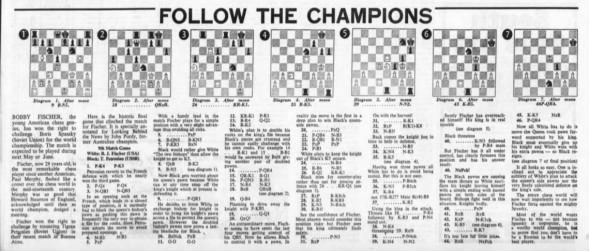 Follow The Champions Tue, Nov 23, 1971 – Page 17 · The Sydney Morning Herald (Sydney, New South Wales, Australia) · Newspapers.com
Follow The Champions Tue, Nov 23, 1971 – Page 17 · The Sydney Morning Herald (Sydney, New South Wales, Australia) · Newspapers.com
Florida Today Cocoa, Florida Wednesday, November 24, 1971 - Page 12C
'It's Your Move, Boris'
With sales of low-priced chess sets already swollen by Bobby Fischer's victory in the semi-finals of world championship play, chess set makes are looking for bigger sales this Christmas season and a possible boom next spring when Fischer meets Russia's Boris Spassky for the world crown.
Muncie Evening Press Muncie, Indiana Thursday, November 25, 1971 - Page 43
Bobby Fischer? He's the Joe Namath in the World of Chess by Bob Loy
Quickly, now, can you tell me who Bobby Fischer is?
Never heard of him?
Bobby Fischer is an international celebrity. In many quarters around the globe he is lionized. But in the United States, his native land, it is probably safe to assume not one person in 10,000 could identify his name.
He has been quoted as saying, “Throughout the world I am a Joe Namath, but at home I am nobody.”
So who is Bobby Fischer?
Recently the sardonic, politically acute newspaper cartoonist Bill Mauldin published a cartoon depicting a chess board on which were two chess pieces, one standing and the other lying on its side.
The standing piece was topped with a youthful-appearing male head and was labeled, “Bobby Fischer's chess victory.”
The reclining piece was topped with a head representing that of Secretary of State William Rogers and was labeled “State Dept.'s U.N. defeat.” This referred to the expulsion of nationalist China from the United Nations.
You will probably infer from this that Bobby Fischer is a chess player. But he is hardly the ordinary garden variety, pipe smoking, good natured, philosophical hobbyist chess player depicted in fiction.
At 28, Fischer may be the greatest chess player in the history of the game. He is certainly the best American player ever developed.
From all reports, he attacks chess with systematic ferocity of a hungry tiger shark going after his victuals.
John Campbell of the Ball State University music faculty and a knowledgeable and experienced chess player (he wouldn't permit me to refer to him as an expert), has given me some insight into Fischer's achievements.
World Title Held By Russian
In international chess competition, the world champion must defend his title once every three years, said Campbell. In the meantime, aspirants to his crown, the international grand masters, are knocking each other off in a series of challenge matches.
Fischer has engaged in a number of these matches during the past couple of years in his single-minded quest for the world title held by a Russian, Boris Spassky.
Usually in these encounters, the player who first wins six games takes the match, according to Campbell.
I his first match, Fischer annihilated his opponent in six straight games. Opponent No. Two fell the same way. Ditto. No Three.
Opponent No. Four put up a feeble defense and managed a tie after he had lost the first two games. Fischer could not be denied, however, and opponent Four ultimately fell.
Before that tie, Fischer had won 20 straight games from some of the world's best chess players.
There is really no analogy for this achievement in the world of sports. It is greater than a baseball player batting 500 for the season or a hockey player scoring 100 goals or a basketball player scoring 150 points in a game.
According to Campbell, such a performance is beyond bounds of credibility.
None Won More Than Three
“This is absolutely unheard of,” he said. “No one had ever won more than three straight games in international competition and here is a man who wins 20. It is beyond comprehension.”
So what is the meaning of Fischer's accomplishment? What is the real significance of the Mauldin cartoon?
Next spring, Fischer will play Spassky for the world championship. If he approaches the Russian with the carnivorean fury he has displayed in the past, the Soviet Union's 35-year domination of the chess world will come to an end.
It will mean an American victory and a Russian defeat in international prestige almost diplomatic in scope.
I would hate to be in Spassky's shoes.
As Campbell said, “If the Americans beat Russia in getting to the moon, that's fine, sure, we beat them. But more important to the Russia is beating him at his own game and his own culture and that is chess.”
The expert chess player is one of the most highly-esteemed persons in the Soviet Union. He is subsidized by the state.
Even Farm Boy Has a Chance
“I am sure that chess players are much more esteemed than the athletes and I imagine the cosmonauts, too. I am not sure of that, but chess in Russia is the national game and a national way of culture,” said Campbell.
Why is the chess player so highly esteemed, he was asked.
“Maybe it is because in our society an Abraham Lincoln can reach the top by his own personal drive, but in Russia I don't know that this is possible except on the chess board,” he said.
“A little farm boy barefoot in the snow in Russia, playing chess on the ground can actually achieve this ability to be one of the world's leading chess players.”
No doubt you have heard the old joke about the chess player who died during a match and his opponent didn't discover it for three days.
Campbell said this story has a basis in fact. It actually is supposed to have happened that a player concentrating for about 12 hours on his next move didn't notice his opponent had expired.
Given the fact that chess, in the popular conception, is almost a synonym for slowness of movement and boredom, what is there about the game that grabs certain people? What is the chess mystique?
It's Game of Sacrifice
Chess is at the same time a science, an art and a game, according to Campbell.
He tells the story of the Indian rajah whose life was saved in some manner by a pheasant and he promised the pheasant anything his heart desired as a reward.
The pheasant said that for his reward he would like the rajah to put one grain of rice on one square of a chess board, put two grains on another square and to proceed putting grains of rice on successive squares, each time doubling the previous total until all 64 squares were covered.
The rajah's mathematicians calculated that the amount of rice involved would cover the earth to a depth of nine feet.
Adds Campbell, “All of those individual grains of rice are in any one chess game that goes an average of 40 moves. The mathematical possibilities tend to eliminate luck.”
“It's a game of war and its merciless. It's even more merciless than that United States in the game of war because you not only go out and kill the enemy ruthlessly like we do in the army, but in a chess game you send your own soldier into suicide with no thought.
“If you can do it, that's great, that's glorious, there goes your queen, throw the queen away 'cause you catch the other's guy's king. You win the king you win the game and you sacrifice your own men to win.”
“Chess teaches patience, self-discipline and concentration. I preach this for the elementary school boy, the boy who does not like school. He hates English, grammar, music, anything, but, he does like football or something that does not teach concentration like chess.
Indian Is A Weed Patch
“You take him and put him on a chess board and you can get his concentration built up so that it spills over into English, I claim.
“They say this has been proven in Milwaukee, for instance, where the school system has masters teaching the boys.”
The use of chess in schools is being used in many places, he added.
“In Europe it is called a heavy subject the way we would consider geometry.”
In the international chess garden, Indiana is in the corner weed patch, according to Campbell.
Chess players are rated by the United States Chess Federation on a complex point system according to the number of games won in organized play.
Lowest-rated players are in the E class. The ratings progress upward alphabetically through A then on to &lquo;expert,” “master,” “senior master,” and “grand master.”
There are also the international grand masters, such as Bobby Fischer, who are good enough to play for the world title.
Indiana has about 25 class A players, Campbell said, four or five experts, no masters, but one senior master.
The latter is Elliot Hearst, an Indiana University faculty member and adopted Hoosier, who is rated the 17th best player in the nation. Hearst has played two simultaneous matches against the Ball State University Chess Club, taking on all comers at the same time.
Campbell is a B-rated player and is a president of the Ball State Chess Club which has about 40 members. Chess is a 'serious' hobby with him and he is working hard to promote the game in this area.
Although Campbell estimates that about three-fourths of the American male population plays chess, the game never has caught on here as it has in other countries.
In a recent Life magazine article, the writer told how Bobby Fischer would be mobbed by fans when he ventured out of his hotel in Buenos Aires, Argentina where he was playing a match.
Such adulation in the United States is reserved only for sports heroes and it is doubtful that Bobby Fischer will receive the same treatment here when he wins the world championship.
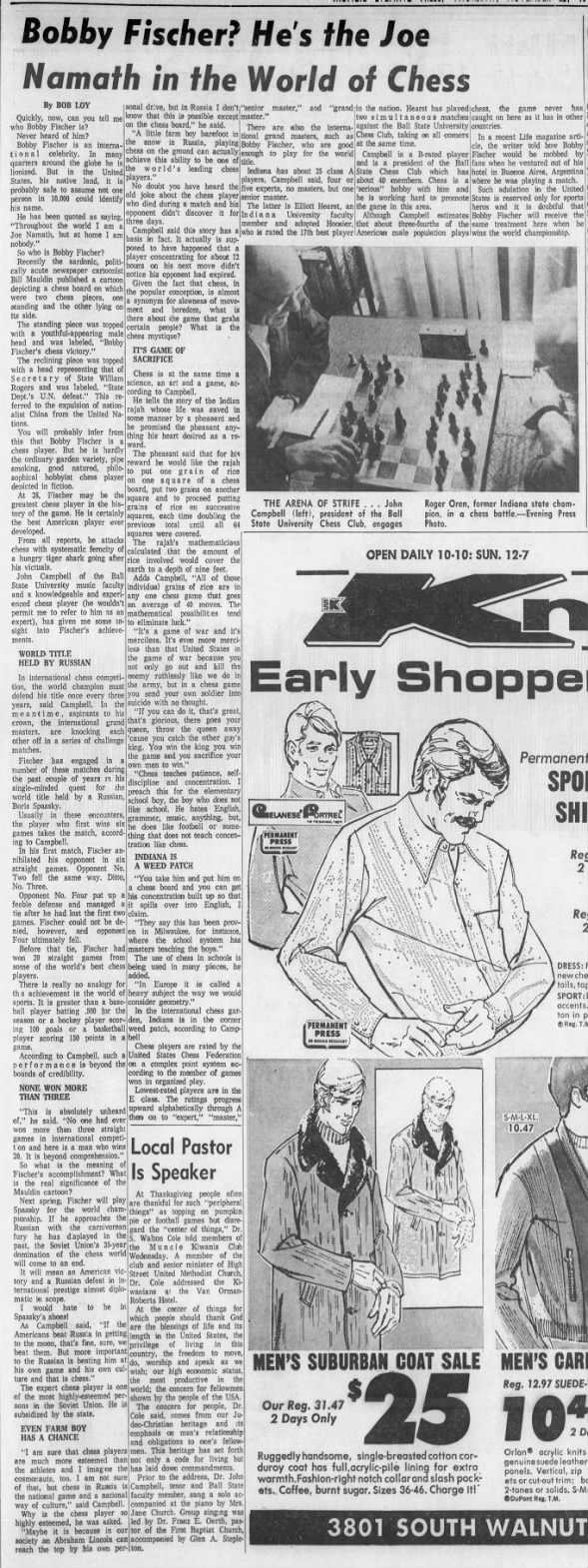 Bobby Fischer? He's the Joe Namath in the World of Chess Thu, Nov 25, 1971 – Page 43 · Muncie Evening Press (Muncie, Indiana) · Newspapers.com
Bobby Fischer? He's the Joe Namath in the World of Chess Thu, Nov 25, 1971 – Page 43 · Muncie Evening Press (Muncie, Indiana) · Newspapers.com
The Gazette Montreal, Quebec, Canada Saturday, November 27, 1971 - Page 55
Game of Kings: Montreal, Chess Capital?
Four countries have already put in a bid for the Fischer-Spassky world championship match, one of which has offered $30,000.00 prize money (winner, $18,000, loser, $12,000.) The International Chess Federation (FIDE) has not disclosed names as other bids are expected. The expenditure is very small compared to other professional sports for world wide publicity that could last six weeks or more (the winner must score 12½ pts. in the best of 24 games series, with three games per week). Money will not be the sole criterion of suitability., and a wrangle can be expected on that point. If agreement as to site cannot be reached amicably between the principals the names will have to go into a hat for a decision, as was the case for the Buenos Aires match. Fortunately they offered the biggest prize and the Argentine government picked up the tab. But why not Montreal? Both players are well-known and well-liked here and as neutral an atmosphere could be expected as anywhere else in the world. The project would still require the support of government and business. Montreal staged the last section of games in the world championship match of 1894, when Emmanuel Lasker, 24, dethroned William Steinitz, 57, ending a reign of 28 years. FIDE has ruled the match must not start before April 28 or later than July 1.
The Courier-Journal Louisville, Kentucky Sunday, November 28, 1971 - Page 349
A Footnote For the Chess Set
The Place:Buenos Aires. The event: the finals of the Candidates' Matches leading to the world championship. At the chessboard, Russian Tigran Petrosian, world champion from 1962 to 1969, faced “the boy from Brooklyn,” Bobby Fischer.
Fischer, playing the White pieces, had just made his invariable opening, pawn to king 4, and was lounging in his chair. Petrosian was bent over the board, deep in concentration. His clock was running, and time in such a game is of utmost importance. Yet Petrosian seemed unable to move.
Why did Petrosian, one of the greatest players of all time, hesitate on the very first move in responding to Fischer's standard opening move?
The writer of the preceding story calls it “Fischer fear.” I prefer the term “Fischer phobia.” By whatever name, it seems a deadly malady to all who face Fischer.
What is Fischer-phobia? It is a psychological hangup that reduces even the greatest chess masters to pawns when they confront Fischer. Consider the case of another Russian grandmaster, Mark Taimanov, who played Fischer in the quarter-finals of the challenge series in Vancouver.
After four straight losses to Fischer, Taimanov pleaded illness and was granted a postponement. What happened when Taimanov returned for the fifth game is shown in the accompanying diagram: Taimanov on his 46th move played RxP and Fischer responded with a Q-Q5ch, forcing the Russian's immediate resignation. Taimanov must have seen only 47. R-B2 R-R7, while overlooking 47. … R-R8ch. It was an error of which only a novice should be guilty.
But Taimanov may be forgiven. Four times he had met Fischer, and four times was defeated by the confident American. Fischer went on to sweep the match 6-0.
The next victim of Fischer-phobia was Danish grandmaster Bent Larsen. It was the Taimanov story all over. After losing four games Larsen fell ill and a doctor ordered four days' rest. Larsen returned to lose two more games and the match. Fischer had won an unprecedented 19 consecutive games against the world's top players.
Then came the climactic match with Petrosian. Fischer won the first game, Petrosian the second. The next three were drawn. Then Fischer-phobia set in and the American beat the Russian in a 66-move 8-hour battle. A doctor ordered Petrosian to rest for 48 hours. He did, only to return and lose three more games and the match to Fischer.
Can Fischer win the world title? More than a decade ago I predicted he would. And I think he will do so next spring when he meets Russian Boris Spassky, the current champion. Not all chess prophets agree. Said English Master and analyst C.H.O'D. Alexander in the newspaper, The Guardian: “I would expect Spassky to win.” But Alexander added: “There is one word that may overthrow the most careful balancing of chances—genius. And, if this is so, a match against Spassky could bring out his [Fischer's] powers, and then your columnist will prove to be completely and hopelessly wrong.”
Perhaps Alexander has defined better than most of us Bobby Fischer's secret weapon: It is the mind of the man.
Mark Taimanov vs Robert James Fischer Fischer - Taimanov Candidates Quarterfinal (1971), Vancouver CAN, rd 5, May-27 Gruenfeld Defense: General (D80) 0-1 https://www.chessgames.com/perl/chessgame?gid=1044721 45. … Kh6
The Lowell Sun Lowell, Massachusetts Sunday, November 28, 1971 - Page 3
Majorca May Get Big Chess Match
Palma, Majorca (Reuter)—The long-awaited showdown between chess wizards Robert Fischer of the United States and Boris Spassky of the Soviet Union may be held here next April or May informed sources said Saturday.
The sources said the Balearic Islands Chess Federation had submitted to the game's international ruling body a bid to host the championship final between the world's top two players.
The Orlando Sentinel Orlando, Florida Monday, November 29, 1971 - Page 10
Loudest Sound Of A Sunday At Orlando Chess Club is Clock's Noisy Ticking
… Part of the reason for a renewed fascination with the game is attributed to Bobby Fischer, the 28-year-old high school dropout from Brooklyn who is now regarded as perhaps the greatest player in the world.
Fischer's photographs on a Nov. 12 Life magazine cover, is posted on the club's bulletin board. It shows the chess champion scowling over a board.
The scowl is appropriate because Fischer is a dedicated player. He studies constantly and is one of the few great players to come from the United States, thus helping to popularize the game of chess.
Chess players win points by beating opponents and Fischer is the highest rated player in the world. He has a United States Chess Federation rating of 2,700 points qualifying him as a grand master. …
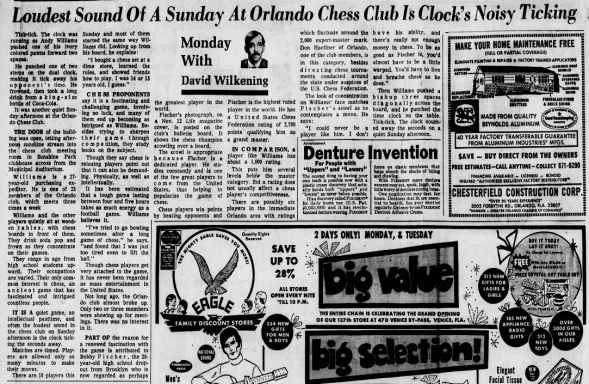 Loudest Sound Of A Sunday At Orlando Chess Club is Clock's Noisy Ticking Mon, Nov 29, 1971 – Page 10 · The Orlando Sentinel (Orlando, Florida) · Newspapers.com
Loudest Sound Of A Sunday At Orlando Chess Club is Clock's Noisy Ticking Mon, Nov 29, 1971 – Page 10 · The Orlando Sentinel (Orlando, Florida) · Newspapers.com
Detroit Free Press Detroit, Michigan Tuesday, November 30, 1971 - Page 1
Q: I read in “Chess for Beginners” by I.A. Horowitz that a checkmate can't be forced by two knights. I think I've proved differently. Who's right—G.R., Battle Creek.
A: Three time U.S. Open Chess champion Horowitz. Action Line asked Edmund Edmondson, Executive Director of the U.S. Chess Federation and chess wizard Bobby Fischer's right hand man on the tournament trail, to look over moves you described. Edmondson, who's won his share of tournaments, said you couldn't get away with it unless your opponent was sleeping—and that's not exactly a forced mate. He added that least you could get away with would be two knights and a pawn to block opposing king's escape route, but that's a “very difficult” checkmate. Players in Fischer's class don't play through to a checkmate, Edmondson said. Champs can see 10 or 12 moves ahead, concede game's outcome when an amateur would be just getting started.
Philadelphia Daily News Philadelphia, Pennsylvania Wednesday, December 01, 1971 - Page 2
Chess Pains
Moscow — (UPI) — Tigran Petrosian upset world champion Boris Spassky in the sixth round of the Alekhine International Chess Tournament Tuesday night, the news agency Tass said. Both men are Russians.
Petrosian, playing white, won on the 40th move when Spassky admitted defeat. Spassky played a conventional queen's gambit, Tass said.
Petrosian lost to Bobby Fischer of the United States in the world chess semifinal in Buenos Aires last month. Fischer and Spassky meet for the world title next year. Go Bobby!
The Sacramento Bee Sacramento, California Wednesday, December 01, 1971 - Page 17
Likes Chess Column — Editor of The Bee—Sir: I am very pleased to see you are incorporating a chess column as a regular feature of your Sunday edition. I have felt for years that chess should have more coverage in your paper and am very happy to see the appearance of the column (which, by the way, is being well done.) I also appreciated the good coverage which was given the recent Fischer-Petrosian match in Argentina. Nevell Arroues, Placerville.
Chess Fan — Editor of The Bee—Sir: The first thing I look for when I pick up a newspaper is the chess column. In this respect, The Bee has been a disappointment to me for many years; but now it is a complete newspaper.
Furthermore, it can be said that the Fauber-Garosi chess column is truly a feature of The Sacramento Bee and not merely another space filler. Michael Kosloff, Citrus Heights.
New York Times, New York, New York, Monday, December 06, 1971 - Page 36
Chess: World Rating System Puts Fischer Ahead of Spassky by Al Horowitz
According to the Arpad Elo worldwide rating system, appearing in the most recent issue of Chess Express, the international chess magazine, the top 20 players in the world and their ratings are as follows:
1. Fischer .......... 2,760 2. Spassky .......... 2,690 3. Korchnoi ......... 2,670 4. Larsen ........... 2,660 5. Petrosian ........ 2,640 6. Pol'gayevsky ..... 2,640 7. Botvinnik ........ 2,630 8. Portisch ......... 2,630 9. Smyslov .......... 2,620 10. Tal ............. 2,620 11. Geller .......... 2,615 12. Keres ........... 2,615 13. Hort ............ 2,605 14. Stein ........... 2,605 15. Gligoric ........ 2,600 16. Taimanov ........ 2,600 17. Bronstein ....... 2,590 18. Hubner .......... 2,590 19. Gipslis ......... 2,580 20. Krogius ......... 2,575
Curiously, the system, based on activity and results, confirms to a large degree its academic mathematical accuracy. That the world champion, Boris Spassky of the Soviet Union, should be second in the standings sheds some relative light on the subject.
In reviewing games of the past played by Bobby Fischer of the United States, the game against Robert Byrne in the United States championship of 1963-64 had a happy ending. During its course, Fischer “sacked” a piece.
Among the kibitzers, of whom there were masters and grandmasters, many hoped that Bobby had over-extended himself. Probably, “the wish was father to the thought,” but any number of alternative suggestions all full of blunders were offered as discretionary options.
At the end of the game, a buzzing rent the atmosphere. “Byrne is coming into his own,” was the gist of it all.
Everyone waited expectantly, anticipating a smash finish. After waiting and waiting, game the final reply: “I resign,” said Byrne.
When only 14 years old, Fischer had already advanced to chess maturity. He learned to accumulate small pluses whose sum total added to an overwhelming position.
Robert Eugene Byrne vs Robert James Fischer US Championship (1963/64), New York, NY USA, rd 3, Dec-18 King's Indian Defense: Fianchetto Variation. Immediate Fianchetto (E60) 0-1 https://www.chessgames.com/perl/chessgame?gid=1008419
Daily News New York, New York Sunday, December 12, 1971 - Page 387
Chess Buffs To Check in For Contests
The chess boom encouraged by the exploits of superstar Bobby Fischer is expected to draw hundreds of youths wanting to push pawns, bishops and queens across boards to the McAlpin Hotel during the seventh annual Greater New York Scholastic Chess championships.
Students in all public and private schools are eligible to compete during the Dec. 26-30 event.
The Continental Chess Association of Vernon, which sponsors the event, plans competition in five separate categories, from high school through lower elementary.
The high school championship, Dec. 26-28, is open to all high school and pre-high school players and is the only of the five events that will include experienced players.
NOVICE CHAMPS
The high school novice championship during the same time period excludes only players with a U.S. Chess Federation rating of 1,400 or more.
Junior high school players get their chance Dec. 29-30, elementary students Dec. 29-30 and lower elementary school players on Dec. 30.
An association spokesman said the Fischer fad is expected to put attendance well above last year's 608-participant record.
The Vancouver Sun Vancouver, British Columbia, Canada Tuesday, December 14, 1971 - Page 30
Spassky Accepts Draw in 13th Chess Round
Moscow (UPI) — World champion Boris Spassky played to a draw with Soviet grandmaster Leonid Stein in the 13th round of the Alekhine chess tournament, and Stein held his tourney lead, the news agency Tass said Monday.
Spassky, who has suffered two defeats in the tournament, agreed to a draw on the 30th move of Sunday's game with the tourney leader because he was running out of time, Tass said.
The Alekhine Memorial is in effect part of Spassky's early warm-up for the world's championship defence he must make next year against Bobby Fischer of the U.S.
“Spassky's 16th move created a position which occurred in the well-known game between Spassky and Fischer at the World Chess Olympiad in Siegen, West Germany, in 1970,” Tass said.
“But instead of taking a central pawn, Stein played bishop seven at the 16th move. Spassky launched at once an all-out attack on the king's flank and there was a moment when his victory seemed in sight.
“But pressed for time, Spassky agreed to a draw,” it said.
Stein's leading point total stands at nine out of a possible 13.
Soviet grandmaster Vasily Smyslov has 8½ and former world champion Tigran Petrosian, also a Russian, has eight.
New York Times, New York, New York, Monday, December 13, 1971 - Page 35
Chess: Spassky Is Seeing Action In Alekhine Memorial Play by Al Horowitz
The Alekhine Memorial Tournament, now in progress in Moscow, brought together the chess champion of the world, Boris Spassky of the Soviet Union, and his compatriot, Mikhail Tal, a former world titleholder. The antagonists employed a Sicilian Defense, the time of which is a favourite with Bobby Fischer, the American chess genius who is slated for a title match with Spassky some time before June, 1972.
Up to move 6 … B-K2, this branch is known as the Scheveningen Variation, after a Dutch city that held a tournament in 1923.
Typically, Tal, playing Black, introduced 14. … P-Q5, the sacrifice of a pawn to pen the long diagonal. Immediately thereafter, Black seized the initiative and was able to give vent to his imagination.
With 17. … R-B1, Black prepared 18. … R-B2; 19. … R-Q2 with pressure on the queen file.
Then it was White's turn. And he dreamed up 23. R-R2. How this move was to further an incursion was a problem. But there was a way. It followed after 25. … BxR; 26. PxB, and the later occupation of the king knight file.
In a few more moves, both players put one over on each other. Then they were content with a draw by perpetual check.
One of Fischer's greatest victories was over Rene Leterlier of Chile at the Leipzig Olympiad of 1960.
Fischer, as Black, employed a hypermodern system, provoking his opponent into taking control of the center.
Letelier was stubborn so with 5. P-K5, Letelier rushed in to gain a tempo. And before long, he managed to wrangle a pawn.
Soon enough, his entire position was crumbling. Not only did White lose his median control, but his king also was a potential target.
With move 15, White's king was still seeking security, and with 19. … RxP, material was in balance.
Who would believe that in a few deft moves, the game would be over? With 23. QxPch came the denouncement. For on 24. KxQ B-R3 mate. After 24. K-B2, Black would also give up the ghost.
The Miami Herald Miami, Florida Thursday, December 16, 1971 - Page 63
Bobby Fischer Girds for Russian Chess Showdown
By LESLIE BRAUN L.A. Times-Washington Post Service, Newsday
NEW YORK — Chess is an intellectual feast played on 64 squares. One participant commands the white pieces consisting of eight foot soldiers (Pawns), two horses, two bishops, two castles, the queen, and king. The other participant maneuvers the black counter-parts. Since each player is like a general leading his army into battle according to a specific strategy which may be altered by circumstance, chess has been likened to a bloodless war.
The conduct of such wars is as varied as the personalities who engage in these struggles. For example, the aggressive player will sacrifice material for an all-out attack without regard for defense. A defensive player is noted for building a solid defensive wall in the hope that his opponent will dash himself to pieces while attempting to surmount this citadel. Still another player will play defensively or offensively depending on the situation at hand and undoubtedly, this kind of player must be termed the most skillful of the three.
It has been found that, generally speaking, an individual proficient in geometry may have more success in chess than the algebra expert, who is probably better suited for bridge. Of course, other factors may undermine this generalization — such as inherent logic, problem solving ability, temperament, and versatility in thinking, and so forth.
Now it will come as no surprise to anyone who has followed the news lately that America has been blessed with a great young player by the name of Bobby Fischer, often called the Van Cliburn of American chess. Fischer, 28, and a Brooklyn high school dropout with an I.Q. (falsely rumored according to Bobby Fischer) of approximately 180, has been acclaimed in some circles as the greatest chess player of all time. As a result of his crushing defeats of Tamainov, Larsen and Petrosian in the recent matches, he may well merit the accolade, and he will have the opportunity to prove it when he meets the current world chess champion, Boris Spassky of the Soviet Union, for the World's Chess Championship.
In America, Bobby Fischer has become a household word and a sort of national hero. Because of Bobby, people by the hundreds, who otherwise would not bother, are entering bookstores and purchasing chess books for novices, in an attempt to establish in their minds the rudiments of this intriguing game. Chess clubs are expanding their memberships and more and more chess tournaments are taking place.
What is the nature of this young man who has precipitated the elevation of this all-too-ignored activity in American life?
One thing is certain: Bobby Fischer did not attain his lofty position on the international chess scene through osmosis or accident. In reality, for about the last 15 years, Bobby has invested on the average 10 hours a day thinking, studying and playing chess. This dedication — together with his genius touch (practically every game he plays is a work of art) —has catapulted him to the top. Bobby's sole raison d'etre is to become chess champion of the world. To fail in this endeavor would be catastrophic.
In the spring of 1972, Bobby will engage Boris Spassky for the title in a twenty-four game contest, but a breeze for Bobby it is not. In fact, some authoritative personages in the chess world feel that Bobby is actually the underdog; why? Here are some possible reasons:
Chess is extremely popular in Russia and as a matter of fact, the best chess players in the country are subsidized by the Soviet government. Moreover, there has always been a Russian World Chess Champion ever since the present system of producing the champion was inaugurated in 1948, and you can be sure that no effort will be spared by the Russians to make certain this skein is not broken.
If Bobby has any weakness, it is a tendency to underestimate his opponent and to become discouraged if the initiative is lost. The latter trait is common among the most aggressive players, of which Bobby certainly is one.
Bobby Fischer has never beaten Boris Spassky in five tournament matches, the best Bobby could attain was two draws while the remaining three games ended in defeats.
In spite of these truths, it is my personal feeling that Bobby will capture the world chess crown for the United States by upending the Soviet juggernaut. My prediction: Bobby by 12½-8½ note: (one point is awarded for victory; half point is awarded for a draw; no points for a loss). This prediction is based on the counter arguments to the aforementioned, three points.
Bobby realizes that his life's goal is just around the corner and therefore, at this very moment, is devoting his full time to studying ideas in the opening and refining his technique for the middle and end game. This grind will continue until the first match game in March, 1972.It is unlikely that Bobby will underestimate the chess prowess of Spassky, especially in view of unpleasant past experiences. Furthermore, Bobby demonstrated some remarkable tenacity in several games against Tigran Petrosian, his most recent victim, long after his opening initiative was dissipated.
Bobby at age 28 is at his peak. This time Spassky will perceive that he is vying against a much more seasoned and mature player than previously. What's more, Bobby has another factor in his favor. It is called “genius.”
Pacific Daily News Agana Heights, Guam Tuesday, December 21, 1971 - Page 22
Spassky Does Poorly
Moscow (AP)—Russians captured the first seven place sin the 153-game international Alekhine Chess Tournament which ended here Sunday.
Soviets players Anatoly Karpov and Leonid Stein took first and second with 11 points each out of a possible 17. World champion Boris Spassky—who faces American Bobby Fischer next year for the crown—was sixth with 9.5 points.
Moscow's central chess club was packed this weekend for the tournaments final game between Olafsson and Spassky.
The match was adjourned on the 41st move Saturday night with Olafsson in a hopeless position, Tass News Agency said.
Sunday, Spassky's material advantage was too great and Olafsson resigned on the 49th move.
Despite Olafsson's loss to Spassky, Tass said the Icelander is a player of rate inventiveness, particularly dangerous in combination situations.
Robert Byrne of the United States reached eighth place with nine points.
Commenting on the tournament, International grandmaster Andrei Lilienthal of the Soviet Union said that all chess events are now studies through the prism of the forthcoming match for the World Chess Crown between Spassky and Fischer.
He noted that some people said during the Alekhine Tournament that if Fischer had been playing, the other participants would have found first place closed to them.
The Springfield News-Leader Springfield, Missouri Thursday, December 23, 1971 - Page 24
Bobby Fischer Gets Credit: Queens and Kings Move Across New Chessboards by Ann Hencken
New York (AP) — Chess, once considered the exclusive pastime of intellectuals unpressed for time, is booming across the United States.
Department stores are selling more expensive chess sets and manufacturers report an increase in business. New chess clubs are popping up across the country. Chess tournaments are drawing bigger crowds than ever.
Some devotees of the game say its increased popularity is part of a trend that started three years ago and sparked recently by Bobby Fischer's bid for the world chess championship this coming spring.
Fischer, the 28-year-old American chess genius, defeated the Soviet Union's Tigran Petrosian in Buenos Aires last October. His upcoming match is with Russia's Boris Spassky, and the contests have breathed new life into a game which hardly has been considered an all-American pasttime.
★ ★ ★
This fall, the U.S. Open at Ventura, Calif., drew some 400 contestants, 100 more than the previous year. The U.S. Chess Federation reports an 18 per cent increase in membership in the last three months alone. It boasts 450 affiliated clubs in 1971, up from 225 in 1969.
Cardinal Industries, Inc., a manufacturer-wholesaler, has seen a 10 per cent increase in business this year, bringing number of chess sets moved to about one million. At Atlantic Playing Card and Match Co. turnover in chess sets has risen some 40 per cent over the last three years.
Rossolimo Chess Studio in New York has noted a 10 per cent increase in chess set sales this year. At Rich's Department Store in Atlanta, expensive sets, $30.00 and up, are outselling less expensive models. At Neiman Marcus in Dallas, the best seller is a $35 alabaster-style chess set.
Membership at the Manhattan Chess Club, established in 1877, has almost doubled to 300 in the last seven months. The club has moved to larger, more elaborate quarters but already needs more room.
“If membership keeps increasing, it'll look like a subway train at rush hour,” Says Leonard Marcus, assistant secretary.
★ ★ ★
Some new members say they've joined the club because of Fischer.
“Reading about Bobby's game made me come back to chess after 14 years,” says Amos Kaminsky.
“When you get involved in a game; you forget everything,” says Paul Spindel, a new member of the club and a management consultant. He stops off for a game on his way home from work about twice a week.
“It's the greatest solace in time of troubles that there is,” says the retired stockbroker Schuyler Jackson,a member of the club since 1919. When he's not at the club, he's working out games in one of his 150 chess books.
“Truly great chess players come along once about every 30 years. Fischer's it,” says Jackson. “This is the most interest the country has ever shown.”
Before his match with Spassky is over, Bobby Fischer may be a household word and chess a household game, wrenched from its pasty-faced intellectual image.
“I hear they even want to put out Bobby Fischer sweat shirts,” says one fan.
New York Times, New York, New York, Thursday, December 23, 1971 - Page 22
Chess: A Victory by Fischer at 13 Is Called Game of Century by Al Horowitz
Bobby Fischer's victories are legion. Yet his triumph in a Gruenfeld Defense, as Black, against Donald Byrne in the Rosenwald tournament of New York in 1956, was awarded the first brilliancy prize and acclaimed the game of the century. The accolade was that of Hans Kmoch, eminent authority, analyst and historian.
This game, a masterpiece of chess combination, was played when Bobby was only 13 years old. And it heralded a new United States champion in a year to come and for eight years afterward.
Right from the start, with move 5 … P-Q4, accent was on combination. Black effected a blending that required accuracy and courage. White declined. For after 6. PxP NxP; 7. NxN QxN; 8. BxP N-R3; 9. B-N3 B-B4; 10. P-QR3 QR-B1, with a strong pressure for his pawn.
Black's Move Deceptive
On move 11. … N-R5, Black's move looks like the crassest blunder ever made. It has, however, academic and psychological overtones. And 13. … NxP is another surprise follow-up, continuing to tap Black's resources. Again, after 15. … NxQBP — another beautiful move — the point is, if 16. QxN KR-K1, Black recovers the piece with a pawn to the good.
Yet, the best is to come.
With 17. … B-K3, Black mounts an irresistible onslaught. It is stunning, charming, and reduces the position to a material success.
With two bishops and a rook, White has triumphantly concluded his combination. There were various ways of finishing off. But the mating combination that followed was tempting.
Possibly, Fischer might have mated sooner. But the loss of a tempo or so was pardonable.
Pacific Daily News Agana Heights, Guam Saturday, December 25, 1971 - Page 53
Spassky Ready for Fischer
Sarajevo, Yugoslavia (AP)—Boris Spassky, Chess grandmaster of the Soviet Union and defender of the world championships title, was quoted as saying Thursday that he was ready to play for the title with Robert Fischer of the United States of Yugoslavia.
Radio Sarajevo Thursday carried an interview by the well known Yugoslav chess commentator Dimitrije Bjelica with Spassky and Edmond Edmondson, president of the United States Chess Federation.
Bjelica said that Sarajevo offered 60,000 dollars for the prize fund to hold the match here.
Edmondson said in the interview that he cannot speak for Fischer about the place where the match should be held because the American champion is in Latin America.
Daily News New York, New York Sunday, December 26, 1971 - Page 116
Chess Master Backs Fischer
Moscow, Dec. 25 (UPI) — American chess grandmaster Robert Byrne said today that he thinks Bobby Fischer of Brooklyn will defeat Boris Spassky in the world chess title match next year.
Byrne told the newspaper Sovetsky Sport that Spassky, a Russian who is now world champion, “played much below par” in the recent Alekhine Memorial Chess Tournament in Moscow. Spassky was not among the top finishers.
“I am sure Spassky will play more forcefully by the time the world chess title match begins,” Byrne said.
The Baltimore Sun Baltimore, Maryland Sunday, December 26, 1971 - Page 14
Russian Chess Fans Are Quiet, Intellectual--and Hungry for Blood
Moscow Bureau of The Times — Moscow — At the Railroad Workers Club the other day, the crowd moaned and hollered out sarcastic bravoes when Boris Spassky, the world champion, ended still another game in a draw.
It was all rather quiet and cerebral, of course, as befits the royal game. But they had the same violence in their hearts as a boxing audience cheated out of most of the main event by a TKO. “Short draws, more short draws he gives u,” muttered the disgruntled spectators at the Alekhine International Memorial Chess Tournament.
The Russian chess fan, that most dedicated and quietly fanatical of sports spectators, is getting very hungry for blood—something he sees less and less of these days as the world's best chess players play it conservative.
A short draw is a brief series of plays ending with white and black in obvious and hopeless deadlock. Every grandmaster has a few of them now and then if he plays a wise game—a dull quick draw, after all, makes more tournament points than a brilliantly executed loss.
9 Out of 10 Play Chess
But the crowd hates it.
And the crowd is important in a country where chess is a genuine spectator sport, with hundreds packing in to watch matches and exhibition games by the grandmasters. (In fact the players here, tense enough from the rigors of the world's most intellectually demanding game, are often spooked by the crowd scene; there are suggestions that they be glassed away from the noise in see-through booths.)
Soviet officials estimate that 9 out of 10 citizens play the game, making nearly everyone a potential fan for tournaments. From 80,000 to 100,000 are estimated to play in tournaments.
Chess reporters here are essential members of newspapers' sports staff. Magazines and newspapers are riddled with chess problems, chess games, and critical analyses of chess by the masters. There are city chess clubs throughout the country, and a national society headquartered at the Central Chess Club of the USSR in Moscow.
In the Old Palace
The pre-revolutionary palace which houses the club features bas reliefs of cupids, high-ceiling rooms constantly full of dozens of games in progress, display cases full of the trophies taken by Russian and Soviet players, and card No. 1 of the Moscow Chess Society for the 1922 to 1923 season, made out to Vladimir Illyich Lenin.
The game, whether because of the leader's example or because of its comfortably non ideological content, soon came under the generous protection of the Soviet government following the revolution.
Since the war the support—including substantial personal subsidies for the top players—has paid off in enormous prestige for the Soviet Union. Since 1948 the world championship has been a private Soviet matter, passed from hand to Soviet hand.
American Applauded
Even though foreigners did not come within yipping distance—until Robert Fischer won a crack at the championship by beating runner-up Tigran Petrosian this year—it was for a while a delightfully stormy period for the Soviet spectator, Young and feeling their hormones, the post-war masters preferred aggression to safety, and the fans loved them.
“After the war,” says Robert Byrne, the only American to play here in the Alekhine Memorial, “they got off to a tremendous bang. They were all wild players, the kind the audience like very much. The new generation is incomparably conservative.”
Even the 20-year-old who tied for first place in the Alekhine played a conservative game. “Where,” says Mr. Byrne, “is the ‘sturm und drang’ period they should have come through?”
Although he is not a particularly wild player, Mr. Byrne himself went over like a bang with the Soviet spectators here. By comparison to that of the Russians, his style was aggressive — and satisfying.
Chess On Rise in U.S.
“He gives the audience what they want,” said a Soviet journalist as he watched Mr. Byrne get the biggest hand of the evening at the closing ceremony. “Exciting play, few short draws.” Mr. Byrne, 43, tied for eighth place. Mr. Spassky, the world champion, got a tie for sixth and polite applause.
In this tournament, no one had expected too much of the champion, preoccupied with his upcoming match with the American challenger; and he did not disappoint them.
Some Soviet experts suspect their chess players may be losing something more than audience appeal. They note with admiration the swift rise of the chess culture in the United State, which now has a respectable 30,000 tournament players, increasing at the astonishing rate of 20 to 25 per cent a year.
One Russian, no doubt exaggerating for politeness and dramatic effect, confides glumly: “You Americans are just beginning your rise. Here, we're in decline.”
Decline or not, Soviet chess talent still remains by almost everyone's estimation the best in the world. And they can be expected to keep at least close to the title for years to come.
Still the true fans here seem relatively unchauvenistic about the Spassky-Fischer match, scheduled for some time in the spring. There are even likely to be a few Fischer rooters on this side, admiring his unpredictability, his aggression, and a certain blood-lust.
Austin American-Statesman Austin, Texas Monday, December 27, 1971 - Page 36
Money Is Issue In Chess Match
Yugoslavia (AP) — Bobby Fischer will play Soviet world chess champion Boris Spassky in Europe only if financial offers from this continent exceed those from America.
The U.S. Chess champion made the statement in a three-way radio interview with Spassky and Svetozar Gligoric, Yugoslavia's grand master. The interview was broadcast by Radio Belgrade Sunday.
Fischer is scheduled to challenge Spassky next year in an encounter that could end the domination of world chess by the Russians which has lasted more than 30 years.
While Spassky said he would prefer to play at a location with a climate similar to Leningrad, his home town, Fischer said: “For me the first and the most important thing is money. Climate comes second. I repeat, money is the most important.”
Another issue to be decided is time. Dr. Euwe wants the match to start by May 10. Fischer contends he will not be ready before June 30, and Spassky likewise wants the match to begin around the end of June.
Both Fischer and Spassky said they might go to Amsterdam to discuss this issue with the World Chess Federation.
Asked to comment on his challenger, Spassky said: “The playing of Fischer impresses me.”
The Record Hackensack, New Jersey Monday, December 27, 1971 - Page 41
Kind Words for Fischer From the Chess Champ
Belgrade (UPI) — World Chess champion Boris Spassky of Russia says he is impressed with American chess wizard Bobby Fischer of Brooklyn who will meet the Russian for the world title next year.
In a Yugoslav radio interview during a Moscow-Belgrade-Buenos Aires telephone linkup yesterday, Spassky said, “Fischer's play has impressed me very much.”
Of Spassky's play in recent months, Fischer said:
“I think he had a mediocre result at the tournaments in Geteborg and Moscow … what can I say?”
Fischer, speaking from Buenos Aires, said before the site of the world tournament could be decided money matters had to be worked out.
“For me the first and most important thing is money,” Fischer said. “And only after that comes the climate. I repeat—the money is the most important thing.”
The American grand master said he is willing to play the match with Spassky in Yugoslavia, provided the biggest financial effect is reached.
Spassky said he considered Scandinavian countries ideal for the match because of a similar climate to that in his native Leningrad.
On the duration of the match, Fischer said:
“I do not think that the match will last all 24 rounds. But who knows? I intend to prepare the best I can. My responsibility is great. The public expects much from me.”
Both grand masters agreed the match should start in late June. But, Fischer said, June 31 should be the earliest date. He added:
“Spassky had three years to prepare for this match, and up to now I had only two months. It's possible, therefore, that he has a certain advantage.”
Asbury Park Press Asbury Park, New Jersey Monday, December 27, 1971 - Page 3
Fischer Imposes Match Condition
Belgrade, Yugoslavia (AP) — Bobby Fischer will play Soviet world chess champion Boris Spassky in Europe only if financial offers from this continent exceed those from America.
The U.S. chess champion made the statement in a three-way radio interview with Spassky and Svetozar Gligoric, Yugoslavian grandmaster. The interview was broadcast by Radio Belgrade yesterday.
Fischer is scheduled to challenge Spassky next year in an encounter that could end the domination of world chess by the Russians which has lasted more than 30 years.
While Spassky said he would prefer to play at a location with a climate similar to Leningrad, his home town, Fischer said: “For me the first and the most important thing is money. Climate comes second. I repeat, money is the most important.”
According to Dr. Max Euwe, president of the International Chess Federation and a former world chess champion, Yugoslavia and the Netherlands now stand the best chance to stage what is billed as “the chess match of the century.”
Four cities in Yugoslavia offered to play host to the match to start next summer — Belgrade, Zagreb, Sarajevo and Bled. The top offers from Yugoslavia are about $60,000.
Another issue to be decided is time. Dr. Euwe wants the match to start by May 10. Fischer contends he will not be ready before June 30, and Spassky likewise wants the match to begin around the end of June.
Both Fischer and Spassky said they might go to Amsterdam to discuss this issue with the World Chess Federation.
Asked to comment on his challenger, Spassky said: “The playing of Fischer impresses me.”
But Fischer was less enthusiastic about Spassky: “I believe he has had a moderate success in Goteborg. In Moscow he shared sixth place … What can I say?”
The Baltimore Sun Baltimore, Maryland Monday, December 27, 1971 - Page 5
Bobby vs. Boris For King of Chess by Dean Mills, Moscow Bureau of The Sun
Moscow — “Who can guess,” said the amiable coat check woman [Pause. Smile.] “But Fischer is a strong contender.”
“Fischer is an exceptionally dangerous rival,” says Tigran Petrosian, one of the Soviet Union's 30 odd grand-masters.
In the colonnaded pre-revolutionary palace which serves as the USSR's central chess club, the unthinkable has suddenly become cruelly possible; the world chess title, for nearly a quarter century a Soviet fixture, may slip away.
Since 1948 the internationality of the title had been purely theoretical: even the challengers were all Soviet citizens.
Robert Fischer, the child prodigy who became American champion at the age of 14 finally changed that this year by defeating Tigran Petrosian, the Soviet Armenian who was runner-up and former champion.
Razzle-Dazzle Expected
The Fischer meeting with champion Boris Spassky, scheduled sometime late next spring, is a tantalizing prospect for many Soviet fans, who expect Mr. Fischer to inject some badly needed razzle-dazzle into the game.
For the Soviet chess establishment, the novelty of the situation is unsettling, but not entirely without positive benefits.
“The phenomenon of such a match,” says Viktor Baturinsky, the club director, “obviously creates a greater interest in chess as a whole just as, we hear Mr. Fischer's success has stimulated interest in chess in the United States. Of course everyone knows whose side we'll be on.”
Soviet Chances Seen
At their most optimistic, Soviet chess experts estimate Mr. Spassky's chances of holding on to the title for the Soviet Union at no better than even. Mr. Averbach thinks that Mr. Spassky out-psyched, rather than outplayed, Mr. Fischer when he beat him during team competition in West Germany in 1968.
Mr. Fischer, who tends toward a bombastic game alien to the dry, modern-day Russian school, tried so hard to win that he lost where he could have drawn, Mr. Averback says. Mr. Spassky, as even-tempered and cool as Mr. Fischer is unpredictable and temperamental, calmly took his draws where he could get them — and won the match.
“It was,” says Mr. Averbach, “a fight of personalities, not chess.” If Mr. Fischer keeps an even psychological keel the next time, Mr. Spassky faces some dangerous liabilities.
The Fischer tempo, for one thing, can rattle Soviet players used to more deliberate play. Mr. Petrosian, writing on his defeat in a Soviet sports monthly, singles that out as the main problem. Mr. Spassky would have his best chance in long, cautious games, he argues.
“The tempo of Fischer differs from the tempo of other chess players,” says Mr. Averbach, who considers it the great psychological advantage for Mr. Fischer. “After a while you can get the feeling you're playing not a man but a computer.”
There is also a widespread feeling that Mr. Spassky shows no signs so far of being up for the match. Russians point nervously to the history of past champions who relaxed once they had the title and could not overcome the motivational disadvantage of looking down instead of up.
Spassky Held Lazy
Some Americans say more bluntly that Mr. Spassky has gotten lazy. They cite his miniscule output of chess articles and appearances on the lecture circuit—and his lackluster performances in several recent tournaments.
“Spassky hasn't worked in a tournament in a long white,”one Russian fan said last week at the Alekhine International Memorial tournament here—where he took a disappointing tie for sixth place.
Chess officials are more tactful, but just as worried. Mr. Spassky, Mr. Baturinsky said in an interview the other day, is a chess player with great natural talents.
Mr. Fischer, he added, is also a chess player with great natural talents—“and a fanatical devotion to chess and a great capacity for work.”
Mr. Spassky categorically refuses to talk about his training plans for the coming match. But if he follows past patterns, he will soon begin six hours a day of studying Fischer's games, sparring with training partners, and perhaps devising original strategies of his own.
Physical Fitness Program
He will also step up his physical fitness program—considered crucial by most players, who find the five-hour marathons of championship play as physical as well as mental trials.
Mr. Spassky, now 34, was a fair competitor in track during his days as a journalism student at Leningrad State University, and he keeps trim now by swimming and skiing.
At the Alekhine Tournament, Mr. Spassky's trouble was precisely a lack of training, one Soviet expert confided. A Russian fan standing nearby interjected: “He couldn't think about the tournament at all, because he's always thinking about Fischer.”
Champion Worried
In a short interview after the tournament, Mr. Spassky sounded like a worried champion, despite his calm, polite English, delivered as a monotone as quiet as his style of play.
He could not answer “at the moment” why he did so badly in the tournament. “I should work very much on my chess. I have many problems at the moment.”
His respect for Mr. Fischer is obvious. He expected the Petrosian defeat, he said. “After the game number 5, I understood that Petrosian was several times in time-trouble, time pressure. I think it gave a big advantage for Bobby Fischer.”
He admires the Fischer style because of its “pureness, how to say, purity, yes. And very logical.”
He refuses to believe a Life magazine report that Mr. Fischer was miffed over not getting a phone call of congratulations from Mr. Spassky after the victory.
“Makes no difference”
“You know that my attitude is equal to everybody. To Petrosian, to Fischer, and so it makes no difference.
“I am still,” he said, “a king.”
A good-looking man of medium height, with wavy brown hair and green eyes, he wore a typically Soviet black suit and conservative tie. The fans crowded around, listening intently autographable papers held at the ready.
They pounced when Mr. Spassky politely closed the conversation, and he patiently autographed everything thrust before him.
Downstairs, as he paused in the lobby of the chess club to adjust his muskrat hat, he ran into an old master, a man who had been a referee at the first tournament in which Mr. Spassky played, as a 10-year-old in Leningrad.
He greeted the old man warmly and was asked how he felt. “Fine,” the champ said, with no conviction, “everything's in order.”
Des Moines Tribune Des Moines, Iowa Tuesday, December 28, 1971 - Page 10
Chess For Money
We hope the youngsters who are turning to chess out of admiration for Bobby Fischer aren't turned off by Fischer's single-minded pursuit of money. Commenting on the locale of his pending match for the world's championship, Fischer said he would play in whatever city produced the biggest payoff. “For me the first and foremost thing is money,” declared Fischer. “I repeat, money is the most important.”
That has an overly-materialist ring for a game whose chief attraction is supposed to be its intellectual challenge. But there has never been hypocrisy about money in tournament chess. Money is the standard prize in tournaments. The distinction between amateur and professional found in most contests — and honored more in the breach than the observance—does not exist in chess. The youngster who enters his first chess tournament is as much a “professional” as the seasoned grand master.
The chief problem for American chess players is the lack of money. Relatively few Americans play tournament chess, and the prize money — made up for the most part from entry fees — usually is modest. Few Americans make a living playing chess.
Bobby Fischer's success in reaching the finals for the world's championship gives him a perhaps once-in-a-lifetime shot at big money. He can be pardoned for acting like other champions and trying to cash in while he can.
Pacific Daily News Agana Heights, Guam Wednesday, December 29, 1971 - Page 21
Fischer Won't Play In Russia
New York (AP)—America's Bobby Fischer, who plays Russian defender Boris Spassky for the World Chess Championship in 1972, said Monday he would not play in Russia for fear of harassment and other unfair tactics.
The title match will probably be played in Amsterdam or in Yugoslavia.
Fischer, who will be 29 next March, has previously charged publicly that the Russians have blocked him and other non-Russians from reaching a title challenge. He told in a television interview on the Columbia network why he barred a Russian site.
“The Russians wants to keep the world championship so badly they don't care how they win,” the challenger declared.
As an example of harassing tactics he suggested: “Well, they might have a chambermaid barge into my hotel room and wake me up at 6 a.m. saying she wanted to collect my laundry.”
“And there are lots of other things they can do—like bullying. “They can promise me a certain kind of lighting, but when I get there I don't get it.”
Fischer, whose major characteristic is self-confidence, won his crack at the championship by defeating Russian Tigran Petrosian this year in Buenos Aires.
The Guardian London, Greater London, England Wednesday, December 29, 1971 - Page 11
No Sparks From Spassky
The young man with penetrating green eyes and long neatly-trimmed, reddish-brown sideburns sat in the back row of contestants as an official announced the result of the Alekhine Memorial Chess Tournament.
He seemed annoyed at the knot of spectators, staring at him with a mixture of curiosity and awe. Some spectators seemed as disappointed as he.
Small wonder. The young man shared sixth place with another player in a field of 18 of the world's best chess players — all grandmasters — who had competed in the tournament named after the late world chess champion Alexander Alekhine.
Sixth place, even if shared with another player, in such illustrious company is no mean feat. Yet it was an obvious disappointment for Boris Spassky.
The handsome man from Leningrad who will be 35 on January 30, is, after all, the official world champion chess player — the man who will have to defend, not only his own title, but also the Soviet Union's reputation of world supremacy in chess when he meets a volatile and imperious challenger, Bobby Fischer, in a title match next spring.
The 28-year-old American challenger is the first non-Russian contender for the world chess crown since 1948, and the coming match — the exact date and location hasn't been decided — obviously weighs heavily on Spassky's mind. “I'm still king, you know,” he said in an interview.
The remark seemed to lack conviction, and the inflection made it seem almost as an attempt at self-assurance, rather than a statement of fact. He added, “I have very much work to do. I have many problems at the moment.”
Perhaps because of his black mood, he declined to spell out the problems, or even assess his performance in the Alekhine. “This is a question I cannot answer at the moment,” he said. “I was not feeling very well.”
Russian chess experts are clearly worried about his chances against Fischer. They grumbled at what they considered his dull performance and seeming lack of enthusiasm. In the Alekhine tournament Spassky displayed none of the brilliant strokes of tactics and strategy that so delight Soviet chess fans.
But the tournament is still about six months away. It will give Spassky time to overcome what he himself considers his natural laziness and seeming lack of determination to retain the crown. And his performance in the Alekhine and his public posture could all be part of psychological skirmishing against Fischer, with the Russian champion playing the role of the tortoise and the American cast as the over-confident hare.
Soviet grandmaster David Bronstein, hinted as much: “Isn't he preparing a surprise for Fischer?” He asked rhetorically. And the American grandmaster Robert Byrne, who played the champion to a draw in the Alekhine, commented “the nerves are terrible in this game. But Spassky is about as even-keeled and rock-solid a chess player as you will ever find. It's a big advantage. I think he is very worried about this match. He'd be a fool not to be, but with him it's hard to tell.”
Spassky's demeanor and play at the Alekhine was in sharp contrast to his reputation as a gregarious, easy-going swinger who enjoys good-living, stylish clothes and pretty women. An excellent mimic, Spassky could have had a successful career as an actor. In fact, he was once offered an acting job. The reputation is somewhat dated, mainly for two reasons — his winning the world championship in June, 1969, and his second marriage.
Spassky won the world crown by defeating his countryman, Tigran Petrosian, 42, of Armenia, who had held the championship for six years. It was Fischer's defeat of Petrosian in Buenos Aires last October that gave the young American the right to challenge Spassky for the world crown.
Spassky won the title by what had been described as almost carelessly adventurous play against a titleholder noted for masterly defensive tactics. Spassky's splash performance, his handsome appearance and glamorous reputation delighted the chess fans. While he remains basically a chess offensive player, Spassky has become a more conservative strategist and tactician. He also has become slower in making his moves so that he occasionally finds himself in time trouble. This may make his chess playing more profound, but it is less crowd-pleasing.
His present low-key stance at the chessboard is part of a national Soviet trend that has resulted in what some experts feel is a decline in the popularity of the game. The coming Spassky-Fischer match has revived the interest.
Spassky is not a member of the Communist Party, and reportedly has been openly critical of the Russian invasion of Czechoslovakia in 1968. His political attitudes may be the reason the Soviet Government has not granted his request to tour the United States. In spite of grumbling over his performance in the Alekhine, he is very much the hero to millions of Soviet chess fans and the Government treats him as a pampered celebrity.
He earns about 300(?)500 rubles a month, mainly from his income as a sports trainer, lives in an apartment house for Soviet vip's, and is that rarity among Russians, the owner of a foreign car, a Swedish Volvo. His salary is about five times that of the average Soviet worker. he could make a lot more— but he is lazy. Although a graduate of the faculty of journalism at Leningrad University, Spassky does little writing for publication.
“I am lazy,” he once explained. “I don't take months to prepare for a tournament the way the old chess masters did. But I make up for it by working much harder while the game is in progress.” On another occasion he described himself as a “lazy Russian bear.” — Los Angeles Times.
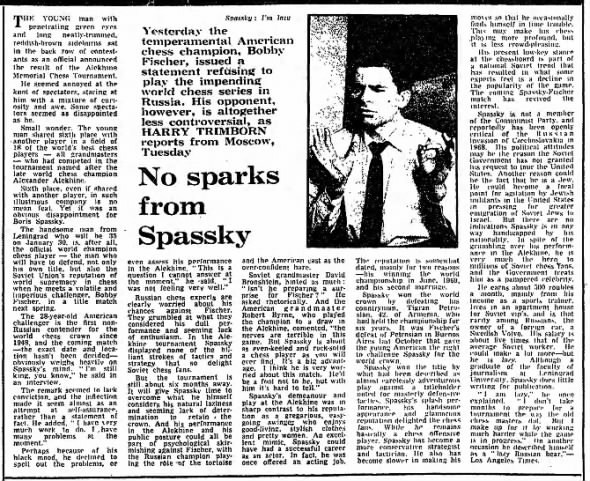 No Sparks From Spassky Wed, Dec 29, 1971 – 11 · The Guardian (London, Greater London, England) · Newspapers.com
No Sparks From Spassky Wed, Dec 29, 1971 – 11 · The Guardian (London, Greater London, England) · Newspapers.com
New York Times, New York, New York, Thursday, December 30, 1971 - Page 22
8 Nations In Bidding For Fischer Match
The deadline for bids for the world chess championship match between Bobby Fischer of New York and Boris Spassky of the Soviet Union, the world champion, is midnight tomorrow.
The following nations are among eight that have submitted bids: Canada, France, Iceland, Israel, the Netherlands, Switzerland and Yugoslavia. Yugoslavia will be submitting two bids.
While the bidding is secret, it seems that the antagonists will share a prize of $100,000, or more, with 62½ per cent for the winner and 37½ per cent for the loser.
A last-minute bid was received from the Borough President of Brooklyn, Sebastian Leone, who offered $75,000, with $25,000 additional from Walter Goldwater, president of the Marshall Chess Club. The bid was announced yesterday by E.B. Edmondson, executive director of the United States Chess Federation.
The Vancouver Sun Vancouver, British Columbia, Canada Friday, December 31, 1971 - Page 30
Canada Jumps Into Bidding Race for Fischer-Spassky Chess Match by Bill Rayner
Canada has entered into the bidding to host the world chess championship, it was learned today.
Phil Haley, president of the Canadian Chess Federation, confirmed in a telephone interview from Sarnia, Ontario., that the CFC is one of seven known national federations seeking the 24-game match between U.S. grandmaster Bobby Fischer and world champion Boris Spassky of the Soviet Union.
Haley said Canada's bid was submitted on behalf of Montreal. He felt Canada had a good chance, but would not reveal the amount of money guaranteed.
It is believed, however, that a minimum bid of $75,000 is needed, with the probable winning bid to exceed $100,000. The winner of the match would receive 62½ per cent of the purse, with 37½ per cent going to the loser.
Other countries known to have submitted bids are France, Iceland, Israel, Switzerland, Yugoslavia and The Netherlands. Others believed to be interested are Brazil, Argentina, Chile and Greece. Deadline for bids is midnight tonight.
If the highest bid is accepted by both Fischer and Spassky, France would be the probably winner. New York chess sources indicated that France has offered the two players a percentage of the gross income generated by a match in Paris.
This would include world TV, souvenir and publishing revenue, and could reach $1 million.
While Fischer has often stated that he is in chess for the money, his appearance in Vancouver last May could give Canada an edge. Fischer defeated Soviet grandmaster Mark Taimanov, 6-0, here in the opening challengers' competition match and has since shown a fondness for Canada.
He said in New York Thursday that he'd love to return to Canada and picks it as his second choice. His first choice is the U.S., but that country has not submitted a bid.
If it did, however, it is certain Spassky would veto it. The bidding competition works this way:
Interested countries submit bids to Amsterdam, headquarters of the World Chess Federation (FIDE), with copies to Fischer and Spassky.
The two players list their preferences. If the number one choice is the same, then the problem is solved. If the players can't get together by Feb. 1, then FIDE president Dr. Max Euwe will decide.
Each player would have one veto over Euwe's selection, but after that veto is cast, Euwe's decision would be final.
Fischer earned the right to meet Spassky with an elimination match victory over former world champion Tigran Petrosian of the Soviet Union. Spassky defeated Petrosian for the title in 1969.
The championship match is expected to begin in late June, 1972.
The Central New Jersey Home News New Brunswick, New Jersey Friday, December 31, 1971 - Page 12
Brooklyn Eyes Chess Playoff
New York (AP) — Brooklyn Borough President Sebastian Leone wants chess whiz Bobby Fischer to come home.
He has asked Secretary of State William P. Rogers to formally invite Russian chess grandmaster Boris Spassky to defend his title in Brooklyn where Robert J. Fischer was born 28 years ago.) [Correction: Born in Chicago!]
Leone said in his letter to Rogers released Thursday, that Brooklynites would post a $100,000 bid—and more if need be—to get the world's two great chess players at a mutually acceptable site in Brooklyn.
The borough president suggested that the event would signify good-will between The Soviet Union and the United States.
New York Times, New York, New York, Friday, December 31, 1971 - Page 21
On Bobby Fischer's Mind: The Match Site, Spassky and Money by Alden Whitman
Bobby Fischer, the 28-year-old American chess wizard, said yesterday that he would like it best if an American city was the high bidder for next spring's world title match with Boris Spassky, 34, of the Soviet Union.
Mr. Fischer, who made the statement in an interview, said his second choice would be Canada.
He is expected to find out over the weekend. So far, eight bids for the match have been received, with midnight tonight as the deadline for offers to put up $100,000 or more for the purse, the biggest chess prize ever.
Bids have been submitted by Canada, France, Iceland, Israel, Switzerland and Yugoslavia (which sent in two offers), and a last-minute bid came from Brooklyn on Wednesday.
The winner of the match is to get 62.5 per cent of the purse and the loser 37.5 per cent.
After the bids are unsealed, both the United States Chess Federation and its Soviet counterpart must agree formally on the match site, but presumably the highest bidder will get the match. The deadline for agreement is Feb. 1.
“I'd like to play in the United States because I'm used to the climate and the people, and the lighting is better,” Mr. Fischer said. He added with an enigmatic laugh: “But I wouldn't want to play in Brooklyn. Some other American city, but not Brooklyn.”
Mr. Fischer, who was born in Chicago and reared in Brooklyn, did not elaborate, but he is accustomed to playing his matches in such metropolitan centers as Buenos Aires and Belgrade.
He earned the right to challenge Mr. Spassky—who has held the world championship since 1969—by defeating Tigran Petrosian of the Soviet Union in Buenos Aires last fall. Mr. Petrosian is a former champion.
“I'll play Spassky regardless [of the site].” Mr. Fischer said. “I want the money, and I want the title even more.” The money, he added is very important (“I've plenty of ways to spend it”) because “chess is my business.”
He believes his chances of taking the world title are good. “I'm looking forward to the match,” he said. “I'm definitely confident that I'll master Spassky.”
Should Mr. Fischer win the 24-game match, he would become the first American world chess champion. As it is, he is the first American challenger since the championships were instituted in 1866 and Wilhelm Steinitz of Austria defeated Adolf Andersen of Germany. Since 1951 all the champions and challengers have been Soviet players.
Although Mr. Fischer is accounted young at 28, he will not be the youngest champion if he wins. Mikhail Tal of the Soviet Union was 23 when he gained the title in 1960. Emanuel Lasker of Germany won at 28. Mr. Fischer will be 29 on March 9.
Mr. Fischer returned — untanned — to New York on Monday from a month of exhibition play in summertime Argentina, and has not yet begun to tune up for the Spassky games.
“I'm not like a musician, I don't practice every day,” he said, “but I keep chess on my mind in general.”
Soon he will also have Mr. Spassky on his mind. “There's a lot of literature around about him,” Mr. Fischer said, “and I'll be studying some of it not only to find out about his games, but also his psychology.”











